|
| Serbia`s AI Ecosystem - Presenting the opportunities with Artificial Intelligence in Serbia in 2024. |
|
|
|
|
| Meeting with the students from the Federation of Young Serbs of Europe |
|
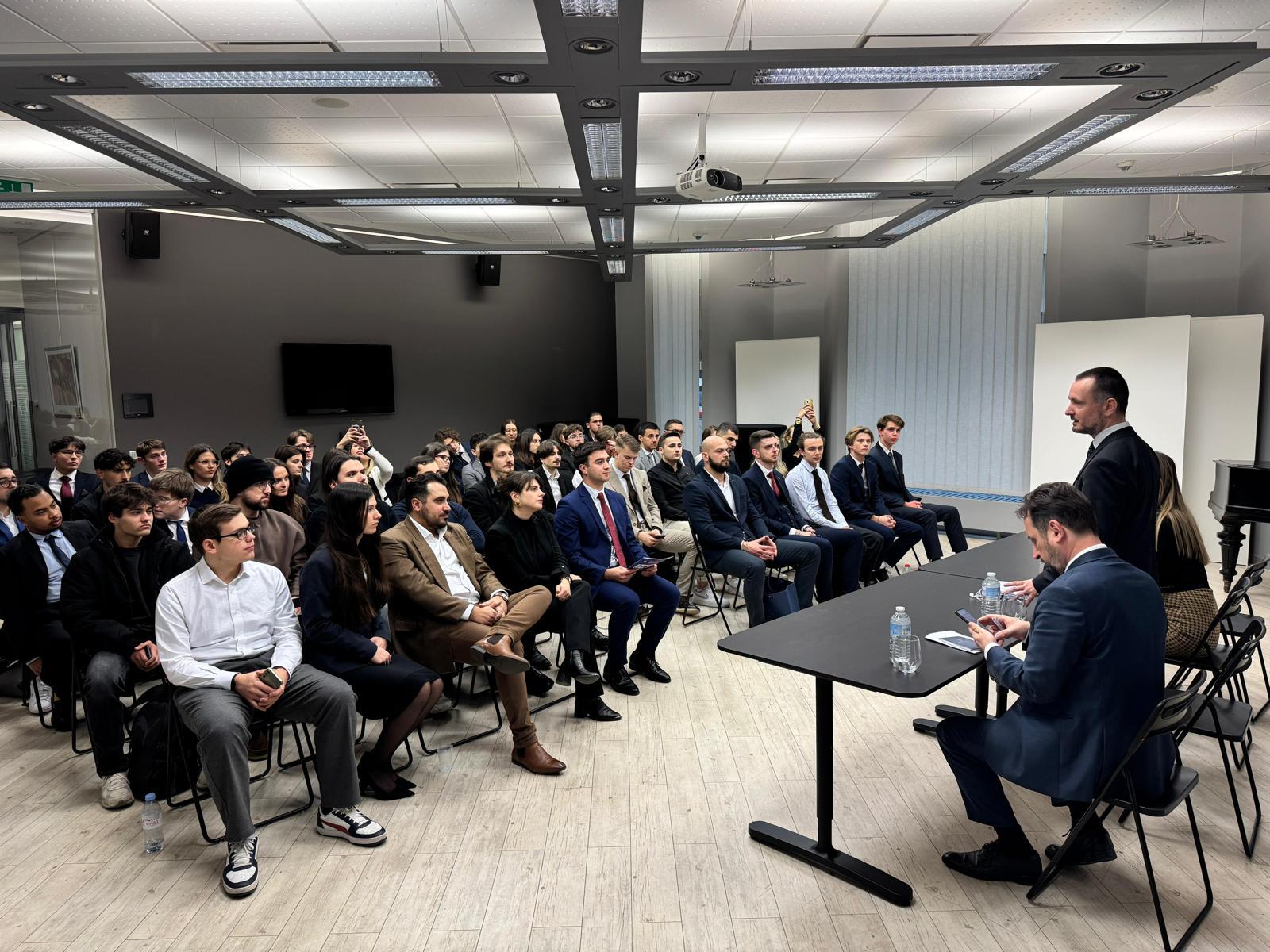
Students from the Federation of Young Serbs of Europe and their international peers visited the Mission of the Republic of Serbia to the European Union in Brussels.
In an open conversation, the Head of the Mission of the Republic of Serbia to the European Union Ambassador Danijel Apostolović introduced the guests to the scope of work and the most important diplomatic activities that the Mission undertakes in its daily work.
During the discussion, participants have exchanged the views on Serbia’s further progress in accession negotiations with the EU, existing challenges, as well as the results achieved so far in the country’s reform process.
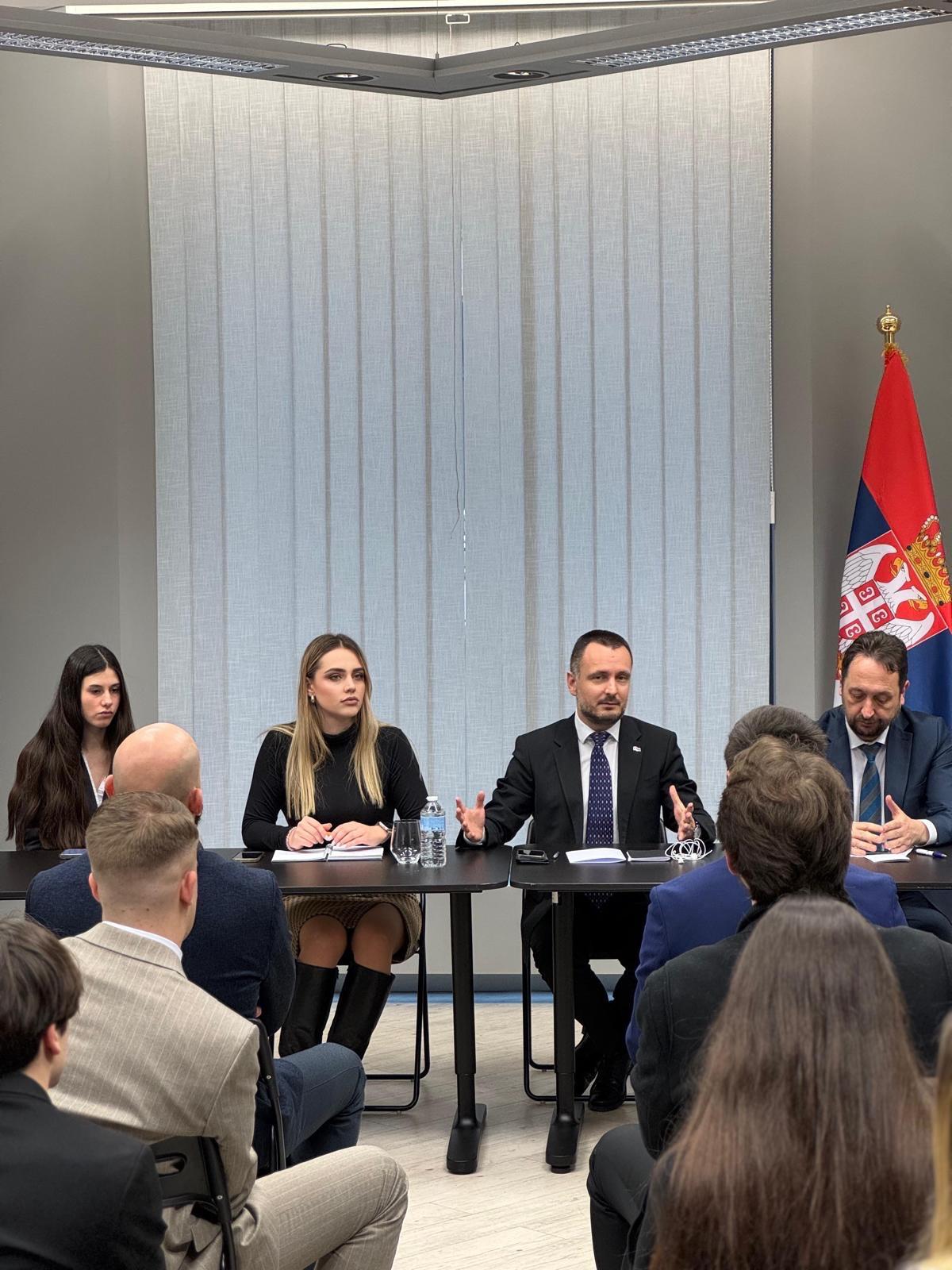
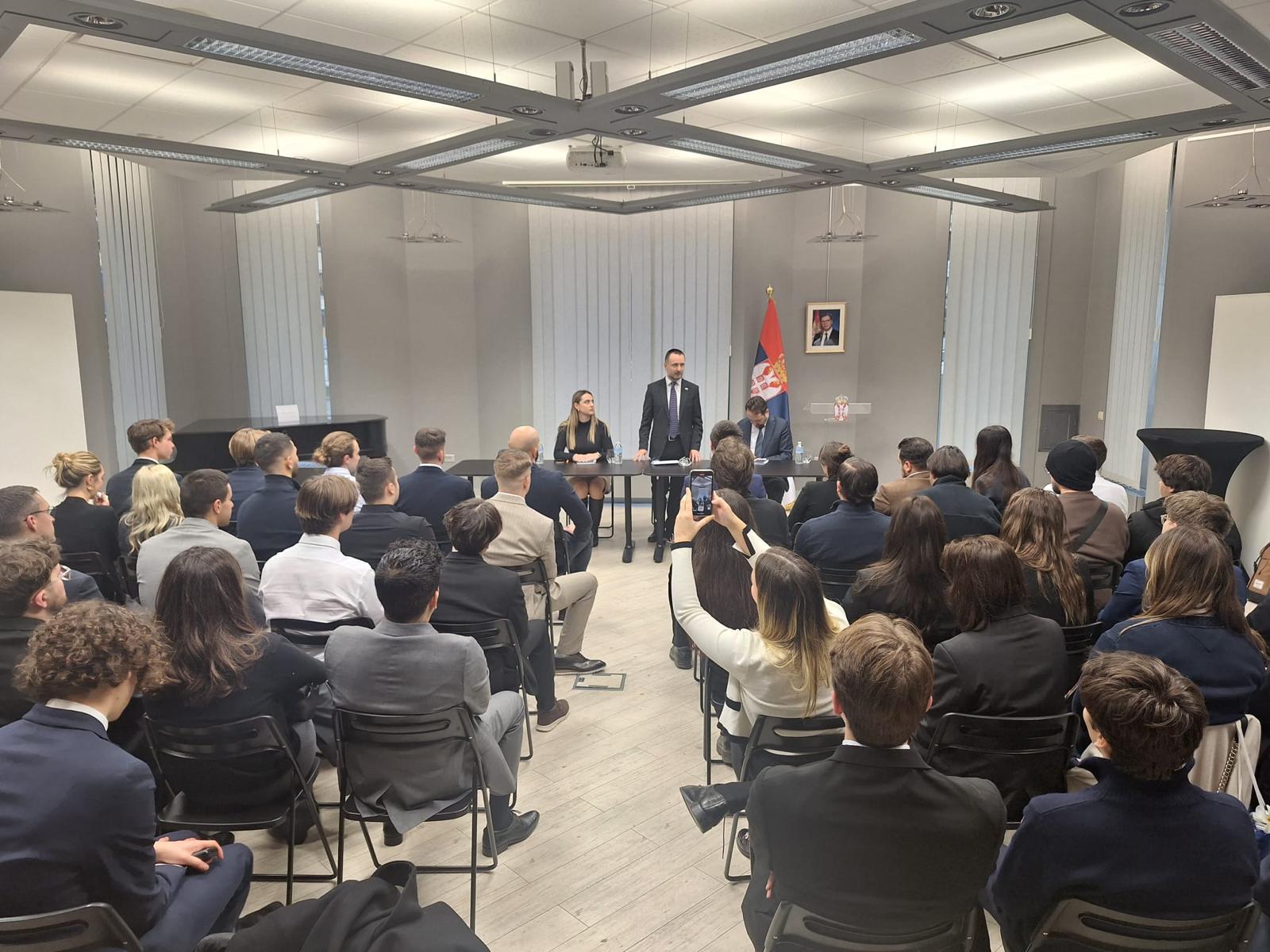 |
|
|
| Reception at the Mission of the Republic of Serbia to the EU on the occasion of the visit of the delegation of the American Chamber of Commerce in Serbia to Brussels, October 16, 2024 |
|
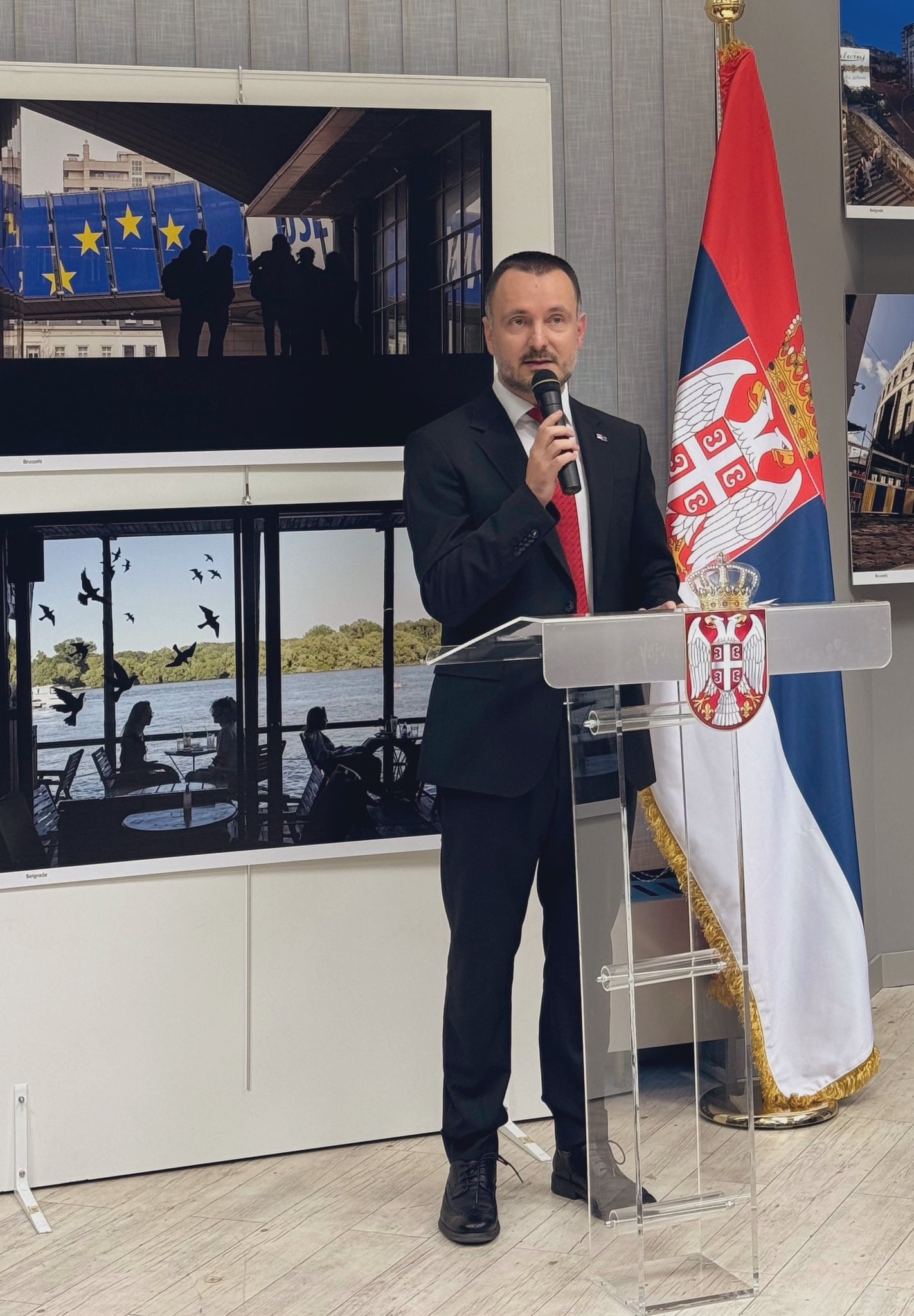
On the occasion of the study visit of the delegation of the American Chamber of Commerce in Serbia to Brussels, an official reception was held at the Mission of the Republic of Serbia to the EU on 16 October 2024. Ambassador Danijel Apostolović, Head of the Mission of the Republic of Serbia to the EU and Goran Vasić, member of the Board of Directors of the American Chamber of Commerce in Serbia and Executive Director for corporate affairs of Yettel company addressed the guests at the reception.
In his speech, Ambassador Apostolović emphasized a rapid growth of Serbian economy in previous years and reiterated the recent news regarding the investment grade of Serbia, which is a confirmation of credible economic policy of Serbian Government. Ambassador Apostolovic commended the Growth Plan for the Western Balkans, which should contribute to the acceleration of necessary reforms. He emphasized the important role of business community in this process, in particular when it comes to fulfilling the economic criteria. In addition, Ambassador Apostolovic emphasized the importance of opening of Cluster 3 (Competitiveness and Inclusive Growth) until the end of the year and appealed the member states to give their green lights to that end.
Member of the Board of Directors of the American Chamber of Commerce in Serbia, Goran Vasić, emphasized that the visit to Brussels was a good opportunity for the members of the American Chamber of Commerce in Serbia to learn about key challenges in our accession negotiations with the EU. He said that business community and companies, members of the AmCham in Serbia will have a constructive and an active role in that process in the upcoming period.
The official reception was attended by representatives of diplomatic corps, the European Commission, the European Parliament, EU member states, representatives of business community, international organizations and regional institutions and representative offices in Brussels, etc.
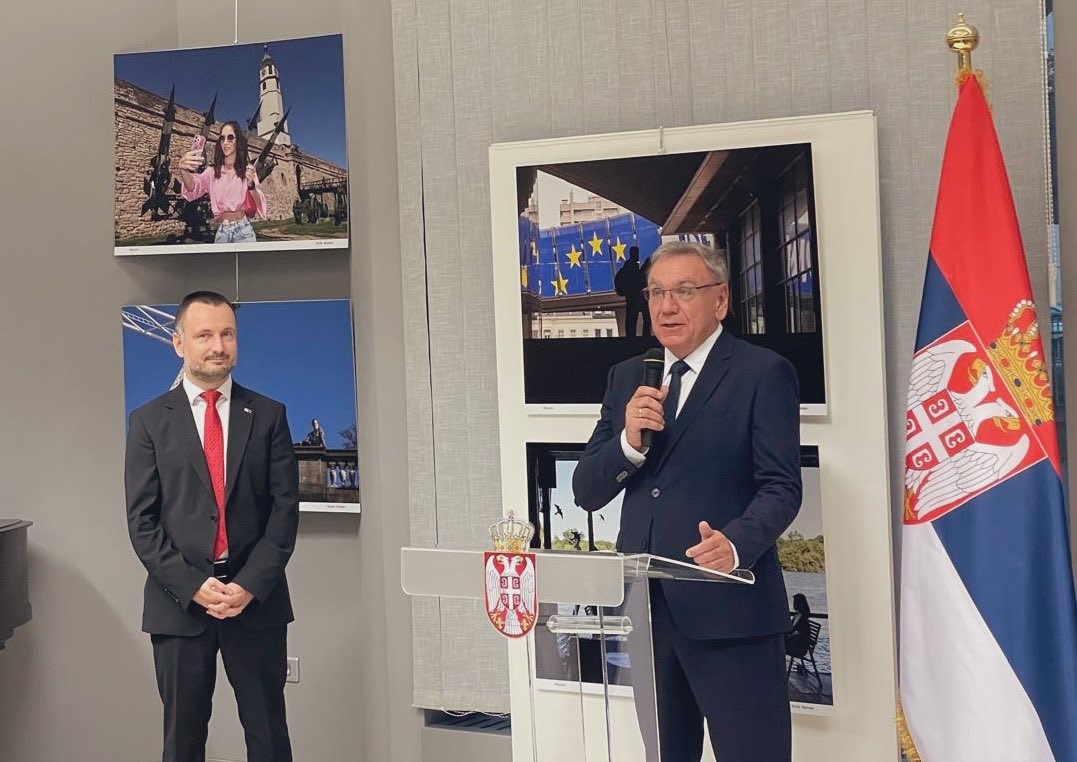
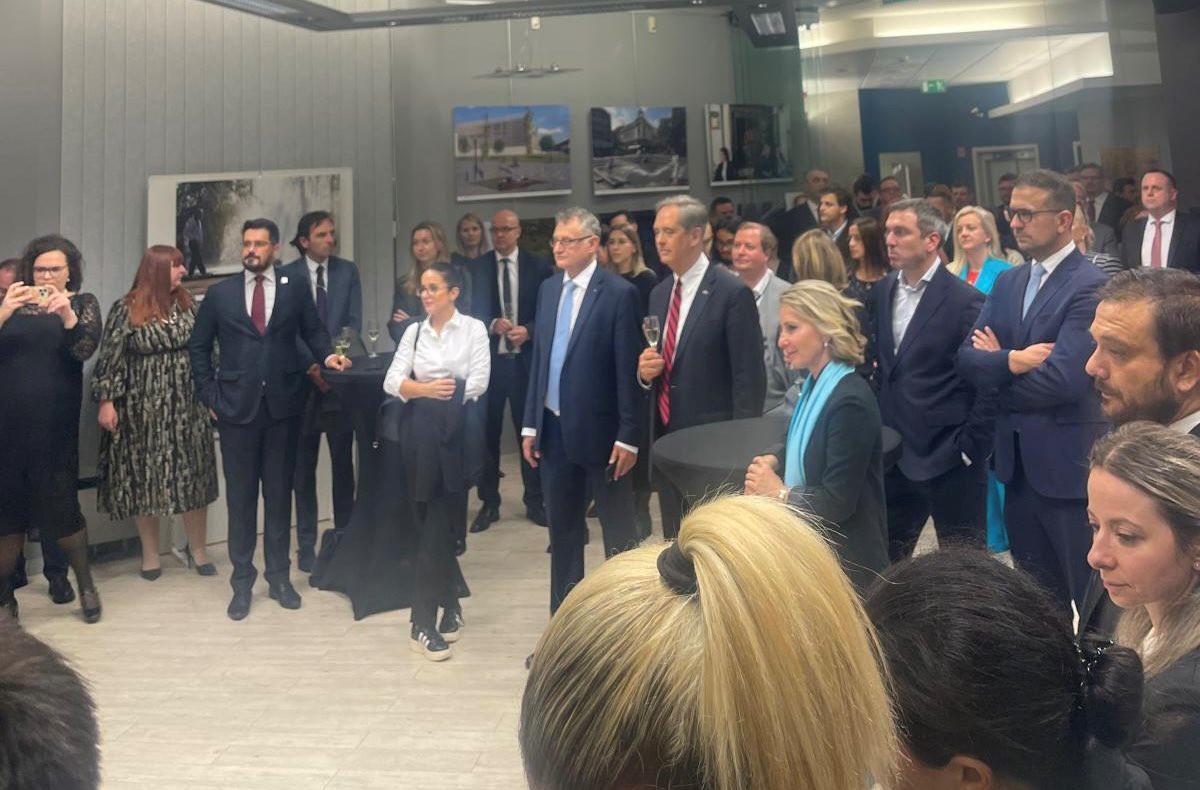 |
|
|
| Presentation of the letters of credentials of the Head of the Mission of the Republic of Serbia to the EU, Ambassador Danijel Apostolović, June 21, 2024 |
|
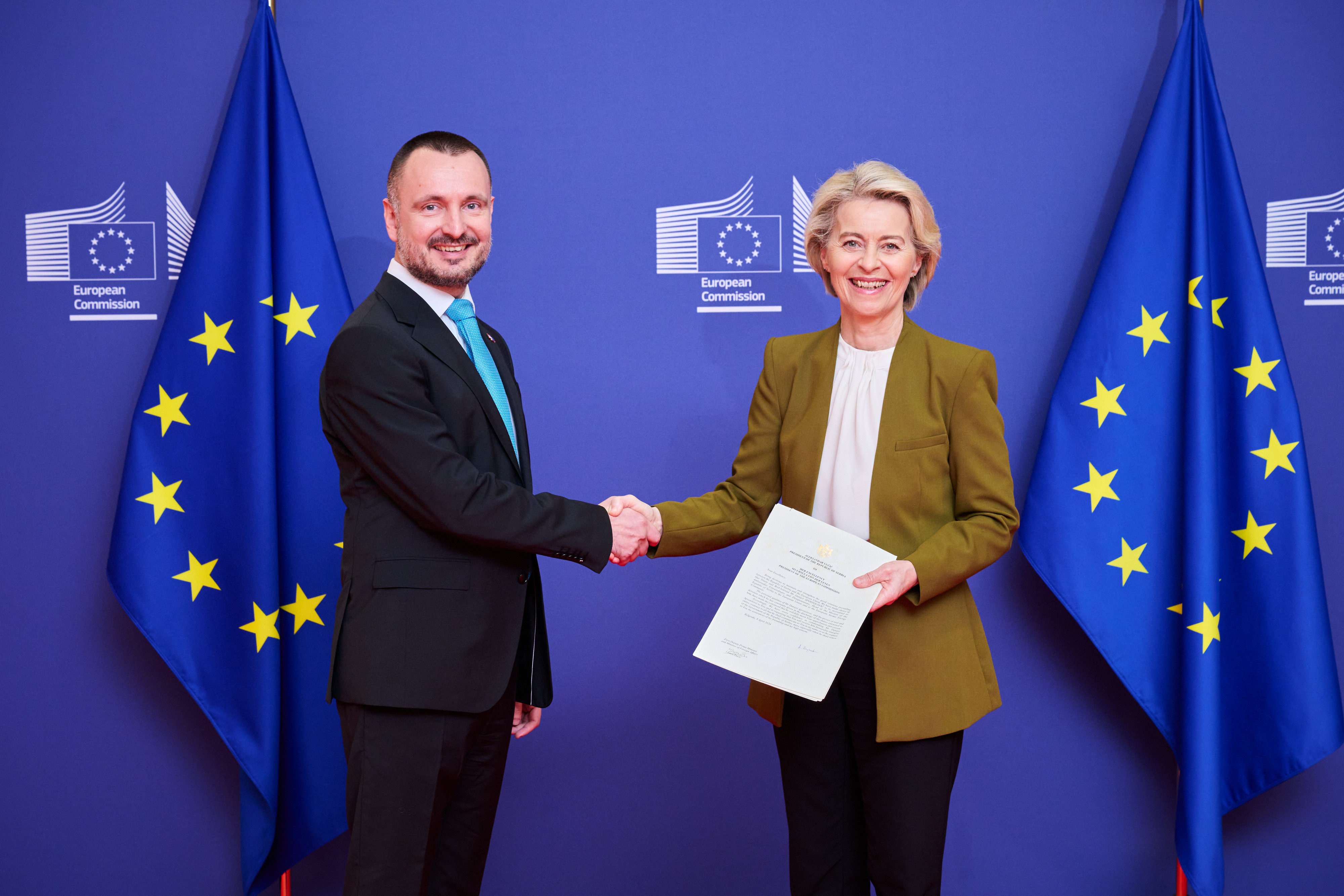
The Head of the Mission of the Republic of Serbia to the European Union Ambassador Danijel Apostolović presented today the letters of credentials to the President of the European Commission Ursula von der Leyen.
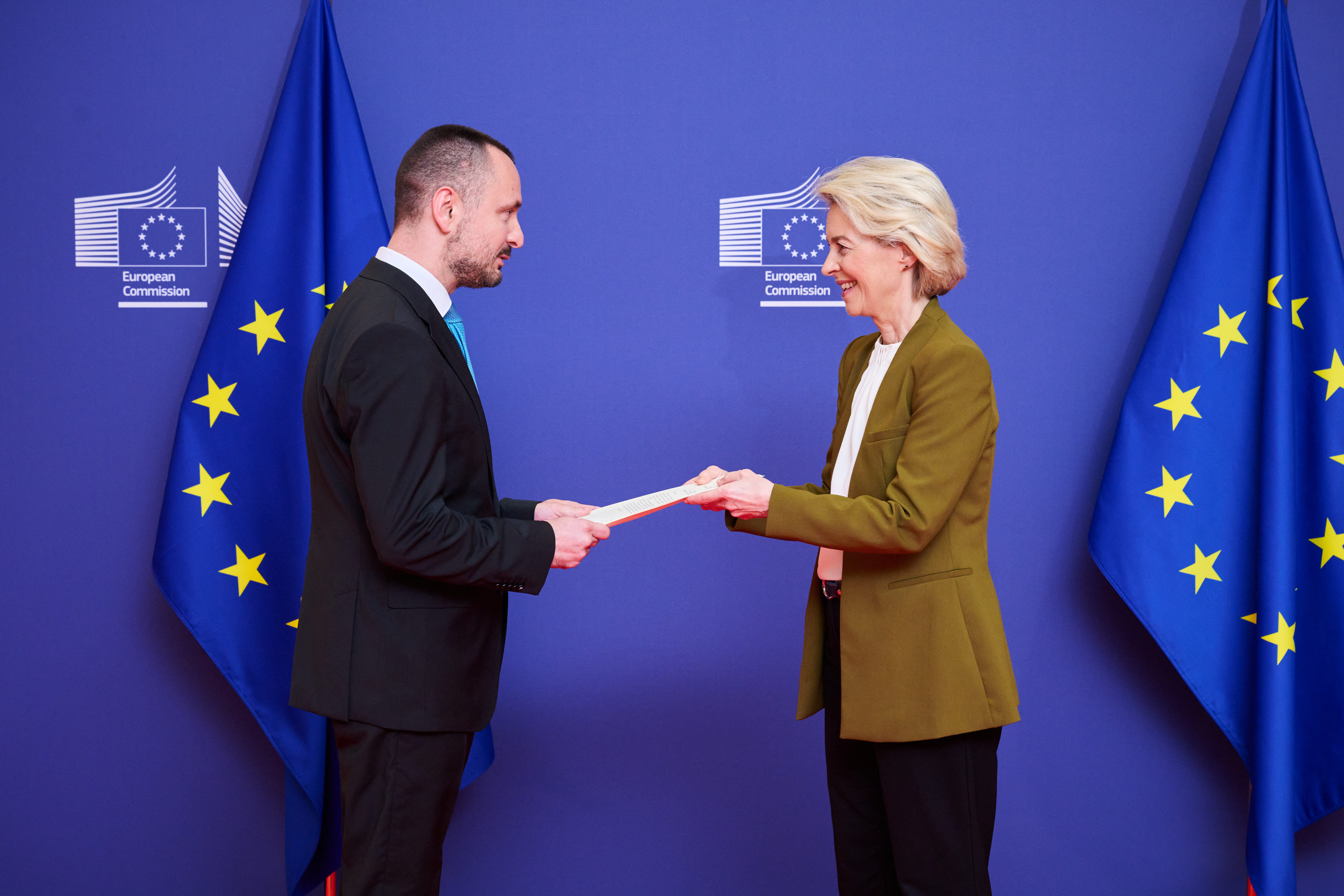 |
|
|
| Visit of the representatives of the National Academy for Public Administration to the Mission of the Republic of Serbia to the EU in Brussels, June 12, 2024 |
|
As а part of the project "Strengthening the professional capacities of civil servants in state administration in Serbia", implemented by the National Academy for Public Administration, during the visit to the institutions of the European Union in Brussels, representatives of ministries, judicial institutions and other bodies spoke on June 12 with the ambassador of the Republic of Serbia to the European Union H.E. Mr. Danijel Apostolović. Ambassador of the Republic of Serbia in Belgium and Luxembourg H.E. Mr. Aleksandar Tasić also attended the meeting.
On this occasion, the participants exchanged views on the most important topics pertinent to the EU accession negotiations, geopolitical situation, results of the recent elections for the European Parliament, regional and other matters related to the EU enlargement policy.

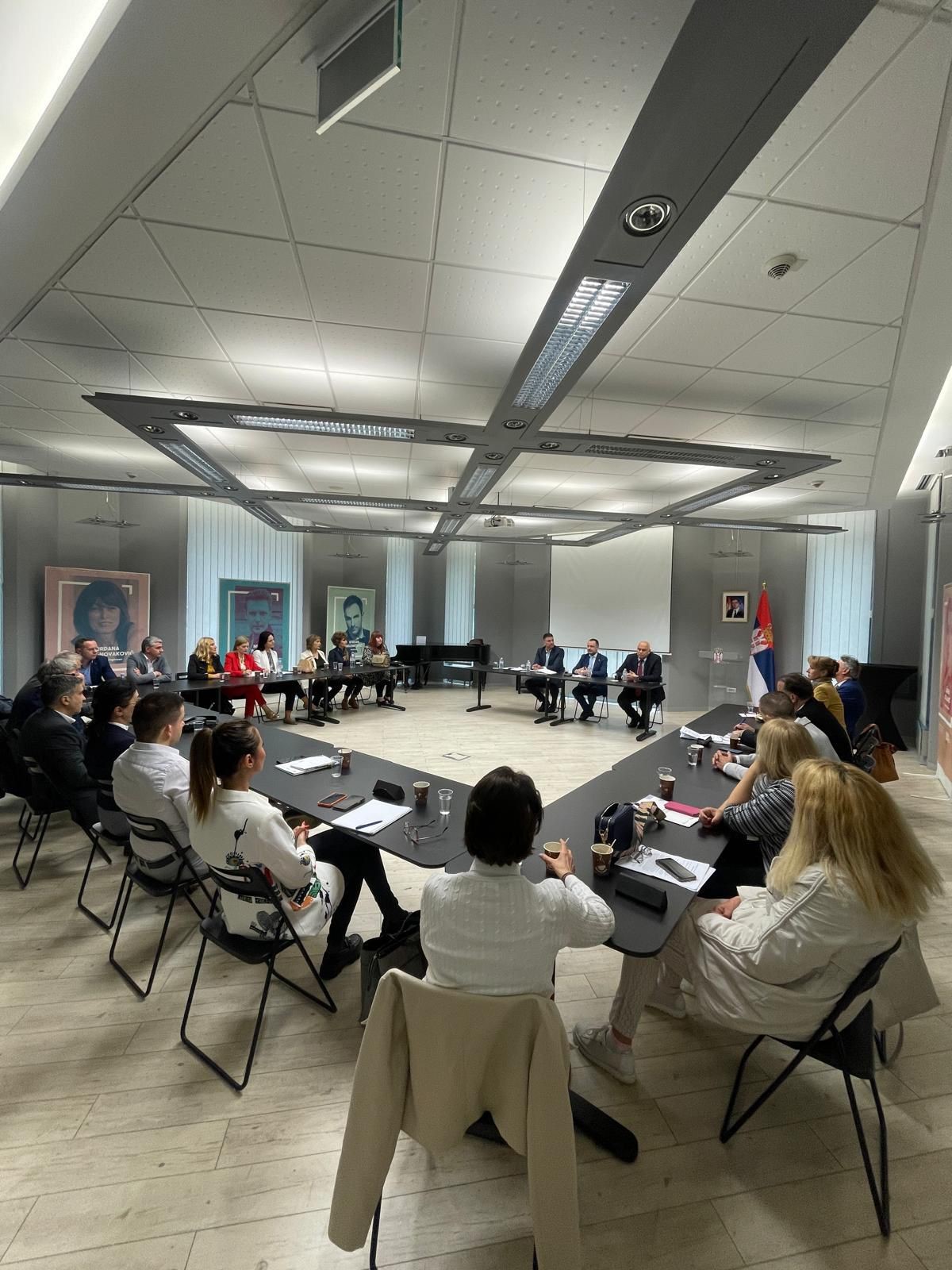 |
|
|
| Presentation of the letters of credentials of the Head of the Mission of the Republic of Serbia to the EU, Ambassador Danijel Apostolović, May 22, 2024 |
|
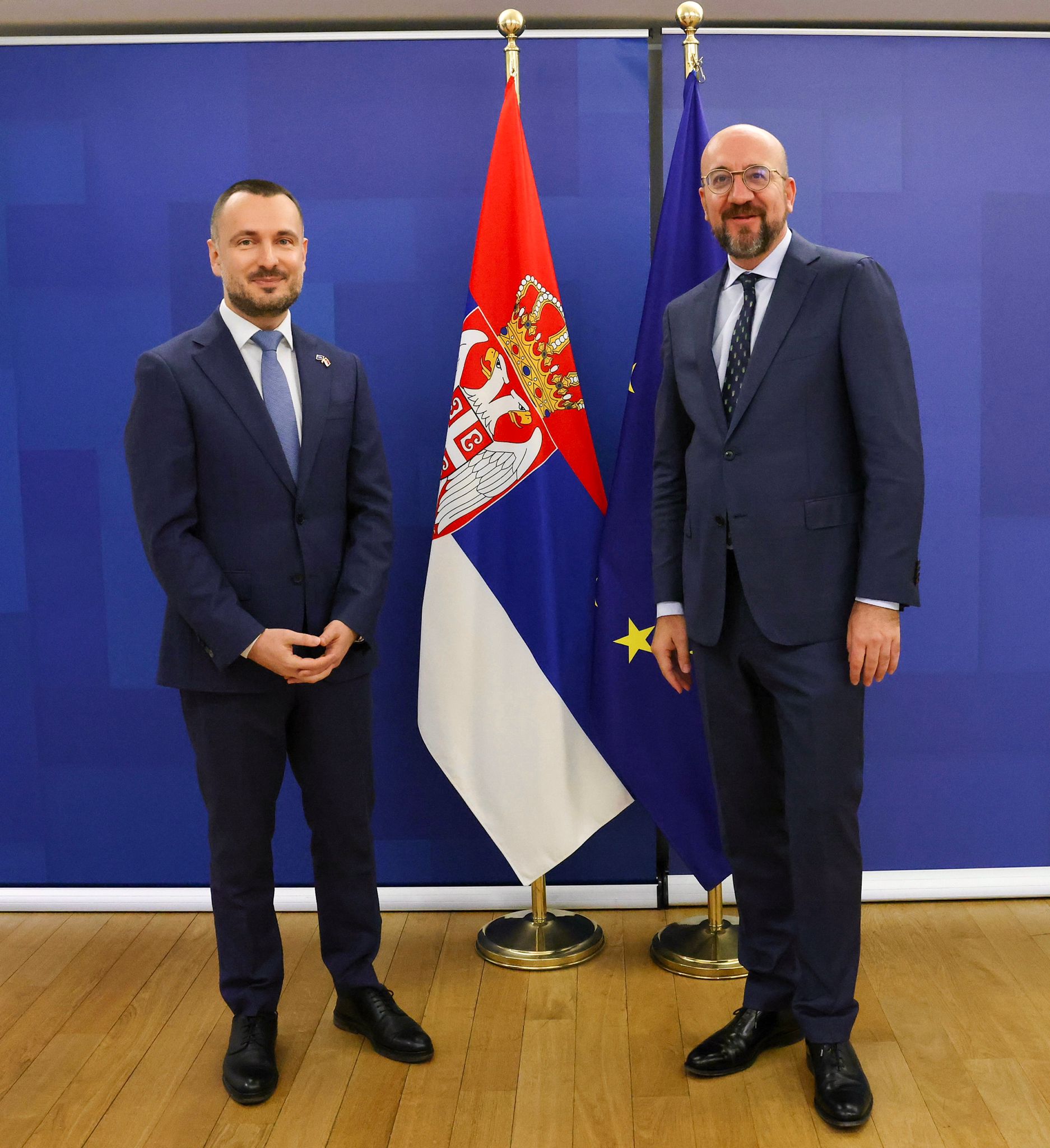
The Head of the Mission of the Republic of Serbia to the European Union Ambassador Danijel Apostolović presented the letters of credentials to the President of the European Council Mr. Charles Michel.
Ambassador Apostolović was glad to exchange views with the President of the European Council Mr. Charles Michel on the most important topics related to the accession negotiations of the Republic of Serbia to the EU.
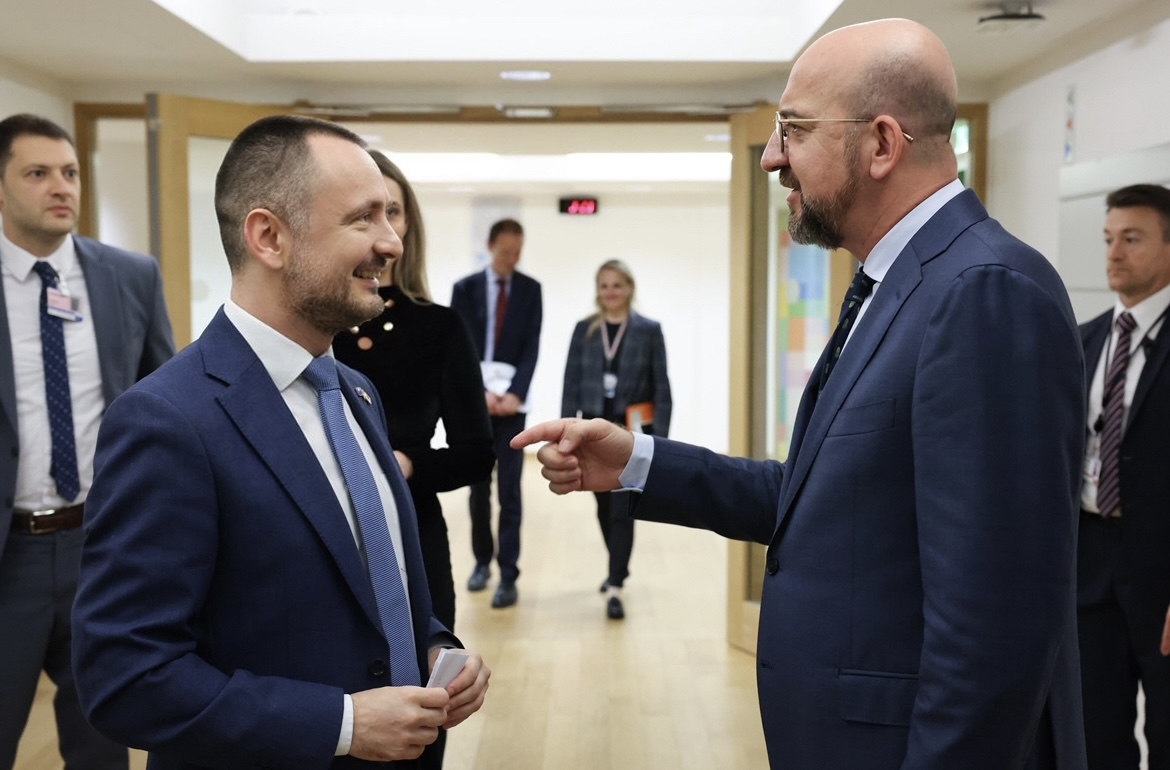
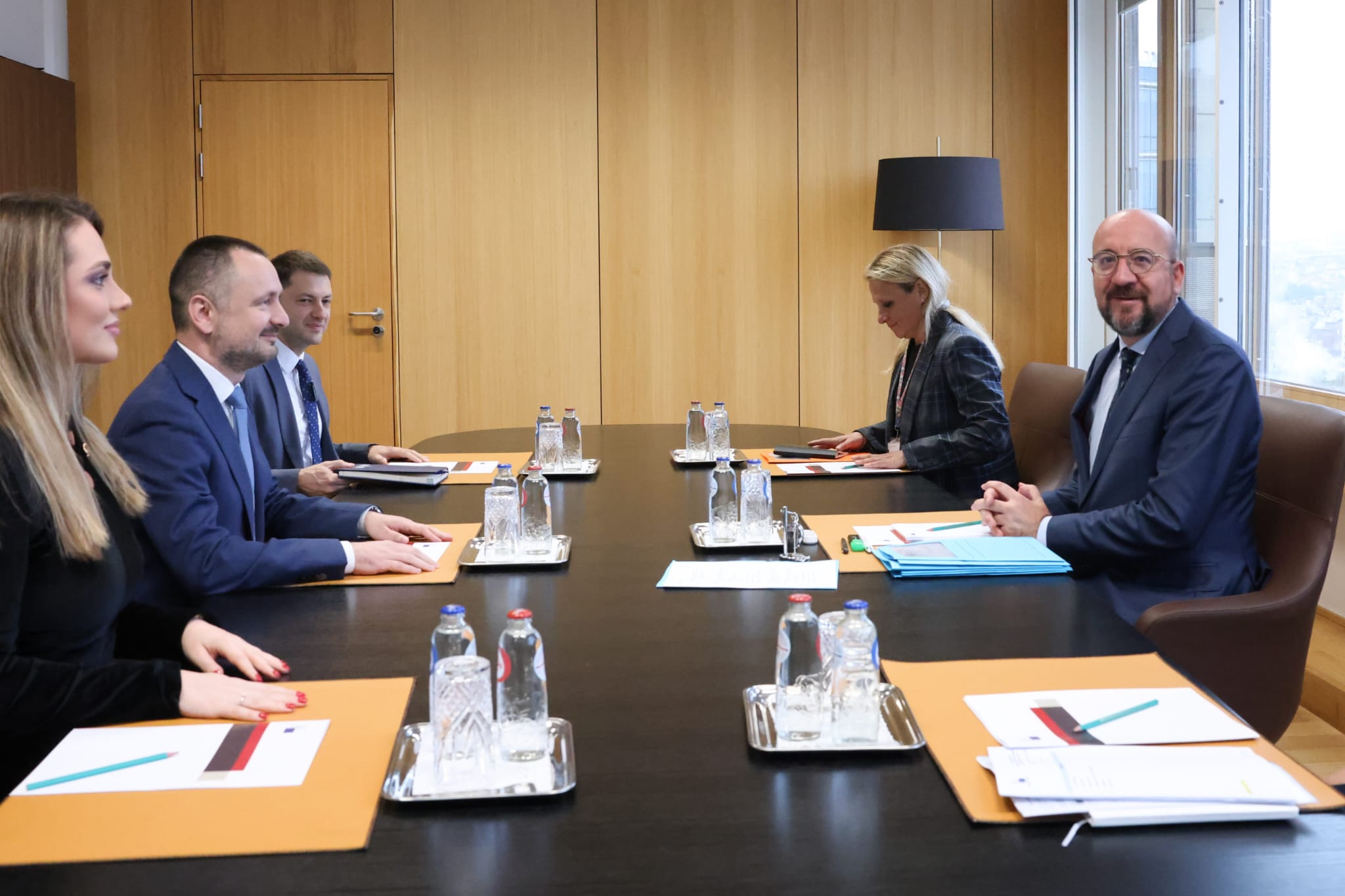
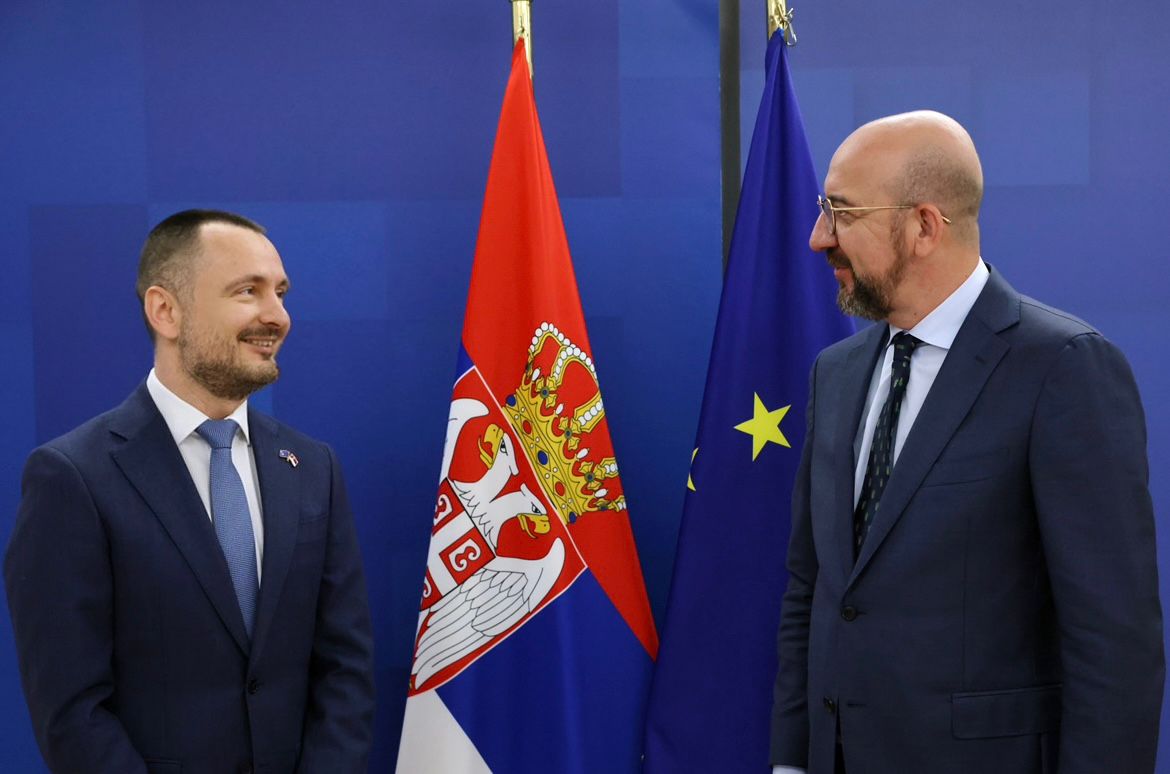
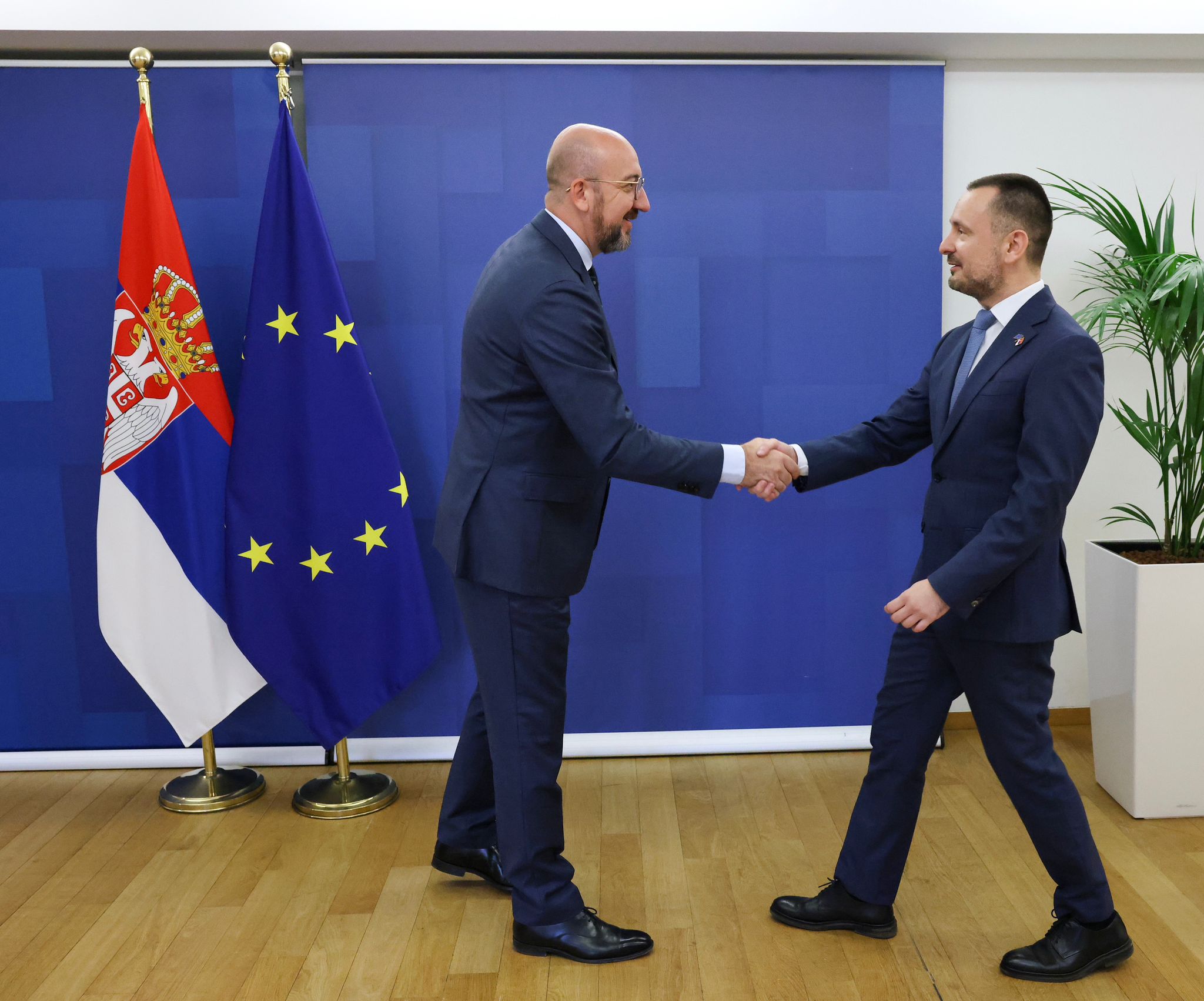 |
|
|
| Presentation of the copies of letters of credence of the Head of the Mission of the Republic of Serbia to the EU, Ambassador Danijel Apostolović |
|
The Head of the Mission of the Republic of Serbia to the European Union, Ambassador Danijel Apostolović handed over the true copies of letters of credence for the presidents of the European Council and the European Commission to the Chief of Protocol of the EEAS Mr. Diego Mellado.
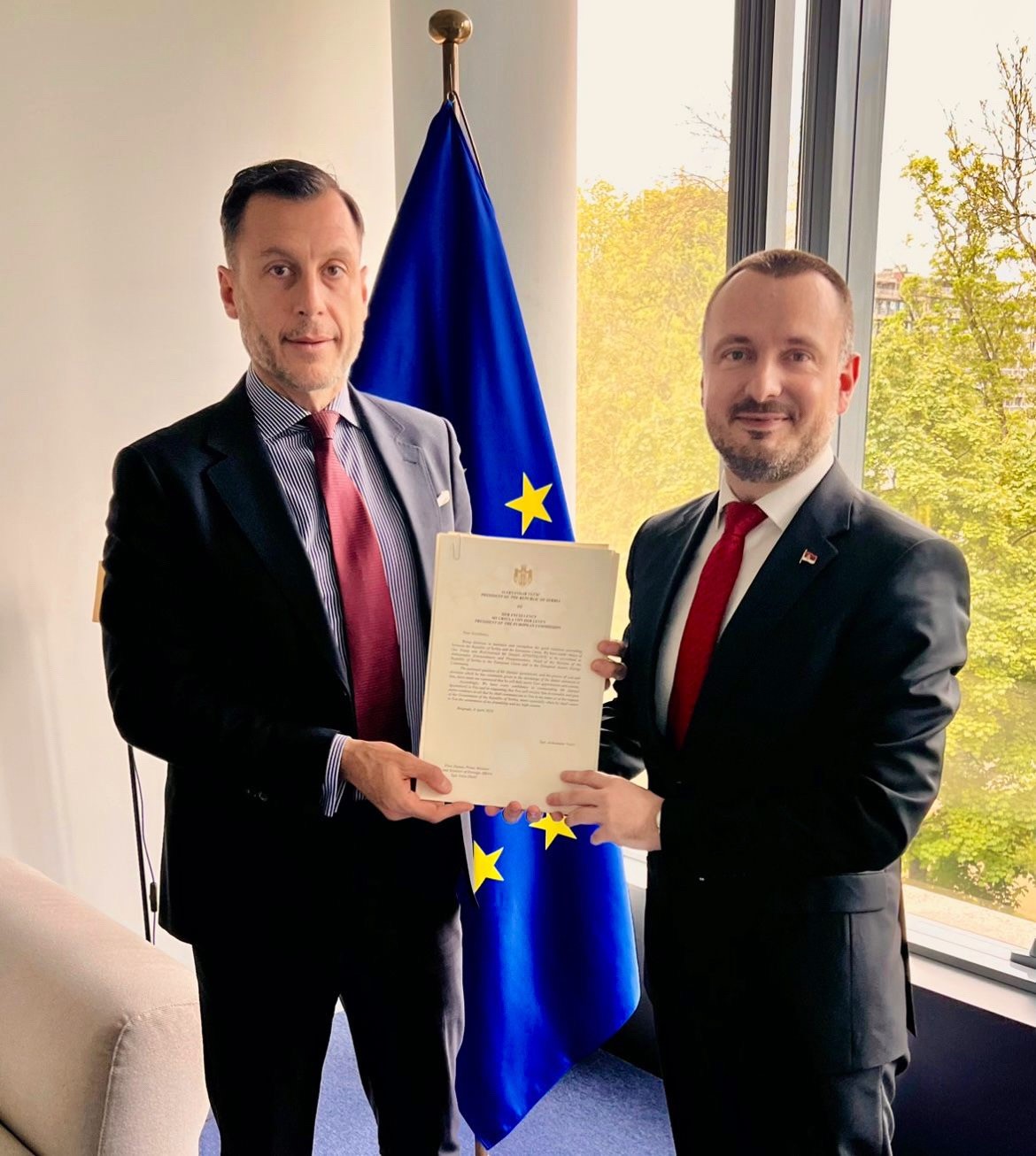 |
|
|
| Meeting of the Subcommittee for Internal Market and Competition between EU and Serbia, March 5, 2024 |
|
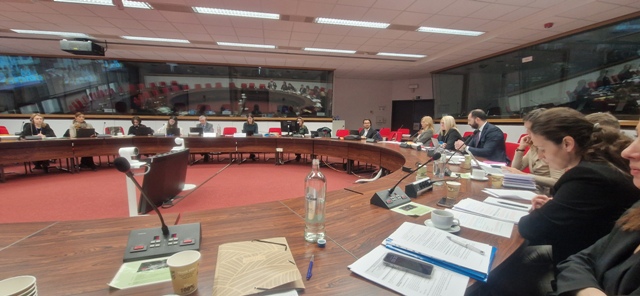
Meeting of the Subcommittee for Internal Market and Competition between EU and Serbia was held on 5 March in Brussels. On behalf of the European Commission, the meeting was chaired by Mr. Michael Miller, Head of the Department for Montenegro and Serbia in the EC Directorate General for Neighborhood and Enlargement Negotiations (DG NEAR). From the Serbian side, the meeting was chaired by Mr. Žarko Malinović, Acting Assistant Minister at the Ministry of Interior and Foreign Trade. Representatives of the Ministry of European Integration, Ministry of Finance and the Mission of the Republic of Serbia to the EU also attended the event. The meeting was held in a hybrid format, and numerous representatives of institutions of the Republic of Serbia, such as the Ministry of Health, Ministry of Economy, National Bank of Serbia and others participated via video conference.
The meeting was focused on the topics related to the internal market and competition and the level of compliance of the regulations of the Republic of Serbia with the EU law. These areas are also important for the implementation of the new Growth Plan for the Western Balkans, having in mind the process of the accelerated integration of the region and Serbia into the EU Single Market. |
|
|
| Meeting of the Subcommittee for Research, Innovation, Information Society and Social Policy of the EU - Serbia, February 7, 2024. |
|
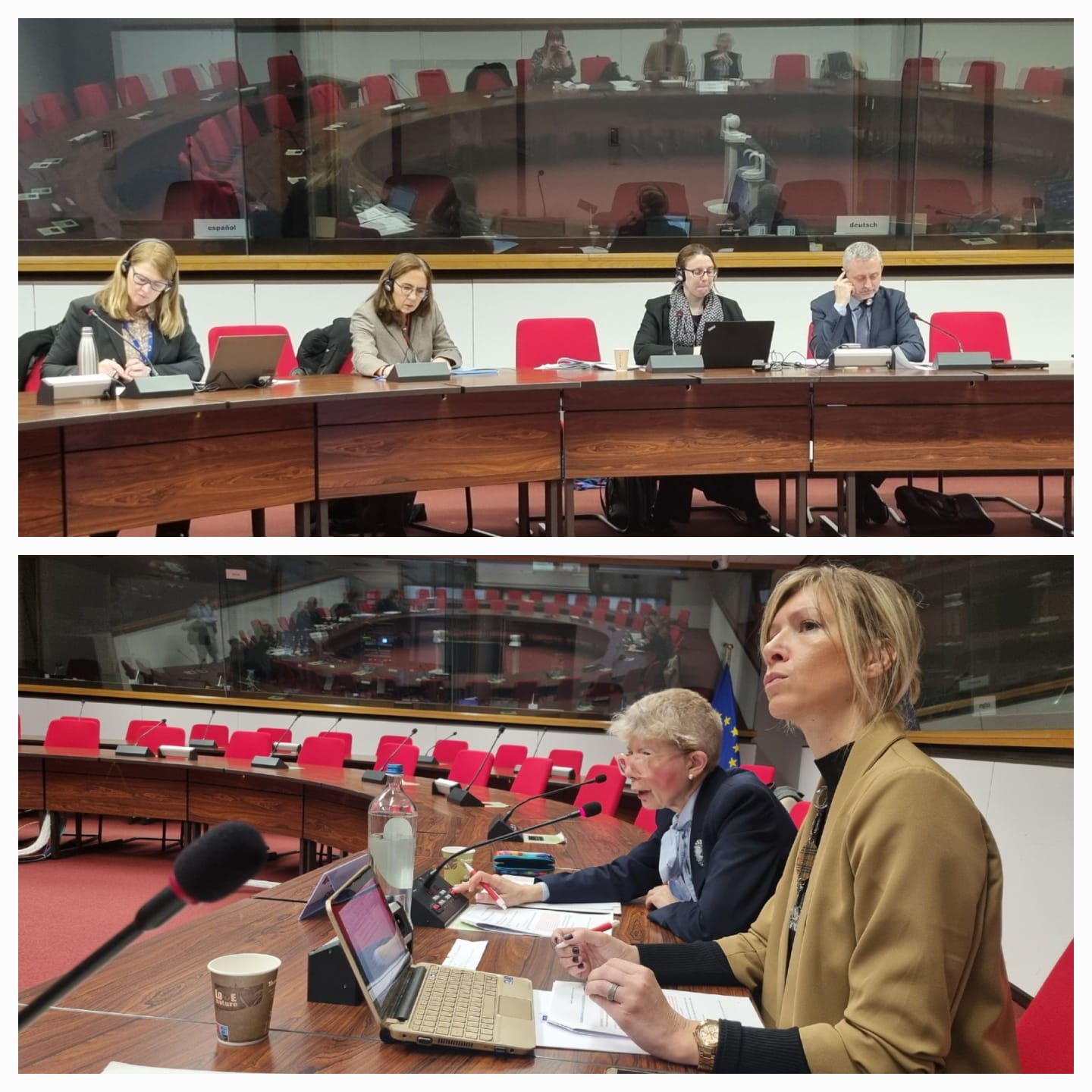
Meeting of the Subcommittee for Research, Innovation, Information Society and Social Policy of the EU - Serbia was held on 7 February in Brussels. On behalf of the European Commission the meeting was chaired by Mr. Michael Miller, Head of the Department for Montenegro and Serbia in the EC Directorate General for Neighborhood and Enlargement Negotiations (DG NEAR). From Serbian side, the meeting was chaired by Ms. Dragana Savić, Head of the Department for International Cooperation and European Integration at the Ministry of Labour, Employment, Veterans and Social Affairs, and representatives of the Ministry of European Integration and the Mission of the Republic of Serbia to the EU also attended in Brussels. The meeting was held in a hybrid format, and numerous representatives of institutions of the Republic of Serbia, such as the Ministry of Internal and Foreign Trade, the Ministry of Information and Telecommunications, Ministry of Science, Technological development and Innovation, RATEL, REM and others participated via video conference.
The meeting was focused on the topics related to the information society and digital agenda, electronic communications, audio-visual media, movement of workers and social cooperation, reform of the education system, professional development and training, cooperation in the field of youth and sports, research and science, the "Horizon Europe" program etc. |
|
|
| Meeting with the students from the Center for Pan-European Studies from Germany, 2 February 2024 |
|
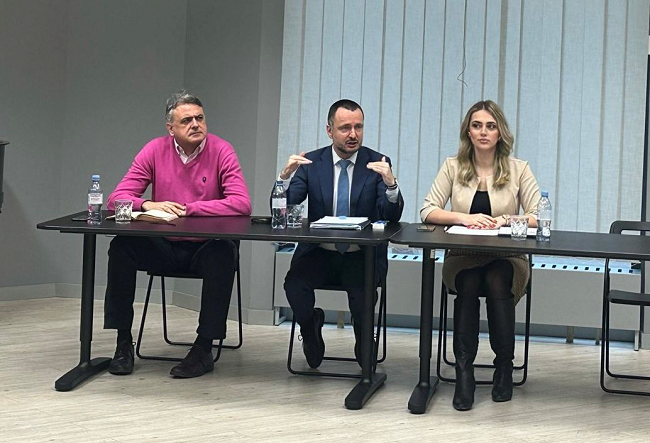
Students of the Center for Pan-European Studies from Vlotno (North Rhine-Westphalia) visited the Mission of the Republic of Serbia to the European Union in Brussels on the February 2 this year. The charge d'affaires of the Mission of the Republic of Serbia to the European Union Danijel Apostolović introduced the guests to the scope of work and the most important diplomatic activities that the Mission undertakes in its daily work within the framework of the accession negotiations of the Republic of Serbia with the EU.
During the meeting, participants have exchanged the views on the issues of importance for international relations in the context of future relations in the European Union, the position and role of Germany, regional and other topics of importance for the EU enlargement policy.
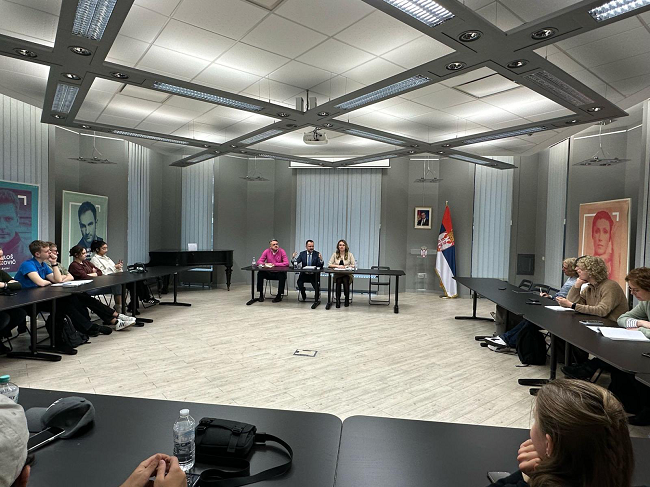 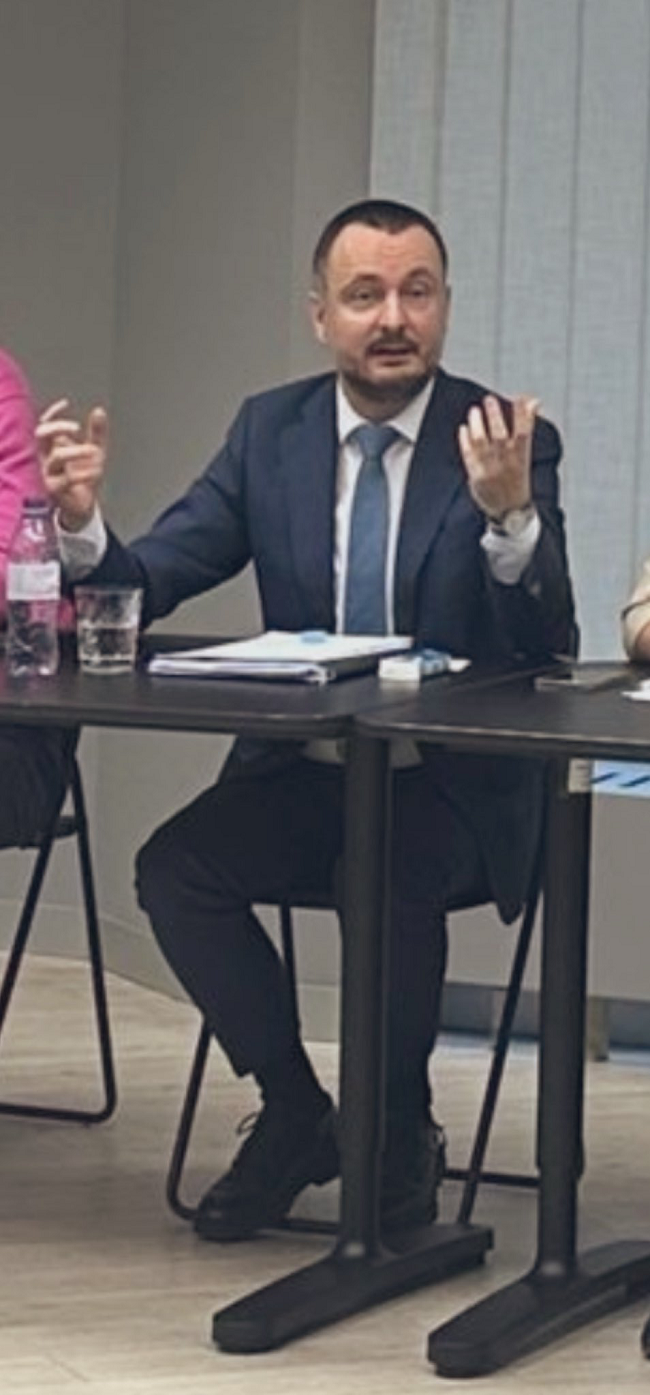 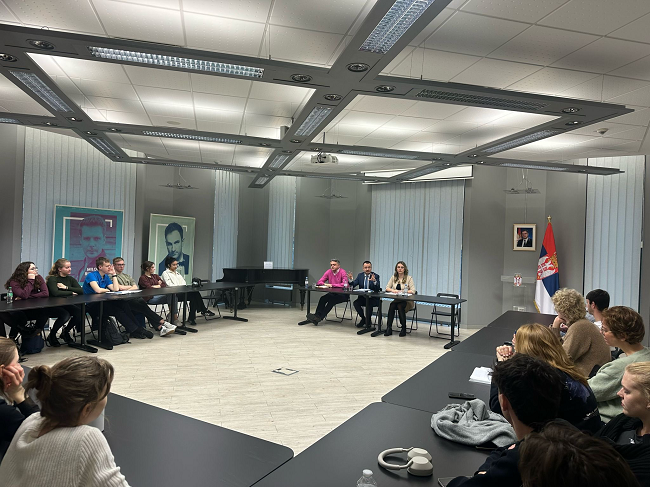 |
|
|
| Statement by Minister of Foreign Affairs of the Republic of Serbia Nikola Selaković at the meeting of the UN Security Council on the report on the work of UNMIK |
|

18.10.2022.
Mr. President,
Madam Special Representative,
Ladies and gentleman,
It gives me honor to address this distinguished body once again and to discuss the latest report of the Secretary-General on the work of the UNMIK.
I would like to thank the Secretary-General and the Special Representative for submitting the report. We take note of the efforts that Ms. Ziadeh makes in performing this very responsible duty, especially bearing in mind the necessity of a comprehensive overview and the complexity of the situation on the ground.
I also take this opportunity to underline that the Republic of Serbia highly values the activities of UNMIK in Kosovo and Metohija, established under UN Security Council Resolution 1244. We advocate for its continued operation in an unchanged and undiminished scope and capacity, especially bearing in mind that the Mission has not yet achieved the main goal of its mandate - a peaceful and normal life for all citizens of our southern province.
Ladies and gentlemen,
Unfortunately, the last few months have not brought more stability in Kosovo and Metohija and the situation in the Province is not exactly as presented in the report. Unilateral moves of Pristina continue to consciously and systematically deepen ethnic differences, causing discrimination against the non-Albanian population. To our knowledge, 105 ethnically motivated attacks have been recorded since the beginning of this year. In addition, Pristina is actively working on administrative and bureaucratic obstacles, by taking measures that were not agreed upon in the dialogue as the basic mechanism for negotiations and reaching solutions between Belgrade and Pristina. Pristina’s approach is problematic in many ways. This irresponsible conduct of Pristina is consciously sabotaging the efforts not only of Belgrade, but also of the EU and other involved parties of the international community, with the clear intention of achieving two goals - the first being to avoid the implementation of assumed commitments. The second, the ultimate and far more alarming goal is the intimidation, marginalization and persecution of Serbs.
In all previous statements before this this distinguished body, Pristina focused on what happened in the past while failing to mention, which is painful to witness, how non-Albanians in Kosovo and Metohija live today. Serbs are still intimidated in different ways, forced to leave their homes, villages and cities. Those displaced are discouraged from returning to where they were born and lived their lives.
The provisional institutions work systematically to remove and erase as much as possible of the cultural and national diversity that is left. At the same time, Pristina is consciously fueling inter-ethnic tensions using all available methods.
Attending religious celebrations seems to be a crime in Kosovo and Methohija. It is the case of Nikola Nedeljković who was arrested for allegedly "inciting ethnic hatred and intolerance", but actually his imprisonment was for attending the St. Vitus Day (Vidovdan) celebration.
Nikola was sentenced to eight months in prison without any material evidence. On the other hand, let me remind you that even to this day there is not a single perpetrator held legally accountable for the more than 1,000 Serbs killed since 1999. Due to planned intimidation, almost all towns and villages in Kosovo and Metohija are ethnically cleansed. Representatives of Pristina are ignoring the suffering, insulting the open wounds of the Serbs who had to leave their ancestral homes, and I underline, there are more than 200,000 of them. Such conduct has not change for last 23 years and is in complete opposite to the democratic values and principles that the provisional institutions of self-government often promote in their statements.
Therefore, I consider it necessary to emphasize that the true political will of the involved international actors and Pristina is necessary in order to create the conditions for the beginning of the end of discrimination on a national basis and common life in the Province.
Esteemed members of the Security Council, I would like to draw your attention to the rigid, problematic and extremely irresponsible conduct of the other negotiating party within the dialogue. In achieving the above-mentioned goals, Pristina applies the so-called policy of reciprocity, a well-thought-out, malicious strategy that, unfortunately, was not constructed independently. By continuously insisting on mutual recognition as a central part of the dialogue, the so-called policy of reciprocity demonstrates the essential unwillingness of the current political leadership of Pristina to find any compromise solution. Let me remind you that the talks between Belgrade and Pristina did not start with last elections in Pristina, but have been in progress for 11 years since the technical dialogue started (8 March 2011). Therefore, we assess as inadmissible attempts to disregard the current format of the dialogue, and annul the agreements only because they are not to the liking of the current political factors. It is unacceptable that the current geopolitical circumstances are being used to simply erase what has been painstakingly worked on for years. Belgrade, I underline, was institutionally involved in the dialogue from the very beginning, while the commitment of the other side has varied and continues to vary depending on the political option that is in power.
The harsher political rhetoric and narrative of the current leadership of the provisional institutions of self-government in Pristina are accompanied by concrete destabilizing steps. In the reporting period, measures on license plates were imposed, disguised as attempts at alleged integration into society.
Let me remind you again, there was no agreement on such measures in the dialogue between Belgrade and Pristina. I believe, ladies and gentlemen, that even today we will hear from the representative of Pristina that their side has fulfilled all obligations, but the decision on re-registration of license plates shows that Pristina is not only failing to fulfill what has been agreed upon, but it nullifies the results of the dialogue, creating a new crisis all over again. The effect of such forcibly imposed measures is best illustrated by the fact that since the decision was made a single-digit number of re-registered vehicles with Serbian license plates has been recorded, of which only two are Serbs from the north of Kosovo and Metohija. This is another indicator that Pristina does not enjoy full support, but that, on the other hand, it continuously provokes the natural reaction of the Serbian population, which cannot endlessly be subject to the arbitrariness of temporary institutions.
I believe that even today we will hear already known narrative of representatives from Pristina who try to present every reaction of the Serbs in Kosovo and Metohija as an activity organized by Belgrade in alleged attempts at destabilization. Such claims are simply not true. Serbia, for its part, cannot in any way contain the revolt present among the non-Albanian population of Kosovo and Metohija. It is an undeniable fact that citizens' protests represent a voice against many years of institutional violence and the deprivation of rights of the non-Albanian population, which, in this case, is denied the right to peaceful enjoyment of private property acquired in a legal manner.
Pristina does not cease in its attempts to confiscate property, and, as is well-known, one of the targets is the Serbian Orthodox Church. By calling into question the return of property to the Dečani Monaster Pristina paradoxically does not execute the decisions of its own so-called Constitutional Court.
Ladies and gentlemen,
I thought for a long time how to best illustrate the true picture of everyday life of the non-Albanian population in Kosovo and Metohija. I will mention only some of the facts. Numerous ethnically motivated incidents, hate speech, intimidation, violations of the right to a fair trial, threats to the right to freedom of movement and religious rights, desecration of churches and graves were recorded in the last reporting period as well. The frequent attacks on the sites of the Serbian Orthodox Church are also unacceptable, and especially the humiliating attitude towards the Serbian cultural and spiritual heritage, including the 4 monuments that have been inscribed on the UNESCO World Heritage List. Numerous administrative and technical barriers are imposed on priests and monastic communities, making it difficult and even impossible for them to survive on church properties.
When it comes to civil rights, try to imagine that the basic political and civil right to vote has been taken away from you.
This is precisely what the Serbs in the Province have experienced along with frequent intimidation and violent incursions of the ROSU special forces, which are an instrument for the implementation of Pristina's goals under the pretext of allegedly fighting crime.
In December last year Bratislav Nikolić the president of municipality of Štrpce has been detained, as suspected of the organized crime and corruption - still not charged, kept in detention unit in Podujevo, only for the reason to make additional and final pressure on the Serbian community living in the enclave of Štrpce. How can this be justified as the fight against crime when special forces are used to raid village festivals, schools and kidnap drivers of ambulance transporting infusion containers and medicines? What are the motives behind and how can one rationalize these actions? Just try to imagine and put yourself in the shoes of Ms. Dragica Gašić, the only Serbian returnee in Djakovica. Imagine that you are still not allowed to buy bread because of your origin and nationality, because you live in a municipality that the local Albanians proudly consider forbidden to non-Albanians. Imagine that as many as eleven Albanian civil society organizations demand your expulsion, as well as a ban on any non-Albanian ever returning to that town. Then you will realize the level of intimidation that Serb returnees are facing. It will be clear to you why the percentage of returnees is below 2% and why it is still one of the lowest in the world. Let me pose a question - are these the characteristics of a society that presents itself to the world as a fully fledged democracy and a factor of stability in the region?
We are aware that the dialogue has a wider dimension and that it can affect the situation in the entire region.
This is reflected in every statement given by Serbian officials, including the President of the Republic of Serbia, Aleksandar Vučić. "It is better to negotiate for a hundred years than to fight for a day" are the words of our President that best describe the policy of peace, reconciliation, and regional cooperation pursued by the Serbian leadership, which is guided by the vision of building a common and prosperous future of the Balkans.
I believe that it is a duty of today's leaders to create a clear common vision for the future generations. Such a vision was shown by the leaders of Belgrade, Skoplje and Tirana by creating Open Balkan, an initiative from the region for the region, which is already producing concrete results. Serbia has on several occasions reached out to Pristina inviting it to join this initiative. We counted on an awareness of the importance of economic connectivity and progress for the benefit of the citizens of the entire Balkans. However, our invitation was not met with understating from the other side.
Ladies and gentlemen,
We categorically reject Pristina's argumentation regarding the alleged unconstitutionality of the formation of the Community of Serb Municipalities. It is clear that Pristina's attitude towards this obligation reflects its attitude towards the Serbian people in the Province. It also indicates that Pristina is against Serbian people being organized as an ethnic community and thus exercising their collective rights.
The aim of their approach, as a preferred model, is a community without Serbs, such as those in Pristina, Djakovica or Pec, or some similar localities in the Province. For our side, it is unacceptable that Pristina has refused to fulfil its obligations and discuss the formation of the Community of Serb Municipalities for as much as 3,470 days but I assure you that, regardless of this fact, Serbia will not give up on its efforts to find a compromise solution for the current situation.
I will remind you that the representatives of Pristina, although they often repeat in their statements that the case of the so-called Kosovo is a fait accompli, continue not to be recognized by the majority of UN member states for 14 years now. If the so-called Kosovo's independence is a reality, how come that we have the dialogue? And how come that Belgrade is faced with increasing pressures as regards the need for mutual recognition? What the current political leadership of Pristina refuses to accept is that Belgrade cannot be left out in the search for a final solution. The same also applies to the case of the increasingly frequent indications about Pristina's upcoming membership in international organizations. Will these moves help to create the necessary atmosphere for dialogue? Are we, in this way, rewarding Pristina's destructive behaviour and refusal of dialogue? Our view is that the attempts of the so-called Kosovo to join international organizations are an unacceptable act and Serbia will work decisively against such steps.
During the last session in April this year, we could hear the calls of some members of the UN Security Council to reduce and even terminate UNMIK, with the explanation that Pristina has its own functional institutions. However, the circumstances I have presented to you and the situation on the ground remind us again that international presence in our southern province is still necessary. In this regard, we support the efforts made by UNMIK, KFOR, EULEX and OMIK within their mandates. The Serbian and other non-Albanian population in Kosovo and Metohija has the highest confidence in the international presence and considers it a guarantor of security, which additionally confirms that international missions need to remain engaged in an undiminished scope and capacity in accordance with UN Security Council Resolution 1244.
In conclusion,
I would like to point out that lately in all international forums we keep hearing calls for respect of the principles of the UN. We support the territorial integrity of all UN member states. But, what about Serbia? I would like to ask the esteemed members of this distinguished body whether the need to implement the principles of the UN Charter applies only to some or all of its members? As a country that consistently respects international law and still suffers the consequences of it being violated, we believe that the UN Charter and international law, including the territorial integrity and sovereignty of states, should be respected by all and apply indiscriminately to all UN member states.
Ladies and gentleman,
It was this body that more than two decades ago adopted Resolution 1244, which confirmed the territorial integrity of Serbia. This fact did not prevent certain countries from recognizing the so-called “Kosovo” and thus violating the UN principles, but also the resolution that they adopted, by adjusting international law to their interests and goals. Precisely because of this, the more and more frequent mentioning of the case of "Kosovo" is an indication that the precedent made opened a Pandora's box, because the strength of each principle rests on its full and universal application and unconditional adherence.
You will notice that I posed a lot of questions in my statement and I express hope that today we will hear answers to at least some of them from you, esteemed members of the UN Security Council and representatives of Pristina, because the inhabitants of Kosovo and Metohija, of any nationality, whether they are Serbs or Albanians deserve it.
All the inhabitants of Kosovo and Metohija have every right to expect an improvement in the atmosphere and the reduction of tensions on the ethnic level, which are a prerequisite for a normal life. For such a step to be made, we need constructiveness, which is not lacking on the Serbian side, genuine support of international actors. I emphasize that Serbia has always been and remains deeply committed to finding a sustainable solution by peaceful means, for the sake of peace, stability and a common future.
Thank you.
|
|
|
| EU to help Serbia prevent illegal migration |
|

Belgrade, 7 October 2022
Prime Minister Ana Brnabic and Vice-President of the European Commission Margaritis Schinas attended today at the Serbian government a ceremony of signing an agreement on a European Union (EU) grant to the Serbian Commissariat for Refugees and Migration.
The agreement was signed by Commissioner for Refugees and Migration Natasa Stanisavljevic and Head of the EU Delegation to Serbia Emanuele Giaufret.
After the meeting with Schinas and the signing of the agreement, Brnabic stated that since the start of the migrant crisis in 2015 until today, including the grant agreement worth €36 million signed today, the EU has helped Serbia with €200 million for strengthening institutional capacity for migration management.
The Prime Minister stated that since the start of the crisis, over 1.5 million migrants passed through Serbia and over 10 million overnight stays were made.
The EU helped us a lot in all this, since 2015 it donated more than €160 million to strengthen our institutional capacity for migration management and for prevention of illegal migration. Of that sum, €130 million is for strengthening capacity for migration management and around €30 million for border security, the Prime Minister pointed out.
She warned that this year the volume of migration has increased by more than 100 percent in relation to last year.
The aim of the visit of the European Commission’s Vice-President is to examine once more what we can do to boost our safety and strengthen our borders, Brnabic said and reiterated that by year’s end Serbia will harmonise its visa policy with that of the EU.
Schinas voiced hope that Serbia will soon become a part of the European family and added that the EU gives support to Serbia in tackling migration issues.
Serbia has taken huge steps towards reconciliation and creation of future with Europe and this momentum should not slow down, Schinas noted and added that he can confirm that Serbia is fully committed to the process of accession to the EU.
We have a post-pandemic migration boom, the number of migrants is growing and we should find a way how to solve this. The EU will continue to help Serbia with the migration problem, and my presence is a proof of that. Another concrete proof is the signing of this new package of financial assistance of €36 million which will help increase Serbia’s operational capacity for solving the migration problem, the European Commission’s Vice-President underlined.
He added that this financial assistance is part of a greater package worth €57 million for migration management and strengthening of judiciary capacity too in order to solve problems of migration and asylum.
|
|
|
| Serbia remains committed to European path, values |
|

Belgrade, 30 September 2022
Prime Minister Ana Brnabic spoke today with Prime Minister Ana Brnabic will meet with rapporteur of the European Parliament for Serbia Vladimir Bilcik and member of the delegation of the European Parliament's Committee for Stabilization and Association of EU-Serbia Matjaz Nemec about the European integration of Serbia, reforms in the field of the rule of law, parliamentary cooperation, but also the current global situation.
Brnabic assessed that Serbia stands firmly on the European path, and that the strategic determination of the government that will be formed is a strong continuation of reforms in the area of the rule of law, which are in the fundamental interest of our citizens.
The Prime Minister reminded that such commitment was demonstrated during the mandate of the outgoing government.
In the previous period, the recommendations of the Office for Democratic Institutions and Human Rights (ODIHR) were implemented when it comes to improving the electoral process, as well as a large number of recommendations of the Group of States against Corruption (GRECO), the Council of Europe anti-corruption body, in the field of anti-corruption.
These results, together with the amendments to the Constitution in the area of justice, show how credible our country is as a partner that fulfils the reform steps on its European path.
What is missing is the adequate valorisation of what has been done and the lack of positive signals from the European Union for the enlargement process, both for Serbia and the Western Balkans, she said.
Instead, as she noted, we mostly hear criticism and constantly new demands from Brussels.
Representatives of the European Parliament pointed out that, regardless of the current difficult circumstances facing the European Union, there is a clear determination for Serbia to be part of the Union and that joint work in many fields is necessary in order to speed up this process.
They assessed that conditions have been created for stronger parliamentary cooperation within the Interparty Dialogue process.
Brnabic reiterated that Serbia will remain committed to the European path and values, in accordance with the interests of our state and citizens and our national interests. |
|
|
| Serbia committed to reforms in field of rule of law |
|

Belgrade, 17 September 2022
Prime Minister Ana Brnabic spoke today with EU Commissioner for Equality Helena Dalli about improving the protection of human rights, the position of women and vulnerable groups in Serbia, and progress in the prevention of all forms of discrimination.
Brnabic underlined that Serbia is committed to reforms in the area of the rule of law, primarily in the part related to human rights and the protection of vulnerable groups, as well as the prohibition of all forms of discrimination.
She said that during the mandate of the previous government, significant progress was made in these areas, which is a clear indication of Serbia's commitment to European integration, but also to building a safe and secure society for its citizens.
She stated that in the previous period, numerous laws and strategies related to gender equality, development of civil society, prevention and protection against discrimination and social inclusion of Roma men and women were adopted.
The Prime Minister added that the development of the Human Rights Strategy is underway, the main goals of which are systematic and continuous monitoring of the human rights situation in Serbia and taking measures to improve and reach international UN standards.
Dalli assessed that the political will and directing society towards the right values is a very important factor in the work to achieve equality for every country, and that she is satisfied that progress and dialogue have been achieved on a global level in these important issues.
Brnabic pointed out that reforms in the area of the rule of law, especially in the part related to human rights, are a strategic commitment and high on the work agenda of the future Serbian government.
Head of the Delegation of the European Union in Serbia Emanuele Giaufret also attended the meeting between the Prime Minister and the EU Commissioner for Equality.
|
|
|
| Full membership in EU remains Serbia’s foreign policy priority |
|

Belgrade, 14 September 2022
Prime Minister Ana Brnabic spoke today with Head of the EU Delegation to Serbia Emanuele Giaufret about Serbia’s progress in the process of European integration and other current topics.
Brnabic underlined that for our country a full membership in the European Union (EU) remains one of the foreign policy priorities and expressed her conviction that support and cooperation with partners from the EU will continue to yield visible results, especially in concrete areas, such as the Green Agenda.
When it comes to energy security, the Prime Minister said that the deadline for the construction of the gas interconnector between Sebria and Bulgaria is next year, but that other projects in the field of energy are also planned.
Giaufret said that the new gas interconnector with Bulgaria will significantly increase the amount of gas and secure a cleaner environment.
With the implementation of this project, the EU will continue its support to Serbia and the Western Balkans, with the aim of further improvement of energy infrastructure and security.
Speaking about questions related to the media and the safety of journalists, Giaufret said that it is very important that the Working Group for the Safety and Protection of Journalists, as well as the entire media community, reacted quickly in the case of threats sent to the editor-in-chief and reporters of OK Radio in Vranje.
Brnabic said that government’s priorities in the next mandate will be the adoption of a set of media laws, first and foremost the Law on Public Information and the Media and the Law on Electronic Media, as envisaged by the Media Strategy.
The Prime Minister and the Head of the EU Delegation discussed the possibilities of Serbia accelerating and increasing the effects of EU financial assistance through IPA III programme.
Giaufret reiterated the importance of holding EuroPride in Serbia, the first time in Southeast Europe, but also disappointment on the part of the EU with the decision of the Serbian Interior Ministry to forbid the EuroPride march. He voiced hope that a solution will be found so that the march could be held on 17 September safely and in peace.
Brnabic assessed that cooperation with the EU Delegation is exceptionally good and expressed her conviction that it will continue at the same level in the new mandate of the Serbian government too.
|
|
|
| Additional engagement in increasing Serbia's energy security |
|
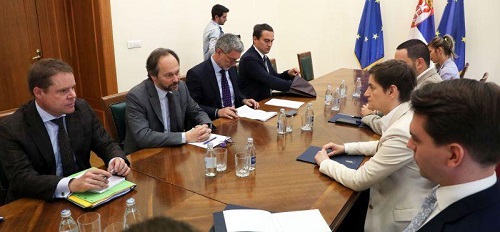
Prime Minister Ana Brnabic talked today with Head of the EU Delegation to Serbia Ambassador Emanuele Giaufret about further progress of our country's accession negotiations, Serbia's energy security and gas diversification, as well as last week's visit of European Council President Charles Michel to Serbia.
Prime Minister Ana Brnabic pointed out that with the successfully implemented judicial reform, Serbia has shown a clear commitment to European integration and judicial reform in accordance with European Union standards, and that consultations with the Venice Commission are expected to continue regarding the activities on a set of judicial laws.
Ambassador Giaufret stressed the importance of continuing successful constitutional reforms in a timely manner to make the judiciary more independent.
When it comes to the continuation of reforms in the media sphere, it was pointed out that the most important is the further implementation of the Action Plan for the Media Strategy, in order to further improve the safety of journalists and media freedom.
The officials emphasised that financing projects from pre-accession funds should continue; these projects include those focused on the Green Agenda, environmental protection and infrastructure projects and projects aimed at further public administration reform and support for EU membership negotiations.
Also, it was pointed out at the meeting that additional engagement is necessary to increase Serbia's energy security, especially when it comes to the gas sector and the possibility of diversification of both routes and suppliers.
Ambassador Giaufret explained that "as a consequence of Russia's aggression against Ukraine, which puts Europe's security at risk, as well as food and energy security, it is extremely important that Serbia and the EU strengthen cooperation in key sectors where we can achieve greater results together."
Serbia and the EU can work together to increase Serbia's energy independence, secure and reliable energy supplies and increase the use of renewable energy sources, Giaufret said.
Strong financial support is the foundation of this co-operation, especially the European Union's Economic and Investment Plan for the Western Balkans, which could generate €30 billion in investments in the Western Balkans, for example for the reconstruction of gas interconnectors.
The Head of the European Union Delegation praised Serbia for successfully managing the migrant crisis when it comes to the latest wave of refugees from Ukraine, thus once again showing solidarity and humanity.
He also reaffirmed the EU's readiness to continue supporting Serbia's migration management system especially with regard to the consequences on the country’s health system.
Belgrade, 23 May 2022
|
|
|
| Selaković: Serbia is standing firm on the position of respecting international law |
|
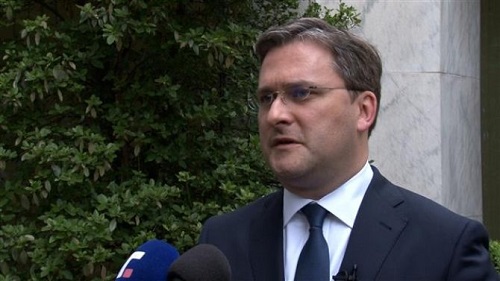
Today at the EU Foreign Affairs Council meeting in Brussels, attended by foreign ministers from the Western Balkans, Serbian Foreign Minister Nikola Selaković said that Serbia was consistently advocating the use of peaceful diplomatic means in resolving disputes and conflicts.
“We stand on this position, just as we stand firm on the position to respect one of the key principles of public international law and international relations, which is territorial integrity and political independence of internationally recognised UN member states, which Ukraine is”, Minister Selaković said after the meeting. He added that Serbia’s message and position had been very clear from the first days of the Russia―Ukraine conflict, and that any kind of armed solution to certain problems was not supported. “We have established and consolidated our position by voting in relevant international organisations, primarily at the UN General Assembly, and our credibility to act and speak from those positions is undisputed,” he argued.
Minister Selaković also drew attention to the energy situation in Serbia and its gas and oil supply, and pointed out that Serbia’s position was much different compared to all other countries represented at the EU Foreign Affairs Council meeting.
Minister Selaković said that foreign ministers of the Western Balkans had the opportunity to present their positions on the Russia―Ukraine conflict at the meeting, and that some EU member states, such as Poland and the Baltic republics, had made it clear that Serbia was expected to harmonise with the common foreign and security policy of the EU, and impose sanctions on the Russian Federation. “The topic of that meeting was less about the Western Balkans, and more about the attitude towards the crisis in Eastern Europe and the conflict between Ukraine and Russia. Each of us from the Western Balkans had the opportunity to state our positions, and to hear the attitude of EU members towards our views,” he said.
Minister Selaković emphasised that Serbia had received clear and unequivocal support from Hungary at the meeting, and conveyed that Hungarian Minister of Foreign Affairs and Foreign Trade Péter Szijjártó had said that Serbia should not be expected to make such a difficult decision until the EU offered Serbia something that would be “at least equal to the damage that Serbia would suffer by resorting to such a decision”.
“What should be offered to Serbia immediately is full EU membership”, said Minister Selaković. He added that Serbia’s EU membership was long overdue, referring to the views expressed by his Hungarian colleague.
Minister Selaković specified that Minister Szijjártó was a proven and good friend, and that he had sent a very clear and unambiguous message in which he drew a parallel between Serbia and Hungary, with the difference being that Hungary was a member of the EU. On behalf of the Government of Serbia and the Ministry of Foreign Affairs, Minister Selaković thanked Minister Szijjártó and the Government of Viktor Orbán for the constant, principled, clear, and very strong support to Serbia on its EU path.
Извор: www.mfa.gov.rs
16. May 2022.
|
|
|
| Selaković talked to Olivér Várhelyi |
|
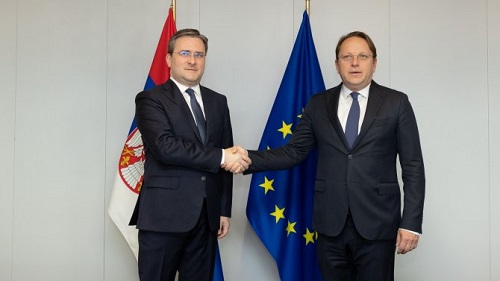
Today in Brussels, Minister of Foreign Affairs of Serbia Nikola Selaković met with the EU Commissioner for Neighbourhood Policy and Enlargement Negotiations Olivér Várhelyi.
Minister Selaković said that Serbia's membership in the European Union was a strategic commitment and priority of Serbia’s foreign policy, emphasising that it was important to give encouragement to the region on its European path.
The two officials also discussed the situation in Ukraine and the region, as well as the dialogue between Belgrade and Priština.
Minister Selaković underlined that Belgrade was fully committed to the dialogue with Priština, adding that the other side's commitment to that process was questionable, especially considering Priština’s request for membership in the Council of Europe, which did not contribute to the normalisation process.
Minister Selaković stressed that preserving stability in the region and orientation towards intensive cooperation was Serbia’s key interest.
Izvor/Foto: www.mfa.gov.rs
16. May 2022. |
|
|
| EU most important political, trade partner of Serbia |
|
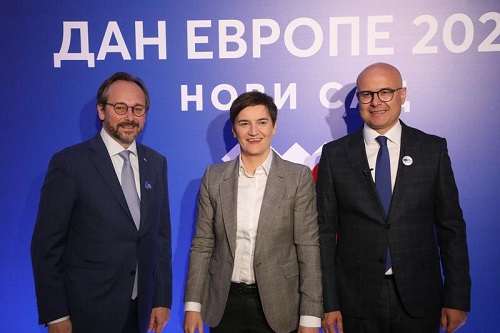
Prime Minister Ana Brnabic stated tonight at a reception on the occasion of Europe Day in Novi Sad that the European continent has always been the engine of world science, culture and art, education and philosophy, but unfortunately of conflicts and wars too.
Speaking at Novi Sad City Hall, Brnabic pointed out that that is why 9 May also represents the creation of foundations of the European Union, a project that is first and foremost a peace project, and only then an economic and political project, which provided a decade of welfare and prosperity.
Serbia is a state that is defined by Article 1 of its Constitution as belonging to European principles and values. Today, the European path is more important than ever and represents a guarantor of peace and stability and progress for all our citizens, said Brnabic.
The Prime Minister noted that Serbia and the Balkans are not the European periphery, as some like to say, or the soft belly of the European Union or the European lobby.
The fact that we are today in Novi Sad - the European Capital of Culture, a city that until recently was the Youth Capital of Europe, a city that is home to the European centre of excellence Biosens Institute, is just one of many indicators that Serbia is not a periphery, but for centuries an inseparable part of the European community in terms of politics, economy, values and socially, the Prime Minister pointed out.
She stated that the EU is the most important political and trade partner of Serbia.
Europe is our past, Europe is our present, Europe is our future. We belong to the same family, we share the same values and we have a common future ahead of us. I wish a happy Europe Day to all our citizens and the citizens of the European Union, Brnabic concluded.
The reception on the occasion of Europe Day was organised by Head of the EU Delegation to Serbia Emanuele Giaufret and Novi Sad Mayor Milos Vucevic.
www.srbija.gov.rs
9 May 2022
|
|
|
| Selaković: Serbia is actively involved in combating terrorism, radicalism and extremism |
|
Today, in Marrakesh, Minister of Foreign Affairs of Serbia Nikola Selaković participated in the Ministerial Meeting of the Global Coalition to Defeat ISIS. Minister Selaković said that Serbia was committed to the multilateral aspect of the fight against terrorism, adding that he firmly believed the United Nations should be the key forum for international cooperation in this field.
Minister Selaković stated that Serbia was fulfilling all international obligations pertaining to the implementation of UN Security Council resolutions, especially those related to the introduction of arms embargoes, including bans aimed at non-state actors, terrorist organisations and related individuals. He emphasised that Serbia was a signatory to 15 international conventions against terrorism. “By participating in multinational UN and EU peacekeeping missions, Serbia is making a concrete contribution to preserving regional and global security,” Minister Selaković said, paying tribute to a member of the Serbian Army, Lieutenant Colonel Dejan Stanojević and his colleagues, who tragically lost their lives on March 29 in the United Nations Mission in the Democratic Republic of the Congo.
“Serbia does not diminish the importance of other international forums, which is why it joined the Global Coalition from the very beginning, and selflessly contributes to international efforts to fight ISIS, primarily through various forms of donations in military equipment, ammunition, and training in Iraqi security forces”, Minister Selaković said. He added that as a candidate country for membership in the European Union, Serbia gave its full contribution through active participation in European policies on the fight against terrorism, and had developed a strategic cooperation with EUROPOL.
Minister Selaković noted that Serbian criminal legislation provided instruments to prevent and punish the encouragement, organisation, and participation of its citizens in wars or conflicts in foreign countries. He explained that the Serbian judicial authorities had completed proceedings against 7 persons engaged in foreign battlefields, and that several investigations against persons connected with terrorist activities were underway.
Minister Selaković said that the fight against terrorism, radicalism and extremism was a priority, and that Serbia was actively involved in combating these challenges and threats at the domestic, regional, and international level.
11. May 2022. |
|
|
| Serbia’s goal to enter EU as soon as possible |
|
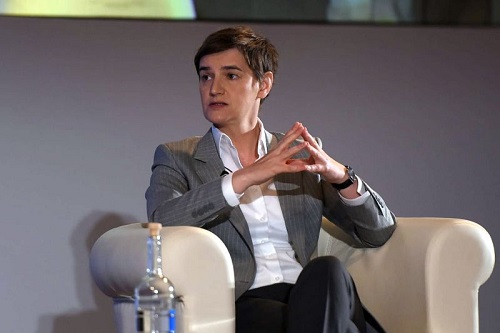
Prime Minister Ana Brnabic stated in Florence today, at the State of the Union conference, that the strategic goal and priority of our country is membership in the European Union (EU) and that the same goes for the entire region of the Western Balkans.
Speaking at the panel “Crisis and Change – European Perspective of the Western Balkans”, which was attended by EU Special Representative for the Belgrade-Pristina Dialogue Miroslav Lajcak and Austrian Foreign Minister Alexander Schallenberg, Brnabic underlined that the sooner we enter the EU, the better.
She voiced her hope that the war in Eastern Europe, in Ukraine, will bring the enlargement process back into focus, and that EU Member States who opposed it will change their minds and realise that it is a priority for all.
She noted that the entry of the Western Balkans into the EU is not even enlargement, but "inclusion", given that this region is surrounded by EU Member States.
It would be a big mistake and it would not be fair if the EU neglected the Western Balkans and opened the door to someone else, regardless of the political situation, she assessed.
According to Brnabic, if you look at Serbia, the average wage, its public debt, fiscal stability, unemployment rate and infrastructure, you will see that according to all these parameters Serbia is ready for membership.
The European Union is a peace project and we want to be part of it, the Prime Minister reiterated and pointed out that the EU cannot constantly postpone some decisions, citing the example of North Macedonia, which changed its name and has not yet opened negotiations.
The Prime Minister added that Belgrade has nothing against visa liberalisation for Pristina, because open issues will perhaps be resolved more easily, given that dialogue is not going in the right direction now and the real question is whether we have dialogue at all.
She said that besides European integration, another key thing for Serbia is regional stability and cooperation. Illustrating the importance of cooperation with the EU and the region, she stated that 65 percent of Serbia's exports go to the EU market and 17 percent to the region.
According to her, that is 82 percent of everything that Serbia exports, and it speaks of how important the Union is to us, and how important the region is to us.
Brnabic also pointed to the importance of the "Open Balkans" regional initiative, which consists of Serbia, Albania and North Macedonia and added that others from the region are invited to join in.
Addressing the press after the meeting in Florence, the Prime Minister said that she also talked with High Representative of the European Union for Foreign Affairs and Security Policy Josep Borrell about the dialogue between Belgrade and Pristina, enlargement of the European Union and the situation in Ukraine.
We talked about the dialogue between Belgrade and Pristina, we don't have very good news there, but we are doing our best and we always send the same message - that peace and stability are the most important for us, she said.
Brnabic stated that regional peace, stability, connecting and cooperation are what will give everyone space for further economic growth and development in the current extremely difficult times, especially for the European continent.
The Prime Minister also talked in Florence with the President of the European University Institute, which organised the State of the Union conference, about Serbia's joining the institute.
Belgrade/Florence, 6 May 2022
|
|
|
| Foreign Minister Selaković meeting with the Head of the EU Delegation and the Ambassadors of the EU Member States |
|
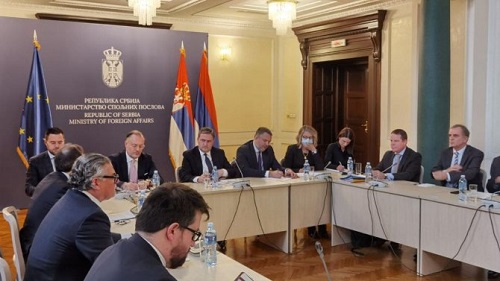
The Minister of Foreign Affairs Nikola Selaković met today with the Head of the EU Delegation Emanuel Giofre and the Ambassadors of the EU Member States accredited to Serbia.
Minister Selaković informed the ambassadors present about the Conclusion of the National Security Council, which was adopted by the Government of Serbia on February 27 - regarding the situation in Ukraine.
The Serbian Foreign Minister said that Serbia deems the outbreak of the crisis and conflict in Ukraine deeply regretful, emphasizing that Serbia considers it very wrong to violate the territorial integrity and sovereignty of any state, as in the case of Ukraine. In this regard, Foreign Minister Selaković reiterated that Serbia very clearly insists on the respect for the principles of international law, pointing out that this is the foundation of the Serbian foreign policy.
FM Selaković underscored that Serbia gives fully supports the negotiations between the two sides and all credible international efforts to find a peaceful and political solution to the crisis in Ukraine.
Mr. Selaković pointed out that Serbia will continue to consistently maintain peace and stability in Southeast Europe in these challenging times, emphasizing that modern challenges also show that all disagreements on our continent must be resolved by peaceful means and dialogue.
02. Mar 2022.
|
|
|
| Statehood Day of the Republic of Serbia- February 15 |
|
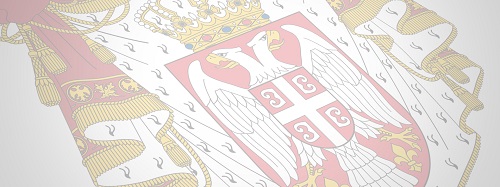
A video can be viewed here. |
|
|
| Belgrade to get Centre for Fourth Industrial Revolution |
|
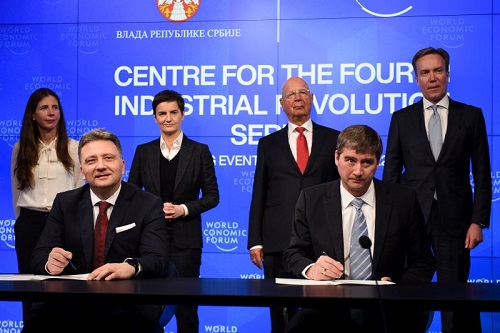
Prime Minister Ana Brnabic attended today in Geneva the signing of the Agreement on the Establishment of the World Economic Forum Centre for the Fourth Industrial Revolution in Serbia, the first of its kind in the Western Balkans.
The agreement was signed at the headquarters of that forum by Director of the Office for Information Technologies and eGovernment Mihailo Jovanovic and Managing Director and Head of the Forum's Centre for the Fourth Industrial Revolution Jeremy Jurgens.
The centre in Serbia will be the 16th in the network of centres of the World Economic Forum in the world and the first in the region of the Western Balkans.
The new centre will start operating on 1 March and will function as a non-profit organisation and a platform for public-private partnership and cooperation for the Fourth Industrial Revolution, while the focus of work will be on artificial intelligence and bioengineering.
This centre will work within the Serbian government’s Office for Information Technologies and eGovernment and will cooperate with scientific institutes, state institutions and the private sector.
The signing of this document was also attended by founder and Executive Director of the World Economic Forum Klaus Schwab and President of the World Economic Forum Borge Brende, with whom Brnabic had previously met.
Addressing the press, Brnabic pointed out that this agreement is the result of many years of joint work between Serbia and the World Economic Forum.
We started talking in 2018, signed a Memorandum of Understanding, then 2020 hampered us a bit, but we continued to plan in 2021 and here we are today, she said.
According to her, the centre will be focused on the development of artificial intelligence, biomedicine and biotechnology, and on the ways in which digitalisation can raise the productivity of companies and the entire economy.
This is what further leads to higher salaries, a better standard of living, as well as to an economy that is mainly based on knowledge, creativity and innovation, Brnabic emphasised.
Today, we have received great recognition for everything that Serbia has done in the field of digitalisation, development of high technologies and paradigm shift – from an economy that was based on labour-intensive investments to digital development.
That is why this agreement shows that Serbia has been recognised as one of the leaders in the economy and IT industry in the last six years, the Prime Minister pointed out and assessed that this is the announcement of the beginning of an even closer cooperation between Serbia and WEF.
She added that they will have a joint meeting with the 16 WEF centres for the fourth industrial revolution in the world every month, at which they will talk about what each of them is doing, since each has a different focus.
That is how we will hear what everyone is doing every month, learn from each other and I am sure that the centre in Belgrade will be one of the best, the Prime Minister said.
According to her, this gives us visibility, the opportunity to further establish Serbia as an investment destination, a country good for living and investing in new technologies and knowledge.
Jovanovic said that the ecosystem formed around the centre will use the infrastructure of the National Platform for the Development of Artificial Intelligence, the Centre for Genome Sequencing and the future bioeconomic centre – BIO4
Campus.
Izvor/Foto: Tanjug
7 February 2022 |
|
|
| Serbia expects full implementation of Brussels Agreement |
|
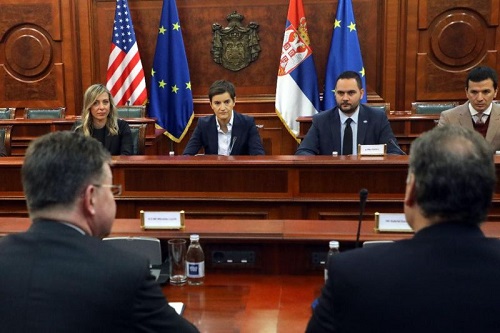
Prime Minister Ana Brnabic met today with EU Special Representative for the Belgrade-Pristina Dialogue and other Western Balkan regional issues Miroslav Lajcak and US Deputy Assistant Secretary of State for European Affairs and US State Department's Envoy for the Western Balkans Gabriel Escobar.
Brnabic expressed her gratitude to Lajcak and Escobar for their personal engagement, as well as for all the efforts they are investing in the progress of the dialogue between Belgrade and Pristina.
She pointed out that the Republic of Serbia expects the formation of the Association of Serbian Municipalities (ASM), as well as the full implementation of the Brussels Agreement.
Lajcak said that the European Union is making great efforts so that the dialogue between Belgrade and Pristina could continue and called on Belgrade to remain committed to that process, because it is important for the stability of the entire region.
Escobar pointed out that the United States is closely monitoring this process and strongly supports it.
He believes that the two sides can resolve all open issues through dialogue only, and that there is no alternative.
The Prime Minister expressed her dissatisfaction with the fact that Serbs from Kosovo and Metohija were not permitted to vote in the 16 January referendum.
She called on Lajcak and Escobar to do everything in their power to enable Serbs living in Kosovo and Metohija to vote in the elections scheduled for 3 April this year.
3 February 2022
|
|
|
| Selaković with Escobar and Lajčák on regional issues and dialogue between Belgrade and Priština |
|
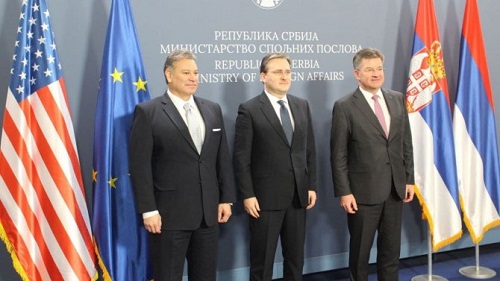
Serbian Minister of Foreign Affairs Nikola Selaković had a trilateral meeting today with US Deputy Assistant Secretary of State and Special Envoy for the Western Balkans Gabriel Escobar and EU Special Representative for Belgrade-Priština Dialogue and other regional issues in the Western Balkans Miroslav Lajčák.
Foreign Minister Selaković noted on the occasion, that Serbia is firmly on the path to European integration, that it is fully committed to the reform process and the improvement of all the segments of our society, and that he hopes that such a commitment will be valorized by the opening of new negotiation clusters.
Mr. Selaković also underscored our true commitment to regional cooperation, preservation of stability and diplomatic resolution of open issues, and pointed out that peace and stability are the topmost interest of Serbia and a precondition for the continued progress of the country.
The interlocutors discussed a number of regional issues, and Foreign Minister Selaković pointed out that Serbia is consistent in its tradition of non-involvement in the internal affairs of neighboring countries and is firm in the position that all disagreements need to be resolved through democratic political dialogue.
As for the dialogue between Belgrade and Priština, Mr. Selaković told his interlocutors that we are prepared to continue the dialogue and open to reaching a compromise agreement that will be mutually acceptable.
Mr. Selaković also pointed out that Belgrade has met nearly all its obligations stemming from the dialogue, whilst Priština, even though the Brussels Agreement was signed about nine years ago, hasn't implemented its principal part, namely the formation of the Community of Serbian Municipalities.
Foreign Minister Selaković thanked his interlocutors for their personal engagement in that process, but also warned of the danger of Priština's constant efforts to rely on unilateral moves to render the dialogue meaningless and destabilize the region.
Referring to the issue of organizing the upcoming Serbian elections within Kosovo and Metohija, Mr. Selaković stressed the importance of solving the issue as a matter of priority, reminding that in the past two decades all the elections organized by Belgrade had been also implemented in our southern province with OSCE assistance.
03. feb 2022 |
|
|
| Prime Minister talks with mediators in inter-party dialogue |
|

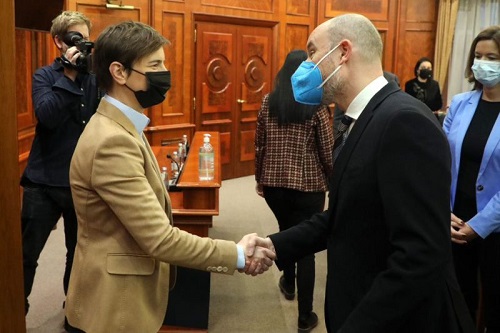
Prime Minister Ana Brnabic talked today with the mediators of the European Parliament in the inter-party dialogue – MEPs Tanja Fajon, Vladimir Bilcik and former MEPs Knut Fleckenstein and Eduard Kukan about the recent referendum on constitutional changes and listened to their suggestions regarding the elections to be held in Serbia in early April.
The officials congratulated Prime Minister Brnabic on her successful visit to Brussels, as well as on the fruitful cooperation during the inter-party dialogue.
Their common assessment is that the April elections are very important for the further development of democracy in Serbia and that in that sense it is important to implement the agreement, but they are also ready to do so if there is still space and need for their help, given that their expertise is available to the government of Serbia.
Improving the pre-election atmosphere is equally important, along with the effort to reach concrete results in a timely manner, they assessed.
Among other things, the officials discussed the manner of representing the parties during the election campaign in public service programmes and the training of observers who will be at the polling stations.
Prime Minister Brnabic told the MEPs that their mission was successful, which is confirmed by the fact that no party will boycott the elections, and that the referendum results show that Serbia is determined to continue reforms, in line with its strategic choice to join the European Union.
Brnabic concluded that the independence of the judiciary is one of the pillars of democracy.
28,1. 2022.
|
|
|
| Meeting with co-facilitators of the European Parliament in the Inter-Party Dialogue |
|
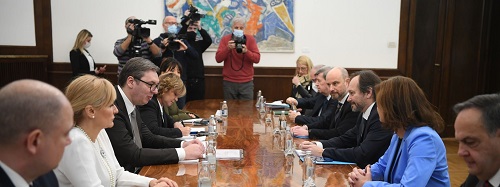
President of the Republic of Serbia Aleksandar Vučić met today with the co-facilitators of the European Parliament in the Inter-Party Dialogue, MEPs Tanja Fajon, Vladimir Vladimír Bilčík, and former MEPs Knut Fleckenstein and Eduard Kukan, to discuss proposals and suggestions to further improve the conditions for the upcoming elections in Serbia. The President also raised the issue of difficulties Serbs from Kosovo and Metohija face in exercising their voting rights.
The co-facilitators of the European Parliament referred to the result of the recent referendum and welcomed the completion of this important step in the Constitutional reform with a view to strengthening the independence of the judiciary, in line with Serbia’s strategic choice to accede to the European Union. Work on the independence of the judiciary must continue. The judiciary's independence remains one of the strongest pillars of any modern democracy.
The co-facilitators assessed the conversation with the opposition representatives as constructive and informed the President about certain suggestions related to the election administration, but also about proposed changes to the Law on the Election of Deputies, as well as the ongoing work of the Temporary Supervisory Body for Media Monitoring.
The President pointed out that from the beginning he showed readiness and willingness to listen to all reasoned proposals and that much has already been done to improve election conditions to adequately create an atmosphere of trust and responsibility of all participants in the most serious democratic process in the country, i.e. the elections.
In that sense, the President particularly pointed out the numerous and constant obstructions by which, contrary to all democratic standards and European values, the authorities in Priština keep trying to deprive Serbs of Kosovo and Metohija of exercising their right to vote in the April elections.
The European Parliament’s co-facilitators emphasised the importance of free, fair and transparent election process. They would continue to give their full contribution within the framework of their competencies and expertise in order to improve the general pre-election atmosphere in Serbia, with an effort to achieve concrete results in a timely manner.
28.01.2022.
|
|
|
| Belgrade, Brussels committed to Serbia's EU perspective |
|
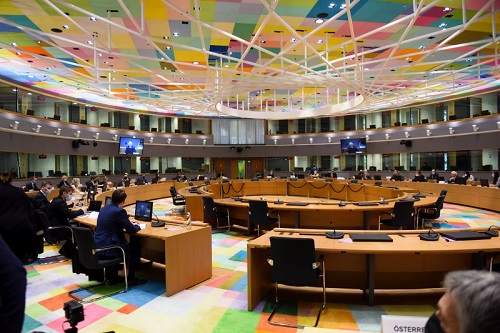
At the sixth EU-Serbia Stabilisation and Association Council (SA Council), Serbia's EU perspective was reaffirmed, the country's progress in the reform process was praised and priorities for work under the Stabilization and Association Agreement were set.
Prime Minister Ana Brnabic, Minister for European Integration Jadranka Joksimovic represented the Serbian side, High Representative for Foreign Affairs and Security Policy Josep Borrell Fontelles led the EU delegation while Commissioner for Neighbourhood and Enlargement Oliver Varhelyi represented the European Commission.
Participants reviewed Serbia’s progress in its accession negotiations and considered priorities for further work within the framework of the Stabilisation and Association Agreement.
Participants reiterated their commitment to the European perspective of Serbia. They welcomed the holding of the thirteenth inter-governmental conference with Serbia on 14 December 2021 and the opening of negotiations under cluster 4 on the green agenda and sustainable connectivity. They also welcomed Serbia’s ambition to open new accession clusters, on the basis of continuing progress in the implementation of the reforms.
Participants recalled that, in accordance with the enhanced enlargement methodology, Serbia should focus on the fundamental reforms. Progress on the rule of law and fundamental rights chapters, as well as on the normalisation of Serbia’s relations with Kosovo*, as set out in the Negotiating Framework, continues to be essential and will determine the pace of accession negotiations overall.
Noting recent progress on the rule of law, participants agreed on the need for Serbia to continue and deepen reforms in this area, in particular in the key areas of judiciary, fight against corruption and organised crime, media freedom and domestic handling of war crimes. They also agreed on the importance of proper functioning of democratic institutions and of strengthening the overall confidence in electoral processes as essential for democracy and rule of law.
Participants noted the preliminary results of the referendum on the constitutional amendments and welcomed the completion of this important step in the constitutional reform with a view to strengthening the independence of the judiciary. They looked forward to the revision of a number of implementing laws, which is an integral part of the reform, being prepared in line with the provisions of the Constitutional Law and in line with the Venice Commission opinions and European standards.
Participants agreed on the need for Serbia to engage constructively in the EU-facilitated Belgrade-Pristina Dialogue in good faith and in the spirit of compromise to achieve a comprehensive legally binding agreement in accordance with international law and EU acquis. This agreement should address key outstanding issues, contribute to regional stability, and is crucial for both Parties to advance on their respective European paths. Participants reiterated their strong expectation that all past agreements are fully respected and implemented.
Participants welcomed Serbia’s active participation and significant contribution to Common Security and Defence Policy military missions and operations and Serbia’s preparations to contribute to civilian missions. They also welcomed Serbia’s participation in the roster of the EU Battle Groups.Participants acknowledged that Serbia’s alignment rate with relevant High Representative declarations on behalf of the EU and Council decisions has increased in 2021. Participants agreed on the need for Serbia to further step up its efforts in progressively aligning with the EU Common Foreign and Security Policy and to continue to improve its current record in a sustainable and tangible way.
Participants underlined the need for meaningful regional cooperation and good neighbourly relations as essential elements of the enlargement process, including in the handling of war crimes. They agreed that further efforts are needed to overcome legacies of the past and to constructively foster mutual trust, dialogue and tolerance in the region, avoiding actions and statements that go against this goal.
Participants agreed on the importance of the Green Agenda for the Western Balkans and looked forward to Serbia developing an ambitious national energy and climate plan. The EU stands ready to provide support thereof.
Participants supported the Common Regional Market that was launched by the leaders of the Western Balkans at the Sofia Summit in November 2020 and recalled that fully inclusive regional cooperation, as identified in the Common Regional Market action plan, will remain crucial for taking full advantage of the potential of the region and of the Economic and Investment Plan for the Western Balkans.
During the visit, the Prime Minister also met with European Commissioner for Justice Didier Reynders as well as with President of the Committee on Foreign Affairs of the European Parliament David McAllister. She also met with Vice President of the European Commission Frans Timermans.
www.srbija.gov.rs/Tanjug
25 January 2022
|
|
|
| Big step made in continuation of Serbia's European integration |
|
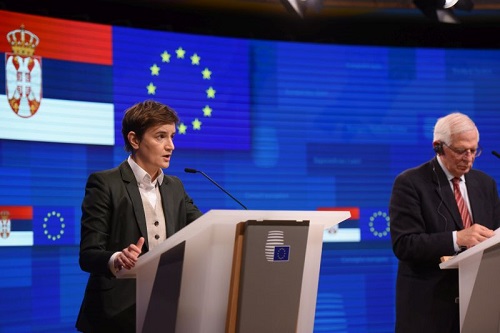
Prime Minister Ana Brnabic stated today in Brussels, after the meeting of the EU-Serbia Stabilisation and Association Council, that the success of the referendum on constitutional changes in the judiciary is a big step forward European integration of our country.
At a joint press conference with EU High Representative for Foreign Affairs and Security Policy and Vice President of the European Commission Josep Borrell and Commissioner for Neighbourhood Policy and Enlargement Negotiations Oliver Varhely, Brnabic said that Serbia will continue with reforms in four most important areas – the rule of law, public administration, the economy and the Green Agenda.
She pointed out that the majority of citizens voted positively in the referendum on constitutional changes in the field of justice on 16 January, explaining that the citizens voted for a greater rule of law, an independent judiciary and an independent prosecutor's office.
The Prime Minister said that work on reforms in the field of rule of law will continue without a break, with all partners, in order to form a Working Group without delay and start work on a set of laws in the field of justice.
The Prime Minister announced that reforms in the field of public administration will continue, which will strengthen the market economy and the economy in general.
Also, as she emphasised, the reforms related to the Green Agenda, the improvement of environmental protection and the transition to a green, sustainable and circular economy will be continued.
According to her, the growth of the GDP of Serbia in 2021 amounted to 7.5 percent, which is one of the best in the whole of Europe, and the average salary in December last year was higher than 600 euros.
Brnabic stated that foreign direct investments in 2021 amounted to 3.9 billion euros, which shows that Serbia is a stable destination for investments, noting that more than 60 percent of those investments are from EU member states.
It seems to me that we have never gone to the European Union in such a positive way before, said the Prime Minister, pointing out the importance of regional cooperation, because everything that has been achieved since 2014 so far can be disrupted. if there is no peace and stability in the region.
According to her, regional cooperation, better connections and understanding in the region are key to the further process of European integration.
A large part of the talks referred to regional connections, cooperation and relations in the region, and what Serbia is doing and can do to make the region even more stable and secure and to progress even faster towards the EU, Brnabic said.
25 January 2022
|
|
|
| Serbian citizens understood importance of changes leading to more independent judiciary |
|
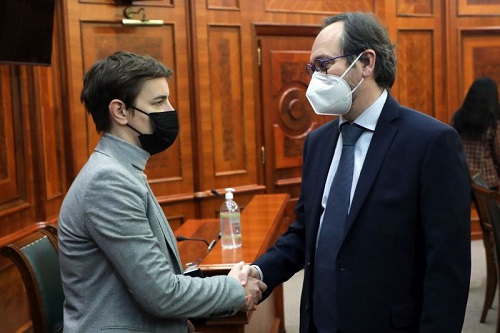
Prime Minister Ana Brnabic spoke today with Head of the EU Delegation to Serbia Emanuel Giaufret.
Brnabic underlined that she is satisfied with the results of the referendum on the change of the Constitution of the Republic of Serbia in the field of judiciary and the fact that the citizens of Serbia understood the importance of changes that lead to a more independent and efficient judiciary and which represent the most important step towards further reforms in the field of the rule of law.
The Prime Minister noted that the support from the most relevant professional associations, first and foremost the Judges' Association of Serbia and the Association of Prosecutors, is very important.
Head of the EU Delegation to Serbia Emanuel Giaufret welcomed the completion of this important step in the reform of the Constitution, which is in line with Serbia's strategic choice of joining the EU.
He underlined that the reform process aimed at strengthening independence of the judiciary should be continued, especially through changes to laws for an effective implementation of Constitutional amendments, in line with European standards, with the engagement of the Venice Commission.
Constitutional reforms and the recent opening of Cluster 4 in the accession negotiations with the EU which deals with the Green Agenda and Sustainable Connectivity are very positive steps for Serbia on its path to the EU, Giaufret said.
During the meeting, Prime Minister Brnabic voiced her protest over Pristina's move regarding the holding of the referendum in the territory of Kosovo and Metohija and its decision to deny Serbs in Kosovo and Metohija one of their basic human rights - the right to vote.
Brnabic and Giaufret also discussed her upcoming visit to Brussels on 25 January, where she will attend a session of the Council for Stabilisation and Association.
The meeting was also attended by Minister of European Integration Jadranka Joksimovic.
www.srbija.gov.rs
19 January 2022 |
|
|
| Realisation of project “EU for Green Agenda in Serbia” begins |
|
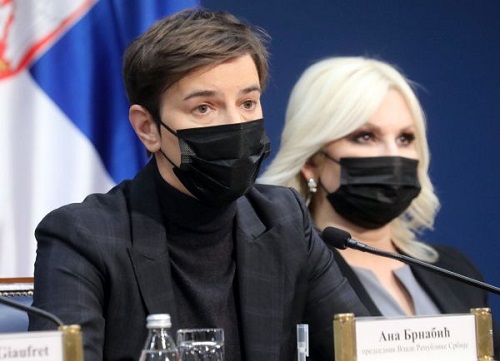
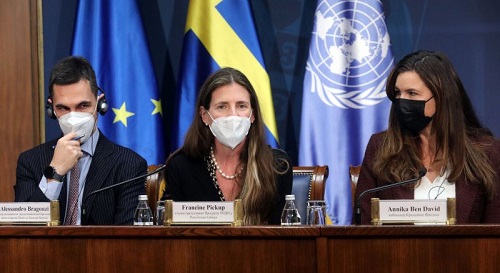
Prime Minister Ana Brnabic stated today that the project “EU for Green Agenda in Serbia” will raise the quality of life of citizens in our country by improving the quality of air, water and land.
Speaking at an event marking the beginning of the project, Brnabic expressed gratitude to the European Union, Sweden and the UNDP on their partnership and financial support with €8 million for the implementation of the project. She voiced hope that more partners will join the project so that it could expand.
The Prime Minister explained that the project will last until 2024 and it will be focused on improving the environment and green transition.
She recalled that two key priorities of the Serbian government are the rule of law and the green agenda, which is the protection and improvement of the environment, and that the EU is the main partner of our country in these areas.
When it comes to environmental protection, there are three main points – air quality protection, solid waste management and protection of watercourses, i.e., construction of sewage networks and wastewater treatment plants.
We have done a lot in all three of these areas and on improving the legal framework, she underlined and added that the Law on climate change has been adopted, as well as the laws amending the Law on nature protection and the Law on energy.
Brnabic pointed out that this is the first time that we have the Law on renewable energy sources and added that a draft programme of air protection from 2022 to 2030 has been completed and that it is currently in the process of adoption.
We have the same goals as the EU in this field and I expect the project to be efficiently implemented and that we will work together on the better quality of life of citizens by improving the quality of air, water and land in Serbia, the Prime Minister concluded.
18.1.2022. |
|
|
| Brnabic sends condolences on death of EP president |
|
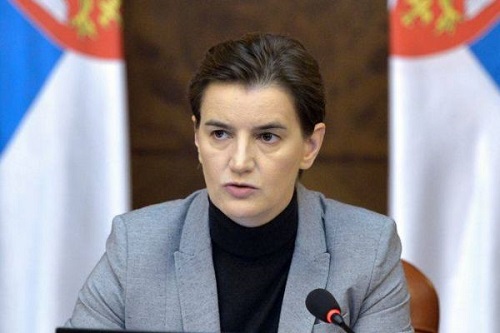
Prime Minister Ana Brnabic sent a telegram of condolences to the members of the European Parliament and the family on the occasion of the death of the President of the European Parliament David Sassoli.
"On behalf of the government of the Republic of Serbia and on my own behalf, I extend my sincere condolences and sympathy to the members of the European Parliament and the family of David Sassoli.
David Sassoli will be remembered as a sincere friend of the Republic of Serbia and a great supporter of the enlargement of the European Union.
The European Parliament, like all European countries, has lost an exceptional person who fought for the common values of European nations and the ideas of democracy, justice and solidarity on European soil throughout his working life," the telegram of condolences from Prime Minister Brnabic reads.
www.srbija.gov.rs
11.1.2022. |
|
|
| Serbia made great progress in field of rule of law |
|
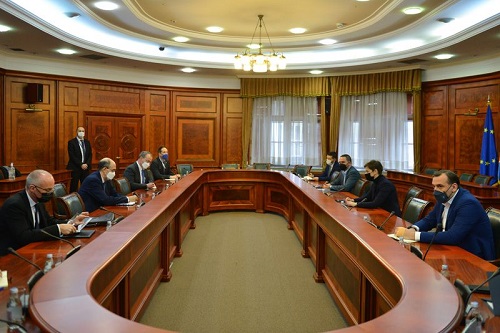
Prime Minister Ana Brnabic talked today with the ambassadors of France, Italy, Germany and the USA and the charge d'affaires of the United Kingdom and the European Union Delegation to Serbia about the upcoming referendum on changing the Constitution, scheduled for 16 January.
The Prime Minister stated that Serbia has made great strides in the field of the rule of law and that the change of the Constitution is the most important reform in that area.
Representatives of the Quint countries stressed the importance of the rule of law and called for further progress in judicial reform.
In that context, they stated that the judicial reforms proposed in the referendum represent important steps in strengthening the independence of the judiciary and improving the rule of law in Serbia.
That is also important in the context of Serbia’s obligations in the process of EU accession, it was concluded at the meeting.
Brnabic expressed disapproval of the position of interim institutions in Pristina not to allow the holding of the referendum in the territory of Kosovo and Metohija.
6.1.2022. |
|
|
| Opening of cluster 4 important turning point for Serbia |
|
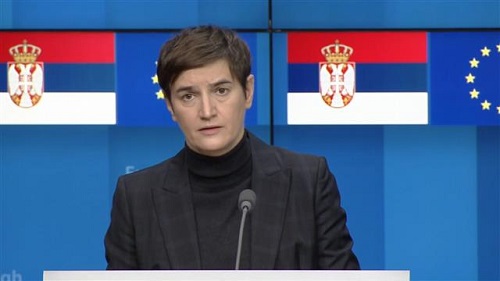
Prime Minister Ana Brnabic stated in Brussels today after the Intergovernmental conference on the accession of the Republic of Serbia to the European Union (EU) that today is a very important date and a turning point for Serbia.
Brnabic said that in line with the new methodology, Serbia has opened cluster 4 – Green Agenda and Sustainable Connectivity, and within cluster 4, four chapters have been opened.
The Prime Minister underlined that this is a great success on which she wants to congratulate all citizens of Serbia and she thanked President of Serbia Aleksandar Vucic on the support and understanding he showed.
An important segment of the new methodology is political management of integrations. What we have done in the mandate of the new government is that we manage, together with Minister of European Integration Jadranka Joksimovic, the integration process and all reforms, first and foremost in the field of the rule of law, politically in full, and that yielded results, the Prime Minister said.
She said that the opening of the chapters is a huge motivation for further reforms in the field of the rule of law, public administration and the economy.
I would like to thank all EU Member States, as well as the European Commission, for their support and understanding. They have shown that they are open, that they are ready to see, to listen, to reward everything we have done and therefore this is a great motivation to continue, not even in the same way we have worked so far, but to go faster and to work better, she noted.
Brnabic voiced hope that Serbia will open cluster 3 in 2022, which is ready, and that preparations for the opening of cluster 5 are on the agenda.
The Prime Minister underlined that environmental protection is gaining importance and that this topic is increasingly present and important in Serbia.
Regional stability, dialogue with Pristina and the economy also remain our priorities. I am satisfied, and we talked about that today, about economic results Serbia is achieving. I expect our growth this year to be 7.5 percent, the Prime Minister pointed out.
She said that the degree of harmonisation of Serbia with the foreign and security policy of the EU currently stands at 65.55 percent.
Brnabic also thanked Slovenia for the successful EU presidency, she thanked EU Member States on their support, as well as the European Commission, European Commissioner for Neighbourhood and Enlargement Oliver Varhelyi and European Commission President Ursula von der Leyen.
Source: www.srbija.gov.rs
Photo: Tanjug
14 December 2021 |
|
|
| Selaković spoke with Giaufret and EU ambassadors |
|
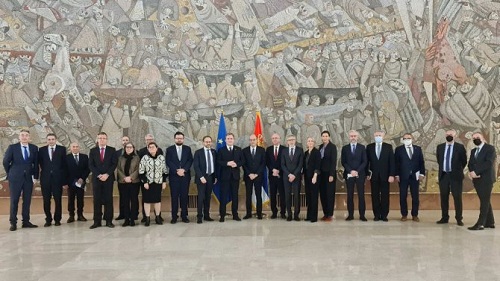
The Minister of Foreign Affairs of Serbia, Nikola Selaković, met with the Head of the Delegation of the European Union, Emanuele Giaufret, and the ambassadors of the EU member states accredited in our country.
Selaković emphasized that EU membership is an absolute priority of our foreign policy and strategic commitment, conveying that we are fully committed to the reform process and the improvement of all segments of our society.
He assessed that the dynamics of accession negotiations should be in line with our reform efforts, but that it is encouraging that this year's European Commission report on Serbia's progress has a more positive tone than the previous one, and that, in that sense, we expect that an Intergovernmental Conference will be held by the end of the Slovenian presidency of the EU Council, at which two clusters will be opened.
The Minister said that Serbia maintains an intensive dialogue with EU officials and added that we look very positively at the decision of the Foreign Affairs Council to consider a way to include partners from the Western Balkans in the discussion on foreign and security policy.
The head of Serbian diplomacy emphasized that the EU is Serbia's most important foreign trade partner, informing his interlocutors that the trade exchange between Serbia and the EU has increased by 52% in the last seven years, and the export of Serbian products to the EU increased by 64%, which is a joint result, as he assessed.
Selaković said that Serbia is fully committed to preserving peace and stability in the region through cooperation and open dialogue, emphasizing the "Open Balkans" initiative as a way to connect the region economically.
When it comes to the process of normalization of relations between Belgrade and Pristina, Minister Selaković said that our side is fully committed to dialogue, and that we have fulfilled our obligations, but that Pristina persistently avoids fulfilling its own, citing as an example that for eight and a half years nothing has been done regarding the establishment of the Association of Serbian municipalities. In addition, according to him, Pristina's unilateral moves on the ground, four in the last two months, further endanger peace and stability.
The Minister informed the heads of missions about the fight against the pandemic in Serbia, expressing readiness for further cooperation with partners from Europe and the world in the joint fight against the corona virus.
Ambassador Giaufret thanked the Minister of Foreign Affairs Selaković for the reception of the ambassador of the European Union in the Palace of Serbia. Ambassador Giaufret welcomed the current level of cooperation between the EU and Serbia in the field of common security and defense policy, as well as the important contribution of Serbia to EU missions and operations.
"We really hope that we will be able to further develop the harmonization of Serbia's foreign policy with the European Union", the ambassador said.
The EU Foreign Affairs Council had a strategic conversation on the Western Balkans on Monday, and a political dialogue on foreign and security policy was held in Belgrade two days ago, a couple of weeks after the publication of the Annual Report, Ambassador Giaufret pointed out.
"In the Foreign Affairs Council, there is broad support for the EU's strong engagement in the region and further joining the region in our foreign policy efforts. We had a good exchange of views on that today, and we will work on further integration of Serbia and the region at all levels", the ambassador concluded.
18. Nov 2021. |
|
|
| Selaković: Intensive dialogue with senior EU officials |
|
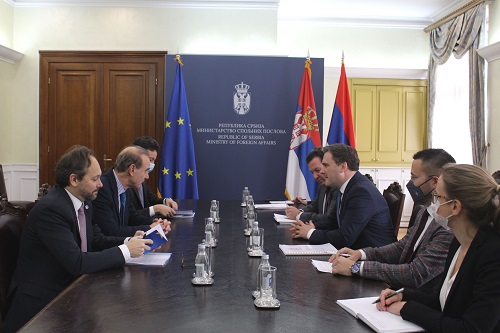
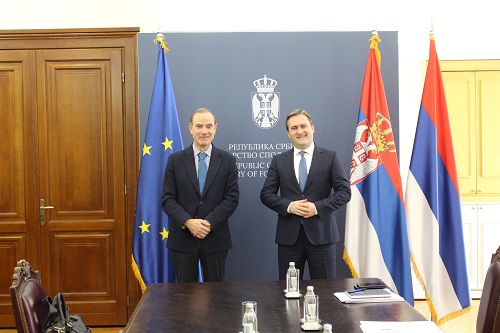
The Minister of Foreign Affairs of Serbia, Nikola Selaković, met with Enrique Mora, Deputy Secretary General for Political Affairs and Political Director of the European Union's European External Action Service (EEAS).
Selaković said that the intensive dialogue that Serbia is having with senior EU officials is of great importance, assessing very positively the bilateral political consultations of the Ministry of Foreign Affairs and the EEAS, which were held yesterday in Belgrade.
The Minister underlined that Serbia's membership in the EU is a priority of our foreign policy and strategic commitment, emphasizing that we are fully committed to the reform process and the improvement of all segments of our society, and that in the dynamics of the accession negotiations we expect the continuation of the valorization of our reform efforts.
Also, Selaković conveyed that we believe that the enlargement process should remain high on the EU agenda and parallel to the reform process of the Union itself.
The head of Serbian diplomacy pointed out that Serbia is committed to peace and stability and that regional cooperation is our foreign policy priority, especially mentioning the "Open Balkans" initiative, the point of which is the economic connection of the region.
The Deputy Secretary General Mora welcomed the current level of cooperation between the EU and Serbia in the field of common security and defense policy, as well as the important contribution of Serbia to EU missions and operations. He also stressed the need for Serbia to continue to promote progressive alignment with the policies and positions adopted by the EU in the area of common foreign and security policy, in line with the framework for EU accession negotiations.
17. Nov 2021. |
|
|
| Selaković: It is important that the enlargement process remains high on the EU agenda |
|
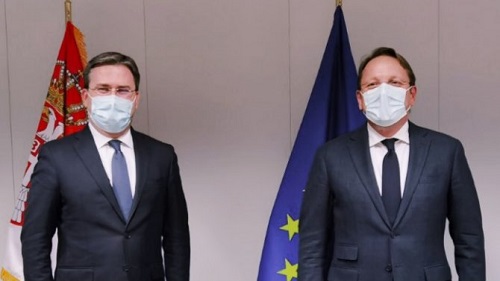
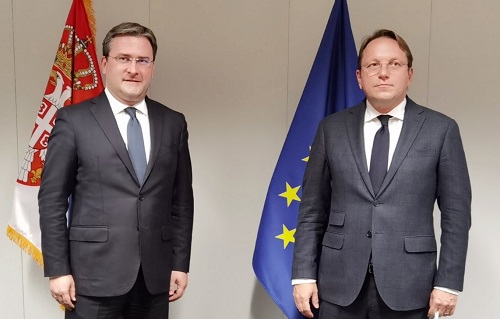
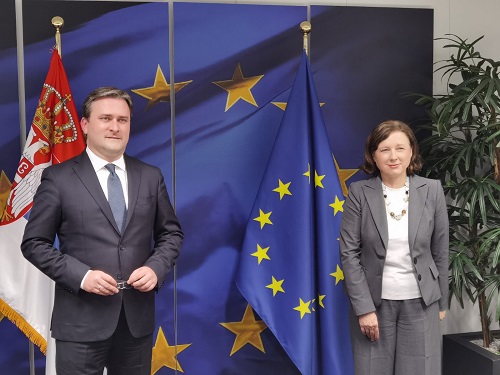
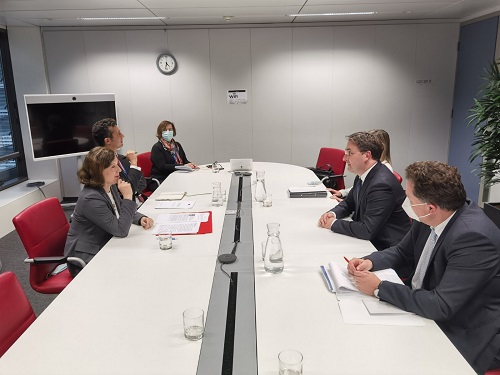
The Minister of Foreign Affairs of Serbia, Nikola Selaković, met in Brussels with the Commissioner for Neighbourhood Policy and Enlargement Negotiations, Olivér Várhelyi.
Selaković said that full membership in the EU is a strategic commitment of Serbia, emphasizing that we are maximally committed to structural reforms, but also that our results are not accompanied by the appropriate dynamics of accession negotiations.
The Minister assessed as very important that this year's report of the European Commission on the progress of Serbia is more positively intoned in comparison with the previous one, and added that we are encouraged by the recommendation for opening clusters 3 and 4.
Selaković conveyed that we are following with great attention every exchange of opinions regarding the EU reform and the efforts for its strengthening, but that we expect that the enlargement process will not be neglected, but parallel.
According to the minister, it is important that the region receives encouragement on the European path, and that new results in the negotiations with the candidate countries and future candidates are not absent until the end of the current Slovenian presidency of the EU Council.
Selaković pointed out that the EU has been Serbia's most important foreign trade partner for more than two decades, emphasizing that we are grateful to be part of the Economic and Investment Plan and that this is one of the indicators that our region is high on the European administration's agenda.
The head of Serbian diplomacy said that regional cooperation is one of Serbia's foreign policy priorities and that with our engagement, we contribute to peace and stability in the Western Balkans, adding that the European Commission has been recognizing Serbia's engagement in regional cooperation for many years.
The backbone for the improvement of regional cooperation is focused on economic connection, said Selaković, and in that regard, he pointed out the importance of the "Open Balkans" initiative.
The interlocutors also referred to the challenges in the fight against the corona virus pandemic, and Selaković especially thanked for the fact that the EU today adopted a decision on the recognition of digital Covid certificates issued in Serbia.
Selaković pointed out that this very important decision will make it easier for our citizens to travel to EU countries.
Earlier in Brussels, the head of Serbian diplomacy also met with the Vice President of the European Commission Věra Jourová, whom he introduced to the reform processes in Serbia in the past few years, and above all to the economic results that rank our country among the fastest growing European economies.
The Minister also informed his interlocutor about the dialogue between Belgrade and Pristina, and paid special attention to the latest series of unilateral acts of Pristina, emphasizing the danger that such actions may have for regional stability.
15. Nov 2021.
|
|
|
| Selaković: Reforms and regional cooperation for a better future |
|
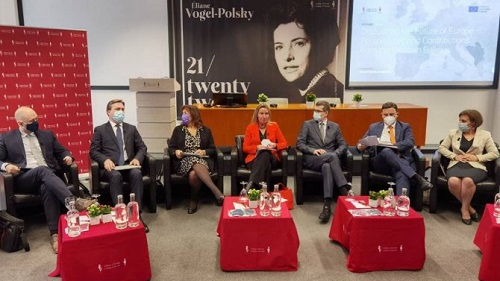
The Minister of Foreign Affairs of Serbia, Nikola Selaković, says that Serbia is committed to EU integration, and that it shows that commitment primarily through internal reforms and regional cooperation.
At the Conference "Discussing the Future of Europe – Perspectives and Contributions from the Western Balkans", organized by the College of Europe in Bruges, Selaković stressed the importance of the comprehensiveness of the debate on the future of Europe and called for strengthening tangible ties between people and institutions of the EU and Serbia.
"Serbia's commitment to EU integration is visible through the reform process, where our focus is on the rule of law. We are proud that we have done an excellent job in the last year, which was recognized in the report of the European Commission", said Selaković.
The head of Serbian diplomacy says that for Serbia, the engagement in EU regional initiatives is of special importance, as well as the cooperation between the neighbors in the Western Balkans.
"Serbia has eight neighbors, and regional policy and cooperation are the highest priority of our foreign policy. We need to find a way to deepen that cooperation. It is not only about participation in existing initiatives, but also about the promotion of new initiatives, such as the Open Balkans, to which both the Government of Serbia and President Aleksandar Vučić are very committed", Selaković said.
Selaković states that regional initiatives are important both from the point of view of economic cooperation and from the perspective of demography, as one of, according to him, the most important issues for the European continent.
He states that the entire region of the Western Balkans has about 17.5 million people, which is less than one member such as Romania, while the GDP of the entire region is 0.6 percent of the EU GDP.
"If our role and position are not well recognized, then these percentages will be even lower, and then all our bilateral differences will be meaningless. Therefore, let us cooperate in areas where we have no problems and let our first priority be economic cooperation", Selaković emphasized.
During his address to other foreign ministers from the region who participated in the Conference in Bruges, Selaković concluded that mutual dialogue is the best way to improve regional cooperation, as well as the contribution of the Western Balkans to the future of Europe.
Source: Tanjug
15. Nov 2021.
|
|
|
| Serbia expects support for opening clusters by end year |
|
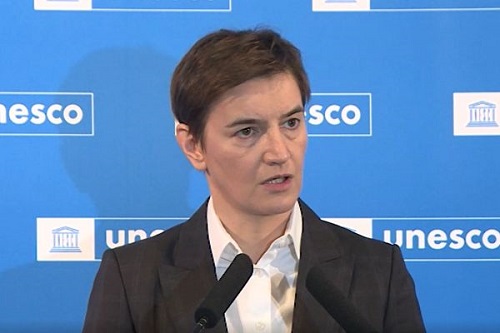
Prime Minister Ana Brnabic stated today in Paris that she expects positive news and support from France for opening one or two clusters at the intergovernmental conference to be held in December.
At the press conference, Brnabic stated that she talked with French President Emanuel Macron about the situation in Serbia, primarily in the context of European integration, i.e., whether we can count on the country's support for opening a cluster at the December intergovernmental conference.
We have two clusters ready for opening, so I expect positive news and support from France for one or both clusters, but certainly significant support, the Prime Minister said.
She pointed out that Macron told her to convey greetings to the President of the Republic, Aleksandar Vucic, and the whole of Serbia, as well as that he remembers his visit to Belgrade with great joy.
Today, I had good talks with the President of Cyprus, but also with the President of Slovenia, with whom I also talked about European integration, i.e., the country's support, which is clear and unambiguous for opening a cluster and further progress of Serbia towards full EU membership, regional relations and regional cooperation, said Brnabic.
She stated that she also talked with EU High Representative Josep Borrell in Paris.
There were interesting and good talks, it seems to me that we have done good things for our country and I expect it to continue today, the Prime Minister concluded.
Source/Photo: www.srbija.gov.rs
12 November 2021 |
|
|
| UNESCO’s role extremely important for preservation of Serbian heritage in Kosovo and Metohija |
|
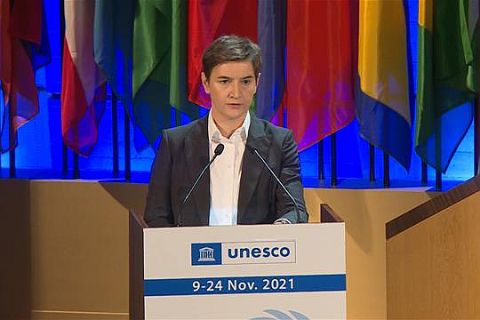
Prime Minister Ana Brnabic stated today that severe examples of endangering the Serbian cultural, historical and spiritual heritage in Kosovo and Metohija are proof of the important role of UNESCO in protecting and preserving heritage.
At the 41st session of the General Conference of UNESCO in Paris, Brnabic emphasized that four jewels of the Serbian medieval cultural heritage in Kosovo – Visoki Decani, Pec Patriarchate, Gracanica and Bogorodica Ljeviska, have been preserved thanks to the fact that they are inscribed on the endangered world heritage list. Hundreds of other sites and monuments are endangered.
The Serbian heritage in Kosovo and Metohija is of immeasurable importance, not only for the national identity of Serbia, but also as a part of the esteemed European and world heritage, she underlined.
Source/Photo: www.srbija.gov.rs
12. novembar 2021. godine
|
|
|
| Joint statement of the participants in today's meeting of the Open Balkans initiative: "The future of enlargement – a view from the region" |
|
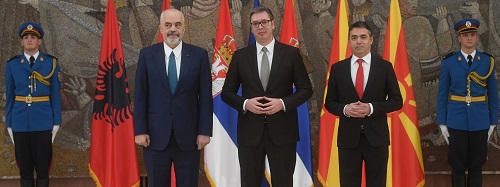
The President of the Republic of Serbia, Aleksandar Vučić, the Prime Minister of the Republic of Albania, Edi Rama, and the Deputy Prime Minister of the Republic of Northern Macedonia in charge of European affairs, Nikola Dimitrov, signed a Joint Statement "The future of enlargement – a view from the region" today, within the Open Balkans cooperation initiative. We transmit the text of the Joint Statement in its entirety:
"The European Union and its member states, together with partners from the region, reaffirmed their unequivocal support for the European perspective of the Western Balkans at the Summit in Brdo on 6 October.
The Western Balkans reiterated the region's commitment to European values and democratic principles, the rule of democracy, fundamental rights and the rule of law.
However, the European Union's questionable capacity to integrate new members, internal debates among EU member states and bilateral relations have hampered the region's real progress towards the EU.
On paper, enlargement policy remains active. In practice, however, there is growing disappointment among citizens in the region regarding the EU perspective.
In addition, delays in the EU perspective have cost the region too much politically.
Northern Macedonia is a great example of unfulfilled promises of the European Union. Its government tried to meet Brussels' conditions, only to find itself isolated and left to deal with the consequences of EU decisions. This weakened perspective of European integration threatens to leave us more disintegrated than ever. This feeling is common throughout the region.
As the European Union develops new and far-reaching strategies, the region is desperately trying to implement existing ones. And while our path to the European Union has derailed, we still remain committed to meeting EU standards.
We cannot allow this negative spiral to jeopardize the very basis of the region's future and prosperity.
The European Union is moving forward, while the region is stuck within the dilemmas of the EU itself. The European Union should and must explore all ways towards faster integration of the Western Balkans in the run-up to their accession, together with its commitments for phased accession as defined in the new methodology.
Accordingly, it would be useful to involve the region in the development of the European Union's trade and tax policy, such as the mechanism for adjusting the carbon dioxide emission limits and protective temporary measures to restrict steel imports, to name just a few.
We could also explore the possibility of exempting the Western Balkans from various erga omnes trade policy measures.
Our universities could be involved in the field of higher education and research of the European Union, which would provide an equal chance to participate in tailored programs, research and innovations of the EU. At the same time, our agriculture is crying out for additional funds, and it has huge potential for expanding and delivering high quality products to the market of the European Union.
This could prevent the negative impact on the stabilization and economic performance of the region. We believe that it is in the interest of the European Union to help build and promote a secure and prosperous region.
And more than that – together we could explore Schengen participation and gradual integration into the single market of the European Union.
Today's world is changing rapidly. It is time to act, and act decisively. We cannot afford nor will we be forgiven for missed opportunities, indulgences and lack of determination to realize this strategic vision.
We need to understand each other better if we want to achieve the best results. If anyone thinks we have to act now, that was already yesterday.
To this end, today we reaffirmed our determination to deepen our economic cooperation within the Open Balkans initiative, building on the Berlin Process agenda and focusing on rapid and tailored implementation.
In this endeavour, we have engaged our chambers of commerce and instructed them to prepare detailed guidelines for the implementation of the Memorandum of Understanding and Cooperation regarding the facilitation of imports and exports, which was signed in Skopje on 29 July.
Today, we approved a detailed plan to implement trade facilitation measures and asked the Western Balkan Regional Chamber of Commerce to further monitor the implementation process. We have also decided to form an Inter-Ministerial Council, which will work closely with the chambers of commerce to implement these measures.
The Western Balkan is ready to move at an accelerated pace. We need to move forward. That is how the European Union should also move – towards the Western Balkans. Staying idle is not an option.
We invite all other parties in the region to join us and we welcome them. The Open Balkans is open", the integral text of the Joint Statement reads.
Source: www.predsednik.rs
Photo: Dimitrije Goll
4 November 2021
|
|
|
| Address of the President of the Republic of Serbia at the United Nations climate change conference COP26 held in Glasgow |
|
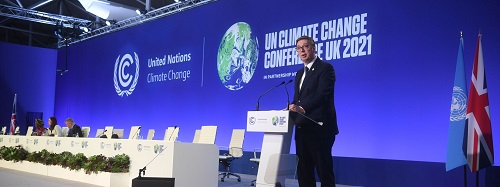
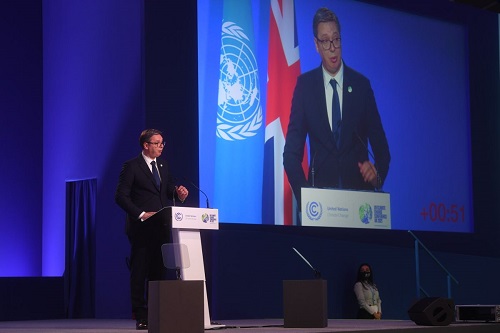
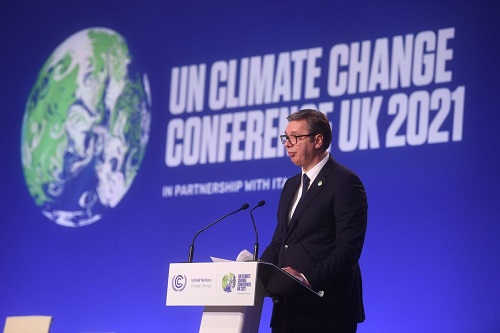
"Your Excellences,
distinguished delegates,
dear Sarah,
At the very beginning, I feel obliged to thank Prime Minister Boris Johnson and Her Majesty’s Government for exceptional hospitality.
I feel privileged to represent the Republic of Serbia at this important place and at the highest-level world forum, in working on the most important topic of today – promoting climate awareness.
We all agree that we must make investment into climate and environment.
We all, likewise agree, that future generations must be educated in order not to repeat the mistakes we made, by hurting the only Planet that makes life possible.
I am very honoured that the Republic of Serbia is co-chairing this year’s Conference as a Non-EU representative of the Eastern Europe Group.
In concrete terms, we see the special contribution of our expert team in finalising negotiations on the implementation of Article 6 of the Paris Agreement, which refers to the establishment of the global market and non-market mechanisms for reducing greenhouse gas emissions, as well as to remaining provisions referring to advanced transparency framework and common timeframes for Nationally Determined Contributions, which are the key provisions of the Agreement that have not yet been covered by the decision that is to be adopted by the Conference, i.e. all member states.
We, therefore, believe that this is an exceptional opportunity for Serbia to give its full contribution to the finalization of negotiations, which, we hope, will secure full implementation of the Paris Agreement.
As a result of strong economic development, modelled for Serbia by 2050, the impact of the implementation of climate measures to employment will be optimal, through new jobs creation and creation of new industries which have not existed so far.
One billion euros was raised at the first green bonds auction in Serbia, which clearly confirms the trust of international investors in our green agenda, but also to the economic and political stability of our country.
Incomes from green bonds issuance will be used for financing renewables, energy efficiency, sustainable water management, prevention of pollution and circular economy development and biodiversity preservation.
And as you can see, dear friends, my people made a terrific speech for me, but I am going to add a few more words and a few more questions for those that are coming from big powers and that haven’t answered yet several questions:
Number one is: how are we going to finance all these activities?
We’ve heard the story of trillions of dollars that are at our disposal. My question would be: what would be the interest rate, what would be the terms for taking these amounts of money, and actually how are we going to tackle that issue?
Number two: how are we going to treat the nuclear power plants? Are we going to shut them all or are we going to build them more?
Then, how are we going to build more renewables if we already started endorsing populist movements against wind parks, new hydropower plants, and are we going to put in jeopardy the level of our public debt to GDP ratio if we raise huge amounts of money?
How are we going to treat natural gas, and how are we going to secure decent prices of natural gas and electricity power as well?
And, I came here using an electric car from Edinburgh to Glasgow. But, how are we going to do mining and refining of lithium, nickel, cobalt and many other very important minerals?
In the end, we all know what is our final aim, what is our final target. But, it’s not a fairytale – we’ll have to work a lot, we’ll have to be 100 per cent dedicated, and we’ll have to be more honest with each other.
The health of people living in Serbia depends directly on the implementation of this Agenda, just like the health and life of each living being on Earth depends on arrangements that will be reached here and on national implementation of the respective arrangements.
Perhaps it is the right time to listen and hear the cry of Mother Earth because if we lose this race against time, our children will inherit an irreparably polluted Planet.
Thank you very much for listening to me."
Source: www.predsednik.rs
Photo: Dimitrije Goll
2nd November 2021 |
|
|
| Continuous communication with EU on further reforms |
|
Prime Minister Ana Brnabic, together with Minister of European Integration and Chief Negotiator Jadranka Joksimovic, met today with Head of the EU Delegation to Serbia Emanuele Giaufret and the ambassadors of the EU Member States.
The topics of the meeting were 2021 EU Enlargement Package and in particular the Report of the European Commission on Serbia for this year, as well as the next steps in the process of accession to the EU.
She underlined that Serbia has continuous communication with the Delegation of the EU and all Member States and that it speaks openly about further reforms, first and foremost in the field of the rule of law.
The Prime Minister assessed that this year’s Report on the progress of Serbia gives an objective evaluation of everything the Serbian government has achieved on speeding up the political and economic reforms, by which one of the strategic priorities has been fulfilled.
According to Brnabic, it is of particular importance that the European Commission has given a clear recommendation that Serbia reached the criteria necessary for opening two clusters of chapters.
Today we have an opportunity to present to you, as representatives of the EU and EU Member States, additional information on the adoption and implementation of all necessary reforms, the Prime Minister stated.
For this reason, it is important that this meeting is being held immediately after the release of the European Commission’s Report and before the final decision of the Member States on whether they will support the opening of clusters, she said.
Brnabic voiced her hope that these additional explanations will contribute to Serbia obtaining consent for the formal continuation of negotiations by the end of this year.
She also underlined that the European Commission’s recommendation for the further opening of clusters is very important politically, not only as an incentive to the government to continue implementing its reform plans with motivation and responsibility, but also to the citizens of Serbia and all in the region, who in this way receive once more a clear confirmation on the perspective of membership in the EU.
The Prime Minister pointed out that Serbia wishes to make additional progress in all areas, especially in the field of the rule of law and that continuous communication with the Delegation of the EU in Serbia and all Member States is of particular importance to that end.
Joksimovic stated that the Report provides the necessary balance in the evaluation of everything Serbia has achieved in the previous period.
According to her, in some segments the implementation of reforms is faster, in some other somewhat slower, but progress has been noticed in all areas and is noted down in the Report itself.
She voiced hope that the general assessments from the European Commission, which speak in favour of honesty, dedication and capability of the Serbian government to implement policies which are important for the accession process in time of pandemic, will be a sufficient orientation for the Member States to agree on the further opening of clusters.
Ambassador Giaufret expressed gratitude to the Serbian government for convening this meeting with ambassadors of the EU Member States, describing it as a positive indication of Serbia’s dedication to strengthening dialogue on reforms for the sake of solving priorities and necessary activities identified in the yearly Report of the European Commission.
Source/Photo: www.srbija.gov.rs
22 October 2021 |
|
|
| Serbia's progress noted in European Commission's report |
|
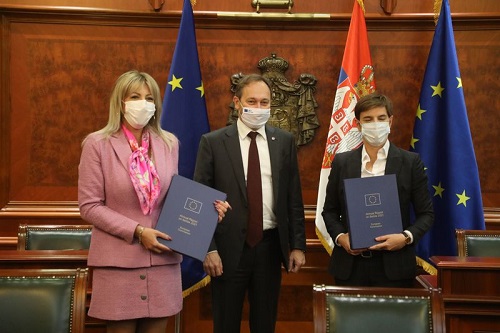
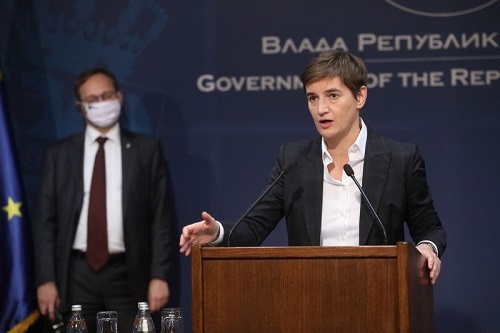
Head of the EU Delegation to Serbia Emanuele Giaufret handed over to Prime Minister Ana Brnabic the annual report of the European Commission on Serbia's progress in the EU accession process, presented today in Strasbourg.
Minister for European Integration Jadranka Joksimovic also attended the presentation of the report in the Government of Serbia.
Addressing the press, Brnabic assessed that the mentioned report is by far the best report on the progress over the last few years and pointed out that it is especially important that the report stated progress in all political criteria and reforms in the rule of law.
The report is complex and covers all segments of our social, political life, foreign and regional policy. In it, the European Commission clearly emphasised that the government of Serbia gave priority to reforms on the European path and especially the rule of law, and that the introductory remarks stated that the focus of the government on reforms can be seen, she stated.
She expressed gratitude to the EU Delegation in Serbia and the European Commission for stating that the opening criteria have been met and that it is necessary to open two clusters.
According to her, the recommendation for opening two clusters is a strong political message to EU members, but also to our country and the citizens of Serbia, noting that a lot has been done in the area of the rule of law.
When it comes to the area of the rule of law, the Prime Minister said that in connection with the elections, it was stated that the political forces continued the dialogue, and that the government began to implement the recommendations of the ODIR.
Speaking about the cooperation with civil society organisations, she specified that the Report praised the fact that a new ministry was formed – the Ministry of Human and Minority Rights and Social Dialogue, but also that the government initiated a session of debates.
The report also stated that the Venice Commission gave a positive opinion on the constitutional amendments, but also recognised that the number of old cases in the field of justice continued to decrease and that for the fifth year in a row the judiciary resolves more cases than it receives, Brnabic said.
Also, as she mentioned, progress has been established in the areas of the fight against corruption and organised crime, emphasising that for the first time since 2016, progress has been noted in the area of freedom of expression.
This is a big and important thing for all of us, and it especially motivates the government of Serbia to continue, she said and called on media associations to return to the working group and continue to work together to improve conditions for the media.
The Prime Minister pointed out that progress in public administration was noted, albeit limited, while in the areas of economy, Serbia received a very good report, praise for sustainability and resilience during the coronavirus pandemic.
The green agenda also established good progress, primarily in the field of energy, with a special focus on renewable energy, Brnabic underlined and announced that the government will continue to work on reforms, and that the first meeting will be held on Thursday.
The European Commission's report on Serbia's progress in the EU accession process was presented today in Strasbourg by European Commissioner for Neighbourhood and Enlargement Oliver Varhelyi.
On that occasion, Varhelyi announced that the European Commission supports the opening of two new negotiating clusters in the negotiations with Serbia – cluster three and cluster four.
Source/Photo: www.srbija.gov.rs
19 October 2021
|
|
|
| Selaković in UNSC: Dialogue and the implementation of the agreements reached are the only right way to resolve all open issues |
|
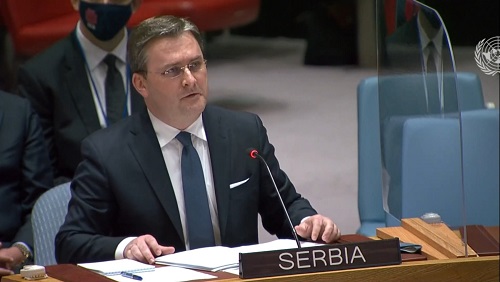
Distinguished President of the Security Council,
Esteemed members of the Security Council,
Distinguished Special Representative,
I would like to thank Secretary-General of the United Nations Mr. Guterres and Special Representative of the Secretary-General and Head of UNMIK Mr. Tanin for the report submitted and for their efforts made towards the implementation of the UNMIK mandate. I would also like to thank the members of the Security Council for the continued attention they have devoted to the issue of Kosovo and Metohija. The Republic of Serbia highly values the activities of the Mission of the United Nations in Kosovo and Metohija and supports it in carrying out its work as efficiently as possible, pursuant to the UN Security Council Resolution 1244, and undiminished in scope, aiming to build and preserve lasting peace, stability and security in the Province.
Mr. Tanin,
Please accept the expressions of our gratitude for your engagement and the cooperation we achieved during your term of office.
Mr. President,
Deep regret and concerns are raised by the fact that the security situation in Kosovo and Metohija in the past period has been marked by an increasing number of various ethnically motivated attacks and incidents targeting Serbs, which was also stated in the Report; that the provisional institutions of self-government (PISG) in Pristina continue to take unilateral steps and refuse to implement the agreements reached in the Brussels dialogue; and that institutional discrimination against Serbs, attacks on the sites of the Serbian Orthodox Church and the undermining of the economic sustainability of Serb communities in the Province have continued.
We are witnessing that dangerous provocations by Pristina are taking place every day, at an accelerated pace, thus seriously threatening the safety of Serbs in Kosovo and Metohija and directly violating the agreements and arrangements reached within the Brussels dialogue.
The latest violent incursion of the so-called ROSU units into the northern part of Kosovska Mitrovica, on 13 October, is the ninth incursion of its kind. Tear gas, shock bombs and unbridled violence are becoming a matter of everyday life for Serbs in the north of Kosovo and Metohija, and that must be stopped immediately.
In the last attack with firearms and chemicals used by Pristina special forces, 71-year-old Verica Djelic died as a result of chemicals used in the intervention, 10 unarmed civilians were wounded, one of them 36 years old Srećko Sofronijević was critically wounded in the back with of an automatic rifle. A three-month-old baby, who miraculously remained unharmed, was also the target of the shooting.
The false excuse for the latest unilateral action, as EU High Representative for Foreign Affairs and Security Policy Josep Borrell called it, was the fight against organized crime and smuggling. Ladies and gentlemen, Serbia is strongly against organized crime and smuggling, but the members of the UNSC should know that such an important and general global goal, which we all share, was cynically used for an armed attack on unarmed civilians, which began with an automatic rifle raid of pharmacies in which patients of Serbian and other nationalities are supplied with vitally important medicines. Four days before the local elections in Kosovo and Metohija, in order to gain votes in an irresponsible and inhumane way, fully motivated by separatist goals, the current PISG regime used medicines on which people’s lives depend to prove its position on the status contrary to UNSCR 1244.
Only a few days earlier, another provocation on the part of Pristina led to a dangerous crisis, when personnel of the so-called ROSU unit, armed with long firearms and reinforced with armoured vehicles, were deployed to administrative crossings between central Serbia and Kosovo and Metohija - Brnjak and Jarinje – in order to remove Serbian license plates and replace them with temporary ones, thus violently preventing the free movement of citizens.
These events do not fall within the reporting period covered by the latest Report of the UN Secretary General on the work of UNMIK, but it is incumbent upon us to address them on this occasion, in order to have everyone understand how dramatic the situation on the ground has been and how serious the consequences of Pristina's unilateral actions can be.
The incursions of heavily armed Pristina police formations, composed exclusively of Albanians, into the north of Kosovo and Metohija, under various pretexts and motives, with the use of excessive force, are provocations that have an extremely dangerous potential to destabilize the already sensitive security situation on the ground. The goal of the latest incursions of Pristina’s special force personnel into the north of the province was to provoke the Serbs and additionally intimidate them with a demonstration of force, as well as to provoke Belgrade to react hastily in some way.
It is obvious that with such moves Pristina aims to erase the 10 years of dialogue, which is the only way to resolve open issues. These provocations once again demonstrate that the provisional institutions of self-government in Pristina, not only do not intend to implement everything agreed in the Brussels dialogue, but that their goal is to completely deny dialogue as a means of resolving problems. An effective response to Pristina's lack of credibility and their dangerous play with fire, which could have unforeseeable consequences, cannot be provided by calling on "both sides" for constructiveness and restraint, which has long been a manner in public communication of some important factors in the international community. There is only one source of destabilization, it has a name – and that is the provisional institutions of self-government in Pristina - and after the events of 13 October, it is clear that it can and needs to be stopped by urgent and decisive action of the international community. It is now quite obvious that these are no longer sporadic and isolated provocations by Pristina, but that this is an organized campaign of ethnically motivated violence and discrimination against Serbs.
We also express our concern over the latest imposition of tariffs by Pristina on certain products originating from central Serbia, which was made public on 8 October. We remind you that the unilateral decision of Pristina to impose duties on products from central Serbia in November 2018 resulted in a de facto complete trade blockade and a long-term stalemate in the dialogue between Belgrade and Pristina. In contrast to Pristina, which persistently seeks to raise barriers towards central Serbia through unilateral acts, Belgrade is persistently and consistently working to liberalize the flow of people, goods, services and capital, which is the basic goal of our "Open Balkan" initiative. North Macedonia and Albania joined this initiative, but Pristina did not.
Distinguished members of the Security Council,
In the period from March to September this year, which is covered in the latest Report, close to 100 ethnically motivated attacks were carried out against Serbs, their private property, religious and cultural heritage sites. The increase in the frequency of attacks was accompanied by the strengthening of the intensity of ethnically motivated violence, which more and more often targets children, the elderly, women, the few returnees present there, as well as churches and other property of the Serbian Orthodox Church.
This systematically intensifies the ubiquitous sense of insecurity of the remaining Serbs, but also deters potential returnees, who are in fact being told that local Albanian communities can attack them with impunity and prevent them from returning to live in their own homes.
The most striking example of the position of Serbs in Kosovo and Metohija is the case of the displaced person Dragica Gašić, who moved into her apartment in the municipality of Djakovica again in early June. In that town – to which local Albanians proudly refer as a place forbidden to Serbs - Ms. Gašić, on her return, first faced physical and verbal attacks by citizens of Albanian nationality living there. Instead of being provided protection, that seriously ill woman then became a victim of institutional persecution as well, that the local self-government bodies and the police unleashed against her. Since this is a person who is the first and only Serb returnee to Đakovica after more than twenty years, it was to be expected that, at that moment, at least civil society organizations would attempt to protect her rights. However, NGOs from Djakovica soon joined the activities aimed at the expulsion Ms. Gašić, including those receiving funding from international donors for projects related to strengthening democracy and the rule of law.
I must also mention the latest attack on the house of the only remaining Serbian woman in the center of Pec, retired teacher Rumena Ljubić, whose windows were stoned twice in just 24 hours on 13 October.
Dragica's and Rumena’s fate is a frightening reflection of the real situation of human rights that almost every one of over 200,000 displaced Serbs and non-Albanians would face in Kosovo and Metohija - provided that they gather the courage to return to their homes in the Province after more than twenty years. I would like to remind you again that since 1999, only around 1.9% of internally displaced Serbs and other non-Albanians have achieved a sustainable return to Kosovo and Metohija.
Therefore, I believe that the aforementioned will encourage the members of the Security Council and the international presence on the ground to devote priority attention in the future
to the issue of the return of displaced persons, which is an important part of the UNMIK mandate under UN Security Council Resolution 1244.
I therefore thank the Secretary-General in particular for keeping this extremely important issue in focus and for calling again, in the conclusions of his Report, for the creation of conditions for the sustainable return of internally displaced persons and the sustainable reintegration of returnees.
Distinguished members of the Security Council,
Serbian medieval monuments in Kosovo and Metohija, including monuments that, due to their exceptional value but also constantly being subject to threats are inscribed on the UNESCO List of World Heritage in Danger, are still among the most endangered cultural heritage in Europe.
I wish to recall that there are over 1,300 Serbian churches and monasteries in Kosovo and Metohija. Attacks on Serbian cultural and religious heritage are at the same time attacks on the identity of Serbs in the Province and directly affect their sense of safety.
A striking example of disrespect for Serbian cultural and religious monuments in the Province is the case of the Visoki Decani monastery. The monastery, which has been the target of attacks and shelling several times since 2000, is still secured by KFOR forces due to being under a threat. It is faced with a series of hostile actions, and the perpetrators are not deterred by the fact that this is a World Heritage Site. Despite frequent declaratory statements, even the decision of the so-called "constitutional court" of the PISG in Pristina five years ago confirming ownership of Visoki Decani Monastery over 24 hectares, is not respected. We welcome the assessment made by the UN Secretary General in his Report.
Dear Mr. President,
The Republic of Serbia remains committed to finding a compromise political solution, as prescribed under Resolution 1244, which will ensure lasting peace and stability. We firmly believe that dialogue and the implementation of the agreements reached are the only right way to resolve all open issues.
As a state committed to the respect for international law and a member of the United Nations, Serbia opposes any attempt at establishing an artificial balance between the parties in the dialogue, as well as the relativization of responsibility for unilateral acts.
We note with concern that not even eight years after reaching the Brussels Agreement, the establishment of the Community of Serb Municipalities has not been initiated, although Belgrade has fulfilled all its obligations under that agreement.
There are also numerous and repeated examples of Pristina violating or obstructing agreements reached in dialogue, in the areas of energy, justice, freedom of movement and visits by officials.
One such example is the verdict sentencing Ivan Todosijevic to two years in prison, which is also pointed out in the Secretary General's Report. The Brussels Agreement was directly breached, which was also stated by the representatives of the European Union. With its conduct Pristina caused immeasurable damage to the reconciliation process in Kosovo and Metohija.
Despite the interpretation from the European Commission that this is a violation of the Brussels Agreement, because Todosijevic had to be sentenced by a panel consisting of the majority of judges of Serbian ethnicity, Pristina still does not take any action in this regard.
Pristina also continued with the practice of banning Serbian officials from entering the territory of the Autonomous Province of Kosovo and Metohija.
We believe that it is important that the international community, and especially the European Union, as the guarantor of the agreement, firmly insists that the provisional institutions of self-government in Pristina start implementing all the agreements reached.
Distinguished members of the Security Council,
As before, the Republic of Serbia remains fully committed to resolving the issue of missing persons, as also demonstrated through full cooperation with relevant international mechanisms as well as participation in the work of the Working Group on Missing Persons. We expect that the representatives of the provisional institutions of self-government in Pristina will fulfill their obligations.
Bearing in mind everything I delivered here today in my address, we hold the position that the international presence in Kosovo and Metohija, pursuant to UN Security Council Resolution 1244, is still necessary. In addition to UNMIK, the presence of KFOR as the main guarantor of security and EULEX, due to its engagement in the field of the rule of law, is also important. I would like to emphasize once again that Serbia fully supports respect for international law, comprehensive implementation of UN Security Council Resolution 1244 and activities of UNMIK in an undiminished scope and with adequate financial resources, so that the Mission fulfills the mandate entrusted to it under the Resolution.
Thank you.
15th October 2021
|
|
|
| Exhibition of paintings by naive Slovak painters from Serbia, Berlaymont, 1-15 October 2021 |
|
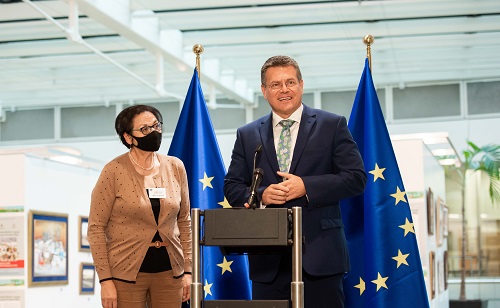
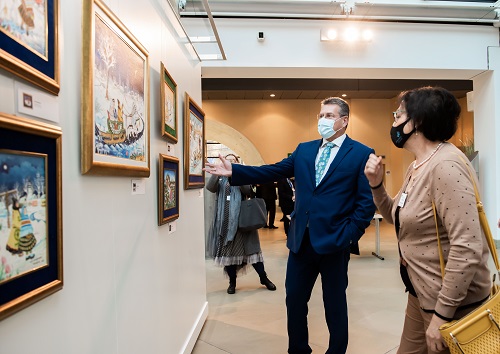

Exhibition of paintings by Slovak naive painters from Serbia, under the auspices of the Vice President of the European Commission Maroš Šefčovič and the Deputy Prime Minister of Serbia Maja Gojković, is held, for the third time, at the headquarters of the European Commission, from 1 to 15 October 2021.
The presentation of the exhibition was held on October 12, and the introductory words were given by the Vice President of the EC M. Šefčovič and the Minister of Human and Minority Rights and Social Dialogue of the Republic of Serbia, Mrs. Gordana Čomić.
The reception, which was held on that occasion, was also attended by the EU Special Envoy for the Belgrade-Pristina Dialogue and other Western Balkans issues, Miroslav Lajcak, and the Ambassador of the Republic of Serbia to the EU Ana Hrustanovic.
M. Šefčovič pointed out that the development of the specific art of Slovak naïve painters is proof that the Slovak minority in Serbia, where they are living for more than 200 years, "feels at home". He underscored that he would be happy to support the idea of proclaiming this art an intangible heritage of UNESCO.
Gordana Čomić emphasized the importance of culture and diversity in building the European community of peoples and underlined that the images of Slovak naive people represent the beauty of the world, which belongs to everyone, not only the Slovak community, Serbia in which they live or the European Union.
12.10.2021. |
|
|
| President Vučić visits the Republic of Slovenia |
|
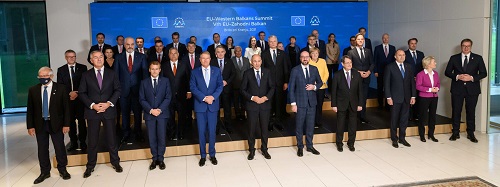
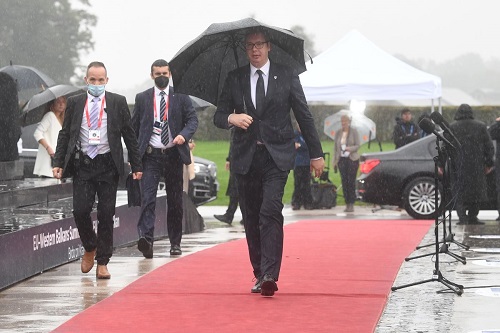
The President of the Republic of Serbia, Aleksandar Vučić, participated in the Summit of the Leaders of the European Union and the Western Balkans, at which a Declaration was adopted in which EU leaders give unequivocal support to the European perspective of the Western Balkans and reaffirm their commitment to the enlargement process based on "credible partner reforms", emphasizing the importance of "strengthening the integration and the capacity of absorbing new members" by the EU itself.
After the EU-Western Balkans Summit, President Vučić stated that there is a perspective of EU enlargement, but that not all member states have the "same appetite" for enlargement.
"On behalf of the Republic of Serbia, I am satisfied with the fact that the presidents and prime ministers of the EU countries talked to us for four hours about the future of the Western Balkans. On behalf of Serbia, I thanked for the help and support, investments and money that EU taxpayers invest in our country. We talked about the fact that there is a prospect of enlargement and it is clear that there are strategic interests of the EU in that European area", said President Vučić and added that there was a positive atmosphere at the Summit and that the host, the Prime Minister of the Republic of Slovenia, Janez Janša, has always fought for a clearer European perspective of the countries of the Western Balkans.
"It seems to me that we have presented ourselves in a good way with a responsible and serious policy, and I believe that in the coming period, we can improve our position in the EU", said President Vučić, adding that he had many bilateral talks: with Greek Prime Minister Kyriakos Mitsotakis, who said Athens would continue to support Serbia's territorial integrity, with the French president, the Hungarian prime minister, the Spanish prime minister, the Slovak prime minister, the Romanian president, the president of the European Council, Charles Michel, and with many other European leaders.
President Vučić stated that he also talked with the prime minister of the Republic of Croatia about the relations between our two countries, as well as with the prime ministers of the Republic of Albania and the Republic of Northern Macedonia, Edi Rama and Zoran Zaev.
President Vučić paid a two-day visit to the Republic of Slovenia, where he attended the Summit of Heads of State and Government of the European People's Party on the first day and assessed that, after the loss of the German Christian Democratic Union in the elections, the strength of the European People's Party was concentrated in Central and Eastern Europe.
Source: www.predsednik.rs
Photo: Dimitrije Goll
6 October 2021 |
|
|
| President Vučić attended ceremony of the beginning of works on the modernization and rehabilitation of the Niš-Brestovac railway |
|
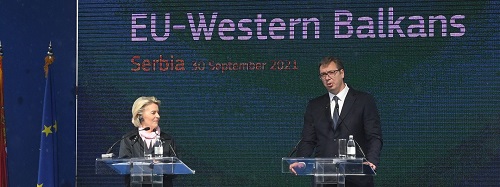
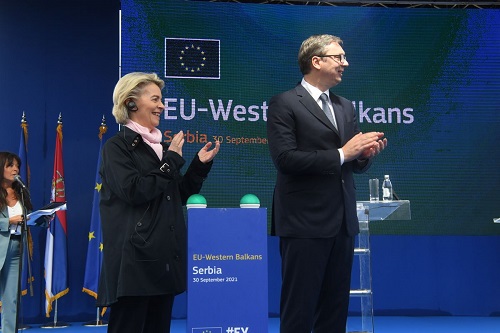
The President of the Republic of Serbia, Aleksandar Vučić and President of the European Commission, Ursula von der Leyen, have attended today the ceremony of the beginning of works on the modernization and rehabilitation of Niš-Brestovac railway at the international Corridor 10 as well as signing of the agreement between the Public Company Koridori Srbije and Consortium STRABAG AG and STRABAG d.o.o. Beograd on the construction of the first phase of the Highway of peace in the section Merošina – Merošina 1.
“In Donje Međurovo the 23km long railway is build and 75 percent of it will be financed by the European Union. It is enormous money for us, great encouragement and respect. This railway and highway are important both for us and Europe. I am very grateful to Mrs Von der Leyen for coming to Niš today and Niš becomes the center of all Balkan corridors, it becomes the Balkan crossroads”, said President Vučić adding that Serbia was entirely committed to the implementation of the agreements signed so far under the auspices of the EU.
“We will do our best not only to preserve peace, but also to reach more agreements which would mean security of everyone in the Balkans and better life and economy for all of us. We know what our job is. As much as we can, taking into account the difficulties due to the relation with Priština, we will do everything to make progress on the European path”, said President Vučić and thanked the President of the European Commission for kind words and wish to see Serbia in the EU.
The President of the European Commission, Ursula von der Leyen, emphasized that today Serbia had already gone a long way to the EU membership, it had made an incredible progress and efforts in the past years and improved conditions in different sectors. She said that she strongly supports the European integrations of Serbia.
“This is a very special moment. Signing of this agreement is a symbol of our great cooperation and projects of connections through which we jointly build our European future, because the future of Serbia in the European Union is better. The corridor connects Serbia to Austria and Greece and is really the driving force of economy. It is the driving force for the Serbian economy, investments, the economic plan which already functions in Serbia”, said the President of the European Commission.
Source: www.predsednik.rs
Photo: Dimitrije Gol
30.9.2021 |
|
|
| President Vučić met Ambassadors of Quinta countries |
|
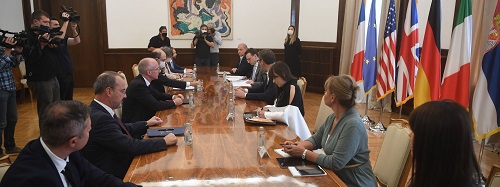
The President of the Republic of Serbia, Aleksandar Vučić has received today ambassadors of the Quinta member countries - the USA, Great Britain, France, Italy and Germany as well as the Head of the European Union Delegation who asked for the de-escalation of the crisis in the north of Kosovo and Methoija.
President Vučić explained the position of Serbia on this occasion. “We are dedicated to the preservation of peace and observance of the Brussels Agreement but under no circumstance shall we allow the humiliation of Serbia or its citizens”, said President Vučić.
Source/Photo: www.predsednik.rs
27 September 2021
|
|
|
| Telephone conversation of President Vučić and High Representative of the EU for Foreign Affairs and Security Policy |
|
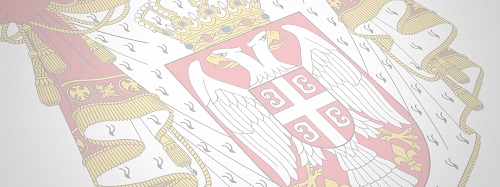
The President of the Republic of Serbia, Aleksandar Vučić, has discussed today by telephone with High Representative of the European Union (EU) for Foreign Affairs and Security Policy, Josep Borrell.
President Vučić emphasized that Serbia would continue to observe all agreements it had signed, all international legal regulations and that it would continue to provide support to the regional peace and stability despite irresponsible, frivolous and criminal conduct of authorities in Priština.
High Representative Borrell called for patience, preservation of peace and continuation of the dialog in Brussels.
Source/Photo: www.predsednik.rs
26 September 2021
|
|
|
| Telephone conversation of President Vučić and General Secretary of NATO |
|
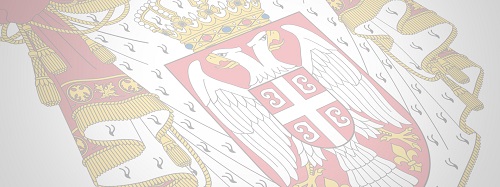
The President of the Republic of Serbia, Aleksandar Vučić, has discussed today by phone with the General Secretary of NATO, Jens Stoltenberg about, as the General Secretary said, worrisome situation in northern Kosovo and Metohija.
President Vučić said that Serbia had not violated either Brussels Agreement or Resolution 1244 by anything, by any single move or in any manner jeopardized peace preservation.
“The complete occupation by armored vehicles of northern Kosovo and Metohija has lasted for seven days and it is conducted by Priština and everyone in the international community “are thunderously silent”, said Serbian President. “However, everyone is worried all of a sudden when they spot Serbian helicopters and airplanes at the territory of central Serbia, because apparently they should not exist, or should not take off until they receive the approval from Kurti or someone from the international community”, says President Vučić.
Serbia observes all international agreements it signed, Serbia will always conduct responsibly and seriously, but Serbia is still asking when the formation of SMC will start and when Kurti’s armored units will be withdrawn from northern Kosovo and Metohija.
Finally, with the gratitude to General Secretary Stoltenberg for the fair relation and wish to listen to the Serbian side, President Vučić asked about the norm and international regulation violated by Serbia? Today, yesterday or any time?
The two interlocutors agreed to stay in constant touch due to necessity of the preservation of peace and stability in the entire region.
Source/Photo: www.predsednik.rs
26 September 2021
|
|
|
| Selaković in New York with 28 foreign ministers on economic successes of Serbia and K&M situation |
|
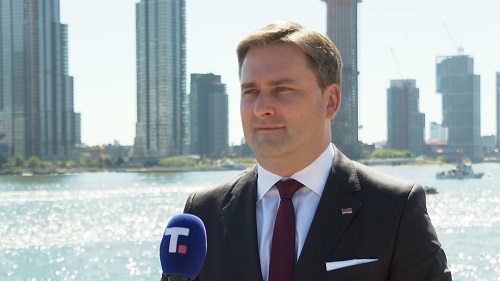
The Minister of Foreign Affairs of Serbia, Nikola Selaković, has stated that in New York he introduced foreign ministers of 28 countries to economic success of Serbia but also to the situation in Kosovo and Metohija, which he also discussed with the Russian Minister of Foreign Affairs, Sergey Lavrov, who told him that we could count on the support of the Russian Federation, with regards to Serbian interests in K&M.
Summarizing results of his visit to New York within the session of the UN General Assembly, Minister Selaković says that one of the last meetings was with Minister Lavrov, which was their third meeting in the previous nine months.
The Serbian Foreign Minister says that he surely used this opportunity, too, to introduce Minister Lavrov to the latest events in northern Kosovo and Metohija, the situation of the dialog between Belgrade and Priština and very clear and unambiguous attitude of President Aleksandar Vučić regarding the continuation of the dialog and subsequent events in K&M.
“We discussed the principled support of the Russian Federation, which is constantly present not just in Moscow, Belgrade, in the field, but also here in the East River, by the delegation of the Russian Federation as the permanent member of the UN Security Council. Of course, we will continue to maintain this type of dialog. What Minister Lavrov said was that we could count on the support of the Russian Federation in future with regards to our interests in K&M”, highlighted Minister Selaković.
He said that he had had the opportunity in New York to hold 33 meetings, of which 28 with ministers of foreign affairs, whom he had introduced also to topicalities related to the latest events in Kosovo and Metohija, but also to our principled position regarding the observance of the international public law, territorial integrity and sovereignty.
Minister Selaković said that his colleagues at the meetings had praised the substantial and fantastic success of Serbia in the consolidation of the economic sphere and transformation of what had been on the edge of collapse and economic disaster seven years before to the fastest growing economy in Europe, which Serbia was in the past two years.
He said that most of his interlocutors had supported our reforms and expressed great respect toward what President Aleksandar Vučić and Serbia had done in the previous period.
Many of them, says the Serbian Foreign Minister, showed great interest in the manner in which Serbia organized the figth against Covid 19.
“It was a great pleasure and pride to represent the Republic of Serbia in all these meetings. Many of my colleagues confirmed their arrival to Belgrade to the Conference on 11th and 12th October, which is dedicated to the 60th anniversary of the foundation of the Non-Allied Movement”, said Minister Selaković.
He emphasized that it was not just the evidence of how much they had cared to come to Belgrade to the conference, but also to see and witness the Serbia which after several decades of attempts to fight different challenges rose to its feed, was economically consolidated and turned towards its traditional friends.
“That is a great deal and our country will surely during October be one of the spots on Earth of greatest importance for multilateralism, for cooperation among the countries which share the same values, the values entered into the UN Charter and which are based on the promotion and fight for peace, equality, observance of the international public law and rights of every country to pursue its path to happiness and better and more ordered society in compliance with the wishes of its population”, said Minister Selaković.
He said that the Minister of Foreign Affairs of Azerbaijan, Jeyhun Bayramov, would come to Belgrade to the conference on the occasion of the Non-Allied Movement adding that we had strategic cooperation with Azerbaijan and frequent contacts.
“We agreed to realize as soon as possible after the Belgrade conference his bilateral visit to Serbia”, added Minister Selaković.
He said that it had been agreed to intensify the cooperation and finalize the agreements which should be signed and after that realized when the meeting of Serbian President Aleksandar Vučić and Azerbaijan President Ilham Aliyev took place.
Minister Selaković says that the Ministry of Foreign Affairs had recently received its sector for economic diplomacy and there were great expectations from it and one of the tasks was to deepen the cooperation with Azerbaijan.
25 September 2021 |
|
|
| Prime Minister Brnabic at Global COVID-19 summit organised by White House |
|
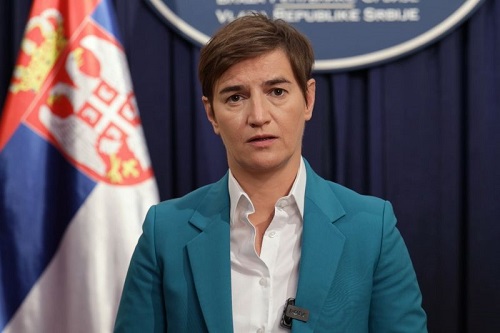
Prime Minister Ana Brnabic participated today at the Global COVID-19 summit, organised by the White House, which was opened by US President Joseph Biden.
The video messages are attended by a large number of world leaders and officials of international organizations, including UN Secretary General Antonio Guterres, European Commission President Ursula von der Leyen, British and Canadian Prime Ministers, Boris Johnson and Justin Trudeau, German Chancellor Angela Merkel and many others.
In the message, the Prime Minister pointed out that Serbia was among the first European countries to procure a covid vaccine, and that she was the first European Prime Minister to receive the vaccine.
Thanks to years of investment in digitalisation and development of eGovernment, we have managed to organise a complicated and complex vaccination process very efficiently and in a way that it is focused on citizens, she explained.
However, as she added, from the very beginning we were aware that this is not just a matter of our citizens and only our struggle. In the fight against the COVID-19 pandemic, we are all safe or no one is safe.
That is why, in addition to procuring vaccines for our citizens, we donated vaccines to the citizens of the Western Balkans, but also to other countries, she reminded and specified that Serbia donated 230,000 doses of vaccines to the region, we vaccinated foreign citizens in Serbia with approximately 300,000 doses and set aside we have 570,000 doses of vaccines for countries in Africa and Asia.
Brnabic mentioned that Serbia has already started the production of covid vaccine from one manufacturer, and that it will start production from another by the end of the year, because in that way we want to help and support all people and countries that need vaccines.
This is a pandemic in which we will either win together or lose together, but we must fight together, the Prime Minister repeated.
That is why Serbia supports the goals of this global summit, she emphasised, and expressed her gratitude to the United States of America and President Biden for organising the summit and supporting joint efforts in the fight against the COVID-19 pandemic.
Vaccines are the only way out in the fight against the pandemic, concluded Brnabic.
22 September 2021
|
|
|
| Minister Selaković in New York with Borrell on the crisis in northern Kosovo and Metohija and European perspectives of Western Balkans |
|
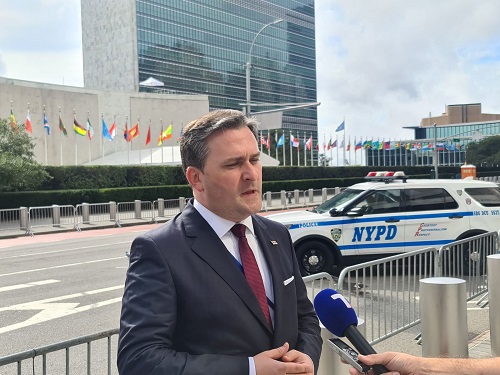
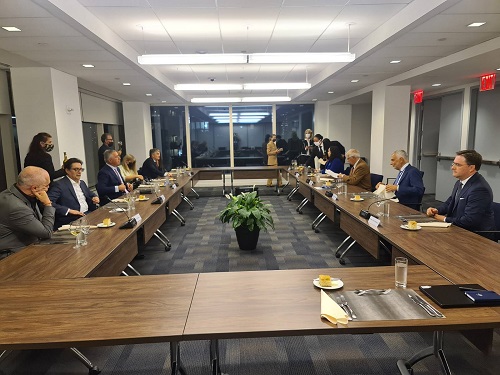
The Minister of Foreign Affairs, Nikola Selaković, said that since his arrival to New York to the session of the UN General Assembly, he had had very important meetings, which included the working dinner at the EU High Representative for Foreign Affairs and Security Policy, Josep Borrell, to whom he had repeated the attitude of the Serbian Government and President Aleksandar Vučić with regards to the crisis in northern Kosovo and Metohija.
The Serbian Foreign Minister added that the meeting with Borrell, during which they discussed current events in the region and the European perspective for the Western Balkans, had been another opportunity for him to present the known attitude of Belgrade with regards to the crisis in northern Kosovo and Metohija and commitment of the Serbian Government and President Vučić to preservation and creation of peace, stability and security, including the safety of the Serbs in Kosovo and Metohija.
“I expressed our dissatisfaction and unacceptability of the statements in which Belgrade and Priština were equally invited, as if they had equally contributed with their activities to the actualization of this most recent crisis, to calm down the tensions and asked what we had done to cause these tensions, but also indicated to Belgrade’s commitment to the dialog, but also that we would not accept any unilaterally imposed actions, especially through criminal activities and that such activities made the dialog meaningless”, said the Serbian Foreign Minister.
He emphasized that Belgrade wanted to continue the dialog, but that it was necessary to bring back the situation which was before latest events.
The meeting with Borrdell, says Minister Selaković, was also the opportunity to hear something more about how the leader of the European diplomacy saw further activities in the EU with regards to the Western Balkans.
“Our fight continues here, we will meet also our friends from all around the world, which is also the purpose of the UN General Assembly, it is true pride to represent Serbia together with Ambassador Marko Đurić and the team of the Ministry of Foreign Affairs and fight for our interests”, said Minister Selaković.
He also stated that the delegation of the Ministry of Foreign Affairs since the arrival to New York had had several very important meetings and that he had had the opportunity to meet ministers of foreign affairs of Tunisia, Estonia, Bolivia and Slovenia.
Minister Selaković added that today he had met the Minister of Foreign Affairs of Guinea Bissau, that meetings would continue with his colleagues from different countries and that the meeting with the Minister of Foreign Affairs of the brotherly and friendly Cyprus was planned for today.
22 September 2021 |
|
|
| President Vučić: EU to respond urgently if Brussels Agreement still exists |
|
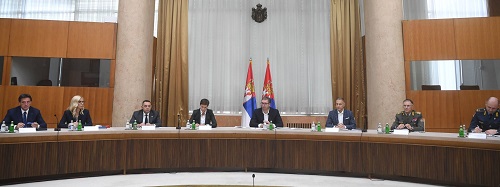
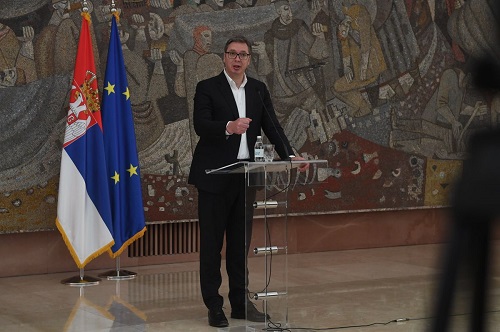
The President of the Republic of Serbia, Aleksandar Vučić has presided today over the session of the National Security Council, after which he said that Serbia asked for the withdrawal of all troupes which entered northern Kosovo and Metohija as well as the urgent response of the European Union to the question if the Brussels Agreement existed in legal transactions.
“The National Security Council has passed several decisions, conclusions, proposals and recommendations today. Primarily in compliance with the task, that the National Security Council is always in charge of, always to review the situation of the defense capacities of the Republic of Serbia, we analyzed the state and situation in the Serbian Armed Forces, Ministry of Interior and Serbian Police Forces, we perceived everything necessary to do everything necessary in the forthcoming period to strengthen our capacities in order to act with even greater force in the sense of the response to every threat of a potential terrorist attack. We discussed the technical things we need to improve. I am very pleased with the state, both of the combat readiness and the moral, motivation of the people to constantly improve our capacities. There is a major equipment of our armed and police forces ahead of us in the upcoming period, which was agreed long time ago”, said President Vučić and added that the situation in Kosovo and Metohija had been discussed, especially after the criminal action of the Priština regime and violent entrance to the north of the province using armored carrier and long pipes.
“We analyzed the situation and reached the conclusion. Serbia will continue to insist on the preservation of peace, full stability and security, but also the full security of the Serbian people in Kosovo and Metohija. We consider the statements in which Belgrade and Priština are presented as equal and the guild placed on both sides inappropriate. Serbia is always ready to continue the dialog in Brussels, but it will not accept solutions imposed by unilateral criminal activities”, said President Vučić and stated that the National Security Council sought an urgent response of the European Union to the question if the Brussels Agreement existed in legal transactions or not, when the SMC, which is the essence of this agreement would be formed. He said that he had discussed today with ambassadors of Quinta countries on how the “alleged compromise solution” should look like.
“I refused that solution because it is not a compromise, but the solution which would humiliate Serbia. By this decision, 70 percent of what the Albanians intended to do at the administrative border would be forgotten but 20 to 30 percent of other measures would be introduced. I received the consent of the National Security Council to refuse this solution. I rejected it because I am tired of the fait accompli policy. You cannot talk to Serbia like that”, said President Vučić and emphasized that the withdrawal of all troupes from northern Kosovo and Metohija was the only solution to this situation.
“The return to the previous state and then we can go to Brussels to discuss everything”, stated President Vučić adding that Serbia is always ready to discuss. He also said that Serbia invited the European Union, Great Britain and USA to influence Priština to annul the unlawful verdict to Ivan Todosijević.
“We consider this the following potential reason of a big crisis, maybe the biggest so far”, said President Vučić and explained that this verdict directly violates the Brussels Agreement because the Judge Council should have contained two Serbs and one Albanian, but such council had never been formed.
“Either Priština would revoke this verdict or we understood well that Priština has the support for the evacuation of the Serbs and Serbian families and in compliance with this we will respond differently”, said President Vučić. He announced that potential additional measures, which would be implemented by our country with the aim of the protection of its people and sovereignty, would be considered in next few days.
“We want to show good will and give time to some persons in Priština to change their bad decisions. If they don’t want it, we will pass measures with the aim of the protection of the interest of the Republic of Serbia and I informed about it also the members of Quinta and EU representatives”, said President Vučić and repeated that we would not accept the fait accompli policy.
Source: www.predsednik.rs
Photo: Dimitrije Goll
21st September, 2021 |
|
|
| Full EU membership Serbia’s key foreign policy priority |
|
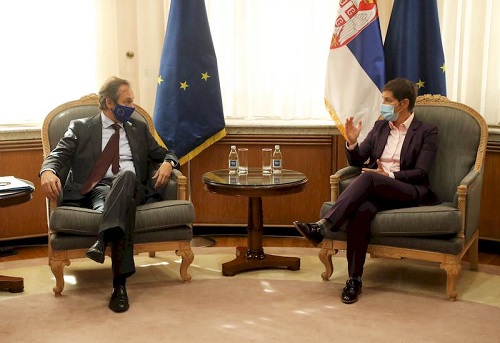
Prime Minister Ana Brnabic met today with new Head of the Delegation of the European Union to Serbia Emanuele Giaufret.
Brnabic welcomed the new EU ambassador, emphasising that a lot of joint work is ahead in achieving the set goals and that she is fully open to all proposals and suggestions in order to achieve results in the most efficient way.
The officials discussed the reforms that Serbia is implementing in the area of the rule of law and the green agenda, as well as the results of the reforms that the government is implementing in the economic field. The topic of conversation was also immunisation and the fight against COVID-19.
The Prime Minister pointed out that full membership in the EU is a key foreign policy priority of Serbia, and at the same time welcomed the adoption of the EU Economic and Investment Plan, as well as the proposal to increase financial resources within the IPA funds.
She also stressed that Serbia is working to open two clusters, in line with the progress made during Slovenia's EU presidency.
Brnabic emphasised that Serbia pursues the fight against organised crime and corruption in a transparent manner.
According to her, strengthening the economy remains one of the most important goals of the government, and the set priority for the next year is the employment of young people, especially those who would have their first job.
Ambassador Giaufret congratulated Brnabic on the achieved economic and business results, and emphasised that he is looking forward to joint work with the government of Serbia on the implementation of the country's priorities in order to accelerate Serbia's path to European integration, especially in the field of rule of law, environmental protection, digital agenda and connectivity as well as finding the most efficient way to achieve them.
Brnabic and Giaufret also discussed the freedom of the media, the attitude towards civil society and the inter-party dialogue between the representatives of the government and the opposition, with the mediation of the members of the European Parliament.
www.srbija.gov.rs
13 September 2021 |
|
|
| Selaković talked with the new head of the EU Delegation to Serbia |
|
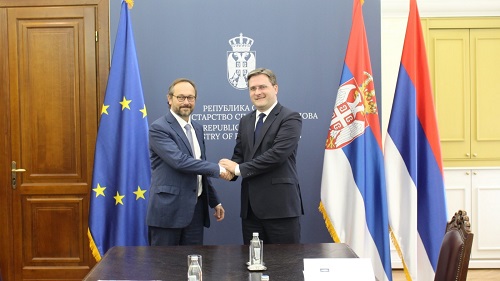
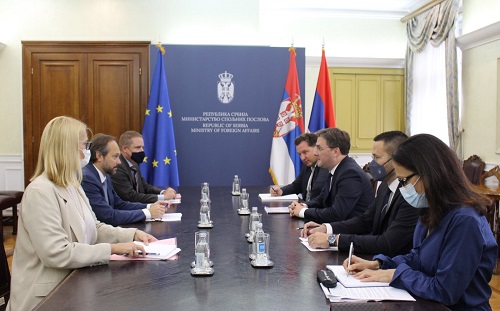
The Minister of Foreign Affairs of Serbia, Nikola Selaković, talked today with the new head of the EU Delegation to Serbia, Emanuele Giaufret.
Selaković congratulated his interlocutor and wished him a successful mandate, adding that he expected the continuation of good cooperation between Serbian institutions and the EU Delegation.
The Minister pointed out that EU membership is an absolute foreign policy priority and strategic commitment of our country, and that Serbia remains fully committed to the reform process.
He underlined that Serbia is open for the continuation of full cooperation with the EU, its institutions and member states, as well as for intensive work in order to progress and speed up the negotiation process.
Selaković emphasized that Serbia is fully committed to regional cooperation, preserving stability and security, and diplomatic resolution of open issues.
Speaking about the dialogue between Belgrade and Pristina, the Minister pointed out that dialogue and compromise are key to reaching a sustainable agreement, but also reminded that Pristina persistently does not fulfill its obligations from the Brussels Agreement and does not enable the establishment of the Association of Serbian Municipalities.
Selaković pointed out that it is necessary for Pristina to start implementing all the agreements reached, and said that we expect the European Union, as the guarantor of the Brussels Agreement, to firmly insist on that.
The EU has been Serbia's most important foreign trade partner for more than two decades, the minister said, adding that the assistance Serbia receives from the EU is key to our reform process.
Also, the minister pointed out that Serbia, in the conditions of a pandemic, achieved economic and financial stability through a responsible policy, as well as that statistical parameters show that the pandemic left less economic consequences on Serbia compared to most other European countries.
06. Sep 2021.
|
|
|
| Serbia's efforts to implement reforms and integrate into EU praised |
|
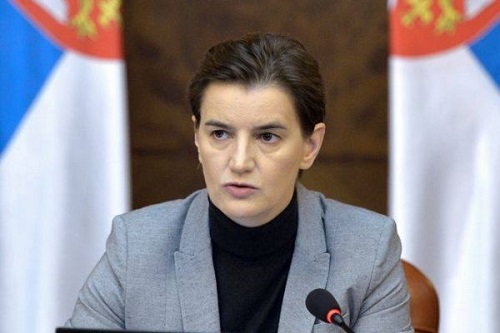
Prime Minister of the Republic of Serbia, Ana Brnabic talked today with Commissioner for Neighbourhood Policy and Enlargement Negotiations Oliver Varhely.
Brnabic expressed gratitude to Varhely for his personal engagement, emphasising that full membership in the European Union is Serbia's foreign policy priority and strategic commitment, as well as preserving stability, security and diplomatic resolution of outstanding issues.
She informed her interlocutor about the activities carried out in the field of fight against corruption, implementation of the media strategy and about the activities in the procedure of changing the Constitution, agreed with the Assembly of Serbia.
Presenting the results achieved by the government of Serbia in the areas of rule of law and judicial reform, the Prime Minister pointed out that these are the basic requirements in the accession process of Serbia and the European Union.
The meeting was attended by Minister for European Integration Jadranka Joksimovic, who informed the Commissioner about the activities carried out in the previous period, emphasising that Serbia is ready to open clusters three and four.
Varhely praised Serbia's efforts to implement reforms and integrate into the European Union.
www.srbija.gov.rs
2 September 2021 |
|
|
| Marking the Remembrance Day of all Serbs who died and were expelled in the armed operation "Storm" |
|
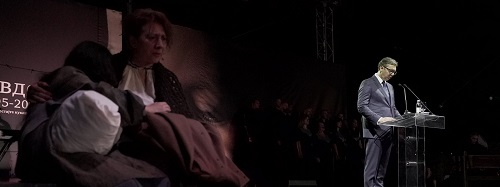
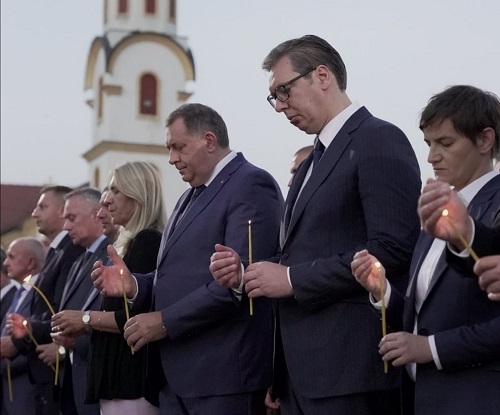
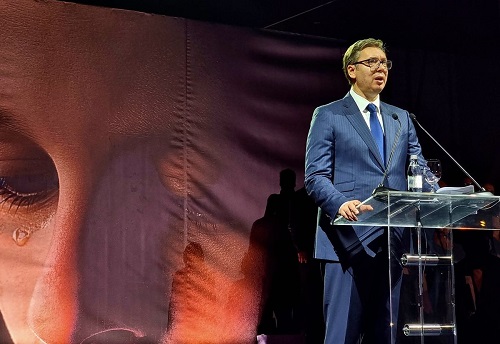
The President of the Republic of Serbia, Aleksandar Vučić, attended the marking of the Remembrance Day of all the victims and expelled Serbs in the armed operation "Storm" and said that Serbia remembers!
"Today, when we remind ourselves again of what happened in August 1995, the terrible pogrom, the expulsion of more than 250,000 Serbs, the exodus and ethnic cleansing, we, at the same time, and finally, remind ourselves of who we are, what we are, where we come from and where we are going. Thank you all for being here together tonight and for showing how much we love our people", said President Vučić, adding that we will not forget any of the things that the Krajina people had to go through.
"For us, these are not just terrible numbers of victims", said President Vučić and emphasized that Serbia will not forget.
"History has never been rewritten like today. That is why I want to remind us all not only of what others have done to us, not wanting us to exist, but also of what we have done to ourselves, just as if we ourselves did not want to exist", said the President, noting that we must never again allow Serbia to forget its silent heroes.
President Vučić emphasized that we must never again cover our eyes, ears, and mouths in front of something that truly was a pogrom and the downfall of all humanity.
"Pretending that this is not true, avoiding saying it, is a crime not only against the victims, but also against ourselves, every living Serb, people from Krajina, as well as Serbia and its future", said President Vučić and underlined that people can stand up straight and live with themselves and the others without hesitation, fear and doubt, only if they remember.
President Vučić pointed out that Serbia must fight for peace and cradles with children, as well as that not remembering annuls and erases us from the history and the future, depriving us of the right to tomorrow.
"Our mission is a happy future for us and for the new generations! Today's Serbia is based on a clear identity and a culture of remembrance", said President Vučić and reminded that everything that had been neglected for decades had been done, and that a strong Serbia has become the master of its own destiny.
"Eternal glory to you, Serbian martyrs who perished in the "Storm" and all other pogroms. Your children are in their Serbia, taken care of, loved and successful. Sleep peacefully, Serbian falcons, the future of your children is our vow", concluded President Vučić and thanked everyone who showed that night how much they love their country and that Serbia remembers.
Source: www.predsednik.rs
Photo: www.predsednik.rs
5 August 2021
|
|
|
| President Vučić: We have decided – our goal is the EU, but China is an important partner |
|
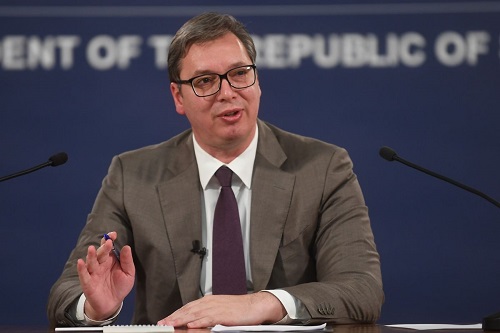
We have decided – our goal was and remains the EU, Serbian President Aleksandar Vučić said in an interview with the German daily "Handelsblatt", adding that there is no alternative for Serbia, but also stressing that China is an important partner for Serbia, and that the task of the state is to take care about the interests of its citizens.
He thus answered the question of what Serbia will choose once it has to choose between close relations with Beijing or the EU. Vučić emphasized that Serbia wants to become a full member of the EU.
"We are connected by history, common culture, EU members are already undoubtedly our most important partners", he explained and added that the trade exchange between Germany and China is 3,000 times higher than between Serbia and China, and, as he noted, even despite that, Serbia's business operations with China are portrayed as a problem.
To the statement that the German Chancellor Angela Merkel did not congratulate the 100th anniversary of the Communist Party of China, and that he did so, he replied that Serbia is not Germany, but a small country. On additional insistence on what Serbia will do if it has to choose between the EU and China, he underlined that Serbia has already decided, that its goal was and remains the EU membership.
"Our biggest investors are from the EU. The EU accounts for 67% of our trade while 17 percent of the trade is with countries of the region that are all on the way to the EU. We cannot survive without the EU", he added.
"But can we do a lot of good things with China – of course. And we do that, just like Germany does", Vučić pointed out, and to the remark that the quality of the Silk Road projects was being criticized, primarily because of Chinese workers, he answered that the quality of roads or bridges, which Serbia is building with China, is excellent.
"We give jobs to those who submit the best offer to us. That is why I tell Europeans who criticize Chinese projects in our country – offer us a project for one euro more and you will get it", he emphasized.
In that regard, he pointed out that Serbia is building a railway to Northern Macedonia with 600 million euros of EU aid, stating that that offer was better than China's.
"There is often talk of a 180-kilometer railway to Budapest through the territory of Serbia, which is financed by China. But the railway that is being built with the help of the EU from Belgrade to the northern Macedonian border is twice as long and no one is talking about it. It is all too political", he stated.
Asked whether he welcomes the plans of the EU and the USA regarding an alternative initiative to the Silk Road, Vučić said that he supports everything that brings advantages to our region.
"The Chinese want to expand their presence everywhere, but many processes in the West are, frankly, more efficient and without problems. We still have a lot to learn from the West, but we are getting there", Vučić said.
He pointed out that China was an important partner for Serbia and added that when the consolidation of state finances began in 2014, our country received good conditions from China for development projects.
He also stated that a competition for a copper mine was announced in eastern Serbia, at the request of the EU, that no European company had made an offer for six months, and that it had then been taken over by the Chinese.
"Our job is to take care of our people", he said.
He reminded that the Serbian economy grew by 52% in eight and a half years, which for the EU means that Serbia could be a strong member and engine for the entire region.
Explaining how Serbia is developing so well economically, he pointed out that Serbia has an excellent workforce, which speaks English, that society and administration are digitalized, and that it has the most flexible labor law in Europe, as well as consolidated public finances.
He reminded that previously the public debt was at 78% of GDP, and that today it has been reduced, thanks to the strong growth of the economy, to 52%.
"We can afford to give investors an incentive to come", he added, emphasizing that Serbia offers investment assistance, but that, for example, subsidies were not the motive for the arrival of the development center of the company Continental.
He pointed out that, five or six years ago, only Serbia started using the dual education system in this region, which Germany, Switzerland and Austria also use, that tens of thousands of people are in dual education, and that this is appreciated by foreign investors, who, in addition, can work closely with universities as well.
Germany, he stated, is the most important trade partner and the largest investor.
We started with the arrival of small textile companies from Turkey, and now primarily large German companies are coming. Today, 71,000 people work in German companies in Serbia", he explained.
Vučić said that the European perspective is very important for investors, stating that Nidek, Toyo Tires or Mitsubishi are coming from Japan to Serbia because our country is on a stable European path.
Asked if he believes that Serbia will become an EU member in the foreseeable future, he said that he does not complain.
"It is certain that if we had received 45 billion euros of EU aid, we would have been much further economically. Instead, we received 1.6 billion euros from the EU. We are used to achieving our successes on our own", said Vučić.
The President of Serbia reminded that in Croatia, salaries used to be 2.2 times higher than in Serbia, and today they are only 1.7 times higher.
"We are closing the gap with our own efforts. If we were to become a member of the EU, then we would certainly not ask for the biggest subsidies", he assures.
He said that the Serbian path follows the German path to Europe, and that Serbia wants a fair chance.
"I believe Merkel's words. She is at the end of her term and I would not have to praise her anymore. But she gave us stability, freedom of travel to the EU, helped us with the migrant crisis in 2015, and asked the Minister of Economy Altmeier and others to work closely with us", he reminded.
Asked if there were any indications that the new German government would support Serbia in the same way, Vučić expressed confidence that it would be the same.
"I know Armin Laschet, I talked to him while he was the Minister-President of North Rhine-Westphalia. He is very smart and understands the situation in the Balkans, and he will certainly continue Merkel's policy towards our region as the new chancellor", he added.
Vučić also expressed his belief that Russia, if Serbia's accession to the EU were concretized, would not react similarly as in the case of Ukraine, as this is a sovereign decision of Serbia.
To an additional question in this regard, Vučić pointed out that whenever he met with Vladimir Putin, and there were 18 or 19 meetings, he told him that he was grateful for the traditionally close friendship with Russia, but also that Serbia is on a clear course towards the EU.
"He asked if it was our choice and I answered that EU membership is indeed our goal", he added.
When it comes to "Kosovo", Vučić emphasized that a compromise is needed regarding this issue.
"Only in this way can there be sustainable peace. Serbia wants peace, me as well. Let's stop with the madness of the past. Only then can the whole region become the engine of new growth for Europe", said Vučić.
Source: Tanjug
22 July 2021
|
|
|
| Serbia has achieved great success in the field of digitalization |
|
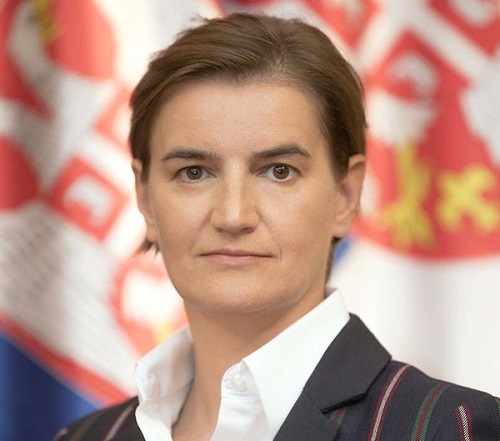
The Prime Minister of the Republic of Serbia, Ana Brnabić, stated at a gathering dedicated to digitalization and the IT sector, which was held in New York, that since she became Prime Minister, she is most proud of Serbia's success in the field of digitalization.
Brnabić, who is on a two-day visit to the United States, said that when she was elected Minister of Public Administration and Local Self-Government in August 2016, she wanted to do everything to change the public administration and what bothered her as a citizen.
She stated that, when she took office as Prime Minister, she knew what her priorities were and that first of all, digitalization needed to be raised to a higher level, that the education reform was supposed to begin, as well as work on strengthening the economy.
I believed in a country that believes in its people, because the Serbian people are creative. From 1 June 2017, we started working as an e-Government, i.e. we started exchanging data electronically, said the Prime Minister.
According to her, our citizens no longer had to go to, say, the Tax Administration, and since then, the public administration has exchanged 50 million documents, which means that citizens did not have to go from office to office for 50 million papers.
Brnabić pointed out that she is proud of what has been done in the field of education since she became the head of the Government, specifying that in September 2017, programming was introduced as a compulsory subject in primary schools.
Nobody believed that we could do that, but we cooperated with the private sector and some social organizations and we succeeded. At the moment, we are far ahead of numerous countries in Europe and the world, said the Prime Minister.
The Prime Minister pointed out that she was most proud when the cornerstone was laid for the science and technology park in southern Serbia, noting that so far, our country has four science and technology parks.
She pointed out that Serbia has since become one of the most successful countries in the world in the field of technology, and that according to some parameters, it is among the ten countries in the world, or among the five, assessing that this is proof that the country can change quickly.
Answering the question about vaccination, the Prime Minister emphasized that our country has never seen it as a geopolitical issue, but as a health issue.
According to her, Serbia talked with producers from both the East and the West and was among the first European countries to sign agreements with the company Pfizer-BioNTech and Sinopharm.
Unfortunately, many countries have viewed this issue as geopolitical. It did not matter to us, as long as the vaccines were safe, the Prime Minister emphasized and added that this was not the end of Serbia's success, because good organization was also needed.
Brnabić explained that the organization is another important thing in vaccination, because it is a logistically very difficult process, adding that, with the help of digitalization, success has been achieved and that everything we did in the previous years has paid off.
She stated that Serbia quickly established a system through which citizens could express interest in vaccination against the coronavirus and choose which vaccine they wanted to receive, as well as to be informed by a message when to go and get vaccinated.
Now I can log in on my phone, to see how many people have received the vaccine, how many more have registered, so that the effects of digitalization are obvious. We have made everything very efficient and easy for our citizens, the Prime Minister explained.
Answering the question of what she can tell other countries of the world about how to progress faster, Brnabić said that it is important to invest as much as possible in digitalization and education.
You need to teach children how to think, not what to think. Not all children will become IT experts, but what they can learn is an algorithmic way of thinking and how to make decisions, she said.
The Prime Minister mentioned investing in high-speed internet and providing infrastructure for start-ups as an important thing for progress, because more and more economies will be based on start-ups and innovations, emphasizing that people should be helped to start companies and implement their ideas.
Speaking about social networks, she pointed out that fake news has become the biggest problem on these networks and that it will remain so for some time.
This is the biggest challenge I face as Prime Minister, especially during the corona virus pandemic, she said, adding that social networks are also a great opportunity for politicians to communicate with citizens.
Source: www.srbija.gov.rs
Photo: www.srbija.gov.rs
20 July 2021 |
|
|
| IPA funds very important for accelerating reforms in Serbia |
|
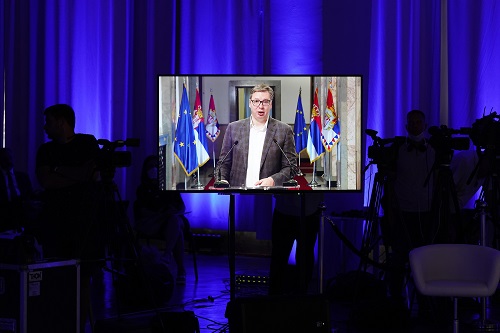
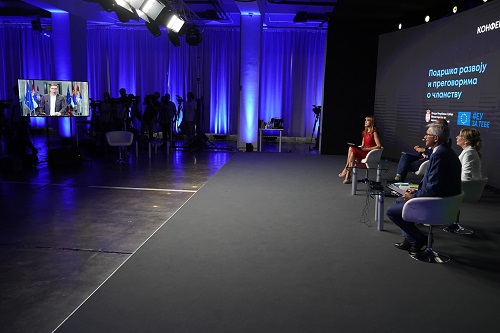
President of Serbia Aleksandar Vucic said today that the EU's financial support through pre-accession funds is important because these funds are used to accelerate reforms and reach the ultimate goal – full EU membership, and thus increase the quality of life of the citizens of Serbia, which also applies to the citizens of the EU.
In his online address at the conference on the results and possibilities of IPA funds in Serbia, entitled "Serbia and the EU: support for development and membership negotiations", organised by the Ministry of European Integration, Vucic said that we appreciate every euro that came to our country from the European Union.
He added that he believes that so far we have acted responsibly towards the assistance that is available to us as a country that is in the process of accession.
According to him, the negotiations on membership and the reforms that are being carried out within those negotiations are a significant impetus for our economic and social progress, but they are also a condition for further sustainable development and development as a whole.
It is important for us, he emphasised, that all projects that will be financed from future IPA projects 2021 2027 in agreement with the EU focus on what is in line with our national reform goals and what can contribute to sustainable development in the entire region.
Minister for European Integration Jadranka Joksimovic pointed out that the IPA 3 fund aims to reduce the differences between the region of the Western Balkans and the European Union.
IPA 3, out of the total amount of 42.4 percent, will be focused on the green agenda and sustainable connection, and it is completely clear how important this topic is for all of us in Serbia, said the Minister.
In a written statement for the conference, European Commissioner for Enlargement Oliver Varhely said that the European Union wants to accelerate the enlargement process, which for Serbia means the opening of two clusters in the accession negotiations already this year.
Enlargement policy remains at the centre of our activities and we want to speed it up, Varhely said, adding that Serbia plays a key role in the region and Europe and that the Western Balkans is one of the EU's top priorities.
The economic investment plan adopted by the EU for the Western Balkans, as he emphasised, should help the region to transform and get out of the crisis stronger.
Head of the EU Delegation to Serbia Sam Fabrizi pointed out that within IPA 2, in the period from 2014 to 2020, Serbia received 1.5 billion euros and another €900 million from regional projects that were done in Serbia.
About 40 percent of those funds were used in the area of rule of law reform and good governance, 40 percent of the funds were spent on economic and social development, and about 20 percent on emergencies, such as floods, the migrant crisis and the pandemic.
Source: www.srbija.gov.rs
Photo: Tanjug
15 July 2021 |
|
|
| Serbia strongly supports Berlin Process |
|
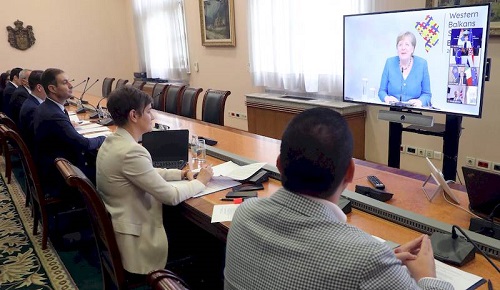
Prime Minister Ana Brnabic participated today in the online Summit of Leaders of the Berlin Process, which discussed the concrete results achieved during its seven-year term, plans for the next period and initiatives aimed at providing support Western Balkans on its way to the European Union.
The focus of the summit was on building a common regional market related to four fundamental freedoms: free movement of people, goods, services and capital, for which the Action Plan was adopted in November last year, and from which the region would have special benefits.
The summit said that the transport and energy infrastructure has been expanded in recent years and connected to the roads of the European Union, and praised the implementation of the agreement on the abolition of roaming fees in the Western Balkans, which began this month.
An important project of the process is the Regional Office for Youth Cooperation (RYCO) in order to connect and build understanding and tolerance in the region.
The activities of the Regional Cooperation Council (RCC) and the Secretariat of the Central European Free Trade Agreement (CEFTA) were also praised for their efforts to implement the Common Regional Market Action Plan.
Assessing that the Berlin Process is firmly based on the fundamental belief that the economy of the Western Balkans is part of Europe, German Chancellor Angela Merkel pointed out that it greatly contributes to stability and connecting the Western Balkans region, which is also in the interest of the European Union.
In her address today, Prime Minister Ana Brnabic thanked German Chancellor Angela Merkel for her strong support and active approach to regional cooperation.
Thanks to the support of Germany and Chancellor Merkel, but also to the internal initiatives of the representatives of Serbia, Albania and North Macedonia, the Prime Minister explained, the implementation of the Action Plan will enable further expansion of economic and trade cooperation in the region, which will make it more attractive for foreign investors.
Brnabic pointed out that Serbia strongly supports the Berlin Process, not only for the purpose of economic development of the region, but also as an idea of connecting and unifying the Western Balkans and its approach to the European Union.
She concluded that support in the region was particularly visible through solidarity with neighbours during the pandemic and assistance with vaccines and medical equipment.
The summit, opened by German Chancellor Angela Merkel, was attended not only by representatives of the region, but also by Slovene Prime Minister Janez Jansa, European Commission President Ursula von der Layen, Austrian Chancellor Sebastian Kurz, French President Emanuel Macron, Italian Prime Minister Mario Draghi and Polish Prime Minister Mateusz Jakub Moravjecki and Secretary General of the Regional Cooperation Council (RCC) Majlinda Bregu.
Source: www.srbija.gov.rs
Photo: www.srbija.gov.rs
5 July 2021
|
|
|
| Continuation of European integration along cooperation with countries of region |
|
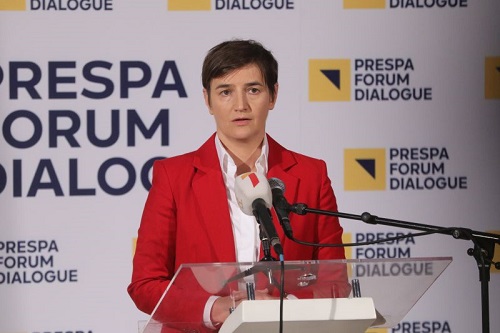
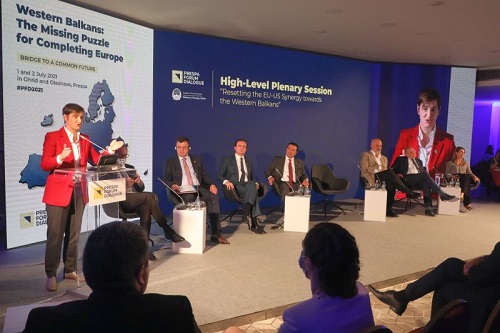
Prime Minister Ana Brnabic said today that the Western Balkans region should continue with European integration, but that it should also focus on regional cooperation that can improve the quality of life of citizens.
Speaking at the Prespa Forum in Ohrid, Brnabic stated that today's abolition of roaming tariffs among mobile operators is one of the concrete things that citizens benefit from, pointing out that difficult political issues should be kept in mind, such as the dialogue between Belgrade and Pristina, but that there are so many other things that can be done for citizens.
We owe that to future generations, the Prime Minister said, adding that the continuation of quarrels in the region does not bring good to anyone.
At the panel, at which topic was the synergy of the European Union and the United States, she reiterated that Serbia is a country that is committed to European, but not Atlantic integration, adding that in that matter, it differs from other countries, except Bosnia and Herzegovina.
We want to enter the European Union, but not NATO. We are a military-neutral state that has great bilateral relations with the United States of America in all fields, Brnabic underlined.
The Prime Minister commented on the statement of Albanian Prime Minister Edi Rama that he is no longer frustrated and depressed because of the dynamics of European integration by saying that no one is frustrated any more and that this brings some new things in terms of regional cooperation.
All countries must continue to do what is needed in terms of continuing the European path, but also to cooperate regionally, because they have an influence on that, she said.
Whatever you do, it all comes down to the fact that each EU Member State individually decides whether progress has been made, and that is becoming an increasingly complex and complicated process day by day, the Prime Minister stated.
According to her, it is no longer a question of European values, progress in key areas and bilateral issues, but of "linguistics and history".
In addition to Brnabic, Albanian Prime Minister Edi Rama, Prime Minister of the Provisional Institutions in Pristina Albin Kurti and others also took part in the panel.
Source: www.srbija.gov.rs
Photo: www.srbija.gov.rs
2 July 2021 |
|
|
| President Vučić participates in the Mini Schengen conference |
|
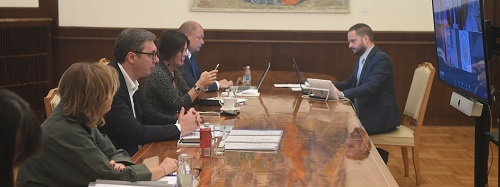
President of the Republic of Serbia Aleksandar Vučić participated today via a video link in the conference "Mini Schengen" with the Prime Minister of the Republic of Albania, Edi Rama, and the Prime Minister of the Republic of North Macedonia, Zoran Zaev. The officials discussed further steps in regional cooperation, as a process vital to the progress of the Western Balkans and the European path as a whole.
The interlocutors agreed that the countries of the Western Balkans need membership in the European Union, but also that the European Union needs the Western Balkans just as much since the region is surrounded by EU borders and the countries aspiring to membership share common European values.
The President of Serbia and the Prime Ministers of Albania and North Macedonia have expressed the wish that the four European freedoms - the movement of people, goods, services and capital, begin to be implemented as soon as possible throughout the region, and that in this context they will provide full support to the regional common market at the Berlin Process Summit to be held on the 5th July.
"We are aware that only by working together and accepting regional cooperation within various regional initiatives such as the common market, regional Schengen, green corridors or the Berlin Process, can we bring our economies closer, increase the well-being of our people and bring in large investments that would otherwise not be possible for any of us individually", is one of the joint conclusions of this video conference.
The interlocutors agreed to meet in Skopje on July 29th to review the progress in the implementation of existing initiatives and projects and to sign additional agreements between the three countries related to the implementation of the Berlin Process commitments, as well as cooperation and assistance in the event of natural disasters and relief measures for trade, export and import.
"We call on and encourage our colleagues from the region to sign and implement similar agreements, so that the vision of a common political and economic space across the Western Balkans would soon, through the single market, become an important part of our citizens' daily lives," said the Serbian President and Prime Ministers of Albania and North Macedonia.
The interlocutors pointed out that despite the delays in the enlargement process, they will continue to try to identify new ways, policy areas and financial instruments for all three countries to increase their contribution to Europe, strengthen ties with the European Union and gradually integrate the region into the single European market.
Speaking on the Green Agenda, the interlocutors issued a joint call to the European Union and the United States to join countries across the region to support the development of projects that could be invested as soon as possible to improve environmental protection and increase the widespread use of renewables as part of the EU Economic and Investment Plan implementation and the Green Agenda for the Western Balkans.
"Our countries have a huge potential for sustainable growth and development of this sector. We will ask for practical support to find out which projects can improve our region in terms of renewable energy sources for our citizens and for the green energy future of the EU ", said the interlocutors during the "Mini Schengen" video conference and concluded that only regional connecting, with the EU support, can contribute to the overall stability and progress of the entire region and Europe.
Source: www.predsednik.rs
Photo: www.predsednik.rs
29th June 2021
|
|
|
| Cluster 1 opened, conditions for new openings met |
|
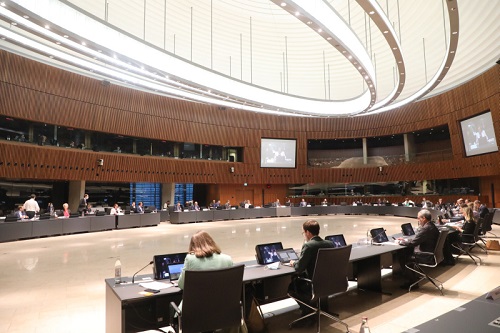
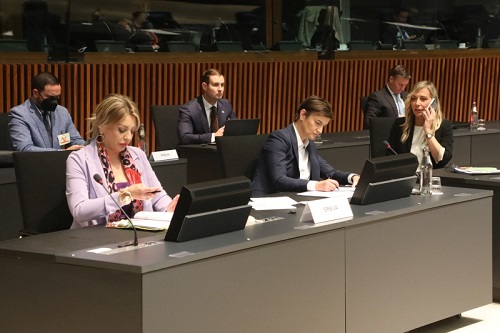
Prime Minister Ana Brnabic stated tonight, after the EU-Serbia Intergovernmental Conference, that she can confirm that cluster 1 on the basic values has been opened, which is one of the most important within the new methodology accession, as well as that Serbia has fulfilled everything that is expected of it for the opening of clusters 3 and 4.
Brnabic pointed out that Serbia continues with reforms with a focus on the rule of law and expressed hope that two more clusters will be opened during Slovenia's presidency by the end of this year.
We have heard from a significant number of member states that they will support us, and I guaranteed that this progress will continue, because we are doing everything we can for the benefit of our country and the citizens of Serbia, she said.
The Prime Minister expressed gratitude to Portugal for its presidency and support for Serbia on its path to EU membership.
Minister for European Integration Jadranka Joksimovic announced that the application of the new methodology to our negotiation process began today, and that Serbia has in fact opened cluster 1, which refers to the basics of the rule of law.
She explained that at the political intergovernmental conference at the highest level, our side stated that Serbia has already actually opened cluster 1 with the fact that five out of five chapters have already been opened.
According to her, that is certainly an important impulse for us and we will continue to work further.
EU Enlargement Commissioner Oliver Varhelyi said that talks were held with Prime Minister Brnabic on essential issues, and that Serbia has made enviable progress in the area of the rule of law, but that additional results are expected from it.
He said that a "new momentum" has been created and confirmed that the Commission is ready to strengthen the dynamics of the accession process during Slovenia's presidency.
We expect more results from Serbia, and that is a strong message that the Prime Minister heard from all of us tonight, Varhelyi pointed out and said that everyone from the Enlargement Commission is ready to help Serbia progress faster towards the EU.
www.srbija.gov.rs
22 June 2021
|
|
|
| Address by the President of the Republic of Serbia at the session of the United Nations Security Council |
|
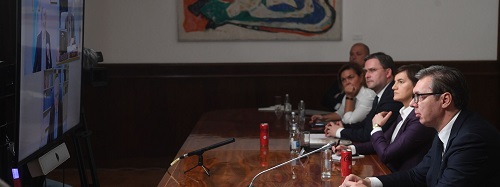
Dear Mr. President, ladies and gentlemen, members of the delegations
I would point to a few ongoing issues in my speech that refer to the competences of the Mechanism, namely, the possibility of serving the sentences passed by the ICTY and Mechanism in the Republic of Serbia, with the current practice of disabling early release of the sentenced persons as well as obligation of the Mechanism regarding protection of sentenced persons.
The second part of the speech will be dedicated to issues that are opened by the six –month Report on the work of the Mechanism by Mechanism President Mr. Agius and Report by the Chief Prosecutor Mr. Serge Brammertz, especially regarding current cooperation of the Republic of Serbia and the Mechanism.
The third part of my speech, and I noticed that in many of your statements even today, is going to be the view of Serbia on everything that took place in The Hague Tribunal and what the Tribunal verdicts brought to people in the region of former Yugoslavia.
The Republic of Serbia has initiated before the Security Council, on several occasions, the issue of possibility of serving sentences passed by the ICTY and Mechanism in the Republic of Serbia. Beside the efforts to move this issue from “square one”, not a single response was obtained from the Security Council. The majority of persons that are serving their prison sentences are citizens of the Republic of Serbia, and it comes naturally that the Republic of Serbia is interested in enabling them to serve their prison sentences in the Republic of Serbia.
ICTY and the Mechanism are making references to the Security Council as an institution in charge of dealing with this issue.
I am ready to reiterate here the readiness of the Republic of Serbia to take over obligations and liability for executing prison sentences that the Tribunal or Mechanism passed on the citizens of the Republic of Serbia, under the monitoring of the Mechanism and full respect for the authority of the Mechanism regarding early release.
Mr. President
A particular problem that we are facing with is disturbance by the judicial institutions established in the territory of Kosovo and Metohija, which is within Serbia and which is under Interim Administration of the UN. We are witnesses of attempts of retrial for two citizens that are serving their prison sentences for which they had already been trialed before the ICTY. More concretely, in previous period there was an attempt for hearing of Nebojša Pavković and for obtaining extradition of Vlastimir Đorđević.
I urge on the Mechanism and Security Council to prevent attempts of violation of the principle ne bis in idem, a civilization principle that was confirmed in Article 7 (1) of the Statute of the Mechanism and to disable retrials for persons already convicted by the ICTY, particularly to make sure that it is not done in the territory which is under interim UN administration.
Mr. President,
President of the Mechanism (Mr. Carmel Agius), apart from the regular Report, delivered also on 11 May 2021 a letter to the President of the Security Council, whose subject is the alleged omission of the Republic of Serbia to apprehend and turn over to the Mechanism Petar Jojić and Vjerica Radeta, indicted of contempt of court, claiming that in this way the Republic of Serbia was acting contrary to its obligations towards the UNSC Resolution 1966 (2010) and asking the Security Council to take measures in order to ensure that Serbia meets the alleged obligations in accordance with the Mechanism Statue and Resolution 1966.
The point of the argumentation of the President of the Mechanism comes to that that the Republic of Serbia has the obligation to deprive of liberty and extradite to the Mechanism its citizens accused of contempt of court, regardless of the nature of accusation, circumstances under which such an order was made and consequences that might result from its implementation.
It is about accusations that do not refer to sever violations of international humanitarian law and that are related to a case before the ICTY, which ended in 2018 (Vojislav Šešelj case), by acquitting the defendant in the first instance, and upon the Prosecutor’s complaint the defendant was declared guilty and sentenced to a 10-year imprisonment, which was covered by the time he spent at the UN Detention Unit.
Judge Agius states that Serbia ignores its obligations in accordance with the Resolution 1966 (2010). Quite the opposite- the Republic of Serbia takes seriously its obligations regarding cooperation with the Mechanism. After the warrant for apprehension and extradition of the two persons accused of contempt of court to the Mechanism had been introduced, the Higher Court in Belgrade established that assumptions for their apprehension and extradition to the Mechanism had not been met. The decision is founded on the rules of international law and domestic law of the Republic of Serbia and it is mandatory for holders of the executive power in the Republic of Serbia.
I would remind here that the first decision of a sole judge (Aydin Sefa Akay, 12 June 2018), that was acting in this case was that the criminal prosecution of V. Radeta and P. Jojić for alleged contempt of court was to be forwarded to the judicial authorities of the Republic of Serbia. In procedures that followed, the argument of the alleged unwillingness of the witnesses to cooperate with the judicial authorities of the Republic of Serbia was stated for the first time, and the decision on deprivation of transferring the case to the jurisdiction of the judicial authorities of the Republic of Serbia was based on the respective argument.
The Republic of Serbia expressed its readiness to take over the court procedure against Petar Jojić and Vjerica Radeta on several occasions and it provided appropriate guarantees. Additionally, the Republic of Serbia fully recognizes and accepts the obligation of the Mechanism to monitor trials that were transferred to national courts with the help of international and regional organizations, as well as to take measures envisaged by Article 6 of the Statute of the Mechanism.
I would remind here that the Republic of Serbia extradited to the tribunal all the persons indicted by the Prosecutor’s Office, and among the respective mostly highest political, military and police officials; it enabled presence of vast number of witnesses, delivered extensive documentation. Obligation of the Mechanism, in accordance with the Resolution of this Security Council, is to take measures that enable transfer of cases to national justice system. In previous practice, 13 cases were transferred to Bosnia and Herzegovina, 2 to Croatia and only one to Serbia.
The last but not the least, I want to remind all of you here of the fact that France- of course as a sovereign and independent country- upon request for apprehension and extradition of Florence Altman for publishing documents and contempt of court, refused the request for extradition, with an explanation that it does not extradite its citizens. For far smaller offence you ask as to extradite our citizens Jojic and Radeta, showing both the distrust to Serbian justice and judiciary and Serbian State, as well as a fact that the rule from ancient Rome is still valid – quod licet lovi non licet bovi.
It does not harm to underline that high-level officers and politicians were not trialed for crimes against Serbs, and that crimes against Serbs remained unsanctioned before ICTY and Mechanism. Let me remind you, just as an example that Ademi and Norac case for ferocious crimes against Serb civilians in Medački Džep was left to Croatian justice institutions. Proven crimes against Serbs, like those of Ramuš Haradinaj, Naser Orić, then Ante Gotovina and other indicted for military operation “Storm” that led to a complete ethnic cleansing of Serb population in the big part of today’s Croatia, resulted before the ICTY in acquittals. Many horrible crimes against Serb civilians that were committed in the territory of Bosnia and Herzegovina, Croatia and the Autonomous Province of Kosovo and Metohija, and that resulted in ethnic cleansing, simply were not the subject of interest of the ICTY.
What’s very important and not to leave anything unclear, Serbia is a country that condemns all crimes and all criminals who perpetrated them in the region of former Yugoslavia. However, it is interesting that despite often criticism Serbia is the only one that speaks openly and condemns crimes perpetrated by Serb nationals, while in other regional countries they do not speak at all about crimes that representatives of those nations committed against members of Serbian people.
And I want to emphasize once again here in front of you that Serbia condemns terrible crime in Srebrenica and extends its deepest condolences to the families of all killed in that massacre. And there are no “buts” about the respective.
Nevertheless, we are here to analyze results and penal policy of ICTY and the Mechanism and it was such that it has never gained trust among Serbian people, no matter where they live. And not because we Serbs do not acknowledge crime committed by some of our compatriots, but because The Hague Tribunal, with exceptions, was judging only to Serbs and in all three territories of former Yugoslavia- Croatia, Bosnia and Herzegovina and Kosovo and Metohija, which some of the SC Member States see and name of course, contrary to law and legal norms and UN Resolutions, as an independent state. I would try to plastically prove to you how The Hague justice was tailored even though I know that it will not come to understanding of many of you, but to me it is important because of the history, facts, and school books that will be made in accordance with the facts.
Namely, Serbs were sentenced to totally 1138 years of imprisonment, and to 8 life imprisonments. At the same time, The Hague Tribunal did not sentence a single Croat for crimes against Serbs, neither in actions Medački Džep, nor Flash and Storm. How politically cunning it was done in the Tribunal, and all wrapped in the form of law and justice. Prosecutors of The Hague Tribunal chose on purpose three military and political leaders of Croats, Bosniac Muslims and Albanians, on all three mentioned territories, committed against Serbs. – Ante Gotovina, Naser Orić and Ramuš Haradinaj. It is interesting that following the same pattern, the same pattern, this injustice was shared. Namely, all of them were sentenced in the first instance procedure, with the exception of Ramuš Haradinaj, because not a single witness survived. Gotovina was sentenced to 24 years’ imprisonment in first-instance procedure, while by a mysterious decision of the second instance council and 3:2 judge ratio, the verdict was changed to acquittal. Naser Orić, for crimes against Serbs, was also sentenced in first instance verdict, but by a mysterious decision of the second instance court, and again 3:2 ratio decision was an acquittal and he was set free of any liability. Let me reiterate, all witnesses in process against Ramus Haradinaj, either committed suicide or were killed under very, very strange circumstances.
Let me conclude, I do not want to believe that someone wants to say that there had been no crimes against Serbs, but judging by the verdicts of The Hague Tribunal, no one- absolutely no one- is responsible for those crimes.
Nevertheless, we in Serbia will show responsibility and we will fight for peace, stability and reconciliation in the region.
We ask UN Security Council Member States to help us with rational and pragmatic approach and respect for international law and not by attempts of further humiliation of Serbia. Serbia is a small country, with proud and courageous people, the one that gave the biggest sacrifice during the WWI and WWII; people who wants to leave in peace with their neighbors. And when I am asking you for this, I do not think I am asking for too much.
At the very end, Serbia is the fastest growing country of the Western Balkans region and we cannot progress unless our relations with neighbors, friends and other countries are good, solid and better. That is why- despite the selective justice that was applied in The Hague Tribunal- we will be open for any dialogue, any kind of cooperation and we will look towards the future and not towards the past. And I have only one message for the citizens of Serbia and citizens of Serbian nationality in the entire region- keep your heads up, neither Serbia nor Serbian people are convicted of anything and it is up to us to work even more diligently, to open factories and to fight for our children and our future.
Long Live Serbia!
09. June 2021. |
|
|
| Selakovic: Serbia attaches great importance to the Berlin Process and regional cooperation |
|
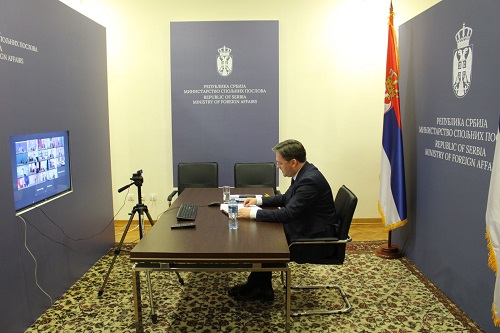
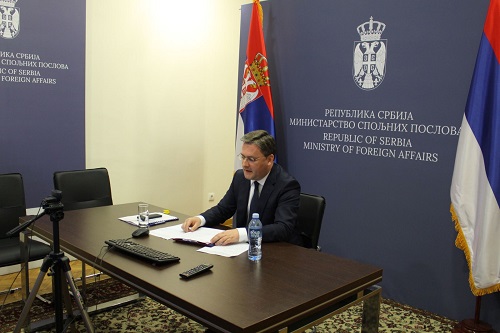
Minister of Foreign Affairs of the Republic of Serbia Nikola Selakovic participated today in an online meeting of Ministers of Foreign Affairs of the Berlin Process participants.
Selakovic pointed out that Serbia attached great importance to this initiative which proved to be a good forum for strengthening regional cooperation and development, promoting a policy of reconciliation and overcoming inherited problems from the past.
“Serbia will always advocate a policy of peace and connectivity, because that is the only way to create the stability that is a precondition for economic growth and progress. Unfortunately, some have not yet grasped the real meaning and essence of the Berlin Process, and they should first start to respect their internationally assumed obligations such as the Agreement on Regional Representation", Selakovic said, reacting to the fact that the Pristina representative displayed a flag of the self-proclaimed "Kosovo".
He added that the Berlin Process provided support to the EU integration of the Western Balkans through concrete projects and measures, and underlined in particular that it was the backbone of regional cooperation focused on economic connectivity, which was in line with the foreign policy orientation of the Serbian Government.
“With a responsible and well-designed economic policy, Serbia has achieved the highest growth in the region, and according to the GDP growth rate in the first quarter of 2021 of +1.7%, our country ranks first in Europe”, the Minister underlined.
As the most current example of cooperation in this initiative the Minister pointed out the establishment of the Common Regional Market in the Western Balkans.
“Serbia welcomes the Common Regional Market Action Plan. This document is largely based on concrete proposals stemming from an initiative launched by Serbian President Aleksandar Vucic in cooperation with the Prime Ministers of Albania and North Macedonia”, Selakovic said and added that its application would expand the possibilities for improving economic cooperation in the region.
Furthermore, he reflected on the decision to establish “Green Lanes” which enabled medical equipment and food to be transported unhindered through the region in the crisis caused by the Covid-19 pandemic, without delays at border and administrative crossings.
“Serbia has also demonstrated its commitment to improving regional cooperation by showing solidarity with its neighbours in the region, through the delivery of vaccine shipments and by enabling vaccination in Serbia, including for the secretariats of regional initiatives in which Serbia participates”, the Serbian Foreign Minister emphasized.
Selakovic also pointed to other concrete results of regional cooperation within this initiative, such as the Regional Youth Cooperation Office, the Southeast Europe Transport Community, with the seat in Belgrade, the Western Balkans Chamber Investment Forum and the Agreement on the Price Reduction of the Roaming Services in the Western Balkan region.
Selakovic took the opportunity to reiterate that full membership of the EU was the key foreign policy and strategic goal of Serbia. He also pointed out that the enlargement policy was one of the most successful EU policies, that this course should be maintained, and concluded that Serbia and the entire region belonged in the EU.
The meeting was held as part of the German presidency of this initiative in the form of a video conference.
In his statement, Selakovic thanked Germany and Minister Maas for the strong support they extended to the entire Western Balkans, stating that it was this commitment that contributed to connectivity and deepening the cooperation in the region.
“The vision and support of Germany and Chancellor Merkel personally, expressed almost seven years ago, when the Berlin Process was launched, significantly contributed to the creation of the necessary conditions for closer connectivity in our region”, Selakovic said and added that the support and active approach of German partners were of inestimable importance. Furthermore, the Serbian Foreign Minister said that it was very important that other members of the European Union had also recognized the importance of the Berlin Process.
8 June 2021
|
|
|
| THE EUROPEAN CAPITAL OF CULTURE TITLE PASSED TO NOVI SAD |
|
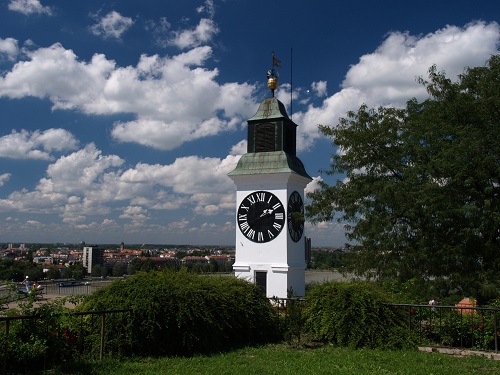
The European Capital of Culture title was passed to the cities that will be its bearers in 2022 – Novi Sad (Serbia), Esch-sur-Alzette (Luxembourg) and Kaunas (Lithuania). The title was handed over by Croatian Rijeka and Irish Galway, and the gala handover ceremony, due to the coronavirus pandemic, was held online, i.e., broadcast on the Irish television network ‘TG4’.
Our slogan ‘4 New Bridges’ stems from the identity of the city of Novi Sad, since the bridges had a significant role in its turbulent history. The programme of the ‘European Capital of Culture’, building bridges, the indestructible ones, within which people and processes create new spaces and programmes, permanent legacies, rest upon this fact. These are the bridges we build between the cities as well – the former, future and the present European Capitals of Culture, whose foundations are formed by long-term processes and strengthening capacities of different stakeholders. Bridges that connect us as the cities – capitals of culture set our local cultural heritage within the framework of European values and European cultural heritage. In this manner, we work on our joint future without forgetting about our past,’ said Nemanja Milenković, CEO of the ‘Novi Sad – European Capital of Culture Foundation.
The gala opening of the title year in Novi Sad is planned for 13 January 2022 while the closing ceremony will be on 31 December 2022..
Let us remind you that Novi Sad is the first city from the EU candidate countries that became the European Capital of Culture and thus found itself among more than 60 cities holding this prestigious title. |
|
|
| Minister Selaković presented the new e-Consulate service |
|
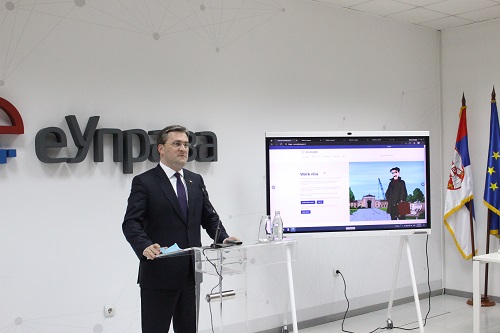
A new service of the Ministry of Foreign Affairs "e-Consulate" was presented in Belgrade today, intended for foreign citizens who apply for a visa and aspire to come to Serbia to work.
On that occasion, Minister of Foreign Affairs of the Republic of Serbia Nikola Selakovic said that this service was one of the indicators of good development of our country, which, as he pointed out, was becoming a magnet for serious foreign companies, which brought a large number of workers from other countries to work in Serbia.
"Not to be pretentious, but completely realistic, this service represents a turning point in the functioning of our system. E-Consulate and digitalization of the procedure for issuing work visas for foreign citizens who want to work in Serbia, is the first electronic service offered by the Foreign Ministry, and I can promise you that this is indeed our first, but by no means the last e-service", Selakovic emphasized.
The Head of Serbian diplomacy pointed out that "e-Consulate" reflected the modernization of an extremely important segment of the activities of diplomatic and consular missions of Serbia, and that we were actually talking about something that was essential for the further development processes of our country.
The Minister recalled that, when the President of the Republic visited the construction site of the Moravian Corridor, he was told that some construction works were delayed because Bechtel company was not issued work visas on time.
“The moment we saw that and heard the President, I alerted the services in the Ministry. We were surprised, as we knew that the issuance of visas in Turkey had a good dynamic, and then we determined that it was actually workers from Bangladesh who applied for a visa through our Embassy in India, where we have a problem with staff shortage”, the Minister explained.
As he added, this is a demanding and laborious task, each of our employees had to receive the documentation on paper, check it, then request additional information, and only then forward it.
"Today, this has been fantastically perfected for our consular officers, all that documentation is submitted in electronic form. We used to have two filters to check the documentation, now we actually have three. And the work is significantly more efficient", Selakovic pointed out.
As he emphasized, this is a service which was promised less than four months ago and it becomes available on Monday, in 95 diplomatic and consular missions of Serbia, i.e. in all our embassies and consulates general.
The biggest result of that endeavor, the Minister pointed out, apart from the advantage it would bring in the future work, was the fact that it was not a project of one state body, but a joint endeavor of the Ministry of Foreign Affairs, IT and eGovernment Office, General Secretariat of the Government, Ministry of the Interior, Ministry of Labor, Employment, Veterans and Social Affairs, National Employment Service.
“We did an extremely good job in record time. This is to the pride of our Ministry, to the pride of the entire state. I am convinced that in the period ahead, we will further modernize our affairs and make Serbia one of the few countries that has such mechanisms and such state-of-the-art provision of consular services", Selakovic said.
Speaking about the "e-Consulate" portal itself, the Minister explained that there is a cartoon of Nikola Tesla and the building of the old railway station with one crane, which actually symbolizes a historical fact - that Tesla was in Belgrade in the year when it was built.
"Today it is the place behind which the Belgrade of the future is rising, and what we managed to do together is an indicator of something that is the future of Serbia, the development of artificial intelligence, IT and creating conditions for more people to live and arrive here in Serbia in the future seeking good life and employment", concluded the Minister.
The Director of the Office for IT and eGovernment, Mihailo Jovanovic, said that this was the first time that e-services were focused on foreign citizens, which was the case with our citizens so far.
In the period from 1 January 2019 to 17 May this year, the most applications for Serbian visas were submitted at the Embassy in Beijing, 6,766 applications, then in New Delhi - 2,973, Shanghai 2,115, Tokyo 1,798, and Cairo 1,756.
In that period, 1,270 requests were submitted in Algiers, 1,095 in Jakarta, and 1,077 in Beirut.
In terms of their nationality, Serbian D visa for employment is most requested by citizens of China - 9,516 applications, followed by India 1,955, and Ukraine - 673.
20 May 2021
|
|
|
| Prime Minister Ana Brnabić at a working dinner with WB leaders |
|
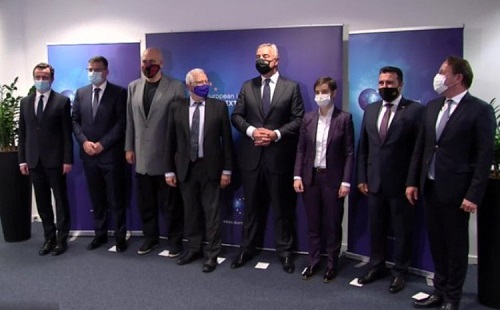
Prime Minister of the Republic of Serbia Ms. Ana Brnabić participated at a traditional dinner of six leaders from the Western Balkans, held on May 18, 2021, hosted by the EU High Representative for Foreign Affairs and Vice President of the European Commission Josep Borrell.
According to Prime Minister Brnabic, important political and economic issues were discussed at the meeting. WB leaders agreed that they should focus on the future and what they can do to make the citizens of the region live better.
May 18, 2021 |
|
|
| Vucic: We consider Europe our home |
|
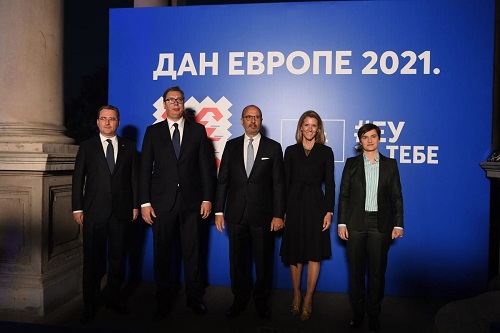
President Vucic said tonight that the visionary idea of Robert Schuman brought a true victory of the new trust after the Second World War and faith in the unification of differences in peace and solidarity, with the message that Serbia has that faith, as well as hope that it will become a country that will be gladly regarded in the European family of nations.
Congratulating everyone in Serbia and the EU on Europe Day, Vucic reminded that 9 May was also the day when the great victory of freedom is celebrated, which was won with huge sacrifices.
"While the horrors of war were still fresh in memory and Europe was healing the wounds of World War II, it also had people like Robert Schuman who understood that future can only be created based on the reconciliation of nations and their unity", Vucic said at the reception on the occasion of Europe Day.
He pointed out that the European peoples dared to see the recent adversaries as future allies.
"Schuman's visionary idea that peace will be preserved, if the creative forces are commensurate with the dangers that threaten, that Europe will emerge from specific achievements, has brought a true victory of newly found trust and faith in uniting differences in peace and solidarity", Vucic said.
He said that Serbia, although it did not always look like that, had that faith, as well as the hope that our concrete achievements, on the long and not easy path to EU membership, would be adequately valued.
“And that with your help, support and criticism, Serbia will become a country that you will be happy to see in the European community of nations. I believe that with our support, help and criticism, we would also contribute to the EU becoming an even better place to live", Vucic said.
Full membership of the EU, with a compromise solution to the issue of Kosovo and Metohija, is a way to achieve the goal and make Serbia orderly and successful, which would mean that we are on a good, European path, the President of Serbia said.
Vucic said that we still had to make a lot of efforts in reforms, not because someone is asking us to do that, but because we know that it brings us and the country a benefit.
He also pointed out that the reforms in the rule of law were exceptionally important, which were now being approached with much more responsibility.
"In our country, there is a race in who will say that they are more in favour of Europe, while saying under the table that they are the least for Europe. Europe does not belong only to those who would like to use European money, it does not belong to those in the government who say that they are on the European path because they believe that they are in that way preventing the opposition from coming to power, nor to those who think that this is the only way to get hold of power. It belongs to all of us, but we cannot take from Europe only what we like without accepting what we do not like", he explained.
I know, he added, how difficult it is to us in Serbia to hear criticism concerning Kosovo as well as in the field of the rule of law.
"I saw for myself that we are the ones who did not pay enough attention and apply a dedicated approach to the burning problems in that area. I believe that with greater zeal we will be able to change the attitude of the citizens of Serbia and gain greater respect from the EU for what we are doing", he pointed out.
President Vucic also pointed out that the EU was undoubtedly the largest donor, investor, and by far the most important trade partner of Serbia, and recalled that about two-thirds of all trade and even more service activities were EU related and that these were facts, whether someone liked it or not.
He pointed out that seven years ago when he became the Prime Minister, three times fewer people were employed in companies that came from EU countries than today.
"Despite all the problems, it shows how much we managed to do together and make good results, to provide people with life, security at work, to show that we can take care of them more", Vucic said, noting the great EU assistance in the field of education.
He said that during the recent visit to the EU, which he assessed as the best one so far, Serbia received additional support for infrastructure projects, primarily for modernization, i.e. essentially the construction of a new Belgrade-Nis-Presevo railway.
He said that this was confirmed in the letter of the President of the European Commission, Ursula von der Leyen, pointing out that this was the best letter he had ever received from Brussels.
"I am grateful to Von der Leyen for pointing out that this is a game-changer in our relations. It is a turning point because that support exceeds everything we have done together when you look at the scale, strength and significance of that project", he said.
He said that Serbia and its citizens considered Europe as their home and that is why we wanted to give our best contribution to peace through regional connectivity, the Berlin Conference and mini-Schengen.
"Encouraged by the message of European officials, I hope that I will be able to host them soon so that we can discuss the further acceleration of our European path", Vucic concluded.
Head of the Delegation of the European Union to Serbia Sem Fabrizi hosted a reception tonight on the occasion of marking 9 May, Europe Day. In addition to Serbian President Aleksandar Vucic, the reception in the Belgrade City Assembly was attended by Serbian Parliament Speaker Ivica Dacic, Serbian Prime Minister Ana Brnabic, Foreign Minister Nikola Selakovic, European Integration Minister Jadranka Joksimovic, representatives of the diplomatic corps and public figures.
Europe Day was established in memory of the beginning of the creation of the European Union (EU) and the Day of Victory over Fascism in the Second World War. The reception is held in memory of 9 May 1950, when the Schuman Declaration was signed, which laid the foundations of the European Union, a project that brought the longest period without war on the Old Continent.
Source: Tanjug
Photo: Tanjug
8 May 2021 |
|
|
| Serbia entered vaccination process prepared |
|
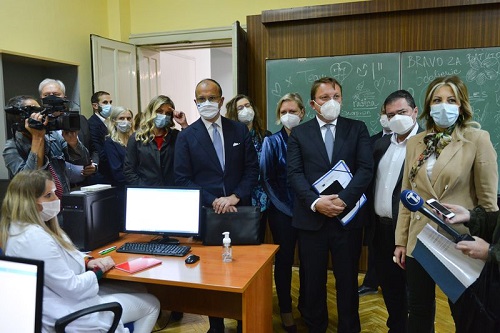
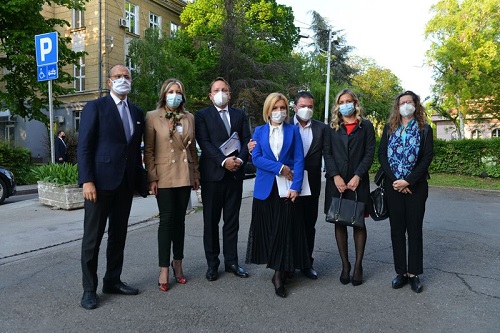
Minister of European Integration Jadranka Joksimovic and EU Commissioner for Neighbourhood and Enlargement Oliver Varhelyi visited late today the Institute of Public Health "Dr Milan Jovanovic Batut" on the occasion of a EU donation of 1,170 Pfizer-BioNTech vaccines to our country.
Joksimovic and Varhelyi, accompanied by Director of Batut Institute Verica Jovanovic, visited the containers for PCR testing, which are a donation from the EU.
Batut Institute also received branded refrigerators for storing vaccines.
Joksimovic stated that Serbia entered the vaccination process prepared, it first relied on its own capacity and showed solidarity and humanity towards the region, but also towards Italy during the coronavirus pandemic, to which it sent equipment in April 2020.
The Minister expressed gratitude that 36,000 doses of the Pfizer-BioNTech vaccine are intended for Serbia, which will be delivered by the end of August, and thanked Varhelyi for conveying truthfully and objectively what Serbia is doing, speaking about Serbia's solidarity with the region, but also on the fact that last year he allowed the reallocation of unspent funds from IPA projects for the purchase of ventilators and medical equipment.
Varhelyi said that in the next two weeks the EU will donate 651,000 vaccines for the entire region, in addition to those that have been secured through COVAX programme for the Western Balkans, at Austria's initiative.
The fight against coronavirus cannot wait and I thought that the most important thing is to bring vaccines, starting with Serbia, the most successful country in the region in the vaccination process. It is clear that we support this region during the coronavirus pandemic. At the beginning of the first wave last year we sent financial support, Varhelyi said.
He stated that the EU helped Serbia during the pandemic, that it donated triage containers, as well as refrigerators for storing vaccines.
Approximately one million doses of the vaccines will be provided for the region through COVAX programme.
Serbia has not forgotten about the region, it has donated about 100,000 doses and now it is our turn to return to Serbia what it gave the region before us, Varhelyi said.
He noted that the fight against pandemic seems easier with a high rate of vaccination in Serbia, but nonetheless he called on everyone to get vaccinated.
We all have to be vaccinated, without that the pandemic will not end, Varhelyi concluded.
Head of the EU Delegation to Serbia Sem Fabrizi and Head of the Serbian Mission to the EU Ana Hrustanovic were also part of the delegation that visited Batut Institute.
With the visit to Serbia Varhelyi started a tour of the Western Balkans, during which he will deliver vaccines to the countries of the region and talk to officials about the response to the coronavirus pandemic and the support of the EU.
Source: www.srbija.gov.rs
Photo: www.srbija.gov.rs
3 May 2021 |
|
|
| Meeting with the Director of the Energy Community Secretariat of the European Union |
|
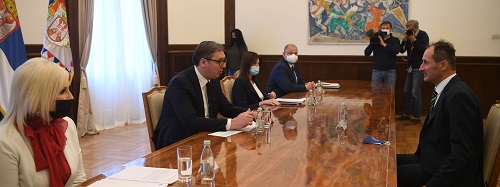
President of the Republic of Serbia Aleksandar Vucic met today with Director of the Energy Community Secretariat of the European Union Janez Kopac, with whom he discussed the implementation of reforms in the field of energy and the unbundling of activities in "Srbijagas".
President Vucic reminded that Serbia was chairing the Energy Community this year, and that the energy transition to clean energy sources remained the priority of Serbia, as well as the transformation of state energy companies.
The two interlocutors agreed that the unbundling of Srbijagas' activities was in line with the obligations under the Law on ratifying the Treaty establishing the Energy Community, and that, in that context, it was necessary to adjust strategies and take meaningful and effective steps.
Director of the Energy Community Secretariat of the European Union Janez Kopac expressed expectation that Serbia would accept the initiative of the Energy Community Secretariat on imposing a carbon tax.
Source: www.predsednik.rs
Photo:www.predsednik.rs
29 April 2021 |
|
|
| Meeting with the EU High Representative for Foreign Affairs and Security Policy |
|
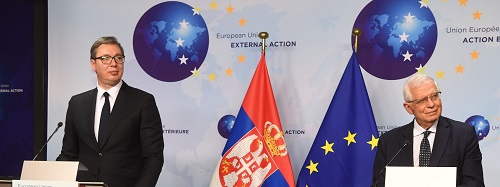
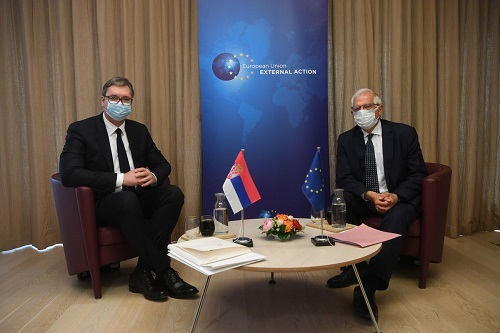
President of the Republic of Serbia Aleksandar Vučić met today in Brussels with the High Representative of the European Union for Foreign Affairs and Security Policy, Josep Borrell, to discuss reforms in the rule of law, dialogue between Belgrade and Priština, but also harmonisation of Serbia's foreign policy.
At a joint press conference, President Vučić said that Serbia had managed to increase trade with the EU in the past 10 years and that today it amounts to 25 billion euros, which indicates the importance of the European Union and its members for the Serbian economy and improving the living standards of our people. Speaking about the dialogue with Priština, the President stated that Belgrade is committed to dialogue, as it has been so far, that it will be even more committed in the coming period, and that he hopes we will see the same determination on the other side.
"We came to Brussels in good faith and hope that we will continue to work on this process to reach a more significant solution in the coming period. We also discussed the rule of law, which is part of our accession negotiations with the EU, and other important issues. Now I can say that we will jointly build a high-speed railway between Belgrade and Niš, but also from Niš, through Leskovac, Vranje, Tabanovce, Preševo to the border with Northern Macedonia, which will be a tremendous change for Serbia. It is of great importance to us and I could not hide my joy because it will be one of the greatest things we have done. I invited high representatives of the EU to visit Serbia. Today, I am proud to be a Serb and the President of Serbia", said President Vučić, adding that reforms in the energy sector were also discussed. He stated that a topic of the meeting was the harmonisation of Serbia with the declarations of the European Union, which refer to various foreign policy issues.
"I expect difficulties, but we have committed ourselves and we are determined to increase the level of compliance with the declarations of the European Union. There will be some exceptions due to the difficult position, and I do not hide that," said President Vučić.
EU High Representative for Foreign Affairs and Security Policy Josep Borrell pointed out that the EU is fully committed to the European perspective of the Western Balkans, adding that Serbia is the centre of that region. He said the focus of the talks was on Serbia's accession talks and on the possibility of speeding up the process.
"Accession negotiations need to be more dynamic, and this can only happen with greater progress in the field of reform and their implementation. The EU expects Serbia to make reform efforts, especially in the area of rule of law and media freedoms", the EU High Representative said. He thanked Serbia for its significant contribution to European security missions and added that bilateral relations were also discussed, highlighting that Serbia's perspective is European.
"The evidence of this commitment is that in the last 14 years, the EU has provided almost 3 billion euros to Serbia to improve the quality of life of citizens, but also because of reforms", said the EU High Representative.
During his stay in Brussels, President Vučić also met with the President of the European Commission Ursula von der Layen, the President of the European Council Charles Michel, the European Commissioner for Neighborhood Policy and Enlargement Olivér Várhelyi, as well as with the Permanent Rapporteur of the European Parliament for Serbia Vladimir Bilčík.
Source: www.predsednik.rs
Photo: www.predsednik.rs / Dimitrije Goll
26th April 2021
|
|
|
| Signing of the Financing Agreement for the second part of the IPA Action Programme for 2020 |
|
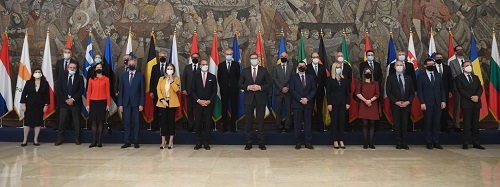
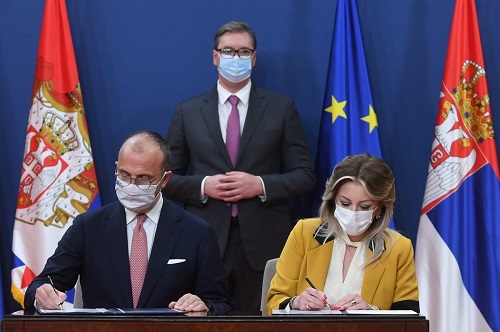
President of the Republic of Serbia Aleksandar Vučić attended today the signing of the Financial Agreement for the second part of the IPA Action Programme for 2020. He thanked the European Union for the great support it provides to Serbia, adding that he expects an intergovernmental conference in June, at which the opening of the first negotiating cluster could take place.
"I am very pleased to be able to greet the 27 EU ambassadors and the head of the EU delegation in Belgrade and to thank them for their great support. Today we received 86 million euros in EU grants; these are funds that are earmarked for programmes and projects that were agreed in advance. These are the projects of a structural type, from the development and progress of our education, our entrepreneurship, our innovation opportunities, environmental protection, to the progress of the rule of law", said President Vučić.
President Vučić said that regarding the rule of law, he was not satisfied with the efforts made in that area, but he pointed out that in the last 25 days things were changing and that the problem was being approached with much more effort and responsibility. He added that this topic is important for Serbia to prepare for the opening of the cluster, and whether and when it will be opened will be decided by the EU member states.
He also pointed out that in order to prepare for the opening of the cluster, we will have to start the reforms of the excise policy in the energy sector faster.
"An intergovernmental conference may be held in June, we may have good news, and it is possible that there will not be good news, but it is up to us to do everything we can to bring the country closer to the EU values in the normative and fundamental sense", said President Vučić.
President Vučić thanked the European Union and its citizens and pointed out that we still have a lot of work ahead of us, and announced more important projects, the opening of factories, as well as sections of highways in the coming days.
"With seriousness and responsibility, we will look to respond to the attention you give us," he pointed out.
European Commissioner for Enlargement Olivér Várhelyi said that the future of Serbia is in the EU and that both the European Commission and the authorities in Belgrade are ready to work on accelerating Serbia's European path.
"The Serbian government is working hard to make progress on the European path. We now have a unique opportunity to do so, with a strong Serbian government, backed by a strong parliamentary majority. We are ready to assist faster progress and we know that Serbia is ready to move faster", Várhelyi said.
On the occasion of signing today's Financial Agreement, he emphasised that these are funds that will help Serbia's recovery, its harmonisation with EU standards and reform processes in the country in the medium and long term.
"The primary purpose of these funds is to support the economy and protect the environment", Várhelyi said, noting that the EU has invested 450 million euros in Serbia's health sector over the past two decades, building or renovating 34 hospitals and providing 280 ambulance vehicles.
The financial agreement for the second part of the IPA Action Programme for 2020 was signed by the Minister for European Integration Jadranka Joksimović and the Head of the Delegation of the European Union to Serbia Sem Fabrizi.
Minister of European Integration Jadranka Joksimović assessed that today's signing represents a continuation of the work that our country has with the EU regarding the implementation and preparation of Serbia for the cohesion policy and structural funds of the Union when we become a member state.
"We have shown our capacities and knowledge, but we have also raised the visibility of those programmes", said Joksimović and thanked President Vučić who supports such events with his presence.
The money provided by today's signing is intended to support the sectors of environmental protection, energy, improving competitiveness, accessibility of public facilities, but also to support the EU to implement reform activities in the European integration process and reimburse budget costs for participation in EU programmes such as "Cosme", "Erasmus +", and "Horizon 2020".
Source: www.predsednik.rs
Photo: www.predsednik.rs / Dimitrije Goll
23 April 2021 |
|
|
| President Vučić met via video link with representatives of the IMF delegation |
|
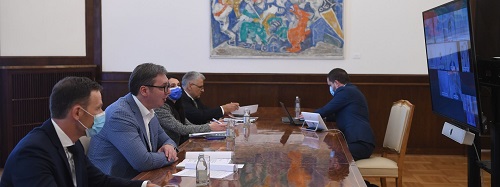
President of the Republic of Serbia Aleksandar Vučić talked today via a video link with the representatives of the delegation of the International Monetary Fund led by the Head of the Mission, Jan Kees Martijn. The interlocutors concluded that Serbia's main goal remains to preserve the hard-earned reputation of a fiscally secure country, as well as to continue with a responsible fiscal policy so that public debt does not exceed 60 per cent of GDP, whereby Serbia continues to work on further economic growth.
During the conversation, President Vučić and Jan Kees Martijn especially referred to the incentive measures and adopted three packages of measures to help the economy and citizens, which preserved macroeconomic stability and even achieved a higher employment rate. Martijn commended the responsible economic policy of Serbia and the successful crisis management during the pandemic.
"Serbia achieved one of the best results last year despite the challenges of the pandemic", Martijn said, noting that Serbia was one of the few countries to which the IMF did not adjust the initial projection of the 5% growth rate it gave last year.
President Vučić added that following the first quarter of 2021, Serbia is well on its way to achieving the planned growth of 6% as planned, since one of the main focuses of the Government is investing in large infrastructure projects and intensifying work on attracting foreign direct investments.
"In 2020, Serbia was at the very top in terms of economic growth in Europe, and I am convinced that this year we can enter the first three or four countries in terms of growth", said President Vučić, adding that he was satisfied that Serbia still, despite the pandemic situation, has an extremely strong inflow of investment.
President Vučić and Jan Kees Martijn also discussed a new advisory arrangement, which is of special importance in light of the improvement of the general investment climate in Serbia, as well as in the context of even greater investor assurance.
"Given Serbia's tremendous progress over the past eight years, the priority goal of this arrangement will be to preserve the results achieved, but also to provide support for further implementation of structural reforms aimed at even faster, stronger and more sustainable growth", said President Vučić and thanked the IMF and the personal engagement of Jan Kees Martijn in the professional and expert support that Serbia is counting on.
President Vučić pointed out that Serbia will pay special attention to reforms in public companies, and that priorities will continue to be investments in infrastructure, creating an even better climate for investments, greater investments in the environment, science and capital projects, which will further contribute to the long term stable financial growth in the coming years.
Source: www.predsednik.rs
Photo: www.predsednik.rs
21st April 2021
|
|
|
| Meeting with the World Health Organization Regional Director for Europe |
|
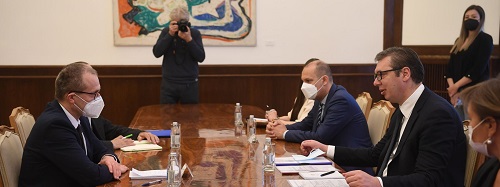
President of the Republic of Serbia Aleksandar Vučić met today with the Regional Director of the World Health Organisation for Europe Hans Kluge, to discuss cooperation in the fight against the COVID-19 pandemic, as well as cooperation in improving health care in our country and other joint activities.
President Vučić thanked Dr Kluge for his personal engagement and support during the current pandemic, especially for technical assistance and expertise. On this occasion, he informed the WHO official about the results of immunisation in Serbia and plans on how to provide the vaccine to all citizens who want to get it.
Dr Kluge congratulated President Vučić on his leadership and personal commitment to provide vaccines. He emphasised that Serbia, with its good immunisation strategy, ranked among the global leaders, thus becoming an example of humanity and solidarity by enabling vaccination of elderly people in rural areas, foreign citizens and donating vaccines to other countries.
"Serbia has accepted the vaccine as a life-saving product and has not looked at it geopolitically", said Dr Kluge.
The two interlocutors agreed that the world should increase production capacities for vaccines, as well as develop new adequate therapies for the fight against COVID-19, and, in this regard, work on increasing the level of citizens' trust in science.
President Vučić informed Dr Kluge about the plans for improving the work of the Institute for Virology, Vaccines and Sera "Torlak".
"We want to make 'Torlak' one of the best vaccine factories in Europe", said President Vučić.
Source: www.predsednik.rs
Photo: www.predsednik.rs
20th April 2021 |
|
|
| WHO describes immunisation process in Serbia as impressive |
|
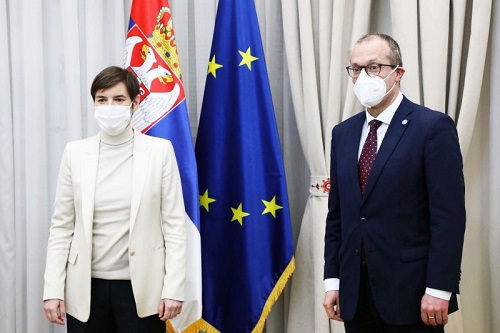
Prime Minister Ana Brnabic talked today with World Health Organisation (WHO) Regional Director for Europe Hans Kluge about the epidemiological situation and the course of immunisation of citizens in Serbia.
Brnabic expressed gratitude for the cooperation in the fight against the pandemic, technical assistance and expertise, emphasising that the support of this organisation is very important for our country.
She informed the WHO Regional Director for Europe about the course of immunisation of citizens in Serbia, expressing her belief that, thanks to the large number of vaccinated people, we will be able to create collective immunity and return to normal life.
Kluge assessed the immunisation process in Serbia as impressive, and added that Serbia has made a good decision to offer citizens all available vaccines used in the fight against coronavirus.
Expressing concern over the emergence of new strains of the virus, he stressed the need to speed up the immunisation process and show mutual solidarity.
The WHO Regional Director for Europe praised Serbia for the humanity it has shown by donating vaccines to the countries of the region and enabling vaccination for those who do not have a sufficient number of vaccines for their citizens.
The Prime Minister said that Serbia will continue to cooperate with the countries of the region and help in accordance with its capabilities.
When it comes to the project "Roadmap for Health in the Western Balkans 2021-2025", it was stated that, if epidemiological conditions allow, a regional meeting will be held in Belgrade at the end of the year, important for future improvement of cooperation between countries in the field of health challenges.
Source: www.srbija.gov.rs
Photo: www.srbija.gov.rs
19 April 2021
|
|
|
| Selakovic: Pristina persists in its campaign of hatred against the Serbian people |
|
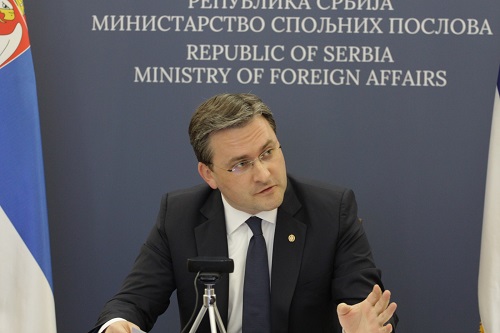
Minister of Foreign Affairs of Serbia Nikola Selakovic stated today that Pristina further persisted in its campaign of hatred against the Serbian people, which was most drastically seen in the unfounded accusations of mass rapes and genocide.
At the UN Security Council meeting discussing the Report of the UN Secretary-General on the work of UNMIK, Selakovic emphasized that the efforts of the provisional institutions in Kosovo and Metohija to create a narrative about mass rapes of Albanian women were obvious, and that propaganda methods and lies were used for that purpose.
"It is clear that there were victims on all sides in the conflict, as well as that our side has evidence of numerous Serb victims. But the precondition for ensuring the protection of rights that belong to each individual victim is a rational and well-argued approach", Selakovic said responding to the slander of the Pristina representative.
Selakovic underlined that, contrary to the claims of politicians from Pristina about 20,000 raped Albanian women, the information provided by the Commission for the Verification and Recognition of Sexual Violence Victim Status indicates 912 raped persons, however, failing to include in this number the Serb women who were victims of violence.
"Let me emphasize that Serbia condemns every act of sexual violence in conflicts and is committed to achieving justice for all victims. The number of victims certainly does not diminish the horrific effect of this type of violence on each victim individually, but also, speculating on numbers does not contribute to justice being served and leads to politicization and slowing down the reconciliation process", Selakovic said.
Regarding the genocide accusations, Minister Selakovic stated that they only went to prove that Pristina further persisted in its campaign of hatred, propaganda and open hostility towards the Serbian people.
"Through statements given on a daily basis, they attempt to paint a picture that Serbia is to blame for everything and that genocide was committed against Albanians, all in order to hide their own responsibility for the committed crimes", the Serbian Foreign Minister said.
He underlined that anyone who knew what the definition of genocide implied would understand that it was not Serbia that committed something, but that the Serbian people was instead a victim of the "state-building" project of the Kosovo Albanians, based on the dangerous idea of ethnically clean territories, as evidenced by more than 200,000 expelled Serbs from Kosovo and Metohija.
"We are convinced that the civilized world will not agree to be their accomplice in concealing and covering up their crimes, and that a clear message will be sent to them that they must take responsibility for their actions", Selakovic said.
He reminded that until 1999, around 40,000 Serbs lived in Pristina, and that today there were only about twenty of them, that around 17,000 Serbs lived in Pec, and that today there were only the Serbian nuns in the Patriarchate of Pec, that around 12,000 Serbs lived in Prizren before the war, and that today only 17 families remained there, and that in Urosevac, out of 10,000 Serbs who lived there before the war, only the family of a Serbian priest remained.
13 April 2021 |
|
|
| Selakovic: Political extremism of Albanians in Kosovo and Metohija is becoming stronger |
|
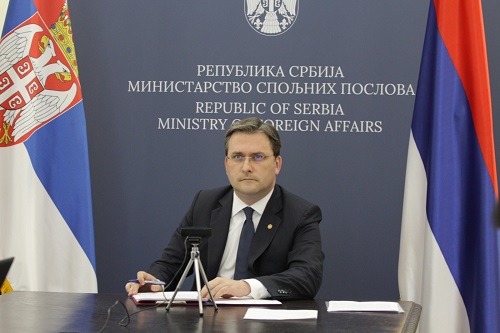
Minister of Foreign Affairs of Serbia Nikola Selakovic warned, at the United Nations Security Council meeting, that the political extremism among Albanians in Kosovo and Metohija was not decreasing, but on the contrary, was becoming stronger.
At the meeting discussing the Report of the UN Secretary-General on the work of UNMIK, Minister Selakovic recalled that the obligation to form the Community of Serb Municipalities remained unfulfilled for 2,917 days now and that, in fact, 19 April marked eight full years since the agreement was reached in Brussels, while Pristina still refused to follow up on its commitment and enable the formation of the Community of Serb Municipalities.
The Minister reminded that the current Prime Minister of the provisional institutions of self-government in Pristina repeatedly threatened to unite the self-proclaimed Kosovo and Albania, and that he also stated that the dialogue with Belgrade was low on the list of his priorities.
Minister Selakovic pointed out that it was high time for Albanian leaders in Pristina to show responsibility in fulfilling their commitments, but also a sincere commitment to reaching a compromise solution and building mutual trust.
"Serbia is determined and will not give up on identifying a compromise solution, which will be sustainable for future generations as well. The only way to build lasting peace and stability in our region is by working to build trust and insisting on positive political agendas", Selakovic concluded.
According to the Minister, lasting peace and stability can only be achieved if none of the participants in the dialogue pursued maximalist demands and insisted on the complete humiliation of the other.
He pointed out that the Serbian and Albanian peoples, as the two most numerous peoples in the Western Balkans, needed to find a way to reach reconciliation and a basis for cooperation, both in terms of the economy and in achieving shared prospects for membership of the European Union.
"Belgrade has made sincere steps in that direction, by being one of the initiators of the idea of relaxing the flow of people, goods, capital and services, popularly referred to as "mini-Schengen", the Minister underlined.
Pointing out that Serbia had time and time again demonstrated its commitment to dialogue as the only way towards a peaceful, political solution to the problem in Kosovo and Metohija, Selakovic underscored that the recent elections in the Province confirmed that political extremism among Albanians in Kosovo and Metohija was not decreasing, but on the contrary, was becoming stronger, which could be seen during the recent pre-election process.
Minister stressed that political pressures on Serbs continued even after the election process was completed, by denying Serbs fair representation in provisional institutions as the new so-called government in Pristina decided to assign only one ministry to the Serb community.
"Serb returnees represent a particularly vulnerable category, who spend their every day in fear of being attacked. I remind you that the southern Serbian province is still an area with the lowest return rate of displaced persons in the world", the Minister said and emphasized that, in the last year alone, more than 80 attacks and incidents took place in our southern province, targeting Serbs, their property and religious sites.
It is particularly worrying for the Serbian people in Kosovo and Metohija, Selakovic noted, that in the previous period, and especially in March this year, there were frequent physical attacks on the property of the Serbian Orthodox Church.
"A striking example of the disrespectful attitude towards Serbian cultural and religious monuments in the Province, whose exceptional universal value UNESCO confirmed by inscribing them on the World Heritage List, is the case of the Visoki Decani Monastery", the Minister underlined.
Furthermore, the Serbian Foreign Minister assessed as concerning the breaking into the Health Center in Strpce by police inspectors and officers, in January this year, who conducted a search aiming to discover Covid-19 vaccines there, originating from central Serbia.
"Although we consider this to be an intrusion into a health care institution, our reaction was restrained this time as well. We did not want our decisions to cause escalation and politicization of activities that are solely aimed at protecting public health. We organized the vaccination of citizens from Kosovo and Metohija at three locations in central Serbia and thus clearly demonstrated that people's lives are the top priority to us", the Minister stressed.
Minister Selakovic stated that Serbia highly valued the activities of UNMIK mission in Kosovo and Metohija and that it supported it in carrying out its work as efficiently as possible and undiminished in scope, aiming to build and preserve security in the Province.
Selakovic said that the international missions in Kosovo and Metohija - UNMIK, KFOR, EULEX and the OSCE mission, under the administration of the United Nations and in line with UNSC Resolution 1244, played a key role in the preservation of peace and protection of the population.
"We support and respect their engagement and efforts made in the framework of their mandates, with the common goal of creating conditions for a peaceful and safe coexistence of the inhabitants of Kosovo and Metohija. The Serb and other non-Albanian population in Kosovo and Metohija have the utmost confidence in the international presence and consider it a guarantor of security and a barrier against the arbitrariness of the provisional institutions in Pristina", the Minister emphasized.
He said that this demonstrated the need that international missions remain engaged in an undiminished scope, in order to consistently implement UNSC Resolution 1244.
Selakovic further emphasized the importance of KFOR international forces and pointed out that any unilateral attempt to assign to someone else or that someone else assumes a part of KFOR's mandate and responsibilities constitutes a violation of UNSC Resolution 1244.
The Minister also noted as unacceptable the unilateral decisions on the formation of the Pristina "Ministry of Defence" and launching the process of transforming the so-called "Kosovo Security Forces" (KSF) into the so-called "Kosovo Army".
At the beginning of his statement, Minister Selakovic lodged a protest against the abuse of the video format of the session by the representative of Pristina as she had a flag of the self-proclaimed "Kosovo" placed behind her, and the representative of Russia did the same.
Below is an integral version of the speech of the Minister of Foreign Affairs Nikola Selakovic
Distinguished President of the Security Council,
Distinguished Special Representative,
Esteemed members of the Security Council,
At the outset, I have no choice but to lodge a protest against the abuse of the video format of this session on the part of the representatives of Pristina in order to promote the symbols of the so-called statehood of Kosovo. Despite the fact that the representatives of Pristina were warned on several occasions, including by the President of the Security Council at the previous session, that such abuses of Security Council sessions are absolutely unacceptable and constitute a flagrant violation of the Security Council rules on participation of representatives of the provisional institutions of self-government in Pristina, under Rule 39 of the UN Security Council Rules of Procedure, we are again faced with their reckless disregard for the rules of this distinguished body. Let me reiterate our call for the necessary steps to be taken to prevent such abuses.
It is my great pleasure to address this august body at the meeting on the work of the Mission of the United Nations in Kosovo and Metohija. At the outset, I would like to thank Secretary-General of the United Nations Mr. Guterres and Special Representative of the Secretary-General and Head of UNMIK Mr. Tanin for the report submitted and for their efforts made towards the implementation of the UNMIK mandate, and also to the members of the Security Council for the continued attention they have devoted to the issue of Kosovo and Metohija. The Republic of Serbia highly values the activities of the Mission of the United Nations in Kosovo and Metohija and supports it in carrying out its work as efficiently as possible and undiminished in scope, aiming to build and preserve security in the Province.
Mr. President,
In the previous period we have faced political instability in Kosovo and Metohija. We recently had elections in the Province, which unfortunately confirmed that political extremism among Albanians in Kosovo and Metohija is not decreasing, but on the contrary, is becoming stronger. We have witnessed Albanian leaders competing among themselves in efforts to find the best way to provoke an incident in Serb communities, in order to score political points of the Albanian electorate. Under the pretext of amending the voter list, a large number of Serbs in Kosovo and Metohija were deprived of one of their fundamental political rights - the opportunity to elect their political representatives. Out of approximately 140,000 of citizens of Kosovo and Metohija who were removed from the voter list in the latest election process, 85% are Serbs.
Despite numerous challenges and problems, the Serbian people in Kosovo and Metohija have shown, by high turnout and a convincing victory of the Serb List which won all ten seats reserved for Serbian representatives, that nothing can stop them from resolutely defending their position. Political pressures on Serbs continued even after the election process was completed, by denying Serbs fair representation in provisional institutions as the new so-called government in Pristina decided to assign only one ministry to the Serb community.
Distinguished members of the Security Council,
Unfortunately, it was not only during the election activities that we witnessed the unreasonable anti-Serb policy being pursued by the provisional institutions in Pristina. This goes to the length of breaking into the Health Center in Strpce, in the south of Kosovo and Metohija, by police inspectors and officers from Pristina, in January this year, who conducted a search aiming to discover Covid-19 vaccines there, originating from central Serbia, which they did not find. In doing so they demonstrated force and threatened to arrest the director of the Health Center, medical staff and doctors. At a time when the whole world is fighting the pandemic with vaccines being the only way to end this challenge, while Serbia is showing support and solidarity by donating vaccines and medical equipment to all in need in the region, Pristina wants to destroy vaccines only because they originate from central Serbia. As the whole world expresses gratitude to medical doctors, who have made great and heroic sacrifices in combating the virus, the provisional institutions in Pristina are attacking Serbian doctors for doing their job.
Although we believe that intrusions into health care institutions are inadmissible, our reaction was restrained this time as well. We did not want our decisions to cause escalation and politicization of activities that are solely aimed at protecting public health. We organized the vaccination of citizens from Kosovo and Metohija at three locations in central Serbia and thus clearly demonstrated that people's lives are the top priority to us. Serbia continues to be ready to help all in need of assistance, and we call for reason and responsibility, especially in such difficult times.
Mr. President,
Attacks targeting Serbs and their property have been on the rise. In the last year alone, more than 80 attacks and incidents took place in our southern province, targeting Serbs, their property and religious sites. According to the information provided by the OSCE Mission in Kosovo and Metohija, in the second half of last year, the number of incidents increased by more than 30% compared to 2019. Therefore, we cannot agree with the assessment that the "security situation in Kosovo remained stable, with a few incidents reported affecting non-majority communities". Last weekend, for example, an entirely unprovoked physical attack by a group of Albanians on two Serb young men took place in the northern part of Kosovska Mitrovica.
Serb returnees represent a particularly vulnerable category, who spend their every day in fear of being attacked. The fact that one family of returnees was the target of seven attacks clearly indicates the persistence of those who do not want Serbs in Kosovo and Metohija. There is absolutely no trace of political will in Pristina for 212,995 displaced Serbs who have been living outside Kosovo and Metohija for 22 years to return to their homes. Since 1999, the rate of sustainable return of internally displaced persons in Kosovo and Metohija has been only 1.9%, which according to the UN data is officially the lowest percentage of return of expelled population after a conflict anywhere in the world.
At the same time, while arresting internally displaced persons, Pristina authorities are exerting the strongest of pressures on the Specialist Chambers in The Hague. The aim is to completely prevent the further processing of a number of cases against members of the terrorist KLA, on charges of serious crimes committed during the conflict in Kosovo and Metohija against both Serbs and persons belonging to other nationalities. President of the Specialist Chambers Madam Trendafilova recently warned that, should the pressures continue, this would have very dramatic consequences to the trials in progress. President Trendafilova underlined as highly problematic the phenomenon of witness intimidation, who are key for conducting proceedings successfully and rendering a proper verdict.
Although the wait to raise indictments was far too long, we consider it commendable that efforts have finally been made to punish the perpetrators of numerous serious crimes which were committed during the armed conflicts a little over two decades ago, but also upon the arrival of the international forces to Kosovo and Metohija. For example, no one has been held accountable to this day for the killings and abductions of 17 journalists in Kosovo and Metohija, which is currently the largest number of unsolved cases of murdered and kidnapped journalists in Europe. Furthermore, the perpetrators of any of the mass crimes committed against Serb civilians after 1999 have not been brought to justice. I will remind you of only a few of these cases: 14 Serb farmers were killed in the village of Staro Gracko, 12 displaced Serbs were killed and 43 wounded in the attack on the "Niš Express" bus in Livadice near Podujevo, and in Gorazdevac near Pec unknown persons fired automatic weapons on children who were swimming in the Bistrica river. Two Serb children were killed then, and four were seriously injured.
We expect the EULEX Mission to continue to support the Specialist Chambers and the Specialist Prosecutor's Office, as well as its additional engagement in the field of the rule of law. Special attention needs to be devoted to witness protection, and determining the fate of missing persons.
International missions in Kosovo and Metohija - UNMIK, KFOR EULEX and OMIK are an integral part of the international civilian and security presence in our southern province, under the administration of the United Nations and in line with UNSC Resolution 1244 (1999), and play a key role and make an outstanding contribution to the preservation of peace and protection of the population. We support and respect their engagement and efforts made in the framework of their mandates, with the common goal of creating conditions for a peaceful and safe coexistence of the inhabitants of Kosovo and Metohija. The Serb and other non-Albanian population in Kosovo and Metohija have the utmost confidence in the international presence and consider it a guarantor of security and a barrier against the arbitrariness of the provisional institutions in Pristina. This further demonstrates the need that international missions remain engaged in an undiminished scope, in order to consistently implement UNSC Resolution 1244.
I would like to further emphasize the importance of KFOR international forces and point out that any unilateral attempt to assign to someone else or that someone else assumes a part of KFOR's mandate and responsibilities constitutes a violation of the UNSC Resolution 1244, while also being a potential source of instability and tensions. I will remind you that Pristina, contrary to international law and completely ignoring the interests and positions of the Serb community in the Province, would not abandon its plans to install a new security actor in the territory of Kosovo and Metohija. We consider the unilateral decisions on the formation of the "Ministry of Defence" and launching the process of transforming the so-called "Kosovo Security Forces" (KSF) into the so-called "Kosovo Army" to be unacceptable. I would like to reiterate that such unilateral moves on the part of Pristina constitute a gross violation of the UNSC Resolution 1244 and the Military Technical Agreement, according to which only the International Security Forces, that is KFOR, have the mandate for all military aspects of security in the territory of Kosovo and Metohija.
In this context, an additional reason for concern is the announcement of the construction of the largest base of the "Kosovo Security Forces" in the southern part of Kosovska Mitrovica, which Serbs in the north of Kosovo and Metohija perceive as the most open provocation and threat to their physical safety.
Distinguished members of the Security Council,
It is particularly worrying for the Serbian people in Kosovo and Metohija that in the previous period, and especially in March this year, there were frequent physical attacks on the property of the Serbian Orthodox Church. In just two weeks, as many as seven Orthodox landmarks in the province were targeted by vandals, at a time when we all remember the March 2004 pogrom against Serbs and Serbian holy sites in Kosovo and Metohija. The condition of the Serbian cultural and spiritual heritage in Kosovo and Metohija is humiliating, including the four monuments that are inscribed on the UNESCO List of World Heritage in Danger (Visoki Decani, Holy Virgin of Ljevisa, Gracanica and the Patriarchate of Pec). Numerous administrative and technical barriers are imposed on priestly and monastic communities, which makes it more difficult or even impossible for them to survive on church property.
A striking example of the disrespectful attitude towards Serbian cultural and religious monuments in the Province, whose exceptional universal value UNESCO confirmed by inscribing them on the World Heritage List, is the case of the Visoki Decani Monastery.
Distinguished members of the Security Council,
The reason for the nervous behaviour of Pristina is all too obvious, as the project of the so-called independence today fails to be recognized by more than a half of the United Nations Member States, including five members of the European Union. However, it is high time for Albanian leaders in Pristina to show responsibility in fulfilling their commitments, but also a sincere commitment to reaching a compromise solution and building mutual trust.
I will remind you that the current Prime Minister of the provisional institutions of self-government in Pristina has repeatedly threatened to unite the self-proclaimed Kosovo and Albania in the past. A member of his party publicly said last weekend that the self-proclaimed Kosovo and Albania would be united, I quote, "with rifle and gunpowder, or referendum boxes".
I need not explain why such dangerous ideas constitute a direct threat to peace and stability. They violate Resolution 1244, while continuously destabilizing not only our southern province, but the entire region as well, and in no way contribute to the dialogue process, but instead hamper it again.
We have demonstrated time and time again our commitment to dialogue as the only way towards a peaceful, political solution to the problem in Kosovo and Metohija. Even today, after many years of negotiations, but also failure to fulfill what was agreed and constant unilateral moves and provocations on the part of the provisional institutions in Pristina, we are still ready to sit down at the table and talk.
We are ready for dialogue but not to be blackmailed and threatened and especially not for ultimatums recently presented by Prime Minister of the provisional institutions of self-government in Pristina. I will remind you of his statement that the dialogue will be low on the list of priorities of the Pristina authorities. It is bewildering how Pristina refers to ultimatums completely undermining any chance of dialogue, as the European Union also pointed out, as "principles" and how it persistently insists that Belgrade should recognize the unilaterally declared independence of "Kosovo", upon which, they believe, all else would be resolved. What is the purpose of the dialogue then, if Belgrade is only expected to recognize the so-called Kosovo? Does the dialogue imply that one side should give up everything only for the other to win it all? And does the dialogue, in Pristina's opinion, imply that what was agreed should not be fulfilled?
I will remind you that Pristina still refuses to follow up on its obligations arising from the agreements reached so far and does not agree to discuss their implementation within the dialogue. And the situation is quite simple - in April 2013, the first agreement was signed in Brussels, which envisaged four obligations: one for Pristina and three for Belgrade. Belgrade has fulfilled all obligations, while the only obligation that the provisional institutions in Pristina had - to form the Community of Serb Municipalities - has remained unfulfilled for 2,917 days now. In fact, 19 April marks eight full years since the agreement was reached in Brussels, and of Pristina's failure to fulfill the obligation to form the Community of Serb Municipalities.
Distinguished Mr. President,
Regardless of the discouraging messages heard from Pristina and the fact that the dialogue has been in progress for many years, Serbia is determined and will not give up on identifying a compromise solution, which will be sustainable for future generations as well. Lasting peace and stability can only be achieved if none of the participants in the dialogue pursues maximalist demands and insists on the complete humiliation of the other. The Serbian and Albanian peoples, as the two most numerous peoples in the Western Balkans, need to find a way to reach reconciliation and a basis for cooperation, both in terms of the economy and in achieving shared prospects for membership to the European Union.
Belgrade has made sincere steps in that direction, by being one of the initiators of the idea of relaxing the flow of people, goods, capital and services, popularly referred to as "mini-Schengen".
As far as Serbia is concerned, we are convinced that the only way to build lasting peace and stability in our region is by working to build trust and insisting on positive political agendas. The inhabitants of Kosovo and Metohija, of any nationality, whether they are Serbs or Albanians, do not deserve anything less.
Thank you for your attention.
13 April 2021 |
|
|
| President Vučić met with the Head of the Delegation of the European Union to Serbia |
|
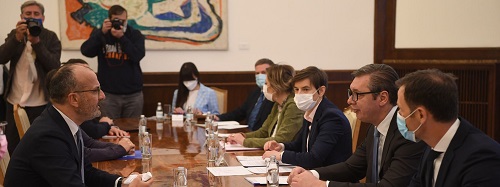
President of the Republic of Serbia Aleksandar Vučić met today with the Head of the Delegation of the European Union, Ambassador Sem Fabrizi, to discuss key short and longer-term priority actions related to the rule of law and democratic governance.
President Vučić pointed out that membership in the European Union remains a priority goal of Serbia and that it is necessary to timely inform the EU regarding all the measures that Serbia is taking in the area of the rule of law.
Ambassador Fabrizi expressed appreciation for the useful and constructive meeting and stressed that progress in the Rule of Law and democratic governance is one of the key element that sets the pace of Serbia’s progress in the accession process to the European Union. Welcoming the presence also of the Prime Minister and several cabinet ministers, he underlined that Rule of Law cuts across the different sectors of the government and society as a whole.
Ambassador Fabrizi recalled that Serbia’s Action Plans for Chapters 23 and 24 is a key roadmap for reforms in the Rule of Law area. Its transparent and meaningful implementation is of utmost importance democracy and prosperity of Serbia. He noted that reforms of the judiciary, in the fight against corruption and organised crime, and in the freedom of media are of particular priority.
The two interlocutors emphasised that legislation and strategies should be developed through inclusive consultations of all participants.
"Serbian parliament should officially begin with the second phase of the inter-party dialogue, while the working group for the elections should start implementing the OSCE-ODIHR priority recommendations, with regular consultations with the ODIHR. Also, it is necessary to draft and apply the schedule for key determinants in the process of constitutional reforms," said President Vučić. He indicated that it is necessary to begin promptly with the implementation of the actions envisaged in the media strategy action plan, which includes the beginning of drafting the amendments to the Law on Public Information and Media.
The drafting of a revised Law on the Financing of Political Activities, in line with ODIHR recommendations is also one of the conditions for Serbia to make faster progress in accession negotiations and make real progress in the rule of law.
It was concluded as necessary to adjust strategies and legislation in other areas of fundamental rights in the accession process like on gender equality and violence against women, and to take substantive and effective steps to fight corruption.
Source: www.predsednik.rs
Photo: www.predsednik.rs
13th April 2021 |
|
|
| Meeting with the Head of the Delegation of the European Union |
|
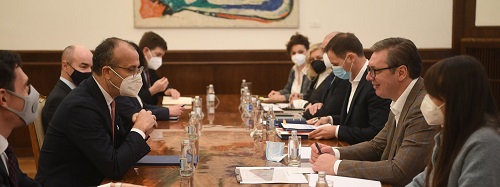
President of the Republic of Serbia Aleksandar Vučić met today with the Head of the European Union Delegation to Serbia, Ambassador Sem Fabrizi, accompanied by the Head of the European Investment Bank for the Western Balkans, Alessandro Bragonzi, to discuss infrastructure projects in Serbia.
During the meeting, President Vučić and Ambassador Fabrizi discussed projects in the field of road, railway and gas infrastructure to be financed by the European Union with the support of the European Investment Bank.
The two interlocutors positively assessed the results achieved so far in the field of transport and gas infrastructure. They particularly considered announcing a tender for the execution of works on the first section of the Peace Highway (Niš-Pločnik), where construction is expected at the beginning of the summer, as well as the selection of contractors for the gas interconnector Serbia-Bulgaria by September.
The two interlocutors especially emphasised the importance of the construction of the strategic railway line Belgrade-Niš-Preševo, as the extension of the Trans-European Transport Network (TENT).
Ambassador Fabrizi noted that with the Economic and Investment Plan for the Western Balkans, the European Union provided nine billion euros in grants for the Western Balkans region for priority investment projects in key areas of transport, energy and green and digital transition that will create sustainable growth and new jobs.
Source: www.predsednik.rs
Photo: www.predsednik.rs
25th March 2021
|
|
|
| Marking the Day of Remembrance of the victims of the NATO aggression |
|
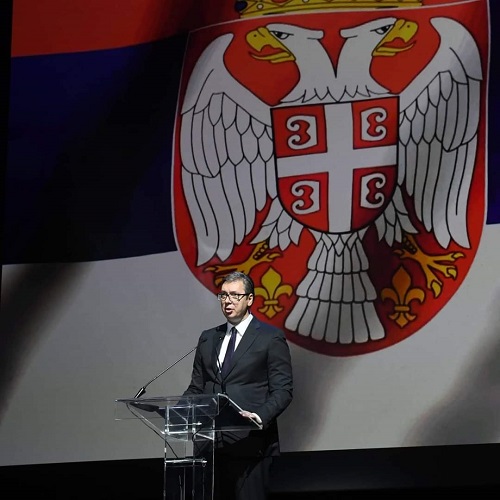
President of the Republic of Serbia Aleksandar Vucic made a statement on the occasion of marking the Day of Remembrance of the victims of the NATO aggression.
"Your Holiness, distinguished Chairman of the Presidency of Bosnia and Herzegovina, distinguished Speakers of the National Assemblies of the Republic of Serbia and the Republic of Srpska, distinguished Prime Ministers of the Republic of Serbia and the Republic of Srpska, distinguished Ministers of both Governments, dear guests and friends, representatives of the Serbian People from Montenegro, North Macedonia, Croatia, thank you for the fact that we are all together tonight and that the Serbian spirit is unbreakable and invincible.
One child a day and a little more than that. That is the most difficult, sickening and painful number of the NATO aggression from 1999. Killed, stopped, guilty of nothing, having committed no sin, without the right to defence, without the right to justice and without the right to life.
No one has ever been held accountable for this crime, a crime greater than a crime. No one, for the 2,500 killed civilians, but also soldiers and policemen who were only guilty of guarding, protecting themselves and their homes. No one has ever been held accountable for more than 6,000 persons injured.
Even today, 22 years after the aggression, it is not possible to explain that, there is no universal justification, despite all the work done to that end, there is no reason, it makes no sense, and only names remain, as eternal as sin.
Miljana Milic, fifteen years old,
Vladimir Milic, twelve years old,
Miomir Mladenovic, fourteen years old,
Dragan Dimic, three years old,
Julijana Brudar, ten years,
Olivera Maksimovic, twelve years old,
Miroslav Knezevic, thirteen years old,
Dajana Pavlovic, five years old,
Stevan Pavlovic, eight years old,
Marko Simic, two years old,
Milica Rakic, three years old,
Ivan Ivancic, seven years old,
Marko Ivanovic, three years old...
And the list goes on, eighty nine names, not only Serbian ones...
The senselessness of sheer killing did not choose. Sixteen children, aged two to seventeen, from the Ahmetaj and Hasani families, were killed in a convoy returning home to Prizren.
In one headline in the West, this was simply explained as a "tragic mistake". The deaths of Marko Roglic, Milan Ignjatovic, Gordana Nikolic, Irena Mitic, Milica Stojanovic, Bojana Tosovic, Branimir Stanijanovic, our Sanja Milenkovic...could not expect or get even such an explanation.
Those deaths were not tragic, for those who caused them, much less a mistake. It was just an excuse, a miserable excuse.
They were a result of intent and a clear decision, as a severe judgment against one country, its people, its children.
And that is why today we will refrain from speculation in giving a name to everything that happened during the spring of 1999. Because a crime happened, a heinous and terrible one. And it was an aggression, not a bombing, not an intervention, not a campaign, not an operation. An aggression is what happened. An attack on a sovereign country, without a decision of the United Nations, without a sufficient reason that would justify attacking the then Yugoslavia or a neighbouring or NATO country.
No one was attacked by Serbia or the Federal Republic of Yugoslavia at that time. They attacked us, with one goal. To defeat us, to keep killing us, and in the end to take away a part of our territory.
And no matter how much we analyze things today, no matter how harsh and critical we are towards ourselves, our policy and leadership at the time, it is clear that the Federal Republic of Yugoslavia and Serbia were left with almost no choice then. The choice was horrible, either the loss of territory and people on the one hand, or the complete disappearance of the Serbian state, morals, honour, Serbian spirit, names and surnames. And we could not help but lose. Nineteen big ones attacked one small country, the Federal Republic of Yugoslavia. They attacked both Serbia and Montenegro. And even when they don't talk about it today, in one of the two independent countries, those are the facts. And that small country, and that small nation, to all nineteen of them so great and powerful, held a lesson in what matters most - honour, morals and love for freedom that a nation can have.
Yes, justice, lest we forget justice. All those nineteen great ones today still silently talk about their military success, avoid answering questions, while - can you imagine, one small, only numerically small Serbian people, that small but magnificent nation, with sadness, tears in their eyes, proudly remembers their resistance and struggle against the nineteen cruel and arrogant ones.
We lost a lot, we lost our fathers, brothers, spouses, children, but the honour and Serbian heart are still there, to protect Serbia, which is eternal and indestructible.
We lost children, we lost people, we lost control over a large part of the territory, we lost billions because of the destroyed infrastructure and economy.
And all that was left for us was the body of a tortured, destroyed country, a country in disintegration, mutilated, looted, wounded, deserted, and guilty, condemned for everything that happened not only in the 1990s, but throughout history.
A country that, even ten years after the aggression, did not have the strength to stand up, rise to its feet, and do anything but be silent, or bow its head and obediently apologize, for everything, even for its dead, even for its murdered children.
Today, it is no longer that failed, tortured, devastated, mutilated Serbia.
Today, it is Serbia, which has found its strength and its pride again.
Serbia, which calls things by their real names.
Serbia, which turned its back on war and defeats, and started working.
Serbia, which rose to stand on its own feet and has a voice of its own.
Serbia, which, even when they don't believe it, they listen to. Which is capable, which is growing, and is no longer part of the problem. Serbia, which is and will be, at least we will do our best to this end, the very solution that enables the entire region to live in peace and understanding.
And that Serbia, today, when there are still many more bombs in the world than vaccines, sends not bombs, but precisely those vaccines to the region. Today, it is ready to produce them as well, and in just a few months we will do just that, but not only for ourselves, but also for others, for the entire Balkans.
We are ready, and we are willing to help.
We are not ready to be and we will not be silent, nor be humiliated again.
We draw the right to that not only from the victims we had, but also from the fact that we stopped looking at others only a long time ago, and looking for fault and guilt only in them, and not sometimes in ourselves as well.
We looked at each other and admitted. Every loss, every defeat and every crime that someone committed in our name, every failure and every wrong policy.
And we are no longer doing anything that could endanger anyone.
We continue to work and work, and grow more and more, gaining strength with only one goal - to be the best in economy and education, health, in culture, science, sports...
And we want to be safe, on our own. We want our army to be much stronger than it was in 1999. So that we never again face a situation that someone is killing our children, destroying the country, or expelling our people.
We want to remain free, to decide our own destiny, and for no one to take everything away from us ever again, and give us nothing.
And that nothing today, and I will repeat it as much as necessary, is the idea of some great, powerful ones, but also those who serve them, the idea that "Kosovo" should recognize us, so that we could recognize "Kosovo".
We do not need that recognition. And Serbia will not allow you to walk over our victims, our history, our past, but also to walk over our future. You will get the answer of reasonable, kind and responsible people. We need a compromise. We need all the obligations that we and Pristina have assumed to be fulfilled, but only we have fulfilled them so far.
And this is not our whim. It is not a phantasmagoria about a Serbian world that we want to create.
Even today, when they threaten us with the formation of a Greater Albania, when they say that the Community of Serb Municipalities is not going to happen, it is ours to be calm, to take care of our people in Kosovo and Metohija, but to send a clear message to all those great, powerful ones that we are not as weak as we were, that we will be able to preserve what is our own, not touching anything that belongs to anyone else. After all, Serbia is not and will not be but a handful of oats that every crow from the whole wide world can eat. As for those who used the strength and power of the nineteen arrogant and cruel ones, I only ask them not to threaten us. Please, please, don't threaten us. They should not think that Serbia is broken and that it will not have the strength to respond. Please, please, our Albanian neighbours, do not threaten us. And we ask all others, who have demonstrated their cruelty towards Serbia, not to help you in that. That is all we are asking and nothing more.
And we will respond to calls for peace, calls for compromise, and always with good will, because we do not want to have children killed again. And we do not want the children of others to suffer again. But do not underestimate Serbia, and do not look at Serbia with the same eyes as you did in 1999.
Today, Serbia is much stronger, much more powerful. Today, Serbia is a united country of togetherness, not a divided one. Today, Serbia is incomparably stronger and better in every aspect than it was in 1999, from the economy to our army. And we will never threaten anyone, we just ask you and request from you to respect us and nothing more.
Today, we are building roads that will connect us, among ourselves, with the region and with the world. Until the end of the year, we will work on eight motorways, on eight routes in the entire Balkans, not only Serbia, eight roads of peace and cooperation.
Only a crazy person would trade this for war, for dead children, for demolition and new loss. And yes, we want to have the closest relations with everyone who took part in the aggression against our beautiful Serbia, we have forgiven a long time ago, but no, we will never forget. And don't ask us to. That one day, every year, we will remind both ourselves and you. The nineteen of you, the most powerful, strongest, greatest in terms of might and force, but not so much when it comes to honour and morality. We will keep remind you and ourselves, just so it would never happen again. Not to us only, but to none other freedom-loving people in the world.
And if we have an offer, today it reads as follows: we are ready to make the whole Balkans a winner, for everyone to win, as long as no one tries to make Serbs the only losers.
And the path to this goal is not difficult at all.
We just need to respect and understand each other and not try to humiliate each other.
And not to touch into what everyone paid the highest and bloodies price for. Freedom. And we, Serbs, know the price of freedom.
Into our right to have it, to keep it and to remember all the victims who are part of it.
And our defeats, our lives and our children are built into ours. And the lives of our heroic pilots, and our giants from Kosare and Pastrik, and our children, innocent, completely innocent, and only guilty of living in Serbia.
This is too high a price to be quiet about it.
Because that would mean that we are ready for another defeat, for another humiliation.
And we are not.
And when all go quiet, we will keep repeating.
A child a day, and a little more. This was how much you killed us. In an aggression that even you did not understand why you carried it out.
And we will keep repeating this, just so it does not happen to us again.
With special reverence, we are fulfilling our obligation to pay tribute to all innocent Serbian victims who laid their lives on the altar of the homeland, both civilians and our heroic soldiers and policemen, the heroes of Kosare, Prizren, Mitrovica.
Today, for us Serbs, life in Kosovo and Metohija is like Via Dolorosa, using their last strength on the road to Golgotha, but we would not be Serbs if we were not capable to "exist in a terrible place".
And today, tonight, I can conclude with one important sentence. On the soil of Europe, there was, and today is stronger than ever, an indomitable, unwavering, unconquerable and never conquered Serbia.
May eternal glory be to all the victims of the NATO aggression and let us all exclaim together - long live free and proud Serbia", President Vucic said.
Source:www.predsednik.rs
Photo:www.predsednik.rs
24 March 2021 |
|
|
| Digital literacy, digital connectivity for all citizens |
|
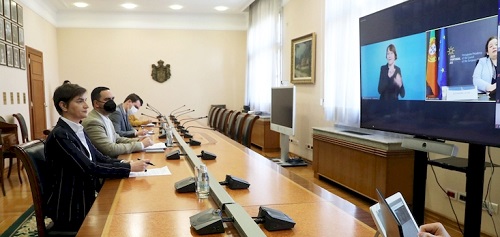
Prime Minister Ana Brnabic said today at the Forum "Affordable Europe: ICT for All" that over the last few years digital transformation has been one of the key priorities of her government, and that the coronavirus pandemic has proven that the decision to turn to innovation and digitalisation was the right one, perhaps crucial.
Brnabic emphasised that the government led by digitalisation understood as a necessity and a way to offer better public services, better education, a more competitive labour market and an attractive business environment, and that the current technological revolution brings unprecedented changes in lifestyle and work, without precedent.
Progress in this area, she noted, has enabled a rapid response to the crisis caused by the pandemic, which was also key to the successful launch of the immunization campaign against COVID-19.
Thanks to that, Serbia today has the second highest vaccination rate in Europe, after Great Britain, the Prime Minister added.
She said that the state absolutely stands behind the digital agenda, but also has a responsibility to ensure that all its citizens benefit from these efforts, because with the rapid advancement of technology, the risks of social exclusion tend to multiply, affecting the most vulnerable categories in society.
In that context, as she pointed out, the government of Serbia strives to provide two basic preconditions: digital literacy and digital connectivity for all citizens.
The Prime Minister also referred to the reforms of the educational system through the digitalization of schools, with the goal that this process, with the introduction of digital textbooks and digital classrooms, be completed by the end of 2022.
According to her, Serbia was among the first European countries to introduce coding and programming as compulsory subjects in primary schools, while the ultimate goal is the introduction of a broadband network for 99% of households by 2025.
Brnabic reminded that the Strategy for Improving the Position of Persons with Disabilities was adopted last year, which especially focuses on the accessibility of information and assistive technology.
In this regard, the government is working on creating a new e-service that will greatly facilitate and speed up the process of applying for parking stickers and parking spaces for people with disabilities, said the Prime Minister.
With the support of the International Telecommunication Union (ITU), a National ICT Accessibility Study has been prepared and will be published soon. This study will enable the mapping and creation of systemic and sustainable solutions that will open space for progress, so that no citizen is left out of the benefits that technology brings, the Prime Minister explained.
The cooperation between the Government and the ITU lays the foundations for future steps that should lead to a fully inclusive society, Brnabic concluded.
Source: www.srbija.gov.rs
Photo: www.srbija.gov.rs
23 March 2021 |
|
|
| Commemorating Remembrance Day of 17 March 2004 - Pogrom in Kosovo and Metohija |
|
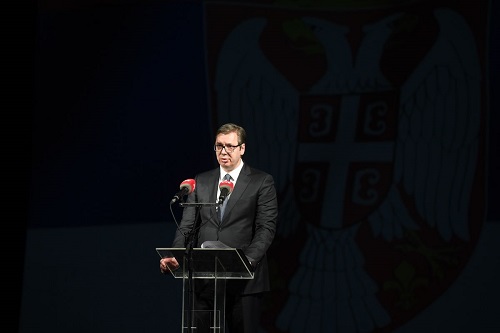
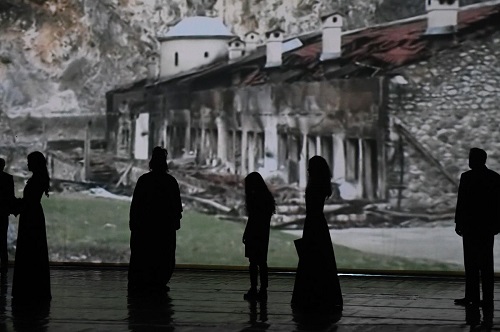
President of the Republic of Serbia Aleksandar Vucic participated today in the commemoration of the Remembrance Day of 17 March 2004 - Pogrom in Kosovo and Metohija. He said that exactly 17 years ago, a pogrom took place in Kosovo and Metohija, and that pogrom surpassed all other crimes.
"There may be times when we are powerless to prevent injustice, but there must never be a time when we fail to protest, these words of Elie Wiesel, a camp survivor and Nobel laureate, make it forever incumbent upon us not to remain silent against crime, regardless of who and for what reason committed it", President Vucic stated and added that we remembered and learned every lesson in which we were losers, each one in which we were silent to our own victims, and each one when we were ready to forget.
"Serbia is no longer weak today, nor is it a country of losers, it does not threaten, but it does not forget either, it is ready for talks, but not for humiliation. Serbia, just like everyone else, has the right to take care of its people, their safety and well-being. The right to life is a fundamental human right and we will always defend it", President Vucic said.
President Vucic said that pogrom surpasses all other crimes, because it is not only an act, but an intention, a policy, a premediated attempt to forcibly cleanse persons belonging to other peoples and faiths from a region or a country.
"We have no right to remain silent to that", said the President of Serbia, emphasizing that we have an obligation to be winners without blood spilled and war, to be the best in the economy, healthcare, sports, education and everything else that implies development and progress.
"We also wish others to work on themselves and be successful, because we are aware that crime is a tool for losers that winners do not need, as they remember, but forgive and move on, while the losers keep spinning in the same vicious circle. We Serbs do not want to be that anymore, we want a future in which we will remember, but from which we will not return. We know what happened and we call it by its real name", President Vucic concluded.
Photo: Dimitrije Goll
|
|
|
| Meeting with the Head of the Delegation of the European Union |
|
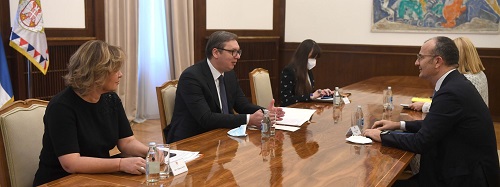
President of the Republic of Serbia Aleksandar Vučić met today with the Head of the Delegation of the European Union, Ambassador Sam Fabrizi, to discuss the continuation of the fight against the COVID-19 pandemic and the challenges in the mass vaccination process.
President Vučić thanked the EU for its support to Serbia in the conditions of the pandemic and expressed hope that the first contingents of vaccines from the COVAX program will arrive soon.
"Serbia was among the first to join this programme, thus proving again to be a reliable partner of the European Union," said President Vučić and stressed that our country has taken a serious and responsible approach to fighting the pandemic, as evidenced by comprehensive measures adopted by the Serbian Government to preserve the health and lives of people, both citizens of Serbia and its surrounding.
Ambassador Fabrizi assured that the EU will continue to provide full solidarity to Serbia. Last week, the European Commission announced the allocation of 12 million euros for Serbia from the EU Solidarity Fund, which is another indicator of the EU's support for Serbia since the outbreak of the pandemic. The EU will continue to work to ensure a fair and global distribution of vaccines. In this regard, Ambassador Fabrizi stressed the importance of the COVAX program. The EU and Team Europe, as a true global donor, have already pledged more than 2 billion euros for the programme. The Ambassador commented positively on Serbia's contribution to the COVAX program and congratulated Serbia on the results achieved in the vaccination process, as well as on the timely and decisive measures taken in the fight against the coronavirus.
On this occasion, President Vučić also confirmed that cooperation with the European Union and full membership of Serbia remains one of the key foreign policy priorities of our country. He particularly emphasised that Serbia is sincerely committed to further reforms, which it approaches with responsibility and seriousness, and that through cooperation with the institutions of the Union and its members, it strives to adopt and apply best practices.
Ambassador Fabrizi pointed out that despite the current challenges caused by the pandemic, the EU keeps the issue of enlargement very high on its agenda, given the new methodology to be presented by the European Commission.
President Vučić pointed out that Serbia expects the European Union to monitor and evaluate the dynamics of Serbia's accession negotiations and evaluate its reform efforts, and that our country is ready to continue working with its European partners on the implementation of reforms and numerous joint projects. In this regard, they also discussed specific joint infrastructure projects.
"We will continue to work intensively on fulfilling the European agenda, aimed at opening new chapters and faster progress on the path to EU membership," concluded President Vučić.
President Vučić and Ambassador Fabrizi discussed the process of harmonising the legislation of Serbia with the legislation of the European Union and agreed that more energetic work is needed in the area of the rule of law.
The two interlocutors also discussed judicial reform, including the constitutional process, the fight against corruption, media freedom and the resumption of inter-party dialogue.
Ambassador Fabrizi particularly underlined the need for concrete improvements to provide a suitable environment in which the freedom of the media and the role of civil society can be realised unhindered and without pressure.
President Vučić especially emphasised that he advocates that the representatives of all media do their job in an atmosphere of complete freedom of expression and that he remains personally committed to that since media freedom is one of the greatest achievements of democracy.
Belgrade, 17th March 2021
|
|
|
| Selakovic: Fight against all forms of crime is a priority of the Serbian Government |
|
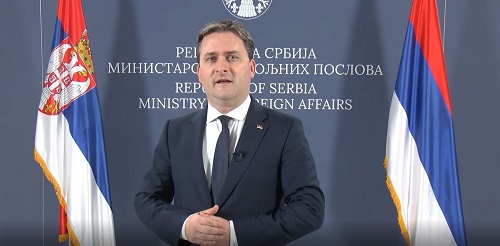
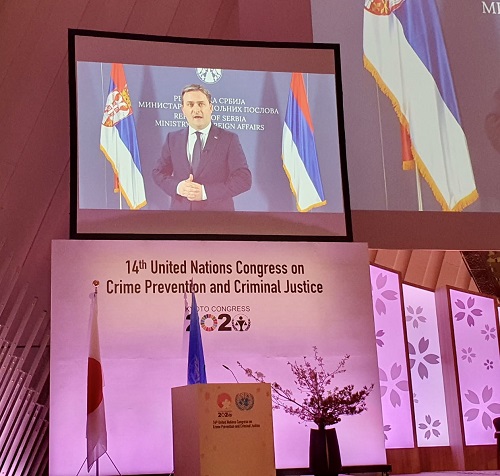
Minister of Foreign Affairs of Serbia Nikola Selakovic said today that the fight against all forms of crime was a top priority of the Serbian Government and an integral part of the EU accession process.
"It is also our moral duty, in order to leave a better world for the generations to come", Selakovic said participating via video-link at the 14th UN Congress on Crime Prevention and Criminal Justice, held in Kyoto.
Minister Selakovic emphasized that Serbia, in its Second Serious and Organized Crime Threat Assessment from 2019, identified as its goal to eliminate cybercrime, human trafficking, terrorism and irregular migration.
The Serbian Foreign Minister pointed out that our country had established in a timely manner a normative and institutional framework that regulates prevention of abuse in this area, as well as that the Office of the Special Prosecutor for Cybercrime, a special court department and a special police unit were established.
The Minister underlined that, in the field of the fight against corruption, Serbia was guided by the postulates set out in the UN Convention against Transnational Organized Crime and the UN Convention against Corruption.
Selakovic pointed out the efforts made by the Anti-Corruption Agency, as an independent state body, to protect the public interest, build individual and institutional integrity, strengthen transparency and accountability of the public administration.
"We strongly condemn all forms of terrorism, including extremism and radicalism, and call for them to be fully eradicated, while implementing the relevant UN resolutions and conventions and the UN Global Counter-Terrorism Strategy", the Head of Serbian diplomacy underscored.
In order to combat these complex phenomena efficiently and successfully, Selakovic said, it was of vital importance to build capacities of our societies and states, while exchanging experiences at the regional and global levels.
Minister Selakovic thanked Japanese Ambassador Hikihara for the skill he showed in conducting the talks on harmonizing and adopting the Kyoto Declaration, which, as he stressed, was an important indicator of the commitment to creating and maintaining the institutional framework for crime prevention as one of the main preconditions for promoting sustainable development goals.
"Back in 1970 when Japan hosted this event for the first time, we demonstrated strong political will to draw attention to the problem. Today, it is incumbent upon us to reaffirm this willingness and resolve and translate it into concrete steps", the Serbian Foreign Minister said.
8 March 2021
A video can be viewed here. |
|
|
| Vučić: Reaching a solution through policy of compromise |
|
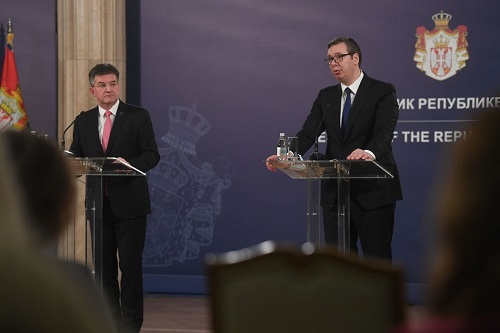
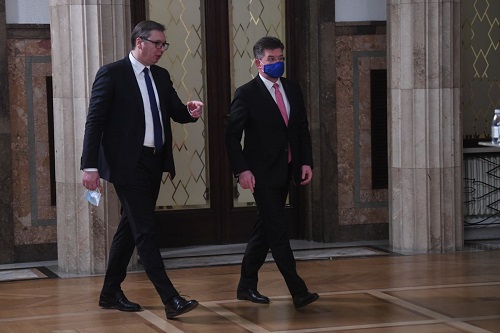
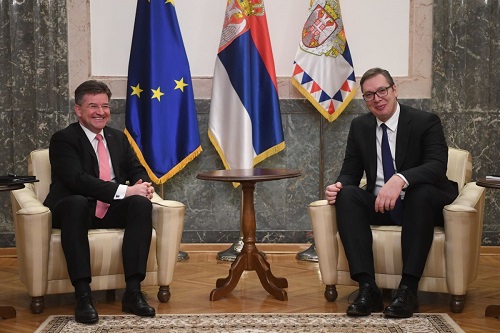
President of the Republic of Serbia Aleksandar Vučić said tonight, following the talks with the EU Special Representative for Belgrade-Priština Dialogue and other regional issues of the Western Balkans, Miroslav Lajčák, that Serbia is committed to dialogue with Priština and is ready for its continuation, and that we support the efforts of reaching a solution without ultimatums and imposed resolutions.
President Vučić pointed out that Serbia supports the activities, efforts and intentions of Miroslav Lajčák to reach a solution through a policy of compromise, without ultimatums and imposed resolutions. He also stated that Serbia participates in agreements and negotiations in good faith, seeking understanding for its state and national interests, and not only for the national interests of Albanians.
"In accordance with that, we believe that compromise and agreement mean - not everything for all and enough for everyone. It is our obligation to be responsible, serious and engaged. It is important that Serbia does not set deadlines because it is much more important that we make an agreement and that both sides are satisfied with it", said President Vučić.
President Vučić also pointed out that Serbia will insist on the full implementation of the signed and accepted agreements from Brussels, noting that Serbia has fully effected all its obligations.
President Vučić thanked Miroslav Lajčák for his commitment, adding that he is always welcome in Serbia.
EU Special Representative for Belgrade-Priština Dialogue and other regional issues in the Western Balkans Miroslav Lajčák said that he had come to say that EU member states have no interest in maintaining the status quo and are ready to bring the Belgrade-Priština dialogue process to a successful conclusion as soon as the two sides are ready for it.
"EU member states expect the dialogue between Belgrade and Priština on the comprehensive normalisation of relations and all open issues to continue constructively and in good faith", Lajčák said, adding that EU members expect the two sides to implement everything agreed within the dialogue process in the last 10 years.
Photo: Presidency of Serbia / Dimitrije Goll
Belgrade, 3 March 2021 |
|
|
| Serbia expects clearer guidelines in new methodology of European integration |
|
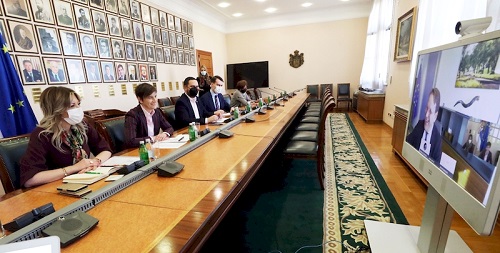
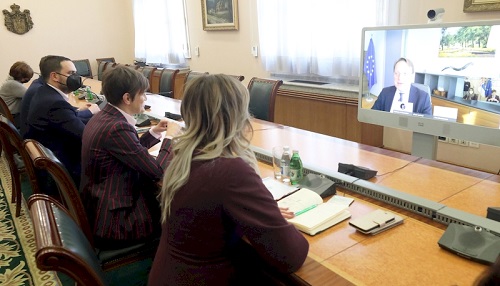
Prime Minister Ana Brnabic talked today via video link with European Commissioner for Neighbourhood and Enlargement Oliver Varhelyi about the application of the new methodology in the process of Serbia's accession to the EU.
Prime Minister Brnabic pointed out that Serbia has made significant progress in the past period, especially in the area of rule of law, media freedom and protection of journalists and the economic sphere, assessing that the dynamics of accession negotiations should be harmonized with our reform efforts.
Serbia has accepted the new methodology, believing that it will enable a more concrete and favourable way of conducting negotiations with European officials, Brnabic said, emphasising that Serbia expects to receive clearer guidelines and modalities of its application.
Commissioner Varhelyi welcomed the reforms in the area of the rule of law, saying that they remain at the top of the European Union's priorities in the process of pre-accession negotiations with Serbia.
The meeting was also attended by Minister for European Integration Jadranka Joksimovic.
Belgrade, 2 March 2021
|
|
|
| Selakovic: Reforms remain the focus of the Serbian Government |
|
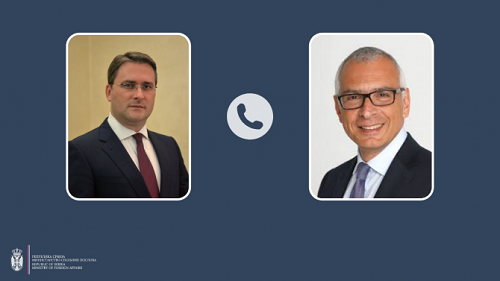
Minister of Foreign Affairs Nikola Selakovic had talks today via video-link with Secretary General of the European External Action Service (EEAS) Stefano Sannino.
The Head of Serbian diplomacy said that reforms remained the focus of the Serbian Government, with a special emphasis on the rule of law, but he pointed out that the significant progress Serbia achieved in the reform process was not accompanied by the adequate dynamic of accession negotiations with the EU.
Selakovic reminded that no negotiating chapters were opened last year and asked for support and that readiness be shown on the part of the EU as well for continuation of the process, pointing out that Serbia was at the moment ready to open five chapters for which it had submitted negotiating positions.
According to the Minister, aiming to promote and accelerate the accession process, Serbia accepted the new methodology, expecting to receive clarifications soon from the European Commission on its application in the negotiation process.
Serbia is grateful to the EU for its support in the field of structural reforms and economic measures, as well as for the investments from the EU and its Member States, Minister Selakovic said and called on the EU to continue implementing the Economic and Investment Plan for the Western Balkans, which would encourage further economic growth. He stressed that Serbia attached great importance to regional cooperation in the Western Balkans and aspired full EU integration.
Furthermore, the Serbian Foreign Minister expressed gratitude to the EU for assistance and cooperation during the pandemic.
Welcoming the appointment of Mr. Sannino as Secretary General of the European External Action Service, Selakovic expressed his belief that this would further enhance the already good cooperation with that institution, with which he regularly held bilateral and regional political consultations. He thanked for the invitation for a visit to Brussels extended by the EU High Representative for Foreign Affairs and Security Policy Josep Borrell and expressed the expectation that the visit would be realized in the nearest future.
Speaking about the relations with Pristina, Minister Selakovic stressed that Serbia was committed to a dialogue aimed at a sustainable compromise solution, emphasizing that Belgrade had fulfilled its obligations under the Brussels Agreement, but also that, on the other hand, almost eight years after reaching the agreement, the Community of Serbian Municipalities was not yet established.
The Minister pointed out that the dialogue was characterized by a lack of trust, and that the statements referring to the so-called Greater Albania, heard from the winners of the elections in Kosovo and Metohija, as well as the absence of the EU's reaction to that, did not contribute to building trust.
Selakovic also said that Belgrade supported the work done by EU Special Representative Miroslav Lajčák, and that it was ready to cooperate with all actors from the international community who can help resolve the open issues with Pristina, while, as he emphasized, as far as Belgrade was concerned, Brussels remained the central place for dialogue.
Belgrade, 25 February 2021 |
|
|
| STATEMENT BY THE MINISTER OF FOREIGN AFFAIRS OF THE REPUBLIC OF SERBIA NIKOLA SELAKOVIC |
|
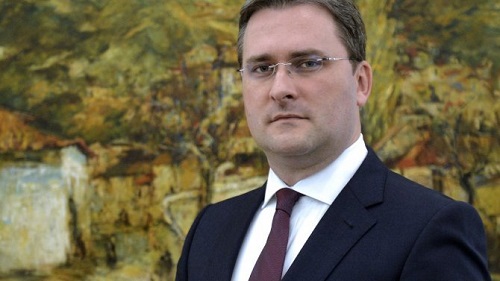
The Draft Report of the European Parliament, adopted by its Committee on Foreign Affairs, in an inadmissible and inappropriate way, calls on EU states that have not recognized the unilaterally declared independence of our southern province to change their opinion.
The European Union, although most of its members recognize the self-proclaimed "Kosovo", has been trying for years, as the umbrella political entity, to at least formally maintain its position of status neutrality, and the call of the European Parliament Rapporteur Viola von Cramon on a group of five states to recognize the self-proclaimed "Kosovo" is a flagrant deviation from the previous political practice of Brussels.
I remind you that the EU-facilitated dialogue between Belgrade and Pristina is carried out respecting the principle of status neutrality, and that this is a precondition for reaching any lasting and sustainable solutions.
I believe that, to put it mildly, it is undiplomatic and unhelpful for the negotiation process between Belgrade and Pristina, that the Committee on Foreign Affairs of the European Parliament allowed the personal lobbying initiative of Ms. Viola von Cramon to turn into something that should be an official document of an EU institution.
I expect the EU institutions to give a chance to the dialogue between Belgrade and Pristina by remaining on the position of status neutrality, and not to be a part of the problem, but a part of the solution when it comes to stabilization of the situation in the Western Balkans.
Belgrade, 24th February 2021
|
|
|
| Metropolitan Porfirije of Zagreb and Ljubljana elected as the new Patriarch of Serbia |
|
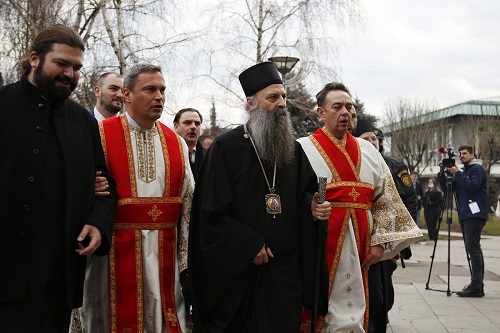
The Holy Assembly of Bishops of the Serbian Orthodox Church elected His Eminence Metropolitan Porfirije of Zagreb-Ljubljana, PhD, as the new Serbian Patriarch, in its convocation in Memorial Cathedral of Saint Sava in Belgrade on 18 February 2021.
Immediately after the election a thanksgiving service was officiated and Many Years was chanted to the Archbishop of Pec, Metropolitan of Belgrade-Karlovci and Serbian Patriarch Porfirije. Bells at Saint Sava Cathedral in the Vracar district of Belgrade rang a few minutes before 4:00 pm indicating that the 46th Patriarch of Serbia was elected.
Newly-elected Archbishop of Pec, Metropolitan of Belgrade-Karlovci and Serbian Patriarch Porfirije (Peric) was born on 22 July 1961 in Becej, to father Radivoje and Mother Radojka. He was baptized as Prvoslav. He finished primary school in Curug, and the “Jovan Jovanovic Zmaj” Grammar School in Novi Sad. He was ordained a monk according to the rite of small schime by his spiritual father, then hieromonk Dr. Irinej (Bulovic), at Decani Monastery on Sunday of St. Thomas in 1985.
He graduated from the Faculty of Orthodox Theology in Belgrade in 1986, when the then Bishop of Raska-Prizren Diocese, future Serbian Patriarch Pavle of blessed memory, ordained him a hierodeacon at the monastery of Holy Trinity in Musutiste.
He attended postgraduate studies in Athens from 1986 until 1990. That year, upon the blessing of Bishop Dr. Irinej of Backa, he joined the monastery of Holy Archangels in Kovilj, where he was ordained as hieromonk and became its abbot.
Many young monks and novices came to the monastery following him. These were the years when the Kovilj Monastery became a spiritual center for many young people: intellectuals, artists, popular actors and rock musicians, especially from Novi Sad and Belgrade. Since then abbot Porfirije has particularly dealt with drug-addicted patients. In 2005, he formed for this purpose a therapeutic community called “The Land of the Living”, which is recognized as the most successful drug-addiction therapy project and, under the leadership of Bishop Porfirije, it has more than a hundred residents in camps throughout Serbia today.
During the ordinary meeting of the Holy Assembly of Bishops of the Serbian Orthodox Church in Belgrade on 14 May 1999 he was elected as Bishop of Jegar, Vicar of the Diocese of Backa.
He defended his PhD thesis Possibility of knowability of God in St. Paul’s understanding according to the interpretation of Saint John Chrysostom at the Faculty of Theology of the University of Athens in 2004.
He became a lecturer at the Faculty of Orthodox Theology - Department of Pastoral Psychology - succeeding famous psychiatrist, academician Dr. Vladeta Jerotic. His lectures have been attended not only by students of the Faculty of Orthodox Theology, but other Belgrade faculties as well.
Together with a group of experts: psychologists, doctors, criminologists, sociologists, Bishop Porfirije founded a civic association that deals with the resocialization of victims of destructive religious sects and cults.
Bishop Porfirije has not been just president of the Steering Board for a decade, but a real spiritus movens of the Humanitarian Fund “Privrednik”, which has provided scholarships for a great number of gifted, but poor pupils and students, regardless of their nationality or religious affiliation.
In 2005, the National Assembly elected him as representative of all Churches and religious communities, to be a member of the Council of the Republic Broadcasting Agency, and in 2008 the RBA elected him its president. As President of the Council of the Republic Broadcasting Agency, Bishop Porfirije supported the long-term interests of society and citizens, unaffected by political influences.
Since then, church radio stations have been heard in the broadcasting spectrum of Serbia. He has made a key contribution to launching of a series of radio and television shows dealing with religious topics.
In 2010, The Holy Assembly of Bishops entrusted him to establish military chaplaincy in the Serbian Armed Forces. The fruits of his labour in that field include not only the suitable legal regulations, but also the selection of military chaplains, the organization and equipping of churches at barracks and performance of the first religious services.
His expert theological works Bishop Porfirije published in magazines both in Serbia and abroad. He participated in a large number of scientific conferences and symposia across the globe.
Bishop Porfirije, as one of the most prominent contemporary Serbian clergymen and intellectuals, has an extremely wide circle of friends, not only in the Homeland, and he fosters personal friendship and close cooperation with priests and representatives of other Churches and religious communities.
He speaks Greek, English, German and uses the Russian language, while his style of communication is always adapted to his interlocutors.
He was enthroned as the Metropolitan of Zagreb and Ljubljana on 13 July 2014 in the Cathedral Church of the Transfiguration of the Lord in Zagreb. The solemn Hierarchal Liturgy was served by Serbian Patriarch Irinej, accompanied by a large number of archbishops of the Serbian Church and other sister Churches, as well as priests and monks, and pious people.
Source: SPC/Serbian Orthodox Church
18 February 2021
|
|
|
| Statehood Day of the Republic of Serbia |
|
On February 15, the Republic of Serbia is celebrating Sretenje (Candlemas Day) - Statehood Day.
As part of the celebrations, the Ministry of Foreign Affairs has prepared a special video that highlights the significance of this day for the cultural, historical and national identity of the Serbs and their State.
The video also includes a special message from the Minister of Foreign Affairs of the Republic of Serbia, H.E. Mr. Nikola Selaković.
A video celebrating the Statehood Day of Serbia can be viewed here. |
|
|
| President Vucic: Serbia is ready for dialogue on Kosovo and Metohija, but will refuse being humiliated |
|
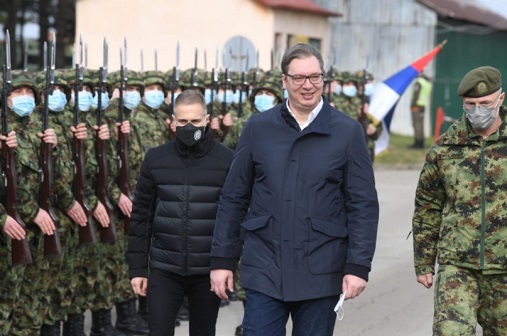
President of the Republic and Supreme Commander of the Serbian Army Aleksandar Vucic attended a demonstration of capabilities of one part of Serbian Army units in the "Rastko Nemanjić" barracks in Pancevo. On this occasion, President Vucic stated that Serbia was ready to continue the EU-facilitated dialogue with Pristina at any point, while respecting also the position of the United States as well as the positions of Russia and China.
The President said that he would rather put his "head on the chopping block" than sign any document with a recognition and reminded that he had already once refused to do so in Washington, where there were two versions of the agreement.
He stated that he immediately had his delegation leave the meeting, that he told the U.S. delegation that Serbia would not sign such an agreement, while conveying that Serbia would always endeavour to hold peaceful talks in order to preserve peace, but that it would not take any humiliation.
The Serbian President thanked the U.S. President Joe Biden for the letter of congratulations on the occasion of the upcoming Statehood Day, in which, in addition to the usual emphasis on commitment to promoting economic cooperation, regional stability and democratic values, he unequivocally called for mutual recognition of Serbia and "Kosovo" as a result.
Mutual recognition between Serbia and "Kosovo" is not part of any act of any world organization, the President pointed out and reiterated that Serbia was ready to continue the EU-facilitated dialogue with Pristina at any point, while respecting also the position of the United States as well as the positions of Russia and China.
According to the president, the situation is difficult and will only be increasingly difficult.
"As I told you three days ago, I can see it and I expect it, I can see the situation slowly tightening, because the conflicts between them at the global level have been increasing and intensifying, and then we have to pay the price", the President said.
President Vucic said that said that it was up to our state to continue strengthening the country in the economic sense.
The President added that the role of the army was very important in the highly complex security and political conditions of the modern world, and that was why Serbia needed to do everything it could to deter any potential aggressor and attacks on citizens and the country.
"The policy of strengthening the armed forces will continue at a faster pace", the President emphasized, adding that the goal was for the Serbian Army to play a stabilizing role with regard to the political developments in the region.
According to him, it should be clear to everyone that Serbia was not a punching bag and that not everyone could attack and threaten it like it was the case in the past.
Vucic said that he was pleased with what he saw and that a lot had been done in the previous period, pointing out that the salaries of military personnel would be significantly increased as of April.
President Vucic also stated that investments in the Serbian Army would continue, whom he told that he expected the Army to continue to be the guardian of our country, its integrity and freedom.
"We expect you to be the guardians of our country, its integrity and freedom, the defenders of our people, the guardians of the homeland, the protectors of the interests of the state of Serbia and to be a deterrent factor for every aggressor and anyone who might consider attacking Serbia", Vucic said.
The military exercise called "Spearhead" demostrated the capabilities of the 72nd Special Operations Brigade, and the event, which the President of Serbia and the Supreme Commander of the Serbian Army assessed as very good, was also attended by Deputy Prime Minister and Minister of Defence Nebojsa Stefanovic and Chief of General Staff of the Serbian Armed Forces, General Milan Mojsilovic.
Photo: Presidency of Serbia / Dimitrije Goll
Belgrade,
7 February 2021
|
|
|
| Meeting with the Head of the Delegation of the European Union to Serbia |
|
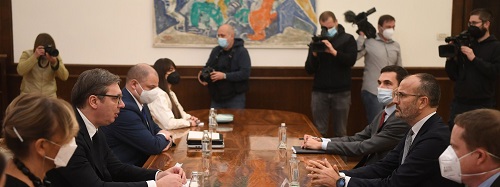
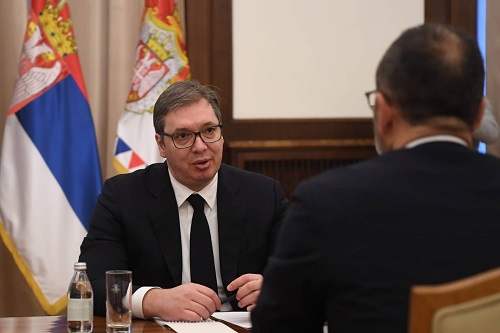
President of the Republic of Serbia Aleksandar Vučić met earlier today with the Head of the Delegation of the European Union to Serbia, Ambassador Sem Fabrizi, to discuss Serbia's European path, continuation fight against the COVID-19 pandemic, implementation of political and economic reforms, with particular emphasis on the rule of law and plans for new EU investments in our country.
President Vučić thanked the EU for its support to Serbia in structural reforms and economic measures and the EU investments in our country. The President especially expressed hope that the first contingents of vaccines from the COVAX programme promoted by the European Union will arrive soon.
"Serbia was among the first to join this programme, thus showing once again that it is a serious and reliable partner of the European Union. I am convinced that together, with solidarity and mutual understanding, we will manage to get out of this crisis and continue working to recover the economy," said President Vučić, adding that the EU is the most important foreign trade and investment partner of our country since two-thirds of our trade and investments are related to EU countries.
The Head of the EU Delegation, Sem Fabrizi, affirmed that the EU will continue with solidarity to the fullest extent and that it will continuously work on ensuring the distribution of vaccines both in Serbia and in the Western Balkans countries. He expressed satisfaction with the Government of Serbia's results, especially emphasising that timely and decisive measures taken in the fight against the coronavirus contributed to maintaining the country's economic stability during the pandemic.
"Thanks to the current structural reforms, Serbia, in line with the accession process, has shown resilience to the crisis and the ability to mitigate the effects on the economy with excellent results in the healthcare area", Sem Fabrizi said, stressing that the pandemic did not affect the undoubted commitment of the Western Balkans to the EU process.
Ambassador Fabrizi also introduced President Vučić to the new head of the EIB's Office for the Western Balkans, Alessandro Bragonzi, who pointed out that it was a great honour for him to take over activities for the region at a time when it is facing such a difficult crisis.
The European Investment Bank invested 873 million euros in the Western Balkans during 2020, which is about 50 per cent more than in the previous year. Most of the assets, i.e. 531 million euros, are in line with the European Union's priorities for increasing connectivity and has been invested in the construction and modernisation of transportation infrastructure in the region.
"Serbia will continue its outstanding cooperation with the EIB, as we are strongly committed to building an economy based on sound and solid foundations, as well as on innovation and all other projects supported by the EIB so far, which have undoubtedly contributed to our good economic results in 2020", said President Vučić and pointed out that further improvement of the health system in Serbia, development of the infrastructure network and implementation of the green and digital agenda remain key priorities of Serbia. The President also expressed hope that with the EIB's support, the planned projects will be successfully completed.
"Following this commitment, Serbia is determined to create an even more favourable business climate with additional packages of subsidies for the investors from the EU who want to invest in our country", said President Vučić.
"The European Union and the European Investment Bank, with the approach of 'Team Europe', support Serbia's strategic goals, including in the field of connectivity, environment and energy and work on priority projects such as reconstruction and construction of an additional building of the Clinical Centre of Serbia, reconstruction of the Clinical Centre Vojvodina, modernisation of railway infrastructure, gas interconnector from Bulgaria, Mir highway and Corridor 10", said Ambassador Fabrizi and expressed the EU's readiness to continue with investments that will encourage further economic growth of Serbia, which are at the heart of the new EU economic and investment plan for the Western Balkans.
He said that Serbia must continue its European path and that further support of the Union in strengthening, adopting and implementing reforms is critical, for the benefit of the citizens.
"We will continue to work intensively on fulfilling the European agenda, aimed at opening new chapters and faster progress on the path to EU membership", concluded President Vučić.
President Vučić and Ambassador Fabrizi discussed the process of harmonising Serbia's legislation with the legislation of the European Union and agreed that more energetic work is needed in the area of the rule of law.
The two interlocutors also discussed judicial reform, the fight against corruption, media freedom and the resumption of inter-party dialogue.
Ambassador Fabrizi and President Vučić confirmed the importance of continuing the EU facilitated dialogue with Priština.
Belgrade,
4th February 2021 |
|
|
| EUROPEAN Commission: Strong rebound of the economic activity in Serbia in Q3 of 2020 |
|
Directorate-General for Economic and Financial Affairs (DG ECFIN) published on 22 January 2021 the economic report for the Q4 2020 "EU Candidate Countries’ & Potential Candidates’ Economic Quarterly (CCEQ)"
European Commission emphasized that in October 2020, the IMF completed the final review mission under the Policy Coordination Instrument before its expiry at the end of January. The IMF acknowledged the key role of monetary, financial and fiscal support in 2020 and invited Serbia to sustain the economic recovery while maintaining fiscal responsibility in 2021 and accelerate structural reforms
Economic activity recorded a strong q-o-q rebound in Q3 2020, reflecting the recovery from the spring 2020 lockdown period. Thus, the y-o-y decrease of real GDP was limited to 1.4% after having contracted by 6.3% in Q2 2020.
According to the data from the Q3 2020, the unemployment rate was 9%, while the public debt of Serbia was 57.1% of GDP. Also, it was stated that the average inflation rate in 2020 was 1.6%.
|
|
|
| Minister Selakovic speaks for Politika: The year of rejuvenation of Serbian diplomacy |
|
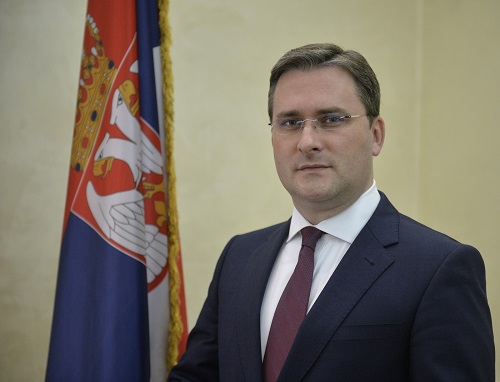
Serbia's foreign policy positions are naturally being adjusted to the new developments at the international level, but our foreign policy priorities have not changed in a long time. Our top and most important interest is to preserve good-neighbourly relations and stability and peace in the region and, in the same context, to find a peaceful and just solution to the problems in Kosovo and Metohija, Serbian Foreign Minister Nikola Selakovic said in an interview with Politika daily.
Another lasting interest of ours is full membership of the European Union, because this is the type of society we strive for. At the bilateral level, our goal is to strengthen ties with traditional friends, the Russian Federation and the People's Republic of China, but also to build new partner relations with the United States. One of the most important tasks of our foreign policy is to improve the position and protect the rights and identity of our people in the region, as well as to provide various types of support to Serbs in the diaspora. All these are very important and more often than not complementary goals, Nikola Selakovic pointed out.
What kind of relations do you expect Serbia to have with the new U.S. administration?
It is too early to speculate about this in public. The new presidential administration in Washington is currently preoccupied with internal issues and this will be the case for some time. There are people in the team of President Joseph Biden who have dealt with our region, and it is likely that the Balkans and Serbia will be the focus of the U.S. foreign policy at some point. I will remind you that President Vucic and President Biden not so long ago had very substantive talks in Belgrade, after which our President stated that he had the opportunity to talk to someone extremely well acquainted with the situation in this part of the world and an extraordinarily prepared interlocutor. Taking their personal relationship into account, but also the importance of enhancing the ties between Serbia and the United States, we have reason to expect that a meeting between the two presidents will be organized in the foreseeable future. I am sure that the nature and dynamics of the relations between Serbia and the United States will be influenced by the fact that Ambassador Marko Djuric now represents us in Washington, whose presence at President Biden's inauguration ceremony is an important signal and, I believe, a harbinger of positive developments in bilateral relations between our two countries.
How would you describe our country's relations with Moscow, Brussels and Beijing?
Russia is our traditional friend and that friendship goes beyond merely political ties. These are deep spiritual, cultural and civilizational bonds, and it is only natural that we have a mutual interest in improving those ties, even though they are at a very high level. We have a relationship with the People's Republic of China which is, in addition to the sincere iron-clad friendship between our peoples and high political representatives, based on deep trust and mutual support. Full membership of the European Union is Serbia's strategic orientation that all our friends are aware of, but our country does not forget its friendships, but strengthens and promotes them instead, and approaches all with honesty and no ulterior motives. In this context, we do not seek any preferential treatment, but only the right to freely and independently make decisions about our future and relations with all who respect us.
Could Serbia pursue a different foreign policy than the one it is pursuing at the moment?
It is always possible to have a different policy, just look at the foreign policy of Serbia ten, twenty or thirty years ago, examine the results at that time and you will realize how irretrievably expensive that policy turned out to be. Whether a policy is right, at either foreign or domestic level, is measured through its results and effect on the lives of citizens and the fate of the entire state.
Our foreign policy priorities are not being defined on a whim, but are instead the result of a serious and deep examination of our complex position and strategic thinking about ways to improve it. Today, Serbia has a better international reputation and credibility than two decades ago, and the main reason for that is that our results have shown how serious and responsible we are as a country. That kind of credibility is not achieved by trickery, but only by hard and well-thought-out work on oneself. And I need to emphasize on this occasion as well that the main inspiration for such an attitude towards politics, the state and its future comes from none other than President Aleksandar Vucic. As Minister of Foreign Affairs, I have the opportunity on a daily basis to see the level of appreciation and respect President Vucic enjoys beyond the borders of our country.
When can we expect the vacant posts of Serbian ambassadors and consuls across the globe to be filled?
That is one of the main tasks for 2021. This will be a year of reinvigoration and I believe also rejuvenation of Serbian diplomacy. Our country, given its size, has a fairly extensive diplomatic network, which provides it with great opportunities for deepening political and economic relations with countries in all parts of the world. But we need more fresh and energetic staff, people who will be the most honourable representatives of a modern and dynamic Serbia. There are such people in Serbia, and we do need a serious rejuvenation, in order to avoid wide generation gaps in our personnel, and to lay the foundations of a modern career diplomacy.
How would you describe your relationship with Serbian President Aleksandar Vucic?
President Vucic and I are, in addition to having close and friendly relations, by virtue of the work we do and our constitutional competencies, the closest collaborators in the realization of Serbia's foreign policy goals. This allows me to talk to him often, and on many occasions learn a lot of new and important things. President Vucic is a man who inspires people around him with his strategic and visionary approach to politics, and I am proud to have had the opportunity to be part of his closest team of associates over the years, and to have had him as a kind of political mentor. In any case, his vision of Serbia as a modern, progressive and prosperous state, which independently and on its own will decides on its destiny, is my wish as well and key motivation for political engagement. For only such Serbia is a country that its own citizens, as well as Serbs beyond our borders, can confidently rely on, while also being an inspiration to the entire region.
Source: Politika
26 January 2021
|
|
|
| Government focuses on reforms in field of rule of law |
|
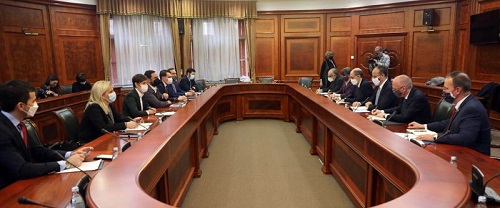
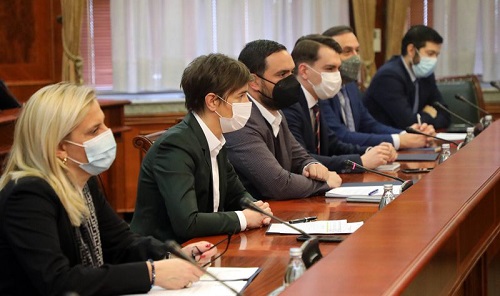
Prime Minister Ana Brnabić talked today with the ambassadors of the Quint countries and the Head of the European Union Delegation about the continuation of reforms on Serbia's path to membership in the European Union.
Brnabić confirmed that full membership in the EU remains a key foreign policy priority of Serbia, emphasizing that reforms in the area of the rule of law are in the focus of the government of Serbia.
She pointed out that Serbia is sincerely committed to the implementation of radical reforms in the field of justice, the fight against corruption, the strengthening of independent institutions and the freedom of the media, and added that much has already been done in practice.
The Prime Minister informed the ambassadors of the Quint countries and the Head of the EU Delegation about the concrete measures that the government of Serbia has taken so far in the area of the rule of law, and pointed to the further fulfilment of the GRECO recommendations.
According to her, the initiative to amend the Constitution was adopted and forwarded to the National Assembly, new members of the State Prosecutors' Council were elected, and work is underway to establish a unified and centralised case management system.
The state is working on further strengthening the cooperation with independent bodies and institutions, as well as on improving election conditions, among other things, by forming a working group for the improvement of election conditions.
She pointed out that, when it comes to media freedom, the government has adopted the Action Plan for the implementation of the Media Strategy and formed the Working Group for the Safety of Journalists.
The ambassadors of the Quint countries welcomed the measures implemented by the government of Serbia, assessing that these are encouraging steps in the right direction and represent the basis for accelerating the accession process.
Brnabić expressed the expectation that the reforms that are being implemented will be recognised and adequately evaluated, and that in 2021, accession negotiations with Serbia will be accelerated.
Belgrade, 21 January 2021 |
|
|
| President Vucic: Serbia is the first in Europe in terms of growth |
|
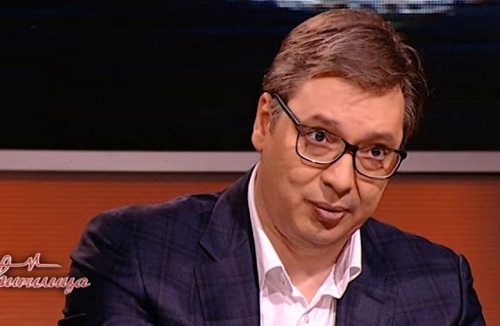
Serbian President Aleksandar Vucic pointed out that Serbia is the first in Europe in terms of economic growth, which will be officially confirmed at the end of March, and that this was possible owing to the reform measures taken since 2014 and the rapid opening of the country after the first wave of corona virus.
The President pointed out that Serbia had a growth of 5.2 percent in the first quarter, while the Eurozone was at minus 3.2 percent, in the second quarter Serbia had a minus of 6.3 percent, while the Eurozone was at minus 14.7 percent, and in the third quarter, when the Eurozone was at minus 4.3 percent, Serbia's figure was only minus 1.4 percent.
Vucic stated that Montenegro, for example, recorded as much as 26 percent minus in the third quarter.
Furthermore, the President emphasized that hospitals were built and renovated in our country, and that two hospitals were built from the ground up in just four months.
He said that the state made significant efforts to procure respirators, masks, gloves, protective suits, medicines, everything that was needed, and pointed out that work was being done on 10 general hospitals throughout Serbia, adding that all these were major achievements that were only possible owing to the success of the 2014 reforms, the enactment of the Labor Law, which yielded excellent results, and also through fiscal consolidation measures.
"These are unprecedented results for Serbia. Was Serbia ever before the first in Europe in terms of growth rate? We will get the results on 31 March that will confirm that Serbia is number one in Europe. All that was possible thanks to people who believed in difficult changes", Vucic said.
According to the President, this year, as many as six highways will be built in Serbia at the same time, and in this regard, he noted that Bulgaria has announced that the highway from our border to Sofia will be completed by the end of the year, after which it will be possible to use motorway to travel to Istanbul, which is very important to ensure that our country is on a transport route.
President Vucic emphasized that in 2020, the so-called year of corona, our country had a net inflow of foreign direct investment amounting to EUR 2.9 billion net, and three billion gross, which means that many foreign companies such as Toyota Tires, Boysen, ZTF and Brose have invested in Serbia even in this year of crisis.
The President said that Serbia has the highest average wages in the region, amounting to 511 or 512 euros, and that in February, due to the January increase, the average wage will be 535 or 536 euros, and that only in Belgrade in the last seven years the average wage increased by 180 euros or 40 percent.
That President said that Serbia was fourth in the region in terms of salaries before, and that today we are officially the first, and that the difference in relation to other countries will only increase faster. He also pointed out that the employment rate is growing in Serbia as well as that our public debt increased less than in most European countries. This is illustrated by the data that in Italy the public debt surged to 156 percent, in Germany to 87 percent, in France to 114 percent, in Croatia to 88 percent, while in Serbia it is at 57 percent.
The Serbian President announced that by Sretenje, 15 February, an additional package of assistance to the economy will be earmarked, and as he explained, it will be a new capital injection for companies, the trade, entrepreneurs, small, medium and large enterprises which, as he said, concerns 1,052,000 people within that system.
Vucic specified that it will most likely be help in the form of two or three payments amounting to half a minimum wage each, and that there will also be sectoral aid for tourism, hotel owners, travel agencies, guides, for bus carriers, through another half minimum wage payment.
The President added that efforts will be made to extend the guarantee schemes as well, which proved to be excellent, amounting to 1.5 billion, and this time, through the same system, two more portions amounting to 500 million each could be provided.
Vucic said that the first agreements with DFC worth 300 to 400 million dollars are expected in seven days.
He also stated that the state will endeavour to help pensioners further, in addition to increasing pensions by 5.9 percent in January, which will be reflected in their first checks in February, and added that pensioners should by March receive symbolic aid in the form of packages with vitamin C, D and zinc, which, as the President said, are small things, but they reflect the state's care and efforts made to protect health.
The President announced that negotiations on the procurement of the Chinese vaccine would be completed in the next seven to eight days, after the first quantities of the Pfizer and Sputnik V vaccines have arrived in Serbia, and pointed out that the Chinese vaccine was of exceptional quality, but probably the most expensive, which is why he wrote to the Chinese President and asked for a discount for our country.
Vucic thanked the Americans for deciding to sell the vaccine to our country and noted that no one in the region other than Serbia has received it, except for the small quantity that Albania got.
He pointed out that our state relied on itself and its own capacities, and that our state leadership anticipated that vaccines within the European COVAX plan would arrive late.
The President rejected the claims about bad results of Serbia in the fight against the corona virus and stated that our country has recorded the lowest corona virus mortality rate in the region.
He presented statistical information indicating that Slovenia had 144 deaths per 100,000 inhabitants, North Macedonia 126, Bosnia and Herzegovina 123, Bulgaria 115, Montenegro 115, Hungary 110, Croatia 107, Romania 85, and Serbia 51.
"The mortality rate in the region is as follows: Bulgaria 3.9, Bosnia and Herzegovina 3.7, Hungary 3.11, North Macedonia 3.03, Romania 2.48. Slovenia 2.15, Croatia 1.99, Montenegro 1.4, and Serbia 1.0. This can be seen in the graphs and is no fabrication", the President stressed.
He said that the state will fight for vaccines, and that only Serbia, in the Western Balkans, received significant quantities of vaccines, other than a smaller quantity that Albania received, and added that in one day since the registration for vaccination opened, as many as 63,000 persons have registered.
President Vucic expressed his belief that the year ahead will be better than the previous one as well as that the corona virus will be defeated through vaccination of citizens.
Belgrade,
12 January 2021
|
|
|
| Every Serb in the diaspora is potentially a lobbyist |
|
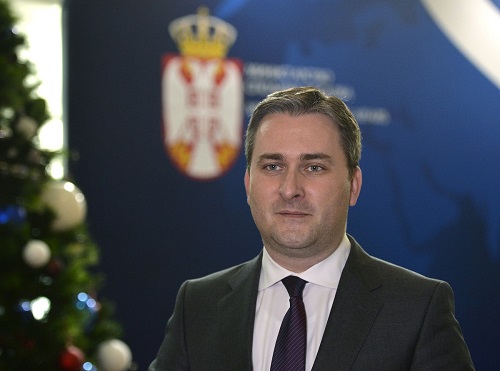
Our compatriots living abroad are one of the great potentials that the state has not recognized in the right way so far, which is why a different approach is needed to the issue of how to strengthen our diaspora and use the good will of people who are potential lobbyists for the interests of Serbia and the Serbian people, Foreign Minister Nikola Selakovic said.
"When it comes to Serbs in the diaspora, and especially in the region, this issue has been a kind of an unattended crop which requires a lot of work, and even when a lot is done at once this is not apparent immediately ", Minister Selakovic stated in an interview with Tanjug.
He emphasized that the appointment of the Director of the Office for Cooperation with the Diaspora and Serbs in the Region for the first time after almost seven years since this body was formed within the Ministry of Foreign Affairs, shows that it is one of the priorities of the Ministry he is at the helm of.
Selaković notes that intensive efforts have been long underway on forming a plan to make the diaspora more visible both outside the borders of Serbia and in the mother country itself.
"Every person in the diaspora is a potential lobbyist for the interests of our country and people, and we need to find the right way to use that", he said.
That much can be done in that regar Selakovic illustrates with the fact that only in Switzerland, in 24 cities, there are Serbian cultural and artistic associations which amounts to more than 3,000 young people who get together in order to preserve our tradition, culture, the Serbian language and history.
"If they were able to set up such associations in 24 cities, it speaks volumes about the enthusiasm of these people. There is so much enthusiasm, energy and love in these people. We need to explore ways to help them and use their good will and potential", the Minister points out.
He also cites the example of an emigrant family in Canada, the Varaklic family from southwestern Serbia, who sends Christmas packages for children in the Raska region every year. He adds that they have so far donated hundreds of thousands of dollars to non-governmental organizations for those needs alone, but he says that we do not see that here.
"The state does not recognize this, and these are people who gained success as entrepreneurs working in a distant country, who can be serious lobbyists for Serbia, for Serbian interests, someone who represents us in the best possible way", Minister Selakovic said.
Minister Selakovic also pointed out that Arnaud Gouillon has been appointed as head of the Office for Cooperation with the Diaspora and Serbs in the Region and described him as a man of extraordinary energy, great love for the Serbian people, which he showed in his engagement towards Serbs in Kosovo and Metohija, where they were seriously endangered.
"By doing so, he showed and set an example to many of our compatriots of what an individual can do. And when one such individual focuses energy, enthusiasm and love for people, on work done within the state administration system, I think that the preconditions have been created for such activities to yield good results", Minister Selakovic said.
Source: Tanjug
3 January 2021
|
|
|
| Minister Selakovic: New ambassadors will be appointed this year, but the goals remain the same |
|
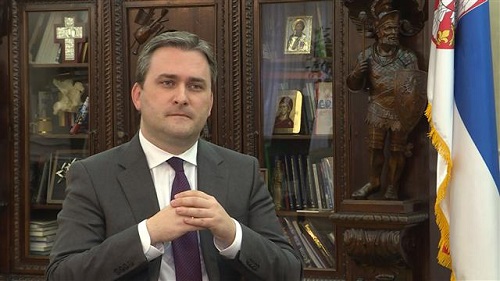
This year, Serbia could finally have Ambassadors and Consuls General appointed to about a third of the currently vacant positions in the country's diplomatic and consular missions in the world, and Minister of Foreign Affairs Nikola Selakovic is convinced that most of these positions will be filled, as he points out, by the best possible people.
"In the next year, I am convinced that the majority of these vacancies will be filled", Selakovic told Tanjug, emphasizing that the work is being done gradually, because the state wants to show that is has a quality staff who will represent Serbia's interests in the best possible way.
The Head of Serbian diplomacy reminded that in a number of diplomatic missions, the four-year mandate of Ambassadors and Consuls General has already expired, so that the procedure for appointing new ones will follow, after their recall.
One of the "vacant" spots is the post of the Serbian Ambassador to China.
"We are working hard to find the best possible solution for our new Ambassador to China and as we appointed one of the best people in the state system as Ambassador to the United States, who, I am sure, will perform his duties in the best possible way, I am convinced that it will be the same for the Ambassador in Beijing", Selakovic said.
The Minister, who took over the foreign policy sector in the Government a little over two months ago, points out that circumstances in the world, as well as Serbia's position in it, have changed, but that Serbia's foreign policy goals do not change: the country remains strategically committed to European integration and, while pursuing the EU path, it will also strengthen traditional friendships with Russia and China, as well as promote and strengthen new partner relations with the United States.
"Relations in the region, good-neighborly relations, regional cooperation are also important for Serbia, because this fits into the set of requirements on the European path. But, even regardless of the European path, it is always important who you live next to, who you live with, what your neighbors are like and what the relations are like in the neighborhood", Minister Selakovic said.
He also points out that the issue of Kosovo and Metohija is of inestimable importance, it being the main national and state issue for Serbia and the Serbian people.
"When I say that circumstances are changing, but not the goals - the EU and European integration was our goal seven years ago as well, but look at what our room for maneuver was then, in terms of economic aspects, and look at it today. Circumstances changed, and then you adjust your actions to these changed circumstances, to the best extent possible", Minister Selakovic said.
He reminds that foreign policy priorities for 2021 were also outlined by the President of the Republic, and that maintaining peace and stability in the region is the absolute priority.
"Only in a peaceful and stable region of the Western Balkans and Southeast Europe can Serbia thrive economically, culturally and scientifically - in every respect. Peace and stability in the region are “sine qua non” without which there is no development and progress. Serbia has acted, is acting and will act as a factor that stabilizes the entire region and maintains peace in the region, showing that it is the region that benefits everyone the most", Minister Selakovic said.
Relations in the region have always been complex, and the region, Minister Selakovic noted, is to our great regret, burdened with issues that we cannot have a bearing on, and which concern
the past.
Serbia's approach is to seek room to influence what is happening today and what will happen
happen in the future.
In this context, he states that the so-called "mini-Schengen" initiative for market unification of the region, which originated from Aleksandar Vucic and was met with a positive response from the Prime Ministers of Albania and North Macedonia, is one of the opportunities to do much more for the region.
"To show how much more we can do if we act together and if we seek our common denominators, and not what separates and divides us ", Selakovic points out.
When it comes to relations with the United States, Selakovic said that one should not expect the great powers to change their positions the way we would like, want or imagine, but that it is important that the Ambassador in Washington, Marko Djuric, also emphasized that his task, among other things, will be to make efforts to change the climate in bilateral relations with the United States - the most important country in the world, as our lacking communication with them in the past seriously affected the position of the Serbian people and Serbia.
"I am convinced that Djuric will work seriously on that, together with President Vucic, Prime Minister Brnabic and the Ministry of Foreign Affairs, and contribute to a large extent to changing that climate", Minister Selakovic said.
He points out that it is extremely important for Serbia to promote its partner relations with the United States to a higher level.
"This is a country with which we cooperate closely in many areas and a country with which we must strive, and not give up in doing so, to find what we have in common, our common ground and good examples of our cooperation in the past, and to create space for such cooperation in the future as well", Minister Selakovic concluded.
Source: Tanjug
2 January 2021 |
|
|
| President Vucic: Serbia to remain on the course of a winning policy of stability |
|
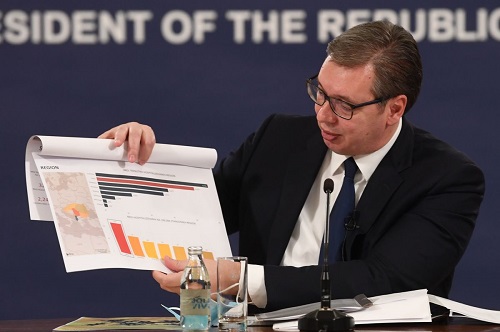
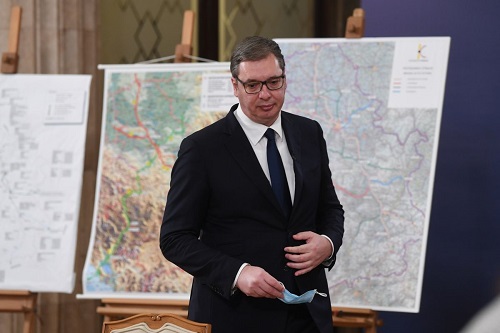
Preservation of peace, taking care of the health and better living standard are key for Serbia in 2021, underlined President of the Republic Aleksandar Vucic, convinced that even though the completion of this ambitious and by no means easy task will be anything but straightforward, best results can be achieved by working in concert with the Government, while ensuring security and a future of certainty for the citizens.
The President said that Serbia has set for itself great and ambitious goals for the next year, notwithstanding the complex international and regional circumstances, and that it will endeavour to fully preserve peace and stability in the region and the country, while safeguarding the vital national and state interests.
"Serbia will remain on the course of a winning policy - the policy of stability", President Vucic said and stressed that our country remains on the European integration path and that it will carefully foster its friendship with Russia and China, while building a friendship with the United States as well.
According to the President, Serbia will continue to pursue a winning policy, with the country itself as a top priority, i.e., a policy that will enable Serbia to continue being one of the top three countries in Europe in terms of growth rate in the next two years.
A precondition for that, the President noted, is to crack down on criminal groups, but also to ensure even bigger investments in the police and army forces.
"Serbia is the country that recorded the highest growth in Europe in 2020", the President pointed out at the annual press conference and added that he expects to conclude a new arrangement with the IMF, as well as that Serbia, by the end of next year or early 2022, will raise its credit rating to an "investment" one, which will put our country's rating on par with the most developed EU countries.
As the greatest success in 2020, Vucic noted that Serbia will end the year with the highest growth rate in Europe, which, as he said, is expected to be from minus 0.75 percent to minus one.
"I am proud to be the President of a country that is the European champion in terms of GDP", Vucic pointed out and added that German Chancellor Angela Merkel was also pleased with Serbia's success.
According to President Vucic, this result will encourage Serbia to accelerate its European path, while continuing friendships with those who did not turn their backs on Serbia when it was at its darkest hour, namely Russia and China.
The President pointed out that the activities to attract foreign investors will continue, then that work will be done on investments in agriculture, primarily the food industry, new machinery, and digitalization of agriculture.
President Vucic also emphasized that the goal is for salaries in the public sector to average between 560 and 570 euros by the end of the year. Only in Belgrade, the average salary would be around 700 euros.
President Vucic reminded that the salaries of health care workers will increase by five percent from January 1, while the salaries of others in the public sector will increase by 3.5 percent and an additional 1.5 percent as of April 1, while corporal, private first class and non-commissioned officer army ranks will get an increase of an additional 10 percent. He noted that the minimum wage will be increased by 6.6 percent and so will pensions from January 1, by 5.9 percent, with the plan that the average pension amounts to 270 euros by the end of 2021. The President especially pointed out investments in health care, reminding that two new covid hospitals have been opened and that the renovation and construction of health facilities continues throughout Serbia, while stressing that Serbia is by far the first in the region in terms of hospitalized persons per 100,000 citizens, which is why it has recorded a low mortality rate , and also that Serbia this year has been among the top three countries in the region according to the number of PCR tests performed.
Speaking about tourism, the President said that, next year, efforts will be made on the development of the Danube basin region, from Apatin to Kladovo, that the Ovcar-Kablar Gorge will be developed, as well as our mountain centers.
Discussing the field of culture and information, President Vucic said that the implementation of the media strategy and the completion of the reconstruction of the National Theater in Subotica are important for next year, and he announced investments in museums, especially emphasizing the relocation of the History Museum to the train station building. He also stated that the floor heating in the Church of Saint Sava will be completed next year.
He pointed out that the state will continue to take care of our citizens in Kosovo and Metohija, that no one can forbid Serbia to help its people, and that Serbia will not give up on helping our people.
As he emphasized, Serbia is ready to send medicines and vaccines to the Albanian population as well, and pointed out that in the upcoming period our country will pursue a policy of peace in the region and will endeavour to cooperate with Zagreb, Sarajevo, Podgorica and others.
Belgrade, 29.12.2020.
|
|
|
| Serbian Prime Minister the first PM in Europe to receive a Covid-19 vaccine |
|
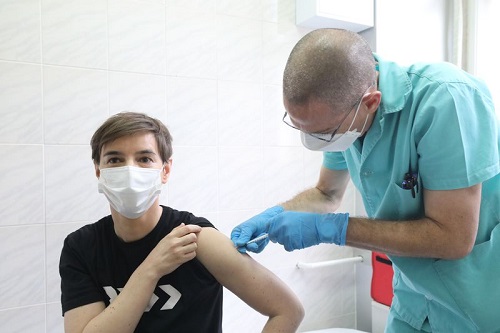
Prime Minister of the Republic of Serbia Ana Brnabic received today the first vaccine against the coronavirus made by Pfizer company, at the Torlak Institute of Virology, Vaccines and Sera.
Brnabic, who is the first European Prime Minister to receive the vaccine, pointed out that this day may be the first since 6 March that we have a reason for a smile on our faces as it marks the beginning of the end of the coronavirus pandemic in Serbia, but also in Europe and the world.
As Prime Minister and as someone who leads the COVID-19 Crisis Response Team, I felt obliged to be the first to receive the vaccine, to show that we believe in it, as well as in our institutions - the Medicines and Medical Devices Agency of Serbia and experts who worked round the clock to test the vaccine, she said.
Underlining that it was an honour to do this for her country and be the first to pave the way for all citizens, the Prime Minister said that she agreed with President of the Republic Aleksandar Vucic that the two of them receive different vaccines, so he will most likely receive the next one that arrives, most probably the one produced by China.
At the moment we have the Pfizer-BioNTech consortium vaccine, and the vaccines from the Chinese Sinopharm are expected in the near future, as well as certain quantities of the Russian vaccine Sputnik V.
She expressed her belief that at the end of the first quarter or the beginning of the second quarter of next year we will have the vaccine of the company AstraZeneca, and after that the vaccine manufactured by Moderna.
As we promised, all vaccines licensed in their countries and approved by relevant international agencies will be available to our citizens, and of course they will be tested by all of our agencies and institutes as well, the Prime Minister pointed out.
She said that prior to the vaccination of health care workers, Minister of Health Zlatibor Loncar will also receive a vaccine shot as we endeavour to serve as an example and show how confident we are in the vaccines and institutions.
Brnabic pointed out that Serbia, not counting Great Britain, is the first country in Europe to receive the Pfizer-BioNTech vaccine, and the third to start a mass immunization and campaign for giving the vaccine - after Great Britain and Switzerland.
We achieved something very important and we will not stop even for a moment until the immunization of the population is completed, the Prime Minister said.
She specified that our country will receive another 16,000 doses of Pfizer-BioNTech vaccine in January, as well as that together with other vaccines we will have a total of one million doses in January, and a total of approximately two million doses during the first quarter of next year.
There is a dynamic on which Pfizer delivers vaccines and it varies depending on the production, and this is the case with deliveries to both Serbia and all other countries worldwide. We expected to receive 10,000 doses from Pfizer-BioNTech in December, however 4,807 doses arrived, the Prime Minister explained.
Serbia demonstrated that it is able to fight and succeed if we all work as a team, Brnabic said and called on all not to see the beginning of vaccination as the end of the fight already, but to continue to apply all measures instead.
This is to be certain and to be able to help our health care workers, and once the immunity is acquired we will be able to slowly start taking off the masks in 2021, but until then we should not see this as a victory but as the beginning of the end, the Prime Minister concluded.
After the Prime Minister, vaccine shots were also administered to the Minister of Labour, Employment, Veteran and Social Affairs and a member of the COVID-19 Crisis Response Team Darija Kisic Tepavcevic and to Predrag Kon who is also on the COVID-19 Crisis Response Team.
Furthermore, vaccine shots were also given to Head of the MMA Department for the Prevention and Control of Nosocomial Infections prof. Dr. Vesna Suljagic and academician Predrag Pesko, professor of Belgrade and Heidelberg universities and full member of the Serbian Academy of Sciences and Arts.
The first quantities of the vaccine arrived in Serbia on 22 December, and today they will be administered to patrons of nursing homes in Belgrade and Novi Sad.
Serbia is the first country in the region to receive a shipment of Pfizer-BioNTech vaccine.
In addition to procuring the vaccine among the first countries in the world, even before EU countries, Serbia is one of the rare countries that managed to build and open two covid hospitals in record time. The hospitals with 930 beds in Batajnica and 500 beds in Krusevac are a major contribution to the expansion of capacities and strengthening the health care system in the fight against coronavirus and, as President Vucic said, represent a monument of the future, that will talk about the accomplishments the state made in a short time.
Also, we recall that investments in health infrastructure have been large in Serbia, and since 2016, 80 health centers and clinics have been renovated, and works are underway on six large health centers. This way more than EUR 200 million was invested in the reconstruction, construction and equipping of hospitals and more than 300 million in the renovation of clinics and specialized hospitals, and many have already been completed, such as the University Children's Hospital Tiršova, and KBC Zemun nad KBC "Dragiša Mišović" hospitals.
The absolute priority of the Serbian Government is the successful completion of health infrastructure projects that are underway, but great attention is also paid to health workers,
whose salaries have, by 2020, been increased by 56.8% for specialist doctors, and 66.9% for
nurses, while significant funding is invested in the education of health professionals, as well as in equipment and working conditions.
Like other countries, Serbia has faced great challenges this year, most notably health challenges, and all factors in the state were focused on preventing the spread of the virus and safeguarding the lives and health of citizens. Serbia has faced these challenges better than many wealthier and more developed countries in Europe and the world.
Belgrade, 24 December 2020 |
|
|
| Dacic and McAllister: Continuation of talks on dialogue after the holidays |
|
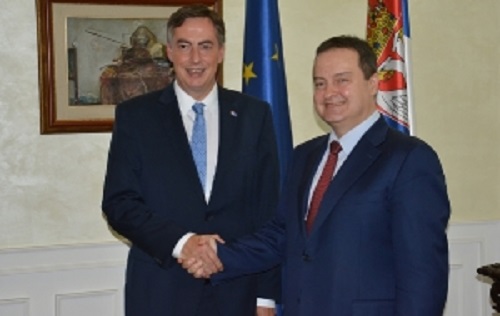
The President of the Assembly of Serbia, Ivica Dačić, and the President of the Foreign Policy Committee of the European Parliament, David McAllister, agreed today, in a telephone conversation, that talks on the topic of inter-party dialogue will continue after the Christmas and New Year holidays.
The joint support for the continuation of the inter-party dialogue in the Serbian Parliament was expressed, in accordance with the agreement reached in the exchange of letters between the presidency of the parliament Maja Gojković and on behalf of the European Parliament, David McAllister, in September 2019, the statement said.
McAllister emphasized the importance that the European Union attaches to the continuation of the inter-party dialogue and the welcome readiness for its soon continuation.
Dacic informed his interlocutor that a session dedicated to the consideration of the European Commission's Progress Report on Serbia for 2020 would be held in the National Assembly next week.This will be the first time that the Report on the progress of the talks in the plenum has been discussed, and McAllister positively assessed that initiative.
Belgrade, 22 December 2020 |
|
|
| Serbia continues to work on implementation of comprehensive reforms |
|
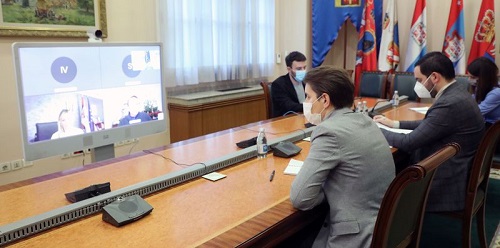
Prime Minister Ana Brnabic talked today via a video link with European Commissioner for Enlargement Oliver Varhelyi about the prospects of Serbia's accession negotiations in the next six months.
Brnabic said that full membership in the EU remains a strategic priority of the government, emphasising that Serbia continues to work on the implementation of comprehensive reforms, especially in the area of the rule of law.
In the new mandate, the Serbian government has already made several reform steps in this area, Brnabic stressed, citing the establishment of a special ministry for human and minority rights and social dialogue and the Working Group for Security and Protection of Journalists, as well as the adoption of an Action Plan for Media Strategy.
Varhelyi expressed satisfaction with the presented plan of the government of Serbia and the efforts he is making on the path to EU membership, assessing that it is essential to speed up the process of Serbia's accession by implementing the mentioned reforms.
The Prime Minister pointed out that she highly appreciates the commitment of Commissioner Varhelyi that a certain amount of vaccines against COVID-19 be delivered to the countries of the Western Balkans as soon as possible.
Belgrade, 21 December 2020
|
|
|
| Minister Selakovic: Full EU membership remains a priority of the new Government |
|
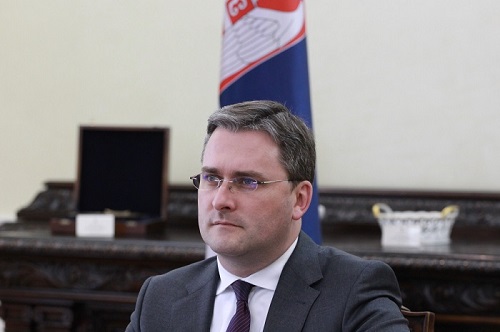
Minister of Foreign Affairs of the Republic of Serbia Nikola Selakovic had talks today via video link with Head of EU Delegation in Serbia Sem Fabrizi and Ambassadors of the EU Member States.
On this occasion, the Serbian Foreign Minister emphasized that full membership of the EU remained one of the key foreign policy priorities of the Serbian Government, and that the European integration process was a strategic goal also aimed at promoting the quality of the society.
Minister Selakovic pointed out that Serbia was ready for an acceleration of the accession process' dynamic which is why it accepted the new methodology in the first place, and that it is now hoping that it will, in the period ahead, receive clearer guidelines on its implementation in the negotiating process.
The Minister said that Serbia has taken a number of important steps forward in the reform process, which were not fully reflected in the European Commission's Annual Progress Report.
The Minister reminded that our country opened 18 out of 35 negotiating chapters with the EU since 2014, provisionally closing two, and that it is at this point ready to open five new chapters.
Discussing the talks between Belgrade and Pristina, Minister Selakovic noted that the only right path towards a sustainable agreement was through dialogue and compromise.
He explained that it was necessary that topics of the talks include the issues being ignored by Pristina for years, despite having committed to them under the Brussels Agreement, such as the establishment of the Community of Serb Municipalities.
The Minister added that Serbia is deeply devoted to regional cooperation and that, as an important country of the region aiming to contribute to overall stability, our side has through its steps, among others, significantly contributed to decreasing the tensions with Montenegro.
Minister Selakovic also said that Serbia was very grateful to the EU and its Member States for the financial assistance, particularly amid the coronavirus pandemic.
Belgrade, 16 December 2020
|
|
|
| Brnabic and Borrell: Political and economic aspects of negotiations |
|

The Serbian government stated that at a meeting of the Stabilisation and Association Council between Serbia and the EU held today, the overall progress achieved in Serbia's accession negotiations so far was commended, as well as the adoption of an improved enlargement methodology that should accelerate Serbia's EU accession process.
The participants in the meeting exchanged opinions on the current political and socio-economic situation in Serbia, and above all on the further dynamics of negotiations on EU accession, cooperation within the Common Foreign and Security Policy, as well as regional cooperation in the Western Balkans.
Accordingly, they welcomed the fact that the new government has placed European integration, preserving public health and economic growth, as well as normalising relations with Pristina at the top of its priority list.
At the meeting held via video link due to the pandemic, the Serbian delegation was led by Prime Minister Ana Brnabic and Minister for European Integration Jadranka Joksimovic.
The EU delegation was headed by High Representative of the EU for Foreign Affairs and Security Policy Josep Borrell and European Commissioner for Enlargement Negotiations Oliver Varhelyi.
Borrell especially expressed gratitude for the participation of Prime Minister Brnabic, which is not the usual format, but which unequivocally shows how much importance the Serbian government attaches to the Stabilisation and Association Agreement and Serbia's European path.
The interlocutors discussed current relations between Serbia and the European Union, primarily the process of Serbia's accession to the EU, as well as political and economic criteria, harmonisation of domestic legislation with the EU acquis, as well as the implementation of the EU pre-accession assistance.
The EU representatives reiterated the EU's commitment to Serbia's European future and called for proactive and strategic communication between Serbia and the EU.
During the meeting, they also talked about the way in which Serbia is facing the consequences of the COVID-19 pandemic, both in terms of resolving the health crisis and in overcoming the consequences for the economy in general and the implementation of reforms.
The participants agreed that good neighbourly relations and regional cooperation are key elements of the enlargement process, and to that end welcomed the continued dialogue between Belgrade and Pristina and Serbia's consistent commitment to the process.
The EU representatives welcomed Serbia's significant contribution to military missions and operations, as well as Serbia's participation in EU battle groups, stressing the importance of further deepening cooperation on foreign policy issues.
The participants in the meeting also supported the Common Regional Market, launched by Western Balkan leaders at a summit in Sofia on 10 November, and recalled that the Western Balkans Economic and Investment Plan, adopted by the European Commission on 6 October 2020, provides a comprehensive framework to support economic convergence of Serbia and the EU region.
Belgrade, 17 December 2020 |
|
|
| VIDEO CONFERENCE OF THE MEMBERS OF THE SERBIA STABILISATION AND ASSOCIATION COUNCIL, 17 DECEMBER 2020 |
|
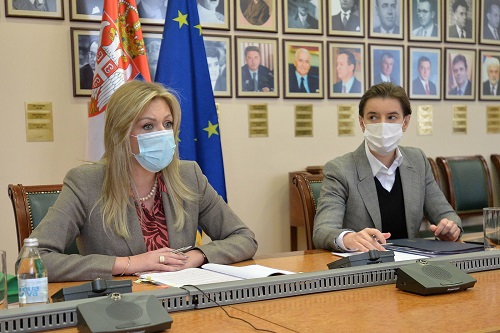
Video conference of the members of the EU-Serbia Stabilisation and Association Council was held on 17 December. The Delegation of the Republic of Serbia was led by Prime Minister Ms. Ana Brnabić and Minister of European Integration Ms. Jadranka Joksimović. Ambassador Ana Hrustanović, Head of Mission of the Republic of Serbia, representatives of cabinets of Prime Minister and Minister of European Integration, Ministry of European Integration and Mission of the Republic of Serbia also attended the meeting.
The Delegation of the EU was led by High Representative of the European Union for Foreign Affairs and Security Policy Mr. Josep Borrell Fontelles and Commissioner for Neighbourhood and Enlargement Mr. Olivér Várhelyi. Mr. Miroslav Lajčák, EU Special Representative for the Belgrade-Priština Dialogue, ambassador Sem Fabrizi, Head of Delegation of the European Union to the Republic of Serbia, representatives of the European External Action Service, European Commission and General Secretariat of the Council of the EU also attended the meeting.
Relations under the Stabilisation and Association Process, namely the accession negotiations and bilateral relations between Serbia and the EU under the Stabilisation and Association Agreement were discussed at the meeting. Particular attention was devoted to political and economic criteria, harmonisation of national legislation with the acquis and pre-accession assistance. There was also an exchange of views on developments in the Western Balkans. |
|
|
| J. Joksimović and Roth on Serbia’s negotiations and new methodology |
|
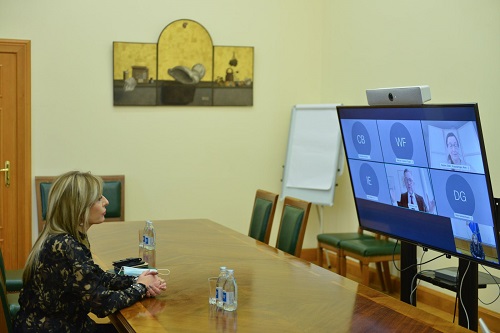
Minister of European Integration Jadranka Joksimović has held a video meeting today with Michael Roth, the Minister of State for Europe at the German Federal Foreign Office. They have discussed the current epidemiological situation in the two countries and the EU, as well as Serbia’s European integration process.
Joksimović and Roth have also talked about the issues related to the EU’s internal situation, particularly regarding the new seven-year budget, the place and the future of the enlargement policy and the Western Balkans, notably about all aspects of Serbia’s accession process, challenges and expectations from the new methodology, which should bring a faster negotiation process that would be better monitored and directed under stronger political steering.
Joksimović has particularly informed Roth about the fact that the Government of Serbia prepared a concrete implementation plan for the first negotiation cluster on the rule of law, which comprises five rule-of-law chapters that have already been opened, adding that the realisation of the plan has already begun.
“This serious implementation plan includes a repeated initiative sent to the National Assembly for the adoption of constitutional amendments, the adoption of the Action Plan for the implementation of the Media Strategy, as well as the Working Group on monitoring the implementation of the Action Plan and the Working Group on journalist safety and protection”, said Joksimović, according to the press release published by the Ministry of European Integration.
She has also stressed that GRECO recommendations for the fight against corruption have been published in a transparent way, and that further actions will be taken in line with them.
She has further presented all other important segments of Serbia’s reform policy in all six clusters, including Green Agenda, digitisation, Economic and Investment Plan for the WB, and stable and sound macroeconomic indicators, stressing that, therefore, this year, Serbia has again undeniably demonstrated that it deeply and substantively participates in key EU policies and that it is a credible European country.
Joksimović has emphasised that Serbia understands that the EU and member states will need some more time to define the application of the new methodology to Serbia’s negotiation process, and that it is therefore important to maintain a constant and open dialogue so as to direct the process in line with the new methodology.
She has expressed regret that conclusions on enlargement have not been adopted this year and that, consequently, the political Intergovernmental Conference with Serbia has not been held during the German presidency.
On the other hand, the Minister has expressed belief that the upcoming Stabilisation and Association Council will offer an opportunity to discuss all political and economic aspects of Serbia’s process at the highest level.
Roth has thanked Minister Joksimović for the information and issues she shared, as well as for Serbia’s proactive approach regarding reforms and active acceptance of the new methodology.
He has underlined that Germany supports Serbia and the enlargement policy, particularly welcoming all significant steps that the new Serbian Government has already taken, especially regarding cluster 1 – rule of law, where he stressed that they are an important and positive signal for Serbia’s European path.
He has agreed with Minister Joksimović about the need to urgently define the application of the new methodology to countries that are already in the accession process, where clusters of European policies and Serbia’s participation therein become an instrument for measuring progress in the accession process.
He has conveyed that Germany will advocate the holding of the political Intergovernmental Conference with Serbia in the first half of 2021.
The interlocutors have particularly discussed the Economic and Investment Plan for the Western Balkans, agreeing that it represents another proof that the European Union gives strategic importance to a stable and sustainable development of the region, particularly in difficult circumstances of curbing the effects of the COVID-19 pandemic.
Joksimović has thanked Minister Roth for Germany’s long-term and concrete assistance to Serbia’s European integration, not only at the political level, but also through providing development assistance for financing reform projects, and successful strategic investments that have created a significant number of new jobs.
The interlocutors have also agreed that it is extremely important that, through the COVAX Facility, Serbia has ensured that its access to vaccines procured by the EU will be almost simultaneous with the EU member states’ access.
Source: Tanjug |
|
|
| STATEMENT BY THE MINISTRY OF FOREIGN AFFAIRS |
|
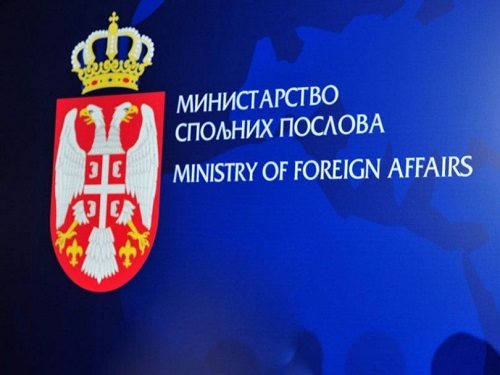
On the occasion of 10 December, the international Human Rights Day, the Ministry of Foreign Affairs of the Republic of Serbia reaffirms its commitment to the principles and values of the Universal Declaration of Human Rights, adopted on this day in 1948.
The principles enshrined in the Universal Declaration of Human Rights have been the foundation for the development of international law in this field, and of the international system for the promotion and protection of human rights, as a unique achievement of modern civilization. It is incumbent upon us today to safeguard and strengthen the international system ensuring respect for human rights, to develop human rights standards, control the implementation of commitments, and also to continue cooperating with international and regional institutions on the protection of human rights.
Serbia is fully committed to the universal values of human rights and implementing in practice the international legal instruments relating to human rights. Our continued cooperation with the Human Rights Council mechanisms in the framework of the United Nations, with the Council of Europe and the mechanisms of the OSCE human dimension, represents an important segment of activities carried out by all state authorities, thus demonstrating our consistent commitment to the implementation of international human rights standards.
The international Human Rights Day is an opportunity to point out once again that Serb and other non-Albanian population is being deprived of its rights in Kosovo and Metohija and to call again on the international community to ensure the respect for the guaranteed international human rights norms and contribute to creating conditions for the return of internally displaced persons and giving them back their usurped property.
|
|
|
| President meets the ambassadors of the EU member states accredited to Serbia and the head of the European Union Delegation |
|
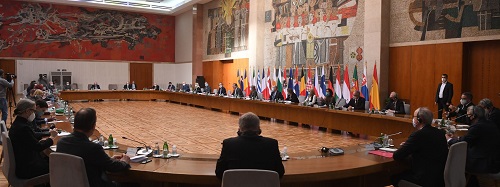
The President of the Republic of Serbia Aleksandar Vučić met today the ambassadors of EU Member States accredited to Serbia and the Head of the EU Delegation Sem Fabrizi in the Palace of Serbia, to talk to them about topics such as dynamics of the accession negotiations between Serbia and EU, stability in the region, regional projects, as well as the Economic and Investment Plan presented by the European Commission together with the Enlargement package.
President Vučić once again confirmed that cooperation with the European Union and fully-fledged membership of Serbia remain one of the key foreign policy priorities of our country. He particularly emphasised that in this respect Serbia is honestly dedicated to further and deeper reforms, approaching them with responsibility and seriousness, and that it tries to adopt and apply the best practice through cooperation with institutions of the EU and its member states.
"Serbia will continue being dedicated to the promotion of peace and stability in the region, by improving bilateral relations with neighbours, and by strengthening regional cooperation while respecting all concluded agreements", President Vučić stated, adding that the European future of the Western Balkans is of utmost importance for both stability of the entire region and security and further prosperity of the EU.
Ambassadors pointed out that declarations on the common regional market and the Western Balkans green agenda, which were signed by Serbia and all leaders of the region, received a warm welcome in Brussels and EU Member Stated, and that good and solid connectivity and integration of the region largely facilitates the cooperation of the very Union with the Western Balkans in all areas of joint interest.
"As much as 70% of foreign investments come from the countries whose representatives are sitting here today", Head of the EU Delegation to Serbia Sem Fabrizi said, adding that Serbia can rest assured the EU will continue supporting and investing in the Serbian economy. While Covid-19 has put all economies under stress, Serbian economy has resisted and proved its resilience. With the Economic and Investment Plan for the Western Balkans, the EU will remain Serbia's strongest partner for economic recovery which will support infrastructures, green and digital transition. We welcome the announced reforms in the areas of rule of law, including judiciary reforms and media freedom. This is precisely the base for acceleration of the accession process and we encourage the new government to keep working and implementing in this direction", Fabrizi said.
President Vučić pointed out that Serbia highly appreciates that the EU, despite numerous challenges it is facing has managed to preserve the enlargement issue on its agenda, especially through the recent adoption of a new, changed methodology of the negotiation process.
"In this respect, we expect from the EU that Serbia's accession negotiation dynamics follows and values our reform efforts", President Vučić said pointing out that Serbia is ready to continue working with its European partners on implementation of the reforms and numerous joint projects.
President Vučić particularly noted that Serbia welcomes the Economic and investment plan presented by the EC together with the Enlargement package, and expressed our country's readiness to continue working with the partners in the region on the implementation of this Plan so as to improve the economic potential of the region and achieve better infrastructure connection, which would bring us closer to the single European market.
"In this context, we hope the Multiannual financial framework 2021-2027 will be adopted soon, because that will mean a possibility to use funds designed for reform implementation in Serbia and in the region", President Vučić said, reiterating that Serbia remains on its European path with an honest faith in cooperation with the European partners.
"2020 has been an extremely difficult year for all, especially the impact of COVID–19. When I look at new Government's commitment to implement reforms, the Economic and Investment Plan of the EU, the new methodology and increased cooperation to fight COVID-19, I see 2021 with a much more favourable perspective for progressing the enlargement", Fabrizi concluded.
President Vučić also pointed out that Serbia is prepared to work intensively with the EU Member States on finding an adequate response to the new challenges, such as COVID-19 pandemic.
Belgrade, 8th December 2020 |
|
|
| SERBIA - Emerging tech development hub |
|
 |
|
|
| PRESIDENT OF THE REPUBLIC OF SERBIA ALEKSANDAR VUČIĆ VISITED BRUSSELS, 6-7 SEPTEMBER 2020 |
|
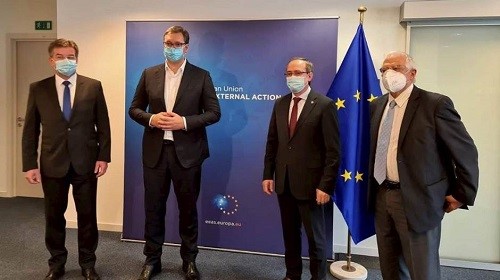
President of the Republic of Serbia Aleksandar Vučić visited Brussels on 6 and 7 September 2020, on the occasion of continuation of the meetings within the EU facilitated Belgrade-Pristina Dialogue.
Durigng his visit, president A. Vucic had bilateral meeting with EU High Representative for Foreign Affairs and Security Policy Josep Borrell and EU Special Representative for the Belgrade-Pristina Dialogue and other Western Balkans regional issues M. Lajčak, and trilateral meeting with representatives of the EU as well as Priština A. Hoti. This was the third high-level meeting within Belgrade-Pristina Dialogue since its resumption in July.
Important topics which have been subject of discussions at experts’ level in previous weeks were discussed at the meeting: missing persons, internally-displaced persons and economic cooperation. New topics were also introduced: arrangements for non-majority communities, mutual financial claims and property. These topics will be the subject of further discussions in Brussels.
During his visit to Brussels, president Vučić had a joint meeting with EU Special Representative for the Belgrade-Pristina Dialogue and other Western Balkans regional issues M. Lajčak and Deputy Assistant Secretary and Special Representative for the Western Balkans Matthew Palmer, as well as a separate meeting with EU commissioner for Neighborhood and Enlargement O. Varheji. |
|
|
| Belgrade in colours of Europe |
|


On the occasion of Europe Day, the most famous sights in Belgrade Branko`s Bridge, Ada Bridge, Slavija square as well as Palace of Albania downtown in Belgrade were in coulors of Europe last night.
Click here to watch the video.
 
|
|
|
| DIGITAL CONTENTS - SERBIAN CULTURAL INSTITUTTONS 2020 |
|
ln order to safer overcome the social situation due to COVID-19 epidemic, and to facilitate access to cultural contents to the citizens of Serbia,
as well as to users from other countries, the Ministry of Culture and Media of the Republic of Serbia offered a large scale of programs of
National Cultural lnstitutions available in digital format (virtual tours, digital audio and video materials, photos, texts, 3D scanned objects, etc.) in different languages.
The official Site of the Ministry of Culture of Serbia:
http://www.kultura.gov.rs/en
SERBIAN FILMS (disponible on-line / feature-length films)
1. Next to me (Pored mene, 2015), Stevan Filipovic, (drama, 110 minutes)
About the Movie
Link: Watch it here
2. Skinning (Šišanje, 2010), Stevan Filipović, (drama, 98 minutes)
About the Movie
Link: Watch it here
3. Sheitans Warrior (Šejtanov ratnik, 2006), Stevan Filipović, (fantastic comedy, 94 minutes)
About the Movie
Link: Watch it here |
|
|
| CORONA VIRUS - MEASURES TO PREVENT THE EXTENSION OF EPIDEMIA |
|
The President of the Republic of Serbia, Aleksandar Vucic, the Prime Minister of the Republic of Serbia, Ana Brnabic, and the President of the National Assembly of the Republic of Serbia, Maja Gojkovic, adopted on March 15, 2020, in accordance with the Constitution, a Decision on the introduction of a state of emergency.
Borders of the Republic of Serbia are closed to all foreign citizens, with the exception of diplomats accredited in Serbia and foreigners with a residence permit in Serbia.
All citizens of the Republic of Serbia, as well as accredited diplomats and foreign nationals residing in the Republic of Serbia, who enter the Republic of Serbia, are obliged to be in self-isolation for at least 14 days, under criminal responsibility. This measure will be strictly controlled and its violation will be most severely sanctioned.
In the case of citizens of the Republic of Serbia and foreign nationals residing in the Republic of Serbia who come from highly infected areas, isolation is determined for 28 days.
All information on high-risk countries and changes in the regime of entry into the Republic of Serbia can be downloaded on the Government of the Republic of Serbia website - www.srbija.gov.rs, in the News section.
The mode of operation of border crossings has been changed - information can be downloaded on the website of the Ministry of Interior of the Republic of Serbia - www.mup.gov.rs.
Information on measures against the spread of Corona virus can be downloaded on the website of the Ministry of Health of the Republic of Serbia - www.covid19.rs. |
|
|
| CORONA VIRUS: RECOMMENDATION TO SERBIAN CITIZENS ABROAD |
|
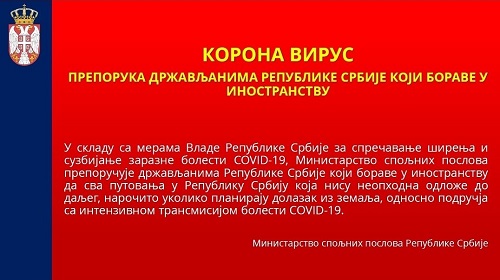
In accordance with the measures taken by the Government of the Republic of Serbia to prevent the spread and control of infectious disease COVID-19, the Ministry of Foreign Affairs recommends that citizens of the Republic of Serbia staying abroad should postpone any travel to the Republic of Serbia that is not necessary, especially if they are planning to come from countries or areas with intense COVID-19 disease transmission. |
|
|
| Prime Minister of the Republic of Serbia Ana Brnabić at the international donors’ conference “Together for Albania”, Brussels, 17 February |
|

Prime Minister of the Republic of Serbia Ana Brnabić participated in the international donors’ conference “Together for Albania”, which took place in Brussels on 17th February. The international donors’ conference was organized by the European Union as a support to Albania in after the devastating earthquake.
Besides participating in the Conference, the Prime Minister attended a working lunch organized for the leaders of the Western Balkans by European Commissioner for Neighborhood and Enlargement Oliver Varhelyi.
During her visit, the Prime Minister had bilateral meetings with President of the European Commission Ursula von der Leyen and President of the European Parliament David Sassoli. |
|
|
| President of the Republic of Serbia Aleksandar Vučić at informal dinner for the Western Balkans leaders, Brussels, 16 February |
|
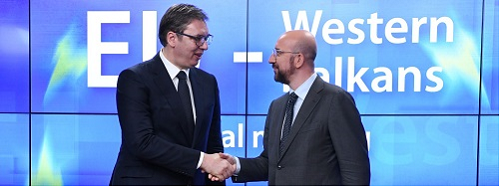
President of the Republic of Serbia Aleksandar Vučić attended informal working dinner for the Western Balkans leaders, organized by the President of the European Council Charles Michel, in Brussels on 16th February. President of the European Commission Ursula von der Leyen, EU High Representative on Foreign Affairs and Security Josep Borrell and Prime Minister of the Republic of Croatia Andrej Plenković on behalf of the Croatian Presidency to the EU, also attended the dinner.
„It is essential that we have witnessed the sincere commitment of the EU and their top officials to the progress of the entire region and the desire for people living in the Western Balkans to feel the benefits of the EU accession”, said President Vučić in his press statement after the dinner.
The revised enlargement methodology as well as the new economic development plan for the Western Balkan were also discussed during the dinner. |
|
|
| The Speaker of the National Assembly of the Republic of Serbia Maja Gojkovic at Summit of Western Balkans Parliament Speakers and the European Parliament in Brussels, 28th January |
|
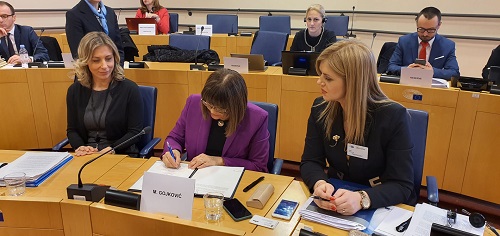
The Speaker of the National Assembly of the Republic of Serbia Maja Gojkovic participated at Summit of Western Balkans Parliament Speakers and the European Parliament in Brussels on 28th January.
At the summit dedicated to the strengthening of the parliamentary dimension of the enlargement process and empowerment of the parliaments in the region, Gojkovic said that Serbia remains committed to EU accession and fully supports the enlargement policy. She underlined that the region’s clear future prospects of European integration are vital and the EU has to reaffirm its standing as a community of values through the enlargement process and strengthening of democratic institutions.
The Serbian Assembly Speaker said that the parliament plays a key role in the accession talks by harmonizing the national legislation with the EU acquis and taking active part in the adoption of negotiating positions as well as by helping the general public become better acquainted with the EU structures and processes.
The summit was concluded with the adoption of the Joint Declaration of the Western Balkans’ parliament speakers, reaffirming the parliaments’ key role in the promotion of the EU reform agenda and fulfilment of the Western Balkans’ European aspirations. |
|
|
| MOGHERINI INVITED WESTERN BALKANS LEADERS TO A FAREWELL WORKING DINNER, BRUSSELS, 29 OCTOBER 2019 |
|
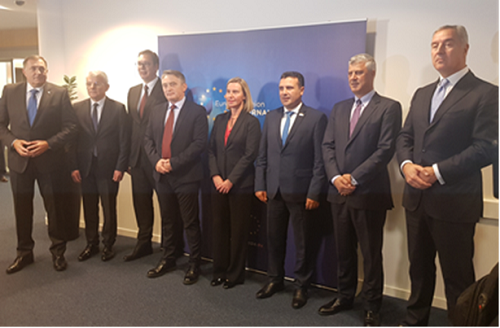
EU High Representative for Foreign and Security Policy, Federica Mogherini, invited President of the Republic of Serbia Mr Aleksandar Vucic and other Western Balkans leaders to a farewell working dinner, which was organised on 29 October 2019 at the EEAS headquarters in Brussels The High Representative and the Western Balkans leaders exchanged views on EU-Western Balkans relations and developments in the region. They agreed that the EU integration of the Western Balkans continues to be a key strategic objective, in the shared interest of the European Union and the region. The participants again confirmed their strong commitment to the EU perspective, to the reforms it requires for the benefit of their citizens, as well as to regional cooperation and good neighbourly relations. President Aleksandar Vucic also thanked HR Federica Mogherini for her efforts and support of Serbia's European integrations. On the same day, Serbia’s President Mr Aleksandar Vucic met Jean-Claude Juncker, President of the European Commission and Johannes Han, Commissioner for Neighbourhood Policy and Enlargement Negotiations. While discussing European integration process, the importance of Serbia's commitment to the European path was stressed. President Vucic especially thanked Jean-Claude Juncker for respecting Serbia and showing it on every occasion.
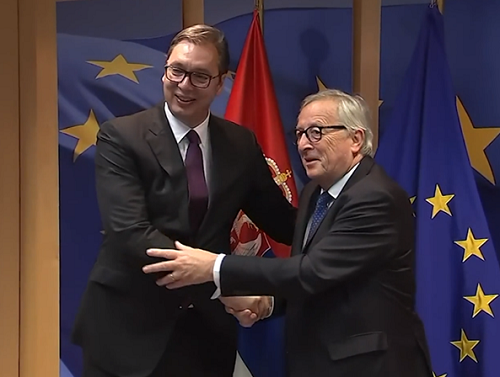 |
|
|
| SIXTH MEETING OF SPECIAL GROUP FOR PUBLIC ADMINISTRATION REFORM, 14 OCTOBER 2019, BRUSSELS |
|
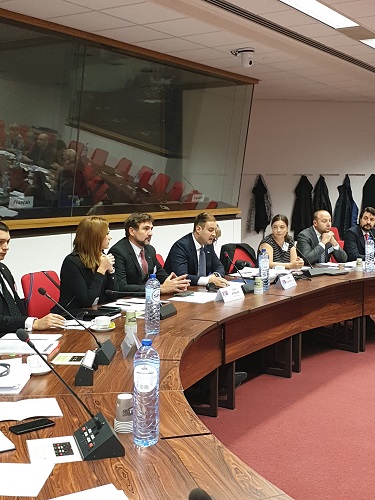
The 6th meeting EU-Serbia Special group on public administration reform was held in Brussels on 14 October 2019. The delegation of the Republic of Serbia was led by Ivan Bošnjak, State Secretary at the Ministry of Public Administration and Local Self-Government and Gojko Stanivuković, State Secretary at the Ministry of Finance. The meeting was chaired by Catherine Wendt, Head of Serbia Unit, Directorate-General for Neighbourhood and Enlargement Negotiations (DG NEAR).
This meeting was an opportunity to present numerous activities which have been implemented since the previous PAR Special Group meeting in May 2018, as well as plans for the upcoming period, in particular concerning the implementation of strategic documents and relevant legislation in the area of public administration reform. |
|
|
| TRADITIONAL CEREMONY OF THE AP OF VOJVODINA HELD IN BRUSSELS ON 7 OCTOBER 2019 |
|
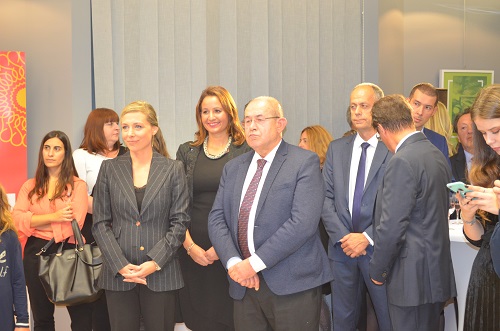 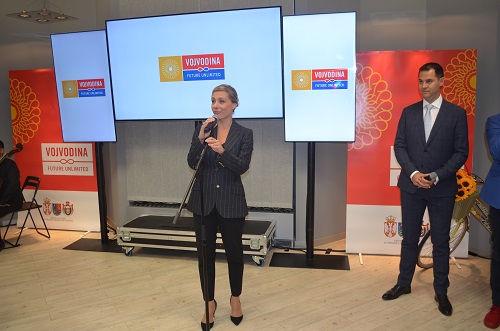
Promotional ceremony of the AP of Vojvodina within the framework of European Week of Regions and Cities was organised on 7 October 2019 in Brussels by the Mission of the Republic of Serbia to the EU, Office of the Autonomous Province of Vojvodina.
On this occasion, the guests were addressed by the President of the Assembly of the AP of Vojvodina Ištvan Pastor, H.E. Ambassador Ana Hrustanović, Head of Mission of the Republic of Serbia to the EU, Head of the Office of the Autonomous Province of Vojvodina in Brussles Srđan Mačkić and Provincial Secretary for Regional Development, Interregional Cooperation and Local Self-Government Nebojša Drakulić.
The ceremony under the promotional title “Vojvodina, Future Unlimited” was attended by many representatives of the European institutions, partner regions and cities, business sector, diplomats, etc.
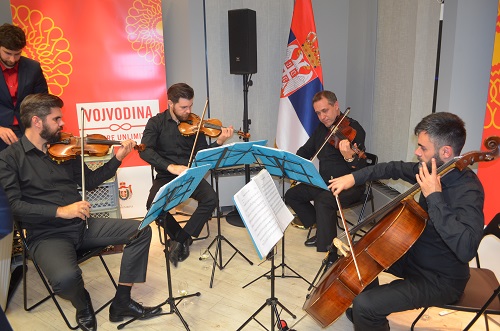 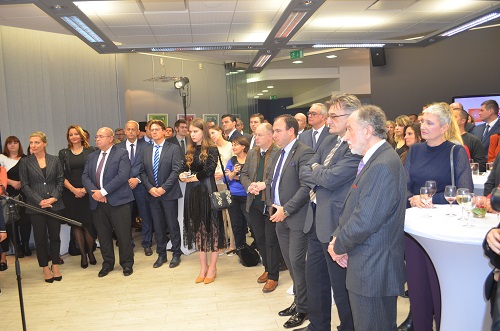 |
|
|
| Foreign Investors Council conducted visited EU institutions in Brussels, 3 October 2019 |
|
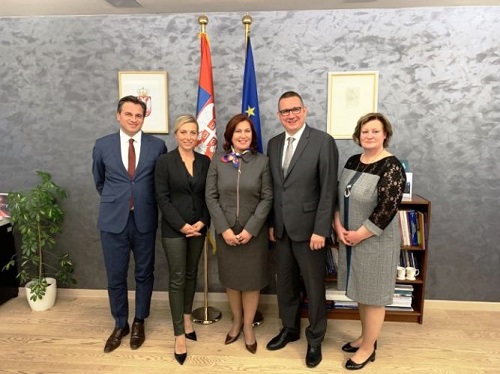
Ambassador Ana Hrustanović, Head of Mission of the Republic of Serbia to the EU met with representatives of the Foreign Investors Council (FIC) during their visit to the European institutions in Brussels. The members of FIC delegation were: FIC President Yana Mikhailova, Board Member Goran Pekez, Executive Director Aleksandar Ljubić and Vice President of FIC Legal Committee Jelena Vukić-Šuljagić. The discussion concerned FIC support to the process of European integration of Serbia, being a reliable partner both to the Serbian Government and the European Union.
During a two-day visit the delegation of the Foreign Investors Council met with representatives of 8 directorate generals of the European Commission: DG for European Neighbourhood Policy And Enlargement Negotiations - DG NEAR, DG for Economic and Financial Affairs - DG ECFIN, DG for Taxation and Customs Union - DG TAXUD, DG for Employment, Social Affairs and Inclusion - DG EMPL, DG TRADE, DG for Communications Networks, Content and Technology - DG CONNECT, DG for Health and Food Safety - DG SANTE and DG Internal Market, Industry, Entrepreneurship and SMEs - DG GROW. |
|
|
| MINISTER ŠARČEVIĆ VISITED BRUSSELS, 23-24 SEPTEMBER 2019 |
|
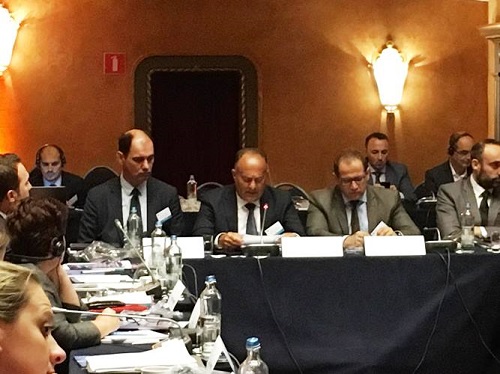
The 21st Ministerial Meeting of the Western Balkans Steering Platform on Research and Innovation was held in Brussels on 23 and 24 September 2019. Our country was represented by the Minister of Education, Science and Tenological Development M. Šarčević with the delegation of the State Secretaries: Ph.D A. Langovic Milicevic, Ph.D V. Nedović and Ph.D V. Popovic. The views on the participation of the Western Balkans in the EU Framework Program for Research and Innovation were exchanged at the meeting. Opinions on smart specialization, research infrastructure and Horizon Europe were also exchanged. During the meeting, the Initial Statement on the Horizon Europe proposal by the WB6 was agreed.
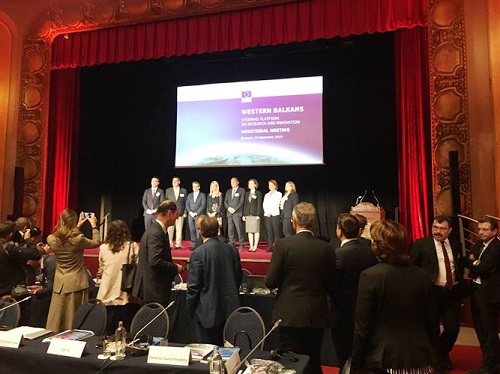 |
|
|
| TENTH MEETING OF THE INTERGOVERNMENTAL CONFERENCE EU-SERBIA, BRUSSELS, 27 JUNE 2019 |
|
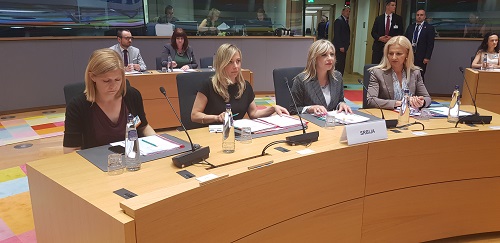
The tenth meeting of the Intergovernmental conference EU-Serbia was held in Brussels on 27 June 2019. On this occasion, the negotiating chapter 9 (Financial Services) was opened. The delegation of the Republic of Serbia was led by Jadranka Joksimović, Minister for European integration, and the meeting was also attended by the ambassador Ana Ana Hrustanović, Head of Mission of the Republic of Serbia to the EU, Tanja Miščević, Head of Negotiating Team, Ksenija Milenković, acting assistant minister for European integration, Vladimir Ateljević, advisor to the minister for European integration and other representatives of the Ministry for European Integration and Mission of the Republic of Serbia to the EU.
The meeting was chaired by George Ciamba, Minister Delegate for European Affairs of Romania, and Johannes Hahn, Commissioner for European Neighbourhood Policy and Enlargement Negotiations also gave his speech at the conference. Hungarian Minister of Foreign Affairs and Trade Peter Siarto and Finish PSC ambassador Hana Lehtingen also participated in the meeting. On behalf of the EU, the conference was also attended by representatives of the European Commission, General Secretariat of the Council of the EU and EU Member States.
After the conference, Minister Joksimović and Commissioner Hahn signed financial agreement for IPA 2018 agreement, amounting to 179, 1 million euros. At the end, minister Joksimović, Minister Ciamba and Commissioner Hahn participated in press conference.
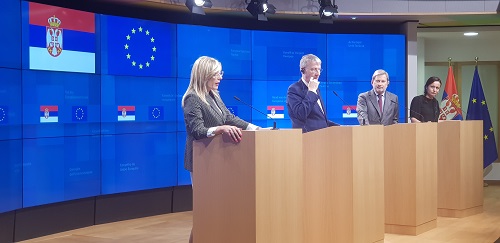 |
|
|
| MINISTERIAL CONFERENCE OF THE BLACK SEA ECONOMIC COOPERATION (BSEC) AND THE EU, BRUSSELS, 18 JUNE 2019 |
|
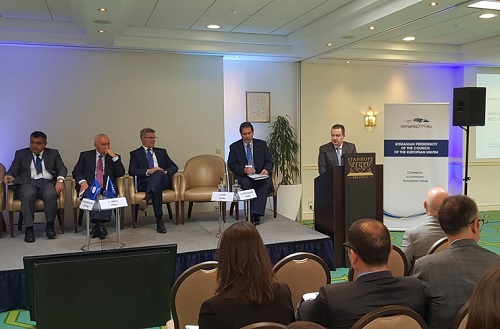
First Deputy Prime Minister and Minister of Foreign Affairs of the Republic of Serbia Ivica Dačić participated in the Ministerial Conference of the Black Sea Economic Cooperation (BSEC) and the EU, which was held in Brussels on 18 June 2019. The conference was organised by Romanian Presidency of the Council of the European Union and Bulgarian Presidency of BSEC. Directorate-General of the European Commission for Neighbourhood and Enlargement Negotiations hosted the conference.
High representatives of BSEC, European Commission, European External Action Service, Ministers of Foreign Affairs of Romania, Greece and Malta, as well as Deputy Ministers of Foreign Affairs of Bulgaria, Azerbaijan and Turkey, State Secretary at the MFA of Hungary, Undersecretary of State at the MFA of Poland, Ambassadors of Armenia, Russia and Ukraine to the EU and other high official participated in the conference.
All participants pledged to strengthen sectoral cooperation in the fields of economy and trade, transport and energy, environmental protection, tourism, cross-border cooperation, digitization and to jointly work on addressing the challenges of climate change, in order to improve the quality of life of the population, primarily at the local level. |
|
|
| ECONOMIC AND FINANCIAL DIALOGUE BETWEEN THE EU AND THE WESTERN BALKANS AND TURKEY, BRUSSELS, 17 MAY 2019 |
|
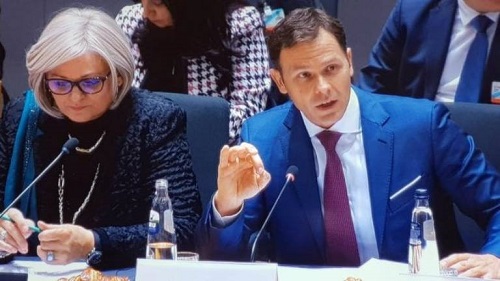
On the margins of the Economic and Financial Affairs Council (ECOFIN), the Economic and Financial dialogue between the EU and the Western Balkans and Turkey was held in Brussels on 17 May 2019. The delegation of the Republic of Serbia was led by the Governor of the National Bank of Serbia Jorgovanka Tabaković and the Minister of Finance Siniša Mali.
On this occasion it was concluded that the EU supported Serbia in its efforts to strengthen the institutional framework and speed up the implementation of reforms. This meeting is a part of enhanced dialogue on economic governance between the EU, the Western Balkans and Turkey, and it is organized annually with aim to enable efficient preparation of the participants for the process of coordination of economic policies on the EU level.
As a result of the reforms which have been implemented since 2014, Serbia has become the most attractive destination for investments in the region, and during last year foreign direct investments reached 3,5 billion euros.
In the conclusions of this meeting, the Economic Reform Programme of the Republic of Serbia was positively assessed. Serbia was commended for strong fiscal consolidation implemented in previous period, while maintaining financial stability. |
|
|
| MINISTER OF FINANCE SINIŠA MALI VISITED BRUSSELS, 16-17 MAY 2019 |
|
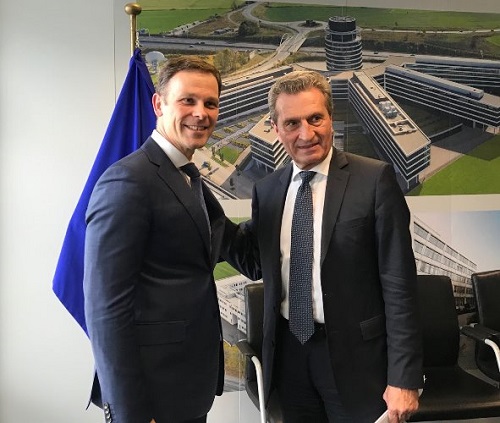
Minister of Finance of the Republic of Serbia Siniša Mali visited Brussels on 16 and 17 May 2019. On this occasion, Minister Mali met with EU Commissioner for Budget and Human Resources Ginter Etinger and participated in the meeting of the Economic and Financial dialogue between the EU and the Western Balkans and Turkey.
During the meeting with Commissioner Etinger, which was held during the firts day of visit, it was confirmed, iter alia, that the Republic of Serbia made significant progress and produced exceptional economic results in previous period, through the implementation of strong fiscal consolidation, while maintaining financial stability.
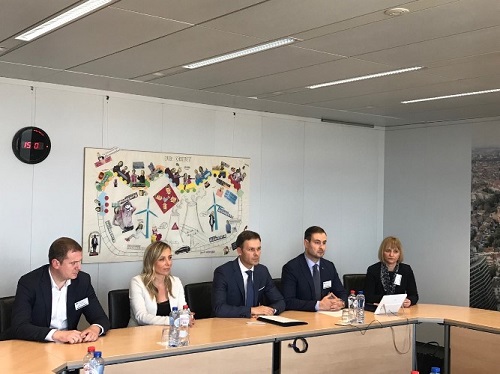 |
|
|
| EU-WESTERN BALKANS MURAL PRESENTED IN BRUSSELS, 4 APRIL 2019 |
|
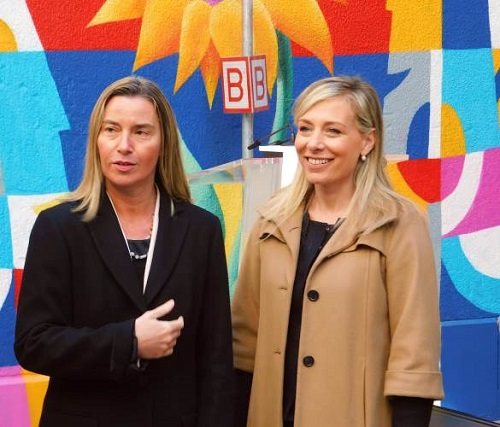
Ambassador Ana Hrustanović, Head of Mission of the Republic of Serbia to the EU attended the event during which the High Representative of the European Union for Foreign Affairs and Security Policy Federica Mogherini presented a new mural in Brussels, painted by Rikardo Druškić, young artists from Bosnia and Herzegovina.
The EU – Western Balkans mural is part of an EU – Western Balkans Cultural week organised by the European External Action Service (EEAS) in Brussels to celebrate the shared European identity and strong cultural connection between the EU and the Western Balkans.
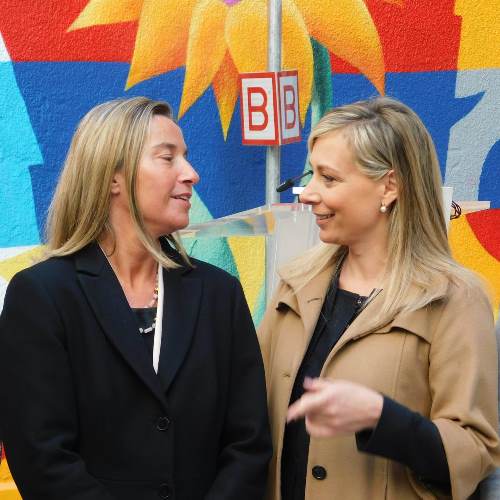 |
|
|
| REPUBLIC OF SERBIA CANDIDATE FOR THE UNESCO EXECUTIVE BOARD 2019 - 2023 |
|
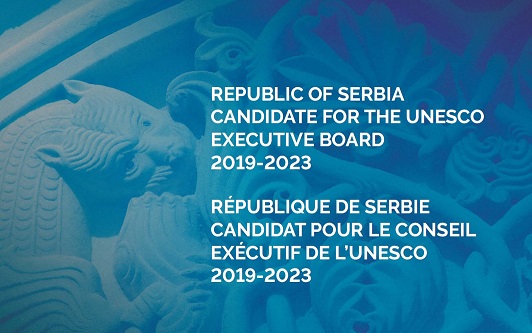 |
|
|
| MEETING OF THE EU – SERBIA STABILIZATION AND ASSOCIATION PARLIAMENTARY COMMITTEE (SAPC) |
|
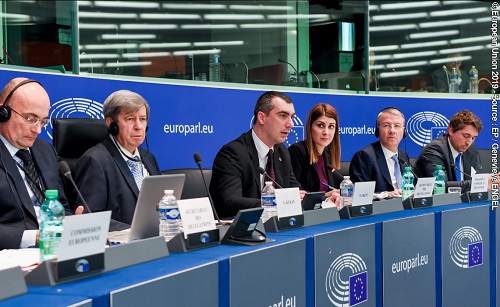
The 10th meeting of the EU – Serbia Stabilization and Association Parliamentary Committee (SAPC) was held in the European Parliament in Strasbourg on 27 March 2019.
The delegates from National Assembly and the European Parliament exchanged views on the relevant aspects of the negotiating process of Serbia with the EU, and the dialogue on normalization of relations between Belgrade and Priština. The meeting was chaired by Eduard Kukan, head of the European Parliament delegation and dr Vladimir Orlić, head of the delegation from the National Assembly of the Republic of Serbia. The Government of the Republic of Serbia was represented by Jugoslav Milačić, adviser to the Minister of European integration. At the end of the meeting, SAPC unanimously adopted the Declaration and Recommendations, in which the delegates presented the achievements of Serbia and the forthcoming challenges on its road to the EU.
Kukan said that it has been an honour to participate in the work of Parliamentary Committee all these years, and Vladimir Orlic said that he hoped that Serbia would continue to have strong allies among the members of the European Parliament.
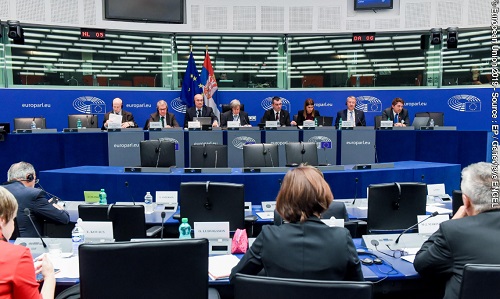
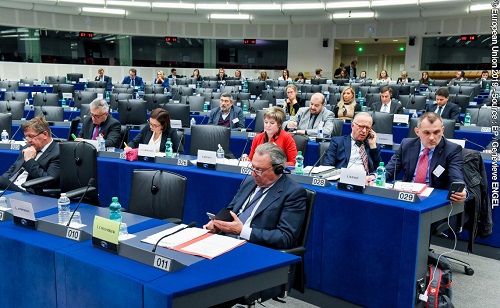 |
|
|
| Screening of the documentary "The long road to war" |
|
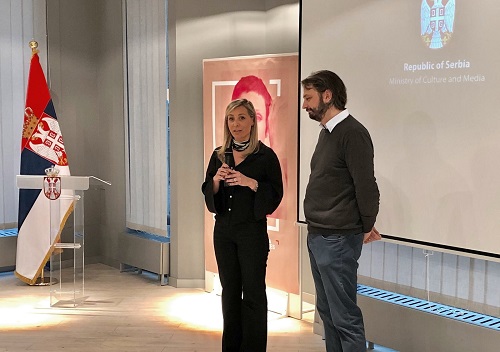
Screening of the documentary "The long road to war" was held at the premises of the Mission of Serbia to the European Union on 13 March, in presence of the author Mr. Milos Skundric.
In her opening remarks, H.E. Ana Hrustanović, ambassador of the Republic of Serbia to the EU, reminded that Serbia lost more than 1.1 million inhabitants during the war, including both army and civilian losses, which represented more than 26 per cent of its total population and 58 per cent of its adult male population. Ambassador emphasized that Serbia has emerged from long and troubled history to become a major factor of stability in the region today.
Mr. Skundric said that his documentary gives an intriguing approach to the events preceding World War I, seen through the eyes of distinguished European historians.
The projection was attended by the representatives of the European Commission, European External Action Service, European Parliament, Belgian diplomatic corps, the officials of NATO, representatives of EU member states, as well as Serbian diaspora.
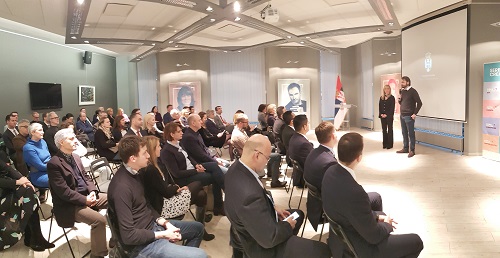
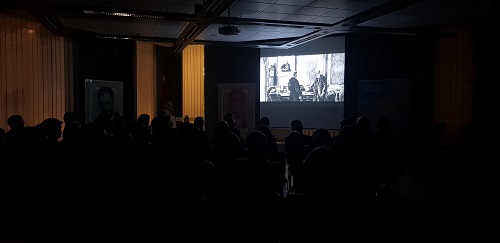
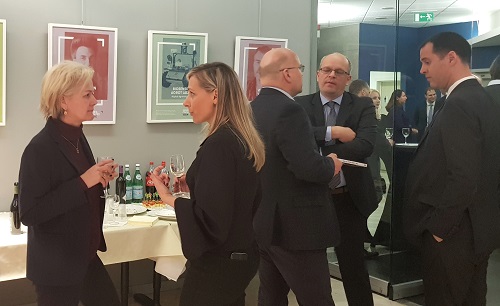
The Long Road To War - Trailer |
|
|
| MEETING OF THE EU-SERBIA JOINT CONSULTATIVE COMMITTEE, BRUSSELS, 27 FEBRUARY 2019 |
|
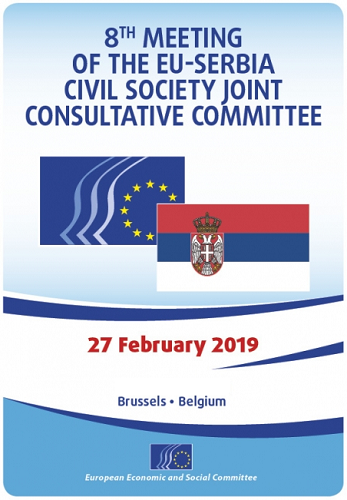
The 8th Meeting of the EU-Serbia Joint Consultative Committee was held on 27 February 2019 in the European Economic and Social Committee in Brussels. On this occasion, representatives of civil society from Serbia and the European Economic and Social Committee discussed about digitalization, public administration reform, rule of law and civil society in Serbia. Members of the Joint Consultative Committee adopted the Joint declaration at the end of the meeting, expressing their support for the EU's enlargement policy in the Western Balkans and emphasizing the importance of continuing reforms in Serbia, especially in the area of rule of law, judiciary and the media. Also, the Joint Consultative Committee members welcomed digitalization as one of Serbia's priorities and proposed concrete measures in the field of public administration reform.
The EU-Serbia Joint Consultative Committee is a body established under the provisions of the Stabilization and Association Agreement between Serbia and the European Union. It enables civil society organizations from both sides to monitor Serbia's progress towards EU membership and to adopt recommendations.
|
|
|
| RECEPTION ON THE OCCASION OF NATIONAL DAY OF SERBIA, 20 FEBRUARY 2019, BRUSSELS |
|
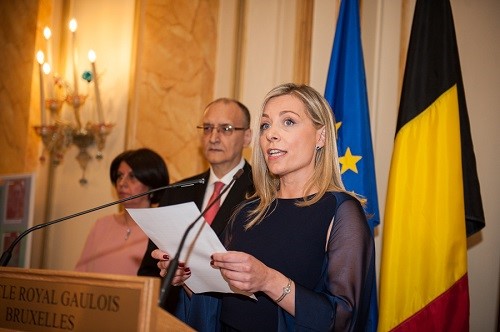
Under the motto „Serbia Creates”, a reception on the occasion of the National Day of the Republic of Serbia was held in Brussels on 20 February 2019 in one of the oldest and most prestigious clubs „Cercle Royal Gaulois“. This event was organized by the Embassy of the Republic of Serbia in Kingdom of Belgium and Missions of the Republic of Serbia to the EU and NATO.
After the anthems, the guests were greeted by three ambassadors, H.E. Marina Jovićević, ambassador of Serbia in Kingdom of Belgium and Grand Duchy of Luxembourg, H.E. Ana Hrustanović, ambassador of the Republic of Serbia to the EU and H.E. Miomir Udovički ambassador of the Republic of Serbia to NATO.
In their speeches, the ambassadors highlighted strategic orientation of Serbia towards the EU, partnership and cooperation with Belgium and NATO, as well as the process of comprehensive reforms that Serbia was implementing. Although the following period will be challenging, it was emphasized that Serbia remained committed to the dialogue on normalization of relations with Priština, and that withdrawal of taxes of 100% on goods from central Serbia is a precondition for the continuation of the dialogue.
The reception, which organized with financial assistance of the companies Nis Gazprom Neft and Philip Morris, was attended by high officials and representatives of Belgian diplomatic corps, the officials of EU and NATO institutions, representatives of EU member states, as well as Serbian diaspora.
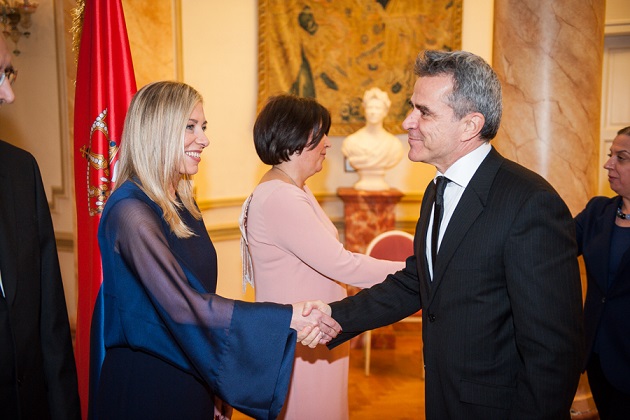
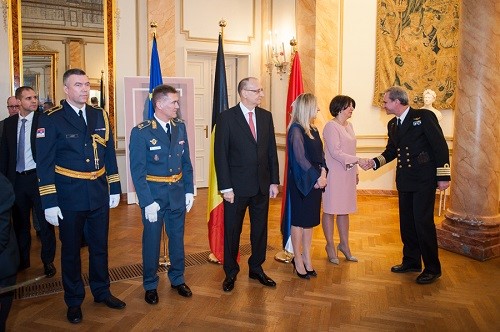
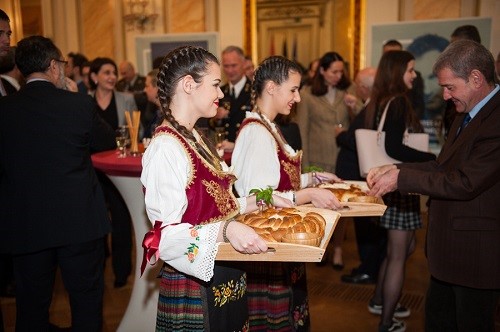
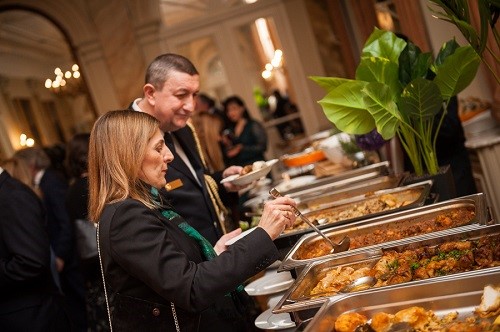
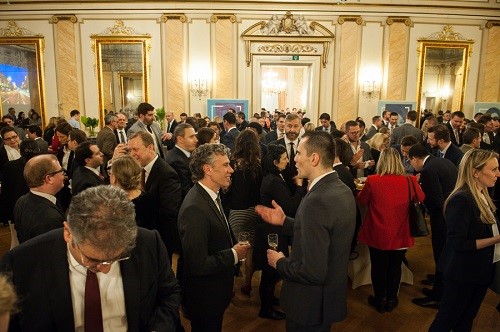 |
|
|
| FINANCING AGREEMENT FOR THE PART OF THE PROGRAMME IPA2017 WORTH OVER 97 MILLION EUR SIGNED IN BRUSSELS |
|
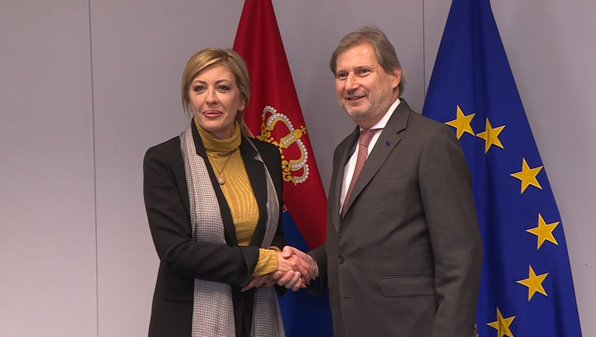
Jadranka Joksimovic, Minister for European Integration of the Republic of Serbia and Johannes Hahn, Commissioner for Neighborhood Policy and Enlargement Negotiations, signed on December 17, 2018 the Financial Agreement in the amount of over EUR 97 million as a part of the Instrument for Pre-Accession Assistance for 2017.
The funds available under this Agreement will be used for energy sector and environmental protection, as well as for participation in EU programmes (Cosme, Horizon 2020, Erasmus+). The most significant part of this package is intended for the financing of the gas interconnection between Serbia and Bulgaria. A part of the funds will be used for waste-water management and treatment, as well as for other projects in the area of environmental protection. |
|
|
| BRIEFING ON THE STATE OF PLAY IN CHAPTER 31 |
|
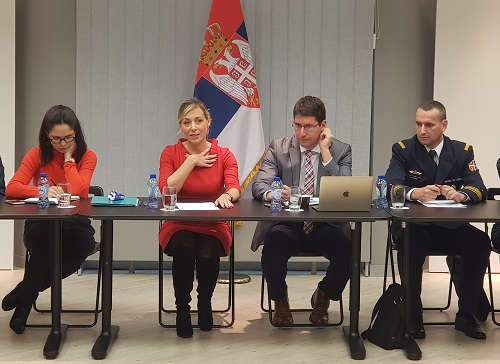
Informal briefing on the state of play in Negotiating Chapter 31 (Foreign, security and defence policy) was held in Brussels on 6 December 2018.
After the introductory statement delivered by H.E. Ambassador Hrustanovic, the state of play and the information on activities and progress achieved in the context of Chapter 31 were presented by Mr. Vladimir Ateljević, special advisor to the minister for European integration of the Republic of Serbia and member of the Core Negotiating Team for the Accession of the Republic of Serbia to the EU in charge of Chapters 30 and 31 and Commander Vladan Stanić, national liaison officer to the EU Military Staff.
The briefing was attended by the representatives of Working party on Enlargement and Countries Negotiating Accession to the EU (COELA), the European Commission and the European External Action Service, who participated actively in the discussion which followed after the presentation of the developments in the area of foreign, security and defence policy.
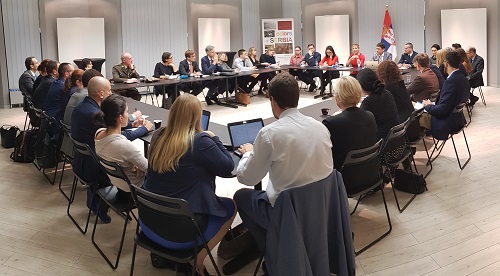 |
|
|
| Celebration of Vojvodina Day in Brussels “Vojvodina Great for Business, Great for Life” Reception |
|
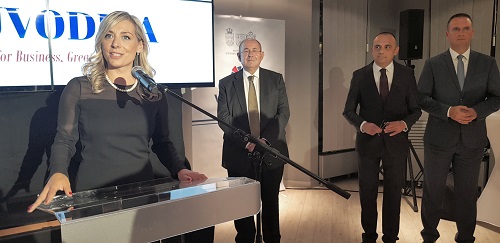
Celebration of Vojvodina Day in Brussels under the title “Vojvodina Great for Business, Great for Life” Reception was held at the Mission of the Republic of Serbia to the European Union on 8 October 2018, when the capacities of Vojvodina were presented to the representatives of European institutions of different fields of competences, diplomatic corps, other regions and cities, partners of AP Vojvodina, businessmen and representatives of economic organizations from Belgium, Italy, Poland, Austria and other countries. The event was jointly organised by the Provincial Government, Assembly of the Autonomous Province of Vojvodina, European Affairs Fund of AP Vojvodina – Vojvodina European Office in Brussels and Vojvodina Development Agency, in cooperation with the Ministry of Foreign Affairs of the Republic of Serbia.
The hosts of the event were Ana Hrustanović, Ambassador of the Republic of Serbia to the European Union, István Pásztor, President of the AP Vojvodina Assembly, Đorđe Milićević, Vice-president of the Provincial Government, and Ognjen Bjelić, Provincial Secretary for Regional Development, Interregional Cooperation and Local Self-Government. In the introductory part of the programme, the guests were addressed by the hosts, after which a promotional film about AP Vojvodina, its potentials, providing the most important information on economic development, tourism, culture, technological and scientific achievements in the province in an interactive manner was shown. The programme also involved the performance by the "Lazar Novkov & Frame Orchestra" band.
Among the more prominent participants were David McAllister, EP Rapporteur for the Republic of Serbia and Chairman of Committee on Foreign Affairs (AFET), Franz Schausberger, Chair of the Institute of the Regions of Europe (IRE) and Member of the Committee of the Regions, Andor Deli, MEP, Emir Đikić, CEFTA Secretariat Director, and Philippe Suinen, Walloon Union of Companies.
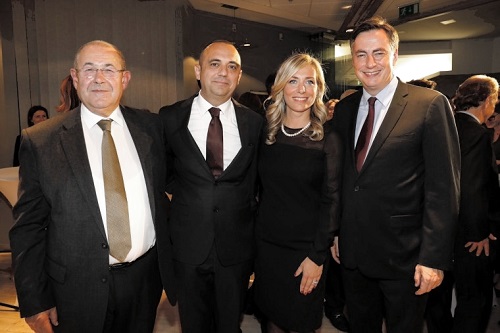
Signing of the agreement on understanding between the Chamber of Commerce and Industry
of Vojvodina and the Walloon Union of Companies
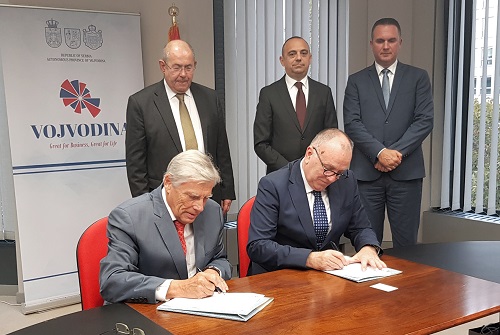
The Agreement on Understanding was signed by Boško Vučurević, President of the Chamber of Commerce and Industry of Vojvodina, and President of Philippe Suinen, Walloon Union of Companies, at the premises of the Mission of the Republic of Serbia to the EU on 8 October 2018.
|
|
|
| Minister Nenad Popović visited Brussels on October 1, 2018 |
|
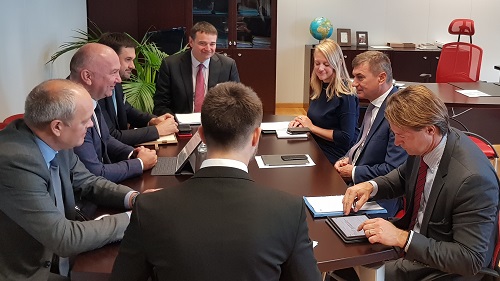
Nenad Popovic, Minister for Innovation and Technological Development met Andrus Ansip, Vice-President of the European Commission for Digital Single Market on 1 October 2018 in Brussels. The discussion during the meeting concerned the promotion of digital commerce in Serbia and the partnership between the two sides in the field of cyber security and innovations. Minister Popović informed Mr. Ansip about the potentials that Serbia has in innovations in new technologies and start-up companies, and they have also discussed topics related to regional cooperation and common approach of Serbia and regional partners in the context of digitalization and innovations. |
|
|
| MINISTER STEFANOVIĆ MET EUROPEAN COMMISSIONERS AND MINISTERS OF INTERIOR FROM WESTERN BALKANS, BRUSSELS, 19 JUNE 2018 |
|
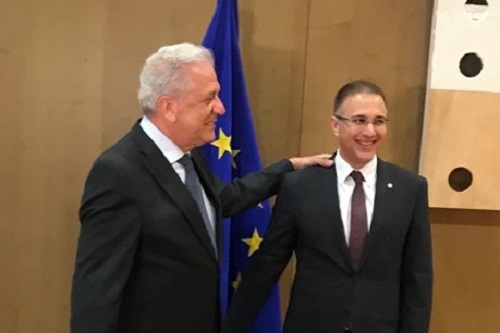
Deputy Prime Minister and Minister of Interior of the Republic of Serbia Nebojša Stefanović visited Brussels on 19 June 2018. Minister Stefanović participated in the meeting which was organized by Commissioner for Migration, Home Affairs and Citizenship Dimitris Avramopoulos and Commissioner for the Security Union Julian King for the ministers of interior from Western Balkans.
This meeting provided an opportunity to discuss common challenges and EU-Western Balkans cooperation in the areas of migration, security, border management and visa policy. It was agreed that ensuring effective border management, fighting smuggling, and joint efforts to combat irregular migratory flows and prevent a new migration crisis remain top priorities for both the EU and the Western Balkans.
On this occasion, a bilateral meeting between Minister Stefanović and Commissioner Avramopoulos was also organized.
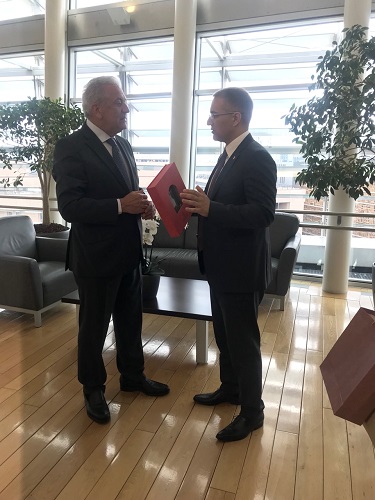 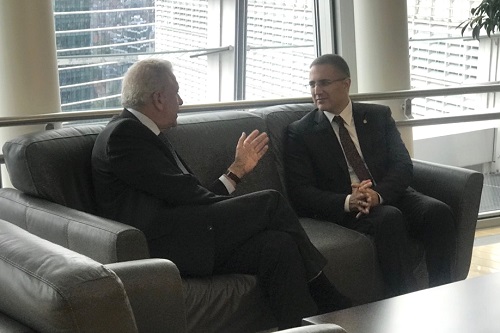
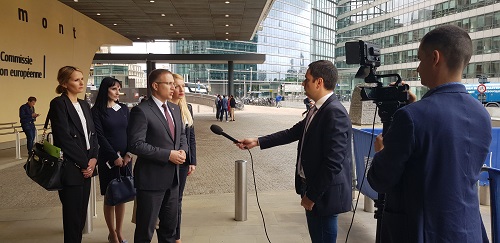 |
|
|
| AGREEMENT ON COOPERATION IN THE FRAMEWORK OF COPERNICUS PROGRAM |
|
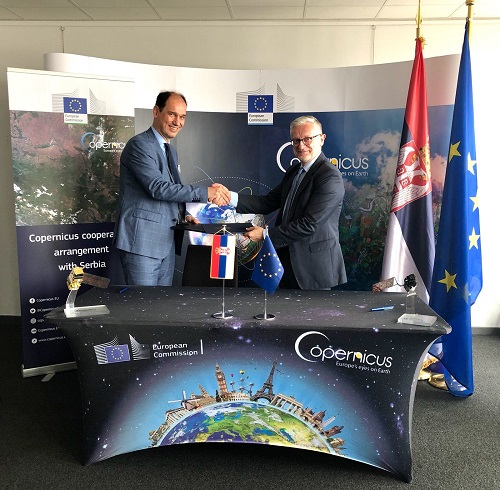
Тhe Agreement between the European Commission and the Republic of Serbia on cooperation in the framework of the Copernicus Earth Observation and Monitoring programme was signed in Brussels, on 7 June 2018. The Agreement was signed by Philippe Brunet, Director for Space Policy, Copernicus and Defence, on behalf of the European Commission and by Vladimir Popović, State Secretary at the Ministry of Education, Science and Technological Development on behalf of the Republic of Serbia. |
|
|
| Economic and Financial Affairs Council– ECOFIN |
|
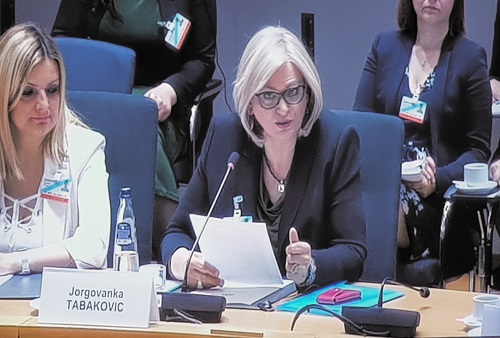
T
The final meeting of annual Economic and Financial dialogue between the EU and the Western Balkans and Turkey was held on May 25th, 2018 during the Economic and Financial Affairs Council – ECOFIN. Serbian delegation was led by Ms. Jorgovanka Tabaković, Governor of the National bank of Serbia. At the meeting, the participants discussed about Economic Reform Programmes for the period 2018-2020 (ERP), which were submitted to the European Commission earlier this year. Fiscal framework was the main topic of the meeting and Serbia was commended for strong fiscal consolidation that has been implemented in the previous period. In addition, it was noted that financial stability, especially with a decline in non-performing loans, has been preserved.
Joint conclusions of the Economic and Financial dialogue were adopted the end of the meeting.
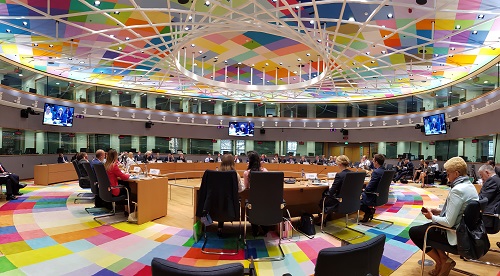
|
|
|
| SERBIAN WINE IN THE REPRESENTATION OF THE GERMAN PROVINCE OF BADEN-WÜRTEMBERG, BRUSSELS 6 MARCH 2018 |
|
The event “European Wine Heritage – Film, Talks and Tasting”, dedicated to the promotion of long tradition in wine production in East Serbia, as well as to the presentation of the Serbia’s accession negotiations with the EU, was held at the premises of the Representation of the German province of Baden-Würtemberg in Brussels on 6 March 2018. The event was co-organised by the Representation of Baden-Würtemberg to the EU, Mission of the Republic of Serbia to the EU, as well as by the Embassy of the Republic of Serbia in Brussels.
In the presence of more than 300 guests and after the welcoming and introductory speeches of the Head of the Representation of Baden-Würtemberg Mr. Johannes Jung and Ambassador of Serbia to the EU Ms Ana Hrustanović, documentary film the “Promise” of the author Dušan Gajić was presented. After the film, the guests had a chance to taste Serbian wine from six municipalities of Knjaževac and Negotin (Serbia) and in a direct communication with the winemakers to learn more about hundreds of years’ long tradition of wine production in Serbia.
This was a nice contribution to the celebration of the Year of the European Heritage (2018).
 |
|
|
| MINISTER FOR ENVIRONMENTAL PROTECTION OF THE REPUBLIC OF SERBIA GORAN TRIVAN VISITED BRUSSELS ON DECEMBER 20, 2017 |
|
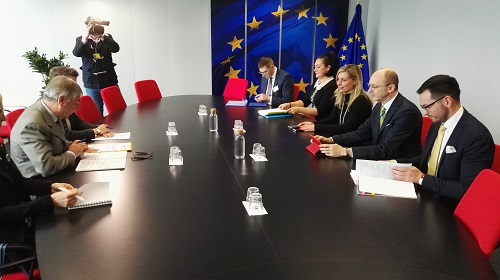
Minister for Environmental Protection of Serbia Goran Trivan visited Brussels on December 20, 2017. On this occasion, minister Trivan met the Commissioner for Environment, Maritime Affairs and Fisheries Karmenu Vella and discussed current topics related to the accession of the Republic of Serbia to the EU. Commissioner Vella welcomed the establishment of a new ministry for environmental protection and added that the European Commission will continue to strongly support Serbia in this and related areas. Minister Trivan invited the Commissioner to visit Serbia at his earliest convenience. |
|
|
| PRIME MINISTER ANA BRNABIĆ MET WITH EU HIGH REPRESENTATIVE FEDERICA MOGHERINI |
|
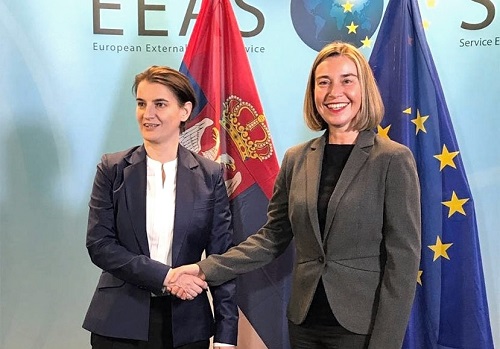
Prime minister of the Republic of Serbia met with High Representative for Foreign Affairs and Security Policy and Vice-President of the European Commission Federica Mogherini on 18 December 2017 in Brussels. This bilateral meeting, during which Brnabić and Mogherini discussed about Serbia’s accession negotiations, European perspective of the Western Balkans, regional cooperation and Belgrade-Priština dialogue, preceded the informal gathering which was organized on the same day by HR EU Mogherini for WB6 partners.
This was the third joint informal gathering organized my Mogherini during 2017 for WB6 prime ministers, where topics related to current situation in the Western Balkans and reforms necessary to be implemented on the path towards the EU membership were discussed.
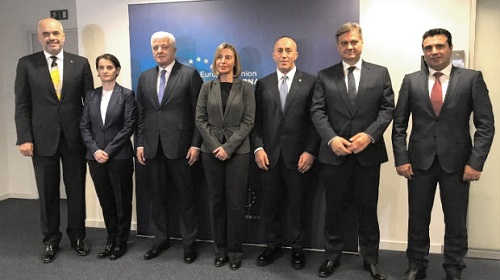 |
|
|
| THE SEVENTH MEETING OF INTERGOVERNMENTAL CONFERENCE SERBIA - EU |
|
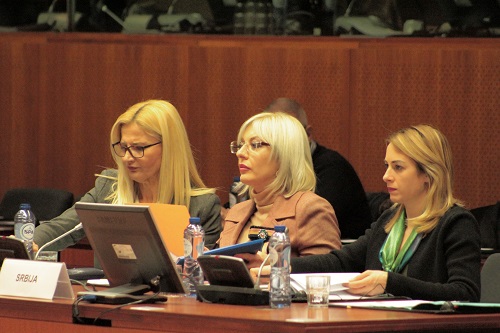
The seventh meeting of Intergovernmental Conference on the accession of Serbia to the EU for opening of chapters 6 (Company Law) and 30 (External Relations) was held on 11 December 2017 in Brussels.
The head of Serbian delegation was Jadranka Joksimović, minister for European integration, and Tanja Miščević, Head of Negotiating Team, Anja Rović, State Secretary in MEI, Ksenija Milenković, acting assistant minister in MEI and the representatives of MEI and the Mission of the Republic of Serbia to the EU also attended the meeting.
The meeting was chaired by Sven Mikser, minister of foreign affairs of Estonia, and the commissioner for neighbourhood policy and enlargement negotiations Johannes Hahn also spoke at the conference. The participants were addressed as well by Emilia Kraleva, deputy minister for European affairs of Bulgaria. On behalf of the EU, the representatives of the European Commission, the General Secretariat of the Council of the EU, the European External Action Service and EU member states also attended the meeting.
After the introductory remarks of minister Mikser, commissioner Hahn and minister Joksimović, the agenda of the meeting and Minutes from the Sixth Intergovernmental Conference held in Luxembourg on 20 June 2017, were formally adopted. After that, the decision on opening chapters 6 and 30 was adopted and the contents of these chapters were presented.
At the end of the meeting, minister Mikser formally concluded the conference, and minister Joksimović and commissioner Hahn gave their concluding remarks and also participated in press conference which was held after the meeting.
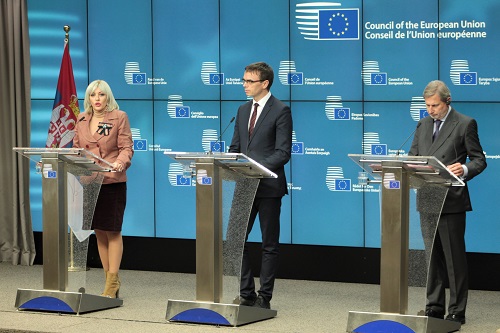
|
|
|
| THE FIRST MEETING OF MINISTERIAL COUNCIL OF THE TRANSPORT COMMUNITY |
|
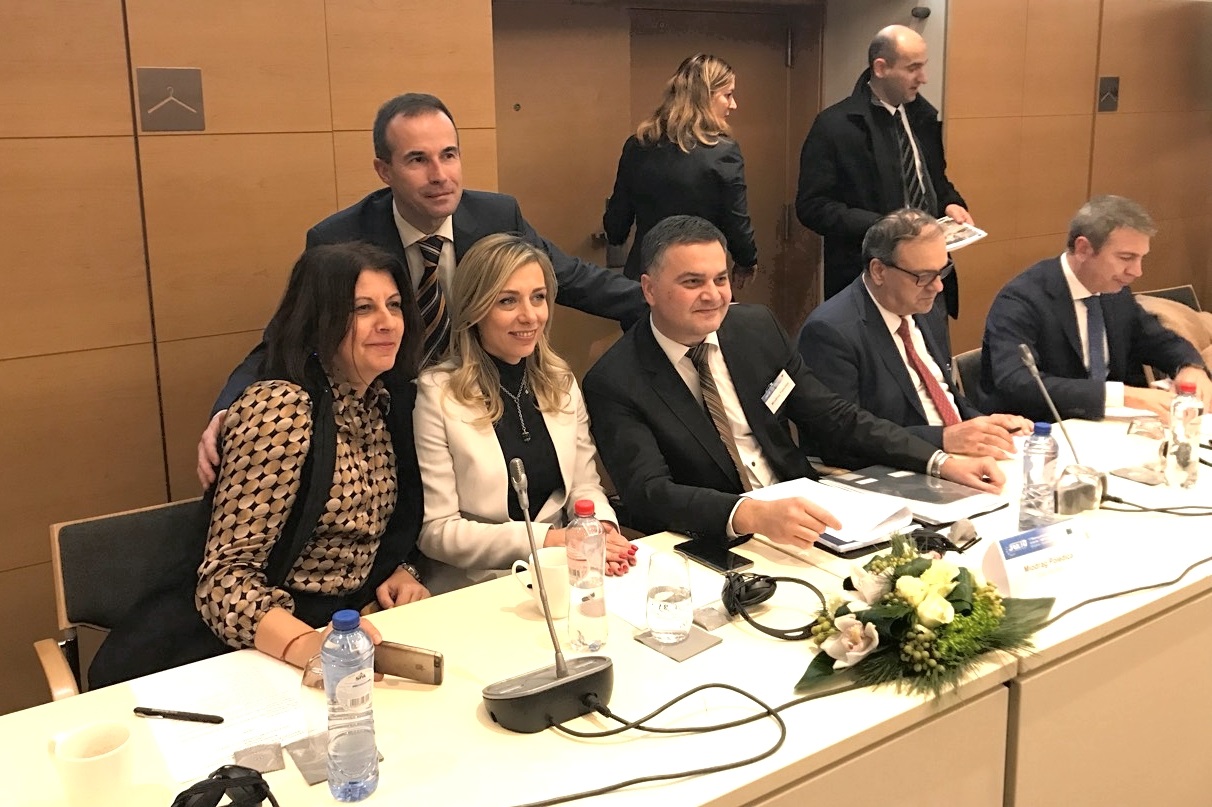
The first meeting of the Council of Ministers of the Transport Community was held on 6 December 2017 in Brussels. The meeting was attended by the representatives of the European Union and WB6 partners. On behalf of the Republic of Serbia, the meeting was attended by Miodrag Poledica, State Secretary at the Ministry of Construction, Transport and Infrastructure, the Ambassador Ana Hrustanović, Head of the Mission of the Republic of Serbia to the EU and the Ambassador of the Republic of Serbia to the Kingdom of Belgium Marina Jovićević.
The Decision on establishing the seat of Permanent Secretariat of Transport Community in Belgrade was adopted by consensus at the ministerial meeting, given that the European Commission had assessed that the candidacy of the Republic of Serbia had meet the most of the required criteria.
Further discussion at the meeting concerned concrete steps towards the establishment of Permanent Secretariat of the Transport Community, as well as the organization of the First meeting of Regional Steering Community, which would be held in February 2018 in Belgrade.
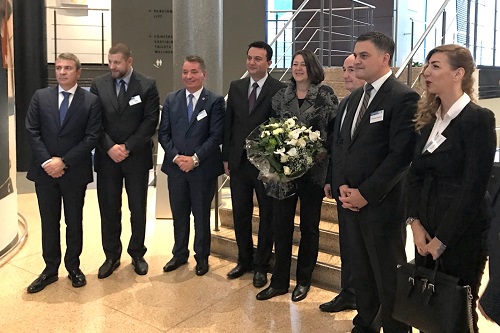 |
|
|
| MINISTER FOR LABOUR, EMPLOYMENT, VETERAN AND SOCIAL AFFAIRS OF THE REPUBLIC OF SERBIA ZORAN DJORDJEVIC VISITED BRUSSELS |
|
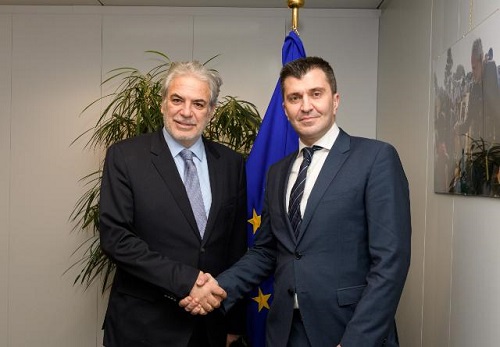
Minister for Labour, Employment, Veteran and Social Affairs of the Republic of Serbia Zoran Djordjevic visited Brussels on December 5, 2017. On this occasion, the Minister met the Commissioner for Humanitarian Aid and Crisis Management Christos Stylianides and Director General for European Neighbourhood Policy and Enlargement Negotiations Christian Danielsson. The minister discussed current migration crisis and the continuation of financial support provided by the European Commission for combating and mitigation of the consequences of the crisis. In addition, the topics related to Serbia’s Accession Negotiations and Chapters 2 (Freedom of Movement of Workers), 19 (Social Policy and Employment) and 23 (Justice and Fundamental Rights) were also discussed at the meetings.
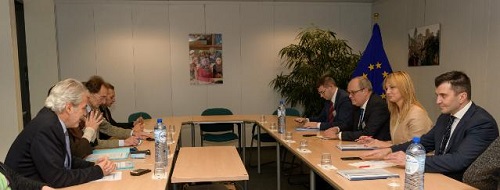 |
|
|
| Forth Meeting of Stabilization and Association Council |
|
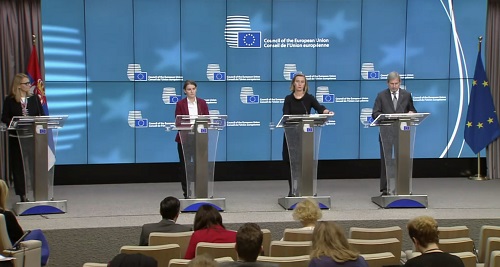
The fourth meeting of the Stabilization and Association Council Serbia – EU was held on 16 November 2017 in Brussels. The plenary session was chaired by HR EU F. Mogherini, and Commissioner Hahn also spoke at the meeting. On behalf of the EU, the meeting was attended by representatives of the European Commission, European External Action Service, General Secretariat of the Council of the EU and member states. Serbian delegation was led by Prime Minister Ana Brnabić, and the Ambassador Ana Hrustanović, Head of Mission of the Republic of Serbia to the EU, Tanja Mišćević, Head of Negotiating Team and representatives of the cabinet of Prime Minister and the Mission of Serbia to the EU also attended the meeting.
After introductory speeches of HR EU F. Mogherini, Commissioner Hahn and Prime Minister Brnabić, the agenda of the meeting was adopted and the Minutes from the third meeting of Stabilization and Association Council, held on 13 December 2016 in Brussels, were approved. Under the third item of the agenda, the discussion concerned the relations between Serbia and the EU, in the framework of stabilization and association process, i.e. the accession strategy and bilateral relations deriving from the Stabilization and Association Agreement.
The topic regarding current political situation in the Western Balkans and other related issues were discussed at the restricted session, which preceded the plenary, and after concluding remarks, PM Brnabić, HR EU Mogherini and Commissioner Hahn participated in press conference. |
|
|
| The exhibition "Ivo Andrić, a Writer and/or a Diplomat" |
|
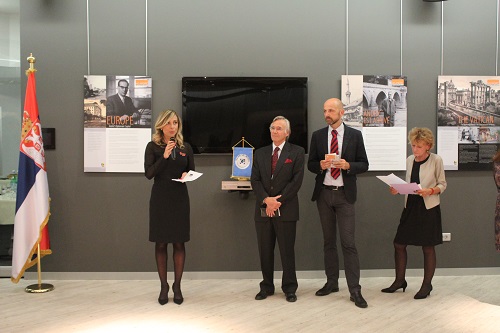
In cooperation with the Regional Representation of the Italian region of Friuli Venezia Giulia in Brussels, Mission of the Republic of Serbia to the EU hosted an exhibition titled "Ivo Andric, a writer and/or a diplomat" on 18 October 2017. The exhibition was opened by Ambassador Ana Hrustanović and the guests were addressed by Flavio Tossi, on behalf of the Association Giuliani nel Mondo, Massimiliano Schiozzi, President of the Cizeronuno Cultural Association and Tatjana Korićanac, Director of the Belgrade City Museum and Curator of the Museum of Ivo Andrić. The exhibition was organized on the occasion of the 125th anniversary of the birth of Ivo Andric.
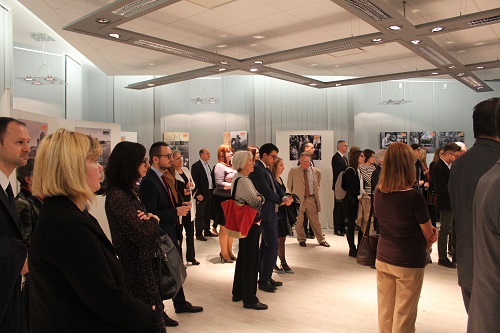 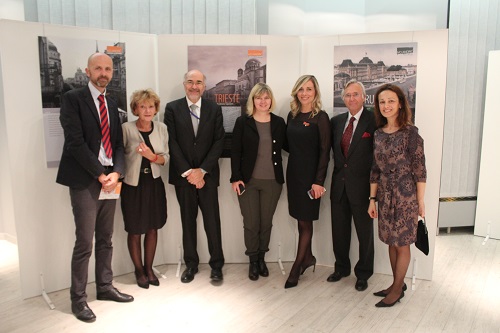
The exhibition "Ivo Andrić, a Writer and/or a Diplomat" was moved from the Mission of the Republic of Serbia to the Italian Regional Office, where the lecture dedicated to the author’s work was held on 19 October. One of the speakers at this event was also Ambassador Hrustanović. The exhibition in the Regional Representation of the Italian region of Friuli Venezia Giulia in Brussels will be open to visitors until 10 November 2017.
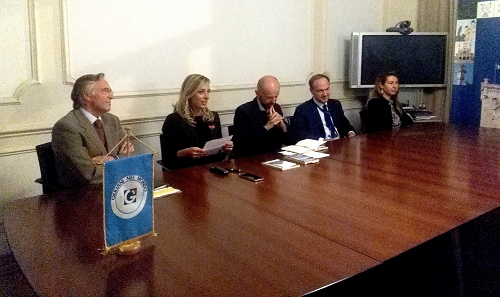 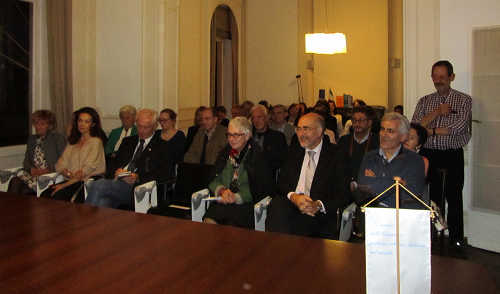
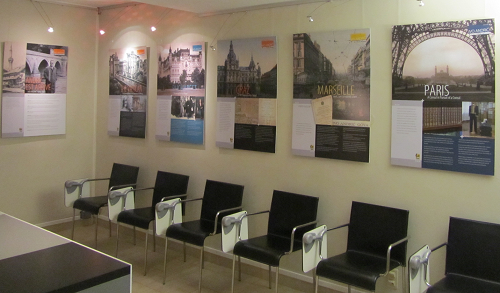 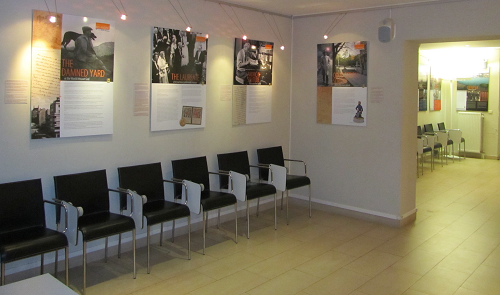 |
|
|
| THE PROVINCE OF VOJVODINA PRESENTED ITS VALUES AT THE EUROPEAN WEEK OF REGIONS AND CITIES |
|
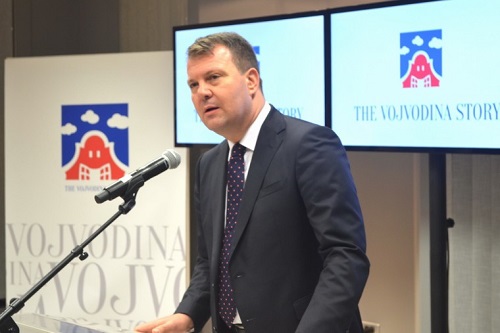
Delegation of the Provincial Government and the Assembly of the AP Vojvodina, via Vojvodina European Office in Brussels, organized a traditional reception during the European Week of Regions and Cities for the representatives of European regions and cities, businessmen interested in investing in Vojvodina and other invitees. The reception was held on 10 October 2017 at the Mission of the Republic of Serbia to the European Union.
The reception titled “Vojvodina Story“ was attended by the representatives of several European regions: the German state of Hessen, Italian regions of Lombardy, Friuli Venezia Giulia and Umbria, Upper Austria, the neighbouring Osijek-Baranya County, the members of the European Parliament, the representatives of diplomatic corps and others.
Igor Mirović, the President of the Provincial Government, empahized that the guests at this presentation of the province of Vojvodina in Brussels, belonged to a very strong team of regions, which indicated that good contacts had been established during the European Week of Regions and Cities.
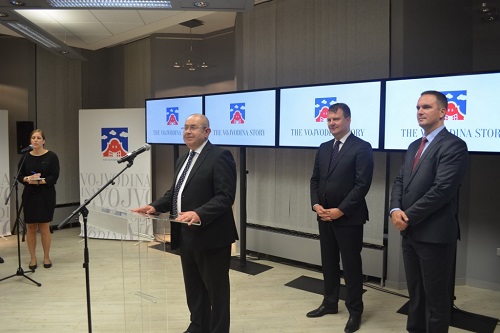 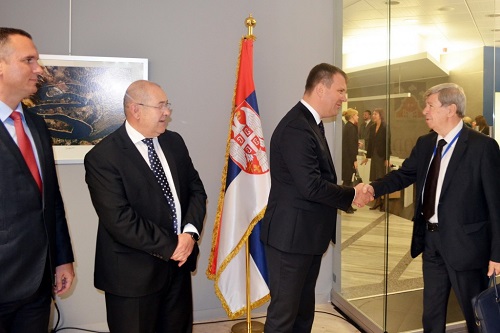 |
|
|
| PRIME MINISTER OF THE REPUBLIC OF SERBIA ANA BRNABIĆ MET THE PRESIDENT OF THE EUROPEAN PARLIAMENT ANTONIO TAJANI |
|
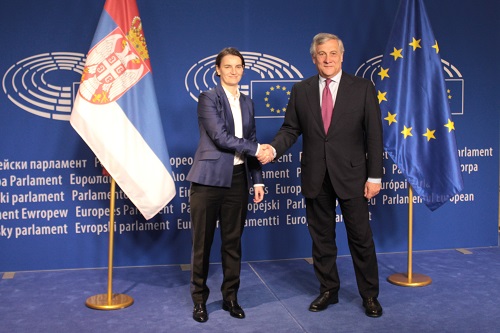
Serbian Prime Minister Ana Brnabić met the President of the European Parliament Antonio Tajani in Brussels on 11 October 2017. That was the first Tajani’s meeting since his election to the office of the President of the European Parliament, with high official of the Republic of Serbia.
On this occasion, Prime Minister Brnabić and the European Parliament President Tajani reaffirmed that Serbia represents a strong and credible EU partner. Apart from the process of the European integration, they also discussed economic relations between Serbia and the EU, the continuation of Belgrade – Pristina dialogue, and the cooperation in the field of security, with a special emphasis on Serbia’s important role in managing the migrant crisis. The Prime Minister stated that her first official visit as the Prime Minister was to Brussels, which also gave a clear signal that European integration is the most important foreign policy priority of Serbia.
One of the topics discussed at the meeting was the forthcoming visit of the President of the European Parliament to Serbia in late January - early February 2018, as well as the organization of a forum where Serbian and European companies would participate in order to achieve the most intensive economic cooperation between Serbia and the EU. During the meeting, the President of the European Parliament emphasized that the stability and prosperity of the Western Balkans are common goals of the European Parliament and the countries of the region, as well as the full support of the European Parliament to the European orientation of Serbia.
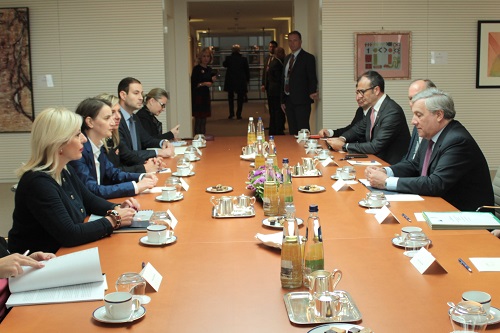
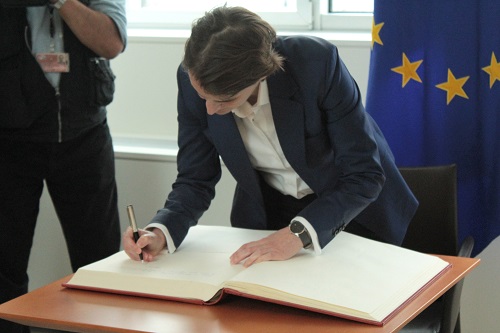 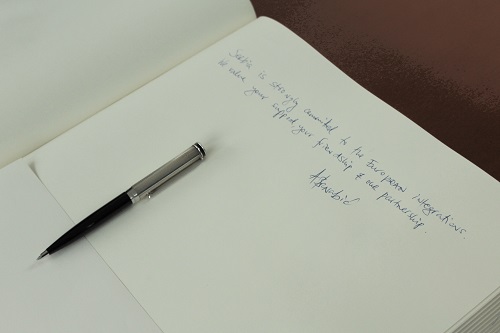
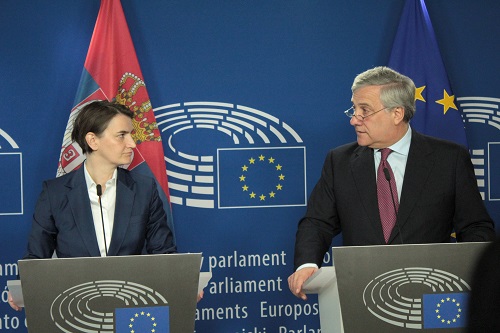 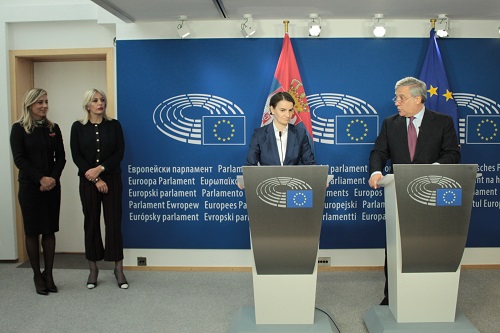 |
|
|
| PARTICIPATION OF PRIME MINISTER ANA BRNABIĆ IN THE MEETING OF COMMITTEE ON FOREIGN AFFAIRS OF THE EUROPEAN PARLIAMENT (AFET) |
|
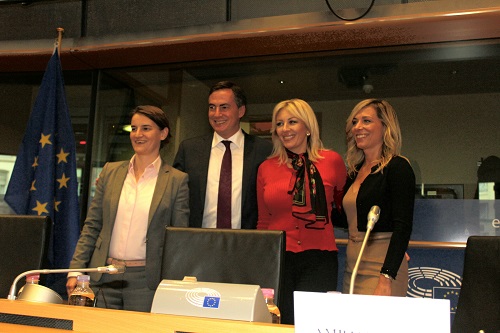
Prime Minister of the Government of the Republic of Serbia Ana Brnabić participated in the meeting of the Committee on Foreign Affairs of the European Parliament (AFET), which was held in Brussels on 10 October 2017. The meeting was chaired by David McAllister, who is the chair of AFET and EP rapporteur on Serbia. The minister for European integration Jadranka Joksimović and the ambassador Ana Hrustanović, Head of Mission of the Republic of Serbia to the EU also attended the meeting.
In her speech, Brnabić presented the results of Government’s work in the first quarter, emphasizing that it relies on the results of the previous Government, which implemented numerous activities and measures aiming at reforms. She said that digitalization and reformed education were the basis for further efforts of Serbia in its EU path, which were the basis for three pillars: economic development and macroeconomic stability, public administration reforms and rule of law. She emphasizes the significance of regional stability and highlighted that the European integration of Serbia was the key strategic aim of the Government.
At the end of the meeting, the Prime Minister Brnabić gave answers to numerous questions of the MEP regarding the relations of Serbia and Russia, dialogue with Priština, regional stability, position of minorities and freedom of media and citizens’ support to European integration of Serbia.
The AFET meeting was preceded by working lunch, which was organized in honour of Prime Minister Brnabić by David McAllister, and followed by the meeting and discussion with Manfred Weber Chairman of the European People’s Party – EPP Group.
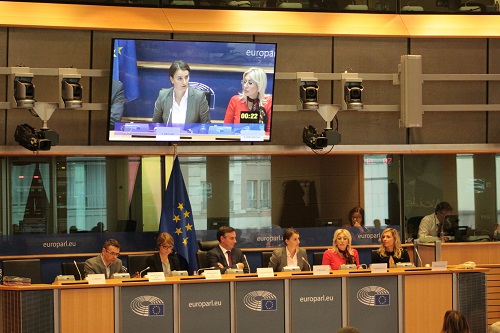
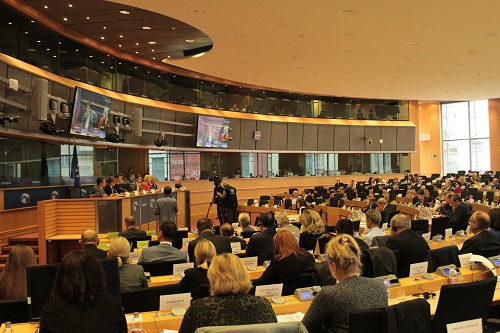 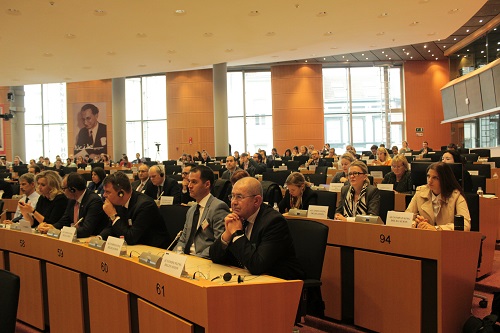 |
|
|
| SIGNING OF THE TREATY ESTABLISHING THE TRANSPORT COMMUNITY IN THE LANGUAGES OF ALL PARTIES TO THE TREATY, BRUSSELS 9 OCTOBER 2017 |
|
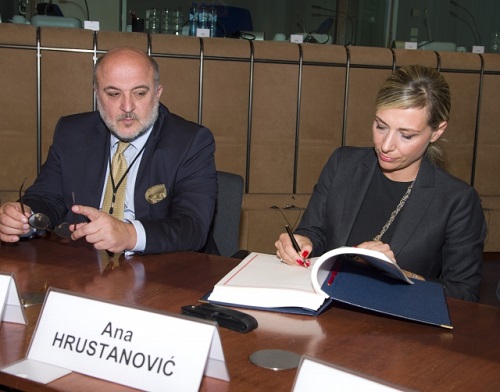
The ceremony of signing of the Treaty establishing the Transport Community in the languages of all parties to the Treaty was held in the premises of the Council of the EU on 9 October 2017 in Brussels. The ceremony was attended by the ambassador Kaja Tael, Head of Estonian Permanent Representation to the EU, Henrik Hololei, director-general of DG for Mobility and Transport and other representatives of the EU, as well as WB6 ambassadors.
On behalf of the Republic of Serbia, the versions of the Treaty in the languages of all parties to the Treaty were signed by the ambassador Ana Hrustanović, Head of Mission of the Republic of Serbia to the EU.
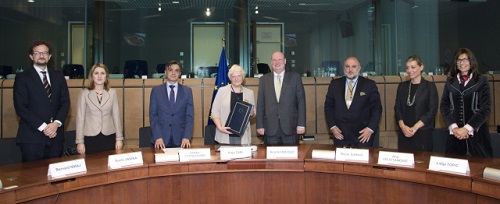 |
|
|
| RECEPTION ON THE OCCASION OF THE VISIT OF REPRESENTATIVES OF FOREIGN INVESTORS COUNCIL |
|
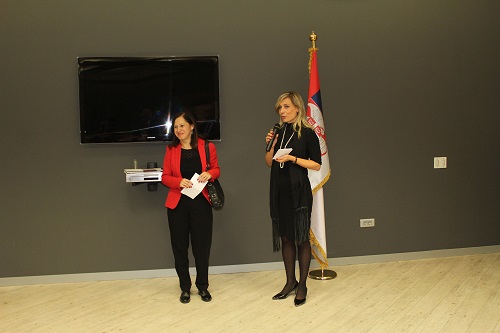
The fourth reception on the occasion of Foreign Investors Council – FIC visit to Brussels was held at the Mission of the Republic of Serbia to the EU on 5 October 2017.
At the beginning of the reception, ambassadorAna Hrustanović, Head of the Mission of the Republic of Serbia to the EU and Ana Firtel, Executive Director of the Foreign Investors Council gave introductory speech.
The reception was attended by the representatives of the European Commission and other European institutions, diplomatic missions and various Belgian and international companies and organizations. The members of FIC delegation who attended the reception came from the following companies which invested in Serbia: Japan Tobacco International - JTI, VIP, Telenor i G4S Secure Solutions.
During its visit, FIC delegation organized meetings with the representatives of seven directorates generals of the European Commission, the European External Action Service (EEAS), CEFTA Secretariat, and the European Parliament. European institutions were encouraged to actively support Serbia, because mutual collaboration was needed for bringing Serbian market closer to the EU rules and practices. It was reiterated that foreign investors strongly supported Serbia to continue negotiations with the EU as a way of improving business conditions and further inflow of investments.
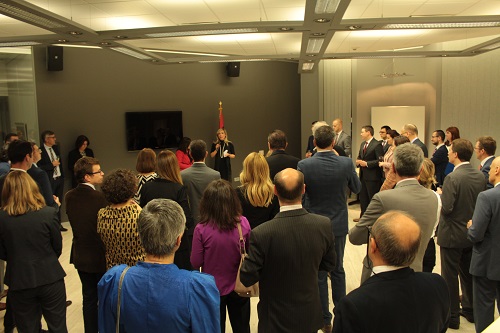 |
|
|
| INFORMAL BRIEFING ON DEVELOPMENTS IN THE AREA OF RULE OF LAW |
|
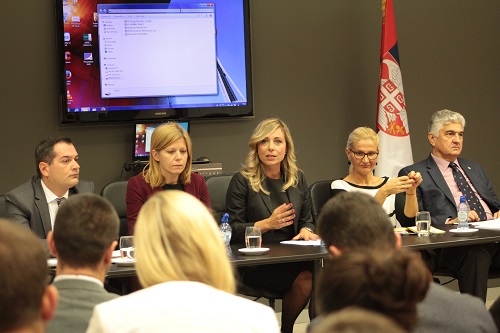
Informal briefing on recent developments and efforts made by Serbia in the context of fulfilling the requirements under the Chapter 23 and Chapter 24 was held in Brussels on 3 October 2017.
After the introductory statement delivered by H.E. Ambassador Hrustanovic, the state of play in negotiation process and the information on activities and progress achieved in the context of Chapters 23 and 24 were presented by Ms Tanja Mišćević, Head of Negotiating Team of the Republic of Serbia, Mr. Čedomir Backovic, Assistant Minister of Justice and Head of Negotiating Group for Chapter 23, Mr. Zoran Lazarov, Acting Assistant Minister of Interior and Head of Negotiating Group for Chapter 24 and Ksenija Milenković, Assistant Minister of European Integration.
The briefing was attended by the representatives of Working party on Enlargement and Countries Negotiating Accession to the EU (COELA), the European Commission and the European External Action Service, who participated actively in the discussion which followed after the presentation of the developments in these areas.
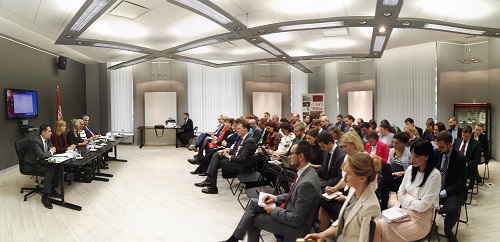 |
|
|
| FINANCING AGREEMENT (IPA 2016) FOR EDUCATION SECTOR REFORM WORTH EUR 27,5 MILLION SIGNED IN BRUSSELS |
|
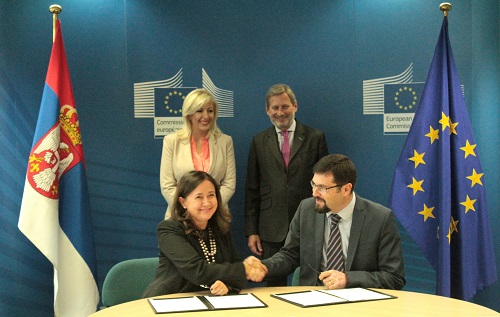
Financing agreement worth EUR 27,5 million was signed on 27 September 2017 in Brussels, in the presence of Jadranka Joksimovic, Minister for European Integration of the Republic of Serbia and Johannes Hahn, Commissioner for Neighborhood Policy and Enlargement Negotiations. This is the second of four financial agreements which will be signed in order to implement the National Action Program IPA 2016.
The funds available under this Agreement will be used for Education sector reform for programmes that will assist teaching staff to improve education and training system in order to better match the needs of the labour market, which is in line with the National Education Development Strategy in Serbia until 2020.
This is the first EU agreement of its kind with one of the Western Balkan countries. |
|
|
| MEETING OF MINISTER JADRANKA JOKSIMOVIĆ AND DAVID MCALLISTER |
|
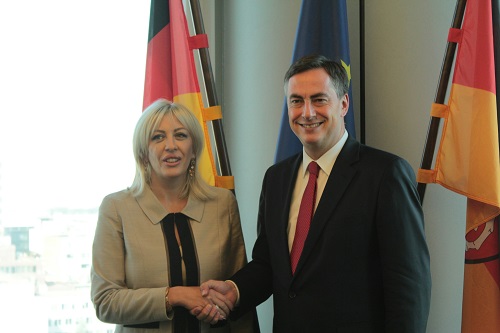
Minister for European Integration of the Republic of Serbia Jadranka Joksimović met the Chairman of the Committee on Foreign Affairs and European Parliament’s Rapporteur for Serbia David McAllister on 26 September 2017 in Brussels.
Minister Joksimović informed Mr. McAllister about the activities which Serbia had been implementing in terms of reform processes in the country, primarily with regard to the rule of law. Furthermore, discussions were also held on the opening of new chapters in the EU accession negotiations.
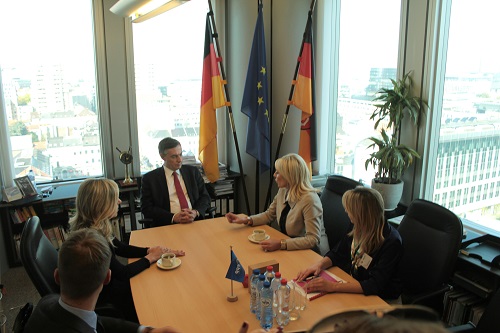 |
|
|
| MINISTER FOR INNOVATION AND TECHNOLOGICAL DEVELOPMENT NENAD POPOVIĆ VISITED BRUSSELS ON 25 SEPTEMBER 2017 |
|
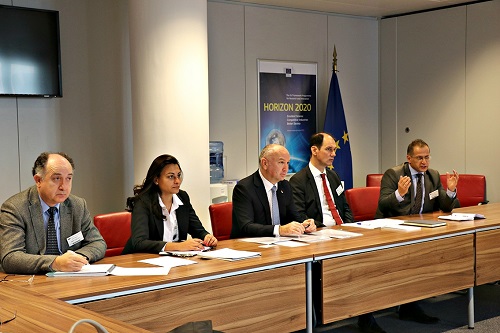
Minister for Innovation and Technological Development of the Republic of Serbia Nenad Popovic visited the EU headquarter in Brussels, on 25 September 2017. On this occasion Minister Popović met with the EU Director General for Innovation and Research Robert Jan Smits. The plans for the development of Serbia’s innovative ecosystems and innovation infrastructure, as well as the participation of Serbia in the EU Horizon 2020, particularly in the part of the program "Leadership in the industry" were inter alia discussed at the meeting. Both sides expressed the interest to intensify cooperation on the design and implementation of programs for public and private partnerships in Europe.
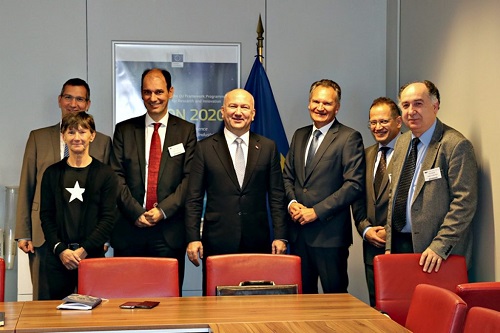 |
|
|
| PRESIDENT ALEKSANDAR VUČIĆ MET WITH EU HIGH REPRESENTATIVE FEDERICA MOGHERINI |
|
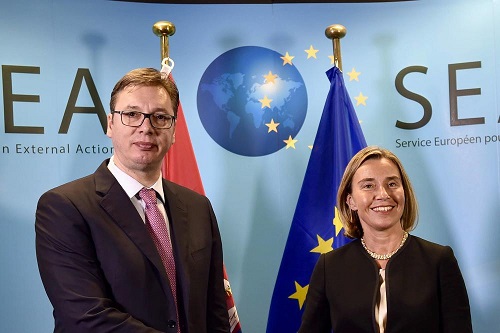
President of the Republic of Serbia Aleksandar Vučić met with High Representative for Foreign Affairs and Security Policy and Vice-President of the European Commission Federica Mogherini on 15 November 2017 in Brussels.
During this meeting, president Vučić and HR EU Mogherini discussed about the relations between Serbia and the EU and agreed that Serbia’s commitment to all aspects of reforms remains crucial for the process of accession negotiations with the EU. On this occasion, president Vučić and HR EU Mogherini also discussed about the situation in the Western Balkans region, as well as the EU-facilitated Dialogue between Belgrade and Priština on comprehensive normalisation of relations. |
|
|
| Meeting of the members of National Assembly with MEPs – the members of informal group “Friends of Serbia” |
|
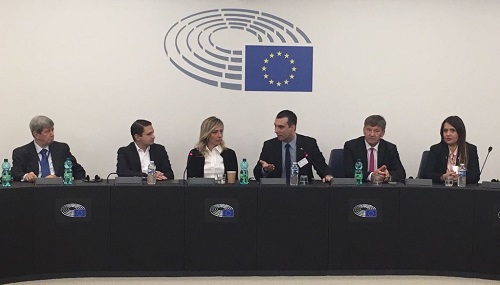
The meeting of the members of National Assembly of the Republic of Serbia with the members of the European Parliament – members of informal group “Friends of Serbia” was held on 14 September 2017. at the European Parliament in Strasbourg, on the margins of the sixth meeting of the European Union-Serbia Stabilisation and Association Parliamentary Committee.
The meeting was chaired by Emilian Pavel, Romanian MEP and the president of the group “Friends of Serbia”.
The members of the group “Friends of Serbia” have welcomed the unequivocal support which the president of the European Commission, Jean-Claude Juncker, expressed in the context of Serbia’s accession negotiations. They have also underlined their support for reforms in Serbia and expressed hope that Serbia will become EU Member State during the next mandate of the European Commission.
The informal group “Friends of Serbia” was established in May 2015, bringing together the Members of the European Parliament who support Serbia's European integration, and they organise activities aimed at promoting Serbia in the European Parliament. |
|
|
| Sixth Meeting of European Union-Serbia Stabilisation and Association Parliamentary Committee in Strasbourg |
|
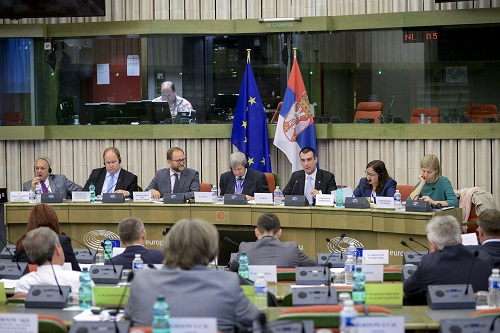
The sixth meeting of the European Union-Serbia Stabilisation and Association Parliamentary Committee was held at the European Parliament HQ in Strasbourg on 13 and 14 September 2017. The Meeting was co-chaired by Eduard Kukan, Chairman of the European Parliament delegation and Dr Vladimir Orlic, Chairman of the delegation of the National Assembly of the Republic of Serbia. The Government of the Republic of Serbia was represented by Ksenija Milenković, Assistant Minister for European Integration.
In the course of the two-day discussions at the European Parliament, members of the National Assembly and the European Parliament have exchanged opinions on the state-of-play in accession negotiations and relations between the European Union and Serbia, Serbia’s preparations for opening of new chapters, dialogue on relations normalization between Belgrade and Pristina, refugee crisis, implementation of the Stabilisation and Association Agreement, fundamental rights and freedoms, gender equality, domestic violence, economic development and reforms. Co-chairs Kukan and Orlic have agreed that the meeting was held in a friendly atmosphere and that the debate was constructive and followed by excellent conclusions. The co-chairs have also emphasized that importance of the fact that the Joint Committee finalized the meeting by adopting a Declaration and Recommendations, which highlighted Serbia’s achievements, as well as the challenges both sides would have to tackle in the course of the accession negotiations and EU enlargement.
A meeting between the delegation of the National Assembly of the Republic of Serbia and the members of the informal group “Friends of Serbia” was held at the sidelines of the Committee.
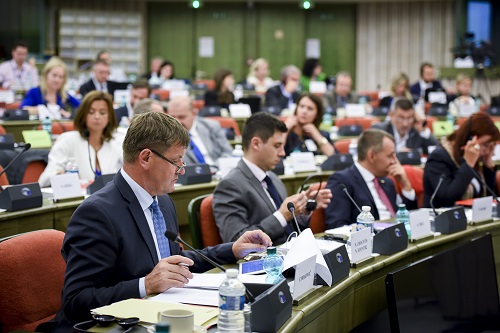 |
|
|
| PRESIDENT OF THE REPUBLIC OF SERBIA ALEKSANDAR VUČIĆ VISITED BRUSSELS ON 31 AUGUST 2017 |
|
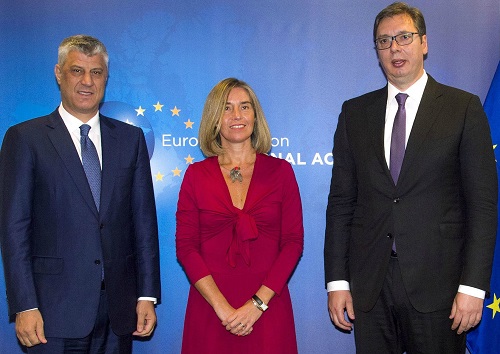
The president of the Republic of Serbia Aleksandar Vučić participated in another meeting, which was organized by the High Representative of the EU Federica Mogherini on 31 August 2017 in Brussels, in the framework of the Dialogue on normalization of relations between Belgrade and Priština.
The aim of the meeting, which was attended also by Hashim Thaci, was to exchange the opinions on the continuation of the dialogue, in the light of the agreement reached in July, when the preparation of a “new phase of the dialogue” was agreed upon.
The president Vučić stated that on this occasion previously reached agreements had been confirmed and that full implementation of the agreement on judiciary was agreed upon. He emphasized that the implementation of the agreement on the bridge on river Ibar in Kosovska Mitrovica was also a subject of the meeting and said that the discussion regarding this issue would be continued in the following period, in order to implement this agreement until the end of the year, if possible. President Vučić and the director of the Office for Kosovo and Metohija Marko Đurić noted at the meeting that there is no progress on the implementation of the agreement on the Community of Serbian Municipalities.
Vučić emphasized that it was the most important to conduct open discussion as regards long-term and more stable solution in the relations of Belgrade and Priština. He stated that there would be no change in the format of the dialogue, and that the discussions would be continued under the auspices of the EU.
|
|
|
| PRESIDENT OF THE REPUBLIC OF SERBIA ALEKSANDAR VUČIĆ MET PESIDENT OF THE EUROPEAN COUNCIL DONALD TUSK |
|
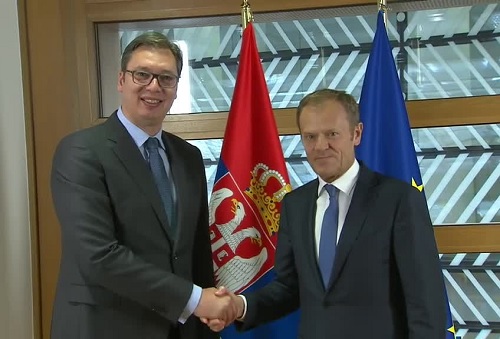
The President of the Republic of Serbia met the President of the European Council on 14 July 2017 in Brussels.
While discussing the process negotiations on accession of Serbia to the EU, President Vučić underlined that there was a need to determine a framework date for the accession and to accelerate the pace of negotiations, which he also reiterated during previous meetings with the highest European officials, the President of the European Commission Jean-Claude Juncker and the EU High Representative for Foreign Policy Federica Mogherini.
The President Tusk stated that the European Union supported European integration of the Western Balkans and that Serbia would be awarded with full membership in the EU once the dialogue with Priština and commenced reforms were finalized. He commended the efforts invested by Serbia in the normalization of relations with Priština and encouraged President Vučić to continue the reforms in the area of rule of law. President Tusk in particular emphasized and commended a personal devotion of President Vučić to the stability and security of the region. |
|
|
| PRESIDENT OF THE REPUBLIC OF SERBIA ALEKSANDAR VUČIĆ MET PESIDENT OF THE EUROPEAN COMMISSION JEAN-CLAUDE JUNCKER |
|
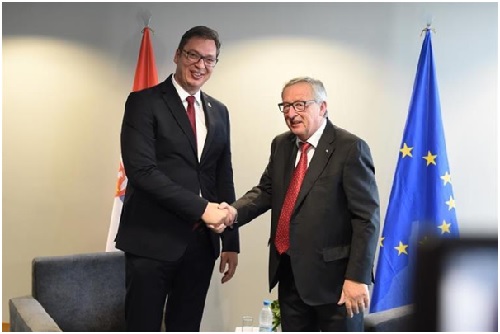
The President of the Republic of Serbia, who led our delegation at the first meeting of High Council for Cooperation between Serbia and Greece, met the President of the European Commission Jean-Claude Juncker on 13 July 2017 in Thessaloniki.
While discussing European integration, President Juncker said that the European perspective of Serbia was clear, and President Vučić reiterated that there was a need to determine a framework date for the accession of Serbia to the EU. President Vučić also stated that the citizens of Serbia had believed in the accession to the EU for a long time, but that this was a long-lasting process. The President underlined that Serbia would continue to work on its European integration, but also that we aspired to have this process successfully finalized.
On this occasion, the President Vučić invited the President Juncker to visit Serbia during the mandate of this composition of European Commission. |
|
|
| INFORMAL MEETING ON THE HIGHEST LEVEL BETWEEN BELGRADE AND PRISTINA |
|
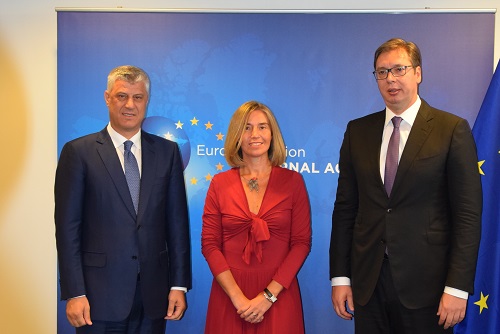
Informal meeting at the highest level between Belgrade and Pristina, under the auspices of the EU High Representative for Foreign Policy Federica Mogherini, was held on 3 July 2017 in Brussels. Apart from the President of the Republic of Serbia Aleksandar Vučić, the Director of the Office for Kosovo and Metohija Marko Đurić also attended the meeting.
Two sides tentatively agreed to start working on a new phase of the dialogue aiming at normalization of relations. It was agreed that the teams of both sides would immediately start working on the preparations of the upcoming meetings. The importance of the implementation of previously reached agreements was also reiterated.
During separate bilateral meeting, which preceded the informal common meeting on dialogue, President Vučić had a discussion with EU High Representative Mogherini. On this occasion, for the first time, Vučić requested, inter alia, from the EU representatives to determine a framework date for the accession of Serbia to the EU. |
|
|
| AMBASSADOR ANA HRUSTANOVIĆ MET MINISTER OF FOREIGN AFFAIRS OF MALTA CARMELO ABELA |
|
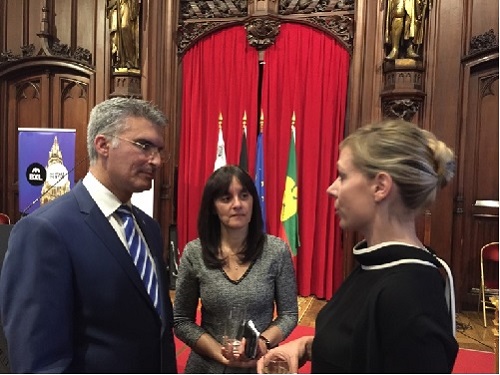
Ambassador Ana Hrustanović had a brief discussion with the Minister of Foreign Affairs of Malta Carmelo Abela at the celebration on the occasion of finalization of Maltese EU Presidency, which was held on 30 June 2017 in Brussels City Hall.
Ambassador Hrustanović expressed her gratitude for extensive support and efforts invested by Malta during its EU Presidency towards achieving progress in Serbia’s EU accession negotiations. She emphasized that four chapters were opened during Maltese EU Presidency and that we aspire to accelerate the pace of negotiations.
Minister Abela expressed strong support to the process of European integration of Serbia. Ambassador Hrustanović said that the circumstances during Maltese EU Presidency were not favorable, but she pointed out that the EU, being currently left by one very important member state, should demonstrate its strength by supporting enlargement as one of the most successful EU policies.
Minister Abela emphasized that Malta remains a great supporter of enlargement. He also stated that Serbian community in Malta is very well integrated. |
|
|
| “Serbia: Driving Economic Force for the Western Balkans: How to integrate in the internal market?” |
|
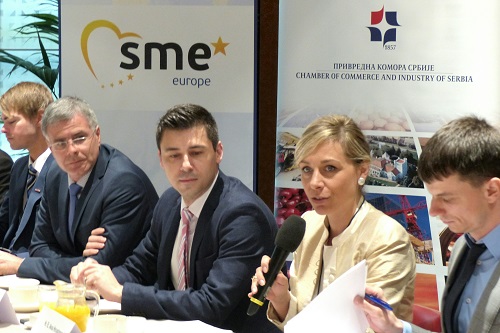
Working Breakfast titled “Serbia: Driving Economic Force for the Western Balkans: How to integrate in the internal market?” was held in the European Parliament in Brussels, on the 27th of June 2017. In her introductory note, Ambassador Ana Hrustanović, Head of Mission of the Republic of Serbia to the EU, presented an overview of the most important economic results that Serbia has achieved over the last couple of years. She also highlighted Serbia’s ongoing economic reform program, as well as the importance of the regional economic integration process.
Working breakfast was organized by SME Europe, Chamber of Commerce and Industry of Serbia and Enterprise Europe Network, in cooperation with the EPP Group in the European Parliament. Apart from Ambassador Hrustanović, MEP and Co-opted Board Member SME Europe Andor Deli, Director of the Chamber of Commerce and Industry of Serbia Representative Office in Belgium Zdravko Ilić, MEP and Vice-President of the informal group Friends of Serbia in the European Parliament Franc Bogovič and Head of EU-Office, Austrian Federal Economic Chamber (WKÖ) Markus Stock participated at the event. The event was moderated by Executive Director of SME Europe Dr. Horst Heitz.
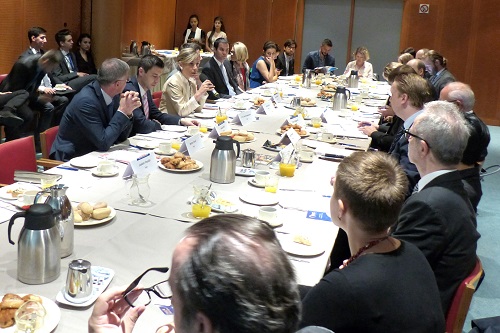 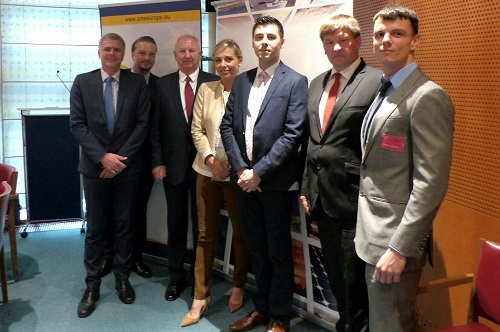 |
|
|
| SIXTH MEETING OF THE ACCESSION CONFERENCE SERBIA - EU |
|
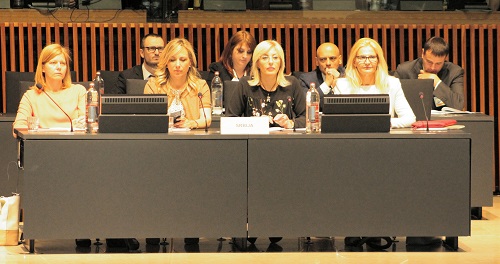
The sixth meeting of the Accession Conference with Serbia at ministerial level was held on the 20th of June in Luxembourg to open chapter 7 - Intellectual property law and chapter 29 - Customs union.
The Serbian delegation was led by Ms JadrankaJoksimović, Minister without portfolio responsible for European integration. The members of the delegation were: ambassador Ana Hrustanović, head of Mission of the Republic of Serbia to the EU, Ms Ksenija Milenkovic, Acting director of European Integration Office, Ms Tanja Miscevic, Head of Negotiating Team and other representatives of the Republic of Serbia. The European Union delegation was led by Ms Helena Dalli, Minister of European Affairs and Equality of Malta, on behalf of the Maltese Presidency of the Council of the European Union. The European Commission was represented by Mr Christian Danielsson, Director General for European Neighbourhood Policy and Enlargement Negotiations. The conference was also attended by other representatives of the European Commission, European External Action Service and Member States.
With the sixth meeting of the Accession Conference, Serbia has so far opened 10 chapters, out of which two were provisionally closed. Next accession conference is expected to be held in the second half of 2017.
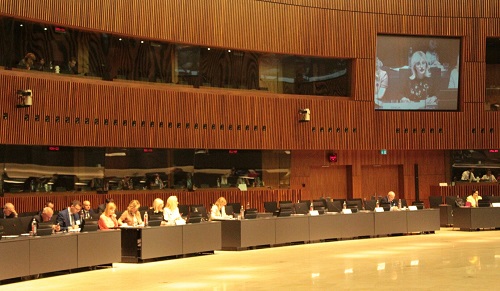
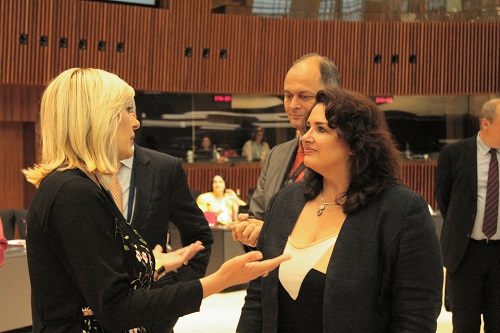 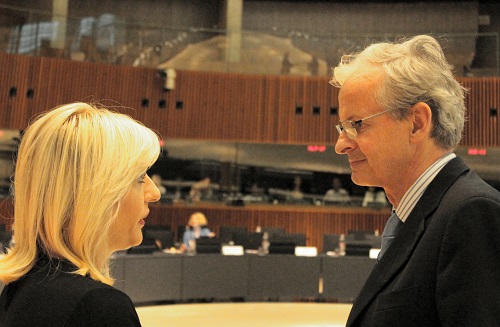
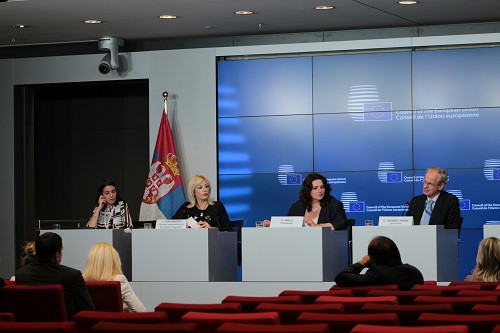 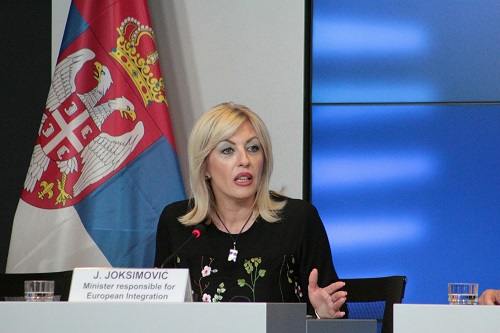 |
|
|
| Financial agreement (IPA 2016) worth EUR 96,2 million signed by Minister Joksimović and Commissioner Hahn in Brussels |
|
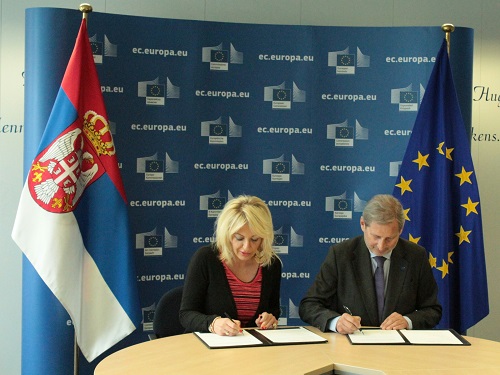
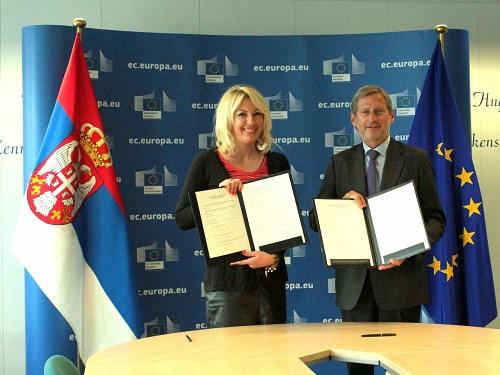 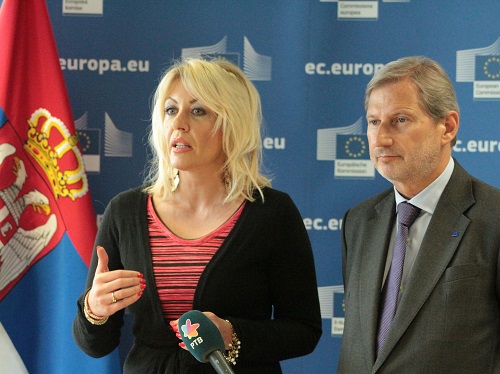
The Serbian Government Minister in charge of European Integrations, Jadranka Joksimović and European Commissioner for European Neighbourhood Policy and Enlargement Negotiations, Johannes Hahn, signed on 7th July 2017 in Brussels the Financial agreement worth EUR 96,2 million, of which the EU financial support is in amount of EUR 95.1 million. This agreement is first of four financial agreements that are going to be signed in this year with the aim of realization of the annual IPA program for 2016 with the total amount of EUR 166.4 million.
The grant will be used for project that will assist Serbia in implementation of reforms in key sectors, focusing on: stimulating competition in Serbia and support to small and medium enterprises in Serbia; Stimulation of competitiveness of economy and support to small and medium enterprises; improvement of infrastructure for ensuring better access to public buildings for persons with disabilities and reduced mobility; continued works on Golubac fortress reconstruction and promotion of efficiency of judicial institutions. This agreement will also support the activities in the areas relevant for the realisation of rights of internally displaced persons, refugees and returnees, but also in the fields of food safety, veterinary and phytosanitary policy, statistics, transport, environment and energy.
Later in the year, another three financial agreements are to be signed, the funds wherefrom will be allocated to promotion of border management system (28 million euro) and reform of education sector (27.4 million euro). The last out of four agreements will be funded by the EU in the amount of 15.9 million euro and it will, among other, ensure the participation in other EU programmes.
With more than three billion euro of grants invested in Serbia in the past 15 years, the European Union is the largest donor in Serbia, but also the first partner of the country considering the support to development and ongoing reforms.
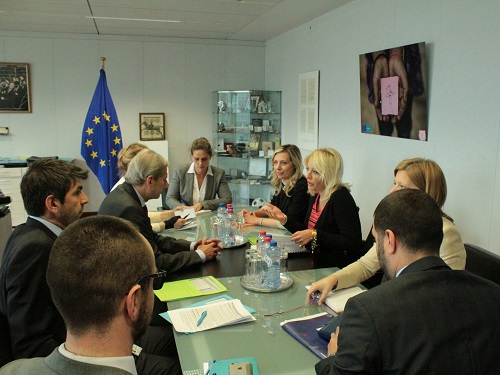 |
|
|
| Minister Joksimović participated in the 6th European People’s Party Group Conference on the Western Balkans |
|
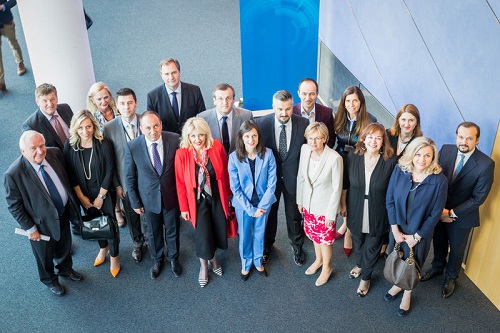
Minister without portfolio responsible for European Integration of the Republic of Serbia Jadranka Joksimović participated in the 6th European People’s Party Group Conference on the Western Balkans „EU – Western Balkans: Addressing together challenges and using opportunities“, held in the European Parliament in Brussels on 06 June 2017. Minister Joksimović has participated as a guest speaker in the second panel, dedicated to the regional cooperation and relevant security issues. Minister has used this opportunity to present the progress that Serbia made on its European path, challenges that it faces, as well as the ways to improve regional cooperation and cooperation between the candidate countries and the EU. She has emphasized the role of Serbia in maintaining regional stability and its contribution to the preservation of the wider security, primarily through participation in the EU and UN peacekeeping missions.
The other participants that have taken part at the conference are President of the European People's Party Joseph Dol, Chairman of the parliamentary group of the European People's Party Manfred Weber, European Commissioner for European Neighborhood Policy and Enlargement Negotiations Johannes Hahn, Chairman of the Foreign Affairs Committee of the European Parliament and Rapporteur for Serbia David McAllister and Head of the European Parliament Delegation to the Stabilization and Association Parliamentary Committee EU-Serbia Eduard Kukan.
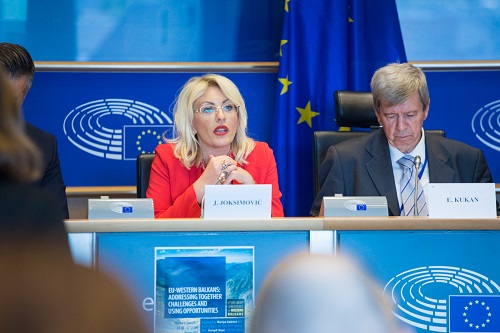 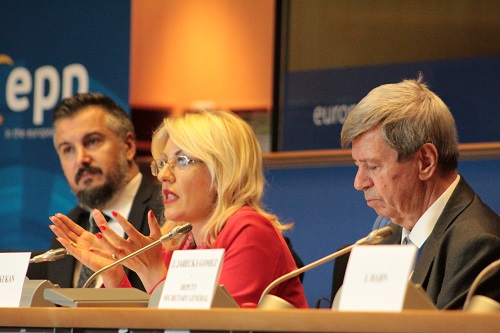 |
|
|
| MEETING OF AMBASSADOR ANA HRUSTANOVIC AND COMISSIONER FOR TRANSPORT AND MOBILITY VIOLETA BULC |
|
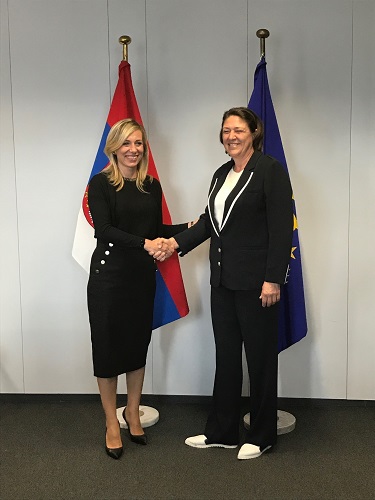
Ambassador Ana Hrustanovic, Head of Mission of the Republic of Serbia to the EU, met comissioner for transport and mobility Violeta Bulc in Brussels on June 1, 2017. On this occasion, ambassador Hrustanovic initialled Transport Community Treaty on behalf of the Republic of Serbia, with aim to deepen the integration of Western Balkans in the field of transport and to encourage the application of EU legislation and standards in this field. |
|
|
| The Third Enlargement Day was organized by and held at the European Committee of Regions in Brusselson 1 June 2017 |
|
The Plenary Session of the Enlargement Day on 1 June was chaired by Mr. Karl-Heinz Lambertz, First Vice-President of the European Committee of the Regions. The Meeting was addressed by Mr. David Mc-Callister, Member of the European Parliament, and also by Commissioner for European Neighbourhood Mr. Johannes Hahn (by video-message). For the First Panel Debate on Enlargement: Dynamics and Stabilisation speakers were Mr. Allan Jones, Head of Unit “Strategy, Policy” from the DG NEAR, Ms Corina Stratulat, Senior Policy Analyst from the European Policy Centre and Mr. NaimIsmajli, Mayor of Štime Municipality from Kosovo and Metohija. During the Second Panel Debate on Connectivity speakers were Mr. Morten Jung, Senior Adviser from the Western Balkans Directorate of the DGNEAR, Mr. Dirk Buschle, Deputy Director of the Energy Community Secretariat, Mr. Adam Szolyak, Policy Oficer with DG Energy of the European Commission and Mr. Fuad Kasumović, Mayor of Zenica in Bosnia and Herzegovina.
The main message from this meeting was that the European path of the Western Balkans has no alternative and that the process of the already initiated reforms in the region should be carried out to the end, where full contribution should be givenat and by all levels of government, including the citizens themselves. It was reiterated that on the path toward the European integration the region should cooperate more intensively, and that this process is not a substitute for the process of European integration, but should be its part. The need for a better and more dedicated EU approach to the region was confirmed once more, and especiallyhaving in mind that this is the EU’s firstNeighbourhood,thus looking for sustainable solutions for some of current problems the EU is facing, such ascrisis with migrants and security issues, are indispensable without the Western Balkans. |
|
|
| The Second Joint Consultative Committee Meeting CoR-Republic of Serbia took place on 31 May |
|
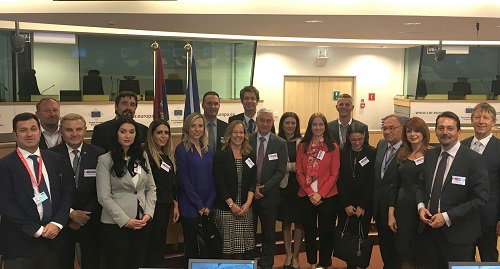
The Meeting was moderated by two JCC Co-Chairs, Mr. DimitriosKalogeropoulos, on behalf of CoR, and Mr. DejanJovanović, on behalf of the Republic of Serbia. The meeting was organized in two consecutive sessions: 1) An Update on EU-Serbian Relations and 2) EU Local and Regional Authorities Experience in Using Structural and Cohesion Funds: Transposing Lessons to Pre-Accession Funds. The speakers within the First Thematic Session were Ambassador Ms Ana Hrustanović, Head of Mission of the Republic of Serbia to the European Union, Mr. Ivan Bošnjak, State Secretary, Ministry of Public Administration and Local Self-Government of the Republic of Serbia and Mr. Christos Makridis, Deputy Head of Unit for Serbia, Directorate-General Neighbourhood and Enlargement Negotiations (DG NEAR) of the European Commission. The speakers within the Second Thematic Session were: Mr. Jean-Pierre Halkin, Head od Unit for Macro-Regions, Transnational/International Cooperation, IPA, Enlargement of the European Commission’s Directorate-General Regional and Urgan Policy, Mr. Ognjen Bjelić, Provincial Secretary for Regional Development, Interregional Cooperation and Local Self-Government of the Autonomous Province of Vojvodina in Serbia and member of the JCC, Mr. Petr Osvald, Member of CoR, and Mr. SašaDjordjević, Mayor of Municipality Gadžin Han in Serbia, Alternate Member of the JCC.
The participants at the meeting agreed in their assessment that Serbiais leader in the region, in terms of economic reforms being implemented in the country. It was noted that it is necessary to maintain the existing rate, where cooperation between the Republic of Serbia and CoR can significantly contribute, especially at the level of local and regional authorities.
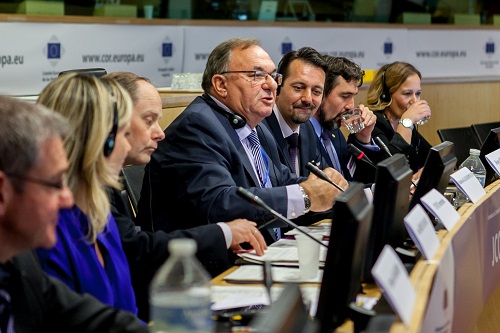 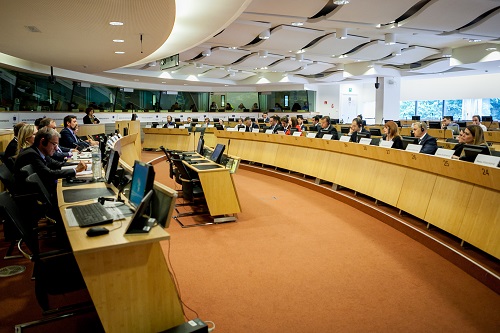 |
|
|
| Regional stability primary goal of Serbia |
|
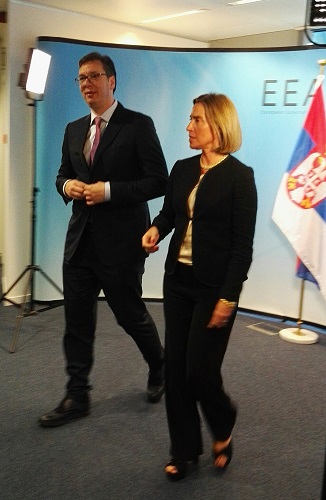 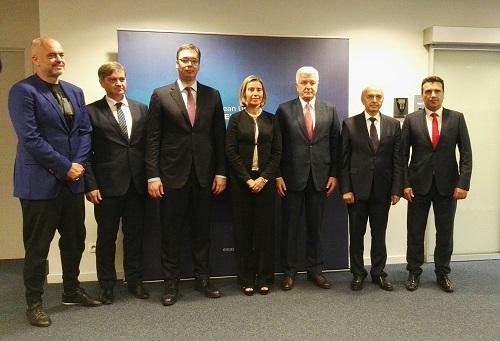
Belgrade/Brussels, 24 May 2017 – Prime Minister Aleksandar Vucic met in Brussels with EU High Representative for Foreign Affairs and Security Policy Federica Mogherini to discuss the European perspective of Serbia and the Western Balkans, the situation in the region and the future of dialogue between Belgrade and Pristina.
Mogherini said that with tonight's gathering of Western Balkan leaders she wants to emphasize that the doors of the EU are open for this region and to encourage regional cooperation with the aim of preserving stability and faster economic progress of all.
She praised the economic reforms of Serbia and its progress on the European path, as well as the constructive role of Prime Minister Vucic in preserving regional stability.
Prime Minister Vucic underlined the importance of cooperation in the region and said that Serbia will continue with such a responsible regional policy.
At the same time, he expressed concern for the future of dialogue between Belgrade and Pristina in the view of the development of the political situation in the southern Serbian province and statements of Kosovo Albanians. |
|
|
| Economic and Financial Affairs Council– ECOFIN |
|

The final meeting of annual Economic and Financial dialogue between the EU and the Western Balkans and Turkey was held on 23 May 2017 during the Economic and Financial Affairs Council – ECOFIN. Serbian delegation was led by Mr. Dušan Vujović, minister of finance and Ms. Jorgovanka Tabaković, governor of the National bank of Serbia. At the meeting, the participants discussed about Economic Reform Programmes for the period 2017-2019 (ERP) which were submitted to the European Commission earlier this year. The representatives of the European Commission, the European Central Bank and EU member states congratulated Serbia on economic growth in 2016 and strong fiscal consolidation that has been implemented. In addition, it was noted that financial stability, especially with a decline in non-performing loans, has been preserved.
Joint conclusions of the Economic and Financial dialogue were adopted the end of the meeting.

 |
|
|
| MINISTER IVICA DAČIĆ MET EUROPEAN COMMISSIONER JOHANNES HAHN |
|
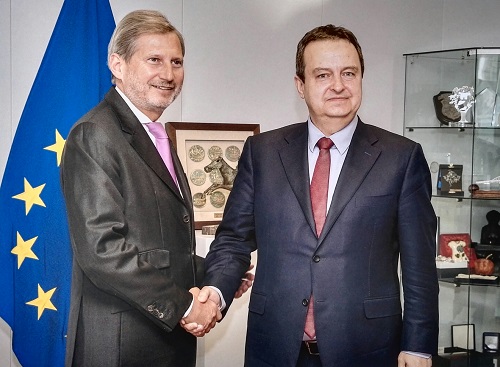
First Deputy Prime Minister and Minister of Foreign Affairs of the Republic of Serbia Ivica Dačićmet European Commissioner for Neighbourhood Policy and Enlargement Negotiations on 24 April 2017 in Brussels. On this occasion, Minister Dačić and Commissioner Hahn discussed the European integration of the Republic of Serbia, regional stability and other questions.
Minister Dačić emphasized that the membership in the EU is one of the most important prioritiesof Serbian foreign policy, that Serbia remains devoted to regional cooperation and good neighborly relations. In this context, Minister Dačić emphasized in particular the importance of Berlin Process and the activities which are being implemented with the aim to increase Western Balkans connectivity. The Minister reminded that Serbia has a constructive role in the preservation of regional stability, despite all the challenges it is facing in this regard. As it concerns the process of accession of Serbia to the EU, Minister Dačić expressed expectations that the pace of negotiations will accelerate in the following period.
Commissioner Hahn emphasized that Serbia remains the most stable country in the Western Balkans and commended its constructive approach towards coping with negative rhetoric that might endanger the stability of the region. The Commissioner expressed hope that Serbia will continue the implementation of the reforms and opening of new negotiating chapters.
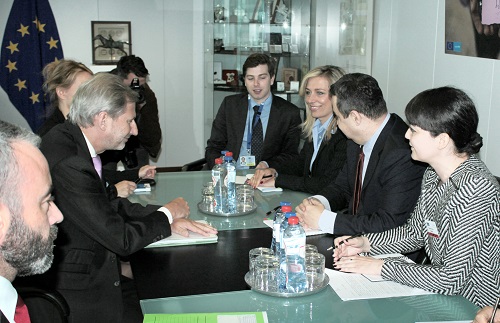 |
|
|
| PUBLIC INTERNATIONAL OPEN COMPETITION FOR THE DESIGN OF A CONCEPTUAL SOLUTION FOR THE ZORAN ĐINĐIĆ MEMORIAL AT THE STUDENTS SQUARE IN BELGRADE |
|
We would like to inform you that the Belgrade City Administration, Secretariat for Culture, has announced a “Public international two-phase open competition for the design of a conceptual solution for the Zoran Đinđić memorial at the Students square in Belgrade”.
The aim of the competition is to obtain the best quality conceptual solution for the Zoran Đinđić Memorial at the Students Square in Belgrade and to create a dignified memory of Zoran Đinđić, his life, work and social and historical changes he initiated in Serbia, as well as of his tragic death at the entrance to the building of the Government of the Republic of Serbia on March 12, 2003.
Zoran Đinđić was one of the founders of the Democratic Party and served as President of the Executive Board from September 1990, and as President of the Party from January 1994. He was a Senior Research Fellow at the Centre for Philosophy and Social Theory, member of all three multiparty sessions of the National Parliament of the Republic of Serbia and of the Council of the Republics in the Parliament of the Federal Republic of Yugoslavia.
He was elected Mayor of Belgrade on the 21st February 1997, representing the Together coalition, which topped the polls in many Serbian cities in the 1996 local elections. In June 2000, Đinđic took on the role of coordinator in the Alliance for Change and then became head of the Central Election Committee and promotional campaign coordinator of the Serbian Democratic Opposition (DOS) for the elections held on the 24th September 2000.
He became Prime Minister of Serbia on 25th January 2001, after the victory of DOS in the Serbian parliamentary elections in December 2000. Zoran Đinđic was murdered on March 12th 2003 in front of the Serbian government building, for striving to liberate Serbia from her past and to lead her into the future. Đinđic left behind his wife Ruzica, daughter Jovana and son Luka.
BELGRADE CITY ADMINISTRATION
Secretariat for Culture
Belgrade, Trg republike 3
announces
PUBLIC INTERNATIONAL TWO-PHASE OPEN COMPETITION FOR THE DESIGN OF A CONCEPTUAL SOLUTION FOR THE ZORAN DINDIC MEMORIAL AT THE STUDENTS SQUARE IN BELGRADE
Competition organizer:
City of Belgrade - Belgrade City Administration, Secretariat for Culture.
Competition Purpose:
The aim of the competition is to obtain the best quality conceptual solution for the Zoran Bindic Memorial at the Students Square in Belgrade.
The meaning of the artistic and program solution is to create a dignified memory of Zoran Bindic, his life, work and social and historical changes he initiated in Serbia, as well as of his tragic death at the entrance to the building of the Government of the Republic of Serbia on March 12, 2003.
The space for which this memorial should be designed is a part of the reconstructed Students Square which is to be transformed into a pedestrian zone, according to the project design made by architect Boris Podrecca.
The memorial is expected to be designed in the tone of contemporary visual art.
Type of Competition:
As for the type, the competition is public.
As for the participants, the competition is open.
As for the form, the competition has two phases.
As for the manner and design submission, the competition is anonymous.
Language of the competition for local participants shall be Serbian, and for foreign participants English.
Documentation:
Competition participants may download the competition material free of charge at the web-portal of the City of Belgrade (http://www.beograd.rs) and Association of Belgrade Architects (http://www.dab.rs/) starting as of March 30, 2017.
Term:
The final deadline for submission of designs in the first phase of the competition is June 15, 2017, till 3 p.m., irrespective of the manner of design submission (direct submission or by mail).
Deadline for the completion of the jury work and publication of the first phase results is June 30, 2017. The final deadline for submission of the design in the second phase of the competition is September 28, 2017, till 3 p.m., irrespective of the manner of design submission (direct submission or by mail).
Deadline for the completion of the jury work and publication of the second phase of the competition is October 16, 2017.
Prize fund:
If minimum 10 designs are submitted by the end of the defined deadline, which meet the propositions of the competition for the second phase, 6 (six) designs will be selected.
Prizes at the total amount of the net prize fund of 19.000 euros shall be granted in the following order:
- First prize 8.000 euros,
- Second prize 5.000 euros,
- Third prize 3.000 euros,
and three equally valuable purchases of 1.000 euros each.
Prize purchase payments for designs whose authors are residents of the Republic of Serbia shall be paid in dinar equivalent. The design is awarded the first prize shall be selected for realisation. |
|
|
| The student’s day on College of Europe in Bruges – donation from Embassy and Mission to EU |
|
The College of Europe in Bruges hosted the Balkans national week from 27 January to 03 March 2017. Having become a crucial part of student life, this tradition gathered, among others, students from all around Europe last Thursday in order to delight in Serbian gastronomy, kindly provided by the Embassy of the Republic of Serbia to the Kingdom of Belgium and the Mission of the Republic of Serbia to the EU.
This year's student and representative of Serbia is miss Hana Hudak, Joseph Bech promotion scholar for 2016/17. |
|
|
| INTERGOVERNMENTAL CONFERENCE ON ACCESSION OF SERBIA TO THE EU |
|
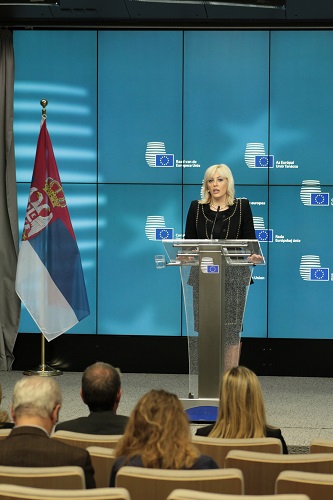
The fifth meeting of the Intergovernmental Conference at ministerial level on the accession of Serbia to the EU was held in Brussels on February 27, 2017. On this occasion, the negotiations on chapter 20 - Enterprise and Industrial Policy were opened, while the negotiations on chapter 26 - Education and Culture were opened and provisionally closed.
The Serbian delegation was led by Ms JadrankaJoksimović, Minister without portfolio responsible for European integration. The European Union delegation was led by Mr Louis Grech, Deputy Prime Minister and Minister for European Affairs of the Republic of Malta, on behalf of the Maltese Presidency of the Council of the European Union. The European Commission was represented by Mr Johannes Hahn, Commissioner for European Neighbourhood Policy and Enlargement Negotiations.
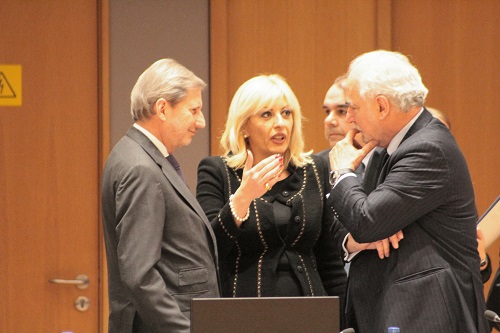 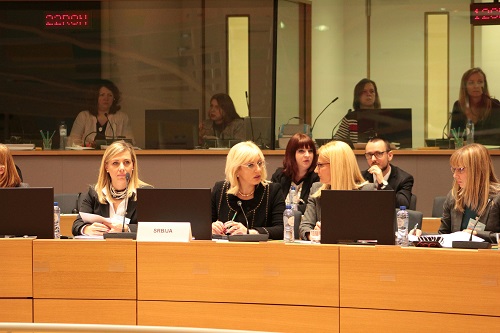 |
|
|
| Minister for Labour, Employment, Veteran and Social Affairs of the Republic of Serbia Aleksandar Vulin visited Brussels on 2-3, February 2017 |
|
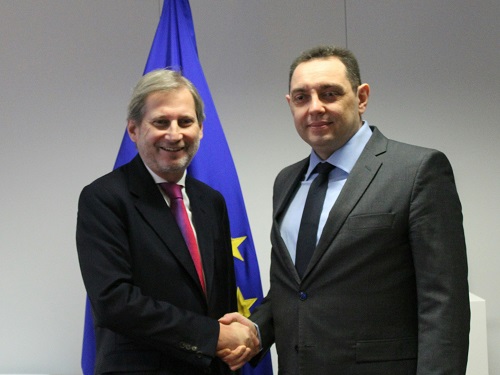 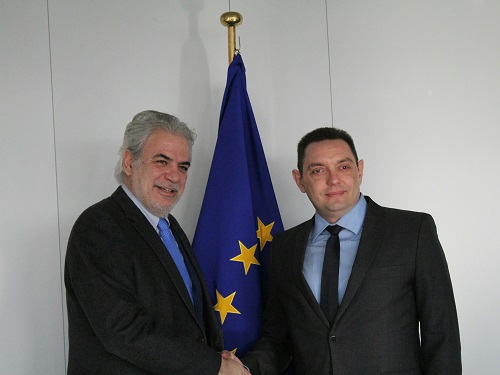
Minister for Labour, Employment, Veteran and Social Affairs of the Republic of Serbia Aleksandar Vulin visited Brussels on 2 and 3 February 2017. During the visit, he had meetings with Commissioner for Migration, Home Affairs and Citizenship Dimitris Avramopoulos, Commissioner for European Neighbourhood Policy and Enlargement Negotiations Johannes Hahn and Commissioner for Humanitarian Aid & Crisis Management Christos Stylianides, with whom he talked about the continuation of financial assistance provided by the European Commission to Serbia in order to address the problem of migration crisis. Minister Vulin informed the Commissioner about the situation on the ground and of a number of migrants currently present in Serbia, as well as on country needs in order to solve the problem caused by the migrant crisis. Minister Vulin thanked the Commissioner Stylianides for the additional humanitarian aid that he had announced during his recent visit to Belgrade. In addition, it has been agreed to start negotiations on securing additional funds from the EU fund for Syria (Madad).
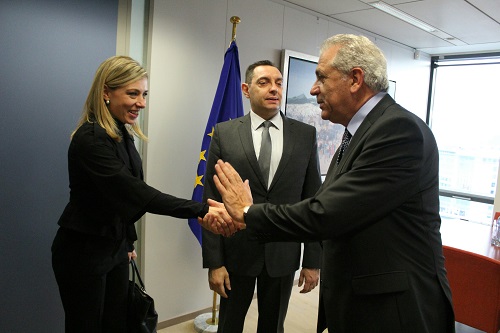 |
|
|
| CEFTA Chairmanship 2017 Republic of Serbia |
|
The Mission of the Republic of Serbia to the EU, Chamber of Commerce and Industry of Serbia and the CEFTA Secretariat organized a panel in Brussels on 1 February 2017 dedicated to the presentation of the CEFTA Chairmanship priorities of Serbia. Ambassador Ana Hrustanović in her welcoming remarks has emphasized the importance of CEFTA market for the Serbian economy. CEFTA is the second trade partner of Serbia with the participation in total trade with the world of about 11%. Serbia's presidency will be focused on the consolidation and strengthening the implementation of CEFTA and will provide us the opportunity to insist on the adoption of the new decisions and agreements such as the adoption of the Protocol on Trade in Services and the Protocol on Trade Facilitation. List of speakers has also included Ms. Bojana Todorovic, Chair in Office, CEFTA and Assistant Minister of Trade, Tourism and Telecommunications, Mr. Umut Ergezer, Acting Director of CEFTA Secretariat and Mr. Nenad Djurdjevic, Director of the International affairs, Chamber of Commerce and Industry of Serbia.
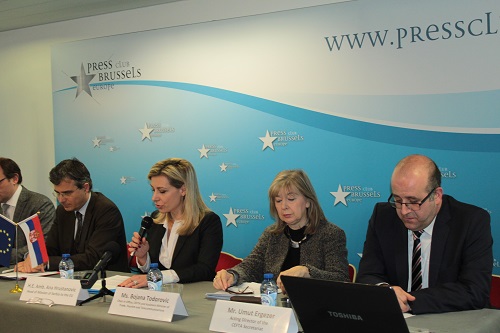
 |
|
|
| CEFTA SECRETARIAT – VACANCY ANNOUNCEMENT DIRECTOR OF THE CEFTA SECRETARIAT, BRUSSELS, BELGIUM |
|

The Central European Free Trade Agreement (CEFTA 2006) is a modern and comprehensive regional free trade agreement, designed as an integral part of the pre-accession agenda. It provides a strong legal basis for policy formulation and implementation in key areas related to trade and investment. The successful implementation of the Agreement to date with full liberalization of trade in goods has substantially contributed to the creation of a free trade area in South East Europe. The CEFTA Parties have agreed on an ambitious agenda to further contribute to economic growth.
The Secretariat of CEFTA 2006 was established in Brussels, Belgium, in September 2008 in accordance with the Article 40.2 of the Agreement. The overall role of the Secretariat is to provide technical and administrative support to the Joint Committee, Chair in Office and any body established by the Joint Committee.
A specially appointed Selection Committee is now seeking applications for the position of Director.
Entitled: Job description is below:
http://cefta.int/contact/vacancy/
Eligible applicants include civil servants from national administrations and personnel from international organizations, the private sector and civil society. The successful candidate will be offered a competitive contract by the CEFTA Secretariat.
Interested candidates should upload a letter and a completed application form as provided below (both in English). The deadline for receipt of applications is midnight (CET), Friday, 10 February, 2017. Only short-listed candidates will be contacted for interview. |
|
|
| Project ANTARES оf the BioSense Institute from Serbia Won the First Place in the Strongest European Competition for the Excellence in Science, by which an Investment of 28 Million Euros Has Been Provided for the Serbian Science |
|
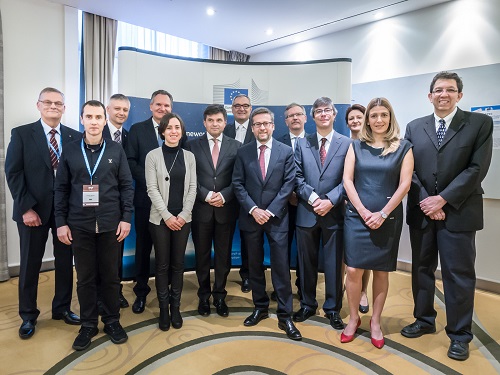
BioSense Institute from Novi Sad won the first place in Europe, as part of the most prestigious call on the European Commission's Horizon 2020 – Timing Program, intended for the creation of European Centres of excellence in science and research, their implementation and the creation of innovations. It enables the economic development of the countries and strategically put them on the innovative path for growth in Europe.
In the competition of nearly 200 projects and participation of the strongest research institutions all over Europe, such as the Universities of Oxford and Cambridge, the Max Planck Institute, Fraunhofer and others, through a multi-stage competition during the last two years, the project ANTARES of the Serbian BioSense Institute has won the convincing first place, ahead of all EU Member States and as the only non-EU funded project.
With a budget of up to EUR 28 million, of which 14 million are EU grants and 14 million national co-financing, already been provided by the Government of the Republic of Serbia, ANTARES aims at developing BioSense into the European Centre of excellence for advanced technology in the field of sustainable agriculture.
The BioSense Institute’s partners on the project are the Ministry of Education, Science and Technological Development of the Republic of Serbia and the Institute DLO from the Netherlands – a leading world institution in the field of contemporary agriculture.
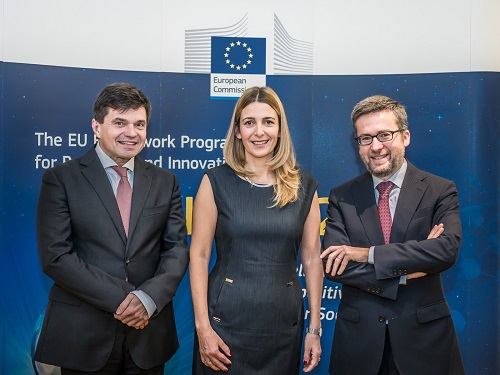 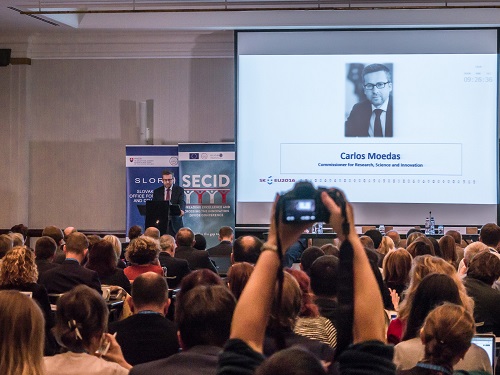
|
|
|
| The fourth meeting of the Accession Conference with Serbia, held in Brussels, on 13 December 2016 |
|
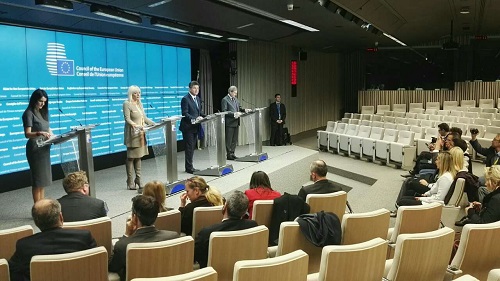
The fourth meeting of the Accession Conference with Serbia at ministerial level was held in Brussels on 13 December 2016, to open negotiations on Chapter 5 - Public procurement, and to open and provisionally close Chapter 25 - Science and research.
The European Union delegation was led by Mr Miroslav Lajčák, Minister of Foreign and European Affairs of the Slovak Republic, on behalf of the Slovak Presidency of the Council of the European Union. The European Commission was represented by Mr Johannes Hahn, Commissioner for European Neighbourhood Policy and Enlargement Negotiations. The Serbian delegation was led by Ms Jadranka Joksimović, Minister without portfolio responsible for European integration.
With the fourth meeting of the Accession Conference with Serbia, out of a total of 35 negotiation chapters, 6 chapters have now been opened for negotiations of which 1 chapter has already been provisionally closed. Further Accession Conferences will be planned, as appropriate, in order to take the process forward in the first half of 2017. The accession negotiations were launched in January 2014. |
|
|
| The Third EU-Serbia SA Council Meeting, held in Brussels, on 13 December 2016 |
|
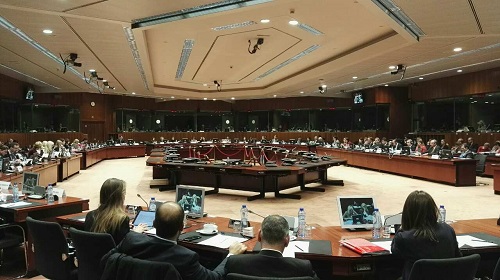
The EU-Serbia Stabilisation and Association Council (SA Council) held its third meeting on 13 December 2016. This meeting was chaired by Ms Jadranka Joksimović, Minister without portfolio for EU integration of Serbia, Mr. Miroslav Lajčak, Minister of Foreign and European Affairs of the Slovak Republic, led the European Union delegation on behalf of the EU High Representative for Foreign Affairs and Security Policy Federica Mogherini, and by Mr. Johannes Hahn, Commissioner for Enlargement Negotiations and European Neighbourhood Policy, represented the European Commission.
The SA Council meeting provided a timely opportunity to review Serbia's progress in its preparations for accession and to consider priorities for further work within the framework of the Stabilisation and Association Agreement.
The SA Council welcomed the major steps Serbia had taken since its last meeting, with the adoption of its action plans for rule of law chapters 23 and 24 as well as progress in the EU facilitated dialogue between Belgrade and Priština. In this regard, the SA Council welcomed the opening of chapters 32 (Financial control) and 35 (Other issues: Item 1 - Normalisation of relations between Serbia and Kosovo*) on 14 December 2015, chapters 23 (Judiciary and fundamental rights) and 24 (Justice, freedom and security) on 18 July 2016, as well as the opening of chapter 5 (Public procurement) and the opening and provisional closure of chapter 25 (Science and research) on 13 December 2016. The SA Council also held an exchange of views on developments in the Western Balkans.
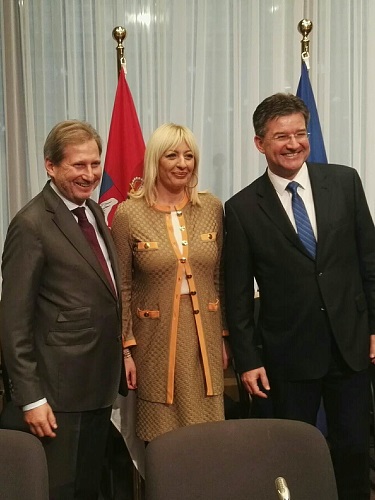 |
|
|
| Minister of Agriculture and Environmental Protection Nedimovic visited Brussels |
|
Minister of Agriculture and Environmental Protection, Mr. Branislav Nedimovic attended the meetings on 17 November with the representatives of Directorate General for Neighbourhood Policy and Enlargement Negotiations, Directorate General for Trade, Directorate General for Agriculture and Rural Development, Directorate General for Health and Food Safety. Minister Nedimovic discussed issues relevant to trade facilitation with the EU, accreditation process for IPARD, prevention and eradication of animal diseases. During the above mentioned meetings, it was confirmed that the EU will financially support LSD vaccination.
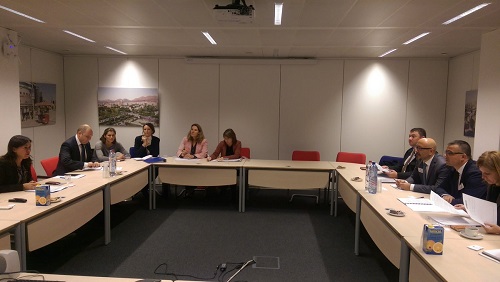 |
|
|
| Exhibition „Danube - An Artist, Witness, Traveller“ |
|
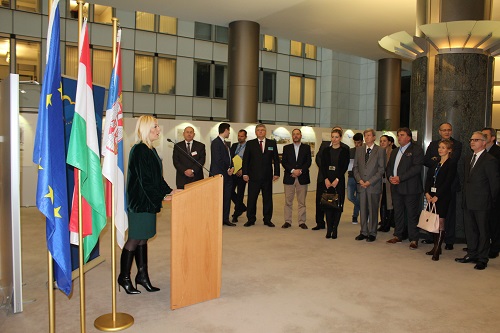 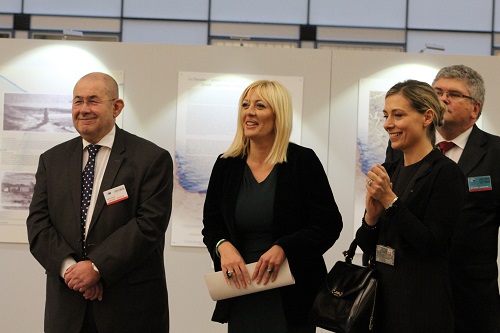
Minister without portfolio responsible for European integration of the Republic of Serbia Jadranka Joksimovic opened exhibition „Danube - An Artist, Witness, Traveller“ at the European Parliament, on 15 November 2016. Member of the European Parliament and the host of the exhibition Andor Deli and the president of the Assembly of AP of Vojvodina Ištvan Pastor also addressed the audience.
Number of guests attended the opening of the exhibition, including Vice President of the European Parliament Antonio Tajani, Chair of the European Parliament delegation for Serbia Eduard Kukan, Vice President of the informal group “Friends of Serbia” at the European Parliament Franc Bogovič, representatives of the European Commission, regional representations, member states of the EU and others.
Exhibition „Danube - An Artist, Witness, Traveller“ was prepared by a team of authors of Public Enterprise Belgrade Fortress and it was initiated and organised by the Mission of the Republic of Serbia to the EU at the European Parliament from 14 - 18 November 2016.
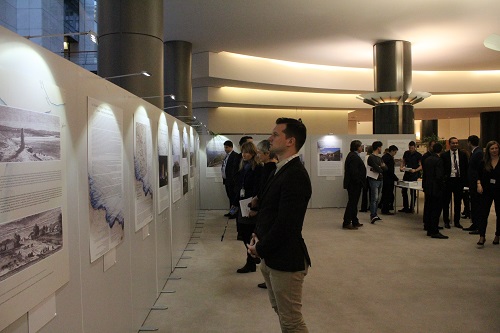 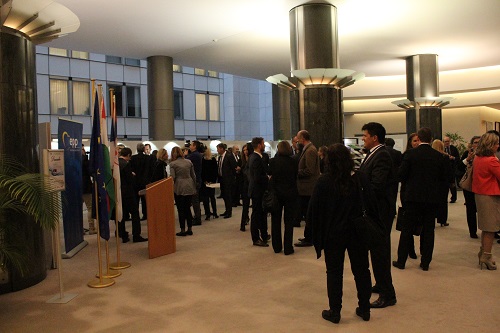 |
|
|
| 10/11/2016 Presentation of letters of credentials of Ambassador Ana Hrustanovic |
|
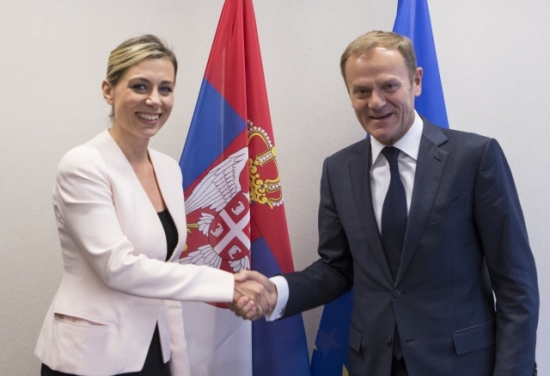
Ambassador of the Republic of Serbia to the EU, H.E. Ms Ana Hrustanovic presented on 10 November 2016 the letters of credentials to President of the European Council, H.E. Mr Donald Tusk. Presentation of letters was followed by exchange of views with regard to bilateral relations and further cooperation between the Republic of Serbia and the EU.
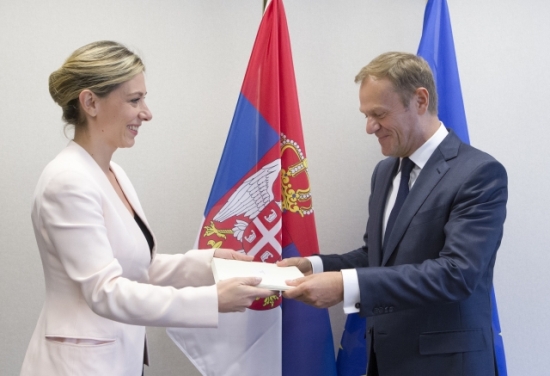
|
|
|
| INVITATION TO TENDER FOR THE PROVISION OF REAL ESTATE SALES SERVICES – THE SALE OF DIPLOMATIC REAL ESTATE IN NEW YORK (UNITED STATES OF AMERICA), TOKYO (JAPAN), BONN (GERMANY), AND BERNE (SWITZERLAND) |
|
- Bosnia and Herzegovina, the Republic of Croatia, the Republic of Macedonia, the Republic of Slovenia, and the Republic of Serbia – as the sole Successor States to the former Socialist Federal Republic of Yugoslavia (hereinafter “the SFRY”) – and the co-owners of diplomatic and consular property of the SFRY, as the previous title owner, hereby issue an invitation to tender for the provision of the service of brokering the sale of the following immovable property [1] :
a) Permanent Mission of the SFRY to the UN, New York, USA (854 Fifth Avenue, N.Y. 10065); additional indicative data: block 1391, Lot 6, site area 3,600 sq. ft./30 x 120, gross living area 16,125 sq. ft, est. 1910;
b) Residence of the Permanent Representative of the SFRY to the UN, New York, USA (730 Park Avenue, N.Y. 10021); additional indicative data: Apt. 16/17B, cooperative interest, 718/30.000 shares, block 1385, Lot 37, project name: Park 71st St. Corp., gross living area above grade 4,294 sq. ft., Act. Age: 1929;
c) Embassy and residence of the SFRY in Tokyo, Japan (7-24, 4-chome, Kitashinagawa Shinagawa-ku, Tokyo); additional indicative data: land 316-37 Kita Shinagawa 4-Chome, Shinagawa Ward, Tokyo, registered total area 995.27 m2 (app. 28 m x 30 m), building 316-37 Kita Shinagawa 4-Chome, Shinagawa Ward, Tokyo, total floor area 1,725.70 m2 (size in building design document), time of completion 1965;
d) Embassy of the SFRY in Bonn, Germany (Schlossallee 5, 5300 Bonn 2), additional indicative data: land register Mehlem, entry no. 2,865, building and garden/courtyard area 5,441 m2, Schlossallee 1 and 5, floor area 1,565 m2 (ground floor, cellar, attic, underground garage with 14 parking spaces);
e) Embassy and residence of the SFRY in Berne, Switzerland (Seminarstrasse 5, 3006 Bern), additional indicative data: estate: nr. 199 Bern 4, land area: total 1,760 m2, building gross area 540 m2, garden area/courtyard 1,220 m2, construction year: 1978.
The Successor States underline the following:
- The service of brokering the sale of all the immovable property listed above will be awarded to a single real estate agency, which will be awarded the contract by the Successor States;
- The deadline for submitting tenders is 30 days from the day following the issuing of this invitation to tender, while the Successor States will notify tenderers of their decision within 50 days from the deadline for submitting tenders;
- Among the references qualifying them to successfully broker the sale of the listed property, interested tenderers will submit the following documents, and define their conditions for providing brokerage services. In their offer, the interested tenderers will include:
a) Documents certifying that the tenderer is a registered company;
b) Documents proving that the tenderer has offices, branches, or partner organisations in the countries where the property on sale is located, operating in the listed cities (New York, USA; Tokyo, Japan; Bonn, Germany; Bern, Switzerland);
c) Documents showing the tenderer’s turnover amounted to at least US$ 100 million [2] in the last three years;
d) Guarantee for the offer in the amount of US$ 50,000.00 (the guarantee will be returned to the tenderer upon the signing of the brokerage contract);
e) Performance guarantee in the amount of US$ 100,000.00 (the performance guarantee will be returned to the tenderer upon the completion of the contract);
f) Evidence of financial and business solvency;
g) Evidence of technical and professional capacities and references proving the successful provision of brokerage services;
h) Certificate of no conviction of the tenderer/legal entity and its CEO, in accordance with the legal provisions of the country of the registered seat of the tenderer and permanent residence of its CEO;
- The period of validity of the tender shall be at least 90 days from the date of submission;
- Interested tenderers will specify their tenders as a brokerage fee, which is a percentage of the total gross sales price of the property listed above;
- The lowest brokerage fee shall be the decisive criterion in selecting the successful tenderer, provided that the tenderer meets all the above conditions;
- Interested tenderers will submit their tenders (in a sealed envelope, marked with the designation ‘Do not open’) by registered mail addressed to:
Stanislav Vidovič, Ministry of Foreign Affairs of the Republic of Slovenia, SI-1001 Ljubljana, Prešernova cesta 25.
- The Successor States will provide appraisals of the market value of all the listed immovable property to the successful tenderer; the property’s appraised market value will represent the minimum asking price for the property concerned, unless otherwise decided by the Successor States;
- The sale of the immovable property will be conducted preferably by way of public auction or by any other method in accordance with the local real estate market practice for each immovable property concerned, as advised by interested tenderers in their tenders;
- The Successor States reserve the right not to select any tenderer, even if all conditions are met;
- The immovable property listed in this invitation to tender may be sold separately or not. Each Successor State must confirm the sale of each immovable property under the terms to be negotiated with the best offer/potential buyer prior to concluding the sale if the purchase price offered is below the appraised market value or the minimum asking price.
- Contact details for additional information: gp.mzz@gov.si or sekretariat.mzz@gov.si.
Please find the documents required for applying here:
Tenderer information sheet
Tender Bond (Guarantee) Form B-1
Performance Bond (Guarantee) Form B-2
______________________________________________________________________________________________________
[1] The information on property in this invitation to tender are only indicative. The Successor States accept no responsibility for their accuracy. Precise information may be obtained by consulting public databases of the countries where the immovable property is located. The Successor States will submit relevant data in their possession regarding the immovable property listed in this invitation to tender to the successful tenderer after the completion of the selection process.
[2] Or the equivalent in €, CHF, or ¥. |
|
|
| Minister Brnabic presented in the European Parliament in Strasbourg solutions for the national minority issues in Serbia |
|
Minister of Public Administration and Local Self-Government of the Republic of Serbia Ana Brnabić, Assistant Minister of Justice Čedomir Backović and Chief Negotiator for the Accession of the Republic of Serbia to the EU Tanja Miščević participated in the meeting of the Intergroup for Traditional Minorities, National Communities and Languages in the European Parliament in Strasbourg on 27th October 2016. They presented to the members of the European Parliament, who are also members of the Intergroup, institutional and legislative framework of Serbia for national minority rights, with the special emphasis on the Action Plan for the realization of the rights of national minorities.
Minister Brnabić stressed that Serbia represents success story when it comes to solutions for the national minority issues, proved through continuous work on the improvement of laws and other legislative acts related to the adequate use of language and script of national minorities, their representation in the political and democratic processes and better definition of their jurisdiction and funding sources. Institutions of the National Assembly and the Government of the Republic of Serbia, as well as independent bodies, which together with the National Councils of National Minorities work to protect national minority rights and freedoms in Serbia, were presented as well.
Vice-President of the Government of the Autonomous Province of Vojvodina and provincial secretary for education, regulations, administration and national minorities Mihály Nyilas and president of the National Council of Hungarian National Minority in Serbia Jenő Hajnal also participated in the meeting and presented the role of Autonomous Province of Vojvodina and its institutions in the implementation of the Action Plan, as well as role of the National Council of Hungarian National Minority in Serbia.
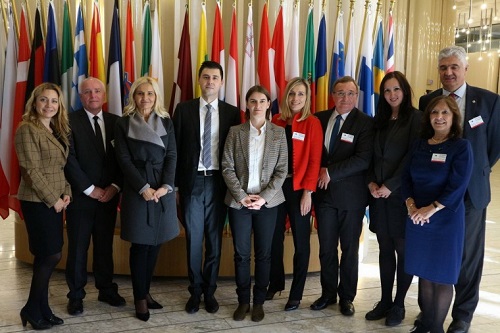 |
|
|
| Briefing on Belgrade – Pristina dialogue at the Mission of Serbia to the EU |
|
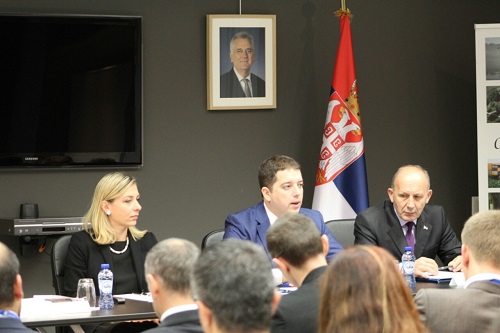
In the premises of the Mission of the Republic of Serbia to the EU on 20 October 2016 a briefing was held on the issue of Belgrade – Pristina dialogue. Representatives of member states, European Commission and European External Action Service were briefed by Marko Djuric, Director of Office for Kosovo and Metohija. Briefing was also attended by Ambassador Ana Hrustanovic and Head of Negotiating Team with the EU Tanja Miscevic.
Key message of Marko Djuric at this gathering was that Serbia will not renounce its assets. He stressed that we remain committed to further talks but that does not stipulate giving concessions at the expense of the interests of the Serbian people.
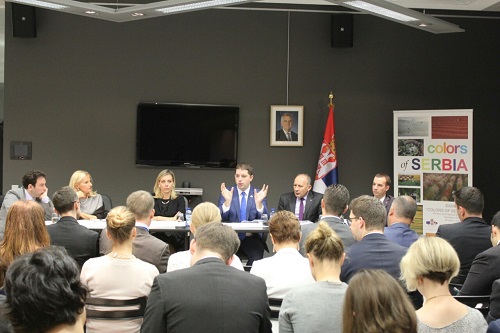 |
|
|
| Minister Vulin visited Brussels on 17-18 October |
|
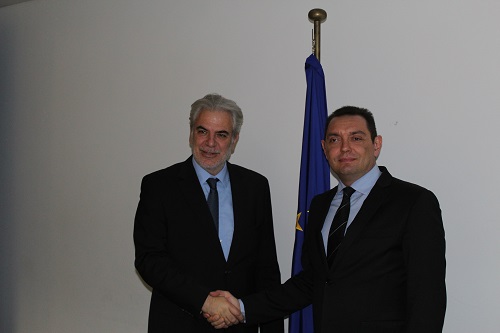
Minister for Labour, Employment, Veteran and Social Affairs of the Republic of Serbia Aleksandar Vulin visited Brussels on 17-18 October 2016. During his visit, he had meetings with Commissioner for Humanitarian Aid and Crisis Management Christos Stylianides, Commissioner for European Neighbourhood Policy and Enlargement Negotiations Johannes Hahn and Director for Western Europe, Western Balkans and Turkey in EEAS Angelina Eichhorst.
Minister Vulin said that it is of outmost importance for Serbia to be treated as an equal to member states of the EU and as such to receive all necessary assistance. He stated that Serbia will receive additional €6 million of humanitarian aid for tackling the problem of migrant crisis. Vulin confirmed that general opinion of the international community is that Serbia is treating migrants and consequences of the migrant crisis in the best possible way. Vulin pointed out that Serbia offered some accommodation facilities for migrants but he made it clear that these facilities will not increase. He explained that it is very important for Serbia to be part of the agreement which the European Commission is trying to achieve with the government of Afghanistan and possibly Pakistan on return and readmission of citizens of these countries.
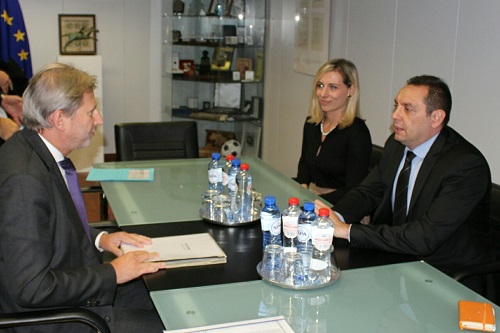
|
|
|
| Reception for the delegation from the City of Novi Sad - European Capital of Culture 2021 |
|
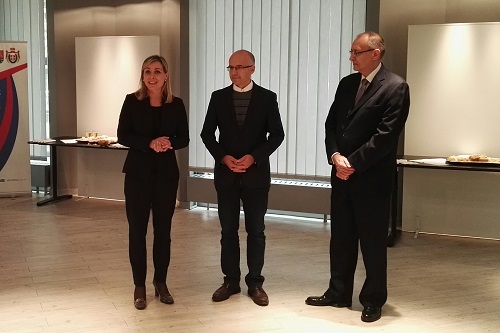
Reception was organized in the premises of the Mission of the Republic of Serbia to the EU in the honor of the delegation from the City of Novi Sad, who has received a title European Capital of Culture 2021.
Reception was opened with the statements of Ambassador Ana Hrustanović, Head of the Mission of the Republic of Serbia to the EU, Mr. Miloš Vučević, Major of the City of Novi Sad and Mr. Nemanja Milenkovic, President of the Organizing Committee for the candidacy of the City of Novi Sad for European Capital of Culture 2021.
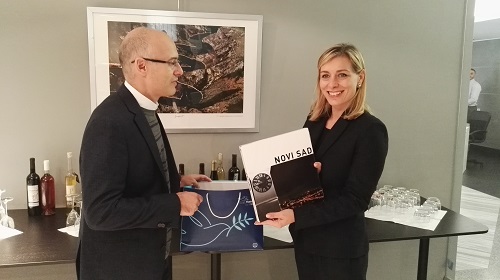 |
|
|
| Reception „Experience Vojvodina“, 12.10.2016 |
|
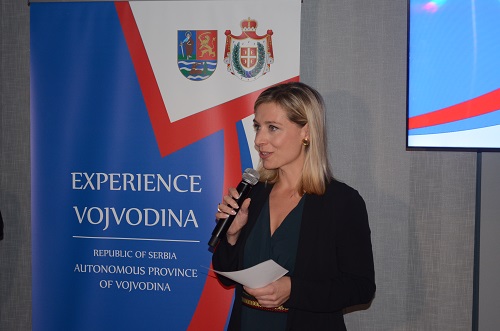 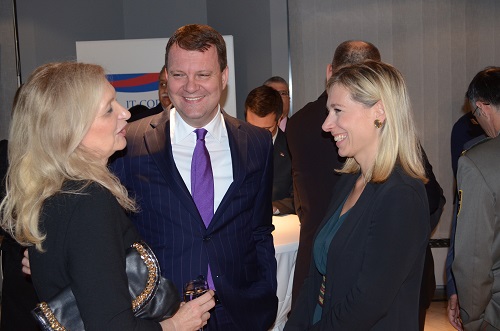
Reception was organized in the premises of the Mission of the Republic of Serbia to the EU, on 12 October 2016, at the invitation of the President of the Provincial government, Mr. Igor Mirovic and President of the Assembly of the AP Vojvodina, Mr. Istvan Pastor. Reception was thrown with an intention of promoting the investment potential of the AP Vojvodina to the European and regional officials. Speeches were given at the reception by presidents Mirovic and Pastor, Major of the city of Novi Sad, Mr. Milos Vucevic and Ambassador Ms. Ana Hrustanovic, Head of the Mission of the Republic of Serbia to the EU. During the evening, specially prepared video material about Vojvodina was shown.
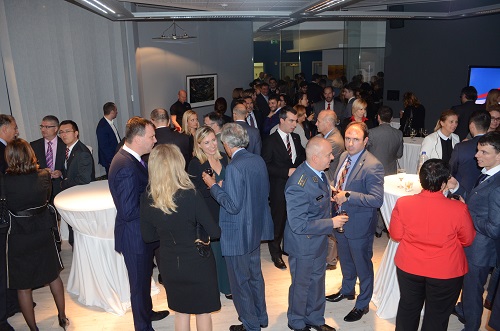 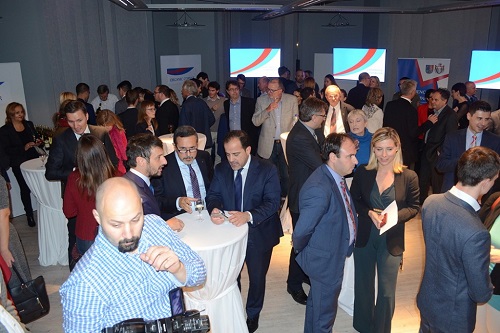 |
|
|
| Successful promotion of AP Vojvodina in Brussels at the European Week of Regions and Cities 2016 |
|
Delegation from the Provincial government and Assembly of the AP Vojvodina, led by the president of the Provincial Government Mr. Igor Mirovic and president of the AP Vojvodina Assembly Mr. Istvan Pastor, visited Brussels between 10-13.10.2016 at the European Week of Regions and Cities.
High level political delegation from AP Vojvodina meet with Ms. Genoveva Ruiz Calavera, Director for Western Balkans at the Directorate General for Neighborhood and Enlargement Negotiations (DG NEAR) and Eduard Kukan, MEP and Chairman of the Stabilisation and Association Parliamentary Committee.
During those three days, successful meetings were organized with the representatives from Hessen and Baden-Wuerttemberg (Federal Republic of Germany), Styria (Austria) and Osijek-Baranja County (Croatia).
Reception “Experience Vojvodina” was organized in premises of the Mission of the Republic of Serbia to the EU, where the Vojvodina European Office in Brussels is based, with an idea of promotion of Vojvodina and its investment potential to representatives from the European institutions, regions and the business community.
Reception was the final part of the project during the European Week of Cities and Regions. Before the Round table at the Mission of the Republic of Serbia to the EU, potential of AP Vojvodina was promoted to many representatives from the business community.
During the “European Week of Regions and Cities”, AP Vojvodina organized a joint workshop with eight regional partners in Northern Ireland Representation in Brussels, on the theme of empowering entrepreneurial potential and solving the pressing problem of the high rate of youth unemployment.
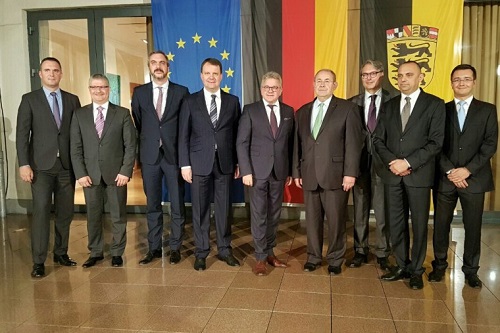
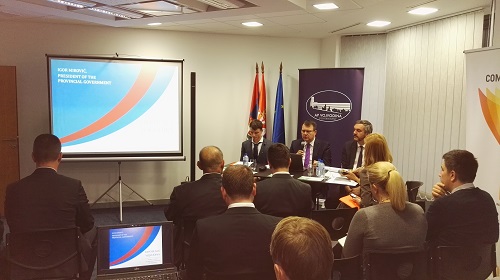
|
|
|
| City of Novi Sad - European Capital of Culture 2021 |
|
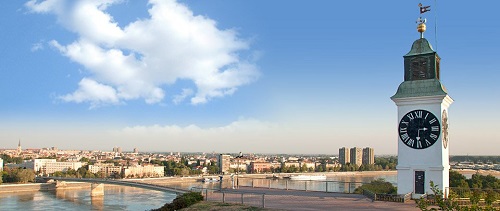
After the final presentation of the "Novi Sad 2021" project, which was held on 14 October 2016 in Brussels, the panel of independent experts decided that the first city from the candidate or potential candidate country for the EU membership who will take this prestigious title is city of Novi Sad, administrative center of the AP Vojvodina and second largest city in the Republic of Serbia. In the final stage, in a competition with Herceg Novi, final oral presentation of the candidacy was held by the delegation made up of artists, teachers, city planners and curators from Novi Sad, led by city Major, Mr. Miloš Vučević and Mr. Nemanja Milenković, President of the Organizing Committee for the candidacy of the City of Novi Sad for European Capital of Culture 2021.
The “Novi Sad 2021” project is designed as a platform for the development of cultural and creative potential of the city, which aims to strengthen the cultural vitality of the City, enabling urban regeneration and improve the international reputation and touristic offer of Novi Sad.
City of Novi Sad will, try out the project “Novi Sad 2021”, develop its local concept and strategy for sustainable development of the cultural sector with focus on strengthening the institutions of culture, reconstruction of cultural heritage, strengthening cultural participation, development of cultural and creative industries, decentralization and intersectoral cooperation, with intensive usage of EU funds defined for the development of content in the field of culture.
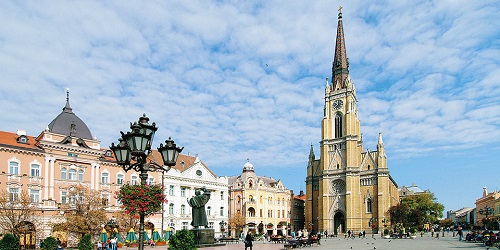 |
|
|
| Minister Vulin at Brussels Conference on Afghanistan |
|
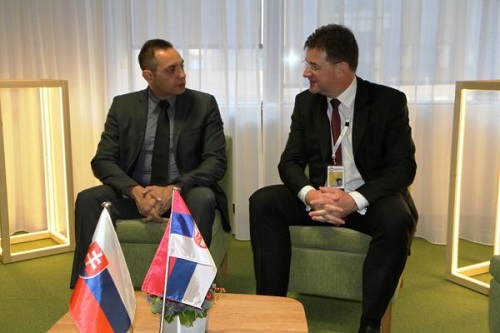 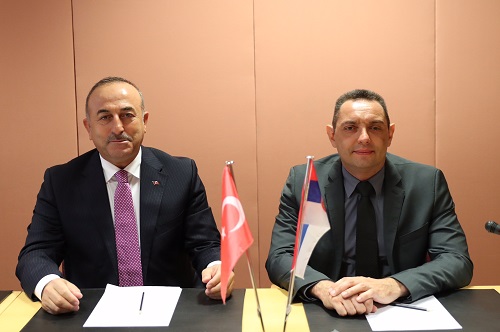
Minister of Labour, Employment, Veteran and Social Affairs Aleksandar Vulin attended Brussels Conference on Afghanistan on 5 October 2016. On this occasion, he had bilateral meeting on the margins of the conference with Ministers of Foreign Affairs of Slovakia, Hungary, Turkey, Bosnia and Herzegovina and Macedonia.
Minisiter Vulin underlined that Serbia should be treated equally with EU member states in regards to financial, technical or other types of assistance and programs related to addressing migrantion crisis in Europe.
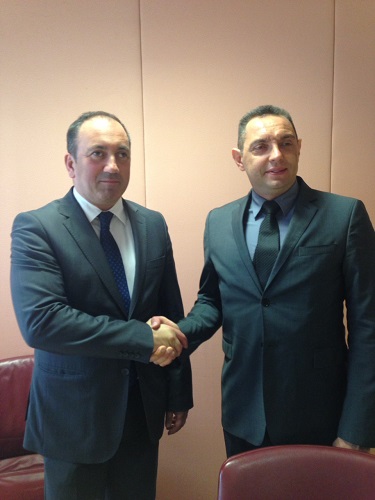 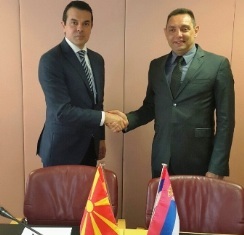 |
|
|
| New Ambassador of Serbia to the EU handed over copies of credentials |
|
New Ambassador of the Republic of Serbia to the EU H.E. Ms Ana Hrustanovic handed over on 6 October 2016 copies of credentials to the Chief of Protocol of the European Commission Nicolas de La Grandville.
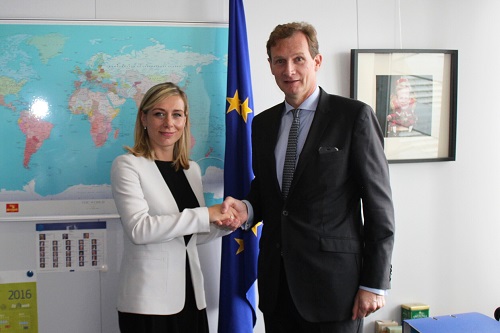 |
|
|
| Reception on the occasion of the visit of representatives of the Foreign Investors Council |
|
Mission of the Republic of Serbia to the EU on the occasion of the Foreign Investors Council – FIC visit to Brussels organised a reception on 3 October 2016. Reception was opened with the statements of Ana Hrustanović, Ambassador and Head of the Mission of Serbia to the EU and Yana Mikhailova, President of the Foreign Investors Council and CEO of Nestle Adriatic.
Reception was attended by several representatives of the European Commission and other institutions, diplomatic missions and various companies and international organizations.
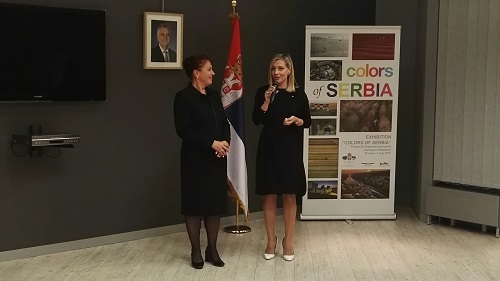 |
|
|
| Serbian food fair in Brussels |
|
Serbian food fair was held on 28 September 2016 in Brussels organized by the Euxcellence project. On this occasion seven Serbian SMEs Agri-food and beverage producers presented their products. Representatives of the Serbian small agri-businesses have held meetings with the authorities in a number of relevant European institutions and discussed about their business vision in the light of European integration. They also visited Serbian diplomatic representation in Brussels, where they were greeted by Ana Hrustanović, Ambassador and Head of Mission of Serbia to the EU and Vesna Arsic, Ambassador of Serbia to Belgium.
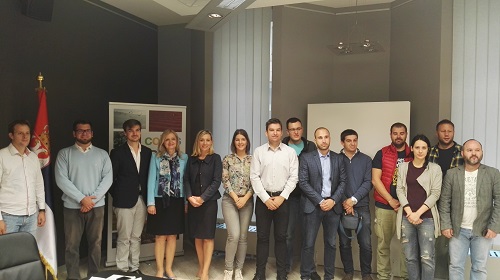 |
|
|
| Farewell meeting between the ambassador Lopandić and the European Commissioner for Hahn |
|
Farewell meeting between the ambassador Duško Lopandić and the European Commissioner for European Neighbourhood Policy and Enlargement negotiations Johannes Hahn was held on 19th of July at the European Commission. During the meeting, it has been said that the relations between the Republic of Serbia and the European Union have been significantly improved in the last couple of years.
Commissioner Hahn underlined that the cooperation between the Mission of the Republic of Serbia to the EU and the European Commission was very good and expressed his gratitude to the ambassador Lopandic for his overall contribution to the improvement of cooperation with the EU.
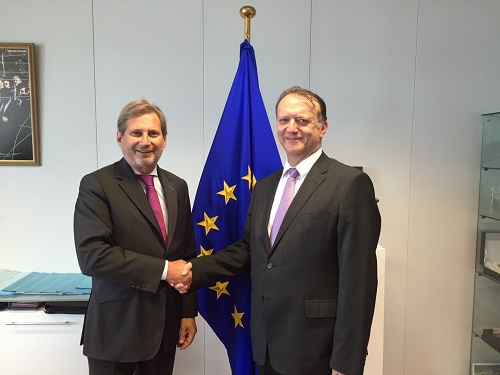 |
|
|
| Meeting between Prime Minister Aleksandar Vucic and EU High Representative Federica Mogherini |
|
Prime Minister Aleksandar Vucic talked on 19 July 2016 in Brussels with EU High Representative for Foreign Affairs and Security Policy Federica Mogherini about Chapter 35, as well as the continuation of dialogue with Pristina and achieving of better results in that process, which would mean stability of that part of the Balkans.
Vucic said after the meeting that they also spoke about how to further strengthen the region economically by bringing foreign investments, stressing the importance of encouraging foreign investors to invest in this part of Europe. The Prime Minister said that the Kosovo Albanians need to cooperate for mutual benefit, in order to find the best possible political framework of this cooperation that would not hamper our national interests. The Prime Minister said that not everything is at a standstill when it comes to implementation of the Brussels agreement, but that implementation of the agreement on the Community of Serbian municipalities is, which is also the most difficult issue. He added, however, that all this should be seen in the context of what has so far been done well, and what reduced tensions in the province and significantly reduced the number of incidents between Albanians and Serbs.
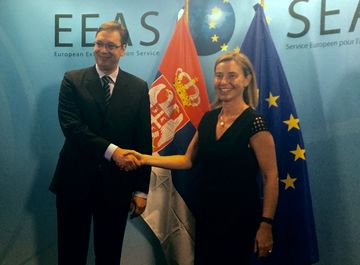 |
|
|
| THIRD INTERGOVERNMENTAL CONFERENCE ON THE ACCESSION OF THE REPUBLIC OF SERBIA TO THE EU – OPENING OF CHAPTERS 23 AND 24 |
|
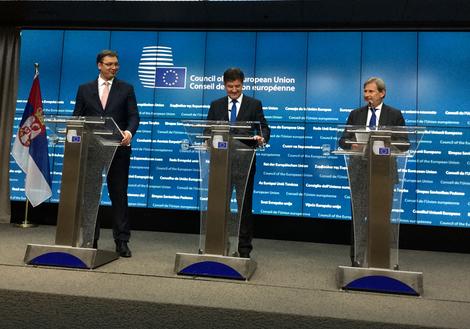
The Third Intergovernmental Conference on the Accession of the Republic of Serbia to the EU and opening of Chapters 23 (Judiciary and Fundamental Rights) and 24 (Justice, Freedom and Security) was held in Brussels on 18 July 2016.
The members of Serbian delegation, led by Prime Minister Aleksandar Vucic, were also Ivica Dacic, First Deputy Prime Minister and Minister of Foreign Affairs, Jadranka Joksimovic, Minister without portfolio responsible for European Integration, as well as other representatives of the Republic of Serbia. The Conference was attended by the representatives of member states and the European Union was represented by Miroslav Lajcak, Minister of Foreign Affairs of Slovakia which holds the rotating presidency of the Council of the EU. European Commissioner for European Neighbourhood Policy and Enlargement Johanes Hahn was also a member of EU delegation.
At the beginning of the Conference, Miroslav Lajcak, Minister of Foreign Affairs of Slovakia gave his introductory speech. In addition to him, Commissioner Hahn and Prime Minister of Serbia Aleksandar Vucic, Ministers of Foreign Affairs of Hungary and Bulgaria, as well as Heads of Permanent Representations of Croatia and Italy gave their speeches at the Conference. After the introductory part of the Conference, the agenda was adopted, as well as the Summary Conclusions of the Second Intergovernmental Conference on the Accession of the Republic of Serbia to the EU and opening of Chapters 35 (Other) and 32 (Financial Control) which was held in Brussels on 14 December 2015. Subsequently, Minister Lajcak and Commissioner Hahn made reference to the contents of Chapters 23 and 24 and gave an overall assessment of the progress made by Serbia in terms of these chapters. The Conference was closed by formal opening of negotiations on both chapters, based on the positions of both sides and under the terms specified in Common Positions of the EU. Following closing remarks of Minister Lajcak, Commissioner Hahn and Prime Minister of Serbia Aleksandar Vucic, press conference was held at the premises of the Council of the European Union. |
|
|
| Working meeting between Head of the Mission of the Republic of Serbia to the EU H.E Duško Lopandić and the Director of the Representaton of the Bavaria to the EU, Barbara Schretter |
|
Meeting with Ms Barbara Schretterwas organised on 06 July 2016 in the Bavarian Representation in Brussels, with the aim of establishing the first comunication with the newly appointed director, exchange of views on the current socio-economic situation in Europe after Bregzit, migrant and refugee crisis as well as ways to improve cooperation between Bavaria on one hand and the Republic of Serbia, and AP Vojvodina, on the other hand. The meeting was attended, from our side, by Mitar Vasiljevic, from the Mission of the Republic of Serbia to the EU / AP Vojvodina European Office in Brussels, and from the German side, Manuel Rimkus, who in charge of Internal Affairs, Construction and Transportation in the Representation of Bavaria to the EU.
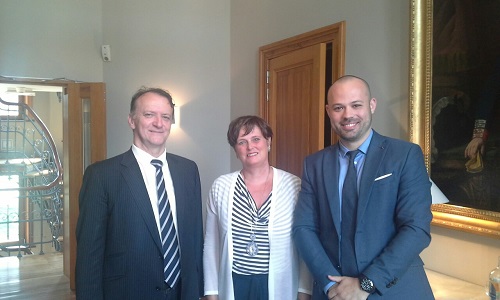 |
|
|
| Reception in the Mission on the ocassion of the Youth from Serbia and Slovenia Study Visit to Brussels, 20-22 June 2016 |
|
On the ocassion of Youth from Serbia and Slovenia Study Visit to Brussels, in the Mission of the Republic of Serbia to the EU was organized reception on 20 June 2016. In his welcome speech, Head of the Mission of the Republic of Serbia to the EU ambassador Duško Lopandić expressed his pleasure for the organization of the visit and emphasized importance of building stronger connections among young people and their better understanding of the functioning of the EU institutions.
Youth Study Visit was organized by the member of the European Parliament and vice-chair of the informal group “Friends of Serbia” in the European Parliament Franc Bogovič.
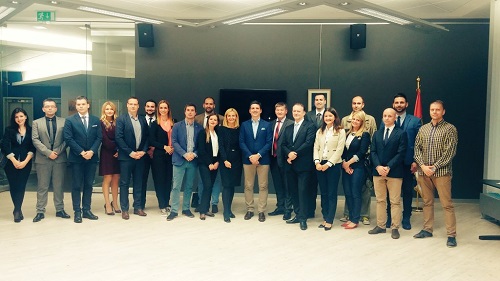
|
|
|
| Conference “Better future for the Youth in the Western Balkans” in the European Parliament |
|
Conference Better future for the Youth in the Western Balkans was held in the European Parliament on 21 June 2016. The aim of this conference was to give additional push to this topic ahead of the next Berlin process summit in Paris in July as well as to help improve the prospects of young people in the region by emphasizing the importance of the European perspective.
Conference was hosted by MEP T.Fajon and MEP F.Bogovič, while the Republic of Serbia was presented by the Head of the Negotiation Team for Serbia’s accession to the EU T.Miščević. The Conference was also attended by representatives from nongovernmental sector, including President of Serbian Association of Managers M.Petrović. Keynote speaker was EU Commissioner for Regional Policy C.Cretu.
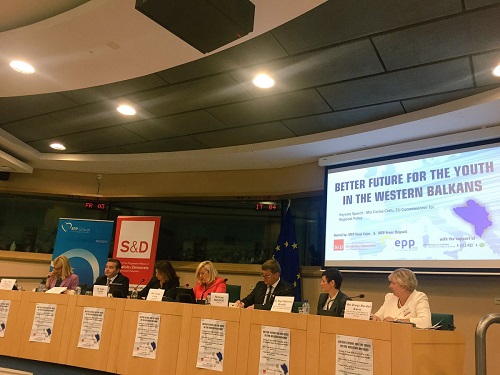 |
|
|
| Project „Roma Integration 2020“ |
|
The project „Roma Integration 2020“ was officially launched in Brussels on 9 June 2016 at the high level event which brought together officials from Western Balkans and Turkey, next to the European Commissioner Johannes Hahn, founder of Open Society Foundation George Soros and Secretary General of Regional Cooperation Council Goran Svilanović. From the Republic of Serbia, this event was represented by Miodrag Poledica, State Secretary of Ministry of Construction, Transport and Infrastructure and Duško Lopandić, Ambassador of Serbia to the EU.
The project „Roma Integration 2020“, as a joint initiative of the European Commission, Open Society Foundation and Regional Cooperation Council, aims at reducing socio-economic gap between Roma and non-Roma population in Western Balkans and Turkey. The initiative will build on the achievements and the spirit of the „Decade of Roma Inclusion 2005-2015“.
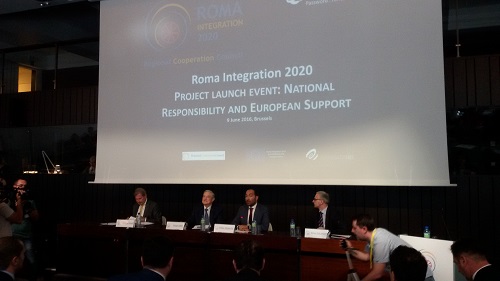 |
|
|
| Meeting of the Ministers of Foreign Affairs of the so called Berlin Process - Preparations for the Paris Summit |
|
First Deputy Prime Minister and Minister of Foreign Affairs of the Republic of Serbia Ivica Dačić participated at the Meeting of Foreign Ministers of the “Berlin Process”, held in Paris, on 24 May 2016, in preparation for the Paris Summit. The ministers exchanged views on the issue of youth cooperation in the Western Balkans (the start of the work of the Regional Office for Youth Cooperation), as well as on the so far undertaken measures needed for the implementation of projects in the infrastructure and energy sectors that had been agreed at last year's Summit West Balkans in Vienna.
Summit on the Western Balkans, which will be held in Paris on July 4, is a continuation of the Western Balkans summit in Berlin in 2014 and Vienna in 2015.
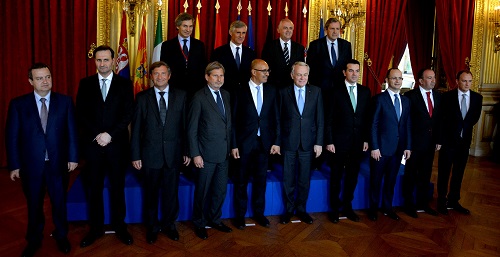 |
|
|
| Working meeting between the Head of Mission of the Republic of Serbia to the EU, ambassadors Dusko Lopandić and director of Representation of the State of Hessen (FR Germany) in Brussels, Friedrich von Heusinger |
|
On the 27.05.2016, during the meeting between Ambassador Dusko Lopandic and director Friedrich von Heusinger, in the Representation of State of Hessen in Brussels, opinions were exchanged on the current political and economic situation in Europe, refugee and migrant crisis, the role of representations of Hessen in relations with the EU institutions in Brussels, process of the European integration of the Republic of Serbia and cooperation on the regional level. In the forthcoming period, cooperation can be based on the exchange of information in respect of the mid-term review (2016) and reform of the Cohesion policy after 2020, possibilities for cooperation in the fields of economy, investments and regional cooperation.
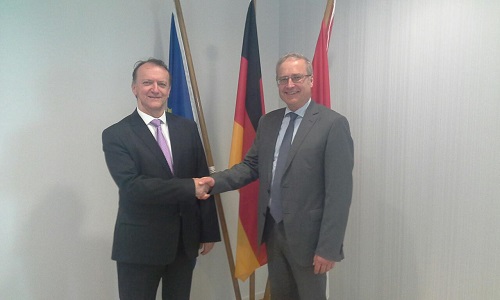 |
|
|
| Economic and Financial Affairs Council– ECOFIN |
|
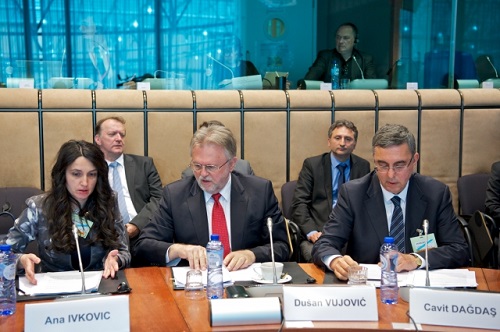
Final meeting of this year Economic and Financial dialogue between the EU and the Western Balkans and Turkey was held on 25 May 2016 during the Economic and Financial Affairs Council– ECOFIN. The Serbian delegation was composed of the representatives from the Ministry of Finance and the National Bank of Serbia and led by minister of finance Mr. Dušan Vujović. Participants at the meeting discussed Economic Reform Programmes for the period 2016-2018 (ERP) which were submitted earlier this year. Serbian representatives informed participants from the European Commission, the European Central Bank and EU member states about economic growth and positive trends achieved and implemented reforms.
This year's recommendations for Serbia are oriented towards the further implementation of the fiscal consolidation measures, resolving the status of state-owned enterprises, public administration reform, implementation of strategy addressing issues of NPL and dinarisation strategy, progress in preparation of the construction of Bulgaria-Serbia gas interconnection, finalization of road works on Corridor X as well as improving the business environment and the labour market reforms.
At the end of the meeting Joint conclusions of the Economic and Financial dialogue were adopted. |
|
|
| Prime Minister Aleksandar Vucic met with Commissioner Johannes Hahn |
|
Prime Minister of the Republic of Serbia Aleksandar Vucic met with Commissioner for Neighbourhood Policy and Enlargement Negotiations Johannes Hahn on 17 May 2016 in Belgrade. On this occasion Prime Minister Vucic confirmed the commitment of our side to EU path and regional cooperation.
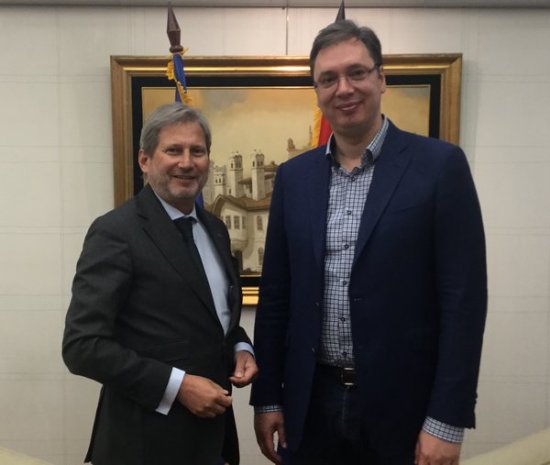 |
|
|
| EPP Conference on Western Balkans, Brussels, 4 May 2016 |
|
European People’s Party (EPP) Group Conference on Western Balkans “Western Balkans: Towards European Future” was held in European Parliament in Brussels, on 4th May 2016.
Conference, opened by EPP President Joseph Daul, Chairman of the European Parliament Committee on Foreign Affairs Elmar Brok, Chairman of the Konrad-Adenauer Stiftung Hans-Gert Poettering, Chairman of the Wilfried Martens Centre for European Studies Mikulas Dzurinda, was divided into two panels dedicated to the good governance and EU-Western Balkans cooperation in facing migration crisis and relevant security issues. Conference participants from the region and members of the European Parliament, exchanged views on current topics related to the accession of Western Balkans to the EU. Representatives of the EPP Group expressed their commitment to assist its partners in the reform process and to support their aspirations for EU membership.
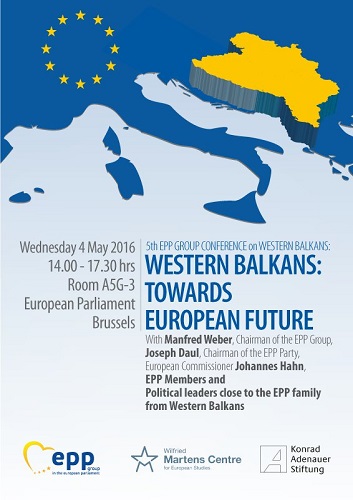 |
|
|
| Working meeting between the Head of the Mission of the Republic of Serbia to the EU ambassador Dusko Lopandić and director of the Representation of the North Rhine Westphalia Rainer Steffens |
|
During the meeting between the Head of Mission of the Republic of Serbia to the EU, Ambassador Dusko Lopandić and director of the Representation of North Rhine Westphalia (NRW) to the EU Rainer Stephens, opinions were exchanged on the current political and economic situation in Europe, process of the European integration of the Republic of Serbia, migrant and refugee crisis and the role of NRW Representation in relations with the EU institutions in Brussels.
Ambassador informed his interlocutor about the results of recent elections in Serbia, the process of European integration of the Republic of Serbia and the support that Germany has provided in this process, with special emphasis on the stability in the region in light of the migrant and refugee crisis. Steffens reiterated readiness to provide necessary assistance in order to solve current situation, and stressed that in the SR Westphalia at this moment provided shelter for around six hundred thousand migrants and refugees, which means that the Lander took the biggest share of burden in the acceptance of migrants.
The counterparts underlined that, at the moment, work has been done on several joint initiatives that will lead to the strengthening of economic cooperation and trade and increased investments from Germany to Serbia, with the intensification of the existing cooperation between universities and the cities of Dortmund and Novi Sad.
It has been agreed to establish communication and exchange of information in the field of the interior affairs and the movement of migrants and willingness to organize joint events in the field of investment, regional cooperation and exchange of best practices experiences.
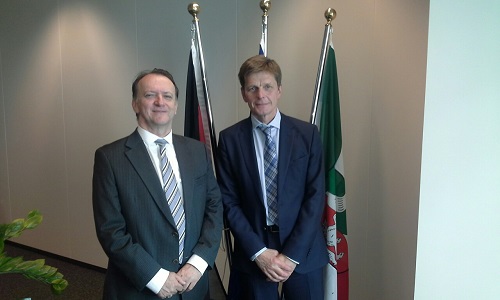 |
|
|
| Third meeting of the Stabilisation and Association Committee |
|
The Stabilisation and Association Committee (SA Committee) held in Brussels on 12 April 2016 its third meeting following the entry into force of the Stabilisation and Association Agreement (SAA) between the EU and Serbia on 1 September 2013. Representatives of the Republic of Serbia and of the European Commission reviewed the implementation of the Copenhagen EU accession criteria and the implementation of the SAA.
The meeting was co-chaired by Ms Catherine Wendt, acting Director at Directorate General for Neighbourhood and Enlargement Negotiations of the European Commission and by Ms Ksenija Milenkovic, Director of the Serbian European Integration Office (SEIO).
Joint Press Release оf European Commission and Serbian European Integration Office can be found here.
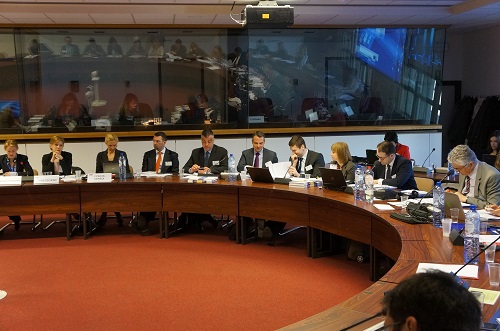
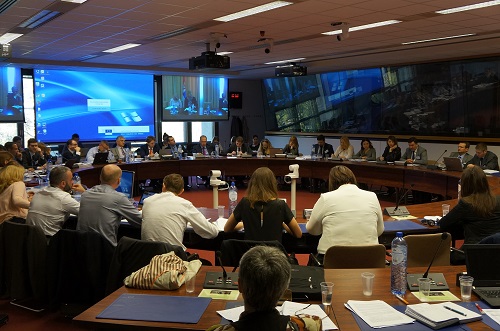 |
|
|
| Meeting of Ambassador Duško Lopandić with President of the European Economic and Social Committee (EESC) Georges Dassis |
|
Ambassador Duško Lopandić met with President of the European Economic and Social Committee (EESC) Georges Dassis on March 11, 2016. It was noted during the meeting that Serbia has established a good cooperation with the EESC, through the Joint Consultative Committee. The EESC welcomed the more intense involvement of civil society in the negotiation process of Serbia with the EU. During the conversation, they discussed current issues that burden the region, such as the crisis with migrants, a large percentage of unemployed, especially among the young population, and in this regard for a long time present problem of the "brain drain".
The meeting was held in a friendly atmosphere, with expressed interesse from both sides for inhenced cooperation in the coming period.
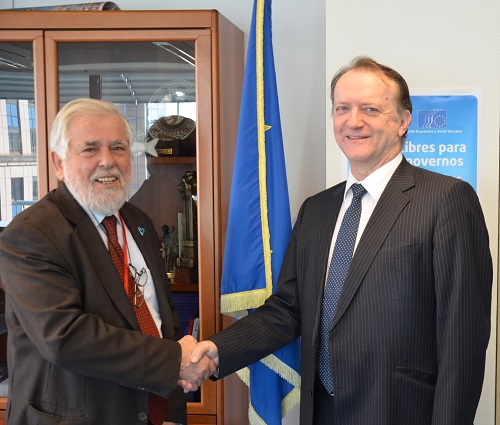 |
|
|
| Sub-Committee on Agriculture and Fisheries |
|
Sub-Committee on Agriculture and Fisheries was held on March 4th in Brussels. Co-chairman from the Serbian side was Mr Danilo Golubovic, State-Secretary of the Ministry of Agriculture and Environmental Protection while the co-chairman from the EC side was Mr. Christos Makridis, Deputy Head of Unit for Serbia in DG NEAR. Discussion was focused on progress made after the last Sub-Committee meeting which was held in June 2015 in Belgrade.
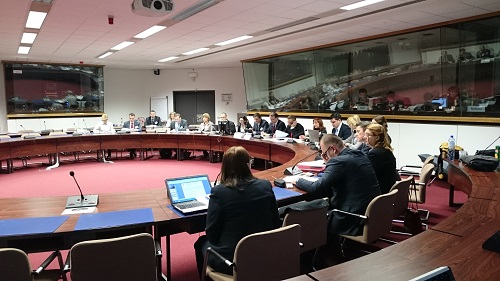 |
|
|
| EU-Serbia SAA sub-committee for transport, energy, environment, climate change and regional development |
|
EU-Serbia SAA sub-committee for transport, energy, environment, climate change and regional development was held in Brussells 2-3 Mrach 2016. The meeting was co-chaired by Dejan Trifunovic, State Secretary in the Ministry of Construction, Transport and Infrastructure of the Republic of Serbia and Christos Makridis, Deputy Head of Serbia Desk, European Commission Directorate General for Neighbourhood Policy and Enlargement (DG NEAR). The meeting was attended by the representatives of numerous institutions of the Republic of Serbia, as well as line directorates of the European Commission. Relevant information regarding harmonization of Serbian legislation with the EU acquis and overview of all relevant activities thereof were presented at the meeting.
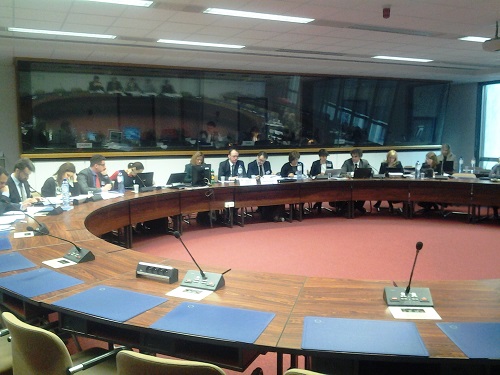 |
|
|
| President of the European Council Donald Tusk visited Belgrade on 4 March |
|
Prime Minister Aleksandar Vucic met on 4 March 2016 in Belgrade with President of the European Council Donald Tusk to discuss the migrant crisis and possible solutions to this problem.
During the meeting, the officials pointed out that changes in the current European policy towards migrants can be expected. The Prime Minister reiterated that Serbia will respect comprehensive and unique conclusions, should they occur, at the Summit of the European Union.
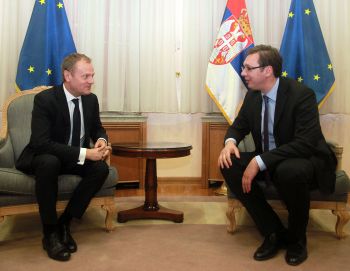
|
|
|
| Meeting on the occasion of the study visit of the delegation of Serbian National Defence University, in Brussels, February 29th, 2016 |
|

On the occasion of study visit of the 5th Class of the Advanced Security and Defense Studies Course (ASDSC) of the Serbian National Defense University who is currently visiting EU/NATO institutions in Brussels, a meeting with Ambassadors D. Lopandić, Head of the Mission of Serbia to the EU, V. Arsić, Ambassador of Serbia to the Belgium and Luxembourg and Ambassador M. Udovicki, Head of the Mission of Serbia to the NATO was organized. Ambassadors gave a lecture on the issue of EU/NATO - Serbia relations, as well as the bilateral relation between the Republic of Serbia and the Kingdom of Belgium. |
|
|
| Conference in the European Parliament „The Refugee Crisis in the EU – Voices from the Balkans“ |
|
Conference „The Refugee Crisis in the EU – Voices from the Balkans“, organised by Group of the Progressive Alliance of Socialists & Democrats, was held in the European Parliament on 1 March 2016. The main topic of the discussion was the ongoing migration crisis and its impact on Balkan countries, as well as possible solutions and European response to the crisis. Among the speakers who took the floor during the discussion were Ambassador Dusko Lopandic, Ambassador of Bulgaria to the EU Dimitar Tyanchev, Ambassador of Croatia to the EU Mato Skrabalo, Ambassador of Macedonia to the EU Andrej Lepavcov and many others from universities and socio-political institutes from Balkan countries, including Serbian expert for migration issues Vladimir Grecic. In his speech, Ambassador Lopandic underlined the need for a common European solution and he stressed out that Serbia is ready to contribute and be a part of that solution.
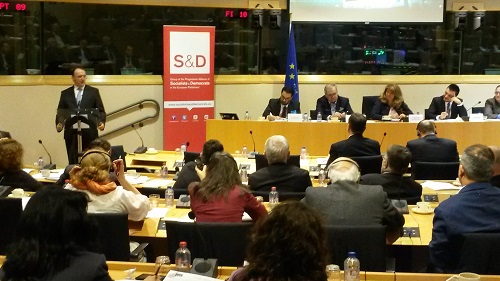 |
|
|
| Working breakfast of countries at Western Balkan migrant route |
|
A working breakfast of countries at Western Balkan migrant route was held on the margins of Justice and Home Affairs Council on 25 February in Brussels. Our delegation was led by Minister for Labour, Employment, Veteran and Social Affairs of the Republic of Serbia and Chairman of the Working Group for solving the problem of mixed migration flows Aleksandar Vulin.
After the meeting, Minister Vulin said that Serbia would not take any unilateral measures and that we would act as other countries do. He added that migration crisis could not be solved by one country alone and stressed out that we received assurances that the EU-Turkey Summit on 3 March 2016 would lead closer to the solution.
|
|
|
| Book of Condolences for two staff members of the Embassy of the Republic of Serbia in Libya |
|
On the occasion of tragic deaths of Sladjana Stankovic and Jovica Stepic, staff members of the Embassy of the Republic of Serbia in Libya, who lost their lives on 19 February 2016, a Book of Condolences will be opened at the Embassy of the Republic of Serbia in Belgium, Boulevard du Regent 53, 1000 Brussels, on Monday, 22 February 2016, from 14h00 to 16h00 and on Tuesday, 23 February 2016, from 10h00 to 16h00. |
|
|
| President Nikolic attended a working dinner on the migrant crisis |
|
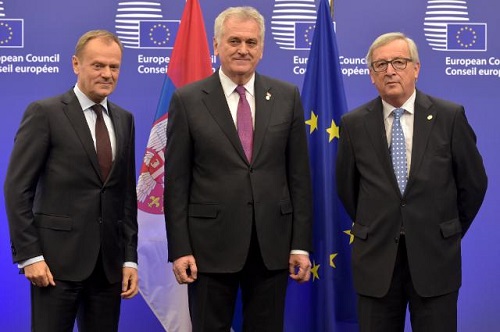
At the invitation of European Council President Donald Tusk, Serbian President Tomislav Nikolic attended a working dinner on the issue of migrant crisis on Wednesday, 17 February 2016 in Brussels.
The working dinner was also attended by European Commission President Jean-Claude Juncker, Macedonian President Gjorge Ivanov, Slovenian Prime Minister Miro Cerar, Croatian Prime Minister Tihomir Oreskovic, High Representative/Vice-President Federica Mogherini, Commissioner Johannes Hahn and Minister of Foreign Affairs of Netherlands Bert Koenders.
After the dinner, Serbian President Tomislav Nikolic said that the solution is neither in Belgrade nor in Zagreb, but in Brussels. He said that Serbia is prepared for any decision and that he believes that EU member states will refrain from unilateral moves.
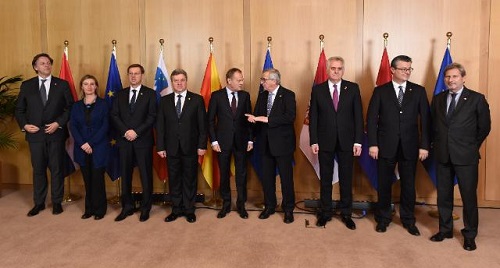 |
|
|
| Reception on the occasion of the Statehood Day – Sretenje, 15 February 2016 |
|
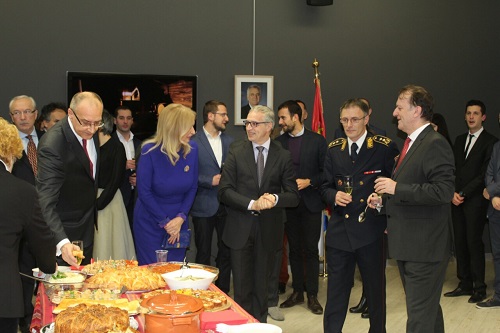
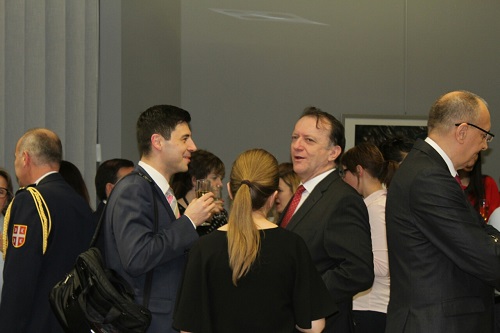
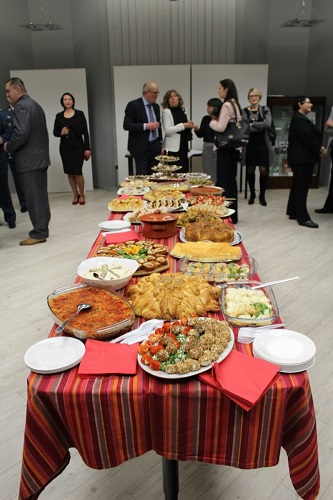 |
|
|
| Minister Dacic attended Informal Meeting of EU Foreign Ministers in Amsterdam |
|
First Deputy Prime Minister and Minister of Foreign Affairs of the Republic of Serbia Ivica Dacic attended on 05 and 06 February 2016 the Informal Meeting of EU Foreign Ministers (GYMNICH) in Amsterdam, which was devoted to the issue of migrants. A working breakfast for the countries of Western Balkan migratory route was organised on the sidelines of the meeting.
Speech of Minister Dacic can be found here.
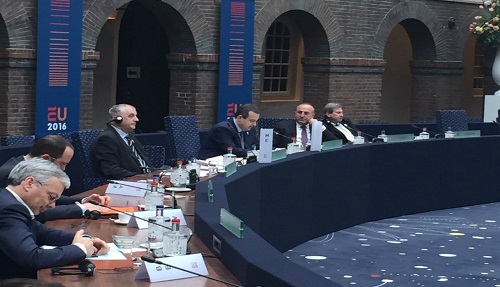 |
|
|
| Minister Joksimovic at European Parliament in Strasbourg |
|
Minister without portfolio responsible for European integration Jadranka Joksimovic attended the final discussion and the adoption of the European Parliament Resolution on the Progress Report on Serbia for 2015 during European Parliament plenary session in Strasbourg on 03 and 04 February 2016. After the adoption of the resolution, Minister Joksimovic stated that the abovementioned document presents a clear indicator that Serbia’s overall progress and a stable and continuous European path have been recognised. She also said that this document is an encouragement for Serbia on its European path and noted that although it is not of binding character, this act is very important because it can influence the public opinion.
While in Strasbourg, Minister Joksimovic had separate meetings with Minister of Foreign Affairs of the Netherlands Bert Koenders, European Commissioner for Neighbourhood and Enlargement Negotiations Johannes Hahn, European Parliament Rapporteur for Serbia David McAllister, Vice-Chair of informal group “Friends of Serbia” in European Parliament Franc Bogovič, as well as with numerous other members of the European Parliament.
Please find the link below for the European Parliament Resolution on the Progress Report on Serbia for 2015. |
|
|
| Second meetingof EU-Serbia Civil Society Joint Consultative Committee (JCC) |
|
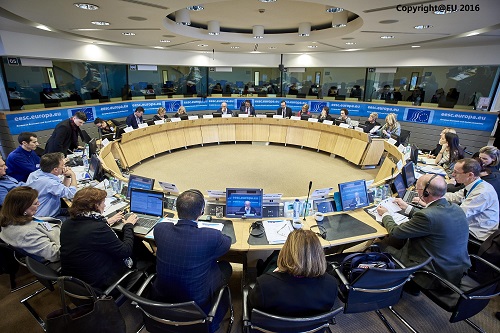
Second meeting of EU-Serbia Civil Society Joint Consultative Committee (JCC) was held on 4 February 2016 in European Economic and Social Committee in Brussels.
The meeting was dedicated to the current state of play in EU-Serbia relations and the accession process. The emphasis of the meeting was on Chapters 23 and 24, particularly on the rule of law and the fight against corruption. Members of JCC adopted a Joint Declaration at the end of the meeting.
EU-Serbia Civil Society Joint Consultative Committee has been instituted pursuant to Stabilisation and Association Agreement between Serbia and EU. It allows civil society organisations on both sides to monitor Serbia’s accession negotiations. The members of Civil Society Joint Consultative Committee represent trade unions, associations of employers and other interest groups from Serbia and EU.
|
|
|
| EU-Serbia Stabilization and Association Agreement: Sub-Committee on Trade, Industry, Customs and Taxation |
|
The Sub-Committee on Trade, Industry, Customs and Taxation was held in Brussels on 4 February 2016. On behalf of the European Commission the meeting was attended by the representatives of DG for Neighborhood and Enlargement Negotiations (DG NEAR), DG TRADE, DG for Taxation and Customs Union (DG TAXUD) and DG for Internal Market, Industry, Entrepreneurship and SMEs (DG GROW). On behalf of the Republic of Serbia, the meeting was attended by the representatives of the Negotiating Team for Accession of the Republic of Serbia to the European Union, Ministry of Trade, Tourism and Telecommunications, Ministry of Finance, Ministry of Economy, Ministry of Health, Customs Administration, Chamber of Commerce of Serbia and EU Integration Office. The meeting was co-chaired by Christos Makridis, Deputy Head of Serbia Desk, DG NEAR and Stevan Nikčević, State Secretary in the Ministry of Trade, Tourism and Telecommunications. Issues related to trade, taxation, customs, SMEs, industry and free movement of goods were discussed on the meeting. |
|
|
| EU-Serbia Stabilization and Association Agreement: Third Sub-committee on Justice, Freedom and Security |
|
The third Sub-committee on Justice, Freedom and Security was held in Brussels on 1 and 2 February 2016. The state of play in Serbia and progress achieved in these areas in the previous period were thoroughly reviewed on this meeting. The meeting also provided an opportunity to review the implementation of Serbian action plans required for the opening of accession negotiations on the rule of law chapters, which were adopted in September 2015.
The latest legislative developments, results achieved and activities envisaged for the upcoming were reviewed in the following areas: fight against corruption, police cooperation and the fight against organized crime, post visa liberalization monitoring, migration management, asylum, visa policy, document security, trafficking of human beings, drugs, fight against terrorism, anti-money laundering, judicial cooperation in civil and criminal matters, judiciary and fundamental rights.
The meeting was co-chaired by Aleksandar Nikolic, State Secretary in the Ministry of Interior of the Republic of Serbia and Christos Makridis, Deputy Head of Serbia Desk, DG NEAR. The representatives of the Ministry of Justice, Ministry of Interior, Republic Public Prosecutor’s Office, Anti-Corruption Agency, Anti-Corruption Council, Deputy Ombudsman, Security Information Agency, Administration for the Prevention of Money Laundering, Office of the War crimes Prosecutor, Ministry of Public Administration and Local Self-Government, Ministry of Labour, Employment, Veterans and Social Issues, Ministry of Culture and Information, Office for Minority and Human Rights, members of High Judicial Council and High Prosecutorial Council, as well as Judicial Academy Director took the floor during the meeting.
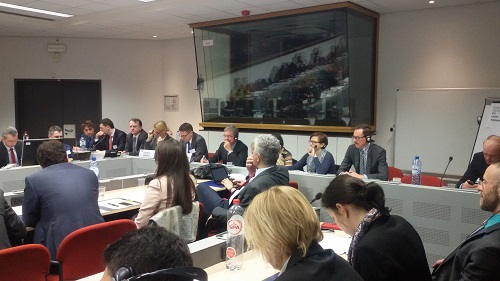
|
|
|
| Informal presentation of the Action Plan for Exercise of the Rights of National Minorities |
|
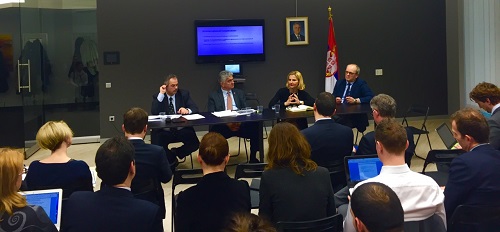
Informal presentation of the Action Plan for Exercise of the Rights of National Minorities was held on 3 February 2016 in Brussels. Presentation was given by Ms Tanja Miščević, Head of the Negotiating Team for Accession of the Republic of Serbia to the EU, Mr Čedomir Backović, Assistant Minister of Justice of the Republic of Serbia, Chair of the Negotiating Group for Chapter 23 and Professor Saša Gajin. This presentation was attended by representatives of member states and competent institutions of the EU.
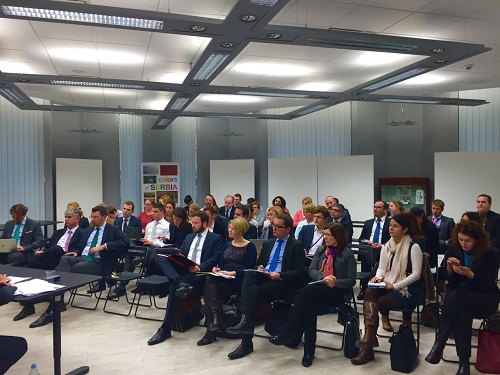 |
|
|
| Round of dialogue between Belgrade and Pristina |
|
A round of dialogue between Belgrade and Pristina was held in Brussels on 27 January 2016. In this meeting, which was mediated by EU HR for Foreign Policy Federica Mogherini, our delegation was headed by Prime Minister of Serbia Aleksandar Vucic. First Deputy Prime Minister and Minister of Foreign Affairs Ivica Dacic and Director of the Office for Kosovo and Metohija Marko Đurić also took part in the meeting.
The topics of the dialogue were the Community of Serbian municipalities, university diplomas, freedom of movement and the upcoming parliamentary elections in the entire territory of Serbia. A statement by the EU High Representative for Foreign Affairs and Security Policy says that progress has been made in the recognition of diplomas, as well as in the implementation of the agreement on freedom of movement, whereby both parties have agreed on starting talks on direct flights and rail connections. Mogherini underlined that the talks were held in a very good atmosphere and that they focused on the implementation of agreements reached in the dialogue.
Press statement of the EU High Representative for Foreign Affairs and Security Policy is available here.
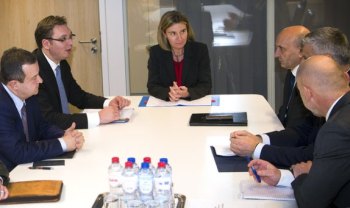 |
|
|
| Visit of Commissioner Stylianides to Serbia |
|
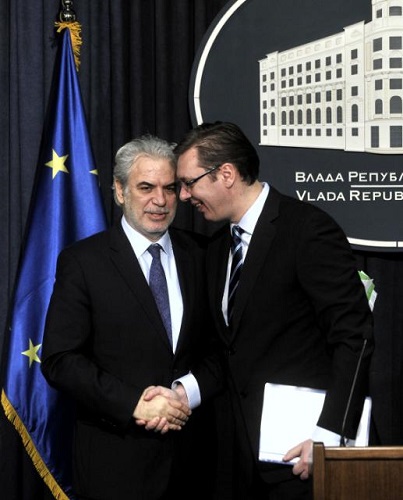
European Commissioner for Humanitarian Aid and Crisis Management Christos Stylianides visited Serbia on 15 January 2016, where he met with Prime Minister Aleksandar Vucic and Minister of Labour, Employment, Veteran and Social Affairs Aleksandar Vulin. He also visited recepetion center for migrants in Sid.
Prime Minister Aleksandar Vucic requested from the EU to establish a unique policy towards migrants which Serbia will follow and implement, as a loyal partner. Prime Minister thanked the European Commissioner for the significant assistance provided by the EU to Serbia during the refugee crisis and on the decision of the EU to open an office for humanitarian affairs in Belgrade. Vucic said Serbia will successfully implement every task it is assigned by the EU as a serious and responsible country while protecting the rights of migrants and human rights.
Stlylianides underlined that Serbia is a key partner of the EU and noted that during the refugee crisis, which is not only a European and national crisis, but global as well, Serbia has been doing a job that should be admired. Stlylianides stated that the EU will continue to support Serbia with regard to the refugee crisis, recalling that in December last year it allocated an additional €13 million for humanitarian aid.
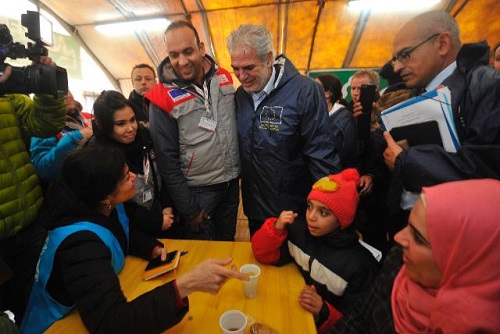 |
|
|
| Reception on the occasion of the start of the new year and celebration of holidays in the Mission of the Republic of Serbia to the EU |
|
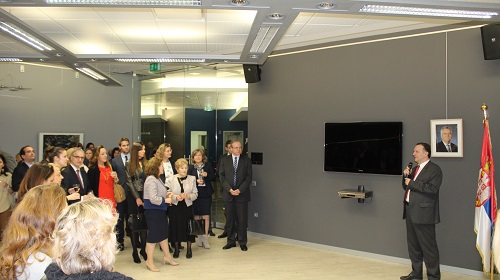
On the occasion of the start of the new year and the celebration of holidays, the Mission of the Republic of Serbia in the EU organized on 14 January an informal reception for representatives of institutions of the EU and representations of the member states of the EU.
Head of the Mission of Republic of Serbia to the EU, H.E. Ambassador Dusko Lopandic addressed the participants and congratulated them the New Year.
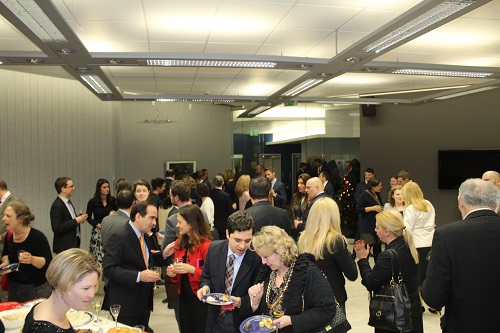 |
|
|
| President Nikolic met with President of the European Council and President of Macedonia |
|
President of the Republic of Serbia Tomislav Nikolic met on 16 December 2015 in Brussels with President of the European Council Donald Tusk and President of Macedonia Gjorge Ivanov, in order to discuss problems caused by the migrant crisis.
Meeting was also attended by Commisioner for European Neighbourhood Policy & Enlargement Negotiations Johannes Hahn and Frontex’s Executive Director Fabrice Leggeri.
President Nikolic said after the meeting that the EU had commended Serbia for its role in the migrant crisis, adding that our country would continue to act as before, no matter what kind and amount of support would be provided by the EU.
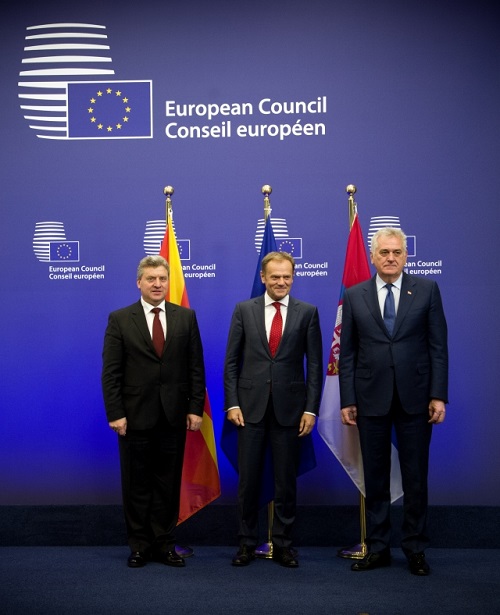 |
|
|
| First two chapters opened |
|
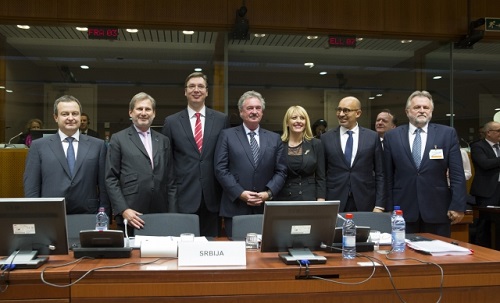
The second meeting of the Accession Conference with Serbia at Ministerial level was held on 14 December 2015 in Brussels to open negotiations on Chapter 32 – Financial control and Chapter 35 – Other business.
The European Union delegation was led by Jean Asselborn, Minister for Foreign and European Affairs of Luxembourg, on behalf of the Luxembourg Presidency of the Council of the European Union. The European Commission was represented by Johannes Hahn, Commissioner for European Neighbourhood policy and Enlargement negotiations. The Serbian delegation was led by Prime Minister Aleksandar Vucic and included First Deputy Prime Minister and Minister of Foreign Affairs Ivica Dacic, the Minister without portfolio responsible for European integration Jadranka Joksimovic, the Minister of Finance Dusan Vujovic, Head of the negotiating team for negotiations with EU Tanja Miscevic and Head of the Mission of Republic of Serbia to the EU Dusko Lopandic.
After the conference, Prime Minister Aleksandar Vucic said that it is a great day for Serbia and that our country now understands that it will be part of the European Union, but when it will happen depends on our hard work, diligence and energy. Vucic underlined that Serbia will be regulated to the highest democratic standards, with stronger institutions and announced a strong fight against corruption and crime through a more modern judiciary.
Press statement of the Council of the EU regarding Accession conference with Serbia is available here.
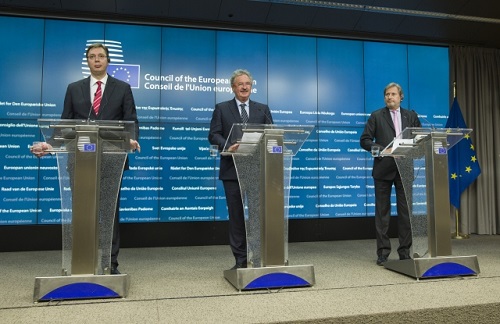 |
|
|
| Ambassador Lopandic participated in TV shows “Ici l’Europe” and “Talking Europe” |
|
Ambassador of Serbia to the EU Duško Lopandic took part in TV shows “Ici l’Europe” and “Talking Europe” dedicated to the migratory crisis - Western Balkan route which were broadcasted on France 24 on 5th of December 2015 in English, and 12th of December in French.
Guests of the TV shows were: Alojz Peterle, (Slovenian MEP, EPP), Monika Hohlmeier, German MEP, European People’s Party, Suela Janina, Albanian Ambassador to the EU.
Ambassador Lopandic said that Serbia has insisted on the unique approach in resolving this problem. He added that Serbia has applied international standards in this process, respected human rights of the migrants and provided them with temporary shelter bearing in mind that the majority of them wouldn’t like to stay longer in Serbia. He underlined that Serbia would not build the fence to the neighbors or undertake any uncoordinated steps.
Ambassador added that communication among the countries affected by the crisis is much better after the mechanism of regular communication and exchange of information has been established, following Leader’s meeting, which took place in Brussels on the initiative of the President of the European Commission Jean-Claude Junker and Chancellor of Germany Angela Merkel. He stressed that Serbia was ready to provide a shelter to certain number of refugees, but added that our accommodation capacity is limited.
Please find below links for participation of Ambassador Lopandic in mentioned TV shows:
http://www.france24.com/en/20151205-talking-europe-balkans-route-economic-migrants-refugees
http://www.france24.com/fr/20151212-route-balkans-europe-migrants-refugies-accueil-ue
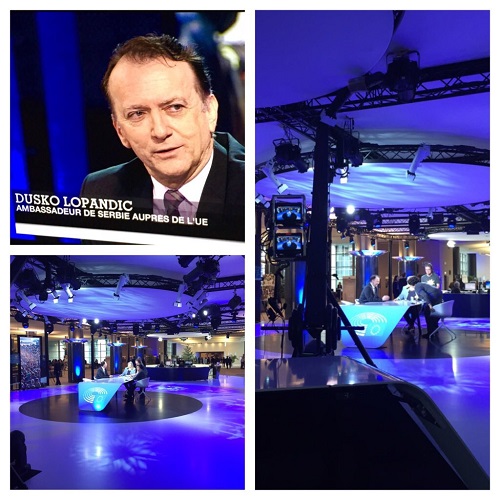 |
|
|
| The first Meeting of the Joint Consultative Committee (JCC) of Serbia and the European Committee of the Regions (CoR) |
|
The first inaugural meeting of the Joint Consultative Committee (JCC) of Serbia and the Committee of the Regions (CoR) was held in Brussels on 7 December 2015. At the very opening the meeting was addressed by Deputy Prime Minister of the Republic of Serbia and Minister of Public Administration and Local Self-government Ms Kori Udovički, CoR President Mr. Markku Markkula, as well as two co-chairmen of the JCC Serbia-CoR Mr. Dejan Jovanović and Mr. Dimitrios Kalogeropoulos. Within the first roundtable discussion on The role of local and regional authorities in Serbia's accession, keynote speakers were Acting Director, DG NEAR, and Head of Unit for Serbia Ms Catherine Wendt, Member of the European Parliament, Rapporteur on Serbia Mr. David McAllister and CoR Rapporteur for Enlargement strategy and main challenges 2015-2016 Ms Anna Magyar. In the second roundtable discussion on Western Balkans Migration Route - focus on Serbia participated members of the JCC Serbia-CoR.
All participants at the meeting agreed in their assessment that Serbia has done a lot in 2015 regarding the reform process in the country and welcomed the holding of the Second Intergovernmental Conference and the opening of the first chapters in the negotiations with the EU later this year. It was concluded that it is necessary to maintain the existing course, where the just started cooperation with the CoR is seen as added value to the whole process, especially at the level of local and regional authorities.
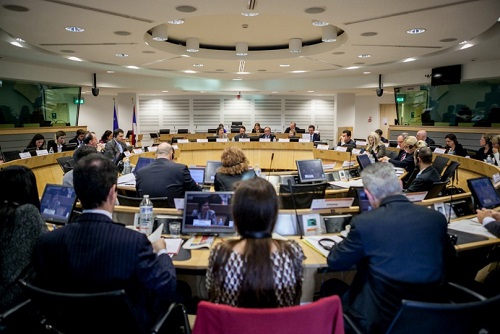 |
|
|
| Commissioner Hahn visits Serbia |
|
EU Commissioner for European Neighbourhood and Enlargement Negotiations Johannes Hahn is paying an official visit to Serbia, in order to mark the opening of the first chapters in EU accession talks with Serbia.
Johannes Hahn has meetings with Prime Minister Aleksandar Vucic, Speaker of the National Assembly of Serbia Maja Gojkovic, leaders of Parliamentary Committees, representatives of Serbian media and EU journalists visiting Serbia.
Hahn said that opening of the first chapters will be a deserved moment for celebration for Serbia, with economic recovery and rule of law as the focus in the future. He underlined that our common strategic goal is to bring the benefits of EU accession to all Serbian citizens.
Speech by Commissioner Hahn in the National Assembly of Serbia can be found here.
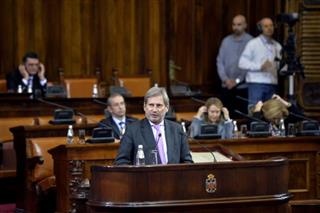 |
|
|
| Donald Tusk visited Belgrade |
|

President of the European Council Donald Tusk visited Belgrade on 21 November 2015, where he met with the Prime Minister of the Republic of Serbia Aleksandar Vucic.
After the meeting, Aleksandar Vucic said that Serbia knows its obligations in solving the migrant crisis and that it is trying to do its job in the best possible way. He also stressed that Serbia is willing to assume even greater responsibility than other countries in the Western Balkans and said that if Slovenia, Croatia and Hungary refuse to receive economic migrants, Serbia will not receive them either. This would mean that Serbia would take over complete burden on itself, he explained and added that our country is ready to help its neighbours, but is also waiting for a comprehensive solution of the issue of refugees at the EU level. Vucic underlined that Serbia cannot accept that one rule applies to our country, and the other rules apply for the rest.
Prime Minister told Tusk that he hopes that they will be able to celebrate the opening of the first chapter in the negotiations of Serbia on the road to EU membership soon and thanked him for the support to Serbia on its European path.
Donald Tusk explained that the reason for his visit to Belgrade is, first of all, the dramatic refugee crisis, and added that he brings with him a message that Brussels is a consistent friend of Serbia.
He said that Serbia can rely on the continued financial support of the EU in dealing with the refugee crisis and that he will call on EU leaders to support the Western Balkan region, which is on the front lines. European Council President announced that the Union will continue to assist Serbia, but that now all forces must be directed at improving security cooperation.
Tusk voiced the hope that the first chapters in Serbia's EU entry talks would be opened very soon, which would be an important step forward, and noted there was no alternative to the Western Balkans' future in the EU. EU appreciates what Serbian Prime Minister Aleksandar Vucic has done for Serbia's advancement along the EU path, he said, noting that there is no better, alternative future that the Union. |
|
|
| PANEL DISCUSSION “CONNECTING THE WESTERN BALKANS TO THE EU –WHAT NOW” |
|
Panel discussion “Connecting the Western Balkans to the EU –what now”, organized by the Chamber of Commerce and Industry of Serbia and the representatives of the EP was held at the European Parliament, on November 16, 2015. The improvement of transport infrastructure in the Western Balkans as a precondition for economic development in the region, connecting Western Balkan countries to the EU and acceleration of major infrastructure projects implementation was the main topic of the discussion. Andor Deli, member of EPP group of the European Parliament was the moderator of the discussion. Marko Čadež, president of the Chamber of Commerce and Industry of Serbia, Catherine Wendt, acting director of the Department for Western Balkans at the Directorate General for Neighborhood and Enlargement Negotiations of the European Commission, Andreja Kodrin, member of the Cabinet of the Commissioner for transport Violeta Bulc and Ksenija Milenković, acting director of the European Integration Office of the Republic of Serbia were among the speakers who took the floor during the discussion.
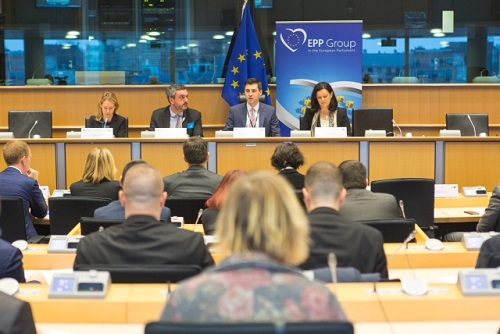 |
|
|
| Visit of members of the European Parliament |
|
Prime Minister of the Republic of Serbia Aleksandar Vučić met members of the European Parliament from the ranks of the European People's Party (EPP) Sandra Kalniete and Eduard Kukan in Belgrade on 19 November 2015. During a meeting, Prime Minister Aleksandar Vučić expressed gratitude on the support they offer to Serbia on its path to the EU and pointed out that Serbia remains fully committed to meeting its foreign policy priority, and that is a full membership in the EU.
He informed his interlocutors about the reforms implemented by the government of Serbia in order to improve the economy and society, all in accordance with the wish for Serbia to become an organised and successful country.
Vice Chairwoman of the EPP Group Sandra Kalniete said that she is very optimistic about Serbia’s progress and added that she and her colleagues are impressed by successful preparations for opening of the negotiation chapters.
Kalniete pointed to the important role of Serbia in the Berlin process, launched by German Chancellor Angela Merkel, with the aim of maintaining stability and progress of the Western Balkans.
She also praised the way in which Serbia is addressing the migrant crisis.
President of the Parliamentary Group for Serbia in the European Parliament Eduard Kukan commended the cooperation with Serbia and highlighted the role of Prime Minister Vučić and the Serbian government in maintaining regional stability, as well as its progress on the European path.
Speaking about the opening of the first negotiation chapters, Kukan underlined that Serbia must be given recognition for its achievements so far.
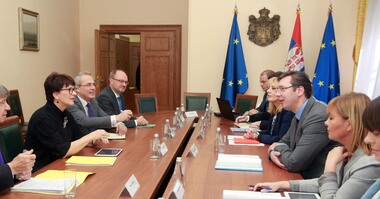 |
|
|
| Conference “Europe in crisis: A call for a new dialogue 1975-2015: 40 years Helsinki Final Act” |
|

First Deputy Prime Minister and Minister of Foreign Affairs Ivica Dačić, who is OSCE Chairperson-in-Office, attended the conference “Europe in crisis: A call for a new dialogue 1975-2015: 40 years Helsinki Final Act”, held in the European Parliament on 17 November 2015. With the participation of Gianni Pittella, president of the S&D group, Aleksey Pushkov, chairman of the Committee on International Affairs of Russian State Duma, Michael Roth, Minister of State for Europe of Germany, members of the European Parliament, national parliaments and other speakers from Russia, Georgia, Moldova, Council of Europe and think-tanks, the conference highlighted the need for a new dialogue promoting security, economic cooperation and human rights.
In his introductory statement, first Deputy Prime Minister and Minister Dačić pointed out that Serbia's OSCE Chairmanship has marked this important anniversary in July in Helsinki and that it is important that anniversary also take place in the European Parliament. He expressed his believe that this reflects the awareness of the pivotal role played by the Helsinki Final Act in lessening tensions between Eastern and Western blocs, the affirmation of the concept of collective security and in overcoming divisions in Europe.
Minister Dačić reminded that earlier this year a terrorist attack on Charlie Hebdo satirical magazine has happened and that only a few days ago, we witnessed another unprecedented terror attack on the streets of Paris. Minister Dačić reiterated the strong condemnation of this act of terrorism and to offer our condolences to the families of victims. He stressed that the shock we feel in the face of such terror and extreme violence strengthens our resolve not to let them endanger the fundamental principles of democracy and human rights on which the OSCE and our societies rest, which are guarantors of security and peace for all.
Whole speech of Minister Dačić at the opening of the conference can be found here: http://www.mfa.gov.rs/en/press-service/statements/14857-osce-cio-dacic-participates-at-conference-marking-40th-anniversary-of-the-helsinki-final-act
|
|
|
| Minister Vulin met with representatives of the European Commission |
|
Minister of Labour, Employment, Veteran and Social Affairs Aleksandar Vulin met with representatives of European Commission on 12th November 2015 in Brussels, in order to discuss EU aid for Serbia for tackling the migrant crisis.
After the meeting, Minister Vulin said that the EU has committed to increase the aid. He also said that the talks tabled interim reception centers for migrants in Serbia, adding that there will be a bigger number of smaller centers along the migrant route.
Vulin stressed that he has heard much praise about the manner in which Serbia treats migrants from the EC officials, who underlined that many EU member-states should follow Serbia's example.
|
|
|
| Debate on migration thorugh the Western Balkans in the European Parliament |
|
Debate on migration thorugh the Western Balkans was held in Foreign Affairs Committee of the European Parliament (AFET) on 10 November 2015. Key note speakers were Roksanda Ninčić, State Secretary of the Ministry of Foreign Affairs of the Republic of Serbia, Nikola Poposki, Minister of Foreign Affairs of Macedonia, Esen Altuğ, Deputy Director General for Migration, Asylum and Visa Issues in the Ministry of Foreign Affairs of Turkey, Volker Türk, UNHCR Assistant High Commissioner for Protection and Christian Leffler, Deputy Secretary-General of the European External Action Service.
State Secretary of the Ministry of Foreign Affairs Roksanda Ninčić stressed that despite serious challenges Serbia is facing with, its policy towards refugees is firmly based on human approach. She pointed out what has been done so far regarding registration of refugees and providing them shelter, food and medical help, as well as undertaken operational measures. Ninčič said that it has been evident that Serbia is and should be part of the solution and not part of the problem and stressed importance of solidarity in the region of Western Balkans and whole Europe.
Representatives of foreign affairs committees of National Parliament of Member States also participated in the debate.
 |
|
|
| Serbia and the European Union today signed an Agreement on the participation of Serbia in the EU Competitiveness of Enterprises and Small and Medium-sized Enterprises Programme - COSME |
|
Ambassador Dusko Lopandić and Elżbieta Bieńkowska, European Commissioner for the internal market, industry, entrepreneurship and SMEs on 10 November in Brussels signed an Agreement on the participation of Serbia in the EU Competitiveness of Enterprises and Small and Medium-sized Enterprises Programme - COSME. Agreement between the European Union and Serbia shall enter into force on 1 January 2016 and it confirms participation of our country in the Program until 2020. The Ministry of Economy will be responsible for the coordination and implementation. COSME will support projects for financing activities aimed at raising the competitiveness and the establishment and growth of SMEs in Serbia. The program will enable better promotion of entrepreneurship, facilitate access to finance and it will contribute to the internationalization of our SMEs. Serbian small and medium-sized enterprises will be able to compete under the same conditions with companies from the EU member states and other partner countries for the projects financed by COSME. This will enable our companies to prepare for the future membership in the EU and to already use various instruments offered by the EU programs.
COSME is running from 2014 to 2020 with a budget of €2.3bn.

|
|
|
| Vacancy Announcement, Director of the CEFTA Secretariat, Brussels, Belgium |
|
The Central European Free Trade Agreement (CEFTA 2006) is a modern and comprehensive regional free trade agreement, designed as an integral part of the pre-accession agenda. It provides a strong legal basis for policy formulation and implementation in key areas related to trade and investment. The successful implementation of the Agreement to date with full liberalisation of trade in goods has substantially contributed to the creation of a free trade area in South East Europe. The CEFTA Parties have agreed on an ambitious agenda to further contribute to economic growth.
The Secretariat of CEFTA 2006 was established in Brussels, Belgium, in September 2008 in accordance with the Article 40.2 of the Agreement. The overall role of the Secretariat is to provide technical and administrative support to the Joint Committee, Chair in Office and any body established by the Joint Committee.
A specially appointed Selection Committee is now seeking applications for the position of Director.
A detailed job description and application form are available at: http://www.cefta.int/vacancy
Eligible applicants include civil servants from national administrations and personnel from international organisations, the private sector and civil society. The successful candidate will be offered a competitive contract by the CEFTA Secretariat.
Interested candidates should send a letter and a completed application form (both in English) to: recruitment@cefta.int
The deadline for receipt of applications is midnight (CET), Friday, 27 November, 2015. Only short-listed candidates will be contacted for interview. |
|
|
| Leaders’ Meeting on refugee flows along the Western Balkans route |
|
Prime Minister of the Republic of Serbia Aleksandar Vucic attended Leaders' Meeting on 25 October in Brussels. European Commission President Jean-Claude Juncker called the Leaders’ Meeting to discuss the refugee flows along the Western Balkans route.
Leaders' Meeting was attended by the Heads of State or Government of Austria, Albania, Bulgaria, Croatia, the former Yugoslav Republic of Macedonia, Germany, Greece, Hungary, Romania, Serbia and Slovenia. The President of the European Council, the President of the European Parliament, the High Representative of the EU, the Luxembourg Presidency of the Council of the EU and the United Nations High Commissioner for Refugees also attended this Leaders' Meeting.
Leaders agreed to improve cooperation and step up consultation between the countries along the route and decided on pragmatic operational measures that can be urgently implemented in order to tackle the refugee crisis in the region.
The 17-point action plan, on which leaders agreed on, is available here.
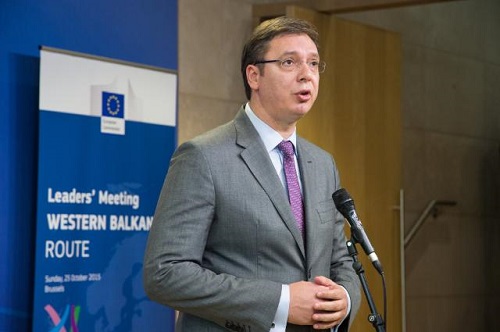
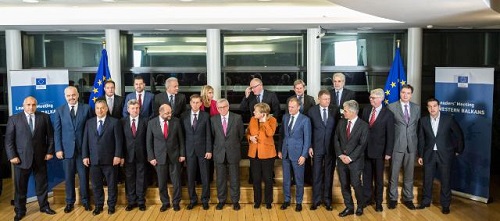 |
|
|
| Why Kosovo is ineligible for membership in UNESCO? |
|
• Because the request for its membership is a serious breach of the international law, the Constitution of UNESCO' The legally binding UN Security Council resolution 1244 (1999) and the Charter of the UN whose Article 25 says that "The Members of the UN agree to accept and carry out the decisions of the Security Council in accordance with the present Charter".
• Because according to the UN Security Council resolution 1244, which reaffirms the sovereignty and territorial integrity of the Federal Republic of Yugoslavia (now Serbia), Kosovo and Metohija is an integral part of the Republic of Serbia, under the administration oBf the UN. Since Kosovo cannot be considered a State, it does not fulfill the basic requirement for membership set out by the UNESCO Constitution.
• Because unilateral attempts such as this one seriously harm and disrupt the dialogue between Belgrade and Pristina, under the auspices of the European Union in which mutually acceptable solutions for many complex issues have been devised so far. The issue of the Serbian cultural heritage and the property of the Serbia Orthodox Church has not yet been discussed within the dialogue where it belongs.
• Because this is an unacceptable politicization of UNESCO which should not overtake the competences of the UN. Security Council as the highest authority for the preservation of the international peace and security. UNESCO should not serve as an instrument for the affirmation of an illegal and unilaterally declared independence of a part of the territory of one UN member state. The primary goal of UNESCO is to promote universal values of humanity through education, science and culture not to make political decisions with regard to the statehood.
• Because this would be a dangerous precedent, harmful for many states. This would open the door for other entities to follow the same path thus threatening territorial integrity and sovereignty of other member states.
• Because this issue is polarizing the membership of UNESCO.
• Because, besides not being a state, Pristina does not have moral credibility for membership. Anyone aspiring to UNESCO membership must prove not only in words but as well in deeds its commitment to the goals of the UNESCO Constitution, which certainly is incompatible with deliberate, systematic, vandal demolition of Serbian cultural and historic monuments with the aim to remove the traces of centuries-long existence of Serbs in this area as well as the impunity of the perpetrators of such barbaric acts unworthy of the 21st century. These acts are comparable only to the acts of destruction of cultural heritage by terrorist groups in the Middle East and elsewhere that the world is witnessing and UNESCO is strongly condemning.
• Because four Serbian orthodox monasteries are inscribed on the UNESCO List of World Heritage in danger although the armed conflict in Kosovo is over for many years now. In danger from whom?
• Because the inclusion of this item in the provisional agenda of the 197th session of the UNESCO Executive board raises serious concerns about the compliance with procedure and the respect of the established UNESCO rules. Just to mention that that even publishing of the document on the unacceptability of Kosovo's application for UNESCO membership from the standpoint of the international law, prepared by Serbian Delegation to UNESCO, as an official document, as we requested, was refused. And the only intention was the voice of Serbia also to be heard.
• Because we all would have to live with the negative consequences of such an irresponsible decision from the lesioning of the international law up to the fate of the Serbian cultural heritage in the province of Kosovo and Metohija which not only belongs to the Serbian people but also represents a part of the historical and civilizational heritage of modern Europe and the world. |
|
|
| OPENING OF THE SPECIAL PURPOSE ACCOUNT TO COLLECT DONATIONS AND TO ESTABLISH THE USE OF FUNDS OF DONATION FOR MIGRANTS |
|
Based on the Resolution of the Government of the Republic of Serbia, a special account is opened, dedicated to raising funds and identifying ways of using donations for migrants and the instructions were made to deposit funds.
Exchange dedicated multi-currency account opened at the National Bank of Serbia Ministry of Finance - Treasury evaporated - dedicated multi-currency account for payment of funds for the collection of donor and humanitarian assistance to migrants:
Payment instructions - EUR
SWIFT MESSAGE FIN 103
FIELD 32A: VALUDE DATE - AMOUNT
FIELD 56A /INTERMEDIARY/: DEUTDEFF
FIELD 57A / ACC. WITH BANK/ DE20500700100935930800 / NBSRRSBG
FIELD 59: (BENEFICIARY) RS35908504642019323074, MINISTARSTVO FINANSIJA UPRAVA ZA TREZOR
FIELD 70: DETAILS OF PAYMENT |
|
|
| CALL FOR HUMANITARIAN AID FOR REFUGEES IN THE REPUBLIC OF SERBIA |
|
The Republic of Serbia is facing emergency situation due to the increased flow of refugees and lack of capacities and resources to facilitate their temporary stay and accomodation. The humanitarian assistance is collected by the Red Cross of Serbia and the potential donors may obtain further information on the procedure for importing humanitarian aid and the humanitarian needs in the following documents:
1. The procedure of import of humanitarian aid
2. The required humanitarian assistance to refugees and migrants in the winter
The contact address of the Red Cross of Serbia is: indep@redcross.org.rs, phone +381 11 30 32 125 lok. 214, 215, 217.
Useful information can be obtained from the website of the Customs Administration – Ministry of Finance: http://www.upravacarina.rs/en/Pages/default.aspx. |
|
|
| Dacic and Stefanovic attended the Eastern Mediterranean and Western Balkan route conference |
|
First Deputy Prime Minister and Minister of Foreign Affairs Ivica Dacic and Minister of the Interior Nebojsa Stefanovic visited Luxembourg on 8 October 2015, where they attended a high-level conference dedicated to the Eastern Mediterranean and Western Balkan route.
The meeting was also be attended by foreign and interior ministers of EU member states, Schengen associated countries, Western Balkan countries, Turkey, Jordan and Lebanon. The conference focused on the important increase in the number of migrants coming from the Middle East through the Western Balkan route, with the aim to enhance engagement among all partners, increasing solidarity and ensuring an orderly management of refugee and migration flows. The high-level conference adopted a declaration, which you can find below:
http://data.consilium.europa.eu/doc/document/ST-12876-2015-INIT/en/pdf
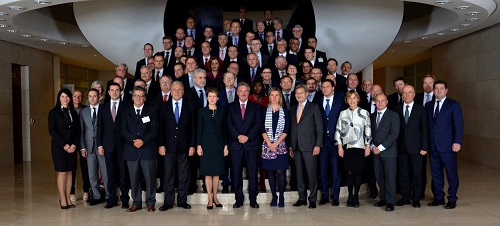 |
|
|
| Panel Discussion „Belgrade-Pristina-Brussels: stabilization through dialogue“ |
|
Panel Discussion „Belgrade-Priština-Brussels: stabilization through dialogue“ was organized by Konrad Adenauer Foundation in Brussels on 28 September 2015. Participants were Marko Đurić, Director of the Office for Kosovo and Metohija, Member of the European Parliament and Rapporteur on Serbia David McAllister, Minister of Dialogue from Priština Edita Tahiri and, as a moderator of discussion, head of Brussels’ office of German Institute for International and Security Affairs Dušan Reljić.
In the presence of the representatives of european institutions, diplomatic corps, academic community and media, panellists presented actual state of play in the process of the normalization of relations between Belgrade of Priština, in the light of four agreements signed on 25 August 2015 and further steps regarding their implementation. Special focus was on the issue of establishing of Community of Serbian Municipalities. Director Marko Đurić pointed out that, despite many differences existing with chief negotiator from Priština Edita Tahiri, he believes that Community of Serbian Municipalities will be formed as agreed and that authorities in Priština will issue a decree that would allow it.
Rapporteur on Serbia David McAllister stressed, among other issues, that it is of crucial importance implementation of everything that has been agreed, in order to open negotiating chapter 35 by the end of 2015.
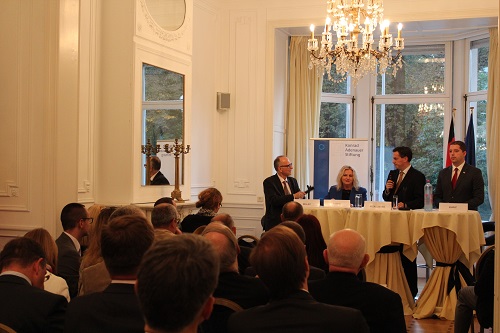 |
|
|
| Reception on the occasion of the visit of representatives of the Foreign Investors Council |
|
In honour of Foreign Investors Council visit to Brussels the Mission of the Republic of Serbia to the EU organised a reception on 24 September 2015. Reception was opened with the statements of Ambassador D.Lopandić, Head of the Mission of Serbia to the EU, V.Arsić, Ambassador of Serbia to the Belgium and Luxembourg and O.Fredheim, President of the Foreign Investors Council and CEO of Telenor in Serbia.
It was attended by several representatives of the EU Commission, members of the European Parliament, members of the Working Party on Enlargement and Countries Negotiating Accession to the EU (COELA) and various international and Belgian organizations and diplomatic missions.
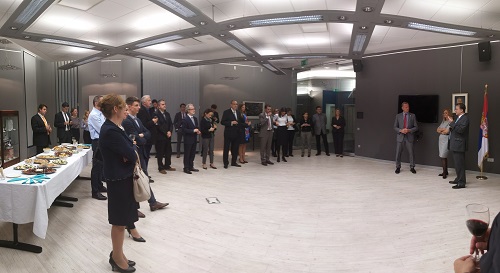 |
|
|
| Commissioner Hahn visited Serbia |
|
Commissioner for European Neighbourhood Policy and Enlargement Negotiations Johannes Hahn visited Belgrade on Friday, 25 September 2015, where he met with Prime Minister Aleksandar Vucic, Minister of Interior Nebojsa Stefanovic, Minister of Labour, Employment, Veterans and Social Affairs Aleksandar Vulin and Minister in charge of EU Integration Jadranka Joksimovic. During his stay in Serbia, Hahn also visited temporary reception centre for migrants “Principovac” near Sid.
Prime Minister Vucic said that the current migrant crisis was discussed during the talks with Commissioner Hahn, as well as Serbia's European path, asylum seekers who go to European countries and also obligations that Serbia took upon itself, relations in the region and economic and political circumstances.
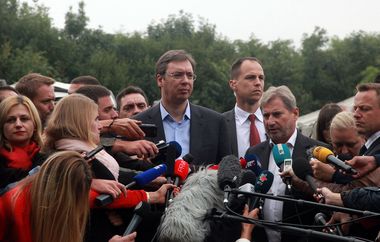
|
|
|
| AFET and DROI delegation visit to Belgrade |
|
Delegation of the Committee on Foreign Affairs (AFET) and the Subcommittee on Human and Minority Rights (DROI) of the European Parliament (EP), led by president of AFET Elmar Brok, met with Prime Minister of the Republic of Serbia in Belgrade on 24 September 2015.
In the meeting, that was also attended by Minister without portfolio responsible for European integration Jadranka Joksimovic, members of the European parliament praised Serbia's progress in the EU accession process, and expressed expectation that the first negotiating chapters will be opened by the end of the year.
They also highlighted the importance of the policy of regional stability led by Prime Minister Vučić and the government of Serbia.
Prime Minister Vučić explained that the decision of Croatia to ban the passage of freight traffic from Serbia, as well as the entry of our citizens on its territory, has nothing to do with solving the migrant crisis, but represents a breach of the Stabilisation and Association Agreement, which is why Serbia expects the EU to react on this matter.
He added that the Serbian government is ready to contribute even more to solving the migrant crisis and that Serbia, although not a member of the EU, has accepted the suggestion of EU officials.
Members of the European Parliament praised the way in which the authorities and the citizens of Serbia treat refugees and noted that even some EU Member States failed to act properly in the acceptance of refugees and their treatment.
They stated that the measures taken by Croatia unilaterally on the border with Serbia are unacceptable and that individual decisions do not lead to a solution of the migrant crisis.
Participants in the meeting confirmed Serbia's progress in implementing the policy of promoting the rights of national minorities and the situation of minority groups, as an important element of the rule of law.
They also noted that it is a very demanding field, even for EU Member States.
AFET and DROI members, apart from the meeting with Prime Minister Vučić, also have had meetings with the Speaker of the National Assembly Maja Gojković, First Deputy Prime Minister and Minister of Foreign Affairs Ivica Dačić, the Ombudsman Saša Janković, Members of Committees of Foreign Affairs, European Affairs, of Human Rights and Minority Rights, Commissioner on refugees and leaders of opposition.
 |
|
|
| Vucic sends letter to EU officials over suspension of traffic with Croatia |
|
Belgrade, 23 Sept 2015 – Prime Minister Aleksandar Vucic sent today a letter to President of the European Council Donald Tusk and President of the European Parliament Martin Schulz, following Croatia’s unilateral decision to close border crossings with Serbia.
The letter was also addressed to President of the European Commission Jean-Claude Juncker, European Commission Vice President and EU High Representative for Foreign Affairs and Security Policy Federica Mogherini and European Commissioner for Neighbourhood Policy and Enlargement Negotiations Johannes Han.
The government website brings the letter in full:
“I am writing to you in order to once again draw your attention to the situation in Western Balkans where our neighbouring country, the EU member state – the Republic of Croatia, closed border crossings for flow of goods from one candidate country – the Republic of Serbia. By aggressive and unacceptable measures, the Republic of Croatia has drastically affected our national and vital economical interests, but also strongly undermined regional relations and stability, bearing in mind the whole context of regional reconciliation process as well as opened and unsolved issues still existing in our bilateral relations.
Following my recent conversation with Prime Minister of the Republic of Croatia Zoran Milanovic, I would like to reconfirm Serbia’s readiness to maintain an open dialogue with all regional partners on potential solutions to migration crisis. Croatia’s unilateral decision to bar traffic cargo from Serbia has nothing to do with solving Europe’s migrants crisis, but with a breach of the SAA that directly hurts Serbia’s economic cooperation with the EU.
While the government of the Republic of Serbia is putting efforts, both human and financial, to open registration centers, borders for all economic activities including the transportation of goods are being unilaterally closed to us by one member state.
In the situation of migration crises worsening every day in the Western Balkan Route, where Serbia, as I am sure you know, reacted on most serious, human and responsible way based on European values, I am asking you to call the Republic of Croatia, as officially EU member state, to finally start acting as a real EU member state.
As you certainly know, Serbia hasn’t imposed any similar or comparable measures toward any neighbouring state, being either candidate or member state, obliged to respect Dublin III regulation, or as a candidate country to respect obligations stemming from visa liberalization arrangements. Quite to the contrary Serbia bared all costs of migration crises by its own without bilateral financial support or EU financial support. Entry costs per registration and food supply are €20,000 per day in last four months. Overall costs are much higher, and the operational expenses for only one reception centre are estimated to be half a million euro per month.
Unprecedented unilateral decision of the Republic of Croatia to close the border for cargo traffic is directly in breach of the SAA between the EU and the Republic of Serbia. Unilateral closure of the border is contrary to aims of the SAA defined in Article 1 of the SAA, especially to the proclaimed goal of contributing to political, economic and institutional stability in Serbia, as well as to the stabilization of the region. Opening of borders and building economic cooperation in the Western Balkans is the most tangible form of cooperation, usually far more developed than political relations in the Western Balkans. We would like to point out that economic cooperation is what drove the reconciliation process in the Western Europe after World War II. Building fences and closing borders negates the very fabric of reconciliation and of the process of European integration of the continent.
Apart from breaching aims of the SAA, by its unilateral decision the Republic of Croatia is breaking several other important articles of the SAA, notably Article 36 prescribing that no new charges having equivalent effect shall be introduced, in trade between the Community and Serbia. Closing the border represents the ultimate quantitative restriction.
Being aware that the SAA allows in Article 45 for prohibitions on imports, exports or goods in transit justified on grounds of public security, we must point out that it also prescribes that such prohibitions or restrictions shall not, however, constitute a means of arbitrary discrimination or a disguised restriction on trade between the Parties. We believe that closing of border for cargo traffic constitutes disproportional and discriminative restriction, which does not serve the control of migration. This puts Serbia additionally in a difficult position bearing in mind that two thirds of Serbian overall exports is made through this route. Signatories to the SAA are also bound by Article 129 stipulating Parties should consult each other before making decisions like these and that in the selection of measures, priority must be given to those which least disturb the functioning of this Agreement. Border closure without consultation with Serbia represents a very concerning foreign policy act.
Additionally, this unilateral action negates the entire Protocol 4 on transit and especially its Article 11 that was intended to allow free transit between parties
We would like to remind you that implementation of the SAA by the Republic of Serbia has so far been assessed as smooth by the European Commission and that Serbia has always consulted European Commission before making decisions concerning implementation of the SAA, behaving as an honest party to the SAA and a reliable partner to the EU.
Serbia has always been bound by its international commitments and signed agreements. We believe that one of the basic values of the European Union and European integration process is accountability and honouring commitments taken. This is the reason Serbia has applied for membership in the EU, sharing those values. Serbia is asking representatives of the highest institutions of the EU to remind Member States that practice of unilateral breach of the SAA is both unacceptable and constitutes flagrant breach of the SAA.
On the economic side, the Republic of Serbia has already suffered from extensive damages caused by flooding mounted to €1.7 billion back in 2014.
Aiming at fiscal consolidation, the government of the Republic of Serbia has undertaken very serious social measures, such as wage cuts in the public sector and the labour pension as well as well as public sector reforms with strong emphasis on reorganization and job cuts in public sector. The results of fiscal consolidation were commended both by the European Commission and the recent IMF mission during their successful audit of the financial arrangement that Serbia has with the Fund.
Further negative impact that may arise from non-economic barriers to entry and exercised by Croatia may not only increase economic pressure on Serbia but harm as well the overall efforts aimed at promoting regional economic outlook.
Latest announcement coming from the Republic of Croatia are certainly not contributing to predictability so essential for development of economic and good neighbourly relations.
Since the beginning of accession negotiations Serbia is devoted to improvement of bilateral relations with all neighbours, that hasn’t been welcomed by all neighbours. As a sincere partner of the EU and candidate country we do not wish to believe that the EU is going to allow to one of its member states to involve the whole EU into the breach of the SAA, and to damage economic relations between EU and Serbia.
Therefore I really hope that measures introduced against Serbia will be abolished as soon as possible, in order to avoid implementing equal measures.
Once again I would like to emphasize my personal readiness and devotion to resolve all issues with our neighbours in political dialogue without economic damage to any side, as I hope that we would be able to avoid any similar measures in future. At the same time as a future member of the EU we are looking forward to take part in the comprehensive European solution to migration crisis that is affecting us all,” the Prime Minister wrote.
|
|
|
| Minister Vulin visited Brussels |
|
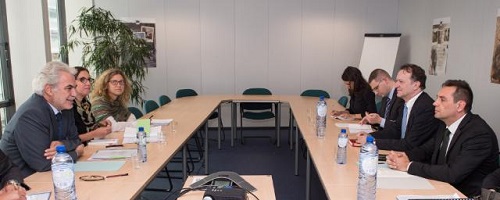
Minister of Labour, Employment and Social Affairs Aleksandar Vulin visited Brussels on 21 and 22 September 2015, where he met with Commissioner for Humanitarian Aid and Crisis Management Christos Stylianides, Commissioner for Migration, Home Affairs and Citizenship and Commissioner for Neighbourhood Policy and Enlargement Negotiations Johannes Hahn.
Vulin told reporters after talks that the attitude of Commissioners is that Serbia is an example of how to behave towards migrants. He pointed out that returning refugees to Serbia under readmission agreements is not a solution and that it is necessary for the EU to formulate a common policy. He expressed hope that the EU will find a comprehensive solution under which all countries that are affected by the migrant crisis will act by the same rules, stressing out that Serbia wants to be a part of that solution. He said that the fact that Serbia registered around 140,000 migrants since the beginning of the crisis is crucial for future talks with Brussels, primarily for security reasons. Minister underlined that Croatia did not do anything to prepare for migration flows, regardless of the fact they knew they would soon also be affected by this problem.
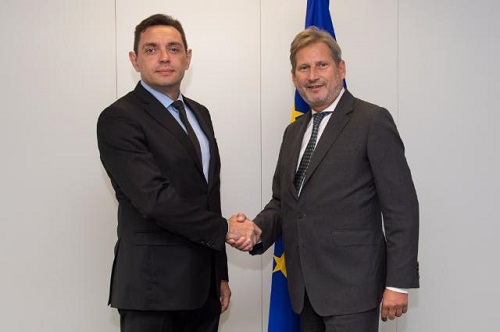
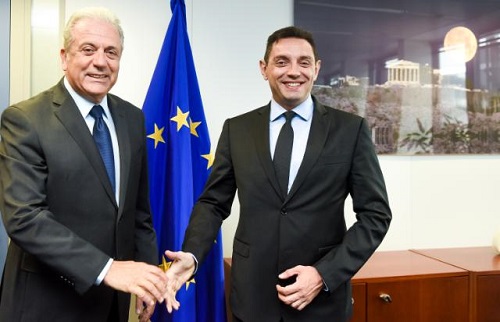 |
|
|
| MEP Knut Fleckenstein met Prime Minister Vučić and MFA Dačić |
|

Prime Minister Aleksandar Vucic met in Belgrade on 19 September 2015 member of the European Parliament and President of the Managing Board of the German humanitarian organisation Workers' Samaritan Federation Knut Fleckenstein. During the meeting, that was mainly dedicated to the current situation of refugees, Prime Minister underlined that the Serbian government is taking all measures to enable the registration of refugees and their accommodation.
President of the Serbian Government thanked Fleckenstein for the assistance that experts and volunteers of the Workers' Samaritan Federation provide to the Serbian competent authorities in the care for refugees, especially in Subotica and Kanjiza.
Fleckenstein welcomed the responsibility and good organisation with which Serbia handles the migrant crisis in its territory, stating that Serbia has thus become an example of respect for European values. He announced that the Workers' Samaritan Federation, which has around 1.2 million members in Germany, will soon send financial aid to Serbia for the accommodation of migrants.
The Prime Minister expressed gratitude to Fleckenstein, who is also Vice President of the Progressive Alliance of Socialists and Democrats in the European Parliament, for the support of that political group to the European path of Serbia.
Knut Fleckenstein met one day earlier, on 18 September 2015, First Deputy Prime Minister and Minister of Foreign Affairs of the Republic of Serbia Ivica Dačić with whom he also talked about current situation of refugees in the region, as well as process of European integration and reform process in Serbia.
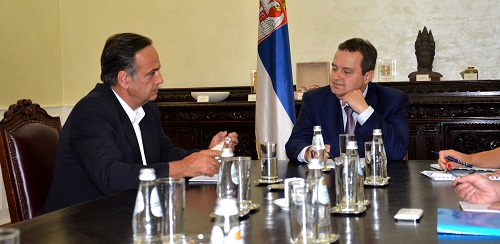 |
|
|
| Minister Joksimović met informal group “Friends of Serbia” in EP |
|
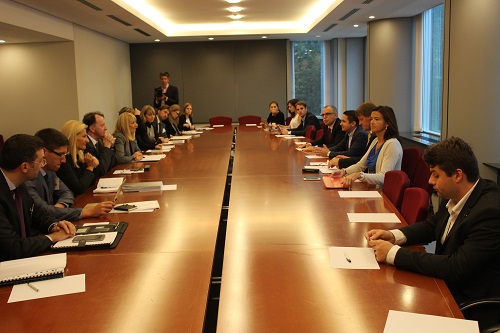
Minister without portfolio in charge of European integration Jadranka Joksimović met in Brussels on 16 September 2015 with the group “Friends of Serbia” in the European Parliament. Minister Joksimović gave members of the European Parliament first hand information on current state of play in Serbia's accession process and the perspective of opening of the first negotiating chapters by the end of this year. In an open and friendly discussion, minister Joksimović and European parliamentarians exchanged views on the other topics as well, having special focus on the role of Serbia in the current migrant crisis.
The meeting was chaired by MEPs and Chair and Vice-chair of "Friends of Serbia" Group, members of the European Parliament Emilian Pavel and Franc Bogovič. Present were chair of the European Parliament Delegation in Stabilisation and Association Parliamentary Committee EU-Serbia Eduard Kukan, as well as shadow rapporteurs for Serbia from different parliamentary groups and other MEPs.
Minister Joksimović on 16 September 2015 separately met member of the European Parliament Knut Fleckenstein, with whom she specially discussed problem of migrants. Knut Fleckenstein, after the meeting with minister Joksimović, announced his visit to Serbia on 18 and 19 September, as well as financial assistance for migrants in our country.
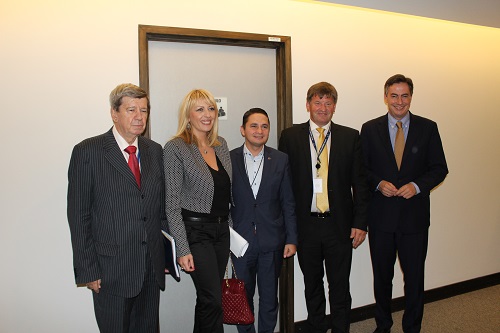 |
|
|
| MFA Dacic participated in Informal Meeting of the Foreign Affairs Ministers of the EU |
|
First Deputy Prime Minister and Minister of Foreign Affairs of the Republic of Serbia Ivica Dacic visited Luxemburg on 5 and 6 September 2015, where he participated in an Informal Meeting of the Foreign Ministers of the European Union. On the sidelines of the meeting, Minister Dacic had a series of bilateral meetings, among others with Ministers of Slovakia, Romania and Hungary.
This informal meeting was devoted to the issue of migrants. Minister Dacic used the opportunity to present the latest information that we have on number and status of migrants in Serbia. He also participated in the discussion about measures taken individually by countries, as well as measures proposed for the future period.
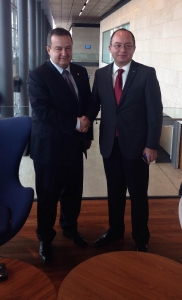 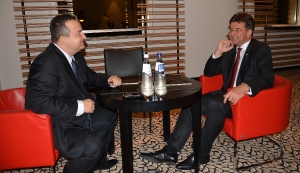 |
|
|
| Vienna Summit |
|
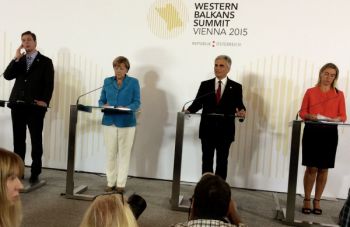
Prime Minister Aleksandar Vucic visited Vienna, where he attended the Civil Society Forum of the Western Balkans, while on 27 August he participated in the Summit of Leaders of the Western Balkans. In the Serbian delegation were also First Deputy Prime Minister and Minister of Foreign Affairs Ivica Dacic, Minister of Finance Dusan Vujovic and Minister of Mining and Energy Aleksandar Antic.
The opening of the Forum, which was attended by 200 representatives of civil society in the fields of culture, economy, media and politics, was preceded by Vucic’s meeting with EU Commissioner for Neighbourhood Policy and Enlargement Negotiations Johannes Hahn.
On the second day of the visit, the Prime Minister met with EBRD President Suma Chakrabarti, and attended a meeting dedicated to the building of the Nis-Pristina-Durres motorway, after which the formal opening of the Summit took place.
The Summit of Leaders of the Western Balkan was opened with keynote addresses by Chancellor of Austria Werner Faymann and Chancellor of Germany Angela Merkel. The main topics of this meeting were the economic situation and reform processes in the Western Balkans, youth and education, as well as energy and transport links.
The conference in Vienna was completed by the celebration of "10 years of the Energy Community" and the announcement of the next summit to be held in 2016 in France.
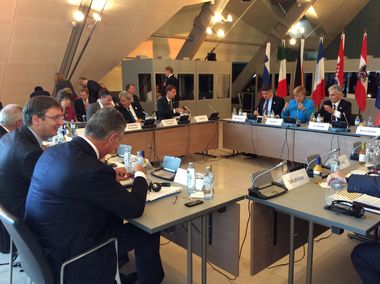 |
|
|
| New round of dialogue between Belgrade and Priština held in Brussels: four agreements signed |
|
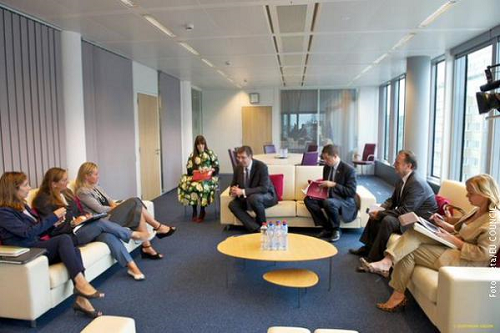
New round of dialogue between Belgrade and Priština was held in Brussels on 25 August 2015, at the end of which four agreements have been signed: on the Community of Serbian Municipalities, energy, telecommunications and freedom of movement on the bridge in Kosovska Mitrovica. Our delegation in the meeting, mediated by EU HR for Foreign Policy Federica Mogherini, was headed by Prime Minister of Serbia Aleksandar Vučić.
After the meeting, Prime Minister told media that now he has a message for our people in Kosovo-Metohija, that the agreements signed are good, since they guarantee not only the safety and security, but also that the jobs for Serbs in Kosovo-Metohija will be kept.
The Prime Minister underlined that the Community of Serbian Municipalities is being established and that it will have broad powers.
According to Prime Minister, the Community will have a president and vice president, assembly, council, coat of arms, flag, and will decide on health care, education, urban and rural planning and economic development. The Prime Minister stressed that it is extremely important that it will be possible to finance the Community of Serbian Municipalities from Serbia without taxes and duties, pointing out that it was unequivocally stated that Serbia has a right to that. I think we have done a great job for our people, and all agreements will be presented to the public, he announced and added that he will visit all ten municipalities in Kosovo-Metohija to present what has been achieved in Brussels.
Prime Minister explained that today's negotiations were held with representatives of the European Union and that the Serbian delegation met with the delegation from Pristina only at the end of the day.
The agreement on telecommunications was reached first and this is the first time since 1999 that Serbia has managed to legalise its position. According to Prime Minister, Serbs from Kosovo-Metohija will continue to dial only dialling numbers for cities in Serbia, such as 011, 018, 034, while citizens from central Serbia when calling Kosovska Mitrovica will dial only 028.With this agreement Telekom Srbija is recognised, while the Electric Power Industry of Serbia will have a daughter company in Kosovo-Metohija, the Prime Minister explained.
Speaking about energy, he pointed out that the Serbian side did not agree to attempts by Priština to appropriate the assets of Serbia, which belong to Serbia in line with the Constitution of the Republic of Serbia.It is precisely because of such aspirations of Priština that the negotiations on energy were the most difficult and some issues in this field have remained unresolved, Prime Minister noted and added that no agreement was reached on the distribution system operator, which is however specified in the agreement.
The Prime Minister stated that Serbia will do everything to implement the agreements signed, noting that the agreement reached in Brussels means a lot for entire Serbia since it leads to the opening of negotiating chapters with the EU. I think that we have achieved more and better than we expected. In any case I am not dissatisfied with what we have achieved and I will go to Kosovo-Metohija in September with joy, he reiterated and congratulated the Serbs from the province on the establishment of the Community of Serbian Municipalities.
READ the full text of the Association/Community of Serb majority municipalities in Kosovo - general principles/ main elements.
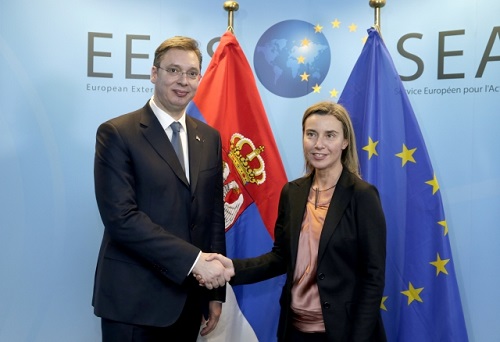
|
|
|
| European Parliament Rapporteur for Serbia David McAllister met with Prime Minister Aleksandar Vučić and First Deputy Prime Minister and Minister of Foreign Affairs Ivica Dačić, Belgrade, 20 July 2015 |
|
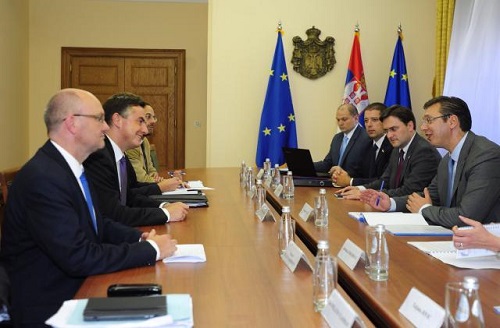
European Parliament Rapporteur for Serbia David McAllister met with Prime Minister of the Republic of Serbia Aleksandar Vučić in Belgrade on 20 July 2015. Two officials spoke about European integration of Serbia, regional stability, the possibility of holding a referendum in Republika Srpska and a meeting with members of the Presidency of Bosnia-Herzegovina, which will take place on 22 July 2015 in Belgrade.
During the meeting, Prime Minister Vučić and rapporteur McAllister also discussed the opening of the first negotiating chapters in accession talks with the EU, the problems concerning the formation of the Community of Serbian Municipalities in the talks with Priština, as well as solving the problem of migrants.
Prime Minister Vučić informed McAllister about economic reforms conducted by the government of Serbia and the first results of fiscal consolidation.
McAllister highlighted the importance of continuing the dialogue with Priština, and stressed that the stability of the region is important both for its economic progress and for the process of European integration of future members of the EU.
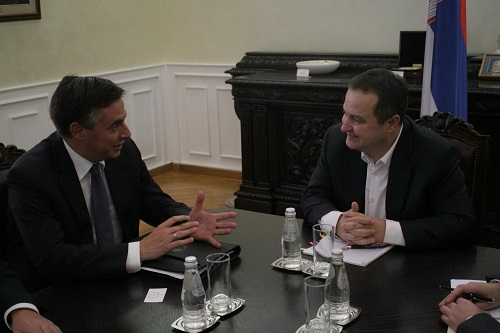
Rapporteur of the European Parliament for Serbia David McAllister also met with First Deputy Prime Minister and Minister of Foreign Affairs Ivica Dačić. Two officials spoke about the process of European integration, regional situation, cooperation with the European Parliament and other foreign affairs issues.
Minister Dačić thanked McAllister on his personal engagement in the acceleration and continuation of the European integration of Serbia, especially for the support for opening the first negotiating chapters and Serbia’s policy in the region. |
|
|
| Reception on the occasion of the opening of the Secretariat of the Danube Strategy Point in the Representation of the State of Baden Wurtembergh in Brussels, 15 July 2015 |
|
On the occasion of the beginning of work of the Secretariat of the Danube Strategy Point (DSP), in the Representation of the State of Baden Wurttembergh in Brussels, reception was held in 15 July. Key speakers on the event were Minister for European Affairs of the State of Baden Wurttembergh, Mr. P.Friedrich and Director General for Regional and Urban Policy in the European Commission Mr. W.Deffa.
Mission of Republic of Serbia to the European Union in the framework of activities on promotion of the EU Strategy for the Danube Region, presented at its promotional stand tourist, scientific, cultural and gastronomic potentials of the Danube in Serbia.
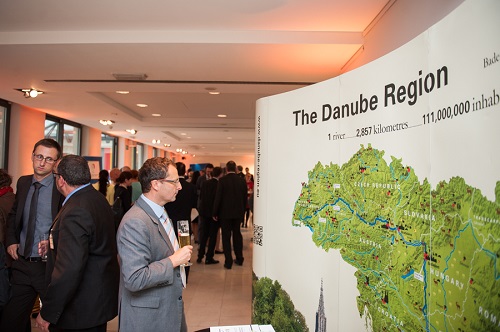
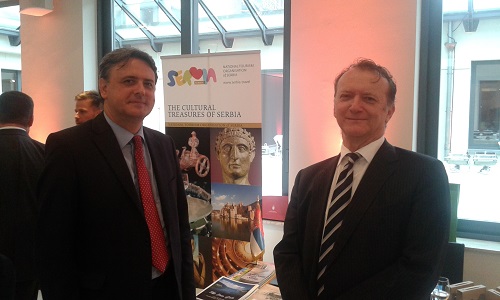 |
|
|
| President of the European Parliament Martin Schulz visited Serbia |
|
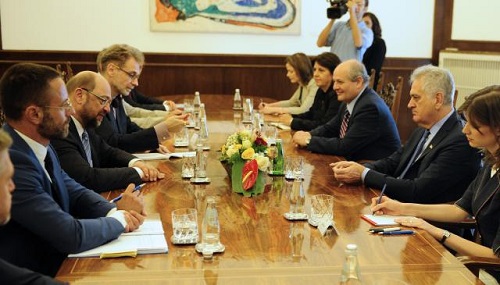
President of the European Parliament Martin Schulz visited Serbia on 14-15 July 2015. During his visit, president of the European Parliament met with President of the Republic of Serbia Tomislav Nikolić, Speaker of National Assembly Maja Gojković, Prime Minister Aleksandar Vučić, representatives of the Serbian civil society, as well as the opposition parties. President of the European Parliament also addressed to the Serbian National Assembly.
President Tomislav Nikolic said, in a meeting with President of the European Parliament Martin Schulz, that Serbia should be given clear impetus, as up to this point it has not been backed enough for all that it has done along the path toward full membership in the EU. The two officials discussed the recent developments in the region, with a special emphasis on the hostile act in Potocari on Saturday, when Serbian Prime Minister Aleksandar Vucic was attacked, and the issue of migrants that are trying to reach Western Europe, across Serbia.
In a meeting with Prime Minister of the Republic of Serbia Aleksandar Vučić, two officials discussed the european perspective of Serbia, as well as the issue of maintaining of regional political stability. Prime Minister Aleksandar Vucic stated after the meeting that President of the European Parliament Martin Schulz expressed a strong, clear and unequivocal support to Serbia's European path, and said that Serbia will continue the policy of peace and stability.
President of the European Parliament Schulz said that European Union is looking with expectations at the key role that Serbia can play in the region. He also stressed the importance of economic and infrastructure connections in the region, pointing out that stability and sustainable development are possible only with cooperation, and their importance is immeasurable both for the region and for the EU as a whole.
 |
|
|
| Ambassador Lopandic welcomed postgraduate students of the Faculty of Law |
|
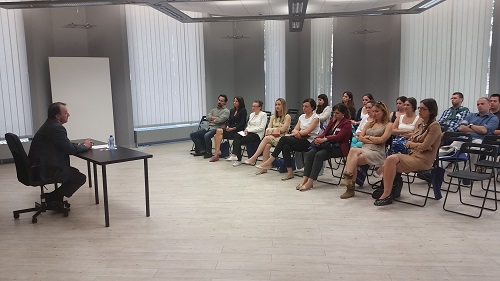
Ambassador Dusko Lopandic welcomed on 10 July 2015 postgraduate students of the Faculty of Law in Belgrade who are currently visiting Brussels. On that occasion, he gave a lecture on the issue of EU – Serbia relations. |
|
|
| Commissioner Navracsics visited Serbia |
|
Commissioner for Education, Culture, Youth and Sports Tibor Navracsics visited Serbia on 13 July 2015. During his visit, he met with First Deputy Prime Minister and Minister of Foreign Affairs Ivica Dacic, Minister without portfolio responsible for European Integration Jadranka Joksimovic, Minister of Culture and Information Ivan Tasovac, Minister of Education, Science and Technological Development Srdjan Verbic, Minister of Youth and Sports Vanja Udovicic and civil society representatives dealing with education, youth and culture in Serbia.
Commissioner Navracsics stressed that the European Commission is aware of the efforts made by Serbia in the field of regional cooperation, as well as on a wider scale, such as the promotion of European values.
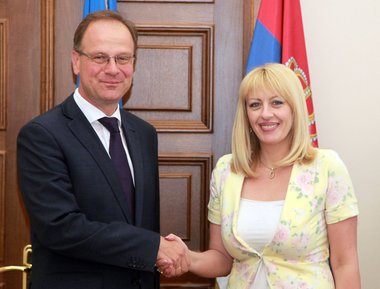 |
|
|
| European Commission supports European perspective of Serbia |
|
Prime Minister Aleksandar Vucic met on 09 July 2015 in Brussels with European Commission President Jean-Claude Juncker and talked about Serbia's European integration and the process of normalisation of relations between Belgrade and Pristina.
Prime Minister Vucic underlined that he and the President of the European Commission had a good and frank discussion. He said that he sent an invitation to Juncker to visit Serbia, which he accepted and announced a visit to Belgrade in October this year.
Juncker pointed out that joint efforts should be made for at least one chapter to be opened and so that pro-European forces in Serbia could feel that efforts on the European road give results. Serbia is a European country and the European Commission and member states for the EU support Serbia’s European perspective, he said and welcomed the economic reforms undertaken by the government of Serbia, offering greater support of the European Commission to reform of the state administration.
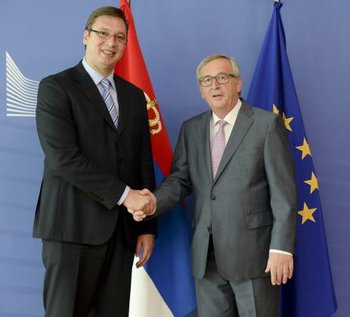 |
|
|
| Photo exhibition “Colours of Serbia” |
|
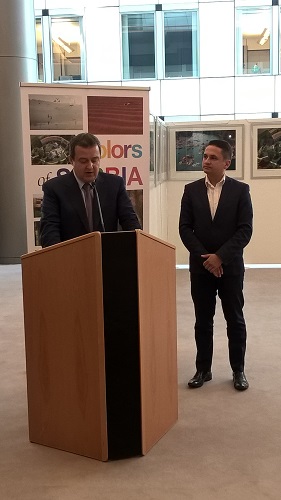
The roundtable discussions “Serbia on the path towards the EU Membership” was followed by a photo exhibition of Serbian artist Dragoljub Zamurović “Colours of Serbia”. The exhibition, featuring photos of Serbia’s natural beauty, was held in the exhibition space of European Parliament, from 29 June - 3 July 2015.
The roundtable discussion and photo exhibition also marked the official launch of “Friends of Serbia” Informal Group in the European Parliament.
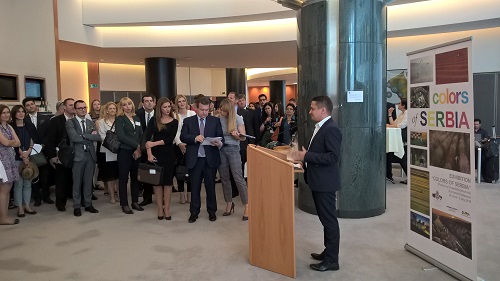 |
|
|
| “Friends of Serbia” in European Parliament |
|
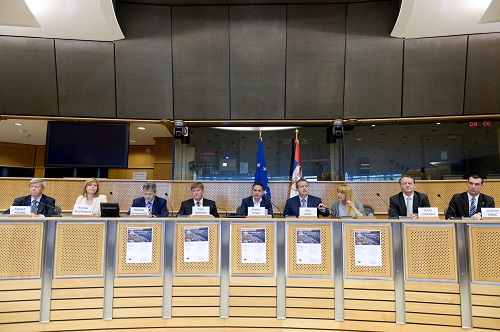
Roundtable discussion “Serbia on the path towards the EU Membership”, co-hosted by Emilian Pavel, MEP and President of the “Friends of Serbia” Informal Group and Ambassador Duško Lopandić, Head of the Mission of the Republic of Serbia to the EU, was held in the European Parliament on 30 June 2015.
The roundtable discussion was an opportunity for the exchange of views on the progress that Serbia has undergone on its European path as well as on the further steps. First Deputy Prime Minister and Minister of Foreign Affairs Ivica Dačić participated at the roundtable, together with Vice Speaker of the National Assembly Gordana Čomić, Co-Chair of the Joint Stabilization and Association Parliamentary Committee EU-Serbia Vladimir Orlić, Member of the European Integration Committee Vesna Marković, Acting Director of Serbian European Integration Office Ksenija Milenković and numerous members of the European Parliament from different political groups – Franz Bogovič, Victor Bostinaru, Eduard Kukan, David McAllister, Tanja Fajon, Knut Fleckenstein, Andor Deli and many others. European Commission was represented by Michael Karnitschnig, Head of Cabinet of the Commissioner for European Neighbourhood Policy & Enlargement Negotiations Johannes Hahn.
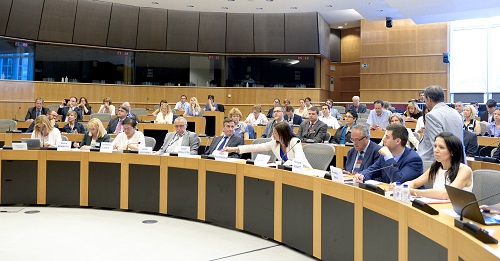
|
|
|
| New round of dialogue between Belgrade and Pristina |
|
New round of dialogue between Belgrade and Pristina was held in Brussels on 29 June 2015. In this meeting, which was mediated by EU HR for Foreign Policy Federica Mogherini, our delegation was headed by Prime Minister of Serbia Aleksandar Vucic. First Deputy Prime Minister and Minister of Foreign Affairs Ivica Dacic and Director of the Office for Kosovo and Metohija Marko Djuric also took part in the meeting. A new round of dialogue between Belgrade and Pristina ended without agreement after 17 hours of talks.
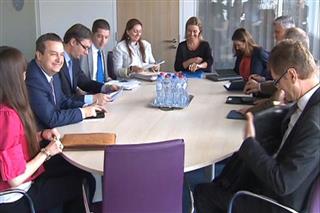 |
|
|
| Minister Jadranka Joksimovic visited Brussels |
|
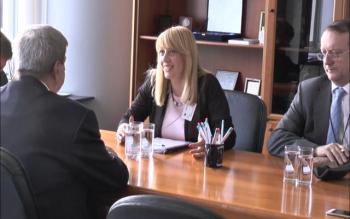
Serbian Minister without portfolio in charge for EU Integrations Jadranka Joksimovic met on 23rd and 24th July 2015 in Brussels with members of the European Parliament – Head of EP delegation to the EU-Serbia Stabilisation and Association Parliamentary Committee Eduard Kukan, European Parliament Rapporteur for Serbia David McAllister, president of the Group of Friendship with Serbia Emilian Pavel and shadow rapporteur for Serbia of the Progressive Alliance of Socialists and Democrats, Tanja Fajon .
Among various topics that Minister Joksimovic and MEPs discussed, main focus was on the Serbian European integration process and the problem of illegal migrants that are trying to reach Western Europe across Serbia. Reffering to the issue of European integration, Minister Joksimovic emphasised that Serbia has achieved visible progress in the reform process and European integration and deserves opening of the chapters in the EU accession negotiations by the end of the year. She pointed out that this would serve as an additional impetus for both – further reforms and the dynamics of the accession process.
Regarding the issue of illegal migrants, Minister Joksimovic and MEPs agreed that search for a solution to the problem calls for partnership relations and that the announcement of a fence that would be built on the borders does not in any way constitute a part of sustainable and European solution. Minister Joksimovic stressed that Serbia will not resort to similar measures and, as the EU candidate country, will respect European standards in this area.
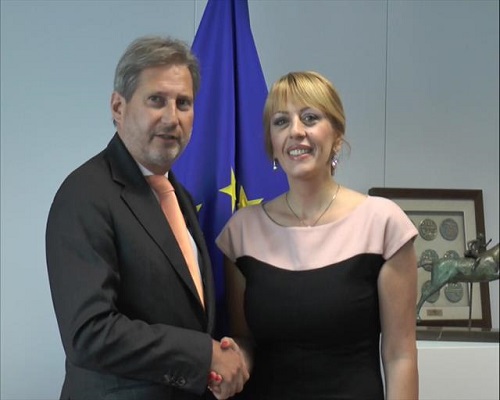
During her visit to Brussels, on 26th July 2015, Minister Joksimovic also met with Commissioner for European Neighborhood Policy and Enlargement Negotiations Johannes Hahn. Joksimovic and Hahn voiced the expectation that initial chapters in accession negotiations would be opened by the year's end.
Joksimovic outlined the belief that the issue of chapter opening would enter the procedure in September already, so that they could be opened in the coming months, and certainly before the end of the year.
When it comes to action plans for Chapters 23 and 24, Hahn said that excellent progress has been made, adding that much depends on progress in the dialogue on the normalization of relations between Belgrade and Pristina. He expects that enough progress will be made in the dialogue for member countries to give the go-ahead for the opening of chapters. |
|
|
| The Rountable discussion on the occasion of the International Danube Day in the Mission of Serbia to the EU, 26 June 2015 |
|
On the occasion of the International Danube Day, which is celebrating on 29 June each year in 14 countries of the Danube River Basin, Mission of Serbia to the EU organized the Roundtable discussion under title: „Importance of research and innovation in the context of the EU Strategy for the Danube Region (EUSDR)“. Head of the Mission of Republic of Serbia to the EU H.E. Ambassador Dusko Lopandic pointed out that cooperation in Danube region has a long tradition and great importance for broader process of economic and political integration of the all nations in Europe.
The Roundtable was attended by representatives of the DG for Regional and Urban Policy, European Commission, the Joint Research Centre, and the Secretariat of the Danube Strategic Points in Brussels, representatives of the European Parliament and the diplomatic corps of the Danube countries .
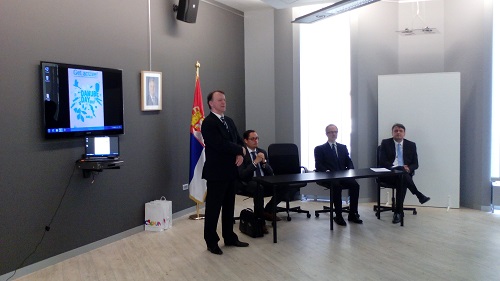
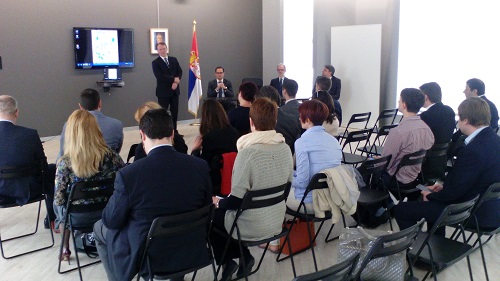 |
|
|
| Serbia on the path towards the EU Membership |
|
The roundtable discussion “Serbia on the path towards the EU Membership” will be held on Tuesday, 30 June from 12:45 to 14:15 in the European Parliament. The event will gather representatives of the Serbian Government, National Assembly and other institutions, as well as the Members of the European Parliament, for the exchange views on the progress that Serbia has undergone on its European path. The roundtable discussions will be followed by a photo exhibition of Serbian artist Dragoljub Zamurović “Colours of Serbia”, featuring photos of Serbia’s natural beauty.
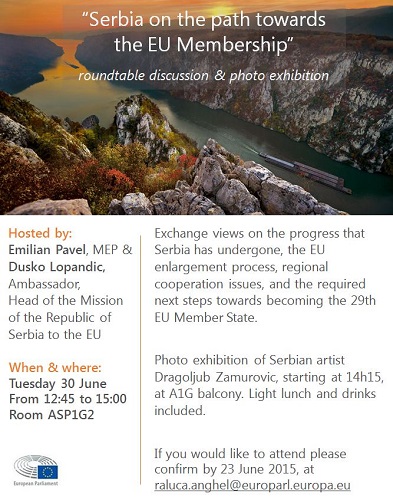 |
|
|
| Belgrade – Pristina dialogue |
|
New round of dialogue between Belgrade and Pristina was held in Brussels on 23 June 2015. In this meeting, which was mediated by EU HR for Foreign Policy Federica Mogherini, our delegation was headed by Prime Minister of Serbia Aleksandar Vucic. First Deputy Prime Minister and Minister of Foreign Affairs Ivica Dacic and Director of the Office for Kosovo and Metohija Marko Djuric also took part in the meeting.
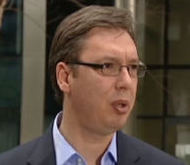
Prime Minister Vucic said that certain progress has been made regarding the Community of Serbian Municipalities and that points of disagreement between the two sides have been clarified. The Prime Minister stressed that Belgrade can only accept what is not contrary to and is in the interest of our people, and it has to evaluate the overall interest of our people, which is not easy, which is why it cannot accept certain arrangements only for the sake of opening negotiating chapters. We will try to do the best for our country and for our interests, and I believe there could be first concrete results at one of the next meetings, Vucic said. |
|
|
| Meeting of Kori Udovički with David McAllister |
|
During her visit to Brussels, Deputy Prime Minister of Serbia and Minister of Public Administration and Local Self- Government Kori Udovički met EP standing rapporteur on Serbia David McAllister and presented to him main goals and measures of comprehensive public administration reform process in Serbia. They exchanged views on steps that should be undertaken in order to reach higher level of effectiveness of public administration towards citizens and commerce entities, as well as professionalism of administrative capacity.
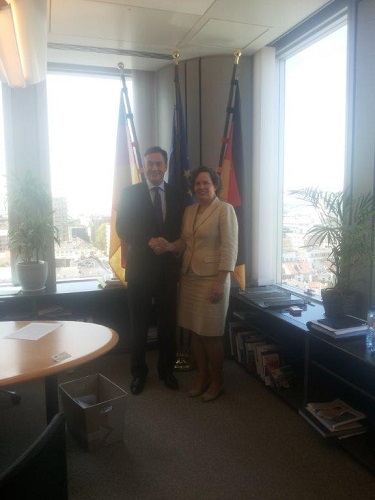 |
|
|
| Kori Udovicki visited Brussels |
|
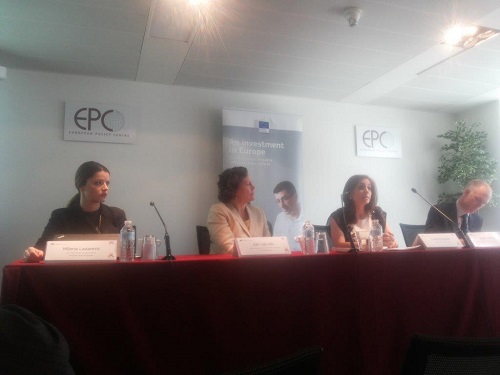
Deputy Prime Minister of Serbia and Minister of Public Administration and Local Self- Government Kori Udovički participated in a panel discussion “Getting the fundamentals right: Public administration reform in the Western Balkans’’, organized by European Policy Center in Brussels, on 16 June 2015. Deputy Prime Minister presented the main characteristics of size and organization of public administration in Serbia, important reform measures undertaken in this area during the last year, as well as further steps towards effective PA in the coming period. |
|
|
| Meeting of the Ministerial Council of Adriatic-Ionian Initiative and Ministerial Meeting of participating states of the EU Strategy for Danube Region, Brussels, 13 May 2015 |
|
XVIII Meeting of the Ministerial Council of Adriatic-Ionian Initiative was held in Brussels on 13 May 2015. In Ministerial Declaration adopted at the meeting, ministers welcomed readiness of all member states to continue with implementation of the EU Strategy for Adriatic-Ionian Region, as an efficient tool of promoting economic, social and territorial cohesion of this part of Europe.
Meeting of Ministers of Foreign Affairs of the participating countries in the EU Strategy for Danube Region was held the same day. This meeting was hosted by Mr. Peter Friedrich, Minister for EU and International Affairs of State of Baden Wurttembergh. In the Joint Statement adopted at the conference, participants welcomed current level of commitments of states in implementation of the strategy, pointing out important role of creating the Danube Strategy Point (DSP), as a political and operational mechanism for further affirmation of the EUSDR.
On behalf of the Republic of Serbia, Head of Unit for Regional Cooperation in MFA Mr. Pavle Jankovic participated in both ministerial meetings.
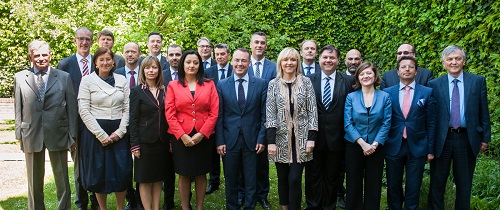 |
|
|
| Meeting “Friends of Serbia” |
|
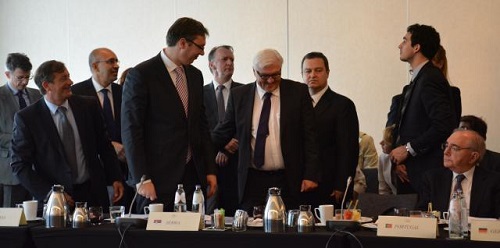
Conference “Friends of Serbia” was organized in Brussels on 18 May by foreign ministers of Austria and Italy, Sebastian Kurtz and Paolo Gentiloni. All 28 member states participated in the meeting, as well as Commissioner for Neighbourhood Policy and Enlargement Negotiations Johannes Hahn.
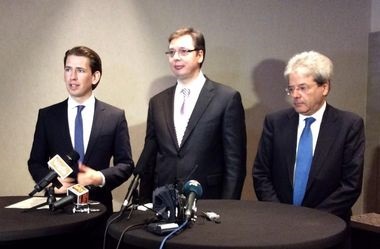
Prime Minister Vucic has said that the meeting in Brussels was a great opportunity for Serbia to present Serbia's achievements in its European integration process. After today’s gathering, which was attended by 20 foreign ministers of the EU, Vucic thanked Austria and Italy for organising the event and for this opportunity. Serbia today presented the results of its economic reforms. There is more to be done in the process of dialogue with Pristina, but it is important for everyone to see the bigger picture, to see Serbia as a pillar of stability in the region and as an economically and politically stable country, the Prime Minister said. Vucic said that he asked the EU heads of diplomacy to have the negotiating chapters with Serbia opened long before the end of the year.
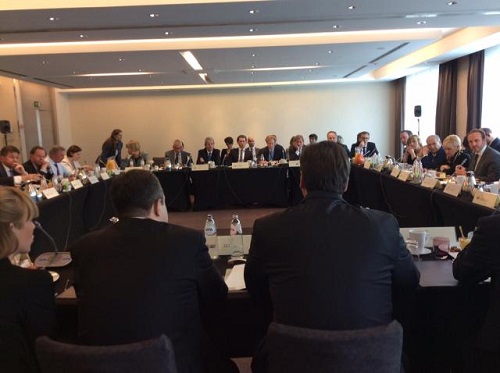 |
|
|
| Economic and Financial Affairs Council– ECOFIN |
|
Final meeting of this year Economic and Financial dialogue between the EU and the Western Balkans and Turkey was held on 12 May 2015 during the Economic and Financial Affairs Council– ECOFIN. The Serbian delegation was composed of the representatives from the Ministry of Finance and the National Bank of Serbia and led by minister of finance Mr. Dušan Vujović. Participants at the meeting welcomed the submission of the Economic Reform Programmes (ERP) of the Western Balkans and Turkey. Programmes from this year consist of two parts. The first part refers to the medium-term macroeconomic and fiscal framework, while the second part covers the sectoral structural reforms in the areas such as transport, energy, education. The aim of the dialogue is to strengthen economic governance within the Western Balkans and Turkey and to better reflect the links with the process of the European semester at the EU level
At the end of the meeting Joint conclusions of the Economic and Financial dialogue were adopted:
https://eu2015.lv/images/news/Joint_Conclusions.pdf
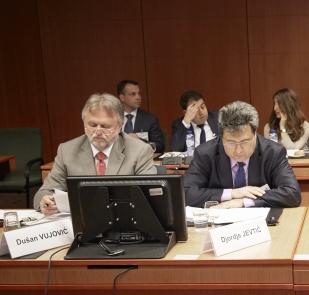 |
|
|
| Visit of Commissioner Johannes Hahn to Serbia on 7 May 2015 |
|
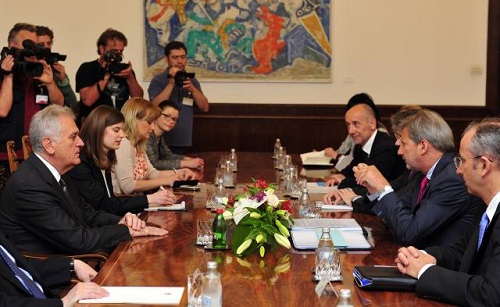
Commissioner Johannes Hahn visited Serbia on 7 May 2015. The aim of Commissioner Hahn's visit was to support Serbia's accession process and discuss the possibility of opening of the first chapters.
In Belgrade, he met President Tomislav Nikolić and Prime Minister Aleksandar Vučić. Commissioner Hahn discussed negotiations with the focus on rule of law and chapters 23 and 24 with Minister for EU Integration Jadranka Joksimović, Minister of Justice Nikola Selaković and Minister of the Interior Nebojša Stefanović. He also had meetings with the Ombudsman Saša Janković and civil society representatives on the same topics. During his visit Commissioner Hahn gave a keynote speech at the Foreign Investors Council conference and discussed the economic and structural reforms and the connectivity agenda with Ministers of Finance Duṧan Vujović and of Economy Zeljko Sertić at the meeting of the National Investment Committee. He also met opposition leaders Bojan Pajtić and Boris Tadić. Commissioner Hahn testified to EU solidarity by visiting Obrenovac, where people are recovering from last year's floods.
During the visit of Commissioner Hahn, Prime Minister Aleksandar Vučić handed over action plans for chapters 23 and 24 to European Commissioner for Enlargement and Neighbourhood Policy and at the same time said that EU membership is Serbia's strategic goal.
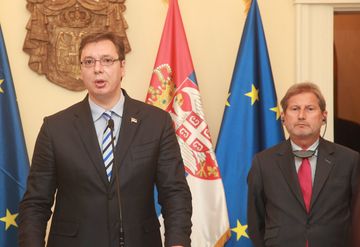 |
|
|
| Serbian Diplomacy Day established |
|
The Serbian government adopted at its session on 7 May 2015 the Decision on the establishment of the Serbian Diplomacy Day. The government set 29 May the Serbian Diplomacy Day, to honour the founding of the Prince’s Office of Foreign Affairs of the Principality of Serbia on 29 May 1839, which is considered to be the beginning of professional diplomacy in Serbia. |
|
|
| Conference „Regional Cooperation Day“ in the Representation of State of Baden Wirtembergh, Brussels, 6 May 2015 |
|
In organization of the Regional Cooperation Council, Representation of State of Baden Wirthembergh in Brussels and European Fund for Balkans, one day conference “Regional Cooperation Day“ was held in Brussels on 6 May 2015.
In the first part of the conference, the key findings of project "Balkan Barometer", were presented. This project represents a mechanism for tracking targets in the framework of the Strategy for South Eastern Europe 2020 (SEE 2020). In the second part, discussion was focused on the regional cooperation and prospects of enlargement of the European Union, with participation of the Commissioner for European Neighbourhood Policy and the enlargement negotiations J.Han, Secretary General of the Regional Cooperation Council G.Svilanovic, and foreign ministers of Albania, Bosnia and Herzegovina, Montenegro and Macedonia. On behalf of the Republic of Serbia, State Secretary in Ministry of Foreign Affairs Ms. Roksanda Nincic participated in the conference.
It was noted in discussion that regional cooperation is an important element of the process of accession of the Western Balkan countries. The recent agreement on the establishment of a Core transport network in the WB, is a good model of identifying common priorities and integrating the Western Balkans into the key strategic directions of development of the European Union.
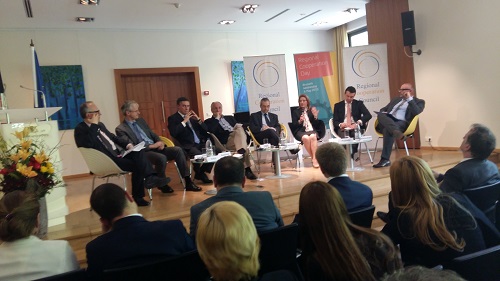
|
|
|
| Minister of Mining and Energy Aleksandar Antić visited Brussels |
|

Minister of Mining and Energy Aleksandar Antić visited Brussels on 24th of April 2015, where he met director-general of the Directorate-General for Energy within the European Commission Dominique Ristori, Secretary General of the Energy Charter Urban Rusnák and Jean-Eric Paquet , Director for the Western Balkans at the Directorate General of the European Neighborhood Policy and Negotiations for Enlargement. The sides exchanged views on the next important steps by Serbia towards acceding to the Energy Charter Treaty and gaining the status of the observer in the Energy Union. The counterparts expressed their belief that Serbia is making good progress on its European path that, among other, proves also the invitation to join the European energy system through Energy Charter and Energy Union.
Minister Antić participated at the evening debate dedicated to the topic of “Serbia and the EU: Challenges and Opportunities Ahead”, organized by Serbian oil and gas company NIS, that send the call to European and world entrepreneurs to invest in Serbia.
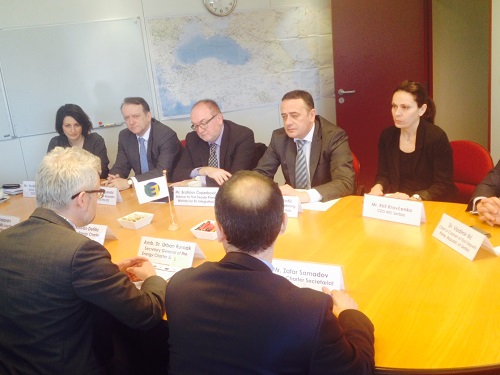 |
|
|
| Second meeting of the Subcommittee on internal market and competition |
|
Second meeting of the Subcommittee on internal market and competition was held in Brussels on 23 April 2015. The delegation of the Republic of Serbia was led by Vesna Kovač, State Secretary in the Ministry of Trade, Tourism and Telecommunications. Dušan Vujović, Minister of Finance of Serbia has also participated at the state aid session of the meeting. From EU side Subcommittee was chaired by Christos Makridis, deputy head of unit for Serbia in DG for Neighbourhood Policy and Enlargement Negotiations (DG NEAR). Subcommittee on internal market and competition is one of the six Stabilisation and Association Agreement subcommittees and it is held annually in order to consider issues of implementation of the Agreement in this field. The following areas were discussed: intellectual property right, public procurement, services, company law, accounting and auditing, financial services, consumer and health protection, state aid and competition. Subcommittee meeting was attended by representatives of various ministries and other Serbian institutions, because of the complexity of the issues. The third meeting will be held next year in Belgrade. |
|
|
| Minister of Agriculture and Environmental Protection visited Brussels |
|
Snezana Bogosavljevic Boskovic, Minister of Agriculture and Environmental Protection of Serbia met with Monique Pariat, Deputy Director General for Agriculture and Rural Development, during her stay in Brussels. In an open dialogue Minister Bogosavljevic presented the problems that Serbian agriculture is facing, while Mrs. Pariat stated the importance of prompt accreditation of IPARD structures as well as that effort is needed in abstention from further introduction of trade restriction measures.
While visiting Brussels Mrs. Snezana Bogosavljevic Boskovic spoke in the Parliamentary afternoon “The Role of Bio-energy for Energy Security and Climate Protection in the Danube Region” organized in the Representation of Baden Wurttemberg. The cooperation in the field of bio-energy of the Republic of Serbia and Baden Wurttemberg has been highly assessed and expectations of continuation and enhancement of cooperation was stated.
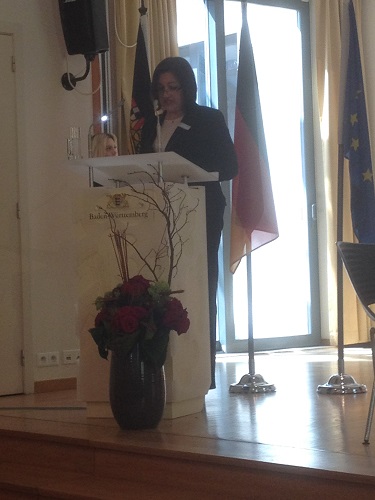 |
|
|
| The visit of Prime Minister Aleksandar Vucic to Brussels, 21 April 2015 |
|
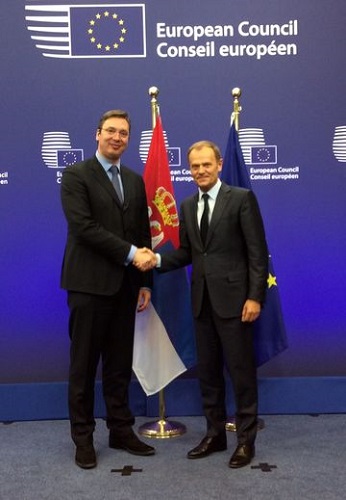
Prime Minister Aleksandar Vucic visited Brussels on 21 April 2015, where he attended the meeting of the Western Balkans Six. He also had bilateral talks with President of the European Council Donald Tusk, European Commissioner for Neighbourhood Policy and Enlargement Negotiations Johannes Hahn and Albanian Prime Minister Edi Rama.
The Prime Minister underlined that Serbia is on the European path and that it continues to implement economic measures to improve the economic situation in the country, as well as dialogue with Pristina in order to contribute to political stability in the region. Vucic expects that the negotiating chapters will be opened in June and that Serbia will complete in the coming days the Action plan for chapters 23 and 24.
In the evening hours on 21 April 2015, Prime Minister Vucic participated in the next round on normalisation of relations between Belgrade and Pristina, which was mediated by EU HR for Foreign Policy Federica Mogherini. Prime Minister Vucic stated that the talks were difficult but that certain progress has been made in the fields of telecommunications, civil protection and energy. The working groups will now start preparing the next round of dialogue which will be held in May, Vucic said.
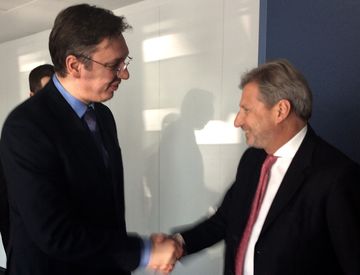 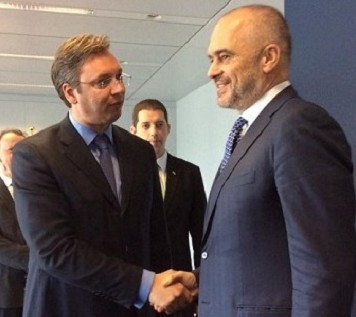
|
|
|
| Western Balkans 6 Prime Minister Meeting on Connectivity, Brussels, 21 April 2015 |
|
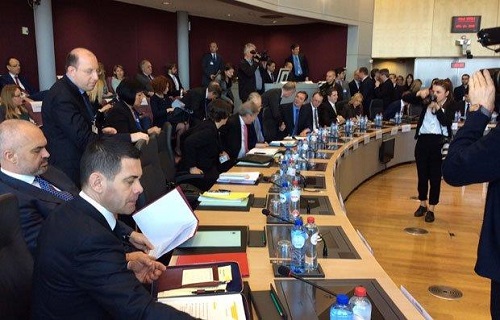
The meeting on Connectivity of the Western Balkans Six was organized in Brussels, 21 April 2015, under the auspices of European Commissioner for Neighbourhood Policy and Enlargement Negotiations Johannes Hahn and Commissioner for Transport Violeta Bulc. Delegation of the Republic of Serbia was headed by the Prime Minister Aleksandar Vučić.
The Brussels meeting confirmed the agreement of the core network through a joint statement and discussed concrete ways which would help implement the core transport network in the Western Balkans until 2030. The EU has announced that in the next few years around one billion euro in financial assistance would be provided for the improvement of connectivity within the region and its integration into the main traffic corridors in the EU. The focus will remain on ensuring that the Summit in August 2015 in Vienna will achieve concrete results based on specific investments projects.
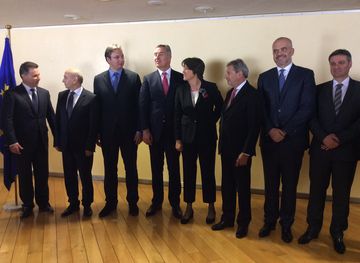
|
|
|
| Visit of Minister of Justice Nikola Selaković to Brussels, 16 April 2015 |
|
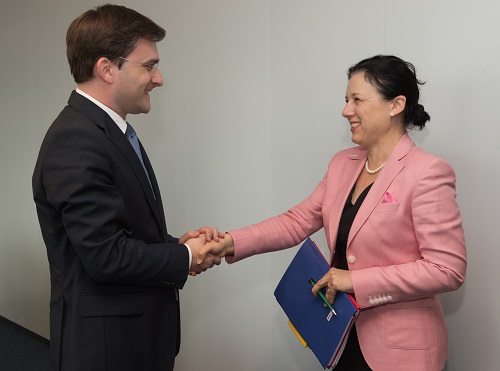
The Minister of Justice, Mr. Nikola Selaković, met with European Commissioner for Justice, Consumers and Gender Equality Ms. Vera Jourova, Director for the Western Balkans of the Directorate General for Neighborhood and Negotiations for Enlargement of the European Commission Mr. Jean Eric Paquet and with EP Rapporteur on Serbia Mr. David McAllister.
At the meeting with European Commissioner for Justice, Consumers and Gender Equality Ms. Vera Jourova, Minister Selaković disscused drafting of the Action plan for Chapter 23, challenges that Ministry of Justice is facing in the preparation of this plan, as well as future cooperation between Commissioner’s office and Ministry of Justice, in order to speed up preparations for the opening of negotiating Chapter 23.
During his stay in Brussels, Minister Selaković also met with Director for the Western Balkans of the Directorate General for Neighborhood and Negotiations for Enlargement of the European Commission, Mr. Jean Eric Paquet and with EP Rapporteur on Serbia Mr. David McAllister, with whom he discussed progress and the activities of the Ministry of Justice in the European Integration process, as well as future steps in this process.
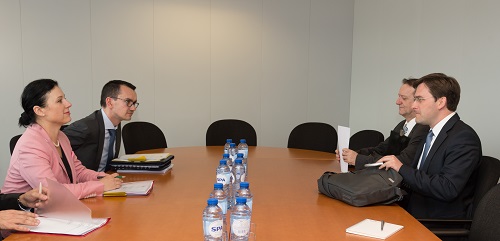 |
|
|
| “Young Professionals in Foreign Policy” in the Mission of the Republic of Serbia to the EU, 31 Mach 2015 |
|
Brussels “Young Professionals in Foreign Policy” continued its YPFP Ambassadors’ Series event with the Ambassador Lopandic. With more than 60 members of YPFP present at the event, ambassador Lopandic gave an introductory speech on Serbia and current state of play in the process of negotiations between Serbia and the EU, followed by a number of Q&A.
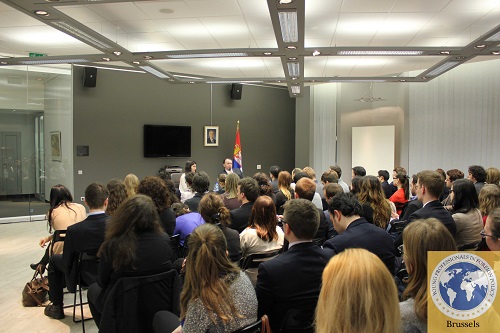 |
|
|
| Bilateral screening meeting for Chapter 33 “Financial and Budgetary Provisions” was held in Brussels, 24 March 2015 |
|
Bilateral screening meeting for Chapter 33 on Financial and Budgetary Provisionswas held in Brussels on 24 March 2015.
Delegation of the government of the Republic of Serbia was headed by Ms Mirjana Ćojbašić, Assistant Minister in the Ministry of Finance and Deputy Head of the Negotiating group 33, and Ms Tanja Miščević, Head of Negotiating Team with the EU. In the delegation were also other representatives of the Ministry of Finance, as well as of the administrative authorities within this ministry – Tax Administration, Customs Administration and Public Debt Administration, accompanied by civil servants from the Statistical Office of the Republic of Serbia, National bank of Serbia and European Integration Office.
At the bilateral screening meeting for Chapter 33, chaired by a representative of the Directorate General for European Neighbourhood Policy and Enlargement Negotiations, civil servants of the line ministries and institutions presented in detail the situation in this field divided into the following parts: own resources and administrative infrastructure; VAT resource; GNI resource. After the presentations, Serbian civil servants were replying to the questions of the experts from DG BUDG and DG ESTAT. Representatives of DG BUDG explained in the end of the meeting the planned technical assistance and monitoring programme.
Assistant Minister Ms Mirjana Ćojbašić accepted at the end of the meeting harmonization of the legal system of the Republic of Serbia with the EU acquis in the field of financial and budgetary provisions.
This was, in fact, the last, 65thscreening meeting. The process lasted for 130 screening-days and it involved almost two thousand civil servants and officials of the government of the Republic of Serbia. |
|
|
| Reception on the occasion of completing screenings |
|
On the occasion of completing all 65 meetings within screening process of chapters in EU accession talks, Mission of the Republic of Serbia to the EU in Brussels hosted a reception. The ceremony was attended by participants of the last screening for chapter 33 – Budget and Financial Provisions, as well as representatives of the Unit for Serbia in Directorat General for European Neighbourhood Policy and Enlargement Negotiations and representatives of other EU institutions who were involved in screening process. Guests were welcomed by Ambassador Dusko Lopandic and Head of Negotiating Team with the EU Tanja Miscevic, while Head of Unit for Serbia in Directorat General for European Neighbourhood Policy and Enlargement Negotiations Myriam Ferran and former Director for Western Balkans in Directorat General Enlargement Pierre Mirel greeted guests on behalf of EU.

 |
|
|
| Deputy Prime Minister and Minister of Public Administration and Local Self-Goverenment Kori Udovicki visited Brussels |
|

Deputy Prime Minister and Minister Public Administration and Local Self-Govrenement Kori Udovicki said after meeting with senior officials of the European Commission (EC) in Brussels, March 20, that the EU is willing to technically and financially support the reform of the public administration in Serbia. During her visit, she met with European Commission Vice-President in charge of the budget and human resources Kristalina Georgieva, Commissioner for European Neighbourhood Policy and Enlargement Negotiations Johannes Hahn, Director od the Directorate General for Human Resources and Security Irene Souk, acting Director General for Health and Food Safety Ladislav Miko and Director for Western Balkans in DG NEAR Jean-Eric Paquet. Kori Udovicki also took part in the Brussels forum, organised by the German Marshall Fund.
During her visit to Brussels, Udovicki underlined that the reform of public administration is one of the pillars of the new EU enlargement policy, necessary for economic growth and a better quality of life of citizens. Udovicki said that the opening of accession negotiations Chapter 32, Financial Control, would help the reform to be conducted more efficiently. Udovicki also said that Serbia is aware that it must achieve better results, but with fewer resources and she thanked the EU for its assistance to Serbia.
 |
|
|
| Bilateral screening meeting for Chapter 17 “Economic and Monetary Policy” was held in Brussels, 12 March 2015 |
|
Bilateral screening meeting for Chapter 17 on Economic and Monetary Policywas held in Brussels, on 12 December 2015.
Delegation of the government of the Republic of Serbia was headed by Mr Branislav Zoroja, Director-General of the Monetary Operations Sector in the Central Bank of Serbia and Head of the Negotiating group 17, and Ms Tanja Miščević, Head of the Negotiating Team with the EU. Mr Dušan Vujović, Finance Minister of the government of the Republic of Serbia, participated in the work of the screening meeting and presented the current economic situation in the country as well as ongoing fiscal and structural reforms. In the Serbian delegation were also other representatives of the Central Bank, as well as of Ministry of Finance, Ministry of Economy, Cabinet of the minister without portfolio in charge of European Integrations, Fiscal Council, Statistical Office of the R. of Serbia, Republic Secretariat for Public Policies, Securities Commission and European Integration Office.
At the bilateral screening meeting for Chapter 17, chaired by a representative of the Directorate General for European Neighbourhood Policy and Enlargement Negotiations, civil servants of the line ministries and institutions presented in detail the situation in the R. of Serbia in the areas of economic and of monetary policies. After the presentations, Serbian civil servants were replying to the questions of the experts from DG ECFIN.
Head of the Negotiating group Mr Branislav Zoroja accepted at the end of the meeting harmonization of the legal system of the R. of Serbia with the EU acquis in the area of economic and monetary policy. |
|
|
| Bilateral screening meeting for Chapter 16 “Taxation” was held in Brussels, 5 – 6 March 2015 |
|
Bilateral screening meeting for Chapter 16 on Taxation was held in Brussels on 5 and 6 March 2015.
Delegation of the government of the Republic of Serbia was headed by Mr Nenad Mijailović, State Secretary in the Ministry of Finance and Head of the Negotiating group 16, and Ms Tanja Miščević, Head of Negotiating Team with the EU. In the delegation were also other representatives of the Ministry of Finance, as well as of Ministry of Agriculture and Environment Protection, Ministry of Mining and Energy, Tax Administration, Customs Administration and European Integration Office.
At the bilateral screening meeting for Chapter 16, chaired by a representative of the Directorate General for European Neighbourhood Policy and Enlargement Negotiations, civil servants of the line ministries and institutions presented in detail the situation in this field divided into the following parts: general presentation of the Serbian tax system and administration; direct taxation; indirect taxation; prevention of tax evasion and avoidance, administrative cooperation and computerisation. After the presentations, Serbian civil servants were replying to the questions of the experts from DG TAXUD.
Mr Mijailović accepted at the end of the meeting harmonization of the legal system of the Republic of Serbia with the EU acquis in the field of taxation, with possible transition periods as a result of negotiations. |
|
|
| Bilateral screening meeting for Chapter 14 (Transport policy) and Chapter 21 (Trans-European network) was held in Brussels 24 – 26 February 2015 |
|
Bilateral screening meeting for Chapter 14 on Transport policy and Chapter 21 on Trans-European networks was held in Brussels, on 24 and 26 February 2015.
Delegation of the government of the R. of Serbia was headed by Mr. Dejan Trifunović, State Secretary in the Ministry of Construction, Transport and Infrastructure and Chair of the Negotiating group 21, Ms. Tatjana Jovanović, Assistant Minister in the same Ministry and Chair of the Negotiating group 14, and Ms. Tanja Miščević, Head of the Negotiating Team with the EU. In the delegation were also other representatives of the Ministry, as well civil servants from the Ministry of Interior, Ministry of Economy, Ministry of Labour, Employment, Veterans and Social Issues, Ministry of Finance, Ministry of Mining and Energy, Authority for Transport of Dangerous Goods, Road Traffic Safety Agency, Railway Directorate, Authority for Determination of Seaworthiness, Directorate for Inland Waterways, Civil Aviation Directorate and European Integration Office.
At the bilateral screening meeting for chapters 14 and 21, chaired by a representative of the Directorate General European Neighbourhood Policy and Enlargement Negotiations, civil servants of the line ministries and institutions presented in detail the situation in this field divided into the following parts: general transport acquis; road transport; rail transport; combined transport; maritime transport; inland waterways; air transport; Trans-European Networks. After the presentations, Serbian civil servants were replying to the questions of the experts from DG MOVE.
Ms. Tatjana Jovanović accepted at the end of the meeting harmonization of the legal system of the R. of Serbia with the EU acquis in these fields. |
|
|
| National week at the College of Europe in Bruges |
|
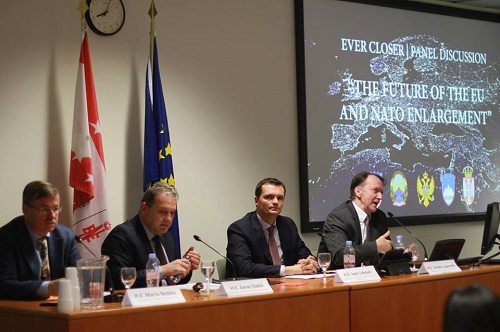
On 16 February 2015, students from Serbia, Montenegro, Croatia, Slovenia and Macedonia have organized the panel discussion “The future of the EU and the NATO enlargements” during the traditional National week celebration at the College of Europe in Bruges. The speakers on the panel discussion were H. E. Duško Lopandić, Serbian Ambassador to the EU, H. E. Ivan Leković, Montenegrin Ambassador to the EU, H. E. Mario Nobilo, Croatian Ambassador to the Kingdom of Belgium and H. E. Zoran Dabik, Macedonian Ambassador to the NATO.
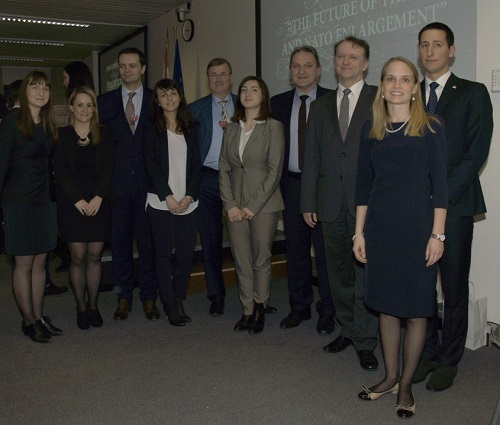 |
|
|
| Round of dialogue between Belgrade and Pristina held in Brussels |
|
A round of dialogue between Belgrade and Pristina was held in Brussels on 9 February 2015. In this meeting, which was mediated by EU HR for Foreign Policy Federica Mogherini, our delegation was headed by Prime Minister of Serbia Aleksandar Vucic. First Deputy Prime Minister and Minister of Foreign Affairs Ivica Dacic, Minister of Justice Nikola Selakovic and Director of the Office for Kosovo and Metohija Marko Đurić also took part in the meeting. At the end of the round an arrangement on the judiciary, which ensures the participation of Serbian judges in the north, has been initialed.
Prime Minister Vucic expressed hope that this progress will contribute to open the first chapter in the accession negotiations with the EU soon and that it will also give Serbia a new impetus to European integration.
 |
|
|
| Bilateral screening meeting for Chapter 6 „Company Law“ was held in Brussels, 5 February 2015 |
|
Bilateral screening meeting for Chapter 6 „Company Law“ was held in Brussels on 5 February 2015.
Delegation of the Government of the Republic of Serbia was headed by Dragan Janjić, Deputy Minister of Economy and Tanja Miščević Head of negotiating team. In the Serbian delegation were also representatives of the Ministry of Finance, Central Bank, Privatization Agency of the Republic of Serbia, The Serbian Business Registers Agency, Securities Commission and European Integration Office.
At the screening meeting, chaired by a representative of the Directorate-General for Neighbourhood and Enlargement negotiations (DG NEAR), representatives of the Ministry of Finance, Central Bank, Privatization Agency of the Republic of Serbia, The Serbian Business Registers Agency, Securities Commission presented the legal body of the Republic of Serbia in the area of Company law, Corporate governance and Financial reporting. Following the presentations, civil servants were replying to the questions of the experts of the Directorate-General for Justice and Consumers (DG JUST), and Directorate-General for Financial Stability, Financial Services and Capital Markets Union (DG FISMA).
At the end of the meeting, Mr. Reljić accepted the harmonization of the EU acquis in this area into the legal system of the Republic of Serbia. Representatives of European Commission emphasized that the Republic of Serbia largely adopted and implemented the EU acquis in this area. |
|
|
| Conference “On the Way to Europe: Serbia and the Western Balkans, Brussels, 4 February 2015 |
|
Foundation Hans Seidel and Wilfred Martens Centre for European Studies, have organized on 4 February in Brussels a Conference called "On the Way to Europe - Serbia and the Western Balkans”. In the introductory part of the event, Head of the negotiating team for negotiations with EU Miscevic, pointed out that despite the complex situation in the Western Balkans and the internal problems facing the EU, enlargement policy remains one of the priorities of the EU. Presenting the ongoing activities in the negotiation process, Miščević stressed that Serbia committed to maximum harmonizing the legal framework with the EU and added that Serbian public administration is ready for opening of the first negotiation chapters during 2015.
In the panel discussion rapporteur for Serbia in European parliament Mr. David Makalister, Deputy Head of Unit for Serbia in the DG Neighborhood Policy and negotiations on the enlargement of the EC Mr. Christos Makridis, Deputy director of the Office for European Integration Mr. Srdjan Majstorovic and Head of the Brussels office of the German Institute for International and Security Policy Mr. Dusan Reljic presented their views about perspective of integration of the Western Balkans countries into the EU.
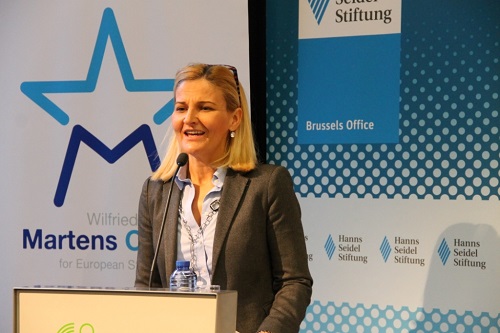
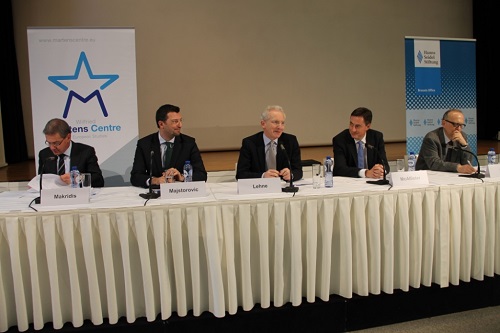 |
|
|
| Ksenija Milenkovic named as Acting Director of EU Integration Office |
|
The Government of Serbia has named Ksenija Milenkovic, Deputy Head of Serbia’s Mission to the EU, as Acting Director of the EU.
Ksenija Milenkovic has served as Deputy Head of Mission of the Republic of Serbia to the EU in Brussels since 2011. She was a member of the Parliament of the Republic of Serbia from 2004 to 2006, after which she became Secretary General of the European Movement in Serbia. From 2007 to 2011, Milenkovic was an advisor for foreign policy and European integration in the Office of the Deputy Prime Minister.
|
|
|
| Briefing meeting in the Mission of the Republic of Serbia to the EU |
|
Minister without portfolio responsible of European integration Jadranka Joksimovic , Ambassador of the Republic of Serbia to the EU Dusko Lopandic and Head of the Negotiating Team with the EU Tanja Miscevic, held a briefing for the members of Committee on EU enlargement of the Council of EU (COELA). The briefing meeting, on the current state of play in Serbia’s accession negotiations as well as on the progress made by the Government of the Republic of Serbia in implementing structural policy reforms, was held in premises of the Mission of the Republic of Serbia to the EU in Brussels on 3 February 2015.
On this occasion, Minister Jadranka Joksimovic stressed out that Serbia has achieved a considerable progress in the previous year. She underlined the strong support of citizens of Serbia to reform process, which indirectly also proves their support to the EU path. Minister Joksimovic said difficult fiscal measures have been introduced with the aim of achieving fiscal discipline and aligning with economic governance.
In regards to the continuation of the dialogue between Belgrade and Pristina, she pointed out that our side has taken numerous steps to fulfil its obligations and Pristina should the same.
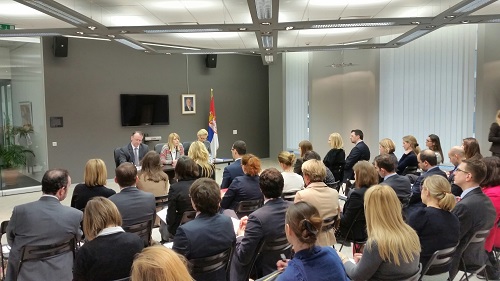 |
|
|
| Bilateral screening meeting for Chapter 22 “Regional Policy and Co-ordination of Structural Funds” was held in Brussels, 28 – 29 January 2015 |
|
Bilateral screening meeting for Chapter 22 on Regional Policy and Co-ordination of Structural Funds was held in Brussels, on 28 and 29 January 2015.
Delegation of the Government of the Republic of Serbia was headed by Ms. Ana Ilić, Deputy Director of the European Integration Office and Chair of the Negotiating group 22, and Ms. Tanja Miščević, Head of the Negotiating Team with the EU. In the delegation were also other representatives of the Office, as well civil servants from the Ministry of Finance, Ministry of Public Administration and Local Self-government, Ministry of Education, Science and Technological Development, Ministry of Agriculture and Environmental Protection, Audit Authority Office, Republic Secretariat for Public Policies and Republic Statistical Bureau.
At the bilateral screening meeting for Chapter 22, chaired by a representative of the Directorate General European Neighbourhood Policy and Enlargement Negotiations, civil servants of the line ministries and institutions presented in detail the situation in this field divided into the following parts: general context in Serbia; legislative framework; institutional framework; financial management and control systems; programming; monitoring and evaluation; administrative capacity. After the presentations, Serbian civil servants were replying to the questions of the experts from DG Regional policy and DG Employment, Social Affairs, Skills and Labour Mobility.
Ms. Ana Ilić accepted at the end of the meeting harmonization of the legal system of the R. of Serbia with the EU acquisin the field of regional policy. |
|
|
| Prime Minister Aleksandar Vučić met with European Commission’s First Vice-President Frans Timmermans |
|
Prime Minister Aleksandar Vucic spoke 22 January 2015 in Davos with European Commission’s First Vice-President Frans Timmermans about the achievements and problems of Serbia on its European path.
Vucic conveyed gratitude to Timmermans for the great support provided to Serbia, on the assistance which the EU gave to our country during the May floods, as well as for the support to Serbian agriculture sector and the Serbian economy as a whole.
The Prime Minister invited Timmermans to visit Belgrade, which the European Commission’s First Vice-President accepted with pleasure.
Timmermans welcomed the economic reforms of the government of Serbia and supported Serbia's path towards full membership in the EU.
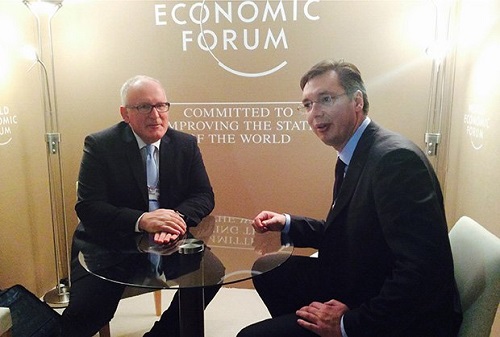
|
|
|
| Explanatory screening meeting for Chapter 9 “Financial Services” was held in Brussels, 21 – 22 January 2015 |
|
Explanatory screening meeting for Chapter 9 on Financial Services was held in Brussels on 21 and 22 January 2015.
Delegation of the Government of the Republic of Serbia was headed by Mr. Zlatko Milikić, Assistant Minister in the Ministry of Finance and Deputy Head of the Negotiating group 9, and Mr. Srđan Majstorović, Deputy Director of the European Integration Office, on behalf of the Head of the Negotiating Team with the EU. In the Serbian delegation were also other representatives of the Ministry of Finance, as well as of the Central Bank of Serbia, Deposit Insurance Agency, Securities Commission, Serbian Export Credit and Insurance Agency and European Integration Office.
At the explanatory screening meeting for Chapter 9, chaired by a representative of the Directorate-General Neighbourhood and Enlargement Negotiations, the experts of the Directorate-General Financial Stability, Financial Services and Capital Markets Union, presented in detail the relevant acquis divided into the following parts: banking and financial conglomerates; insurance and occupational pensions; financial markets infrastructure; securities markets and investment services.
The bilateral screening meeting, when Serbian side will present its legal system in this area, as well as gaps in relation to the EU acquis, is scheduled for 17 and 18 March 2015.
|
|
|
| Reception on the occasion of the starting of New Year and celebration of holidays in the Mission of the Republic of Serbia to the EU, Brussels, 13 January 2015 |
|
On the occasion of the start of the New Year and the celebration of holidays, the Mission of the Republic of Serbia in the EU has organized on 13 January informal reception for representatives of institutions of the EU, representations of the member states of the EU, missions of the Western Balkans countries, and representatives of the Serbian diaspora in Belgium. In his address, Head of the Mission of Republic of Serbia to the EU, H.E. Ambassador Dusko Lopandić expressed his expectation that the upcoming 2015 will be successful in terms of Serbia's progress in the negotiations with the European Union, along with the continued economic and social reforms and raise living standards, which will allow for the dynamic process of European integration of the country.
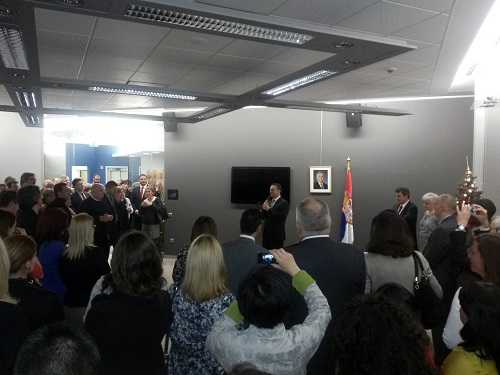 |
|
|
| Explanatory screening meeting for Chapters 14 „Transport Policy“ and 21 “Trans-European networks” were held in Brussels, 16-18 December 2014 |
|
Explanatory screening meetings for chapters 14 (Transport Policy) and 21 (Trans-European networks) were held in Brussels from 16-18 December 2014. Delegation of the Government of the Republic of Serbia was led by Ms. Tatjana Jovanovic, Assistant Minister of Construction, Transport and Infrastructure. Apart from the representatives of the Ministry of Construction, Transport and Infrastructure, in the Serbian delegation were also representatives from Ministry of Trade, Tourism and Telecommunications, Ministry of Finance, Ministry of Labour, Employment, Veterans and Social Issues, Port Governance Agency, Road Traffic Safety Agency, Directorate for Railways, Civil Aviation Directorate.
At the explanatory meetings, that were chaired by a representative of the Directorate-General for the Enlargement, the experts of the Directorate-General for Mobility and Transport (DG MOVE) and Directorate-General for Enterprise and Industry (DG ENTR) presented in detail the relevant acquis related to different aspects of road, rail, maritime and air transport, as well as the Trans-European Networks. Bilateral screening meeting, in which the Serbian side will present its legislation in the abovementioned areas, will be held from 24-27 February 2015 in Brussels.
|
|
|
| Second meeting of the Stabilisation and Association Council between Serbia and the EU |
|
The Stabilisation and Association Council (SA Council) between Serbia and the European Union
held its second meeting on 17 December 2014. The meeting was chaired by the Serbian side, by
Jadranka Joksimović, Minister without portfolio for EU integration of Serbia. The EU Delegation
was led by Edgars Rinkēvičs, Minister of Foreign Affairs of Latvia, and included Commissioner Johannes Hahn.
The SA Council welcomed the official opening of the accession negotiations with Serbia on 21
January 2014 and the ongoing screening process, where Serbian authorities have showed a good level of preparedness. Also, it underlined progress made in a number of important areas including in public administration reform, judicial reform, the fight against corruption and organised crime. The SA Council noted with satisfaction Serbia's ambitious programme of economic and structural reforms and its active involvement in further developing regional cooperation. The SA Council noted that it was important that Serbia maintains an active and constructive engagement in the normalisation process with Kosovo. It also recalled Serbia's obligation from the negotiating framework to progressively align with the EU's Common Foreign and Security Policy in the process up to accession.
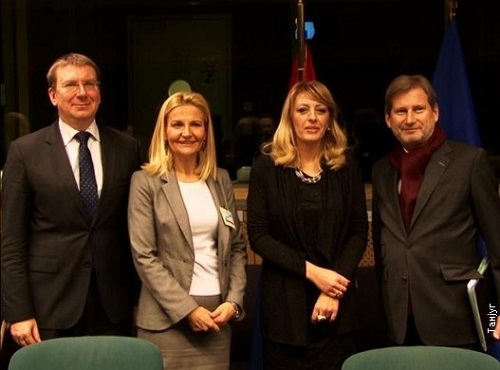
For the Joint Pres Release, please click here. |
|
|
| Explanatory screening meeting for Chapter 6 „Company Law“ was held in Brussels, 11 December 2014 |
|
Explanatory screening meeting for Chapter 6 „Company Law“ was held in Brussels on 11 December 2014.
Delegation of the Goverment of the Republic of Serbia was headed by Dragan Janjić, Deputy Minister of Economy. In the Serbian delegation were also representatives of the Ministry of Finance, Central Bank, Privatization Agency of the Republic of Serbia, The Serbian Business Registers Agency, Securities Commission and European Integration Office.
At the explanatory meeting for Chapter 6, chaired by a representative of the Directorate-General for Enlargement, the experts of the Directorate-General for Justice and consumers (DG JUST), and Directorate-General for Financial Stability, Financial Services and Capital Markets Union (DG FISMA) presented in detail the relevant acquis divided into the two parts: Company Law and corporate governance and Financial reporting. Our representatives are asked some questions for clarification of certain segments of the exposure of EC experts and emphasized that the Republic of Serbia in this area largely adopted and implemented the EU acquis.
Bilateral screening, in which the Serbian side will present its legislation in this area, and any observed differences in relation to the EU acquis, is scheduled for February 5, 2015 in Brussels. |
|
|
| Explanatory screening meeting for Chapter 17 “Economic and Monetary Policy” was held in Brussels, 2 – 3 December 2014 |
|
Explanatory screening meeting for Chapter 17 on Economic and Monetary Policy was held in Brussels, on 2 and 3 December 2014.
Delegation of the Government of the Republic of Serbia was headed by Mr. Branislav Zoroja, Director-General of the Monetary Operations Sector in the Central Bank of Serbia and Head of the Negotiating group 17, and Ms. Tanja Miščević, Head of the Negotiating Team with the EU. On the first day, Mr. Dušan Vujović, Finance Minister of the Government of the R. of Serbia, participated in the work of the screening meeting. In the Serbian delegation were also other representatives of the Central Bank, as well as of Ministry of Finance, Ministry of Economy, Securities Commission and European Integration Office.
At the explanatory screening meeting for Chapter 17, chaired by a representative of the Directorate General for Enlargement, the experts of the Directorate-General for Economic and Financial Affairs presented in detail the relevant acquis divided into the following parts: exchange rate policy and euro adoption; participation in the procedure of coordination of economic policies; fiscal policy; sound national budgetary frameworks; monetary policy; European System of Central Banks and European Central Bank.
The bilateral screening meeting, when the Serbian side will present its legal system in this area, as well as gaps in relation to the EU acquis, is scheduled for 3 and 4 March 2015. |
|
|
| Bilateral screening meeting for Chapter 25 “Science and Research” was held in Brussels, 1 December 2014 |
|
Bilateral screening meeting for Chapter 25 on Science and Research was held in Brussels on 1 December 2014.
Delegation of the Government of the R. of Serbia was headed by Mr. Viktor Nedović, Assistant Minister in the Ministry of Education, Science and Technological Development, and Ms. Tanja Miščević, Head of the Negotiating Team with the EU. In the delegation were also other representatives of theMinistry of Education, Science and Technological Development, as well as of Ministry of Mining and Energy, National Council for Science and Technological Development, Innovation Fund, Centre for Science Promotion, Intellectual Property Office, University in Niš, Institute of Food Technology and European Integration Office.
At the bilateral screening meeting for Chapter 25, chaired by a representative of the Directorate General for Enlargement, the civil servants of the line ministries and institutions presented in detail the legal framework in this area in the fields of cooperation in research and innovation, participation in the EU programmes, other EU actions and instruments, as well as in the Innovation Union and European Research Area.
At the end of the meeting, Mr. Viktor Nedović accepted the alignment of the Serbian legal system with EU acquis in the area of science and research. |
|
|
| Bilateral screening meeting for Chapter 18 “Statistics” was held in Luxembourg, 25 – 26 November 2014 |
|
Bilateral screening meeting for Chapter 18 on Statistics was held in Luxembourg, on 25 and 26 June 2014.
Delegation of the Government of the Republic of Serbia was headed by Mr. Dragan Vukmirović, Director of the Statistical Office of the Republic of Serbia, and Mr. Srđan Majstorović, Deputy Director of the Serbian European Integration Office, as a representative of the Head of Negotiating Team with the EU. In the delegation were other civil servants of the Office, as well as of the Ministry of Interior, Ministry of Health, Ministry of Labour, Employment, Veteran and Social Issues, Central Bank of Serbia and Serbian European Integration Office.
At the bilateral screening meeting for Chapter 18, chaired by a representative of the Directorate General for Enlargement, the representatives of the Statistical Office, line-ministries and institutions presented the legal body of the R. of Serbia in the areas of sectoral, business, economic, demographic and other statistics. Following the presentations, civil servants were replying to the questions of the experts of DG Eurostat.
At the end of the meeting, Mr. Vukmirović accepted the transposition of the EU acquis in this area into the legal system of the Republic of Serbia. |
|
|
| MFA Dačić spoke at the session of the Committee on Foreign Affairs of the EP |
|
First Deputy Prime Minister and Minister of Foreign Affairs Ivica Dačić spoke today at the session of the Committee on Foreign Affairs of the European Parliament (AFET) in Brussels.
In his address to the MEP, MFA expressed foreign policy priorities of Serbia, underlining full membership to the EU. Minister Dačić talked about the report of the European Commission on Serbia’s progress in the process of European integration and pointed out Serbia's determination to continue the ongoing reform process and fulfil all the objectives in the process of European integration.
On the AFET session, attended by ministers of foreign affairs of Western Balkans, Minister Dačić reiterated that the presidency of the OSCE is one of the most important foreign policy tasks that Serbia had so far in an international organisation.
In the discussion on WB, minister Dačić underscored that Šešelj’s political agenda should be condemned but not Serbia. He stressed that Serbia today and Serbia when Šešelj went to Hague are not the same, adding that all open issues should be solved bilaterally.
During his visit to Brussels, Minister Dačić had a number of bilateral meetings with members of the European Parliament. He met with Chair of political group EPP M. Weber, Vice-Chair of S&D V. Bostinaru, Chair of AFET E. Brok, Chair of Delegation to the EU – Serbia Stabilisation and Association Parliamentary Committee E. Kukan, as well as many other MEPs.
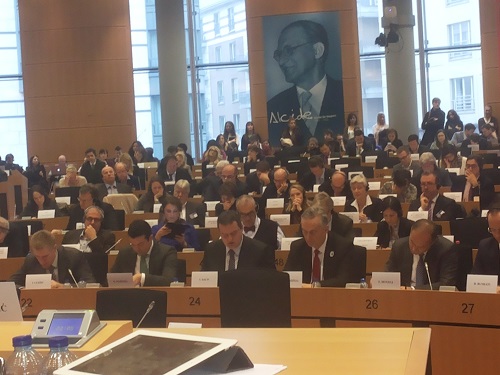 |
|
|
| Conference “The European Union and Serbia Relations: State of Play” |
|
The conference on Serbia’s passage towards EU membership “The European Union and Serbia Relations: State of Play” was hosted by Mr. Eduard Kukan, MEP and Chair-elect of the Delegation to the EU-Serbia Stabilisation and Association Parliamentary Committee (D-RS), in the European Parliament, on November 19, 2014. The event featured key note speech by Minister of economy of Serbia Mr. Željko Sertić, who delivered his address on the state of Serbian economy and key reform measures undertaken by the Serbian Government. At the conference were present MEPs, representatives of the European Commission and other institutions of the EU, as well as the representatives of the media.
Among key note speakers at the conference were Tanja Miščević, Chief Negotiator for Serbia’s accession negotiations to the EU and Duško Lopandić, Head of the Serbia Mission to the EU.
 |
|
|
| Commissioner Hahn visited Serbia |
|
Commissioner for European Neighborhood Policy and Enlargement Negotiations Johannes Hahn visited Belgrade on November 20. On his first official visit to the Western Balkans in his new capacity, Commissioner Hahn had meetings with President Tomislav Nikolic, Prime Minister Aleksandar Vucic, First Deputy Prime Minister and Minister of Foreign Affairs Ivica Dacic, as well as many other Ministers. During his visit Hahn also met with representatives of the National Assembly, NGOs and IFIs.
After his meeting with Commissioner Hahn, President Tomislav Nikolic pointed out that Serbia wants to become a member of the European Union and it will patiently participate in the negotiations and solve potential problems.
Prime Minister Aleksandar Vucic said that he did not ask from Hahn the opening of negotiations with Serbia before end of 2014 or any date. Serbia should continue to do its job and the European Union will assess when to open chapters 32, 35, 23 and 24, he underlined. We want to see the most difficult chapters of the accession talks be opened at the start, he said, adding that Serbia has done a very good job on the expert level. Serbia is on a European path and its strategic goal is EU accession, because it wants to become a modern and well organised country, he underscored.
Deputy Prime Minister and Minister of Foreign Affairs Ivica Dacic underlined that we see EU membership as a joint work and partnership between Western Balkan countries and EU, adding that Serbia finds EU role to be very useful in process of resolving problems in our region.
Commissioner Johannes Hahn stated that he came to Belgrade to once again assure Serbian people and authorities that the European Commission and the European family of peoples are Serbia's partner on the EU pathway. He expressed certainty that in the coming weeks or months, Serbia will open the first chapter in the EU accession talks, adding that usually the first to be opened are Chapters 23 and 24 referring to the rule of law, judiciary and basic rights.
He underlined that the EU membership will be valuable for Serbia, bringing welfare to the citizens of Serbia. The EU Commissioner said that he plans to organise investment conferences in Serbia in order to encourage investments and creation of jobs. Serbia is on a good path, it is working on the fight against corruption, improving judiciary and these are all necessary conditions for the arrival of new investors, Hahn said.
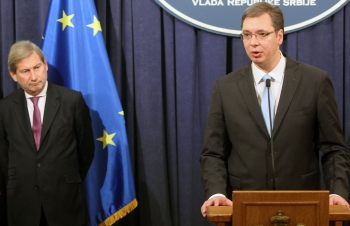 |
|
|
| Bilateral screening meeting for Chapter 27 “Environment” was held in Brussels, 17 – 21 November 2014 |
|
Bilateral screening meeting for Chapter 27 on Environment was held in Brussels, 17-21 of November 2014.
Delegation of the Government of the Republic of Serbia was headed by Ms. Stana Bozovic, State Secretary of the Ministry of Agriculture and Environmental Protection and Chairman of the Negotiating Group 27, and Ms. Tanja Miscevic, Head of Negotiating Team with the EU. In the delegation were representatives of the Ministry of Agriculture and Environmental Protection, Ministry of Justice, Ministry of Mining and Energy, Ministry of Interior, European Integration Office, Republic Geodetic Authority, Provincial Secretariat for Urbanism, Construction and Environmental Planning, Civil Aviation Directorate, Environmental Protection Agency, Road Traffic Safety Agency, as well as representatives of many other institutes.
At the bilateral screening meeting for Chapter 27, chaired by a representative of the Directorate General for Enlargement, the representatives of the line-ministries and institutions presented the legal body of the R. of Serbia in the areas of environment and climate change.
At the end of the meeting, State Secretary S. Bozovic fully accepted the transposition of the EU acquis in this area into the legal system of the R. of Serbia.
|
|
|
| Meeting of Minister Dacic with EU High Representative Mogherini |
|
First Deputy Prime Minister and Minister of Foreign Affairs Ivica Dacic met on November 18 in Brussels with EU High Representative for Foreign Affairs and Security Policy and Vice-President of the European Commission, Federica Mogherini.
EU High Representative Federica Mogherini stressed that she supported the EU enlargement process and stated that the process would not slow down on her watch, despite the fact that no country would become an EU Member State during that period. Mogherini supported the resumption of dialogue between Belgrade and Pristina on the political level as soon as possible, pointing out that she would participate in it personally. She also stressed the importance of the OSCE chairmanship by Serbia in 2015, particularly bearing in mind the role played by this organization in the process of crisis management in Ukraine.
Minister Dacic pointed out that, during its OSCE chairmanship, Serbia would seek all possible ways to help the Minsk peace process to find a peaceful solution. When it comes to the alignment of Serbian foreign policy with that of the EU, Mogherini stated that the EU expected Serbia's progressive alignment.
During the meeting, Mogherini and Dacic discussed also an initiative of the EU related to the situation in Bosnia and Herzegovina. Dacic pointed out that Serbia was willing to assist in this process and added that Serbia "would support any solution that contributes to the stability of BiH". Mogherini said that she planned to visit Serbia early next year at the latest.
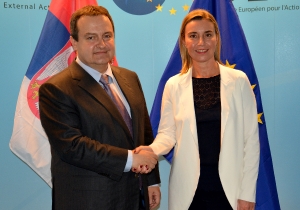
|
|
|
| Minister Dacic met Enlargement Commissioner Johannes Hahn |
|
On the sidelines of the Launch Conference on the EU Strategy for the Adriatic-Ionian Region, which was held November 18 in Brussels, First Deputy Prime Minister and Minister of Foreign Affairs of the Republic of Serbia Ivica Dacic met European Commissioner for Neighbourhood Policy and Enlargement Negotiations Johannes Hahn.
Minister Dacic congratulated Commissioner Hahn on assuming his new duties and underscored the importance of the fact that the representative of Austria, a state that strongly supported the EU enlargement, was the head of this important department.
The Serbian Foreign Minister stressed that Austria, as a neighbour of the Western Balkan region, was well acquainted with the history, culture and politics of the region and understood that this part of the Balkans was facing great challenges, and that it would all have significant implications for the whole EU, its future and development.
At a press conference held after the meeting, Commissioner Hahn emphasized that Serbia was not asked to join the sanctions against Russia, adding that the issue was not related to the opening of chapters in the enlargement process. Hahn told journalists that the decision was a sovereign matter for the Government of Serbia, but that Brussels expected our country to align its foreign policy to that of the EU before becoming its member.
The Serbian Foreign Minister expressed the confidence that Chapter 32, relating to financial control, would be opened very soon and added that almost all EU Member States supported it.
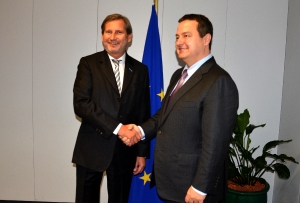 |
|
|
| Launch Conference on the EU Strategy for the Adriatic and Ionian Region (EUSAIR), Brussels, 18 November 2014 |
|
European Commission (DG for Regional and Urban Policy and DG Maritime Affairs and Fisheries Under the Italian Presidency of the EU), under the Italian Presidency of the EU has organized launch conference on the Strategy for the Adriatic and Ionian Region in Brussels on 18 November. The delegation of the Republic of Serbia at the conference was headed by First Deputy Prime Minister and Minister of Foreign Affairs Mr. Ivica Dacic. The conference also attended by representatives of the European Integration Office of the Republic of Serbia, Ministry of Culture and Information, Ministry of Mining and Energy, Ministry of Education and Science, Ministry of Construction, Transport and Infrastructure, Ministry of EU integration.
Minister Dacic said that the EU Strategy for the Adriatic-Ionian region for Republic of Serbia provides a good framework for deepening practical cooperation with Member States and partners in the region in terms of the identification and realization of common interests, strengthening state and local administration, reconstruction of transport infrastructure, tourism development and increase the investment potential in this part of Europe. The development of good infrastructure, economic and cultural ties, may contribute to the implementation of key economic goals and lead to the harmonization of macroeconomic system with EU standards.
Ministers of the countries covered by the EU Strategy for the Adriatic-Ionian region at the conference adopted the Joint statement in which they expressed political support for efforts to implement the Action Plan of the Strategy, with a call for the active involvement of all stakeholders at different levels of state administration in the next steps in the implementation of the EUSAIR.
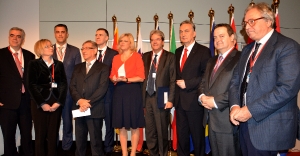
|
|
|
| Bilateral screening meeting for Chapter 13 “Fisheries” was held in Brussels, 14 November 2014 |
|
Bilateral screening meeting for Chapter 13 on Fisheries was held in Brussels, 14 November 2014.
Delegation of the Government of the R. of Serbia was headed by Ms. Tanja Mišćević, Head of the negotiating team and Mr. Danilo Golubović, State Secretary in the Ministry of Agriculture and Environmental Protection and Chair of the Negotiating group 13.
At the Bilateral screening meeting for Chapter 13, chaired by a representative of the Directorate General for Enlargement, the experts of the Directorate General for Maritime Affairs and Fisheries asked questions and gave comments after the presentations of the state of play and planned actions for the transposition of the relevant acquis in the Republic of Serbia. |
|
|
| Bilateral screening meeting for Chapter 7 “Intellectual Property Law” was held in Brussels, 12 – 13 November 2014 |
|
Bilateral screening meeting for Chapter 7 on Social Policy and Employment was held in Brussels, on 12 and 13 of November 2014.
Delegation of the Government of the R. of Serbia was headed by Ms. Branka Totic, Director of the Office for Intellectual Property and Chairman of the Negotiating Group 7, and Ms. Tanja Miščević, Head of Negotiating Team with the EU. In the delegation were representatives of the Ministry of Education Science and Technological Development, Public Prosecutor’s Office, The Supreme Court of Cassation and European Integration Office.
At the bilateral screening meeting for Chapter 7, chaired by a representative of the Directorate General for Enlargement, the representatives of the line-ministries and institutions presented the legal body of the R. of Serbia in the following areas: Trade Marks, Designs, Patents, Supplementary Certificates, Compulsory licensing, Protection of IPRs in criminal law proceedings, Copyright in the information society, Orphan works, Computer Programs, Semiconductors, Term of protection, Rental and public lending rights, Broadcasting via satellite and retransmission by cable, Artist's resale right, Legal protection of databases, Audiovisual performances and Visually impaired. Afterwards, the civil servants were replying to the questions of the experts of DG Employment and DG Internal Market.
At the end of the meeting, Director Ms. Totic fully accepted the transposition of the EU acquis in this area into the legal system of the R. of Serbia. |
|
|
| Minister Kori Udovicki on working visit to Brussels |
|
Deputy Prime Minister and Minister of Public Administration and Local Self-Government Kori Udovicki attended in Brussels on 12 November 2014 the ministerial conference of the West Balkan countries and Turkey.
Kori Udovicki underlined that the reform of the public administration, along with the reforms in judiciary and economy, is one of the key areas necessary to join the EU. She has emphasized that the reforms of the public administration is important not only for accelerating the European integration of Serbia, but also for the better life of the citizens.
After the conference, the line ministers signed the joint declaration on the main principles in the area of state administration and local self-government.
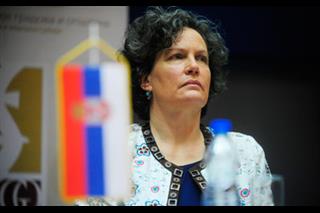 |
|
|
| Bilateral screening meeting for Chapter 8 “Competition policy” was held in Brussels, 4 – 5 November 2014 |
|
Bilateral screening meeting for Chapter 8 on Competition policy was held in Brussels, on 4 and 5 November 2014.
Delegation of the Government of the R. of Serbia was headed by Ms. Vesna Kovač, State Secretary in the Ministry of Trade, Tourism and Telecommunications and Chairwoman of the Negotiating Group 8, and Ms. Tanja Miščević, Head of Negotiating Team with the EU. In the delegation were representatives of the Ministry of Trade, Tourism and Telecommunications, Ministry of Finance, Ministry of Construction, Transport and Infrastructure, Ministry of Education, Science and Technological Development, Ministry of Culture and Information, Ministry of Economy, Ministry of Agriculture and Environmental Protection, Central Bank of Serbia, Commission for Competition Protection, Commission for State Aid Control, Accreditation Body of Serbia, Export Credit and Insurance Agency and European Integration Office.
At the bilateral screening meeting for Chapter 8, chaired by a representative of the Directorate General for Enlargement, the representatives of the line-ministries and institutions presented the legal body of the Republic of Serbia in the following two areas: 1) Antitrust and Mergers and 2) State Aid. After the presentations, Serbian civil servants were replying to the questions of the experts of DG Competition and DG Enlargement.
At the end of the meeting, State Secretary Ms. Vesna Kovač accepted the transposition of the EU acquis in this area into the legal system of the Republic of Serbia. |
|
|
| Bilateral screening meeting for Chapter 12 “Food Safety, Veterinary and Phytosanitary Policies” |
|
Bilateral screening meeting for Chapter 12 on Food Safety, Veterinary and Phytosanitary Policies was held in Brussels, 20-24 October 2014.
Delegation of the government of the R. of Serbia was headed by Mr. Danilo Golubović, State Secretary in the Ministry of Agriculture and Environmental Protection and Chair of the Negotiating group 12. In the delegation, apart from the representatives of the Ministry of Agriculture and Environmental Protection, there were representatives of the Ministry of Health. At the Bilateral screening meeting for Chapter 12, chaired by a representative of the Directorate General for Enlargement, the experts of the Directorate General for Health and Consumers asked questions and gave comments after the presentations of the state of play and planned actions for the transposition of the relevant acquis in the Republic of Serbia.
The Report is expected at the beginning of February 2015. |
|
|
| Meeting of First Deputy Prime Minister and Minister of Foreign Affairs Dacic with High EU Representative for Foreign Affairs and Security Policy Ashton |
|
First Deputy Prime Minister and Minister of Foreign Affairs Ivica Dacic had on 21 October in Brussels a farewell meeting with High EU Representative for Foreign Affairs and Security Policy Catherine Ashton.
Dacic thanked Ashton on the patience she demonstrated during the lengthy sessions on the normalisation of relations with Pristina. He said that Ashton was the only objective mediator in the crises in the Western Balkans and expressed gratitude to Ashton for helping Serbia launch the EU accession negotiations this year. Dacic underscored that Serbia is committed to its EU path, and added that the country will implement all points it agreed to take on by signing the Brussels agreement.
Ashon acknowledged the statesmanlike courage that Dacic demonstrated during the dialogue and his persistence on the European path.
At the end of the meeting, Dacic presented Ashton with the icon of the Holy Lady Theotokos as the protectress of the Serbian people.
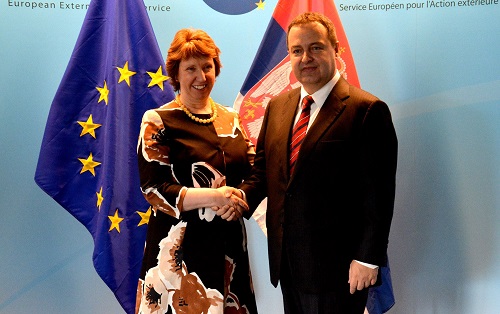 |
|
|
| Explanatory screening meeting for Chapter 16 “Taxation” was held in Brussels, 14 – 15 October 2014 |
|
Explanatory screening meeting for Chapter 16 on Taxation was held in Brussels on 14 and 15 October 2014.
Delegation of the Government of the Republic of Serbia was headed by Mr. Nenad Mijailovic, State Secretary in the Ministry of Finance and Head of the Negotiating group 16. In the delegation were also other representatives of the Ministry of Finance, as well as Tax Administration, Customs Administration, Negotiating Team with the EU and European Integration Office.
At the explanatory screening meeting for Chapter 16, chaired by a representative of the Directorate General for Enlargement, the experts of the Directorate-General for Taxation and Customs Union presented in detail the relevant acquis divided into three parts: direct taxation, indirect taxation and administrative cooperation.
The bilateral screening meeting, in which the Serbian side will present its legal system in this area, as well as gaps in relation to the EU acquis, is scheduled for 5 and 6 March 2015.
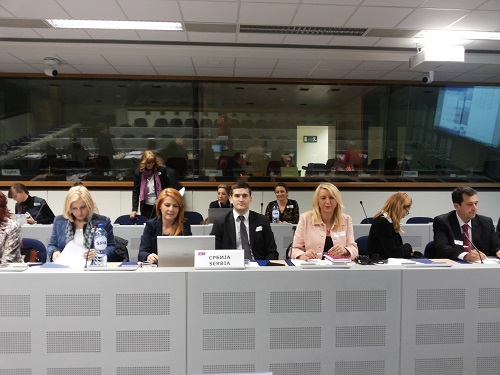 |
|
|
| Bilateral screening meeting for Chapter 31 “Foreign, Security and Defence Policy” |
|
Bilateral screening meeting for Chapter 31 “Foreign, Security and Defence Policy” was held in Brussels, on 10 October 2014.
Bilateral screening for Chapter 31 started with the speech of Mr. Ivica Dacic, Minister of Foreign Affairs of the Republic of Serbia, accompanied by the delegation of the Government of the Republic of Serbia that consisted of Ms. Tanja Miscevic, Chief negotiator with the EU and representatives of Ministry of Foreign Affairs, Ministry of Defence, Ministry of Justice, Security Information Agency and Office of the Council on National Security.
In his introductory speech, Mr. Dacic emphasized the Serbian’s commitment to join the EU and importance of the Chapter 31. The Republic of Serbia, as a candidate country for the EU accession, actively contributes to the efforts to preserve international peace and stability, which will remain the cornerstone of Serbian diplomacy during the forthcoming OSCE presidency.
At the bilateral screening meeting for Chapter 31, chaired by a representative of the Directorate General for Enlargement, together with the European External Action Service and the Service for Foreign Policy Instruments, the Serbian delegation presented and answered relevant questions in relations to general overview and implementation strategies for Foreign, Security and Defence Policy (CFSP/CSDP).
At the end of the meeting, Mr. Filipovic, on behalf of the Serbian delegation, accepted the transposition of the EU acquis in this area into the legal system of the Republic of Serbia.
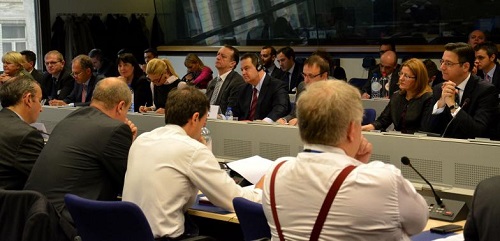 |
|
|
| EPC Policy Briefing with Serbian First Deputy Prime Minister and Minister of Foreign Affairs Ivica Dacic, 10 October 2014, Brussels |
|
EU membership is the first priority of this government and there is no doubt about that, First Deputy Prime Minister and Minister of Foreign Affairs Ivica Dačić said in his speech at the European Policy Center Briefing „Serbia’s accession negotiations with the EU: the toolkit fot the to-do list“, in Brussels 10 October 2014.
Dačić expressed hope that Serbia will open the first chapters in the EU accession talks as early as this year. "I know that some EU member states do not share the view that the chapters be opened during the Italian presidency, but we will continue to move towards Europe anyway, at an unrelenting pace," he said.
In regards to the development of the Belgrade-Priština relations, Dačić underlined that Serbia is firmly committed to a continuation of the dialogue, adding that anything that does not interfere with the matter of Kosovo's status is acceptable to Belgrade.
On the issue of alignment, Dačić said that Serbia will gradually align its diplomacy to the EU's common diplomacy. "We are aware of our obligations and there are no disputes about them - the only thing that we do not agree on with the EU is the anti-Russian embargo, which we cannot support, just like we do not support Russia's embargo on EU food imports," Dačić said.
Serbia is not only aligning its foreign policy to that of the EU, but also its security policy, which is reflected by its participation in peacekeeping operations and the joint fight against terrorism, Dačić noted.

For the short EPC summary of the briefing, please click here. |
|
|
| Bilateral screening meeting for Chapter 30 “External Relations” |
|
Bilateral screening meeting for Chapter 30 “External Relations” was held in Brussels, on 9 October 2014.
The delegation of the government of the Republic of Serbia was headed by Mr. Stevan Nikcevic, State Secretary in the Ministry for Trade, Tourism and Telecommunications, and Ms Tanja Miščević, Head of the Negotiating Team with the EU. In the Serbian delegation were also other representatives of the Ministry for Trade, Tourism and Telecommunications, Ministry of Foreign Affairs, Ministry of Finance, Ministry of Internal Affairs, Serbian Export Credit and Insurance Agency and Serbian European Integration Office.
At the bilateral screening meeting for Chapter 30, chaired by a representative of the Directorate General for Enlargement, the representatives of the line-ministries and institutions presented the legal body of the Republic of Serbia in the following areas: Common Commercial Policy, Application of EC Trade Policy Aspects, WTO, Implementation of Trade Policy and FTAs (Customs and Quotas), Dual Use Export Controls, Anti-Torture Regulation, Bilateral Investment Treaties, Export Credits, Development Policy and Humanitarian aid. After the presentations, the civil servants were replying to the questions of the experts ofthe Directorates-Generalfor Trade, Development, Service for Foreign Policy Instruments, Humanitarian Aid and Civil Protection.
At the end of the meeting, State Secretary Mr. Nikcevic accepted the transposition of the EU acquis in this area into the legal system of the R. of Serbia. |
|
|
| Serbia receives the 2014 Progress Report from European Commission |
|
Prime Minister Aleksandar Vucic stated on 8 October, after being delivered the 2014 Progress Report on Serbia’s results in the European integration process by Head of the EU Delegation to Serbia Michael Davenport, that Serbia has done an important job and got the best assessments in the region from the European Commission. The Prime Minister said and pointed out that in certain areas, such as the judiciary and the environment, he himself would be even stricter than the European Commission.
The Prime Minister expressed his gratitude to the European Commission for understanding the difficult steps that the government will implement in the economy, and underlined that he is satisfied with the assessment of regional policy, and that Serbia will remain dedicated to the preservation of full regional stability. Regarding the situation in the field of protection of human rights, the Prime Minister said that it is objectively presented in the Report both in the case of national minorities and the Pride Parade.
I am particularly proud of the fact that the Report acknowledges the fight against crime and corruption, Vucic said.
The Report also states, he added, that media freedom should be improved, but that a significant progress in the area of information society and the media has been made with the passing of three media laws. Vucic undrelined that the issue of foreign policy is particularly important, and Serbia is doing everything it can to respect and follow the processes and policies of the EU.
Head of the EU Delegation to Serbia Michael Davenport stated that this is a very important day for Serbia and for the Union, and that, despite the difficulties and challenges, negotiations go as planned and not a single day has been lost. He noted that it is very important that Serbia has taken steps for negotiations to become an inclusive process, where, as he said, it is essential that Serbia continues to be committed to regional cooperation and full implementation of the agreement between Belgrade and Pristina.
It is clear, he stated, that Serbia must focus on the rule of law, media freedom, freedom of expression, the implementation of media strategy and the reform of the public administration. According to him, Serbia is expected to gradually harmonise its views with those of the EU in terms of security policy, as well as to increase efforts in harmonisation with EU standards in the fields of environment and energy.
The EU will support Serbia in all its efforts to meet its requirements, Davenport confirmed and announced that instruments for pre-accession assistance will be the main common financial instrument.
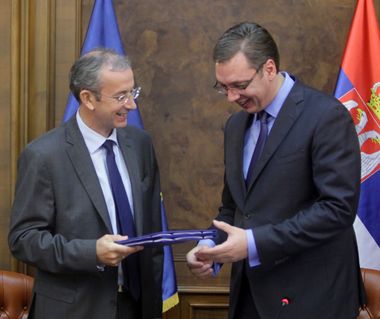 |
|
|
| Explanatory screening meeting for Chapter 25 “Science and Research” was held in Brussels, 6 October 2014 |
|
Explanatory screening meeting for Chapter 25 on Science and Research was held in Brussels, on 6 October 2014.
Delegation of the government of the R. of Serbia was headed by Mr. Viktor Nedović, Assistant Minister in the Ministry of Education, Science and Technological Development, and Ms. Tanja Miščević, Head of the Negotiating Team with the EU. In the delegation were also other representatives of the Ministry of Education, Science and Technological Development, Ministry of Agriculture and Environmental Protection, Innovation Fund, Centre for Science Promotion, Intellectual Property Office, University in Niš and European Integration Office.
At the explanatory screening meeting for Chapter 25, chaired by a representative of the Directorate General for Enlargement, the experts of the Directorate-General for Research and Technological Development presented in detail the relevant acquis divided in to the following parts: Cooperation in the field of policy: Research and Innovation; Programmes; Other EU actions and instruments; Innovation Union; European Research Area.
The bilateral screening meeting, when the Serbian side will present its legal system in this area, as well as gaps in relation to the EU acquis, is scheduled for 1 December 2014. |
|
|
| Reception on the occasion of the visit of representatives of the Foreign Investors Council |
|
In honour of Foreign Investors Council visit to Brussels the Mission of the Republic of Serbia to the EU organised a reception on 2 October 2014. Ambassador D.Lopandić, Head of the Mission of Serbia to the EU, V.Arsić, ambassador of Serbia to the Belgium and Luxembourg and F.Coin, President of the Foreign Investors Council and chairman of the board of Societe Generale Bank in Serbia in their statements informed participants about the measures taken by the Government of the Republic of Serbia, the EU accession process, as well as the possibilities of enhancing economic cooperation.
Reception was attended by several representatives of the EU Commission, members of the European Parliament, members of the Working Party on Enlargement and Countries Negotiating Accession to the EU (COELA) and various international and Belgian organizations and diplomatic missions.
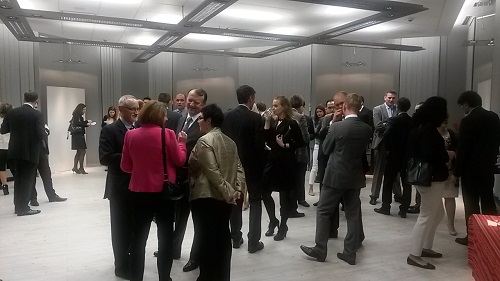
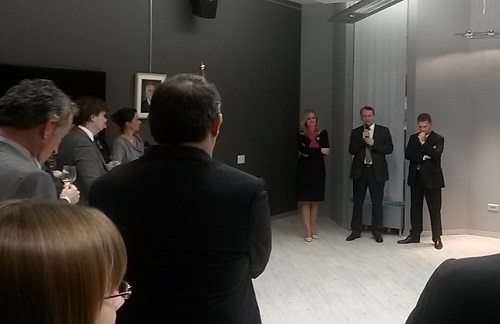 |
|
|
| Explanatory screening meeting for Chapter 22 “Regional Policy and Co-ordination of Structural Funds” was held in Brussels, 1 – 2 October 2014 |
|
Explanatory screening meeting for Chapter 22 on Regional Policy and Co-ordination of Structural Funds was held in Brussels, on 1 and 2 October 2014.
Delegation of the government of the Republic of Serbia was headed by Ms. Ana Ilić, Deputy Director of the European Integration Office and Chair of the Negotiating group 22. In the delegation were also other representatives of the Office, as well civil servants from the Ministry of Finance, Ministry of Public Administration and Local Self-government, Ministry of Education, Science and Technological Development, Ministry of Economy, Ministry of Agriculture and Environmental Protection, Audit Authority Office, General Secretariat of the Government, Republic Secretariat for Public Policies, Republic Statistical Bureau and Social Inclusion and Poverty Reduction Team.
At the explanatory screening meeting for Chapter 22, chaired by a representative of the Directorate General for Enlargement, the experts of the Directorate-General for Regional and Urban Policy and Directorate-General for Employment, Social Affairs and Inclusionpresented in detail the relevant acquis divided in to the following parts: general principles and objectives, legislative framework, programming, institutional framework, administrative capacity, monitoring, evaluation, management and control systems, information and publicity, and financial management.
The bilateral screening meeting, when the Serbian side will present its legal system in this area, as well as gaps in relation to the EU acquis, is scheduled for 28 and 29 January 2015. |
|
|
| Explanatory screening meeting for Chapter 13 “Fisheries” was held in Brussels, 30 September 2014 |
|
Explanatory screening meeting for Chapter 13 on Fisheries was held in Brussels, on 30 September 2014.
Delegation of the government of the R. of Serbia was headed by Mr. Danilo Golubović, State Secretary in the Ministry of Agriculture and Environmental Protection and Chair of the Negotiating group 13. In the delegation apart from the representatives of the Ministry of Agriculture and Environmental Protection there was one representative of the European Integration Office.
At the explanatory screening meeting for Chapter 13, chaired by a representative of the Directorate General for Enlargement, the experts of the Directorate General Maritime Policy and Fisheries presented in detail the relevant acquis.
The bilateral screening meeting, when the Serbian side will present its legal system in this area, as well as gaps in relation to the EU acquis, is scheduled for 14 November 2014. |
|
|
| Explanatory screening meeting for Chapter 7 “Intellectual Property Law” was held in Brussels, 24 – 25 September 2014 |
|
Explanatory screening meeting for Chapter 7 on Intellectual Property Law was held in Brussels, on 24 and 25 September 2014.
Delegation of the government of the R. of Serbia was headed by Ms. Branka Totić, Director of the Intellectual Property Office and Chair of the Negotiating group 7. In the delegation were also other representatives of the Office, as well civil servants from the Ministry of Education, Science and Technological Development, Ministry of Agriculture and Environmental Protection, Public Prosecution Office, Supreme Court of Cassation and European Integration Office.
At the explanatory screening meeting for Chapter 7, chaired by a representative of the Directorate General for Enlargement, the experts of the Directorate General for Internal Market presented in detail the relevant acquis divided into following three parts: copyrights and neighbouring rights, industrial property rights and enforcement.
The bilateral screening meeting, when the Serbian side will present its legal system in this area, as well as gaps in relation to the EU acquis, is scheduled for 12 and 13 November 2014. |
|
|
| Explanatory screening meeting for Chapter 27 – Environment |
|
Explanatory screening meeting for Chapter 27 – Environment, was held in Brussels between 15 and 19 September 2014.
Delegation of the government of the Republic of Serbia was headed by Stana Bozovic, State secretary in the Ministry of Agriculture and Environmental Protection and Tanja Miscevic, Head of Negotiating Team with the EU. In the delegation were also representatives of the Ministry of Agriculture and Environmental Protection, Ministry of Mining and Energy, Ministry of Interior, Serbian European Integration Office, Serbian Environmental Protection Agency, Republic Geodetic Authority, Institute for Hygiene and Environmental Medicine and Provincial Secretariat for Urbanism, Construction and Environmental Planning.
During the meeting European Commission experts presented EU horizontal legislation in the area of environment, as well as legislation in the areas of air quality, noise, waste management, civil protection, water management, nature protection, chemicals, industrial pollution, risk management and climate change. |
|
|
| Bilateral screening meeting for Chapter 1 “Free movement of goods” |
|
Explanatory screening meeting for Chapter 27 – Environment, was held in Brussels between 15 and 19 September 2014.
Delegation of the government of the Republic of Serbia was headed by Stana Bozovic, State secretary in the Ministry of Agriculture and Environmental Protection and Tanja Miscevic, Head of Negotiating Team with the EU. In the delegation were also representatives of the Ministry of Agriculture and Environmental Protection, Ministry of Mining and Energy, Ministry of Interior, Serbian European Integration Office, Serbian Environmental Protection Agency, Republic Geodetic Authority, Institute for Hygiene and Environmental Medicine and Provincial Secretariat for Urbanism, Construction and Environmental Planning.
During the meeting European Commission experts presented EU horizontal legislation in the area of environment, as well as legislation in the areas of air quality, noise, waste management, civil protection, water management, nature protection, chemicals, industrial pollution, risk management and climate change.
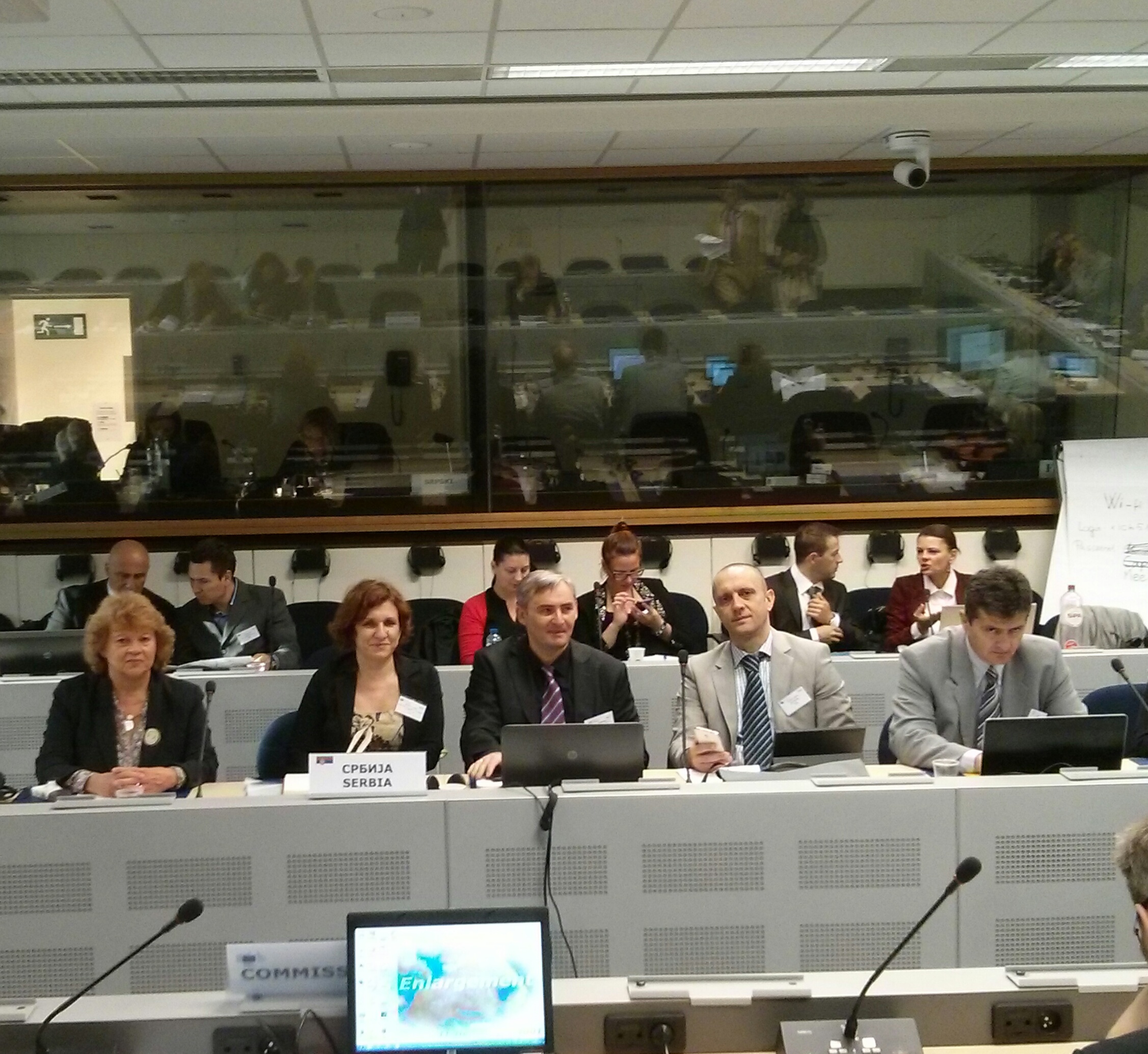
|
|
|
| COELA visit to Serbia |
|
Members of the Committee on EU enlargement of the Council of European Union (COELA) visited Serbia on 10-12 September 2014, at the proposal of Italy as the EU presiding country. The delegation had separate meetings with President of the Republic of Serbia Tomislav Nikolic, First Deputy Prime Minister and Minister of Foreign Affairs Ivica Dacic, Minister of Interior Nebojsa Stefanovic, Minister of Justice Nikola Selakovic, Minister of Finance Dusan Vujovic, Minister without portfolio responsible for European integration Jadranka Joksimovic, Head of the Negotiating Team for EU Accession Tanja Miscevic, Head of the Office for Kosovo and Metohija Marko Djuric, Deputy Speaker of the Parliament Gordana Comic and Chairman of the European Integration Committee Aleksandar Senic.
During his meeting with members of COELA, President of the Republic of Serbia Tomislav Nikolic pointed out that full EU membership is the first Serbian government’s priority. He stressed that we are very dedicated to this goal and committed to fininshing negotiations by 2018. He said that Serbia is dedicated to the conducting of reforms in all areas, especially in the fileds of rule of law, internal affairs, protection of human and minority rights. President Nikolic pointed out that EU membership perspective had a positive affect on the Balkans, where cooperation has been established within concrete project and where all open issues are being resolved only by dialogue.
First Deputy Prime Minister and Minister of Foreign Affairs Ivica Dacic informed members of COELA about the reform and legislative activities carried out in Serbia. He said he expects the European Union to recognize and acknowledge the efforts made by our side in the EU integration process and allow it to open the first chapters in accession talks by the end of 2014. Dačić said that the screening conducted so far has been described as successful, noting that the screening process is completed for 14 and still underway for 7 EU acquis chapters, so Serbia has thus demonstrated that it possesses adequate administrative capacities.
Minister without Portfolio responsible for European integration Jadranka Joksimovic presented to representatives of the COELA the priorities of the Serbian government in achieving the foreign policy strategic goal to harmonise its domestic legislation with that of the EU by the end of 2018. She stressed that this is a realistic goal based on the implementation of the contractual obligations arising from the Stabilisation and Association Agreement, as well as on a comprehensive reform process which the goverenment pursues. Joksimovic pointed out that the EU enlargement is in mutual interest and the policy in which everyone wins.
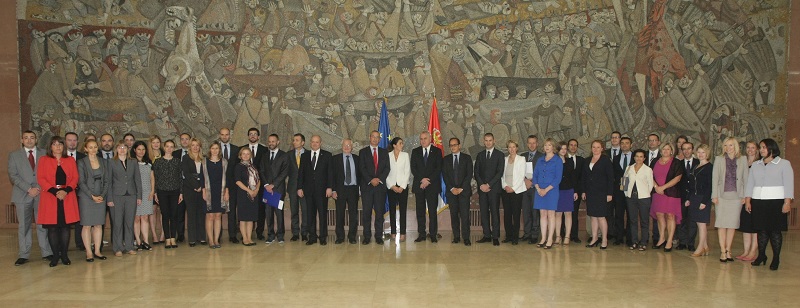
|
|
|
| Article of Ambassador Dusko Lopandic in magazine “The Parliament” (21.07.2014.) – „EU membership remains „top priority“ for Serbian government“ |
|
For the article of Ambassador Dusko Lopandic in magazine “The Parliament” (21.07.2014.) – „EU membership remains „top priority“ for Serbian government“, please click here |
|
|
| Donors’ conference in Brussels for the purpose of raising aid for Serbia and Bosnia and Herzegovina after the catastrophic floods in May |
|
Donors’ conference, for the purpose of raising aid for Serbia and Bosnia and Herzegovina after the catastrophic floods in May, was organised in Brussels, 16 July 2014, by European Commission, France and Slovenia. Delegations of over 60 countries and 23 international organisations, as well as representatives from the civil society and private sector who participated in this conference, manage to gather a total of 1,846 million euros.
The Serbian delegation, which was led by President Tomislav Nikolic, also included First Deputy Prime Minister and Minister of Foreign Affairs Ivica Dacic, Minister without portfolio responsible for European integration Jadranka Joksimovic, Director of the Office for assistance and recovery of the flooded areas Marko Blagojevic, Ambassador to the EU Dusko Lopandic and Advisor to the Serbian President Ivan Mrkic.
Serbian President Tomislav Nikolic said that 995 million euros in favorable loans and grants had been earmarked for Serbia at the international donors’ conference, adding that he was very pleased and proud about it. “A total of 1,846 million euros, of which 995 million for Serbia, partly in the most favorable loans possible, partly in grants, which are allocated to us to deal with the problem and remove all the consequences of the flooding, have been collected,” Nikolic said. He expressed his gratitude to all participants of the conference for their solidarity and support.
First Deputy Prime Minister and Minister of Foreign Affairs Ivica Dacic expressed gratitude to the countries that allocated significant funds, concrete humanitarian aid and sent their crisis response teams. He said the region of the Balkans in times of this terrible natural disaster really showed a high degree of solidarity and, in a way, demonstrated the core of regional cooperation. He underlined his strong believe that we have demonstrated that as a region we belong to the system of values fostered by the European Union.
Commissioner Stefan Fule said that the European Union will allocate a total of EUR 195 million for the rehabilitation of flood affected regions in Serbia and Bosnia-Herzegovina, underlining that the money was coming from EU institutions, and the figure did not include donations by individual member states. He pointed out that donors will provide part of funds for reconstruction, but that it is up to the countries that were affected by floods to use these funds to their best ability, and announced that in six months a conference will be held to check how the funds were used.
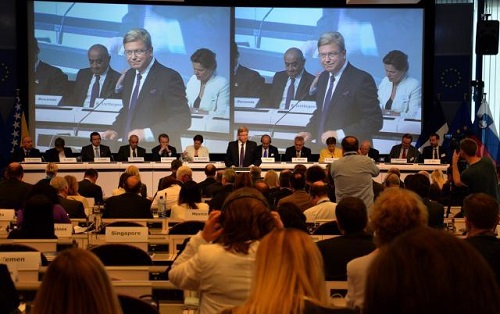
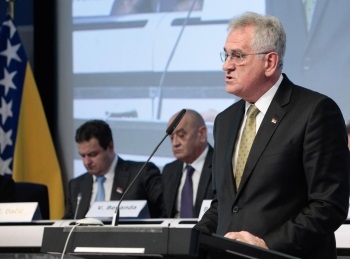
|
|
|
| Serbia submits first version of application for funding from EU Solidarity Fund |
|
Minister without portfolio responsible for European integration Jadranka Joksimovic stated that Serbia can expect between €40-50 million in unrepayable aid from the EU Solidarity Fund for the clean-up of the damage caused by the May flooding. After the meeting on 16 July with European Commissioner for Regional Policy Johannes Hahn in Brussels, Joksimovic said that these funds could be available to Serbia in November or December. The Minister noted that this sum will be approved irrespective of the funds that will be raised at the donors’ conference. According to her, the funds will be used for the rehabilitation of public infrastructure, i.e. power plants, roads, capital projects, flood prevention, but not for the reconstruction of private houses. Joksimovic said that the funds will be available for use retroactively too, or for projects that Serbia launches until November. She added that she delivered the first version of the application for funding from the Solidarity Fund to Commissioner Hahn today, to which he will make comments by the end of the week. The Minister confirmed that Serbia will submit the official application before the deadline of 5 August, after which it will enter into a procedure envisaging that the European Commission, within six weeks, analyses and determines whether the data submitted is correct, after which the European Parliament and the European Council will approve funds to Serbia.
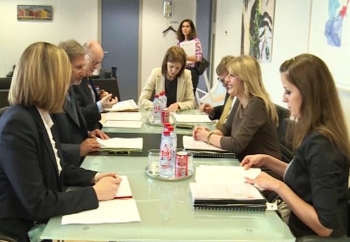
|
|
|
| Explanatory screening meeting for Chapter 31 – Foreign, Security and Defense policy took place on July 15, 2014 in Brussels; this effectively opened the process of the analytical examination of the acquis in this area. |
|
The Ministry of Foreign Affairs of Serbia is responsible for coordination on the Serbian side, and their representatives, together with experts from other relevant state institutions, were present at the meeting, alongside Commission, EEAS and Member States’ representatives. The explanatory screening for Chapter 31 brings the total number of chapters examined, since this process has started, to 21. It is expected that the whole screening process, for all 35 chapters, will be wrapped up by March 2015. EC representatives expressed their satisfaction with the conduct of process so far, underlining that the Serbian state administration showed a high level of readiness and commitment to the European integration process and reforms.
|
|
|
| Bilateral screening meeting for Chapter 10 “Information society and media” |
|
Bilateral screening meeting for Chapter 10 on Information society and media was held in Brussels on 10 and 11 July 2014. The delegation of the Republic of Serbia was led by Ms. Irini Reljin, Advisor to the Minister of Trade, Tourism and Telecommunications and Ms. Tanja Miščević, Chief Negotiator. Our legal framework and status of harmonization with EU legislation was presented to the European Commission by representatives of various ministries: Ministry of Trade, Tourism and Telecommunications, Ministry of Culture and Information, Ministry of Interior, Ministry of Defence, Regulatory Agency for Electronic Communications and Postal Services, Public Broadcasting Agency, and Serbian European Integration Office. During the meeting our side also presented the package of three media laws that have been drafted and prepared for adoption. Chapter 10 consists of three main areas Electronic communication, Information society and Audiovisual policy. At the end of the meeting Irini Reljin confirmed that Serbia accepts EU acquis in this area.
|
|
|
| Explanatory screening meeting for Chapter 30 “External relations” |
|
Bilateral screening meeting for Chapter 30 on External relations was held in Brussels on 2 July 2014. The delegation of the Republic of Serbia was led by State Secretary in the Ministry of Trade, Tourism and Telecommunications Mr. Stevan Nikčević and Mr. Vladimir Međak, Assistant Director in the Serbian European Integration Office. In the Serbian delegation were also representatives of the Ministry of Trade, Tourism and Telecommunications, Ministry of Foreign Affairs, Ministry of Interior, Serbian Export Credit and Insurance Agency and Serbian European Integration Office. During the meeting European Commission experts presented EU legislation primarily in the areas of trade, bilateral investment treaties and development and humanitarian aid. In particular, it was pointed out that precondition for Serbia's EU membership is to conclude the process of the accession to the World Trade Organization. Bilateral screening will be held on 9 October 2014.
|
|
|
| Bilateral screening meeting for Chapter 20 “Enterprise and Industrial Policy” was held in Brussels |
|
Bilateral screening meeting for Chapter 20 on Enterprise and Industrial Policy was held in Brussels on 1 July 2014.
Delegation of the government of the R. of Serbia was headed by Mr. Dejan Radulović, Assistant Minister in the Ministry of Economy and Chairman of the Negotiating Group 20, and Mr. Vladimir Međak, Assistant Director in the Serbian European Integration Office, on behalf of the Head of Negotiating Team with the EU. In the delegation were representatives of the Ministry of Economy, Ministry of Finance, Ministry of Education, Science and Technological Development, Ministry of Construction, Transport and Infrastructure, Ministry of Trade, Tourism and Telecommunications and Serbian European Integration Office.
At the bilateral screening meeting for Chapter 20, chaired by a representative of the Directorate General for Enlargement, the representatives of the line-ministries presented the legal body and strategic documents of the R. of Serbia in the area of industrial policy in general and by sectors. After the presentations, the civil servants were replying to the questions of the experts of DG ENTR and DG ELARG.
At the end of the meeting, Assistant Minister Radulović accepted the transposition of the EU acquis in this area into the legal system of the R. of Serbia.
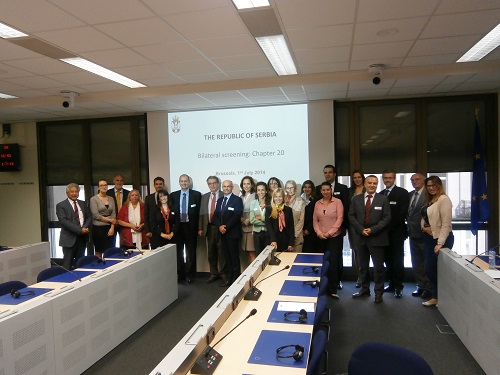
|
|
|
| Signing of the Horizon 2020 association agreement with Serbia |
|
Brussels, July 1, Five Western Balkan countries (Albania, Bosnia and Herzegovina, the former Yugoslav Republic of Macedonia, Montenegro and Serbia), and the Republic of Moldova secured full access to the European Union's new seven year research and innovation programme, Horizon 2020.
On behalf of Serbia, the agreement was signed by minister for education, science and technological development Mr Srdjan Verbic.
Association agreements will apply retroactively from 1 January 2014.
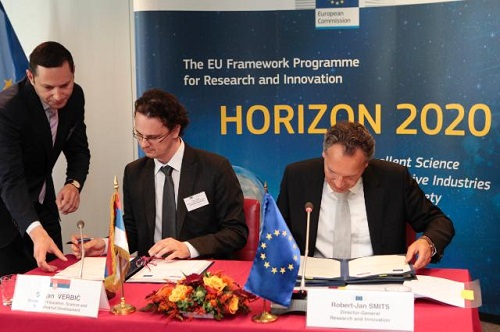
|
|
|
| Barroso meets with Nikolic and Vucic |
|
President of the European Commission Jose Manuel Barroso visited Serbia on June 29, where he met with Serbian president Tomislav Nikolic and Prime Minister Aleksandar Vucic.
Serbian President Tomislav Nikolic has thanked European Commission President Jose Manuel Barroso for the support for Serbia on its path towards the EU. The Serbian president said that the aid the European Union has given Serbia after the catastrophic floods in May showed that Serbia can count on a lot bigger European family. Nikolic said he and Barroso discussed a donors' conference, to be organized by the the EU in cooperation with the United Nations, where solidarity between the countries of the world and Bosnia-Herzegovina and Serbia will be put to work.
Speaking about political issues, Nikolic said that Western Balkans’ future is very uncertain without Serbia in the EU.
Prime Minister Aleksandar Vucic thanked Barroso for the assistance and support that the EU has provided to Serbia after the catastrophic floods that hit our country. He reiterated that full membership of Serbia in the EU is the priority of this government, and expressed his belief that our country will meet all requirements for accession by 2018, and after that all the decisions will be up to EU member states.
The Prime Minister stressed that, although there are many tasks ahead of Serbia and although economic reforms will not bring immediate prosperity, our country must implement radical changes if it wants to become part of the Union.
The President of the European Commission stated that the EU will continue to strongly support Serbia's European path so that our country could become a full EU member as soon as possible. Barroso said that Serbia has made big progress towards European integration and that the EU is building a stronger partnership with it, noting that negotiations for accession are running very well.
He pointed out that the screening is now open for 18 out of the 35 chapters, and welcomed the efforts made by the government of Serbia aimed at strengthening the rule of law, the fight against corruption and crime, respect for human rights and reform of the public administration. Referring to dialogue between Belgrade and Pristina, he said that both sides have shown vision and courage, which has been materialised through a number of agreements.
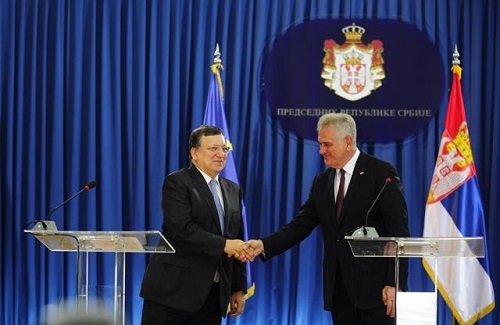
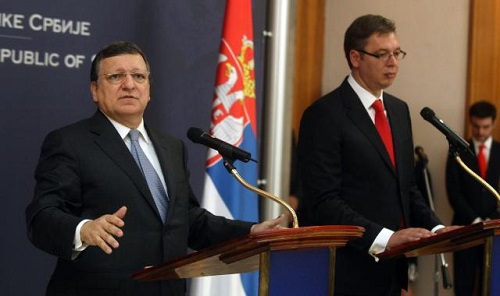
|
|
|
| Bilateral screening meeting for Chapter 19 “Social Policy and Employment” was held in Brussels, 24–26 June2014 |
|
Bilateral screening meeting for Chapter 19 on Social Policy and Employment was held in Brussels, between 24 and 26 June 2014.
Delegation of the government of the R. of Serbia was headed by Mr. Laszlo Csikos, State Secretary in the Ministry of Labour, Employment, Veteran and Social Issues and Chairman of the Negotiating Group 19, and Ms. Tanja Miščević, Head of Negotiating Team with the EU. In the delegation were representatives of the Ministry of Labour, Employment, Veteran and Social Issues, Ministry of Health, Ministry of Construction, Transport and Infrastructure, Republic Institute for Social Protection, National Employment Service, European Integration Office and Team for Poverty Reduction and Social Inclusion.
At the bilateral screening meeting for Chapter 19, chaired by a representative of the Directorate General for Enlargement, the representatives of the line-ministries and institutions presented the legal body of the R. of Serbia in the following areas: Health and Safety at Work, Labour Law, Social Dialogue, Employment Policy, European Social Fund, Social Protection, People with Disabilities, Anti-discrimination and Equal Opportunities. After the presentations, the civil servants were replying to the questions of the experts of DG Employment and DG JUST.
At the end of the meeting, State Secretary Csikos accepted the transposition of the EU acquis in this area into the legal system of the R. of Serbia.
|
|
|
| Protocol to the SAA to take account of the accession of Croatia to the EU, 25th June 2014 |
|
Head of Mission of the Republic of Serbia to the EU, Ambassador Duško Lopandić has signed on 25 June 2014 in Brussels on behalf of the Government of Serbia Protocol to the Stabilisation and Association Agreement (SAA) between the European Communities and their Member States, of the one part, and the Republic of Serbia, of the other part, to take account of the accession of the Republic of Croatia to the European Union. Theodoros N. Sotiropoulos, Ambassador, Permanent Representative of the Hellenic Republic to the European Union and Christian Danielsson, Director General for Enlargement at the European Commission have signed the Protocol for the European Union and its Member states. The aim of Protocol is to adapt concession in the SAA to concessions that were effective in CEFTA. In fact, Croatia has left the trade regime, which was regulated by the CEFTA and the legal framework for trade between Croatia and Serbia became the SAA. The Protocol will enter into force provisionally on 1 August 2014 which is first day of the second month following the signing
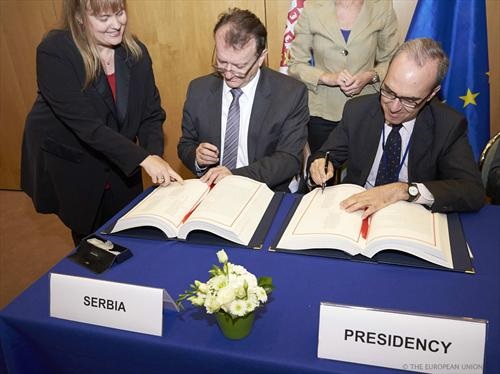
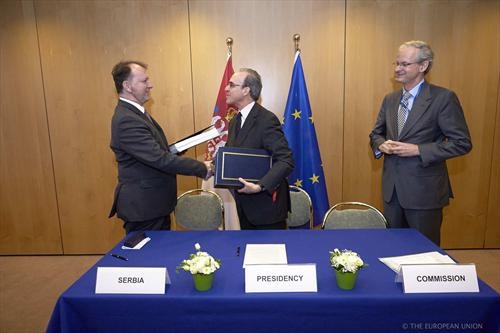
|
|
|
| Serbian Customs Authorities representative presiding over Subcommittee again |
|
In Brussles, on July 12 and 13, the 67th session of the Subcommittee for Information Technologies of the World Customs Organisation (WCO) was held. The session was presided over by the representative of the Serbian Customs Authorities, Gordana Vidanović, the counsellor for customs affairs in the Mission of Republic of Serbia in Brussels. Subcommittee for Information Technologies is responsible for initiation of activities and studies in the sphere of informatics in customs business. The goal of these activities is improvement of the efficiency of customs controls, more efficient realisation of trade benefits and identification of ways for improvement of the existing information systems as well as cost reducing. The session was especially important as questions regarding the achieved agreement about trade benefits of the WTO were discussed. Namely, the WCO Secretariat provided the analysis of the effects of the achieved agreement on customs IT systems and need for changes in the customs’ IT systems. There was some word about the product identification codes, about updating the Manual for single window and about data model for WCO. At the end of the meeting, the elections for the President over Subcommittee for Information Technologies of the WCO were held. Gordana Vidanović, representative of Serbian Customs Authorities, was re-elected for another term
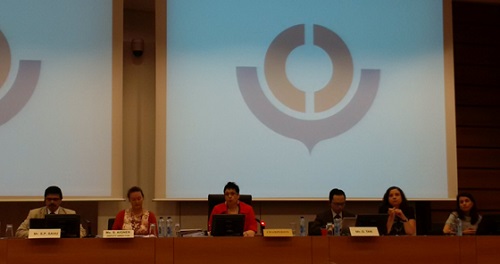
|
|
|
| Serbia signed Creative Europe agreement |
|
Minister of Culture and Information Ivan Tasovac and European Commissioner for Education, Culture, Multilingualism and Youth Androulla Vassiliou signed on June 19 in Brussels an agreement on Serbia’s participation in the "Creative Europe" programme. Tasovac underlined that Serbia is the first candidate country for membership in the EU to take part in "Creative Europe", whose total budget amoun ts to €1.46 billion. He said that from this day, Serbia is formally a member of Creative Europe and not just symbolically. Serbian Minister said that the Ministry of Culture and Information has already set up the „Creative Europe“ desk, which will organise it’s first international conference by the end of this month, with participation of experts from more than 10 European countries. European Commissioner for Education, Culture, Multilingualism, Sport, Media and Youth Androulla Vassiliou, who signed the agreement on behalf of the EC, said that she is satisfied with the fact that the signing of the agreement would make it possible for Serbia to use the benefits of the programme. Vassiliou stressed that Serbia is a country with a number of museums, theatres, recognised music festivals and literary tradition dating back to the 11th century. With its culture of everyday life, extraordinary Old Roman and Early Byzantine architectural heritage which is included in the UNESCO list of world monuments of culture, Serbia enriches the joint European cultural space.
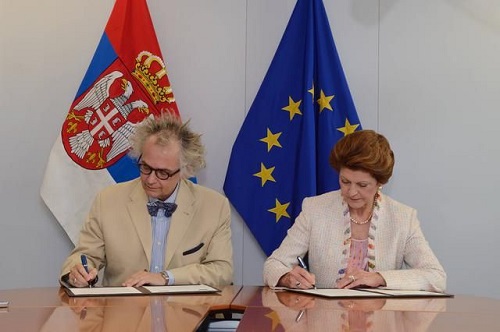
|
|
|
| Bilateral screening for the Chapter 15 – Energy and Chapter 21 – Trans European Network, Brussels 11 and 12 June 2014 |
|
Meeting of the bilateral screening for negotiating Chapter 15 - Energy and 21 - Trans-European Networks was held in Brussels on 11 and 12 June. The delegation of the Republic of Serbia to the meeting was led by the Secretary of State in the Ministry of Mining and Energy and the Negotiation Group for Chapter 15 Mirjana Filipovic and the head of the negotiating team for Serbia's negotiations with the EU Tanja Miščević. Delegation of the Republic of Serbia was composed by representatives of the Ministry of Mining and Energy, Ministry of Transport, Construction and Infrastructure, Ministry of Finance, Serbian Office for European Integration, Energy Agency of the Republic of Serbia, Serbian Radiation Protection and Nuclear Safety Agency, Statistical Office of the Republic of Serbia, Directorate for Commodity Reserves of the Republic of Serbia, Public Enterprise EPS and Public Enterprise Elektromreze Srbije. Representatives of the relevant ministries and agencies presented on the meeting legislative and institutional framework of the Republic of Serbia in the field of energy, conventional energy sources, new and renewable energy, nuclear energy and trans-European networks.

|
|
|
| Meeting with Head of Representation of the Free State of Bavaria in Brussels, Mr. Michael Hiterdobler, 4 June 2014 |
|
Ambassador of the Republic of Serbia to the EU Dusko Lopandic met on 4 June with Mr. Michael Hinterdobleh, Head of Representation of the Free State of Bavaria in the EU. Serbia and Bavaria have a long tradition of good political, economic and cultural relations in the institutional sense promoted through the activities of the Joint Commission Serbia – Bavaria. Experiences of Bavaria are very important and useful in understanding the optimal model of economic development and the use of modern technology in the structure of economic growth and prosperity. There are numerous opportunities for joint action to promote the EU Strategy for the Danube Region, which is a good mechanism to accelerate EU integration of Serbia. The two sides also discussed the possibility of exchanging experiences with experts from Bavaria important for the acceleration of the negotiation process, as well as the modalities of strengthening the administrative capacity of Serbia in the EU accession process.
|
|
|
| A meeting of bilateral screening of Negotiation chapter 29-Customs Administration Union was held in Brussels on June 3 and 4, 2014. |
|
The delegation of the Republic of Serbia consisted of representatives of the Ministry of Finance, Customs Administration, the Ministry of Health, the Ministry of Culture and Information, the Office for European Integration and a negotiation team for negotiating Serbia's EU accession. Representatives of the Republic of Serbia in the EU attended the meeting. Delegation of the Republic of Serbia consisted of 33 members, 20 of whom were from Customs Administration. The leader of the Negotiation chapter 29 and the assistant of the Minister of Finance, Vesna Hreljac-Ivanović led the Delegation.
Delegation of the European Commission consisted of representatives of the Directorate General for Enlargement (DG ELARG), the Directorate General for Taxation and Customs Union (DG TAXUD) and European Anti-Fraud Office (OLAF). A representative of European Union Delegation to the Republic of Serbia also attended the meeting.
During two-day screening, the Delegation of the Republic of Serbia had 25 presentations of the legislation of the Republic of Serbia, its application, institutional framework, administrative capacities and future steps for harmonization and improvement of capacities in 17 key areas of this negotiation chapter.
A high level of harmonization of domestic regulations with EU aquis was ascertained.
It was stressed that the Republic of Serbia did not expect big challenges in the process of harmonization of domestic regulations with EU aquis in this area and that we expected the beginning of negotiations within this Chapter soon.
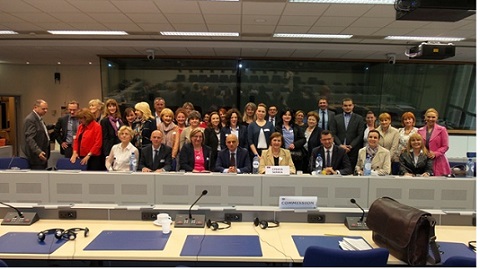
|
|
|
| Meeting of the Working group for Western Balkans, Committee of Regions, 28 May 2014 |
|
Meeting of the Working Group for Western Balkans of the Committee of the Regions was held on 28 May in the Committe of Regions in Brussels. Chair of the Working Group for WB in the Committee of the Regions Mia de Vits, said that the Committee of the Regions invited the representatives of the regional and local levels of government across Europe to help the flooded areas in Serbia and Bosnia and Herzegovina. De Vits recalled that in the past two years, CoR achieved a good level of communication with local and regional authorities in Serbia. Two meetings of the working group were held in Serbia in 2012 and 2013 in Kragujevac and Novi Sad. Deputy Head of of Mission of Republic of Serbia to the EU, Ambassador Miloš Todorović informed about the ongoing activities of relevant ministries and institutions in the constitution of the Serbian part of the Joint Consultative Committee (JCC), and it can be expected that the entire process from the Serbian side to be completed in June-July this year. In the panel devoted to the analysis of the state of local and regional structures in Serbia, participated Dejan Jovanovic, counselor of the City of Nis, Olivera Drenovac, counselor in Assembly of the City of Krusevac and Miodrag Milosevic, Deputy Head of Cabinet of the Mayor of Novi Sad. They have presented the activities and projects of the Standing Conference of Towns and Municipalities of Serbia, projects in the framework of strengthening administrative capacity and infrastructure of cities and municipalities in Serbia and analyzed the needs and directions of further involvement of local government structures in various activities relevant to the process of EU integration of Serbia.
|
|
|
| Serbia Flood Relief by SMS in Belgium |
|
From 2nd June 2014, it is possible to support the population affected by floods in Serbia via SMS in Belgium.
Sending the SMS with the text SER to number 4666, the amount of 1 EUR is donated. SMS number will be active until 30th June 2014 after which Belgacom will transfer the entire amount of the donation to the special account of the Embassy of the Republic of Serbia in Belgium.
|
|
|
| Assistance of Brussels in fast application for EU funds |
|
The EU is ready to assist Serbia as if it were already a member state, EU Commissioner for Regional Policy Johannes Hahn underscored in Brussels on May 21.
Hahn stressed out the EU is ready to aid Serbia through the civil protection program, solidarity fund and IPA funds, after talks with Serbian Foreign Minister Ivica Dacic and Minister without Portfolio responsible for EU integration Jadranka Joksimovic He noted that the demage caused by the severe flash floods crossed the threshold of 0,64 percent of the gross national income, or EUR 175 million, which means that the country satisfied the requirement for assistance from the EU solidarity fund. Dacic said that the Serbian delegation came to Brussels to learn more about the mechanism for accessing the Union’s funds.
Our country has never been in a situation to apply for this kind of assistance, he said, thanking the EU for aid it offered to Serbia that is fighting floods.
We agreed that Commissioner Hahn should come to Serbia as soon as possible and that his department will help us apply for assistance from the EU solidarity fund, the Serbian foreign minister said. He expects that Serbia, with the help of the European Commission and Commissioner Hahn will submit the application very soon.
Joksimovic voiced confidence that the EU funds will far exceed the donations from any individual country, nothing that this best proves how important the process of EU integration is to Serbia.
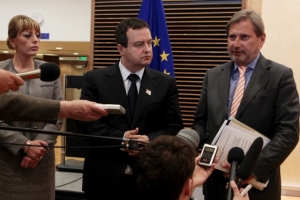
|
|
|
| Special account for Belgium and Luxembourg for humanitarian aid to those affected by floods in Serbia |
|
Those who wish to support flood victims by making payments may now donate also through the special account for Belgium and Luxembourg for humanitarian aid to those affected by floods in Serbia.
AMBASSADE DE SERBIE
IBAN: BE72 3631 3501 1916
SWIFT: BBRUBEBB
|
|
|
| Government declares three days of mourning for flood victims |
|
The Serbian government declared three days of mourning over the death and suffering of a large number of citizens in the floods, to be observed on 21, 22 and 23 May 2014. A book of condolences is opened at the Embassy of the Republic of Serbia in Brussels, Boulevard du Regent 53, 1000 Bruxelles, on Wednesday, May 21st from 14 am to 16 pm, and on Thursday May 22nd and Friday May 23rd from 10 to 12 and 14 to 16 hours.
|
|
|
| Announcement of the Ministry of Health of the Republic of Serbia in relation to the state of emergency provoked by floods and donation of necessary aid in medicines and medical equipment |
|
In relation to the state of emergency provoked by natural disasters, numerous people from Serbia and abroad, wishing to donate necessary medicines and medical equipment, contacted the Ministry of Health of the Republic of Serbia. As a result of the state of emergency, it is necessary to provide additional amounts of certain groups of medicines and medical equipment for which there is an increasing need of the population.
Ministry of Health informs that, in order to safeguard health of the patients, it is not possible to accept direct donations from individuals in form of medicines and medical equipment, due to insufficient information regarding their storage and procurement.
All legal entities and individuals wishing to donate medicines, medical and other equipment registered in the Republic of Serbia, can do so through the producer or whole-seller delivering a donation to the Central Pharmacy of the Clinical Centre of Serbia, that takes further care of distribution to all medical institutions on the territory of the Republic of Serbia, according to their declared needs.
In the case of donations of unregistered medicines, import of the donation is conducted with the approval of the Medicines and Medical devices of Serbia, on the basis of following documents: HACCP (Hazard analysis and critical control points - issued by competent EU authority) and certificate of the analysis of the medicine from the producer. Import of unregistered medical equipement is also done with the approval of the Medicines and Medical devices of Serbia, on the basis of following documents: the Statement of compliance, CE certificate and a proof that the medical equipement is distributed and sold in the country of the producer.
The Agency will deal with the import of donated medicines and medical equipment urgently within 24 hours. The donation agreement is concluded with the the Central Pharmacy of the Clinical Centre of Serbia.
The list of most essential medicines, medical and other equipement can be downloaded here.
For additional information all potential donors can call the following telephone numbers: +381(0)11/3614-666 and +381(0)11/3616-257, or write to the following email: lekovi@zdravlje.gov.rs
We thank you in advance for your help! |
|
|
| Floods in Serbia, humanitarian aid in Belgium and Luxembourg |
|
Donations in goods can be brought to the Embassy of Republic Serbia. The address is: Boulevard du Regent 53, 1000 Brussels. The Embassy will then dispatch the goods to Serbia.
For those who want to deliver directly their donations/goods to Serbia, please contact the Embassy to obtain a cover sheet, to expedite the proceedings with the customs authorities of Republic of Serbia.
List of urgent and most needed supplies provided by Red Cross include following:
- mattresses
- linen / bead sheets
- beds (folding cot beds, tent beds, bunk beds)
- diapers for children and adults
- socks
- underwear
- children's clothing
- flashlights
- batteries for flashlights
- Hygiene products (soap, toilet paper, paper towels, sanitary napkins, toothbrushes, toothpaste...)
- Asepsol 5P
- rubber boots.
It is advisable to make a short phone call to arrange your drop off for goods via: 02 647 26 52 or 02 647 57 81 |
|
|
| PayPal account for flood relief opened |
|
The Serbian government stated today that starting from 18 May it will be possible to donate humanitarian assistance to victims of floods in Serbia through PayPal service from 193 countries and the region. The account belongs to the diplomatic mission of Serbia in Brussels, from where the funds will be sent directly to the account of the Republic of Serbia intended for the assistance to victims of floods. The payment of humanitarian assistance, through the PayPal service, can be made on the address floodrelief.gov.rs |
|
|
| Contact person in the Mission of Serbia to the EU for coordination activities related to the emergency situation in Serbia |
|
Contact person in the Mission of Serbia to the EU for coordination activities related to the emergency situation in Serbia is Mr. Dragan Stojovic, Counselor at the Mission, Mobile +32 473 971 216, e-mail: dragan.stojovic@mfa.rs |
|
|
| Government opens accounts for assistance to flood victims |
|
The Serbian government has opened dinar and foreign currency accounts at which those who want to help victims of floods can deposit money. The assistance to those in need can be paid to the dinar account 840-3546721-89, purpose of payment: the removal of consequences of the emergency situation - floods. The number of the foreign currency account at which the assistance for the removal of consequences of the emergency situation can be deposited is 01-504619-100193230-000000-0000 (IBAN: RS35908504619019323080).
|
|
|
| XVII Meeting of the Ministerial Council of the Adriatic-Ionian Initiative, Brussels 13 May 2014 |
|
XVII Meeting of the Ministerial Council of the Adriatic-Ionian Initiative was held in Brussels on 13 May 2014. The meeting was chaired by Mr. Ditmir Bushati, Minister of Foreign Affairs of Albania, which last year presided over the Adriatic-Ionian Initiative. The delegation of the Republic of Serbia was led by Deputy Assistant Minister for the European Union, Ambassador Jela Baćović. The Ministers adopted the "Brussels Declaration 2014" affirming the readiness of member countries of the AII, that actively work together, to promote the EU Strategy for the Adriatic-Ionian region (EUSAIR), which will be published in June of 2014. The Strategy will be formally adopted during the Italian presidency of the EU in October 2014. The strategy provides a good opportunity for strengthening regional cooperation in the Adriatic-Ionian region, restoration of transport and regional infrastructure and the promotion of sustainable environmental development. At the same time, the strategy is a mechanism for strengthening the administrative and other capacities of the candidate countries in the accession process. On the meeting, mandate of the Secretary General of the AII, Ambassador Fabio Piljapoko, was extended. Bosnia and Herzegovina will be chairing the Adriatic-Ionian Initiative in the period June 2014 - June 2015. The meeting of the Ministerial Council of the Adriatic-Ionian Initiative was preceded by a meeting of National Coordinators. On behalf of the Republic of Serbia, Pavle Jankovic, Head of Unit for Regional initiatives and national coordinator for the AII in Serbia, participated in this meeting.
|
|
|
| The National Assembly hosted a conference "Ten Years in the EU: Lithuanian Achievements in the Euro-Integration Process " |
|
Although negotiations on EU membership have varied for each country, all of them have gained from positive socio-economic changes since joining the European family, stated at today’s conference "Ten Years in the EU: Lithuanian Achievements in the Euro-Integration Process ". Minister without portfolio in charge of European integration Jadranka Joksimović said that Serbia's only real objective was to become a valued and functional part of the EU and urged its member states to support EU enlargement. "EU Member States should support enlargement because the principles and values for which it stands contribute to the stability of not only the Western Balkans, but the whole Europe", emphasised Joksimovic at a meeting organised by the Embassy of Lithuania in Budapest to mark a decade since 10 new members joined the EU in the largest single expansion. Joksimovic stated that there should be understanding for the fact that some member states have not prioritised the process of expansion primarily because of the presence of an economic crisis. In addition, she pointed out the many benefits of further expansion. "These are the goals that the new Serbian government has set for the future, relating to higher levels of productivity, the fight against poverty, an economy based on education, and environmental protection", said the Minister, adding that it was a challenge for Serbia to take a "clear and sustainable position" in the reshaping balance of the EU and simultaneously create a way to adjust to the policies of Brussels. Speaking about the great EU expansion of 2004, Joksimovic assessed that it was a huge success that met the expectations of its new member states, but also the expectations of countries such as Serbia. Head of the European Union Delegation to the Republic of Serbia Michael Davenport expressed his belief that Serbia would achieve its goal of joining the EU "within reasonable time", adding that the offer of membership was just in the reach of our country and that it was up to the state to "secure many benefits from the accession process." Discussing the benefits of membership in the EU, Davenport said that the experience of Lithuania represented "a success story on multiple levels- economically and socially", and that the country would most likely join the Euro zone next year. The former head of the Lithuanian Foreign Ministry Antanas Valionis followed up by saying that accession represents a qualitative leap for every country, including his, and that he expected the same in the case of Serbia. "You need Europe and Europe needs Serbia. You should be aware of the fact that you have many friends in the EU", said Valionis, expressing his confidence that the new Serbian government would take all necessary steps on the path towards Europe. Pointing out that each candidate had its own path to the EU and that negotiation elements have been increasing with every year, Valionis said that its core values have still remained the same. "Today's focus is on negotiating the rule of law, however, the EU is constantly changing, introducing new obligations for candidates", said Valionis. He continued by saying that all reforms conditioned by negotiations influence the modernisation of a country and boost its competitiveness in the market. In this context, he recalled that his country had to make some concessions, including the closure of a nuclear power plant in Lithuania. Deputy Director of the Serbian Integration Office Srdjan Majstorovic said that Serbia in comparison to other candidate countries has a remarkable institutional capacities, but admitted that even they might not suffice for the future negotiations. He noted that the process of negotiations requires coordination from the "central government", adding that exactly such states have been the best prepared for them. "It is up to us to change our society and modernise the country", concluded Majstorovic.
|
|
|
| Stefan Fule's visit to Belgrade |
|
Commissioner for Enlargement and European Neighbourhood Policy Štefan Fule visited Belgrade on Monday, 5 May, were he met with President Tomislav Nikolić, Prime Minister Aleksandar Vučić, First Deputy Prime Minsiter and Minister of Foriegn Affairs Ivica Dačić, Minister of the Interior Nebojša Stefanović, Minisiter of Justice Nikola Selaković, Speaker Maja Gojković and representatives of parliamentary groups. Fule expressed the hope that the process of screening of 18 chapters will be completed by the end of the Greek presidency of the EU, which is an excellent result and a reflection of great efforts of Serbia. He explained that further negotiation process will be based on three pillars, adding that the first one refers to the rule of law, fight against corruption, human rights and security. Fule expressed hope that Serbia will soon deliver Action plans for the chapters 24 and 24, adding that he expects these chapters to be opened early next year. The second pillar applies to economic control, which is a new approch of the EU, while the third pillar relates to the future course of normalisation of relations between Belgrade and Priština, he said. Fule stated that the talks in Belgrade showed full compatibility in approach and he highlighted economic reforms as most important ones. Prime Minister Vučić expressed his gratitude to Fule over his commitment to Serbia's EU integration process, as well as his understanding, stenght and wish to help Serbia. He said that it is of great importance to open chapters 23 and 24, taht are related to the judicary, fundamental rights, justice, freedom and security, as they are pivotal for the establishment of the legal state and the rule of law. Vučić said he expects the first chapters in the EU accession talks to open in October, including chapters 32 and 35, which would be followed by talks on chapters 23 and 24. He announced major events in Belgrade and the region in the next two months, stressing that by implementing reforms and adopting important economic laws Serbia will improve business environment.
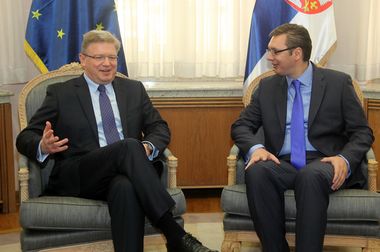
|
|
|
| Meeting between EU finance ministers and finance ministers and central bank governors of the candidate countries |
|
The meeting between EU finance ministers and finance ministers and central bank governors of the candidate countries was held in Brussels on May 6 2014. The meeting was organized in the form of a working lunch in the margins of the EU Economic and Financial Affairs Council (ECOFIN). The Serbian delegation was composed of representatives of the Ministry of Finance and the National Bank of Serbia and led by minister of finance Mr. Lazar Krstic. It was pointed out that the EU finance ministers and the European Central Bank (ECB) representatives recognize the efforts of Serbia for fiscal stabilization and strengthening of sustainable economic growth. Krstic confirmed to the EU counterparts commitment to European integration and economic reforms of the new Serbian government. He pointed out that stable growth based on exports, reduction of the deficit and strengthening the financial stability are some of the government objectives for coming years. Moreover, plan for the next three to four years is to face a serious and profound reform of public enterprises, restructuration of 157 state owned companies and consolidation of state-owned shares in the financial sector. Tasks for the new government are also adoption of the Labour law, control of state aid in line with EU rules, as well as establishing stricter fiscal discipline in the public sector in general. Minister Krstic in addition said that one of the major tasks in the following period for Serbia is the public administration reform.
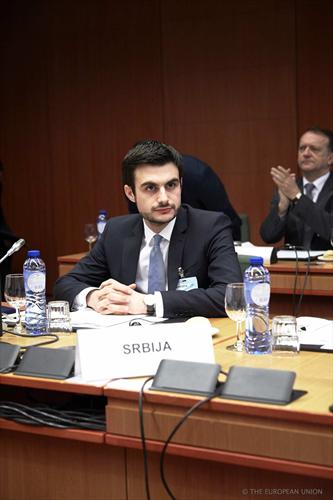
|
|
|
| EU High Representative for Foriegn Affairs and Security Policy Catherine Ashton visit to Belgrade |
|
EU High Representative for Foriegn Affairs and Security Policy Catherine Ashton visited Serbia on Monday, 28 April. In Belgrade, she met with President Tomislav Nikolić, Prime Minister Aleksandar Vučić, First Deputy Prime Minister and Minister of Foriegn Affairs Ivica Dačić and Speaker Maja Gojković. Ashton arrived to Belgrade only a day after the formation of the new Government of Serbia, wanting to express strong support and encouragement for its course of reform and path towards EU membership. She said that is great to see that the Serbian Government is committed to EU membership, underlining that this resolve is going to ensure that the journey be a success. Catherine Ashton stressed out that Serbia can be the example to others in the region and can also show what can be achieved through hard work, leadership and determination to make tough choises. She paid a tribute to the current and to the previous Government for their courage, politicial maturity and statesmanship in the Dialogue with Priština. High representative pointed out that Serbia is an important political partner of the EU and said that contribution of Serbia to better cooperation and improved relations with neighbours are pivotal to the stability of the entire Western Balkans. Ashton said that becoming a full member of the EU is not an easy process and underlined that on its journey towards EU, Serbia will have to deal to with normalisation of relations with Priština, rule of law and economic reforms. The Prime Minister Vučić said that the EU High Representative’s arrival on the first day after the election of the new Government is a great honor and a good sign for Serbia. He pointed out that the Dialogue with Priština will continue, as a lot remains to be done. Vučić said he expects that Serbia will sign an agreement with the Internation Monetory Fund in June at the latest and added that the agreement with the World Bank has already been made. The Prime Minister stressed out that the opening of Chapters 23 and 24 next year will be a clear signal that we want to bring order into our contry and its legal system. According to Vučić, the rule of law is one the most important things that will boost investments. Big challenges are ahead of Serbia, and that is why it needs help in the process of real reforms, the Prime minister declared and underlined that our country expects from the EU the assistance, as confirmed by Ashton during her visit to Belgrade.
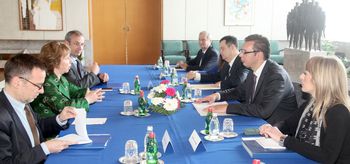
|
|
|
| Meeting with President of the Committee of Regions, Mr Ramon Luis Valcarel, 15 April 2014 |
|
Ambassador of the Republic of Serbia to the EU Dusko Lopandic met on 15 April with the President of the Committer of Regions Mr. Ramon Luis Valcarel. The two sides discussed the current activities and modalities of cooperation between the Republic of Serbia and the Committee of the Regions. According to the provisions of the Stabilization and Association Agreement with the EU, Serbia is entering into a new phase of relations with the Committee of the Regions, primarily through the constitution of Joint Consultative Committee (JCC). After the formation of the new Government of the Republic of Serbia and the appointment of members of the JCC on the Serbian side, the first meeting of the Joint Consultative Committee should be held by the end of this year. President of the Committee of the Regions Mr. Ramon Luis Valcarel has pointed out that the opening of accession negotiations with the EU represents a very important moment for Serbia in the process of strengthening administrative capacity, rebuilding infrastructure and promoting investment potential of country. Committee of the Regions will tend to be an active partner in this process, primarily through the promotion and strengthening of cooperation with regional and local levels, the exchange of good practices and experiences in the process of decentralization and the strengthening of the financial capacity of regional and local self-governments in Serbia.
|
|
|
| New round of dialogue |
|
The meeting between EU's Catherine Ashton as mediator and Prime Ministers of Serbia Mr. Ivica Dacic and delegation from Pristina ended late on Monday 27th of January in Brussels without agreement on key issues. First Deputy Prime Minister Aleksandar Vučić also took part in this round of the dialogue. According to Ivica Dačić, no agreement was reached on key issues related to the justice system and the community of Serb municipalities. The Serbian prime minister said that there were "significant differences in the positions of the two sides." A new round of dialogue will be held on February 12
|
|
|
| Explanatory screening for Chapter 2 “Free movement of workers” was held in Brussels |
|
Explanatory screening meeting for Chapter 2 on Free movement of workers was held in Brussels, on 23 January 2014. Delegation of the government of the R. of Serbia was headed by Mr. Zoran Martinović, State Secretary in the Ministry of Labour, Employment and Social Affairs and Chairman of the Negotiating Group, and Ms. Tanja Miščević, Chief Negotiatior with the EU. In the delegation there were representatives of the Ministry of Labour, Employment and Social Affairs, Ministry of Health, Institute for Social Insurance, Pension and Disability Insurance Fund, National Employment Service and European Integration Office. At the explanatory screening meeting for Chapter 2, which was presided by a representative of the Directorate General for Enlargement, the experts of the EU Delegation presented in detail the relevant acquis communautaire, divided in four parts: general priniciples of access to labour market, European Employment Service, coordination of social security systems and European Healts Insurance Card. The bilateral screening meeting, where the Serbian side will present its legal system in this area, as well as some differences in relation to the acquis communaitaire, is scheduled for 25 March 2014.
|
|
|
| Screening which refers to Chapter 35 was held in Brussels |
|
22 st of January 2014
A screening for Chapter 35 negotiations on Serbia accession in the EU was held in Brussels - a chapter that covers the issue of normalization of relations between Belgrade and Pristina. The Serbian delegation in the screening of Chapter 35 comprised Serbian Minister without Portfolio in charge of Kosovo-Metohija Aleksandar Vulin, and Chief Negotiator of the Republic of Serbia Tanja Mišćević. The officials of the European Commission (EC) and European External Action Service (EEAS) and the members of the delegation of the Republic of Serbia are alternately, in accordance with the practice of so-called explanatory screening, as well as bilateral screening, presented their positions. As usual practice, after every screening, the European Commission files the report to member countries on the degree of adjustment of Serbia's plans to those of the EU in the scope of the Chapter 35. After the screening meeting for Chapter 35, Minister Aleksandar Vulin said that the explanatory and bilateral screenings were held in Brussels, which means that both sides presented their respective positions concerning the normalisation of the Belgrade-Pristina relations, and stressed that this chapter did not open new topics in the Belgrade-Pristina dialogue.
http://www.tanjug.rs/videodet.aspx?galID=116538
|
|
|
| Reception on the occasion of the opening of accession negotiations, 21st January 2014 |
|
21st January 2014
Mission of the Republic of Serbia to the EU in Brussels hosted a reception for the opening of accession negotiations with the EU. With the participation of the Prime Minister I. Dacic, First Deputy Prime Minister A. Vucic, Foreign Minister I. Mrkić, Minister for European Integration B.Ružic, the chief negotiator with the EU T. Miscevic and other members of the Serbian delegationa, the ceremony was attended by many representatives of the EU institutions (European Council, European Commission, European Parliament, European external action service, etc.), Permanent missions of the EU Member States, the diplomatic corps in Belgium and NATO, members of the International organisations in Brussels, think thank experts, and other distinguished guests. On the ceremony, the Deputy Prime Minister and Minister of Foreign Affairs of Greece, E. Venizelos, took place in his capacity as president of the EU. Also, the reception was attended by the EU Commissioners European Commissioner for Consumer Protection N. Mimica and European Commissioner for International Cooperation, Humanitarian Aid and Crisis Response K. Geogrijeva. The guests were welcomed by the Prime Minister of the Republic of Serbia I. Dačić, and Minister of Foreign Affairs of Greece, E. Venizelos.
Video link: http://www.tanjug.rs/videoDet.aspx?galID=116483
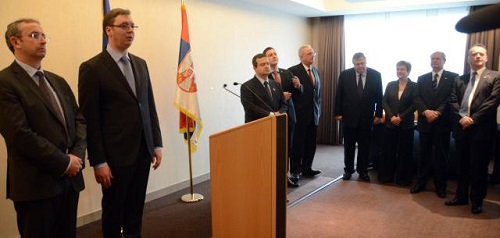
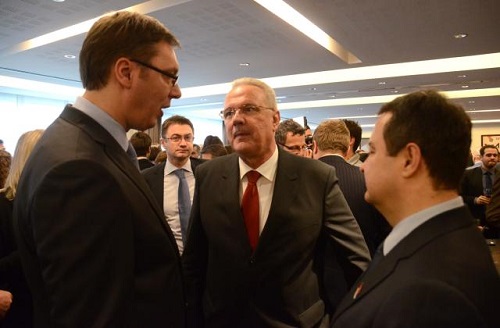
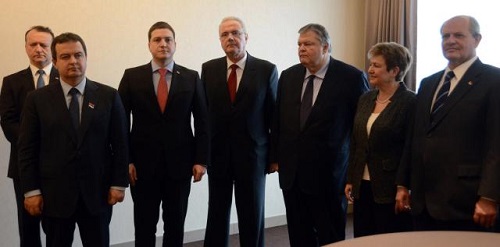
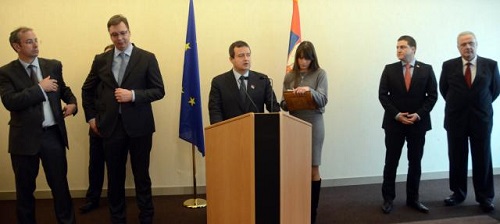
|
|
|
| Republic of Serbia started official talks with EU First Intergovernmental Conference between the European Union and Serbia Brussels, 21.01.2014. |
|
21.01.2014. European officials extended congratulations to Serbia on Tuesday on the occasion of the first session of the intergovernmental conference with the EU, which marked the official start of the country's EU membership negotiations, stressing that this is an important day both for Serbia and the region. Following the meeting with the Serbian delegation which participated in the first Serbia-EU intergovernmental conference in Brussels, President of the European Council Herman Van Rompuy stated that a new chapter is opening in EU-Serbia relations and congratulated the country on the start of accession talks. Tuesday's start of Serbia's EU accession talks is the most important event for the country since World War II, Serbian Prime Minister Ivica Dacic has said. "Historically, this will further determine our path," Prime Minister Ivica Dacic said on Tuesday at a press conference on the start of the Serbia-EU talks. First Deputy Prime Minister of Serbia Aleksandar Vucic said that for the citizens of Serbia today's opening of negotiations with the European Union brings a different future than the one they had a few months ago and said that our country has finally become a reliable partner not only the EU, but also for all of its members states. Serbian Foreign Minister Ivan Mrkic said on Tuesday that the start of the EU accession talks is a great event, maybe even a historic one, for Serbia and the success of the country's foreign policy. “It is possible that we will be fully aware of this event only in the months to come, maybe even years,” Minister Ivan Mrkic said.
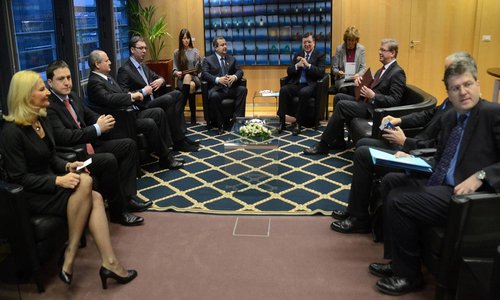

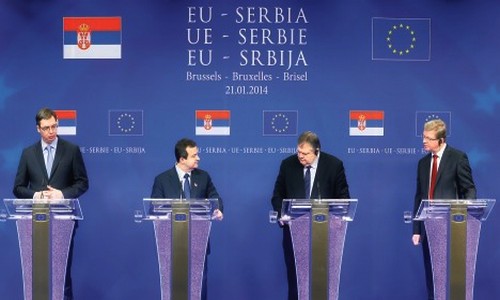
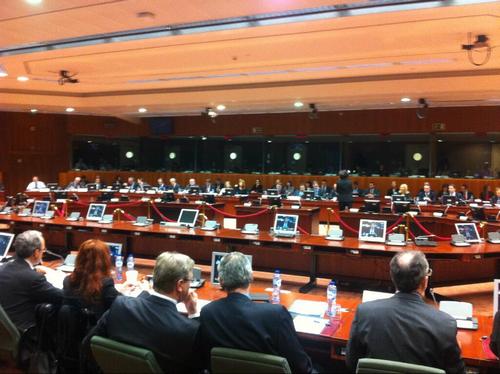
|
|
|
| EU: Negotiations with Serbia to start January 21 |
|
European Council President Herman Van Rompuy stated that the decision to start accession negotiation with Serbia on 21 January had been confirmed by the European Council. Heads of the European Union states or governments confirmed the decision of the Council of Ministers to start membership negotiations with Serbia, at the meeting in Brussels which took place on December 20th 2013. The recommendation adopted by the Foreign Ministers, following report of the High Representative Catherine Ashton, that the first intergovernmental conference with Serbia should be held in January, have been confirmed at the summit in Brussels. EU leaders have also confirmed the negotiating framework – mechanism and rules for membership negotiations with Serbia. Greece, which will take over the EU presidency on 1 January, stated that the first intergovernmental conference will be scheduled for 21 January. |
|
|
| Signing of EDA-Serbia Administrative Arrangement |
|
Brussels - 13 December, 2013
Nebojša Rodić, Serbian Minister of Defence and Catherine Ashton, High Representative of the European Union for Foreign Affairs and Security Policy and Head of the European Defence Agency (EDA), in the presence of Ivica Dačić, Serbian Prime Minister, signed an Administrative Arrangement between the EDA and the Serbian Ministry of Defence. The conclusion of the Administrative Arrangement follows a mandate provided by the EDA Steering Board. The EU Council approved the Administrative Arrangement in May 2013. The Administrative Arrangement formalises the relationship between EDA and Serbia, enabling Serbia’s potential participation in EDA’s projects and programmes. Cooperative areas remain to be further defined, but Research & Technology and training are examples of possible cooperative areas.
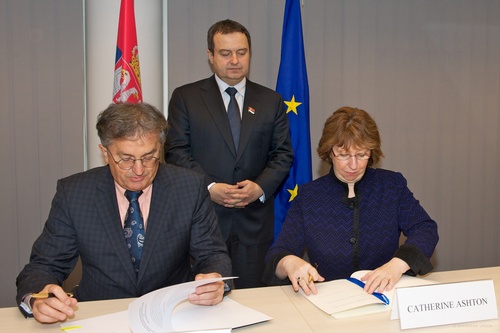
|
|
|
| Bilateral screening which refers to Chapter 24, (police and human rights) was held in Brussels |
|
Date: 13. December 2013
The Serbian delegation was led by Tanja Miščević, Serbian chief negotiator and Vanja Vukić, state secretary at the Ministry of the Interior. During the screening, Serbia's delegation informed European Commission (EC) experts about the system of laws and regulations in connection with the functioning of the police and human rights protection. The goal of the screening was determination of the level of harmonization of Serbia's system with the European standards, which is a necessary step in the preparations for the accession talks.
|
|
|
| Bilateral screening which refers to Chapter 23, (the judiciary, battle against corruption and basic rights) was held in Brussels. |
|
Date: 10. December 2013
The Serbian delegation was led by Justice Minister Nikola Selakovic, Besides Minister Selakovic, the Serbian delegation includes head of the negotiating team Tanja Miscevic and officials of the Supreme Court, Public Prosecutor's Office, High Judicial Council, National Council of Prosecutors, Anti-Corruption Agency and other state bodies whose involvement and opinion is relevant to the start of the talks. Minister Selaković expressed the expectation that Serbia would open Chapter 23 in the EU accession talks by the end of the next year. “This is a specific chapter but we will do all we can to open it in late 2014 at the latest”. |
|
|
| Meeting of the Ambassador of the Republic of Serbia to the EU, Duško Lopandić with Henri Malosse, the President of the European Economic and Social Committee |
|
Ambassador of the Republic of Serbia to the European Union, Dusko Lopandic met with the Henri Malosse, the President of the European Economic and Social Committee, on 30th October 2013 in Brussels. The discussions focused on the cooperation between the civil societies of Serbia and the European Union, in the context of the establishment of an EU-Serbia Joint Consultative Commitee.
Video link:
http://www.youtube.com/watch?feature=player_embedded&v=ocu-vE6WZHA
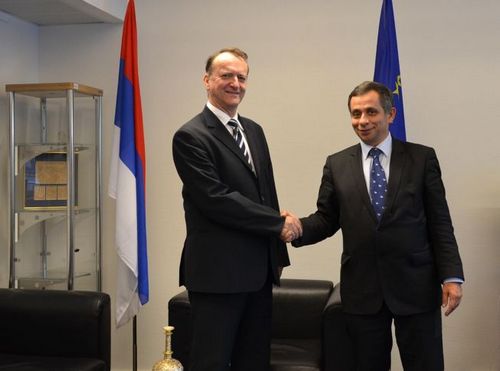
|
|
|
| The Stabilisation and Association Council between Serbia and the European Union held its first meeting |
|
The Stabilisation and Association Council (SA Council) between Serbia and the European Union held its first meeting on 21 October 2013 in Luxembourg. The meeting was chaired by Ms Catherine Ashton, High Representative of the Union for Foreign Affairs and Security Policy and Vice-President of the European Commission. The Delegation of Serbia was led by Prime Minister Ivica Dačić who was accompanied by Minister without portfolio responsible for European integration Branko Ružić. Commissioner Štefan Füle also took part in the meeting. The Stabilisation and Association Council welcomed the entry into force of the Stabilisation and Association Agreement on 1 September 2013 and commended Serbia for its progress in 2013 on its path towards the European Union. The SA Agreement will remain at the core of the relationship between the EU and Serbia all the way until accession.
Joint Press Release:
http://www.consilium.europa.eu/uedocs/cms_data/docs/pressdata/EN/foraff/139092.pdf
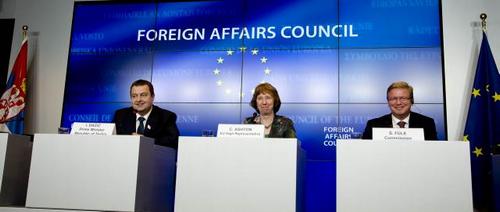
|
|
|
| Government appoints Tanja Miščević as chief negotiator with EU 04.09.2013 |
|
Serbian government appointed at meeting held on September 3 Tanja Miščević as the chief negotiator for the accession of the Republic of Serbia to the European Union. The government has adopted a decision to form a negotiating team for the accession of Serbia to the EU, which will be responsible for coordinating and managing the process of negotiations on all chapters in all stages of the negotiations. |
|
|
|
|
|